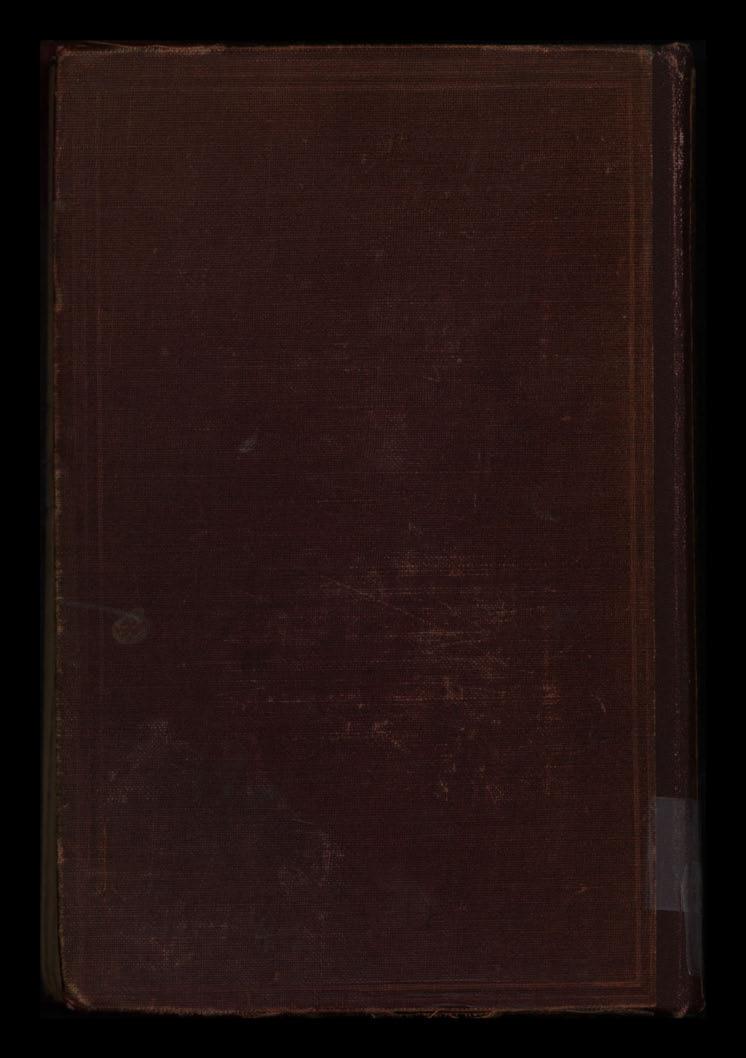












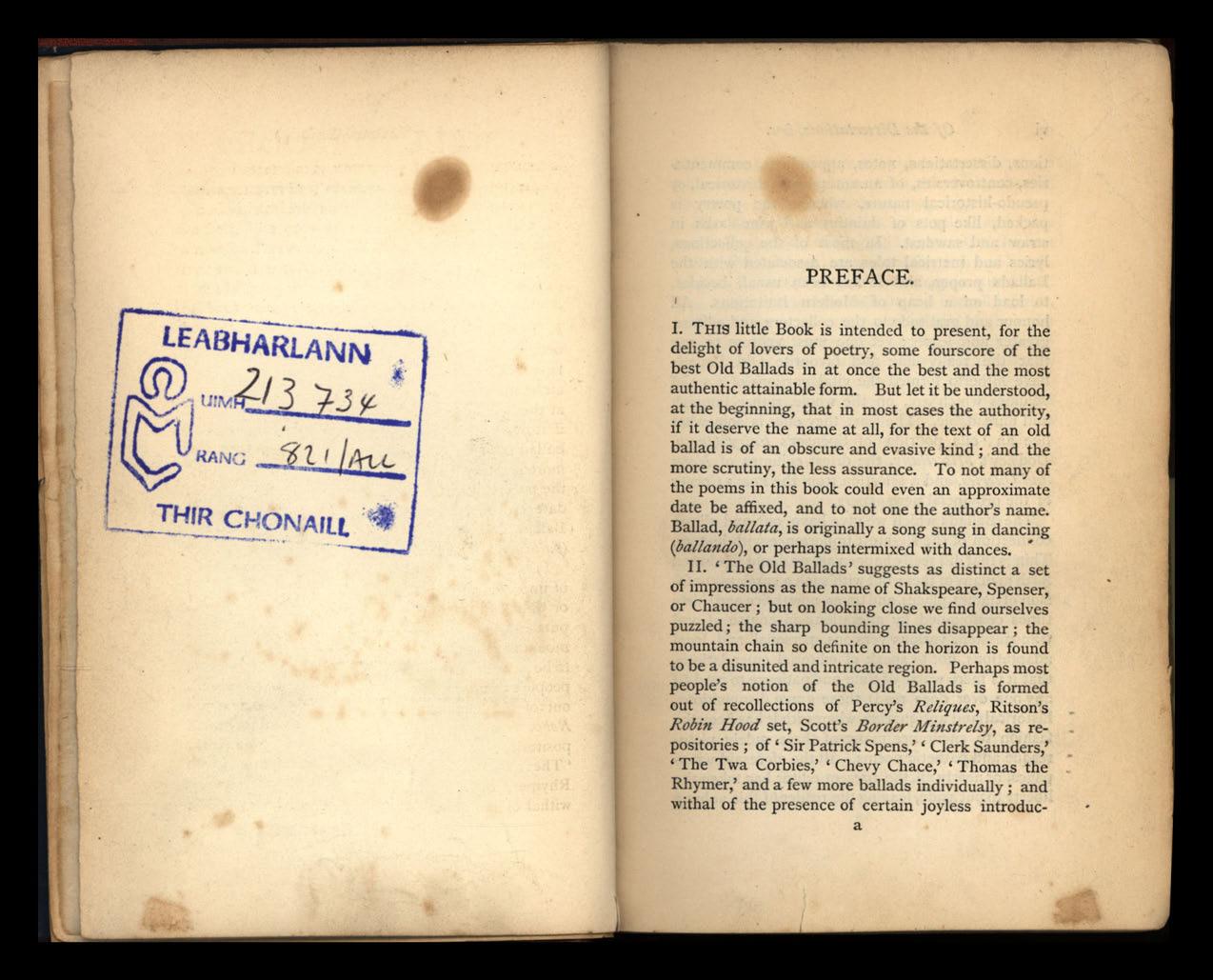
1. THIS little Book is intended to present, for the delight of lovers of poetry, some fourscore of the best Old Ballads in at once the best and the most authentic attainable form. But let it be understood, at the beginning, that in most cases the authority, if it deserve the name at all, for the text of an old ballad is of an obscure and evasive kind; and the more scrutiny, the less assurance. To not many of the poems in this book could even an approximate date be affixed, and to not one the author's name. Ballad, ballata, is originally a song sung in dancing (balla1ldo), or perhaps intermixed with dances. •
11. 'The Old Ballads' suggests as distinct a set of impressions as the name of Shakspeare, Spenser, or Chaucer; but on looking close we find ourselves puzzled; the sharp bounding lines disappear; the mountain chain so definite on the horizon is found to be a disunited and intricate region. Perhaps most people's notion of the Old BaJlads is formed out of recollections of Percy's Rel£ques, Ritson's Robitt Hood set, Scott's Border Millstrelsy, as repositories; of' Sir Patrick Spens,' , Clerk Saunders,' 'The Twa Corbies,' 'Chevy Chace,' 'Thomas the Rhymer,' and a, few more ballads individually; and withal of the presence of certain joyless introduca
r,
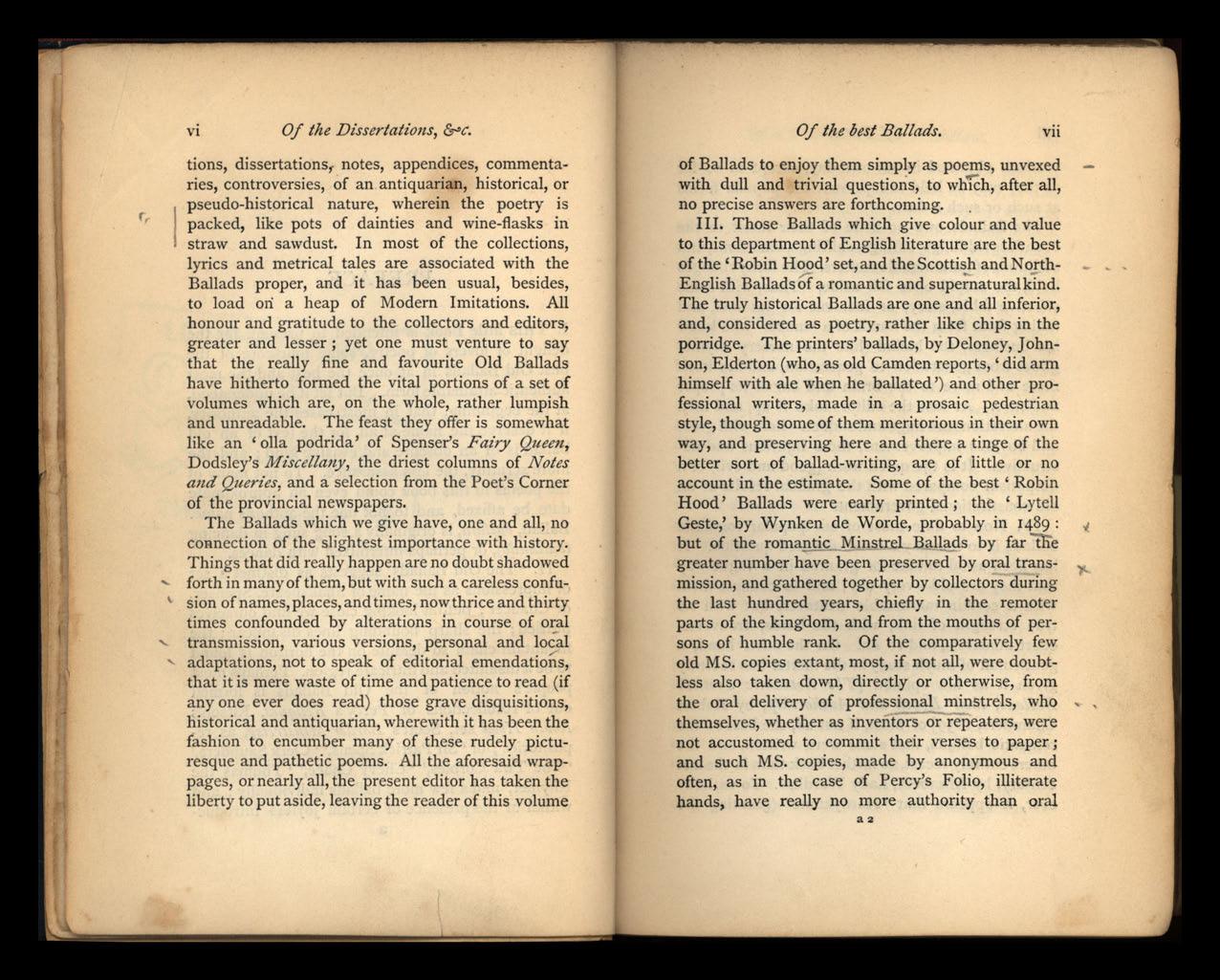
VI Of the Dissertations, &>c.
tions, dissertations f notes, appendices, commentaries, controversies, of an antiquarian, historical, or pseudo-historical nature, wherein the poetry is packed, like pots of dainties and wine-flasks in straw and sawdust. In most of the collections, lyrics and metrical tales are associated with the Ballads proper, and it has been usual, besides, to load on a heap of Modern Imitations. All honour and gratitude to the collectors and editors, greater and lesser; yet one must venture to say that the really fine and favourite Old Ballads have hitherto formed the vital portions of a set of volumes which are, on the whole, rather lumpish and unreadable. The feast they offer is somewhat like an 'olla podrida' of Spenser's Fairy Queen, Dodsley's Miscellany, the driest columns of Notes and Queries, and a selection from the Poet's Corner of the provincial newspapers.
The Ballads which we give have, one and all, no connection of the slightest importance with history. Things that did really happen are no doubt shadowed .... forth in many of them, but with such a careless confu\ sion of names, places, and times, now thrice and thirty times confounded by alterations in course of oral '- transmission, various versions, personal and local adaptations, not to speak of editorial that it is mere waste of time and patience to read (if anyone ever does read) those grave disquisitions, historical and antiquarian, wherewith it has been the fashion to encumber many of these rudely picturesque and pathetic poems. All the aforesaid wrappag es , or nearly all, the present editor has taken the liberty to put aside, leaving the reader of this volume
Of tIle best Ballads. VII of Ballads to enjoy them simply as poems, unvexed with dull and trivial questions, to wh'ich, after all, no precise answers are forthcoming.
Ill. Those Ballads which give colour and value t o this department of English literature are the best of the 'Robin Hood' set,and the Scottish and NorthEnglish Ballads Of a romantic and supe;-naturalkind. The truly historical Ballads are one and all inferior, and, considered as poetry, rather like chips in the porridge. The printers' ballads, by Deloney, Johnson, Elderton (who, as old Camden reports, ' did arm himself with ale when he ballated ') and other professional writers, made in a prosaic pedestrian style, though some of them meritorious in their own way, and preserving here and there a tinge of the better sort of ballad-writing, are of little or no account in the estimate. Some of the best' Robin Hood' Ballads were early printed; the 'Lytell Geste,' by Wynken de Worde, probably in 1489: but of the romamk-Minstrel Ballads by far t'lle greater number have been preserved by oral transmission, and gathered together by collectors during the last hundred years, chiefly in the remoter parts of the kingdom, and from the mouths of persons of humble rank. Of the comparatively few old MS copies extant, most, if not all, were doubtless also taken down, directly or otherwise, from the oral delivery of professional minstrels, who themselves, whether as inventors orrepeaters, were not accustomed to commit their verses to paper; and such MS . copies, made by anonymous and often, as in the case of Percy's Folio, illiterate hands, have really no more authority than oral a2 , ,
viii Oj Dates.
versions obtained in our own day, except in so far as they may be held to represent the popular forms at such or such a date.
The Ballads owe no little of their merit to the \ , countless riddlings, siftings, shiftings, omissions, and '" additi.QDs of innumerable reciters. The lucky changes hold:-:the stupid ones fall aside. Thus, with some effective fable, story, or incident for its soul, and taking form from the hands of a ' maker' who knew his business, the ballad (like the nursery rhyme) glides from generation to generation, and fits itself more "ind'more to the brain and ear of its proper audience. At last the editors take it up, and then the alterations are huge and sudden-here with great and obvious improvement, there injurious and destructive. It is the quick work (good and evil) of a despotism compared with the gradual results of an old constitutional government.
IV. How to date most of our popular romantic ballads is to this day a much debated question. It has been usual to take for granted in a vague way that they are old-very old; and to connect them with a certain marketable neatness, but with no true strength of link, with the bards, trouveres, court minstrels, and so on. On the other hand, a gentleman of much study in the matter has recently given it as his opinion [The Romantic Scottish Ballads, their Epoch and Autllorship, by Robert Chambers, 1859] of most, if not all, the best of the romantic ballads, that some were written, and the others entirely recast, no further back than in the last century, by Elizabeth, Lady Wardlaw. To us,however, it appears that 'Hardyknute' (granting the

Oj a Claimjor Lady Wardlaw. IX
lady.'s authorship of that) has little or no poetical ment, a.nd owes its reputation to the novelty, in that day, of Its style; the true and pure examples (whereof , Hardyknute' was a poorish imitation) lying hidden as yet from the reading public. From' Hardyknute ' Mr. Chambers argues Lady Wardlaw's capability of writing or putting into their present forms 'Sir Edward, Edward," The Jew's Daughter,' 'Young Waters,' 'Edom .Ji. Gordon,' _ , The Gay Goshawk,' , Gil MOI'ice,' , Annie 0' Lochroyan,' and many other of our best ballads. 'Childe (printed by J amieson lz"teratim from Percy's folio MS.) is 'a poor bald imperfect composition,' says Mr. Chambers, 'in comparison with "Gil !"'!orice.'" This old MS. copy is indeed imperfect, m the sense of fragmentary; that is, it does not give the whole ballad as then existing; yet even in what it does give are to be seen the characteristics of our finest ballad poetry, and we have gone back to it for the use of the present work. That, like every other ballad orally transmitted, this ballad became modified and altered in the course of successive generations, cannot be doubted· that once the epoch of editors set in, the ballads a short time more touched, and by more skilful hands, than during their whole previous existence seems indubitable; but that Lady Wardlaw, or an; individual writer, recast' Gil Morice,' or any other, much less most, of our best ballads, we find no evide.nce whatever. If not proved old, they have certamly not been proved modern.
V. We look upon our as a class of poems traceable backwards to perhaps the fif-
From Minstrel down to Editor.
x
, teenth century,-impressive stories in a simple style of verse, sung (and often filled in with prose narration) by professional strollers of a humbler sort than the courtly minstreiS;" who themselves by this time were beginning to decline from their high place. These _ (some derived from ancient times and foreign countries, some abridged from the long metrical romances, some of new invention) were composed, not without genius in the best, by _ men for popular audiences; and passing from mouth to mouth and generation to generation of singers
_ and reciters, dull and clever, undergoing numerous alterations by the way by reason of slips of memory, personal t as tes, local adaptations and prejudices, additions, omissions, patches, and lucky thoughts, a nd on the whole gaining in strength in the process, came in a later day into tnebaskets of literary col, l ec tors, were transferred into the editorial labora-
\. tories, there sifted, mixed, shaken, clarified, improved (or the contrary), no one can ever tell how much, and sent at last into the World of Books in a properly solemn shape, their triviality duly weighted with a load of antiquarianism, and garnished with fit apologies for the presentation of such' barbarous productions' to 'a polished age like the present,' and assurances that those high literary personages, the 'ingenious' Mr. This and the 'elegant 'Mr. That, whose own poems are so justly, &c. (read, now forgotten), have given some countenance to the venture.
VI. Popular poems, similar in style and often in subject, are found in Denmark, Sweden, Germany, and other countries, all doUbtless deriving no

Antiquity of the Ballads. xi
little from the splendidly obscure Oriental nurs ery of .race. In 1586, Sophia, Queen of Denmark, vlsltmg Tycho Brahe, prince. of stars, in his islandobservatory, was there storm-sted three days' when to amuse Her Majesty a store of old Danish Ballads collected by Pastor a friend of Tycho's; was produced; and, With the Queen's encouragement a select of them were published in 1591: under the title of K amlpe Vis er, Heroic Ballads. Just. a century after this, Peter Say, another priest, a second hundred ballads of his own A complete edition of the Dallske Viser, m 5 vols., at Copenhagen in 1812-14. Of Swedish Ballads, collections have been published at Stockholm in 3 vols. 1814-16, and in 3 vols. 1834- 42.
Among these Scandinavian Ballads are found parallel stories to our 'Fair Annie,' 'Kempion,' 'Douglas Tragedy,' , Katharine Janfarie' 'Etinthe ;orester,' 'Binnorie,' 'Willy's Lady,' 'May Colvin,' The Cruel Brotller,' 'Sweet William's Ghost·, while. 'Lord Ronald,' and 'Edward, Edward,' a;pear m German popular minstrelsy. This strong likeness to old foreign ballads (wherewe may look for the origin ) is in itself no bad eVidence for the anti,wty of ours. The existence of many versions in various parts of the country goes strongly to prove the same point. But this is nO.t all. ' The Lytell Geste,' as we have said, was prmted about 1485. The' Hunting of the Cheviot' must be .at least as old as Henry the VIII.'s reign thmk half a century earlier). 'Childe Maurice' III Percy's MS. is apparently in 16th century spelling.
xii Oral Transmission.
A verse from' Little Musgrave' is quoted in 16II by Beaumont and 'Fletcher, and another from' Fair Margaret's Misfortunes' (see our notes). 'Hynd Horn,' 'Tamlane,' 'Thomas the Rhymer,' 'Fair Annie,' , Kempion,' and others, are ballad versions of ...... early metrical romances. Several are by subject an treatment d ea rly referable to the medireval times, such as 'H ugh of Lincoln,' and ' Young Beichan.' 'Lord Thomas and Fair Ellinor' and 'The Bailiff's Daughter of Islington,' are among the black-letter broadsheets in Pepys's collection.
In W£t Restor'd (1658) appear ']ohnie Armstrong,' 'The Miller and the King's Daughter' (a burlesque version of 'Binnorie '), and 'The Old Ballad of Little Musgrave and the Lady Barnard.'
In short, we believe that many of our best Old . -t Ballads were old ballads in Shakspeare's time, and, considering the of theComIl!9nalty in ., such Inatters, that, for all the verbal variations, they are Sltbstantially not much altered since then . ./ VI I. From the ancient Skalds and Bards, who were historians and genealogists as well as poets, the high harpers and gleemen, trouveres, jongleurs, romancists, and minstrels of every nobler kind, we come, in those books which treat therebf, by obscure transition to the later ballad-singers of humble rank, strolling from house to 'hamlet, from , tavern to cottage, with their songs old and new. Most of the ballads went to a fitting tune, but tune did duty for many ballads. Some, perhaps, rather chantingly recited than sung; and the song or the chant, when given by a professed performer, was usually accompanied by a harp,
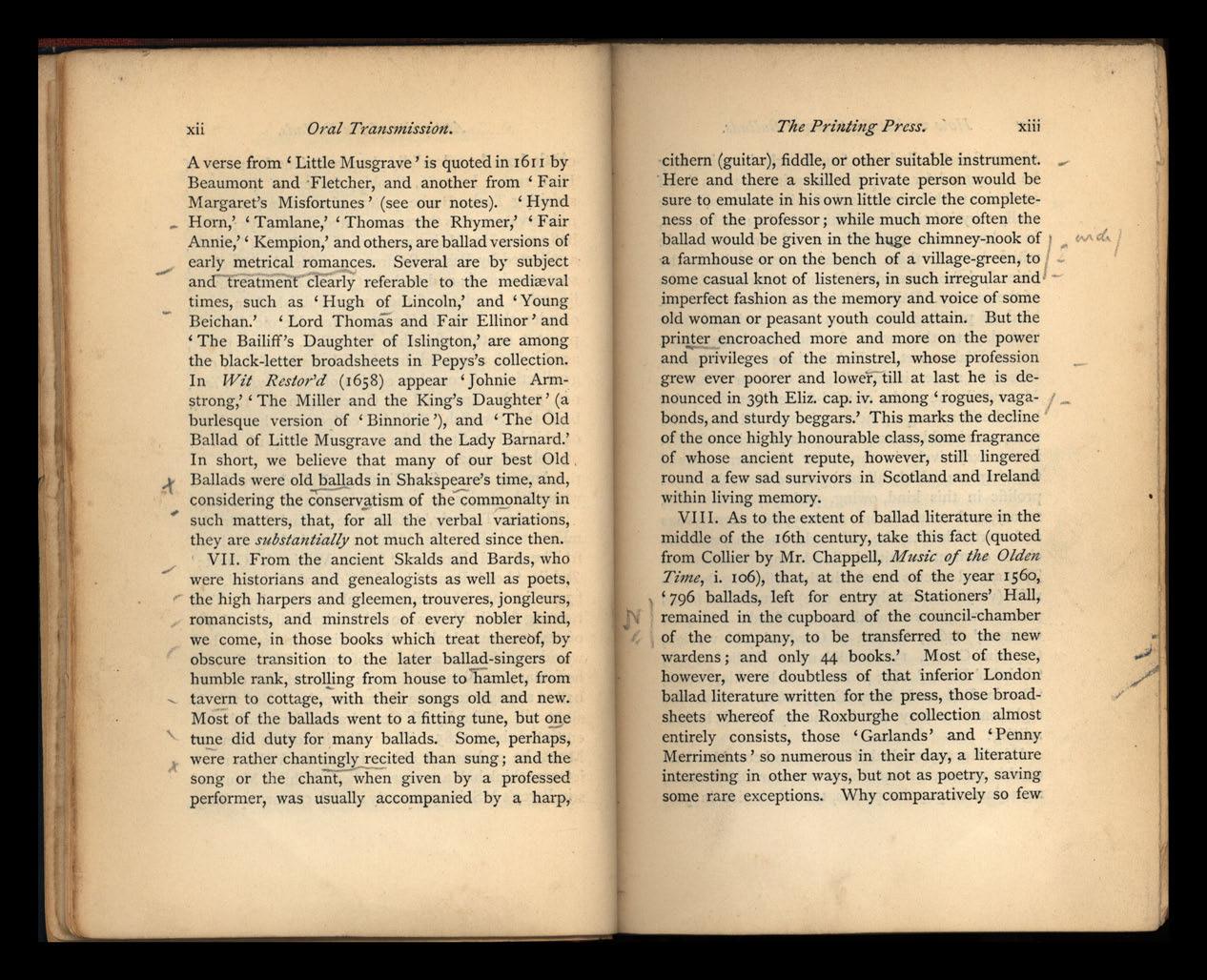
TIle Pri1ztillg Press. xiii
cithern (guitar), fiddle, or other suitable instrument. Here and there a skilled private person would be sure to emulate in his own little circle the completeness of the professor; while much more often the ballad would be given in the hl,lge chimney-nook of I W\ cl, I a farmhouse or on the bench of a village-green, to some casual knot of listeners, in such irregular and 'imperfect fashion as the memory and voice of some old woman or peasant youth could attain . But the priIUer encroached more and more on the power and privileges of the minstrel, whose profession grew ever poorer and lower,till at last he is denounced in 39th Eliz. cap. iv. among' rogues, vaga- / _ bonds, and sturdy beggars.' This marks the decline of the once highly honourable class, some fragrance of whose ancient repute, however, still lingered round a few sad survivors in Scotland and Ireland within living memory.
VIII. As to the extent of ballad literature in the. middle of the 16th century, take this fact (quoted from Collier by Mr. Chappell, Music of the Olden Time, i. 106), that, at the end of the year 1560, '796 ballads, left for entry at Stationers' Hall, remained in the cupboard of the council-chamber of the company, to be transferred to the new wardens; and only 44 books.' Most of these, however, were doubtless of that inferior London ballad literature written for the press, those broadsheets whereof the Roxburghe collection almost entirely consists, those 'Garlands' and 'Penny Merriments ' so numerous in their day, a literature interesting in other ways, but not as poetry, saving some rare exceptions. Why comparatively so few
XIV
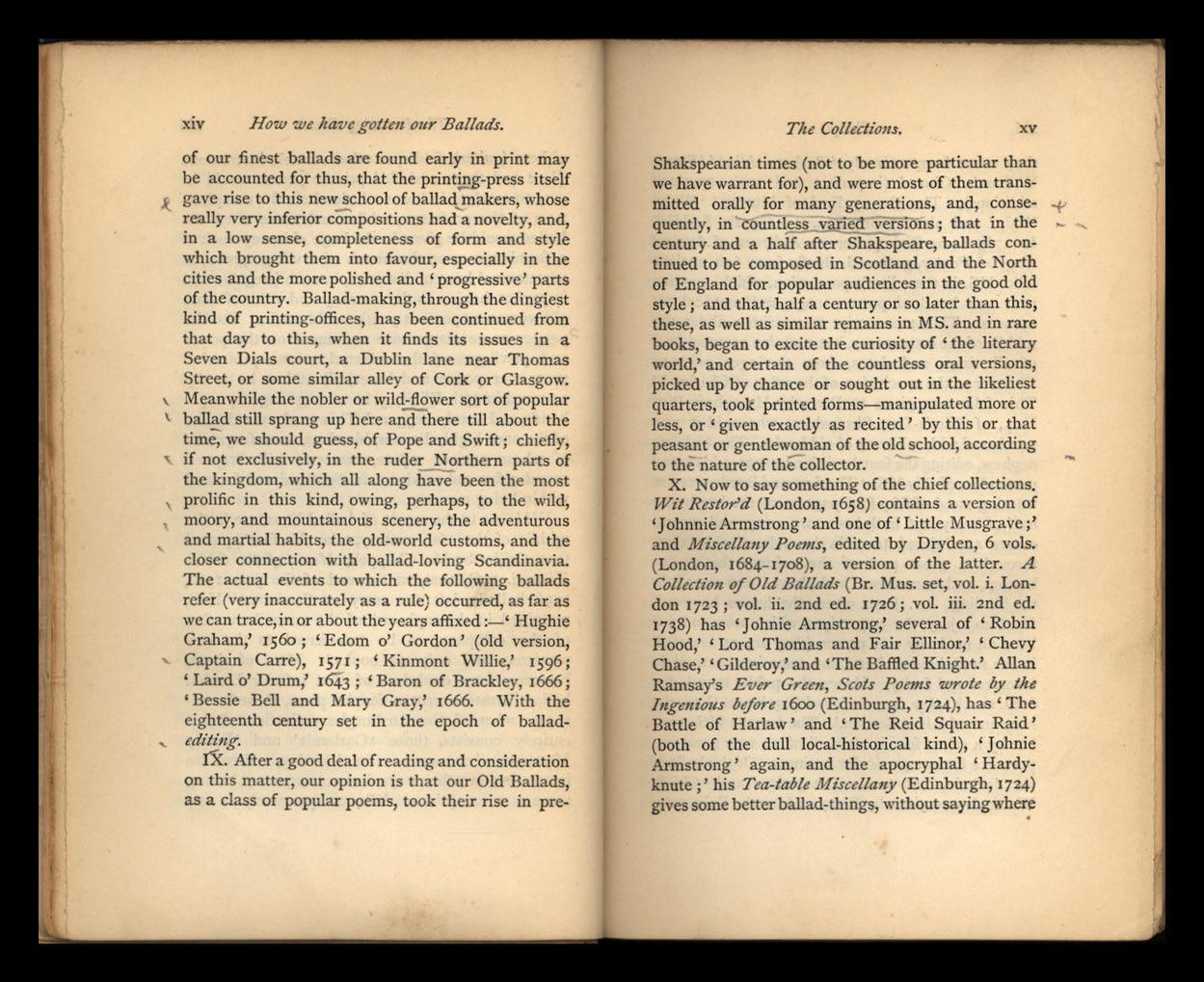
How we Ilave gottm ortr Ballads.
of our finest ballads are found early in print may be accounted for thus, that the printi£g-press itself
J:. gave rise to this new school of ballad makers, whose really very inferior compositions had a novelty, and, in a low sense, completeness of form and style which brought them into favour, especially in the cities and the more polished and' progressive' parts of the country. Ballad-making, through the dingiest kind of printing-offices, has been continued from that day to this, when it finds its issues in a Seven Dials court, a Dublin lane near Thomas Street, or some similar alley of Cork or Glasgow.
\ Meanwhile the nobler or wild-flower sort of popular \ ballad still sprang up here till about the time; we should guess, of Pope and Swift; chiefly, " if not exclusively, in the ruder Northern parts of the kingdom, which all along been the most , prolific in this kind, owing, perhaps, to the wild, • moory, and mountainous scenery, the adventurous and martial habits, the old-world customs, and the closer connection with ballad-loving Scandinavia. The actual events to which the following ballads refer (very inaccurately as a rule) occurred, as far as we can trace,in or about the years affixed :-' Hughie Graham,' 1560; 'Edom 0' Gordon' (old version, Captain Carre), 1571; 'Kinmont Willie,' 1596; , Laird 0' Drum,' 1643; 'Baron of Brackley, 1666; 'Bessie Bell and Mary Gray,' 1666. With the eighteenth century set in the epoch of balladediting.
IX. After a good deal of reading and consideration on this matter, our opinion is that our Old Ballads, as a class of popular poems, took their rise in pre-
The Collections. XV
Shakspearian times (not to be more particular than we have warrant for), and were most of them transmitted orally for many generations, and, con se- -+' quently, in countless v ried versions; that in the century and a half after Shakspeare, ballads continued to be composed in Scotland and the North of England for popular audiences in the good old style; and that, half a century or so later than this, these, as well as similar remains in MS. and rare books, began to excite the curiosity of 'the world,' and certain of the countless oral verSIOns, picked up by chance or sought out in the likeliest quarters, took printed forms-manipulated more or less, or 'given exactly as recited' by this or peasant or gentlewoman of the old school, accordmg to the nature of thecollector.
X . Now to say something of the chief collections. Wit Restor'd (London, 1658) contains a version of 'J ohnnie Armstrong' and one of' Little M usgrave ;' and Miscellmty Poems, edited by Dryden, 6 vols. (London, 1684-1708), a version of the latter. A Collection of Old Ballads (Br. Mus. set, vo!. i. London 1723; vo!. il. 2nd ed. 1726; vo!. iii. 2nd ed. I738) has 'J ohnie Armstrong,' several of 'Robin Hood,' 'Lord Thomas and Fair Ellinor,' 'Chevy Chase,' 'Gilderoy,' and 'The Baffled Knight.' Allan Ramsay's Ever Grem, Scots Poems wrote by tIle I1lgmio1ts before 1600 (Edinburgh, 1724), has' The Battle of Harlaw' and 'The Reid Squair Raid' (both of the dull local-historical kind), 'J ohnie Armstrong' again, and the apocryphal 'Hardyknute;' his Tea-table Miscellany (Edinburgh, 17 24) gives some better ballad-things, without sayingwher;
xvi Percy.
they come from-namely, 'Barbara Alian,' , Sweet William's Ghost' (imperfect and with spurious additions), 'The Bonny Earl of Murray,' 'Waly, Waly,' and also' Johny Faa, the Gypsie Laddie.' In 171?s came Bishop Percy's Reliques of A1Zdtmt English Poetry, gathered chiefly from 'an ancient folio MS. in the editors possession, which contains near two hundred poems, songs, and metrical romances. This manuscript was written about the middle of the last century, but contains compositions of all times and dates, from the ages prior to Chaucer to the conclusion of the reign of Charles 1.'
This folio was given to Percy by Humphrey Pitt, Esq., of Priors-Lee, Shropshire, who said it was purchased with a library of old books. The bishop'S nephew, editing the fourth edition in 1794, adds some particulars of this MS. 'The first and last leaves are wanting; and of fifty-four pages near the beginning half of every leaf hath been torn away, and several others are injured towards the end. Besides that, through a great part of the volume the top or bottom, and sometimes both, have been cut off in the binding.... Even where the leaves have suffered no injury, the transcripts, which seem to have been all made by one person (they are at least all in the same kind of hand) are sometimes extremely incorrect and faulty. Hence the public may judge how much they are indebted [equivocal!] to the composer of this collection.' The famous MS., seen but by a select few, is after all of no very great importance for our particular business. Of the ballads we deal in, but two-'Glasgerion' and' Childe Waters '-:-are given by Percy as from the Folio only,

Percy. xvii
though others have received insertions and corrections from that source. Four-' Lord Thomas and Fair Annet, 'The Jew's Daughter,' 'Edward, Edward,' 'Sir Patrick Spens'-arefrom MSS. 'sent from Scotland.' 'Young Waters," Gil Morice,' and' Edom 0' Gordon,' are from copies recently printed at Glasgow; and 'Little Musgrave," King John and the Abbot,' , Lord Thomas and Fair Ellinor,' , Barbara 'The Bailiff's of Islington,' , The Frohcksome Duke,' from old printed copies (em endated). For the rest, the Reliqltes consist of old poems, lyrics, and inferior ballads, some rare, some not. Speaking of his mode of dealing with his in the Folio and elsewhere, Percy says in hIS Preface: 'These old popular rhymes being many of them copied from illiterate transcripts, or the imrecitation of itinerant ballad-singers, have, as mIght be expected, been handed down to us with less care than any other writings in the world. And the old copies, whether MS. or printed, were often so defective and corrupted, that a scrupulous adherence to their wretched readings would only have exhibited unintelligible nonsense, or such poor meagre stuff as neither came from the bard nor was worthy the press; when, by a few slight corrections or additions, a most beautiful or interesting sense hath forth, and so naturally and easily, that the edItor could seldom prevail on himself to indulge the vanity of making a formal claim to the improvement; but must plead guilty to the charge of concealing his own share in the amendments, under some such general title as a" Modern Copyl' or the like.' He adds that, ' where any considerable
:lI:viii Herd-Seol!.
liberties were taken with the old copies,' three asterisks are subjoined to the poem.
In 1769 (2nd ed. 1776) appeared Herd's Allcient and Modern Seottislt Songs, Heroic Ballads, an indiscriminate gathering-no authorities givenincluding among other ballads, versions of 'Lammikin' .'The Bonny Lass of Lochryan;' 'Fine Flow:rs in the Valley , [otherwise' The Cruel Brother 'J ; , Earl Richard' [otherwise' Y Redin '] ; MayColvlD;'afragment of' Fair Annie' of' Kertonha',' [otherwise' Tarnlane,'] of' The Cruel'Mother,' and of' Helen of Kirconnell.'
Now we come to Scott's Millstrelsy of tlte SeotHsl1 + Border, the first two volumes published in the third in containing no fewer than forty ballads not published before, and among these, 'Thomas the Rhymer;' 'The Twa Corbies ; , 'The Dowie Dens 0' Yarrow' [' The Banks 0' Yarrow']; 'Brown Adam;' 'The Wife of Usher's Well;' 'Annan Water;" The Douglas Tragedy;" 'J ohnnie of Braidislec;' , Katharine Janferie ;' , Clerk Saunders;' 'The Song ofthe Outlaw Murray;" Kinmont Willie ;' , The Fray 0' Suport; , 'The Dremon Lover [' The Ship 0' the Fiend '] ; 'Lament of the Border \Vidow;' 'Willie's Lady;' a version of' Lord Randal [' Lord Ronald ']; of' Helen of Kirconnell;' and of 'Tamlane.' \Vith these, which seem to us th<! best and with some more of the same class, the Mir;strelsy includes a number of local-historical ballads (heavily loaded with antiquarian commentary), and a camp-following crowd of' Imitations.'
As to where and how Scott got those ballads and versions which were not before in print, and still more
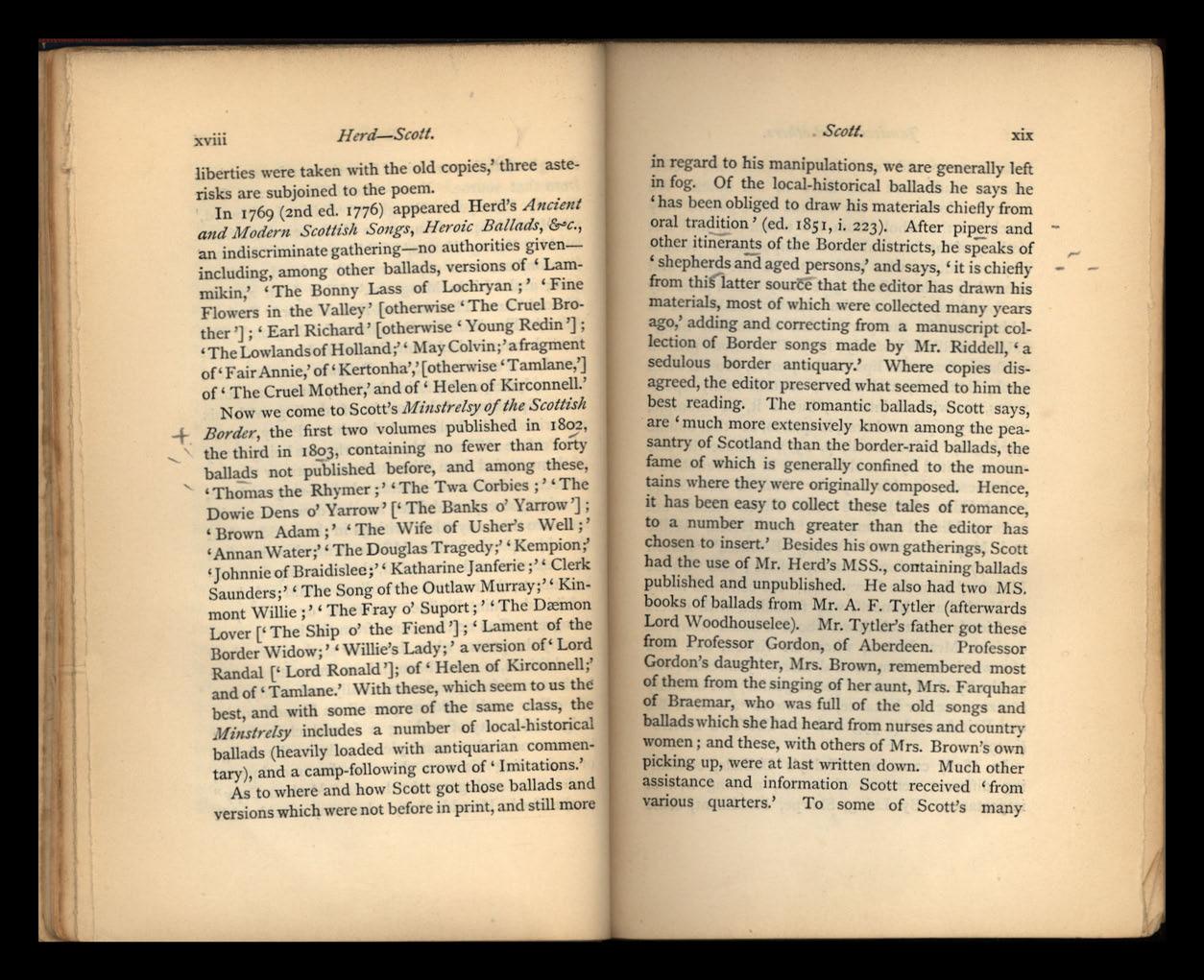
Seol!. xix
regard to his manipulations, we are generally left :n fog. Of local-historical ballads he says he has to draw his materials chiefly from oral (ed. 185 I, i. 223). After pipers and of the Border districts, he speaks of and aged persons,' and says, ' it is chiefly from t,hl latter source that the editor has drawn his matenals! most of which were collected many years addmg and correcting from a manuscript collectIOn of Border songs made by Mr. Riddell,' a sedulous border antiquary.' Where copies disagreed, editor preserved what seemed to him the best readmg. The romantic ballads Scott , ' says, are much more extensively known among the peasantry of Scotland than the border-raid ballads the of which is generally confined to the where they were originally composed. Hence, It has been easy to collect these tales of romance to a number much greater than the editor chosen to insert.' Besides his own gatherings, Scott had use of Mr. Herd's MSS., containing ballads publIshed and unpublished. He also had two MS book s of ballads from Mr. A. F. Tytler Lord Woodhouselee). Mr. Tytler's father got these from Professor Gordon, of Aberdeen. Professor Gordon's daughter, Mrs. Brown, remembered most of them from the singing of her aunt, Mrs. Farquhar of Braemar, who was full of the old songs and ballads which she had heard from nurses and country and these, with others of Mrs. Brown's own up, were at last written down . Much other and information Scott received 'from various quarters.' To some of Scott's many
xx JamiesolJ and ollurs.
arrangements and ' conjectural emendations' reference is made here and there in our notes. We have no doubt that the ballads have gained very much on the whole from his treatment, and lost nothing of the least substantial importance. A subsequent editor, who held it to be the strict and stern duty of his tribe to give every ballad precisely as found, speaks of 'the alembic established 'at Abbotsford for the purification of Ancient Song' ( Motherwell's Afinstre/sy, 131 ) Of versions printed verbatim from the lips of the people, Motherwell's book, Buchan's, and others, contain many specimens, not without interest j but is it, for example, necessary to print a horse, in quarto, as 'that bonnie apple-gray' (Motherwell, p. 237 ), because the line was so recited by , an old woman in Renfrewshire'?
J amieson, in his Popillar Ballads and Songs ( 2 vol. Edin. 1806), gave about fifteen ballads not before published (among them' Burd Helen," \Villie and May Margaret,' 'Young Beichan,' 'Alison Gross,') and versions of many others; also' Childe Maurice,' from the Percy folio. He collected many of his ballads himself, was furnished with others by friends, and took down about a dozen from the copious Mrs. Brown, whom he visited, and who afterwards sent him several more. Jamieson (who by-the-bye had a vein of poetic genius ) put in many stanzas; see, for instance, his note to 'Sweet Willie and Fair Annie' (i. 35), and to' The Twa Sisters' (i. 49).
In 1808, came out Finlay's Ballads, containing different versions of several, nothing new of importance. By Laing, Sharpe, Maidment, some
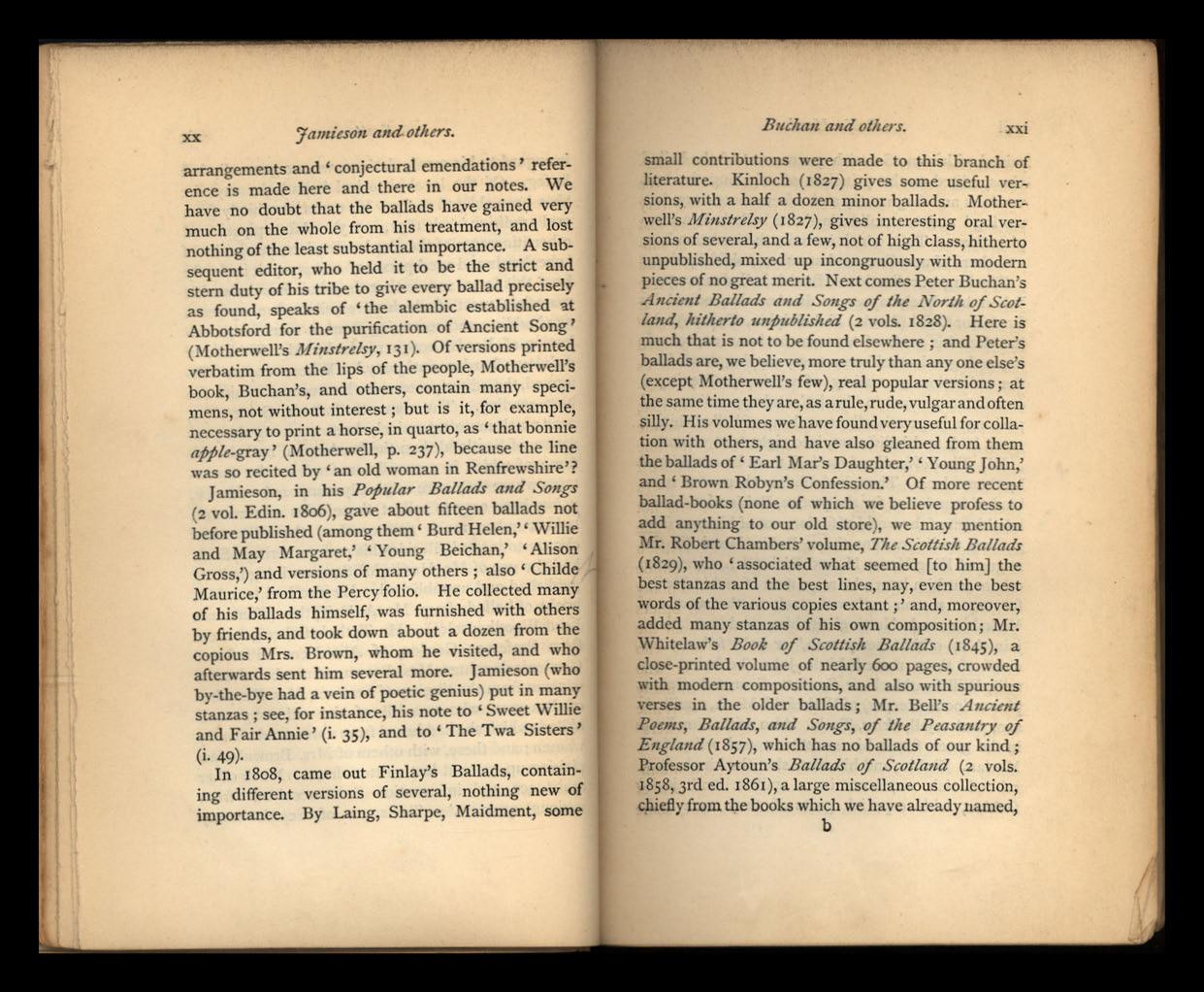
Buchan a1ld olllers. xxi
small contributions were made to this branch of literature. Kinloch (1827) gives some useful versions, with a half a dozen minor ballads. MotherMillstrelsy (1827), gives interesting oral versIons of several, and a few, not of high class hitherto unpublished, mixed up incongruously with' modern pieces of no great merit. ext comes Peter Buchan's A1lcient Ballads a11d S01lgs of the Nortlt of Scotla1ld, hitherto 1mjmblislud (2 vols. 1828) Here is much that is not to be found elsewhere; and Peter's ballads are, we believe, more truly than anyone else's (except Motherwell's few), real popular versions' at same time they are, as arule, rude, vulgar and often s!lly. volumes we have found very useful for collatIOn WIth others, and have also gleaned from them the ballads of ' Earl Mar's Daughter' , Young John ' d 'B " an rown Robyn's Confession.' Of more recent ballad-books (none of which we believe profess to add anything to our old store ), we may mention Mr. Robert Chambers' volume, Th e Scottislt Ballads ( 1829), who 'associated what seemed [to him] the best stanzas and the best lines, nay, even the best words of the various copies extant;' and, moreover, added many stanzas of his own composition; Mr. ''vnitelaw's Book of Scottislt Ballads ( 1845 ), a cl?se-pnnted volume of nearly 600 pages, crowded WIth compositions, and also with spurious verses 10 the older ballads; Mr. Bell's A1lcient Poems, Ballads, a1ld Songs, of Ihe P easa1ltry of Englalld (1857), which has no ballads of our kind' Professor Aytoun's Ballads of Scotland (2 vols: 1858, 3rd ed. 1861), a large miscellaneous collection chiefly fr.om the books which we have already l1amed' b '
XXll
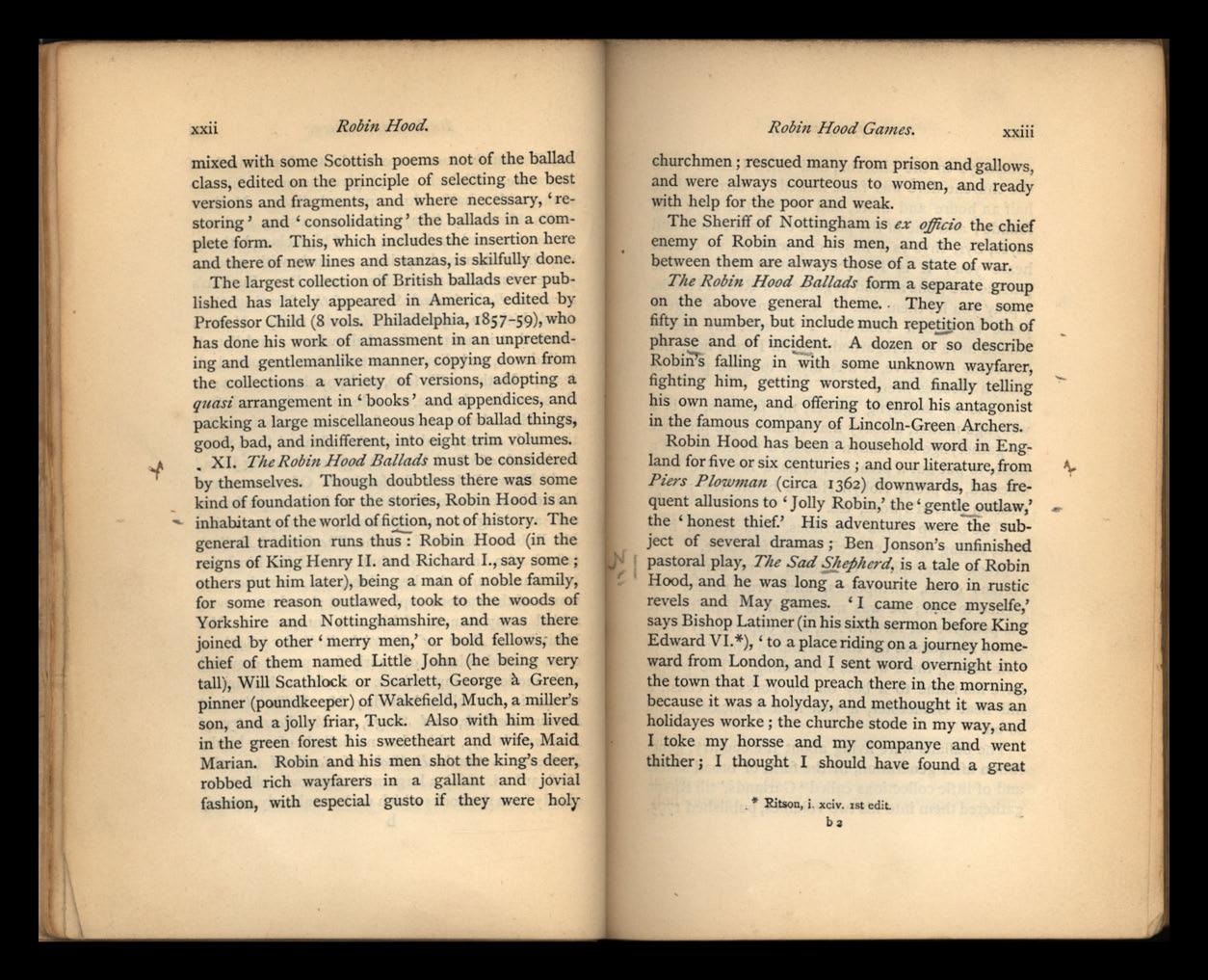
Robin Hood.
mixed with some Scottish poems not of the ballad class edited on the principle of selecting the best , , versions and fragments, and where necessary, restoring' and ' consolidating' the ballads a complete form. This, which includes the insertIOn here and there of new lines and stanzas, is skilfully done.
The largest collection of British ballads ever published has lately appeared in America, edited by Professor Child (8 vols. Philadelphia, 1857-59), who has done his work of amassment in an unpretending and gentlemanlike manner, co?ying down. from the collections a variety of verSIOns, adoptmg a quasi arrangement in ' books' and appendices,. and packing a large miscellaneous heap of ballad thmgs, good, bad, and indifferent, into eight trim • XI. Tlte Robin Hood Ballads must be considered by themselves. Though doubtless there was some kind of foundation for the stories, Robin Hood is an inhahitant of the world of fiction, not of history. The general tradition runs thu?: Robin Hood (in the reigns of King Henry I I. and Richard I., say some; others put him later), being a man of noble family, for some reason outlawed , took to the woods of Yorkshire and Nottinghamshire, and was there joined by other' merry men,' or bold fellows; the chief of them named Little John (he being very tall) Will Scathlock or Scarlett, George a Green, (poundkeeper) of Wakefield, son and a jolly friar, Tuck. Also With him lived in the green forest his sweetheart and wife, Maid Marian. Robin and his men shot the king's deer, robbed rich wayfarers in a gallant and jovial fashion, with especial gusto if they were holy
Robin Hood Games. xxiii
churchmen; rescued many from prison and gallows, and were always courteous to women, and ready with help for the poor and weak .
The Sheriff of ottingham is ex officio the chief enemy of Robin and his men, and the relations between them are always those of a state of war.
TIle Robin Hood Ballads form a separate group on the above general theme. . They are some fifty ill number, but include much repe,tiSion both of phrase and of illcident. A dozen or so describe falling in with some unknown wayfarer, fighting him, getting worsted, and finally telling his own name, and offering to enrol his antagonist in the famous company of Lincoln-Green Archers.
Robin Hood has been a household word in England for five or six centuries; and our literature, from Piers Plowma11 (circa 1362) downwards, has frequent allusions to ' Jolly Robin,' the' gentle outlaw,' the 'honest thief.' His adventures were the subject of several dramas; Ben J onson's unfinished pastoral play, TIle Sad .J!:ejJlt crd, is a tale of Robin Hood, and he was long a favourite hero ill rustic revels and May games. 'I came ol)ce myselfe,' says Bishop Latimer (in his sixth sermon before King Edward VI. iI'), ' to a place riding on a journey homeward from London, and I sent word overnight into the town that I would preach there in the morning, because it was a holyday, and methought it was an holidayes worke; the churche stode in my way, and I toke my horsse and my companye and went thither; I thought I should have found a great
. .,. RitsonJ i. xciv. 1St ediL ba
xxiv Robin Hood Fables.
companye in the churche, and when I came there the churche dore was faste locked. I tarried there half an houre and more, and at last the keye was founde; and one of the parishe commes to me, and sayes, Syr, thys ys a busye day with us, we cannot I heare you; it is ROBYN HOODES DAYE. The I parishe are gone abroad to gather for Robyn Hoode, I pray' you let them not. I was fayne there to geve place to Robyn Hoode. I thought my rochet should have been regarded, though I were not; but it woulde not serve, it was fayne to geve place to Robyn Hoodes Men.
'It is no laughyng matter, my friendes, it is a wepynge matter, a heavy matter, under the pretence for gatherynge for Robyn Hoode, a traytoure and a thefe, to put out a preacher, to have his office lesse estemed, to prefer Robyn Hoode before the mynystration of God's word,' &c.
, The bishop grows scurrilous,' says Ritson in a note, taking up the cudgels for his favourite. Mock biographies of Robin were composed; various dates, birthplaces, and 'true names' assigned to him; he was made Earl of Huntingdon, his pedigree set forth in full, and opportunity given to the antiquaries for their favourite amusement of 'winnowin g three wechts 0' naething.' The people gave his name to a bay on the Yorkshire coast, a hill near Gloucester, a well near Doncaster, and so on.
The ballads were flying about the country, generation after generation, in the form of broad sheets and of little collections called' Garlands,' till R'ftson gathered them into his two volumes, published 1795·

The Robin Hood Ballads. xxv
Industrious and irritable Joe (who described Mr. Gough of the Gentleman's Magazi1ze as 'the scurr.ilou.s editor of that degraded publicatIOn ) if. IS long and angry in defence of Robin Hood's character, and particularly admires him for robbing' clerical drones or pious locusts.'
Among the oldest of the ballads, if not the oldest 'are those connected Qnes, entitled, 'A Lytell -t Geste of Robyn Hoae,' given in this volume iri'fts old for1ll; with some slight correction of the lawless spelling (what good in spelling' high' four different ways in nine ?), and an abatement of the very swearmg that was formerly in fashion. Robm Hood and the Monk' is another of the oldest and also of the best; but it is a long ballad and we had not room for it. '
The -'!ood Ballads, taken in the lump, being full.of and often vulgar, or perhaps vulgansed style, form a disappointing book, one of whIch people buy for its name and neglect for Its sake. Each ballad had a popularity, in its own .tIme and circle; but taken together they have no VItal coherency or continuity, and form a chance bundle, ticketed 'Robin Hood,' not, as one might hope fron: the usual way of talking, a series with some movement and unity, a kind of rude ballad-hIstory.
,* of Bishop version of' Robin Hood and Guy of Glsborne, exclaIms, How:1I1 editor . can justify s,uch, wanton, and, even injUdicious alterations in the pubof an anCient poem 15 beyond the conception of a person not habItuated to re liberties It of this nature, nor destitute of all manner of regard for truth and probity' (RoIJinHood, vol. ii. at end ) Furious Joc, by·the-bye, 'hisself,' if he took no liberties, made many a blunder
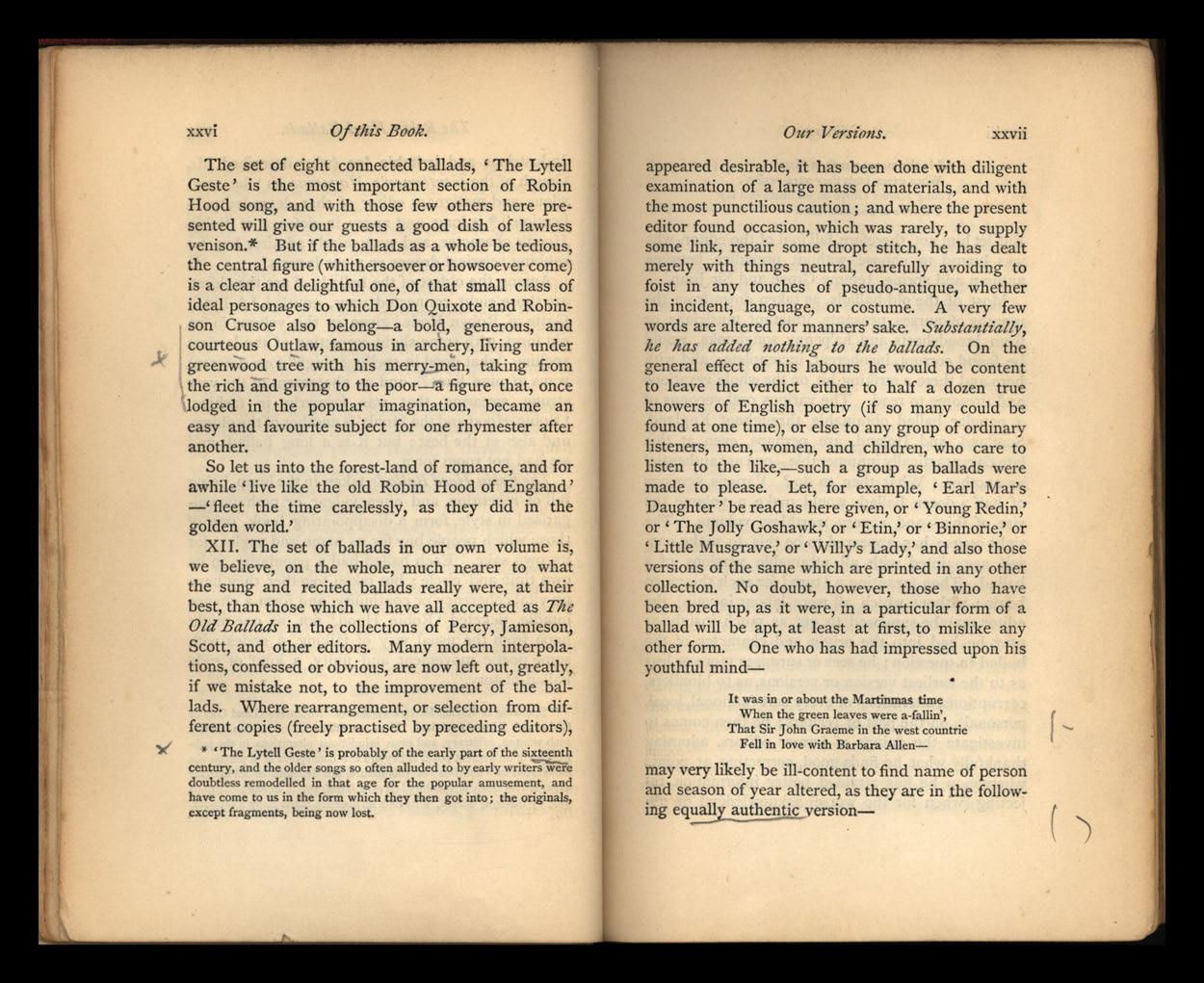
xxvi Oftltis Book.
T he set of eight connected ballads, 'The Lytell Geste' is t he most important section of Robin Hood song, and with those few others here presented will give our guests a good dish of lawless venison." But if the ballads as a whole be tedious, the central figure (whithersoever or howsoever come) is a clear and delightful one, of that small class of ideal personages to which Don Quixote and Robinson Crusoe also belong-a bold, generous, and courteous Outlaw, famous in archery, lIving under greenWOod tree with his taking from i the rich and giving to the poor-a figure that, once lodged in the popular imagination, became an easy and favourite subject for one rhymester after another.
So let us into the forest-land of romance, and for awhile 'live like the old Robin Hood of England' -' fleet the time carelessly, as they did in the golden world.'
XII . The set of ballads in our own volume is, we believe, on the whole, much nearer to what the sung and recited ballads really were, at their best, than those which we have all accepted as The Old Ballads in the collections of Percy, Jamieson, Scott, and other editors. Many modern interpolations, confessed or obvious, are now left out, greatly, if we mistake not, to the improvement of the ballads. Where rearrangement, or selection from different copies (freely practised by preceding editors), 'It! .. 'The Lytell Geste' is probably of the early part of the sixteenth century, and the older songs so often alluded to by early doubtless remodelled in that age for the popular amusement, and have come to us in the form which they then got into; the originals, except fragments, being now lost.
Our Versions. xxvii appeared desirable, it has been done with diligent examination of a large mass of materials, and with the most punctilious caution; and where the present editor found occasion, which was rarely, to supply some link, repair some dropt stitch, he has dealt merely with things neutral, carefully avoiding to foist in any touches of pseudo-antique, whether in incident, language, or costume. A very few words are altered for manners' sake. Substalltially, he Ilas added 1totht"1lg to the ballads. On the general effect of his labours he would be content to leave the verdict either to half a dozen true knowers of English poetry (if so many could be found at one time), or else to any group of ordinary listeners, men, women, and children, who care to listen to the like,-such a group as ballads were made to please. Let, for example, 'Earl Mar's Daughter' be read as here given, or ' Young Redin,' or' The Jolly Goshawk,' or 'Etin,' or' Binnorie,' or , Little Musgrave,' or' Willy's Lady,' and also those versions of the same which are printed in any other collection. No doubt, however, those who have been bred up, as it were, in a particular form of a ballad will be apt, at least at first, to mislike any other form. One who has had impressed upon his youthful mind-
It was in or about the Martinrnas time When the green leaves were a-fallin', ( That Sir John Graeme in the west countrie ........ Fell in love with Barbara AlIen-
may very likely be ill-content to find name of person and season of year altered, as they are in the following version- ( ')
All in the merry month of May, \Vhe n green buds they were swellin', Young Jemmy Grove on his death·bed Jay
For love of Barbara Alien.
But let him not, therefore, fall foul of the editor, who was bound to choose without prejudice between autumn and spring, Jemmy Grove and Sir John.
Most of the old ballads, as taken down from the mouths of nurses, peasants, itinera!!t musicians, or from broadsheets and a'penny songbooks, would be found corrupt, incoherent, incomplete; and with here and there a striking bit, on the whole vexatious and tiresome to read. The various of a popular ballad obtainable throughout England, Scotland, and Ireland, are perhaps, even at late cay, practically innumerabl e-one as' authentIc' as another. What then to do? Various versions of half a dozen ballads would make a volume the size of this-and a very worthless volume. The right course has appeared to be this, to make ones elf acquainted with all attain a ble versions of a baJIad. Then (g ranting a ' turn' for such things , to begin; without which all were labour in the editor may be supposed to get as much mSlght as may be had into the origin and character of the ballad in question; he sees or surmises more or less as to the earliest version or versions, as to blu nders, corruptions, alterations of every sort (natiollal, personal) , on the part of reciters; he then comes to investigate the doings of former editors, adopting thankfully what he finds good, correcting at points where upon he has attained better information, rejecting (when for the worse ) acknowledged or oJ>..
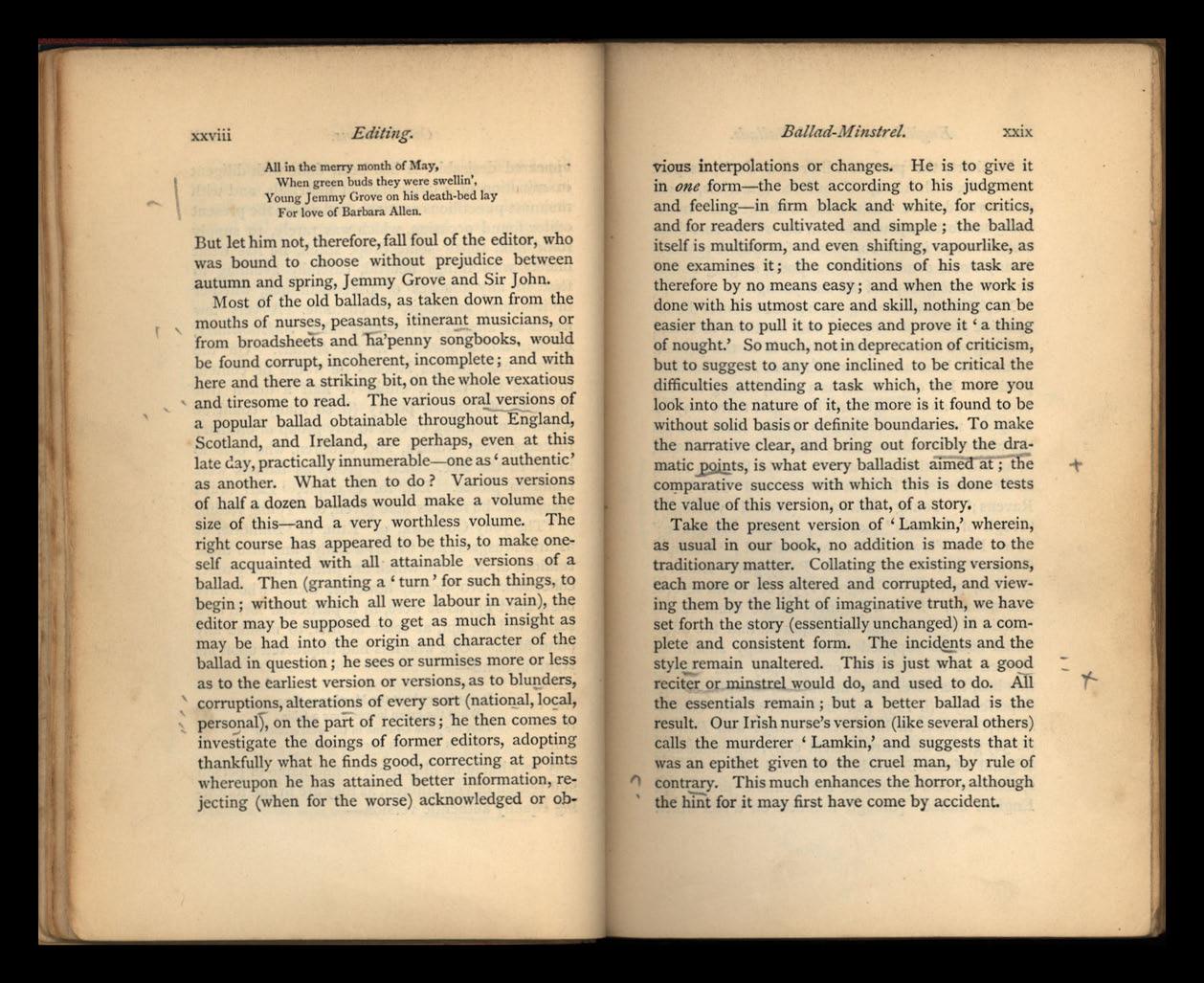
vious interpolations or changes. He is to give it in one form-the best according to his judgment and feeling-in firm black and' white, for critics, and for readers cultivated and simple; the ballad itself is multiform, and even shifting, vapourlike, as one examines it; the conditions of his task are therefore by no means easy; and when the work is done with his utmost care and skill, nothing can be easier than to pull it to piec es and prove it ' a thing of nought.' So much, not in deprecation of criticism, but to suggest to anyone inclined to be critical the difficulties attending a task which, the more you look into the nature of it, the more is it found to be without solid basis or definite boundaries. To make the narrative clear, and bring out forcibly the dramatic is what every balladist aune at; the success with which this is done tests the value of this version, or that, of a story.
Take the present version of 'Lamkin,' wherein, as usual in our book, no addition is made to the traditionary matter. Collating the existing versions, each more or less altered and corrupted, and viewing them by the light of imaginative truth, we have set forth the story (essentially unchanged) in a complete and consistent form. The and the style remain unaltered. This is just what a reciter or minstrel would do, and used to do. All the essentials remain; but a better baJIad is the result. Our Irish nurse's version (like several others) calls the murderer ' Lamkin,' and suggests that it was an epithet given to the cruel man, by rule of contrary. This much enhances the horror, although • the hint for it may first have come by accident.
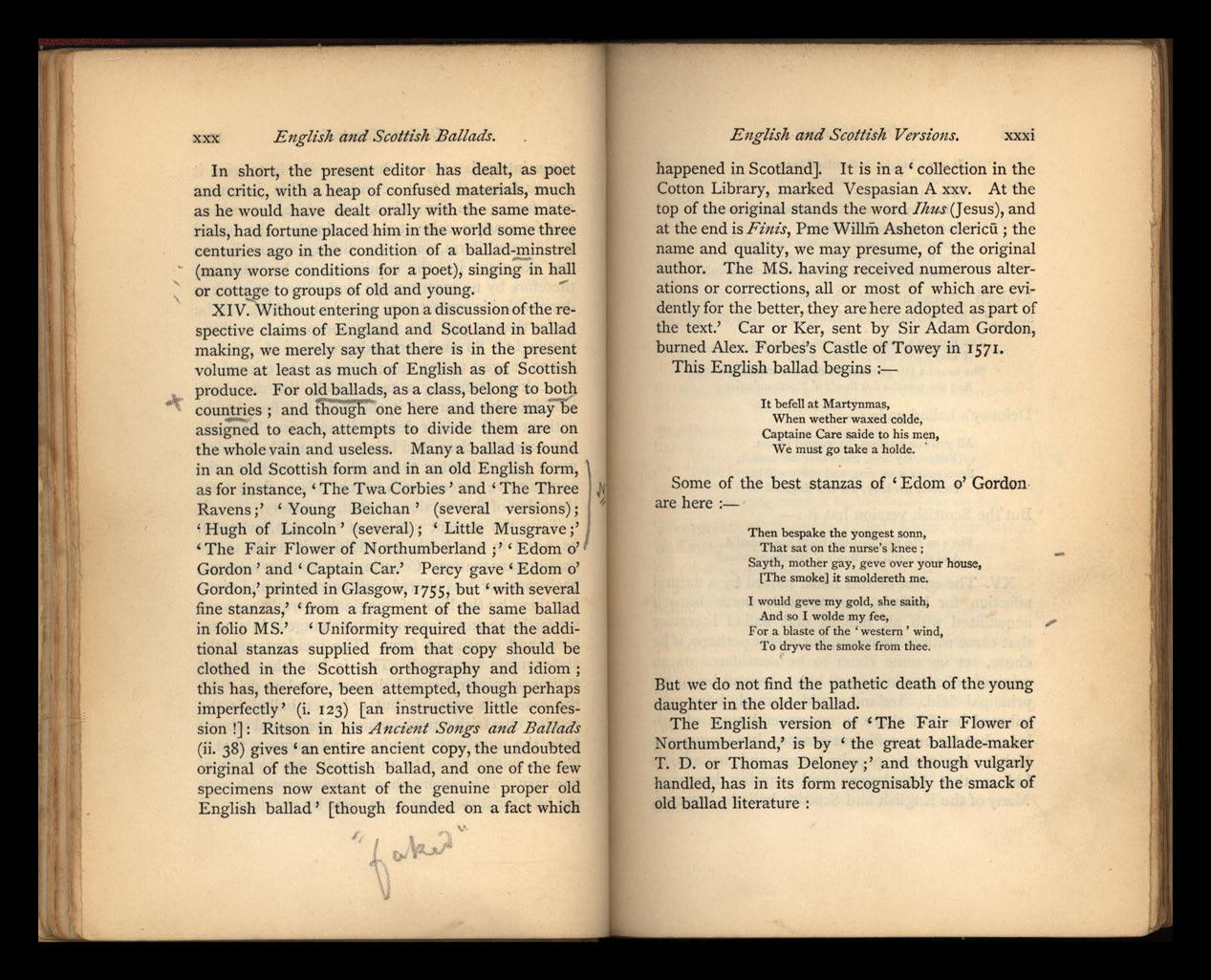
xxx EngHslt and Scottish Ballads.
In short, the present editor has dealt, as poet and critic, with a heap of confused materials, much as he would have dealt orally with the same materials, had fortune placed him in the world some three centuries ago in the condition of a , (many worse conditions for a poet), singing in hall or cottage to groups of old and young.XIV:-\;vithout entering upon a discussion of the respective claims of England and Scotland in ballad making, we merely say that there is in the present volume at least as much of English as of Scottish produce. For old ballads, as a class, belong to both countries; and thOiighone here and there maybe to each, attempts to divide them are on the whole vain and useless. Many a ballad is found in an old Scottish form and in an old English form, ) as for instance, 'The Twa Corbies ' and' The Three J'I. Ravens;' 'Young Beichan' (several versions); 'Hugh of Lincoln' (several); 'Little Musgrave;' J 'The Fair Flower of Northumberland;' , Edom 0' Gordon ' and' Captain Car.' Percy gave' Edom 0' Gordon,' printed in Glasgow, 1755, but' with several fine stanzas,' 'from a fragment of the same ballad in folio MS.' 'Uniformity required that the additional stanzas supplied from that copy should be clothed in the Scottish orthography and idiom; this has, therefore, been attempted, though perhaps imperfectly' (i. 123) [an instructive little confession !]; Ritson in his Andmt Songs and Ballads (ii. 38) gives' an entire ancient copy, the undoubted original of the Scottish ballad, and one of the few specimens now extant of the genuine proper old English ballad' [though founded on a fact which I
English and Scottislt Versions. xxxi happened in Scotland]. It is in a' collection in the Cotton Library, marked Vespasian A xxv. At the top of the original stands the word Ilms (J esus), and at the end is Finis, Pme Willm Asheton clericii ; the name and quality, we may presume, of the original author. The MS. having received numerous alterations or corrections, all or most of which are evidently for the better, they are here adopted as part of the text.' Car or Ker, sent by Sir Adam Gordon, burned Alex. Forbes's Castle of Towey in 1571.
This English ballad begins ;-
It befell at Martynmas,
When wether waxed colde, Captaine Care saide to his men, We must go take a holde.
Some of the best stanzas of 'Edom 0' Gordon · are here ;-
Then bespake the yongest sonn, That sat on the nurse 's knee; Sayth, mother gay, geve over your house, [The smoke] it smoldereth me.
I would geve my gold, she saith, And so I wolde my fee, For a blaste of the' western' wind, To dryve the smoke from thee.
But we do not find the pathetic death of the young daughter in the older ballad.
The English version of 'The Fair Flower of Northumberland,' is by 'the great ballade-maker T. D. or Thomas Deloney;' and though vulgarly handled, has in its form recognisably the smack of old ballad literature ;
«xxii Irisk Versiolls.
It was a knight, in Scotland born (Follow, my love, come over the stra1tt/), Was taken prisoner and left forlorn, Even by the good Earl of Northumberland.
And as in sorrow thus he lay, (Follow, my love, come over tlte stra1UI),
The Earl's sweet daughter walks that way, And she's the fair flower of Northumberland.
Kinloch gives a Scottish version .of the same story, ' The Provost's Dochter,' with this burden :-
The Provost's dochter went out a walking,
A may's lwe wltiles is easy won;
She heard a fair prisoner making her meane [moan], And she was the fair flow ' r 0' Northumberland
Deloney's ballad ends :-
All you fair maidens, be warned by mc, (Follow, my love, come over the strand ), Scots never were truc, and never will bc, To lord, nor lady, nor fair England.'
But the Scottish version has it :-
She's na the first that the Scots hae beguil'd, And she's still the Row'r 0' Northumberland.
XV. The editor of this book, moved by a natural affection for ballads, has not only made himself acquainted with all ballads and ballad literature that came within his reach, but might perhaps, if he chose, set up some claim to be considered as an original collector in a small way-Ireland being his principal field. Ireland would certainly have contributed her full share to our general store of ballads, but for one sufficient reason-her tongue was Keltic; her native popular songs and ballads lie hid in that little-known and expiring language. Many of the English and Scottish ballads, however,
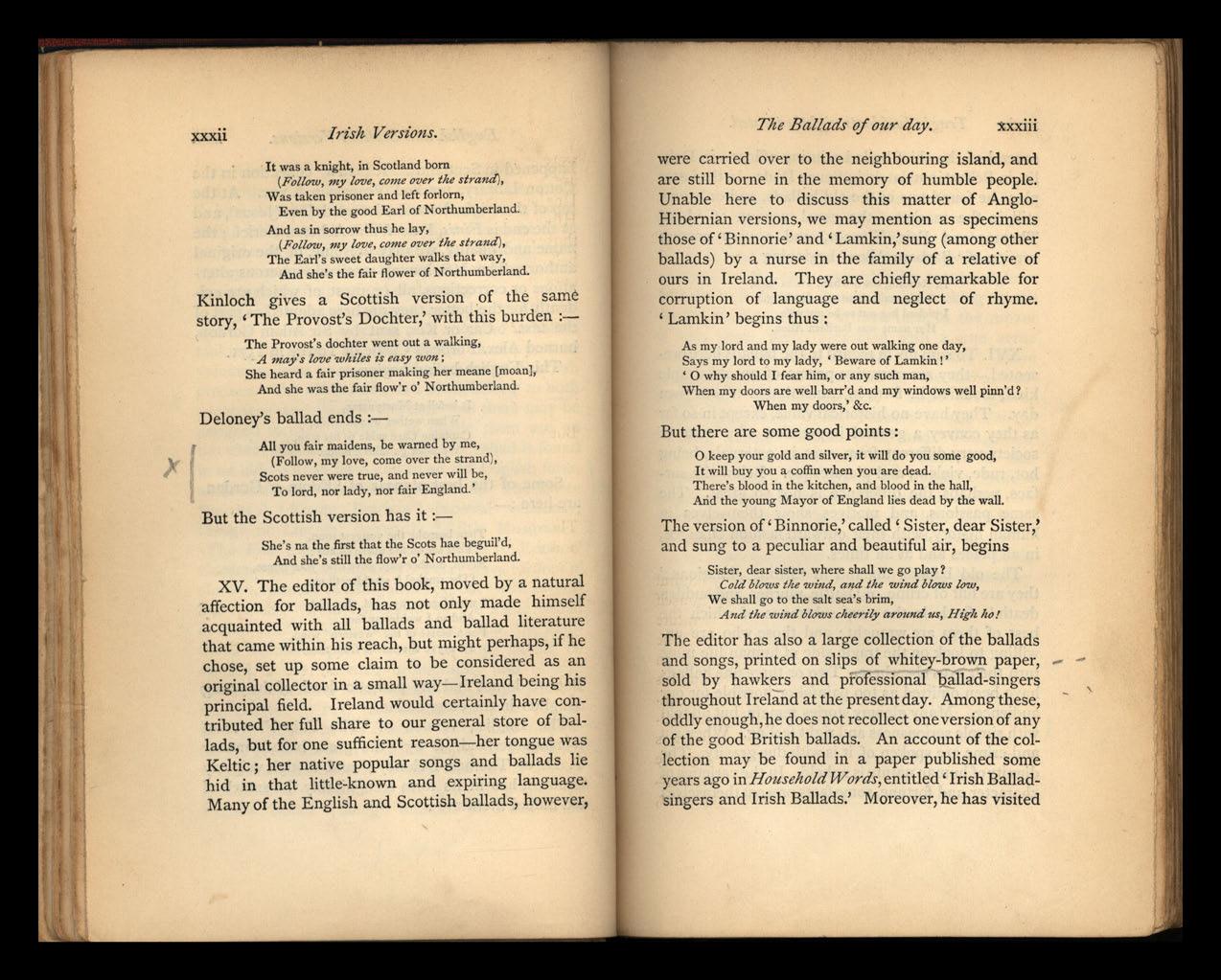
TIle Ballads of our day. ltxxiii
were carried over to the neighbouring island, and are still borne in the memory of humble people. Unable here to discuss this matter of AngloHibernian versions, we may mention as specimens those of'Binnorie' and' Lamkin,'sung (among other ballads) by a nurse in the family of a relative of ours in Ireland, They are chiefly remarkable for corruption of language and neglect of rhyme.
'Lamkin' begins thus:
As my lord and my lady were out walking one day, Says my lord to my lady, , Beware of Lamkin! J , 0 why should I fear him, or any such man, 'Vhen my doors are well barr'd and my windows well pinn'd?
When my doors,' &c.
But there are some good points:
o keep your gold and silver, it will do you some good, It will buy you a coffin when you are dead.
There's blood in the kitchen, and blood in the hall, Arid the young Mayor of England lies dead by the wall.
The version of' Binnorie,' called' Sister, dear Sister,' and sung to a peculiar and beautiful air, begins
Sister, dear sister, where shall we go play?
Cold blows the wi1ld, a1td tI,e willd blows low,
We shall go to the salt sea's brim,
A 1ui the wbtd blows cheerily 4t'otl1ld 1IS, Riglt ho!
The editor has also a large collection of the ballads and songs, printed on slips of whitey-brown paper, _sold by and pfofessional b,ellad-singers throughout Ireland at the present day. Among these, oddly enough, he does not recollect one version of any of the good British ballads, An account of the collection may be found in a paper published some years ago in Household Words, entitled' Irish Balladsingers and Irish Ballads.' Moreover, he has visited
xxxi,,· Tragic Incidents rightly treated.
several of the chief ballad printing-offices-in Dub-· lin, in Belfast, and lately in Seven Dials. In the latter place he found two of the old ballads, and only two, still in the market - the usual version of 'Lord Thomas and Fair Eleanor,' and a very corrupt version of ' Barbara Alien,' beginning
In Reading town where I was born, A fair maid there was dwelling, I picked her out to be my wife, Her name was Barbara Alien.
XVI. To sum up, in regard to the ballads here presented,-they are narrative poems of an old simple kind, modified in form in transmission to Ollr own day. They have no historical value, except in so far as they convey a general impression of a state of society very different from ours in externals, being , \ \, hot rude, violent, and picturesque. Below the surperhaps, the difference is not so great. The same passions and motives show themselves in human history, with their outward fashion changed, in all places and at all times.
The old ballads abound in 'strong situations;' '- they are full of crime, of ' battle, murder, lilid sudden creath.' Such ili the very substance of which the best of them are wrought; and those who are unwilling to look on the tragic side of human life must turn their eyes elsewhere. Two or three fine ballads have been omitted as too painful or horrible for our audience. Many gloomy stories remain, but all told .... \ with simple s iousness and right feeling. When sin and crime are spoken of, it is with due gravity. The dignity of human nature is upheld. In the varieties of character and fortune, some facts present themselves
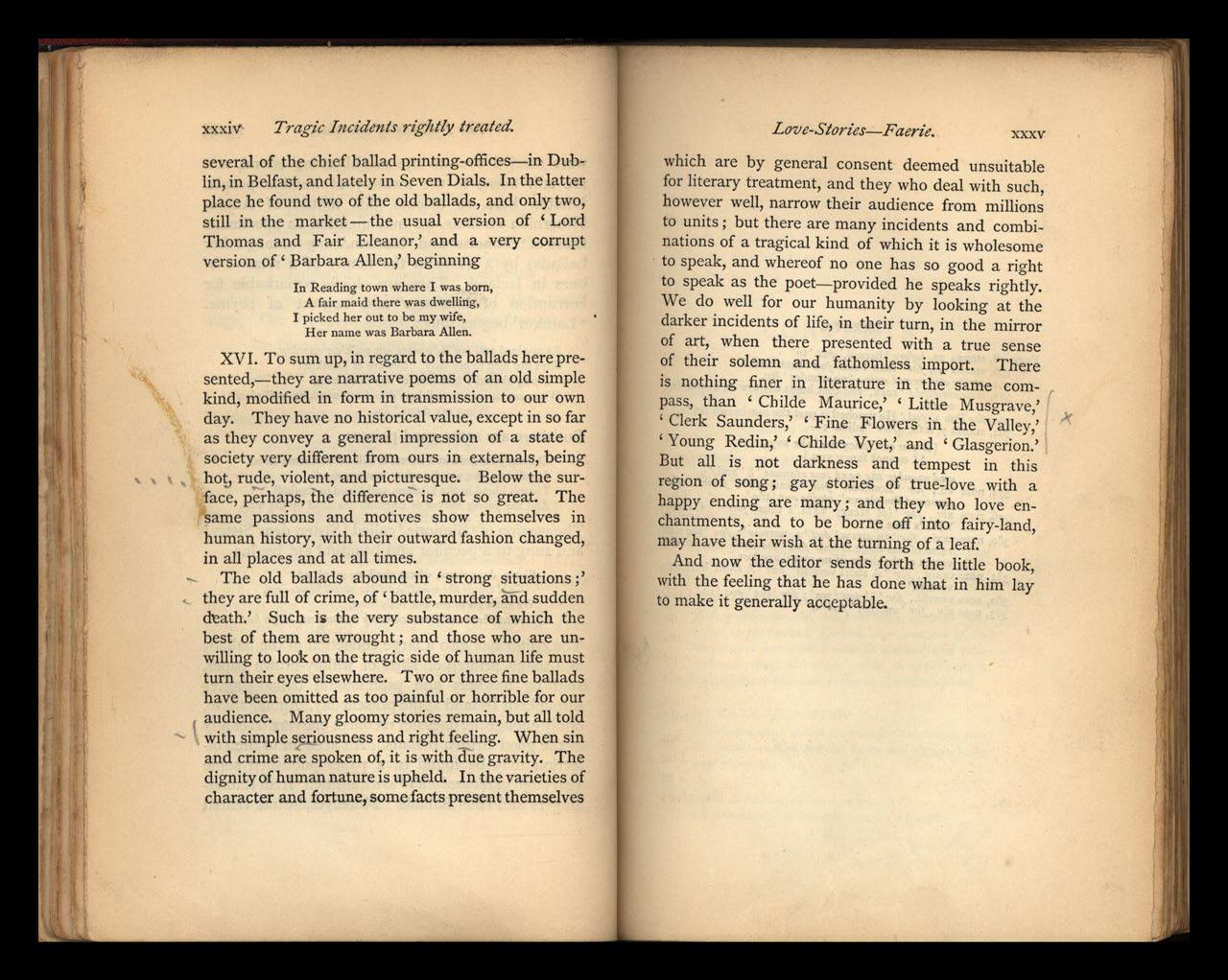
Love-Stories-Faerie. xxxv
which are by general consent deemed unsuitable for literary treatment, and they who deal with sllch, however well, narrow their audience from millions to units; but there are many incidents and combinations of a tragical kind of which it is wholesome to speak, and whereof no one has so good a right to speak as the poet-provided he speaks rightly. We do well for our humanity by looking at the darker incidents of life, in their turn, in the mirror of art, when there presented with a true sense of their solemn and fathomless import. There is nothing finer in literature in the same com- r pass, than 'Childe Maurice,' 'Little Musgrave,' , Clerk Saunders,' 'Fine Flowers in the Valley,' 'Young Redin,' , Childe Vyet,' and' Glasgerion.'
But all is not darkness and tempest in this region of song; gay stories o£ true-love with a happy ending are many; and they who love enchantments, and to be borne off into fairy-land, may have their wish at the turning of a leaf.
And now the editor sends forth the little book, with the feeling that he has done what in him lay to make it generally ac<;eptable.
ERRATA.
Page 18, stanza 27, 'hersell,' I '
166, stanza ,.0, for than I put t ,t& see.
I I strike out ucond note- no wonder c. . . note omitted: C rock,' rod that holds the tow on a spmnmgwheel. b b'd'
330 ,/or line 3, put' He it past the nut- rown n e,
3640 stanza 7, add, after adieu ;-
[If you can fancy me,' she says, • I cannot fancy you.l and number the flext two sta1lztU ' 8 ' and 'g.' I
374, note vii., for' Londoun' 'Lou?oun,'; from other names of the places' strt'ke out the ,
376 note xiv., for • (of Henry VII!.'s time) put (of Henry , VII!.'s time I)' , fi • h . h xxxi for' an arrow' put I a narrow ; or t e 51Xt
380 , Dote of the dirge is lost.' put ' the and seventh verses of the dirge (if no more) are lost.
381 , note x.xxiy., .(or 'A short version' put A short burlesque versl.<?!l fi • It 'we" fior 'me' put' us'
382, note XXXVlll., or ,.. (,'
383, note xlv.,for 'another' put a
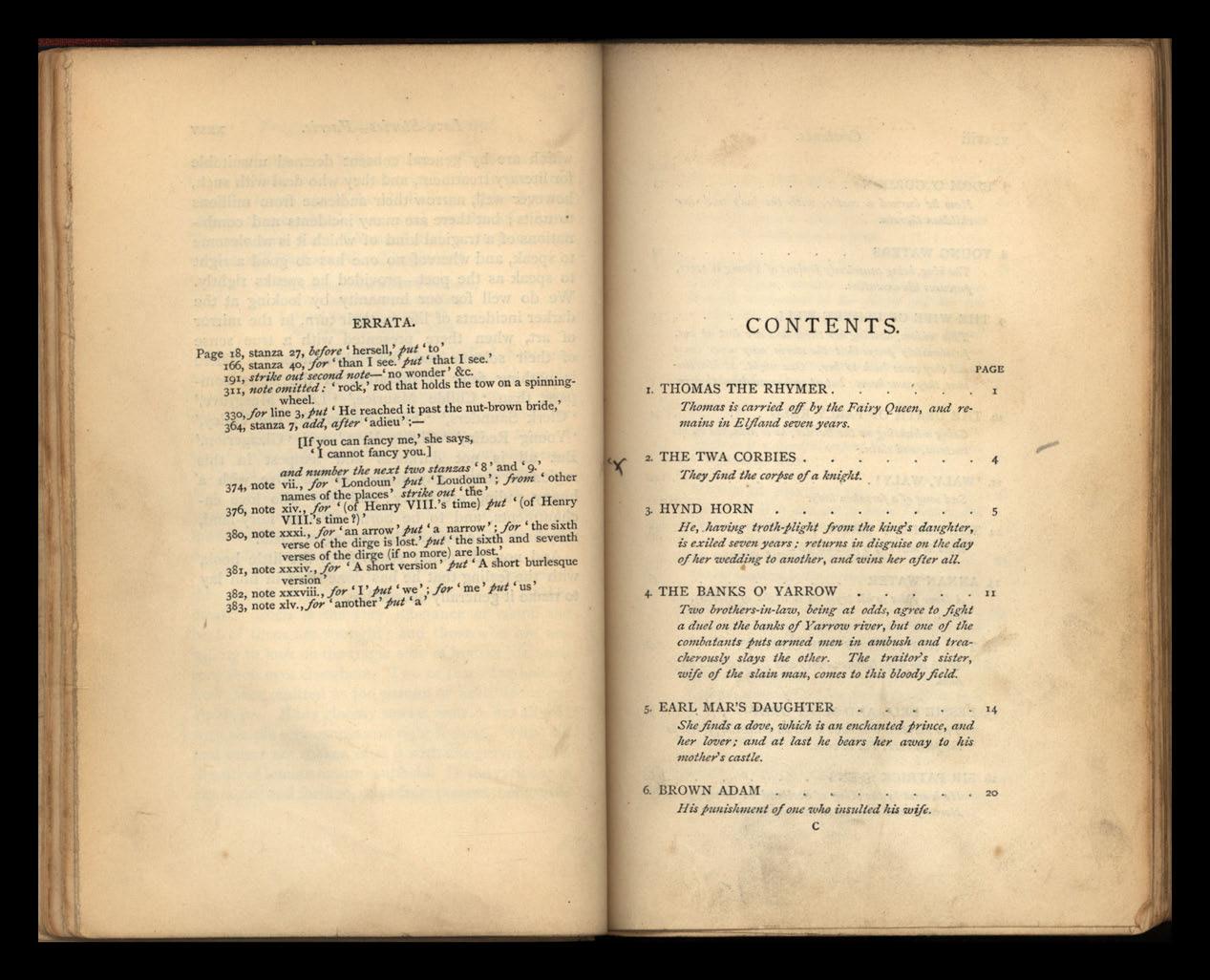
I THOMAS THE RHYMER.
Tlzomas is carried off by tI,e Fairy Qucen, Ilnd remaills ill, E /fill1ui seve!: years.
2. THE TWA CORBIES . 4 Tluy fi1ld till! corpse 0/" l""i"l,t.
3. HYND HORN
He, "avb,/[ trot"'pli/[I,t from lIte killg's datl/[kter, is exiled seven years: returns ill, disg-u.ise OIL the day of Iter wetidlilg to allotlter, and wiltS Iter afler all.
4 THE BANKS 0' YARROW II
Two hrotleers-zit-law, oezilg at odds , agree to figltt a duel OIl tIll! banks of Yarnnv river, hut olle of tlte combatants puts armed 1IlCI/. ill, ambus'" (llld treadzerous!y slays lite otlte r The fraUoys sister, wife of tlu slai" "La", COli'" to tMs bloody field.
5. EARL MAR'S DAUGHTER
Shefillds a dove, wlr.ic1t is alt cllc!taltled prince, and her lover,' and at last l,e hears leer away to Ius 11lotlter's castle. 14
6. BROWN ADAM • 20
His punishment of OIlC 'wlU) insulted /tU wi}i!. C
xxxviii
7. EDOM 0' GORDON COlltt!1ltS.
How Ite ou,.,..d a castle, witl, tlu lady aud IID' childrm tltere",-
23

8. YOUNG WATERS
TIte king, beingcauulessly jealO1,. 0/ Y O1mg IVatn-s, prOCtlres ltis ..
9- THE WIFE OF USHER'S WELL 3[
TAis widow, Maring- her three SOIlS are lost at sea, passUmauly frays t!tat tlte sturln mny nnNr cease till tkey CtmU hac" to Iter. On' ",gM, at Alartin.mas, tkey come I,tmU ; Imt at CiK"·crOW depart agam.
10. THE DEATH OF PARCY REED . 34
Comg a-hutlting on tlte Border, lu is attacked by his menties, and slain.
[I. 'WALY, WALY' . 4[
Sad SOllg 0/aforsakm lady.
[2. THE LAIRD 0' DRUM ·43
How Ite marries a peasallt girl
[J. ANNAN WATER
A towr rides to his tryst all a "iglrt of sturlll muJ flood.
,+ THE HUNTING OF THE CHEVIOT 4B Witl, tlu fiP,t betwem Pn-cy muJ Douglas and tluir men.
's- BESSIE BELL AND MARY GRAY 59
Two maidms who ouilt a I",t all a hill-side, to escape "14 /net ill. flaill.
,6. SIR PATRICK SPE S 60
He is smt by tire King 0/ ScatlNuJ on a voyage 10 Norway, and wrecked "" "is way IuJUII.
JOHN AND THE ABBOT OF CANTER-
TIte Killg poses tlte A6601 .uilh three questiD,u, but tire A660fs Slu)l_d solves litem
18 THE DOUGLAS TRAGEDY
Lord Willialn, stealing away Lady Margaret Douglas, is jursued by lrer father and her two orollters, witl, wlw", lu fights, a,uJ lea'lles lite", lymg ":ad or sore wounded. Bul Lord I,imsdf u !turt, and no StJ01l.rr rains his mo/kT's /u"ut! tJuz". Ite lies down 10 die, and before lite ",aming his lad¥ also is dead.
KEMPION
A/air MaUUlt kbtg tratufornll!d hy a Sorceress i'llo IIu s!tape 0/ a dreadful serjent, is released by three kissesfrom Iter lowr. !lO. JOHNNIE OF BRAIDISLEE
A -/nmttilg', he is attacked by SCTJen Forester; carried !tome dead to kis mother. '
21. THE BIRTH OF ROBIN HOOD . .80
Howlte was 60rn m tlte pun.wood.
22. FAIR ANNIE 83
How sIze wasforced to 'lUe!col1u a 'U!'lU bride to Itn' lord's castle; yet alllta)je1ted well at last.
2J. CHILDE MAURICE .
He s"uis a _ ..ago to 701.,. Stewarfs wife 10 ",ut him in lite wood; bul l!ritlter goes 701." Slewart !rimseif and slays Childe Jlfaurice ,hrougl.jealousy, not kllowing I,.t"m to be 't'n tnJt/z tlu Indy's'oll,ly S01/'.
'+ BROWN ROBYN'S CONFESSION • . .
HtrdJ it saved him, t!wtlghwicked, wlte" t"rown inlo th ese4. C 2
xl COllttllts
2S. THE JOLLY GOSHAWK.
TIti! bira brings " love·leller to tlu maiden: who /eigllillg death., hy a steeping drallgl1t, is carried to tlte four!lt kirk if: Scotland, aud tlurt met and t'tSclled by Iter lover rAGE.
26. ALISON GROSS.
A 1uickrd old Witch tllrn' a YOII/I, into a .erpent, nI,d M is relClOud by tl" of tM Fair'....
'7. JOHNNIE ARMSTRONG
Beillg a "oied Border Freebooter, he is summoned 0)' the Killg to Edi,wurgh, alld tkere trenel"ro"sly slab:, witl, I,ls mell.
• 8. KATHARINE JANFARIE
011, tlt.e weddillg-day, !uy Scot/is/1. llJ1Jer carries Iter 0./1.from her E"glisl, bridegroom.
'9. ROBIN HOOD RESCUING THE WIDOW'S
THREE SONS
Aboul to-be k""grd at Nottingham, ""y are rescued by Robin Hood, disguised as a beggarman.
30. FAIR ANNIE OF LOCHROYAN
Sailing 1o Iter love Lord Gregoryls castle, Ins motller, with. fa/se words, rifuus to admit wlzerettpon reimbarkblg, site is drowned.
31 A LYKE-WAKE DIRGE.
A" old .ong, fit to be nmg ill watching the dead.
32. ETlN THE FORESTER
Lady Margaret, after /ivt'ng seven years ill. lIte forest, is again. recet'ved by her father, and her Ims&l1Id and e/tildren are lak", into I,is favour.
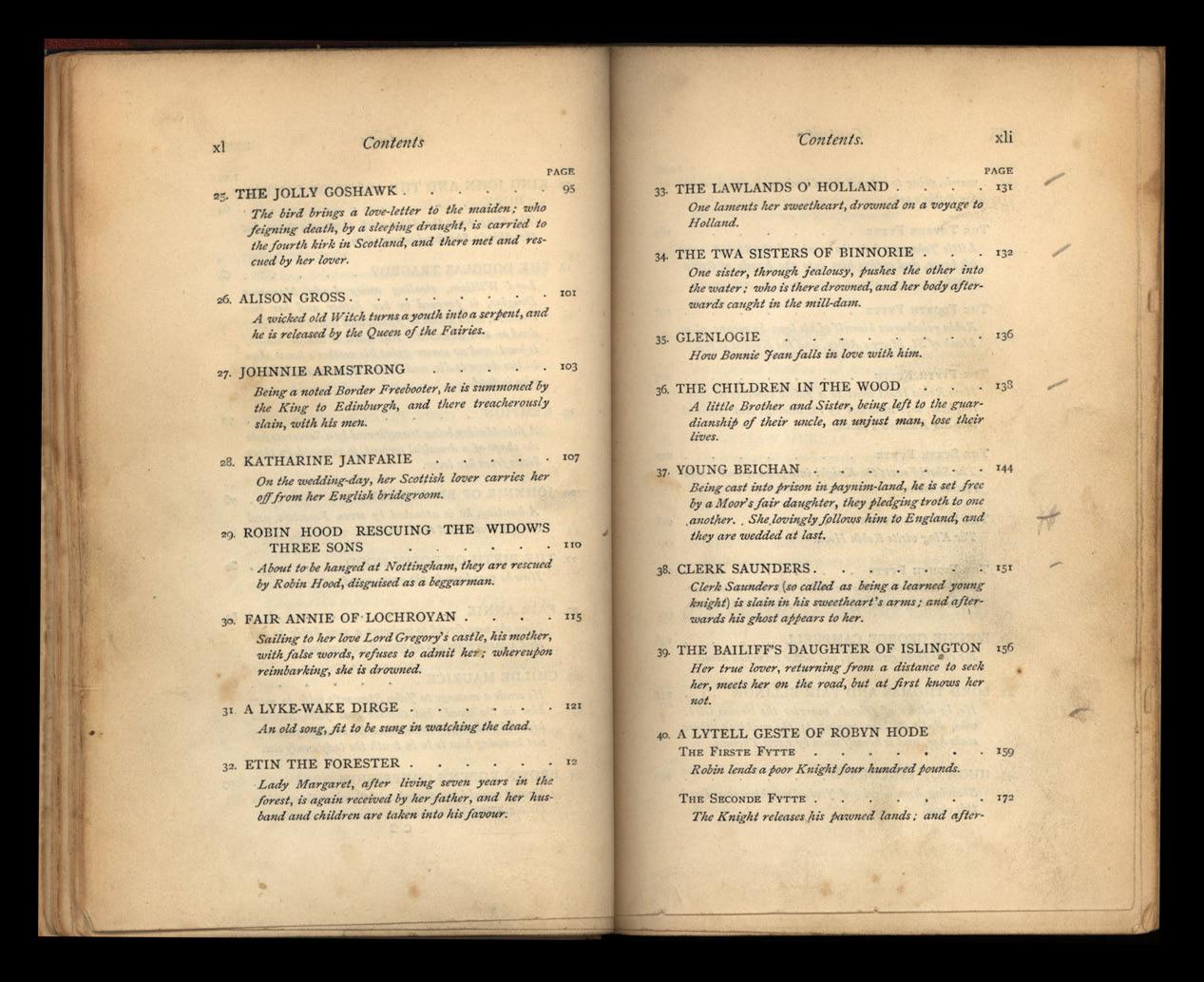
Contents.
33. THE LAWLANDS 0' HOLLAND.
Olll! /amellts It.er sweetluart, drtnulled all a voyage to Hollm,d.
34. THE TWA SISTERS OF BINNORIE 13'
Oue slster, tkro1tgll jealou.sy, puslus tlte otlter illto "U water: wltO is tlure drowned, and l:er bodyafterwards caugnt III tke mill-dam.
35. GLENLOGIE 136
How B01lnie Jea1lfalls i1l love witl. him.
36. THE CHILDREN IN THE WOOD 133
A little Brotlzer a1td Sister, bei1lg left to flu gttardian.snip of tkeir 1l11clc, att flitjust mall, lose their lives .
37. YOUNG BEICHAN '44
Bein.g cast Vtto prisolt t"tt paYltim-lalld, he is set free by a Mooysfair daugMer, tlICY pledgi1lgtroth to OIl< anot1zer SI,..lovingly.follow. him to E1lgla1ld, at,d Ihey are wedded at last.
3B. CLERK SAUNDERS. 15 1
Ckrk Sauntkrs (so called as being a lear1,.d young knight) is slain it, his swedMarl's a1ld afterwards his ghost appears to ker.
39. THE BAILIFF'S DAUGHTER OF ISLlN.GTON 156
Her Irue lover, returning from a distallce to seek Iter, meels Iter OIl the road, bul at first kllowS Iter not.
THE FJRSTE FVTTE
Rob;', {mds a poor Knight four lzundred pounds.
THE SECONDE FVTTE • 159
The K1light rdeases /zis fx"U1ud lands: and a..lter-
xlii Contents.
'luards, gol'ng to Robin Hood, s'uccours a yeoman
PAGE
44- BARBARA ALLEN'S CRUELTY 243 for Rob;,"s sake.
THE THVRDE FVTTE
Little Jol", gou i"to tI, e service of tI SherijJ'. robs
183
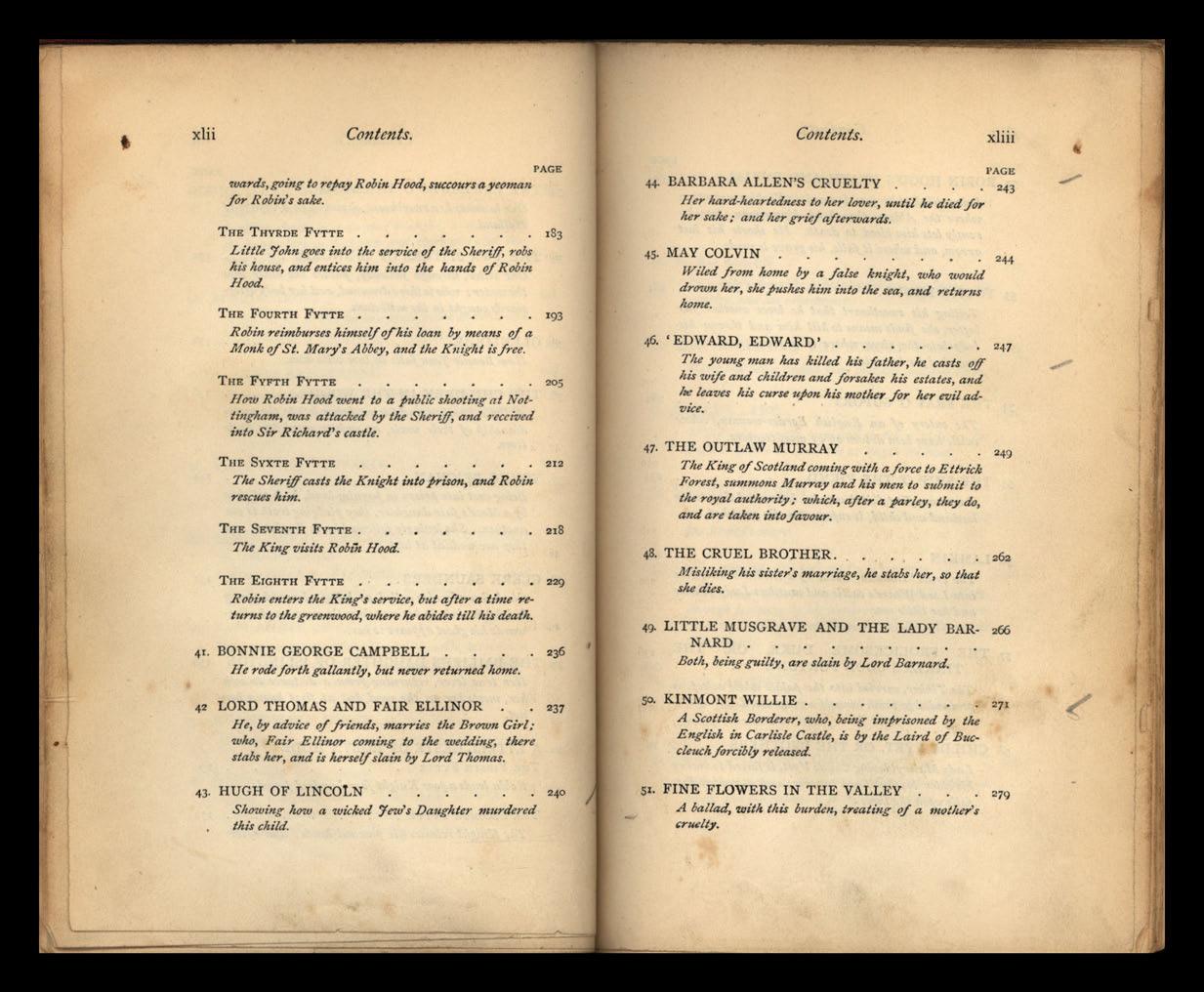
./
Her llard·hearted,,,ss to 1,,1' lover, 'mlil IU! died for her sake: and 1 1' piif afterwards.
45. MAY COLVIN '# his house, a1ui entiCls kill' £1I,tO the llands tif R ob/", Wikd fro", !wme by a false k1ligltt, wlto 'would Hm. drtnlJ1I her, slu jJuslus 1t£1Il Ulto tlu sea, alld returlts home.
THE FOURTH FvTTE
193
R obi" .-ei",bursu himself ofltis lom, by mcam 0/ a -!G. 'EDWARD, EDWARD'
Monk of St. Mary's Abbey, a1td tlu! K1tigl,t isfree.
247
TI young ,Ita" 1= killed I,is fatl r, I casts '!ff ./
THE FVFTH FVTTK 205 I,is wift and children and forsakes !tis estates, and
How Robin Hm went to a public s!woting nt Not· lilt! leaves his curu 1ljJtm. ltis lIlo/ner for Iter roil t;,'gham, was attacked by the SlterijJ'. and , -eecivcd vice. il,to Sir Richard's castle
47- THE OUTLAW MURRAY '49 THE SVXTE FVTTE 21.
The K;"g 0/ Seotlm,d eo",;"gwitl, a force to E Itriek TI" S!terijf casts the K"igltt into pris.", and R obb, Forest, summons Murray and I,is 11le1l to submit to resC1U!S him. fI" royal aut!writy: wltich, after a parley, they M, and are taken ,i,to favour.
THE SEVENTH FYTTK . 218
TI" King visits Robin Hm.
THE EIGHTH FVTTK
Robin King's Imt after a time ,.etU1'1tS to the p""wm, wltere he abides till!,is deatlt.
48. THE CRUEL BROTHER. 262
lIfislikillg' his sister's 11tarriage, he stabs lur, so that 229 sI dies.
4'J. LITTLE MUSGRAVE AND THE LADY BAR. 266 NARD
4 1 • BONNIE GEORGE CAMPBELL 236
Both, being guilty, are slab, by Lord Barnard. He rot/Q /ortlt gallantly, out never ret"rnea !totne.
LORD THOMAS AND FAIR ELLINOR '37 SO. KINMONT WILLIE . '7 1 <' 4'
A Scottisk Borderer, wlw, oeulg' imjwisolled by He, by of /,.ie,uls, -marries tlu B,.own G-irl.WM, Fair Ellinor coming to the wedding, tket-e
Englis!, in Carlisle Castle, is by tile Laird of Buc. stabs Iter, and is !zerse{f slai" by Lord T!wntas. ele"d,forewly r.kased.
43· HUGH OF LINCOLN '40 S'· FINE FLOWERS IN THE VALLEY '79
Showing !tOW a wicked Jrnls Dallgltter ",urdered
A ballad, with tltis burden, tr.aling of a mot/leT'S this child &1'U6/17.
xliv COli tents .
52. ROBIN HOOD'S DEATH AND BURIAL .
Being ill, RabbI, goes for aid to K-irkley 1lU1l1lCry.wIz-ere tlte Abbess, thollglt. Ius kinswoma1l, treaclzerously lets him bleed to deatlt. He shoots Ms last arrO'U', and where it/alls, llis grave is made.
53. YOUNG REDIN . 284
Tellb'ff Itis swee/lteart that lte loves anotl"r far better, sIte finds means to kill ltim and tltrows Ids body btto tlte ri1Jcr, wlterc it is found, and she is ., punislted for Iter crime.
54. THE FRAY 0' SUPORT 289
TIle outcry of al1. E1tglislt Bordel"-wo1ltan, whose cattle have oeen. drivell. off by moss-troopers.
55. THE SHIP 0' THE FIEND
A 'ZlJomall,firstfaz"thless to her lover, and tlten to Iter ltusband and cltild, is sujerttaturally jnmislted.
56. LAMKIN
Tlte cruel' La11lkbt/ aided by a wicked 1/.ursc, gets into Lord Weare's castle 41ulmurders Lady Weare /' and Iter little SOlt.
57. THE FROLICKSOME DUKE, OR, THE 293 297 TINKER'S GOOD FORTUNE 302
Tlte Tinker, carried znio tlu palace 'lv/die asleep, is persuaded to think lzimself a great Lord.
58. CHILDE VYET, OR THE BROTHERS 306
Lady Maisry, lovillg Childe Vyet, is .furced to 11larry !lis elder brutller Lord In-gram, an-d a sudtie1t fate (alls "POll tlle tl"...
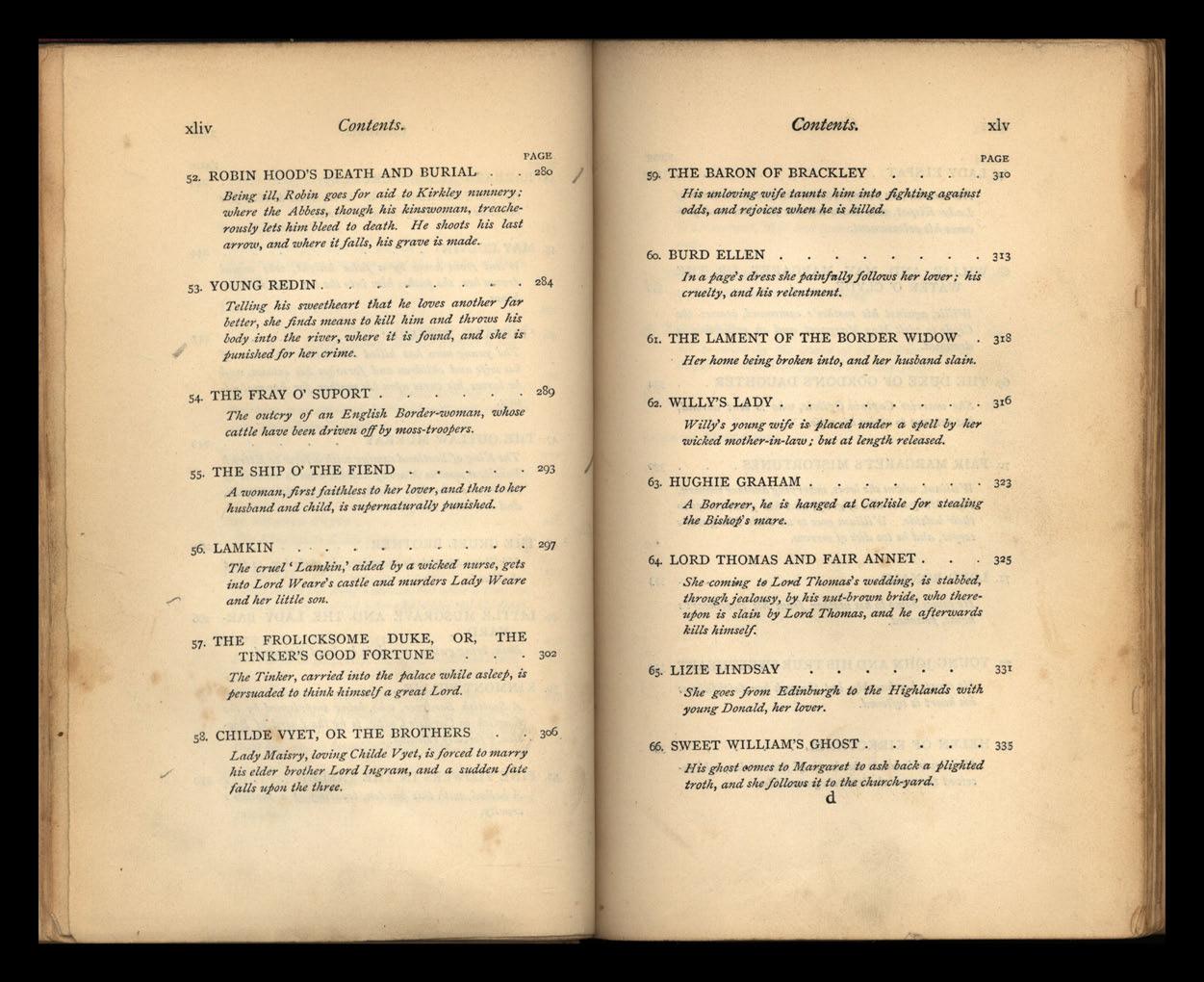
Contents.
59- THE BARON OF BRACKLEY
His 'tmloving'lvije taunts ltim £ttt" figlttlng against odds, and rejoices whm he is killed.
60. BURD ELLEN .
11, a page's dress site pai,t/"lly follows Iter lover.. Itis crllelty, Q1td It is relentme1tt.
6,. THE LAMENT OF THE BORDER WIDOW 318
Her M11le being broken into, a 'ud her husband sla£ll .
60. WILLY'S LADY. 316
Willy's yo,mg wife is· placed ",wer a spell by Iter wicked 11totlzer-in-law but at lmgtk released.
63. HUGHIE GRAHAM . 323
A Borderer, he is Ita1lged at Carlisle for stealillg tlte Bis!u;j/s mare.
6+ LORD THOMAS AND FAIR ANNET 3'5
She C011lHlg' t8 LOM Thouuu's wldding, is stabbed, throug!tiealousy, by his 1lut-brown bride, w/u; tlure"POtt is sla,;, by Lord Thomas, and lle afterwards kills himself.
65. LIZIE LINDSAY 33 '
' Site goes front Edi1lburglt to tlte Higltla,u/s with young DOllald, lur lover.
66. SWEET WILLIAl\1.'S GHOST. 335
His gltost OO11les to Margaret to ask back a plighted troth, a1ld sIze follows it to tlte churel,-yard. d
xlvi Contmts.
67. LADY ELSPAT
Her motMr, on/a!se fretence, imfriso,u the lover 0/ Lady E !spat, wlw bears witness for 1#", atui prohis releasellu1It.
68. WILLIE AND MAY MARGARET, OR THE WATER 0' CLYDE 339
IV-lllie, against his motlur's c01ll11Ulnd, crossu lIte Clyde to visit Alay Afargaret, and on returlling is drowned.
6g. THE DUKE OF GORDON'S DAUGHTER. 344
She marries Cap/alII, Ogi/vie, who is sel,t aOroad, but returll,,$ to claim· his wife.
70 FAIR MARGAItET'S MISFORTUNES
W£lliam, whom she loves, marryzitga1lotker W01Jla1I., Fair Margaret dies 0/grief, md her glwst comes to tluir bedside. JV£iliam. goes to see Fair Margaret'a corpse, md I" too dies 0/ sorrow.
7'. LORD RONALD.
He comes !tome to!tis mother from "is sweethearts /wuse, poisoll,ed.
72 • YOUNG JOHN AND HIS TRUE SWEETHEART 3504
He treats Mr harshly, but through Mr /ait!t/ulness !tis !teart is so/tmed.
7J. HELEN OF KIRKCONNEL
Her lover laments tl" tUat" 0/ fair Helm, wIt() 1' ceived the 'WOmd dir"ted arai1ut !tim.

A famous you"g Harper, 0/ noble oirt", wi,,, the ,/ "eart 0/ the ki"g's dallgltter; out, by the treachery of It u servant, their lQ'tJt comes to a sad and slIdtk" end.
75. THE GARDENER
A/a"ciful slwrt oallad o/wooing
76. TAMLANE •
He is stolen oy the Queen 0/ the Fairies; a,d at l m gll' released/rom Elflmd by Lady janet
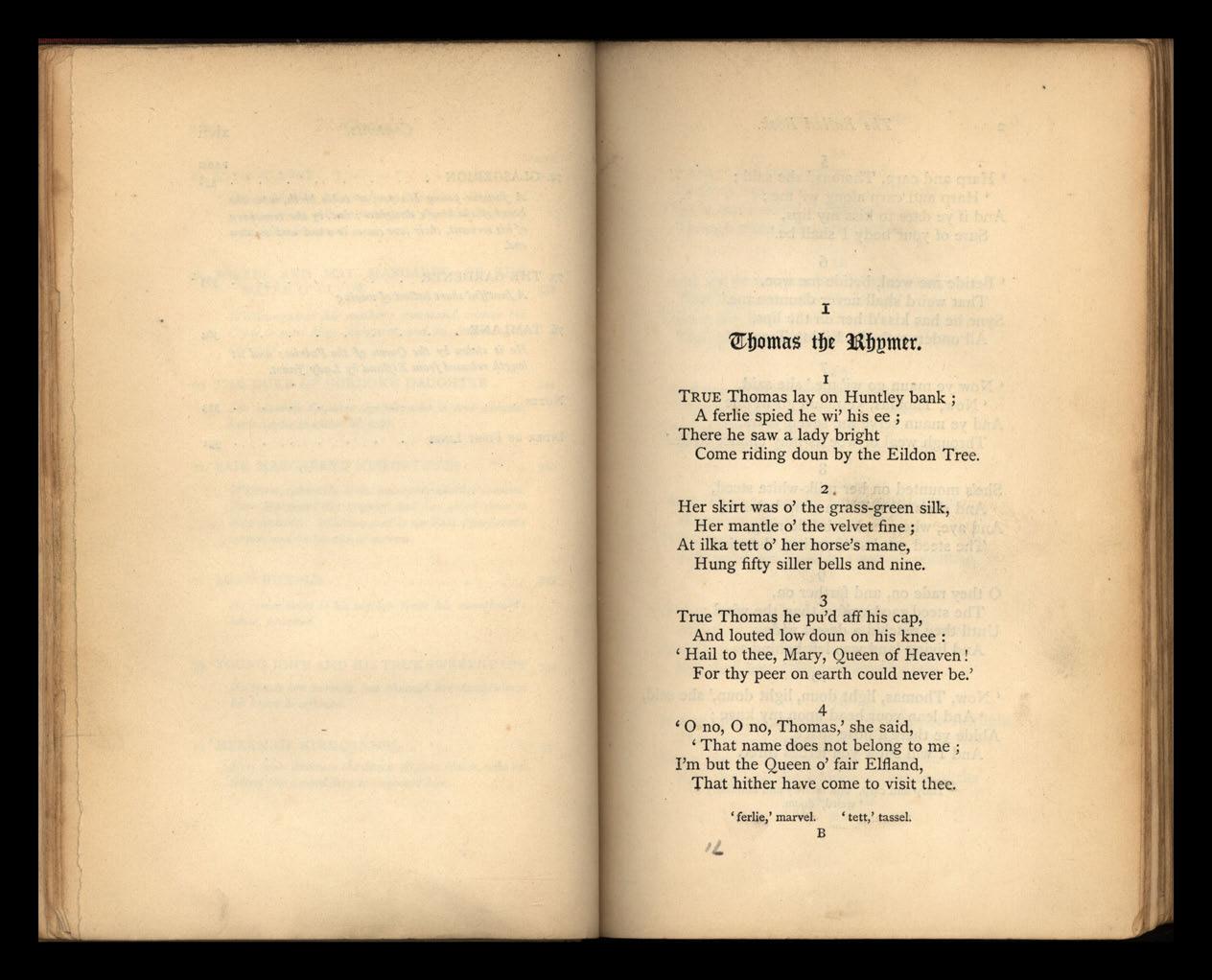
I
TRUE Thomas lay on Huntley bank; A ferlie spied he wi' his ee ; There he saw a lady bright Come riding do un by the Eildon Tree.
2 .
Her skirt was 0' the grass-green silk, Her mantle 0' the velvet fine; At ilka tett 0' her horse's mane, Hung fifty siller bells and nine.
3
True Thomas he pu'd aff his cap, And louted low doun on his knee: , Hail to thee, Mary, Queen of Heaven! For thy peer on earth could never be. '
4
, 0 no, 0 no, Thom as,' she said, , That name does not belong to me ; I'm but the Queen 0' fair Elfland, That hither have come to visit thee.
( ferlie/ marvel. ( tett/ tassel. B
2 TIle Ballad Book.
5
, Harp and carp, Thomas,' she said; , Harp and carp along wi ' me ; And if ye dare to kiss my lips, Sure of your body I shall be.'
6
, Betide me weal, betide me woe, That weird shall nev e r daunten me.' Syne he has kiss ' d h er on the lips, All underneath the Eildon Tree;
7
, Now ye maun go wi' me,' she said,
, Now, Thomas, ye maun go wi' me ; And ye maun serve me seven years, Through weal or woe as may chance to be.'
8
She's mounted on her milk-white steed, And she's ta'e n Thomas up behind; And aye, whene'e r her bridle rang, The steed gaed swifter than the wind.
9
o they rade on, and fa rth er on, The steed gaed swifter than the wind; Until they reach ' d a d eser t wide, And living land was left behind.
JO
, Now, Thomas, light doun, li ght doun,' she said, , And lean your he a d upon my knee; Abide ye there a little space, And I will show you ferlies three.
, Harp and carp,' ta lk merrily and familiarly f?) , weird, J doom.
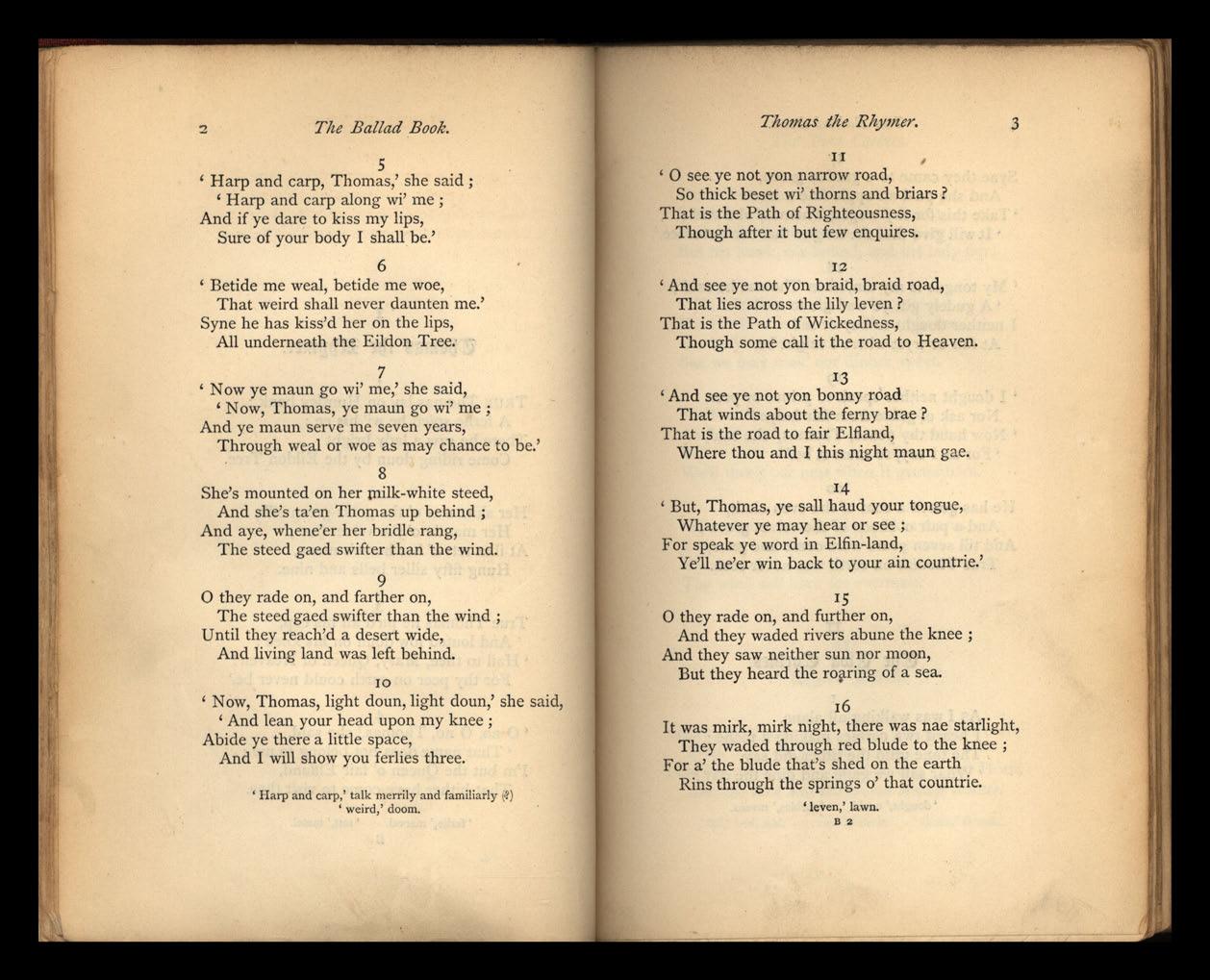
Thomas tIle RIlymer.
11
, 0 see ye not yon narrow road, So thick beset wi' thorns and briars? That is the Path of Righteousness, Though after it but few enquires.
12
, And see ye not yon braid, braid road, That lies across the lily leven ?
That is the Path of Wickedness, Though some call it the road to Heaven.
13
, And see ye not yon bonny road That winds about the ferny brae ? That is the road to fair Elfland, Where thou and I this night maun gae.
14
, But, Thomas, ye sail haud your tongue, Whatever ye may hear or see; For speak ye word in Elfin-land, Ye'll ne'er win back to your ain countrie.'
15
o they rade on, and further on, And they waded rivers abune the knee; And they saw neither sun nor moon, But they heard the of a sea.
16 3
It was mirk, mirk night, there was nae starlight, They waded through red blude to the knee; For a' the blude that ' s shed on the earth Rins through the springs 0 ' that countrie. 'leven,' lawn.
D.
4
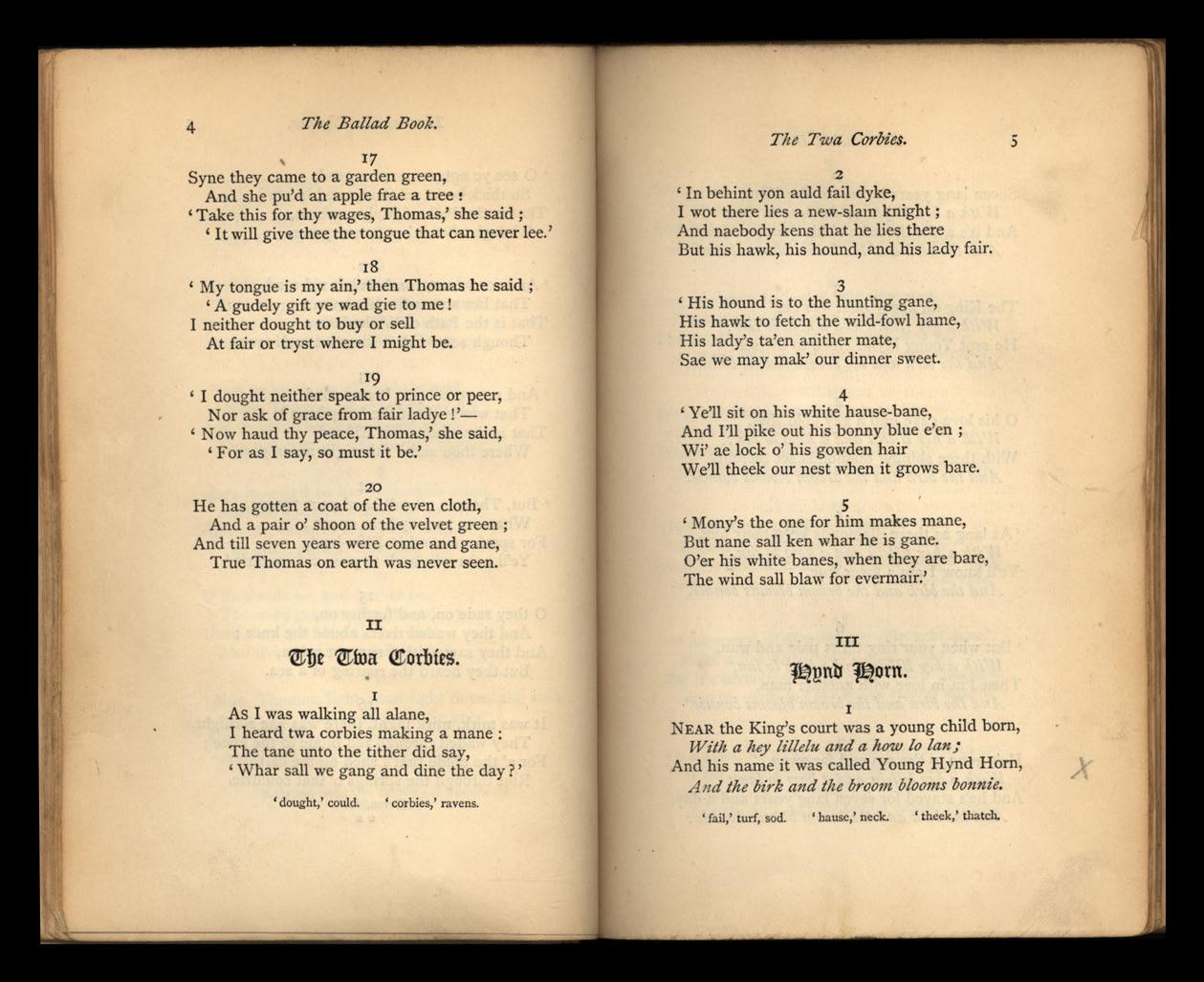
The Ballad Book.
, J7
Syne they came to a garden green, And she pu'd an apple frae a tree!
, Take this for thy wages, Thomas,' she said; , It will give thee the tongue that can neverlee.'
18
, My tongue is my ain,' then Thomas he said; , A gudely gift ye wad gie to me !
I neither dought to buy or sell At fair or tryst where I might be.
19
, I dought neither speak to prince or peer, Nor ask of grace from fair ladye !'-
, Now haud thy peace, Thomas,' she said, 'For as I say, so must it be.'
20
He has gotten a coat of the even cloth, And a pair 0' shoon of the velvet green; And till seven years were come and gane, True Thomas on earth was never seen.
As I was walking all alane, I heard twa corbies making a mane: The tane unto the tither did say, , Whar sal! we gang and dine the day?' 'dought,' could. 'corbies,' ravens.
The Twa Corbies.
2
, In behint yon auld fail dyke, I wot there lies a new-slam knight; And naebody kens that he lies there But his hawk, his hound, and his lady fair.
3
, His hound is to the hunting gane, His hawk to fetch the wild-fowl hame, His lady's ta'en anither mate, Sae we may mak' our dinner sweet.
4
'Ye'll sit on his white hause-bane, And I'll pike out his bonny blue e'en; Wi' ae lock 0' his gowden hair We'll theek our nest when it grows bare.
5
, Mony's the one for him makes mane, But nane sail ken whar he is gane. O'er his white banes, when they are bare, The wind sail blaw for evermair.'
NEAR the King's court was a young child born, With a hey It"llelu and a how 10 lan ,"
And his name it was called Young Hynd Horn, And the birk and tIle broom blooms b01l1tie. fail,' turf, sod. ' MUse,' neck. ' theek,' thatch. x
6 TIle Ballad Book.
2
Seven lang years h e serve d t h e Ki ng, Witlt alley lillelu and allow 10 lan J'
And it's a' for the sake 0' his daughter J ean, And tIle birk a1zd the broom blooms bomtie.
3
The King an angry man was he, Witll alley lillelte and allow 10 lan J'
He sent Young Hynd Horn to the sea, And tlte birk and tlte broom blooms bonnie.
4
o his love gave him a gay gold ring, With a hey lillelxe and a how 10 latt J
With three shining diamonds set therein, And the birk atzd tlte broom blooms bonnie
5
, As lang as these diamonds keep their hue, With a hey Nllelu and a how 10 lan,
Ye'll know I am a lover true, And tlte birk and tIle broom blooms bonnie.
6
• But when your ring turns pale and wan, With alley lillelze and a how 10 latt, Then I'm in love with another man, And the b£rk and the broom blooms bom#e.'
7
He's gone to the sea and far away, With a hey l£llelze and a how 10 lan J'
And he's for seven lang years and a day , A nd the bzrk and the broom blooms bomzie :
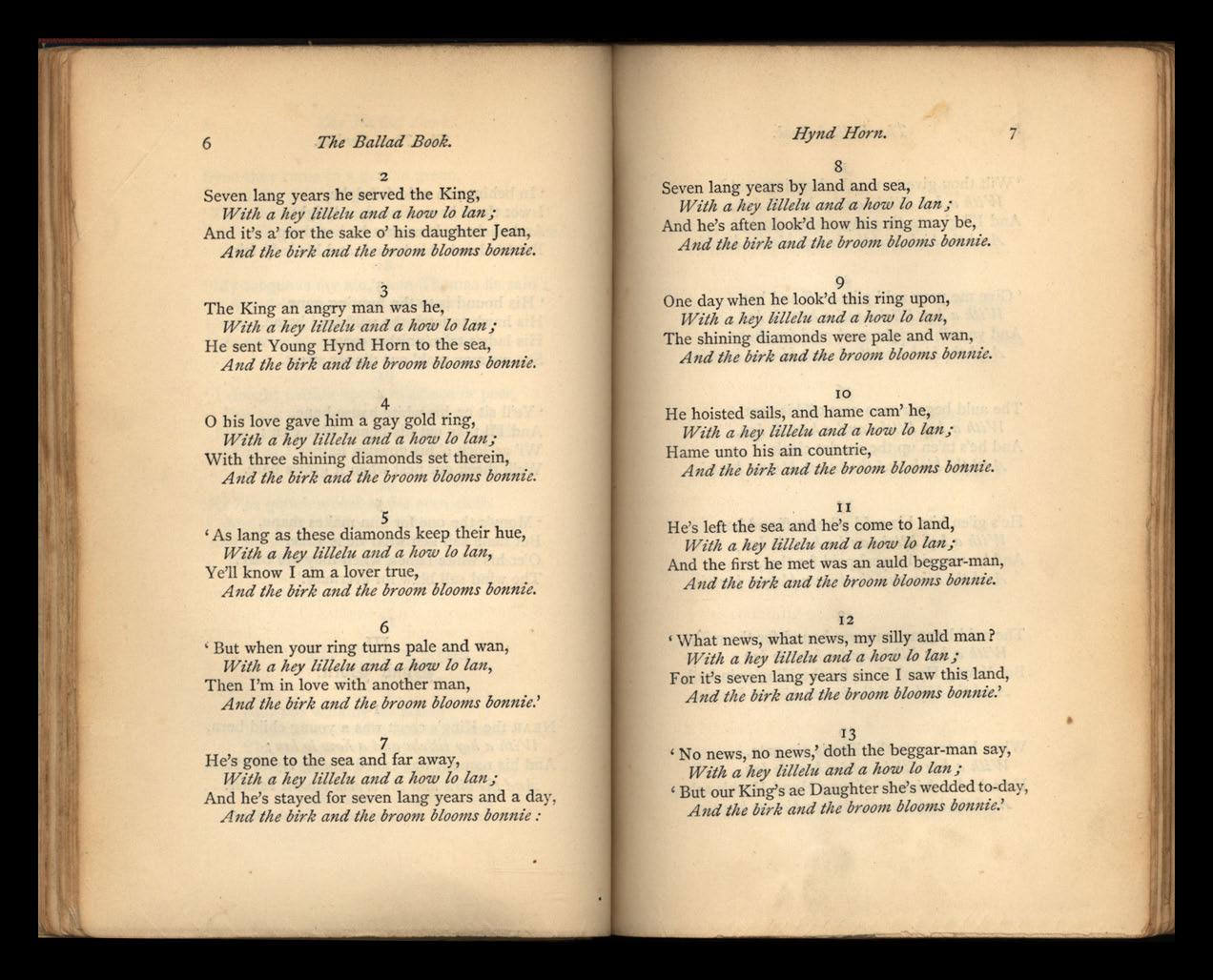
Hynd Hom.
8
Seven lang years b y land and sea,
With a hey lillelze arzd a how 10 lan J
And he's aften look'd how his ring may be, And tlte birk and the broom blooms bomzie.
9
One day when he look'd this ring upo n , Witlz a ltey lillelxe and a ltOW 10 lan,
The shining diamonds were pale and wan, A ,zd the birk and the broom blooms bomzie
10
He hoisted sails, and hame cam' he, Witll a hey Nllelxe and a ltow 10 lan J'
Hame unto his ain countrie, And tlte birk and tlte broom blooms bomtie.
II
He's left the sea and he's come to land , With a hey lillelte and a ltOW 10 lan J
And the first he met was an auld beggar-man, A lld tile birk and tile broom blooms bomzie.
1 2
, What news, what news, my silly auld man ?
With a hey lillelte and a ltOW 10 tan J '
For it's seven lang years since I saw this land, And tlte birk and the broom blooms bomlie.'
7
13
'No news, no news,' doth the beggar-man say, With alley lillelu and a ltOW 10 lan /
, But our King's ae Daughter she's wedded to-day , And tlte birk and the broom blooms bomtie.'
8 The Ballad Book.
14
, Wilt thou give to me thy begging coat?
W£tle a hey Hlleht and allow 10 lan /
And I'll give to thee my scarlet cloak, And the bi1"k and the broom blooms b01l1tz'e.
15
, Give me your auld pike-staff and hat, W£th a hey Hllehe and a how 10 lan / And ye sail be right weel paid for that, And the bi1"k and tlte broom blo01lls b01l1lie.
16
The auld beggar-man cast off his coat, With a ltey Hlldu mid a how 10 lan,
And he's ta'en up the scarlet cloak, And the bi1"k and th e broom blooms b01l1lie.
17
He's gi'en him his auld pike-staff and hat, With a hey Hllehe and a how 10 lan J' And he was right weel paid for that, And the bi1"k and th e broom blooms b01l1lie.
18
The auld beggar-man was bound for the mill, With a hey Hllelu and allow 10 late J'
But Young Hynd Horn for the King's ain hall, And tile bi1"k and th e broom blooms b01l1tz'e.
19
When he came to the King's ain gate, Witlt a hey lillelu and a how 10 la11, He asked a drink for Young Hynd Horn's sak e, A1td the bi1"k and the broom blooms b01l1tz'e.

Hynd Hom.
20
These news unto the bonnie bride cam', With a hey Hllehe and allow 10 lmt,
That at the gate there stands an auld man,. A nd tIle bi1"k atld tlte broom blooms b01l111e.
21 9
There stands an auld man at the.King's gate, Witlt alley lillelu and a h ow 10 latt J'
He asketh a drink for Young Hynd Horn's sake, And tlte bi1"k and tIle broom blooms bomzie.
22
The Bride cam' tripping down the stair, Witlt a Itey lillehe atld a Itow 10 latt /
The combs 0' fine goud in her hair, . A1zd the bi1"k and tIle broom blooms b01l1lt eJ
23
A cup 0' the red wine in her hand, . Witlt a hey lillelu and allOW 10 lan;
And that she gave to the beggar-man, . And tIle bi1"k and tlte broom blooms bonm e.
24
Out 0' the cup he drank the wine, Witlt a h ey lilldle atld a how 10 lan J'
And into the cup he dropt the ring, And tlte bi1"k and tIle broom blooms bonme.
25
, 0 gat thou this by sea or by land?
With a hey lilldle mid allow 10 latt. Or gat thou it aff a dead man's hand? . , And th e bi1"k and tlte broom blooms bonm e.
10 TIle Ballad Book.
26
, I gat it neither by sea nor land, With a ltey l£llelu alld allow 10 lall, N or gat I it from a dead man's hand, And tIle bz'rk and the broom blooms bomdt.
27
'But I gat it at. my wooing gay, W£tlt a hey l£llelu and a ltow 10 lan /
And I gie it to you on your wedding-day, AlId tile b£rk and the broom blooms bomde.
28
, I'll cast aside my satin goun, W£tll alley Nllellt alld a how 10 lan,
And I'll follow you frae toun to toun, AlId tile bz'rk and the broom blooms bonn£e.
29
, I'll tak' the fine goud frae my hair, W£tll a ltey Nlleltt and a how 10 lan, And follow you for evermair, And the b£rk and tile broom blooms bomzz'e.'
30
He let his cloutie cloak doun fa',
W£tll a IICY HlIeltt and a ltow 10 lan / Young Hynd Horn shone above them a', A lid tile b£rk and tlte broom blooms bonn£e.
3 1
The Bridegroom thought he had her wed,
W£tll a hey lillellt and a how 10 lan J'
But she is Young Hynd Horn's instead, And the b£rk and th e broom blooms bomde
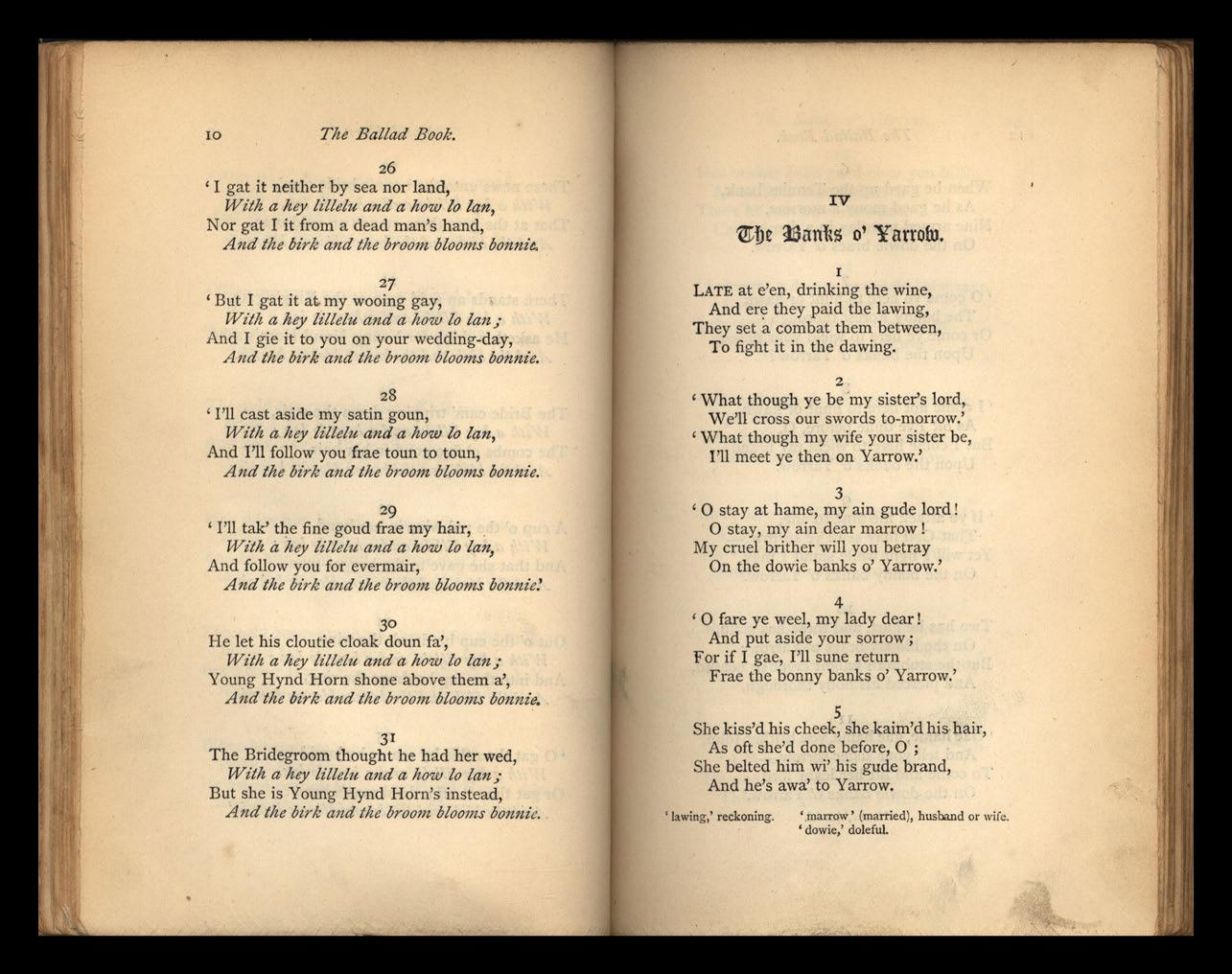
LATE at e'en, drinking the wine, And ere they paid the lawing, They set acombat them between, To fight it in the dawing.
2
, What though ye be 'my sister's lord, We'll cross our swords to-morrow.'
, What though my wife your sister b e, I'll meet ye then on Yarrow.'
3
, 0 stay at hame, my ain gude lord ! o stay, my ain dear marrow!
My cruel brither will you betray On the dowie banks 0' Yarrow.'
4
, 0 fare ye wee1, my lady dear!
And put aside your sorrow; F or if I gae, I'll sune return Frae the bonny banks 0' Yarrow.'
5
She kiss'd his cheek, she kaim'd his hair, As oft she'd done before, 0 ; She belted him wi' his gude brand, And he's awa' to Yarrow.
I lawing,' reckoning. 'marrow' (married ), husband or wi fe . f dowie,' doleful.
12 Tlte Ballad Book.
6
When he gaed up the Tennies bank,
As he gaed mony a morrow, Nine armed men lay in a den, On the dowie braes 0' Yarrow.
7
, 0 come ye here to hunt or hawk The bonny Forest thorough? Or come ye here to wield your brand Upon the banks 0' Yarrow ? '
8
, I come not here to hunt or hawk, As oft I've dune before, 0, But I come here to wield my brand Upon the banks 0' Yarrow.
9
, If ye attack me nine to ane, That God may send ye sorrow!Yet will I fight while stand I may, On the bonny banks 0' Yarrow.'
10
Two has he hurt, and three has slain, On the bloody braes 0' Yarrow; But the stubborn knight crept in behind, And pierced his body thorough.
II
, Gae hame, gae hame, you brither John, And tell your sister sorrow,To come and lift her leafu' lord On the dowie banks 0' Yarrow.' 'lcafu',' lawful.
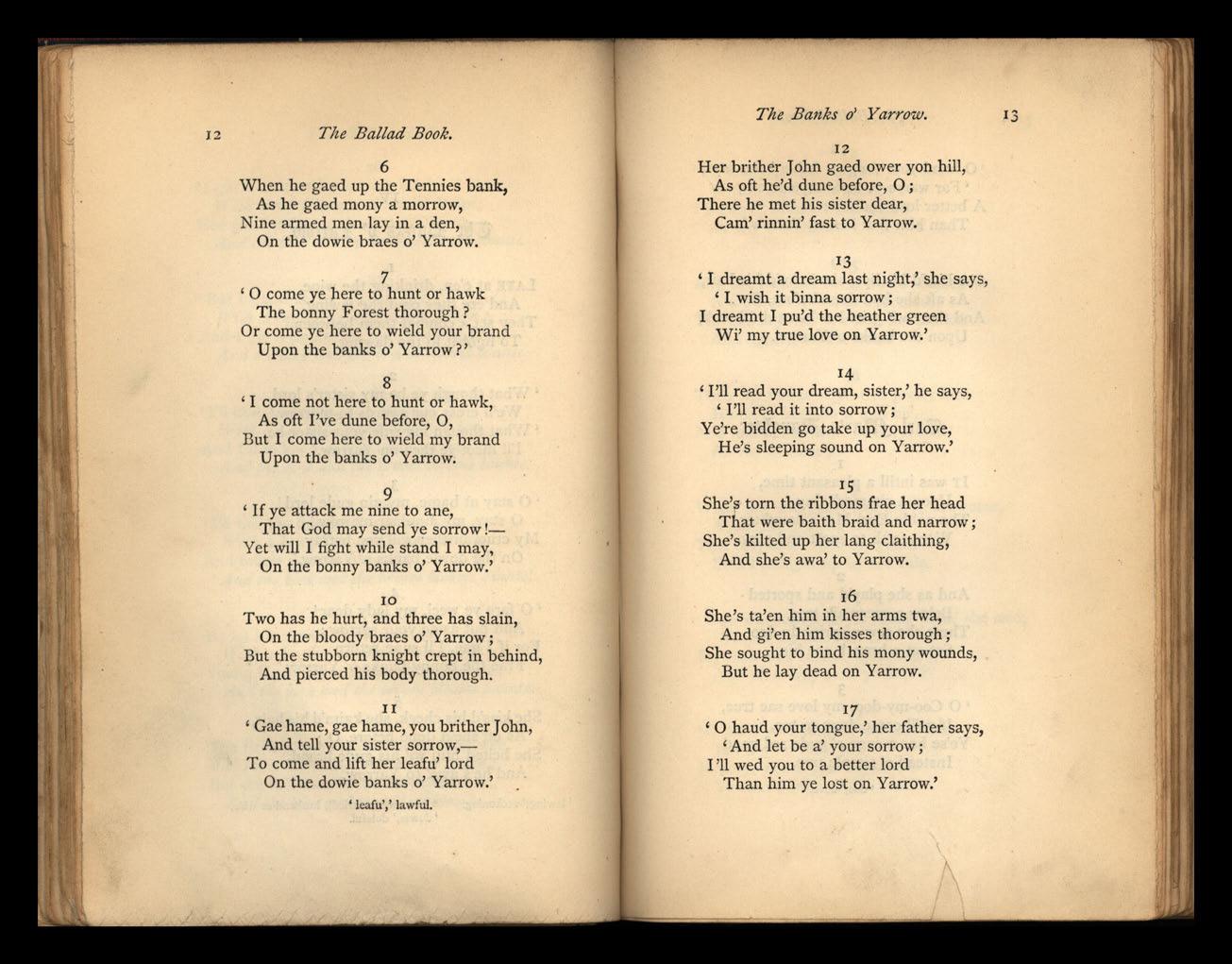
Tlze Banks 0' Yarrow.
12
Her brither John gaed ower yon hill, As oft he'd dune before, 0 ; There he met his sister dear, Cam' rinnin' fast to Yarrow.
13 , I dreamt a dream last night,' she says, , I wish it binna sorrow; I dreamt I pu'd the heather green Wi' my true love on Yarrow.'
14
, I'll read your dream, sister,' he says, , I'll read it into sorrow; Ye're bidden go take up your love, He's sleeping sound on Yarrow.'
15
torn the ribbons frae her head That were baith braid and narrow; She's kilted up her lang claithing, And she's awa' to Yarrow.
16
She's ta'en him in her arms twa, And gi'en him kisses thorough; She sought to bind his mony wounds, But he lay dead on Yarrow.
17
, 0 haud your tongue,' her father says, , And let be a' your sorrow; I'll wed you to a better lord Than him ye lost on Yarrow.'
14 Tile Ballad Book.
18
, 0 haud your tongue, father,' she says, 'Far warse ye mak' my sorrow; A better lord could never be Than him that lies on Yarrow.'
19
She kiss'd his lips, she kaim'd his hair, As aft she had dune before, 0 ; And there wi' grief her heart did break, Upon the banks 0' Yarrow. v
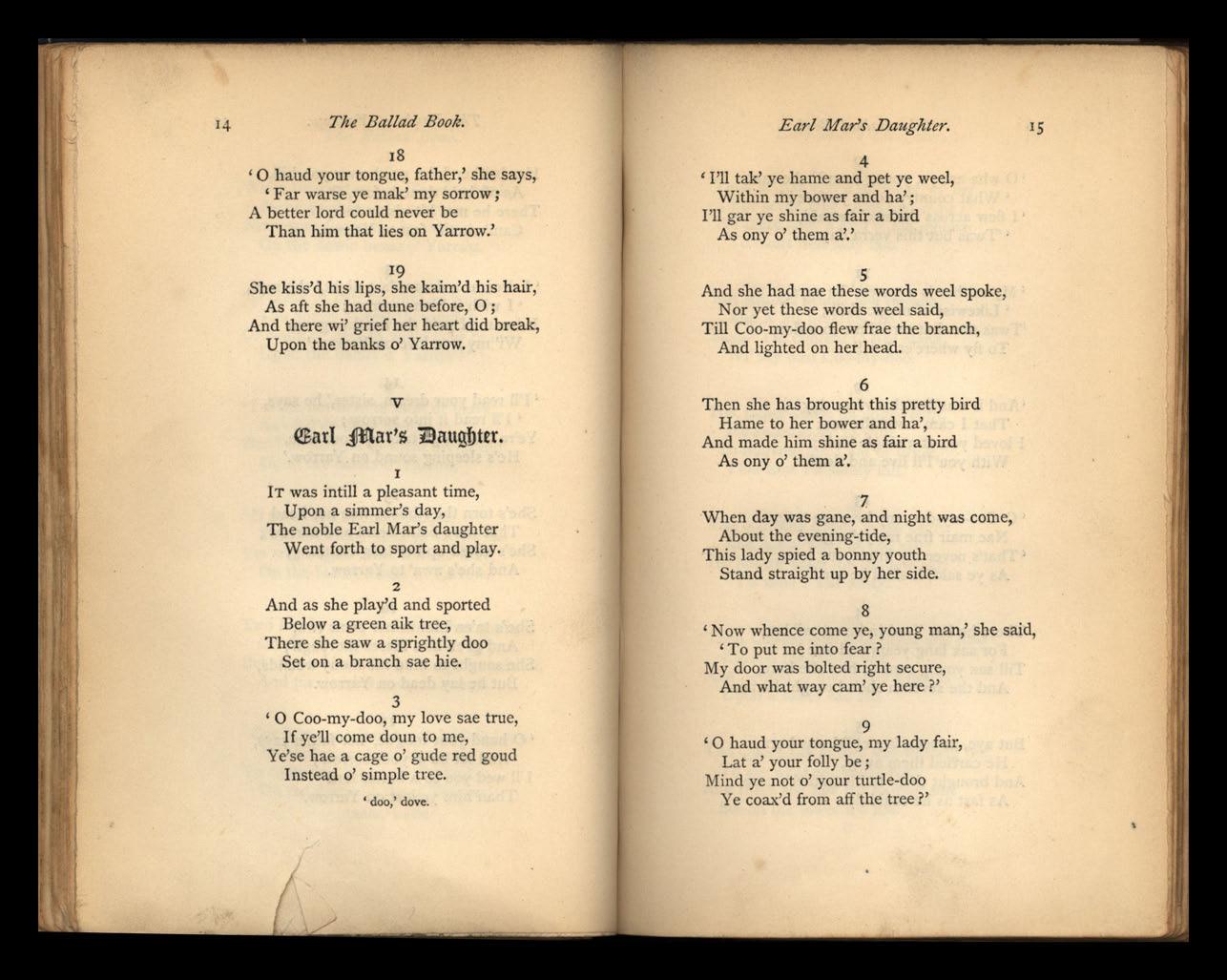
IT was intill a pleasant time, Upon a simmer's day, The noble Earl Mar's daughter Went forth to sport and play.
2
And as she play'd and sported Below a green aik tree, There she saw a sprightly doo Set on a branch sae hie.
3
, 0 Coo-my-doo, my love sae true, If ye'll come doun to me, Ye'se hae a cage 0' gude red goud Instead 0' simple tree. , doo,' dove.
Earl Mar's Daughter.
4
'I'll tak' ye hame and pet ye weel, Within my bower and ha' ; I'll gar ye shine as fair a bird As ony 0' them a'.'
5
And she had nae these words weel spoke, N or yet these words weel said, Till Coo-my-doo flew frae the branch, And lighted on her head.
6
Then she has brought this pretty bird Hame to her bower and ha', And made him shine as fair a bird As ony 0' them a'.
7
When day was gane, and night was come, About the evening-tide, This lady spied a bonny youth Stand straight up by her side.
8 15
'Now whence come ye, young man,' she said, 'To put me into fear ? My door was bolted right secure, And what way cam' ye here ?'
9
, 0 haud your tongue, my lady fair, Lat a' your folly be; Mind ye not 0' your turtle-doo Ye coax'd from aff the tree?'
16 Tlte Ballad Book.
10
'0 wha are ye, young man?' she said, , What country come ye frae ?' I I flew across the sea,' he said, , 'Twas but this verra day. II
'My mither is a queen,' he says, , Likewise of magic skill ; 'Twas she that tum'd me in a doo, To fly where'er I will.
12
, And it was but this verra day That I cam' ower the sea: I loved you at a single look; With you I'll live and dee.'
13
, 0 Coo-my-doo, my love sae true, N ae mair frae me ye'se gae.'
, That's never my intent, my love; As ye said, it shall be sae.'
14
There he has lived in bower wi' her, For sax lang years and ane; Till sax young sons to him she bare, And the seventh she's brought hame.
15
But aye, as soon's a child was born, He carried them away, And brought them to his mither's care, As fast as he could fly.
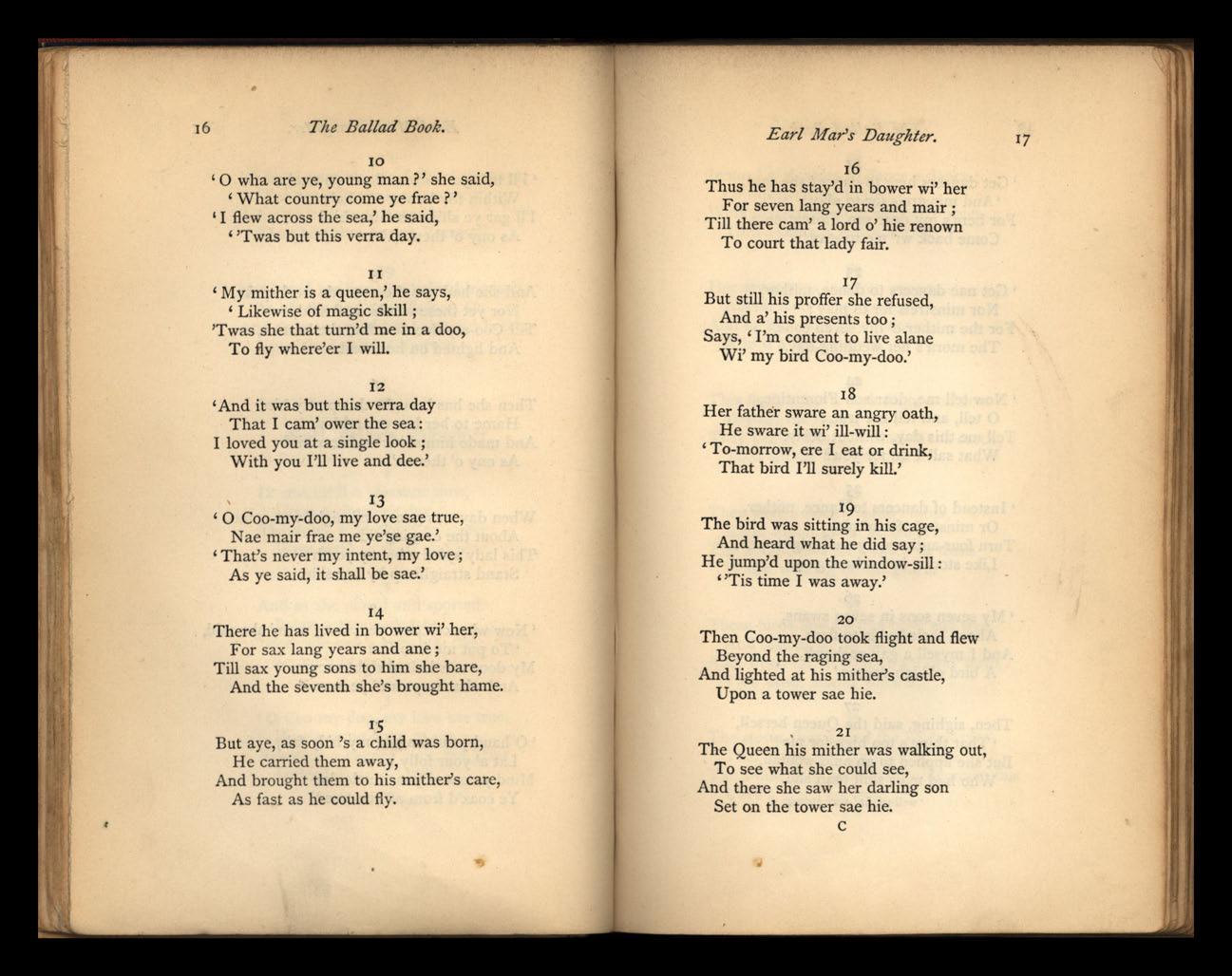
Earl Mar's Daugltter.
16
Thus he has stay'd in bower wi' her For seven lang years and mair; Till there cam' a lord 0' hie renown To court that lady fair.
17
But still his proffer she refused, And a' his presents too; Says, ' I'm content to live alane Wi' my bird Coo-my-doo.'
18
Her father sware an angry oath, He sware it wi' ill-will : 'To-morrow, ere I eat or drink, That bird I'll surely kill.'
19
The bird was sitting in his cage, And heard what he did say; He jump'd upon the window-sill : "Tis time I was away.'
20
Then Coo-my-doo took flight and flew Beyond the raging sea, And lighted at his mither's castle, Upon a tower sae hie.
• 21
The Queen his mither was walking out, To see what she could see, And there she saw her darling son Set on the tower sae hie.
18 The Ballad Book.
, Get dancers here to dance,' she said,
Instead 0' dancers to dance a dance, 'And minstrels for to play; Or minstrels for to play, For here' s my dear son Florentine Were four-and-twenty well-wight men Come back wi' me to stay.'
Tum'd birds 0' feathers gray; 23 29
, Get nae dancers to dance, mither,
Her seven sons in seven swans, Nor minstrels for to play; Aboon their heads to flee;
For the mither 0' my seven sons,
And he himsell a gay goshawk, The mom's her wedding-day.'
A bird 0' high degree.

, Now tell me, dear son Florentine,
This flock 0' birds took flight and flew o tell, and tell me true;
Beyond the raging sea; Tell me this day, without delay,
They landed near the Earl Mar's castle, What sal! I do for you?'
Took shelter in every tree.
, Instead of dancers to dance, mither,
They were a flock 0' pretty birds, Or minstrels for to play, Right wondrous to be seen; Turn four-and-twenty well-wight men,
The weddin'eers they look'd at them Like storks, in feathers gray; Whilst walking on the green. 26
'My seven sons in seven swans, 32 Aboon their heads to flee;
These birds flew up frae bush and tree, And I mysell a gay goshawk,
And lighted on the ha' ; A bird 0' high degree.'
And, when the wedding-train cam' forth, Flew down amang them
27
Then, sighing, said the Queen hersell, 33 'That thing's too high for me!'
The storks they seized the boldest men, But she applied to an auld woman,
That they could not fight or flee; Who had mair skill than she.
The swans they bound the bridegroom fast 'wcll -wight, ' ve ry strong.
Unto a green aik tree. c
20 The Ballad Book.
34
They flew around the bride-maidens, Around the bride's own head; And, wi' the twinkling 0' an ee, The bride and they were fled.
35
There's ancient men at weddings b een
For eighty years or ; But siccan a curious weddmg-day They never saw before.
36
For naething could the company do, Nor naething could they say; But they saw a flock 0' pretty birds That took their bride away.
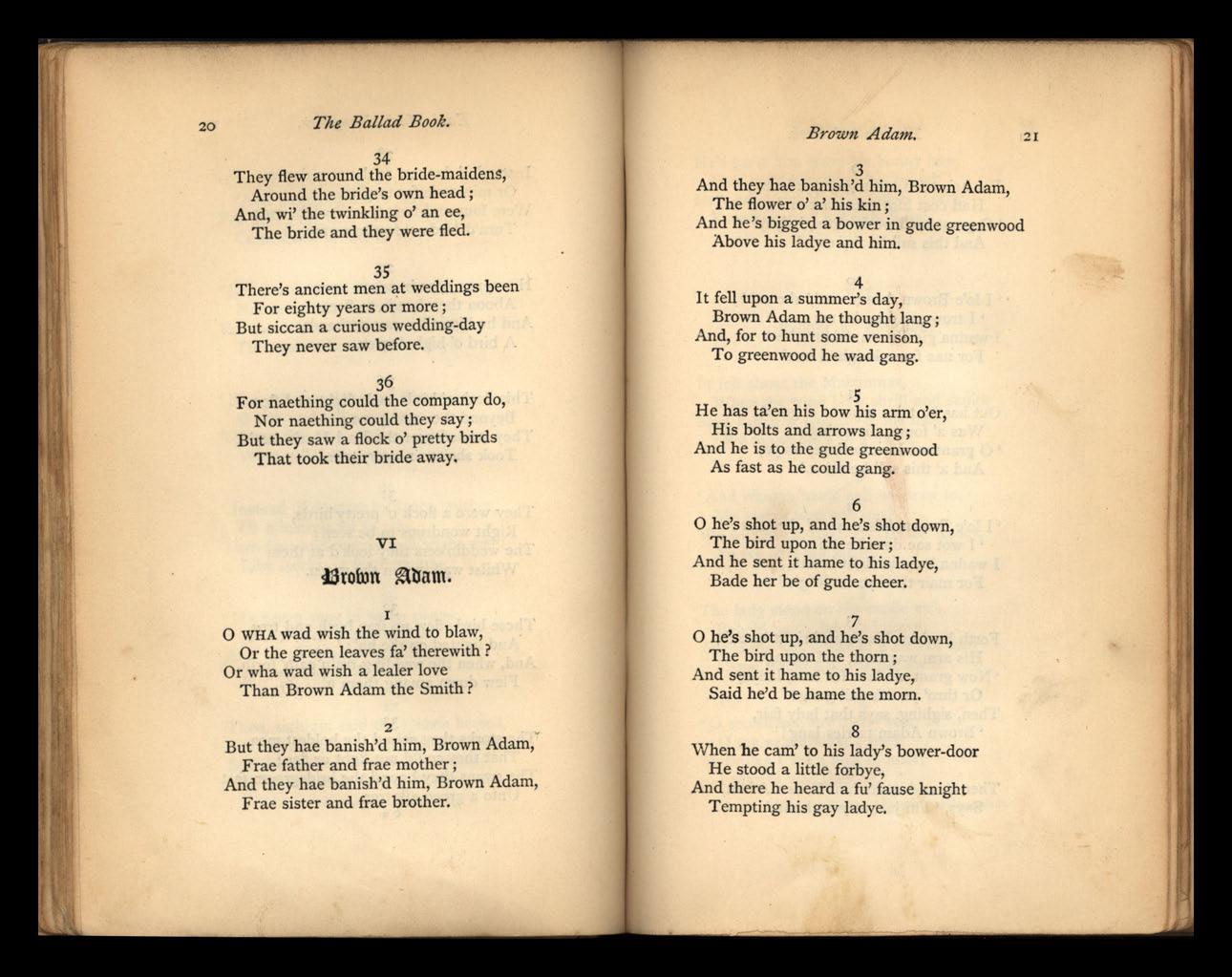
o WHA wad wish the wind to blaw, Or the green leaves fa' therewith ? Or wha wad wish a lealer love Than Brown Adam the Smith?
2 •
But they hae banish'd him, Brown Adam, Frae father and frae mother; And they hae banish'd him, Brown Adam, Frae sister and frae brother.
Brown Adam.
3
And they hae banish'd him, Brown Adam, The flower 0' a' his kin; 21 And he's bigged a bower in gude greenwood
Above his ladye and him.
4
It fell upon a summer's day, Brown Adam he thought lang; And, for to hunt some venison, To greenwood he wad gang.
5
He has ta'en his bow his arm o'er, His boIts and arrows lang; And he is to the gude greenwood
As fast as he could gang.
6
o he's shot up, and he's shot down, The bird upon the brier; And he sent it hame to his ladye, Bade her be of gude cheer.
7
o he's shot up, and he's shot down, The bird upon the thorn ; And sent it hame to his lad ye, Said he'd be hame the morn.
8
When he cam' to his lady's bower-door
He stood a little forbye, And there he heard a fu' fause knight Tempting his gay lad ye.
22 TIle Ballad Book.
9
For he's ta'en out a gay goud ring, Had cost him many a poun' : , 0 grant me love for love, ladye, And this sail be thy own.'
10
, I lo'e Brown Adam weel,' she said; , I trow sae does he me ; I wadna gie Brown Adam's love For nae fause knight I see.'
II
Out has he ta'en a purse 0' gowd, Was a' fou to the string: , 0 grant me love for love, ladye, And a' this sail be thine.'
12
, I lo'e Brown Adam weel,' she says; , I wot sae does he me : I wadna be your light leman, For mair than ye could gie.'
13
Forth he drew his sharp bright brand; His arm was stout and strang: 'Now grant me love for love, ladye, Or thro' ye this saIl gang! ' Then, sighing, says that lady fair 'B ' rown Adam tarries lang! '
14
Then in and starts him Brown Adam, Says, ' I'm just at your hand.'
Edom 0' Gord01z.
He's gar'd him leave his bonny bow, He's gar'd him leave his brand, He's gar'd him leave a dearer pledgeFour fingers 0' his right hand.
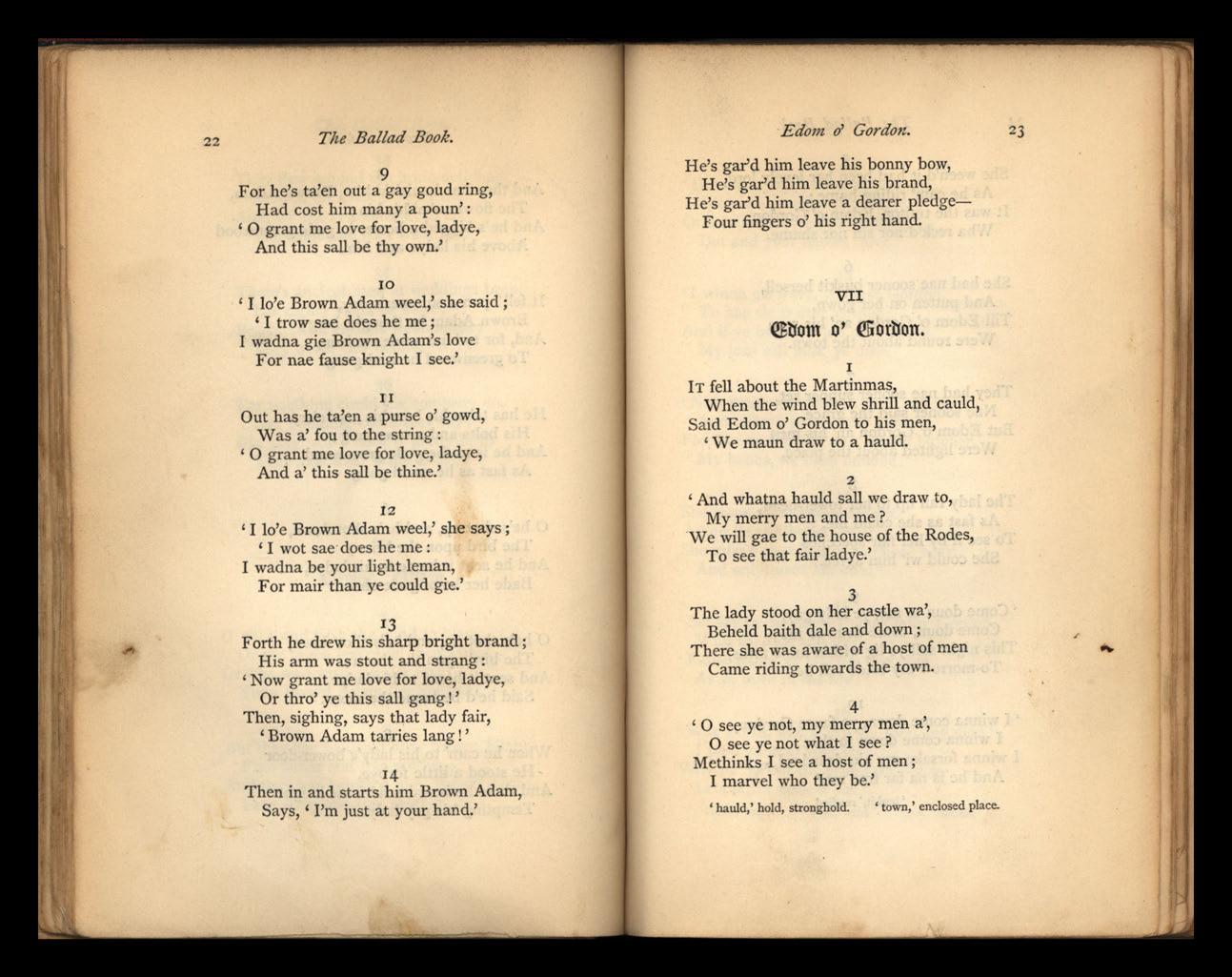
VII
QBlJom 0' (ffiorlJon.
I
IT fell about the Martinmas, When the wind blew shrill and cauld, Said Edom 0' Cordon to his men, , We maun draw to a hauld.
2
, And whatna hauld sall we draw to, My merry men and me?
'We will gae to the house of the Rodes, To see that fair lad ye.'
3
The lady stood on her castle wa', Beheld baith dale and down; There she was aware of a host of men Came riding towards the town.
4
, 0 see ye not, my merry men a', o see ye not what I see?
Methinks I see a host of men; I marvel who they be.'
, hauld,' hold, stronghold. ' town,' enclosed place.
Tlte Ballad Book.
5
She ween'd it had been her lovely lord, As he cam' riding hame ; It was the traitor, Edom 0' Gordon, Wha reck'd nor sin nor shame.
6
She had nae sooner buskit hersell, And putten on her gown, Till Edom 0' Gordon an' his men Were round about the town.
7
They had nae sooner supper set, N ae sooner said the grace, But Edom 0' Gordon an' his men Were lighted about the place.
8
The lady ran up to her tower-head, As fast as she could hie, To see if by her fair speeches She could wi' him agree.
9
, Come doun to me, ye lady gay, Come doun, come doun to me; This night sall ye lig within mine arms, To-morrow my bride sall be.'
10
, I winna come down, ye fause Gordon, I winna come down to thee; I winna forsake my ain dear lord,And he is na far frae me.' 'buskit,' readied .

Edom 0' Gordolt.
II
, Gie owre your house, ye lady fair, Gie owre your house to me ; Or I sall burn yoursell therein, But and your babies three.'
12
, I winna gie owre, ye fause Gordon, To nae sic traitor as thee; And if ye bum my ain dear babes, My lord sall mak' ye dree.
13
, Now reach my pistol, Glaud, my man, And charge ye weel my gun; For, but an I pierce that bluidy butcher, My babes, we been undone!'
14
She stood upon her castle wa', And let twa bullets flee: She miss'd that bluidy butcher's heart, And only razed his knee.
, Set fire to the house!' quo' fause Gordon, Wud wi' dule and ire:
, Fause ladye, ye sall rue that shot As ye bum in the fire ! '
16
, Wae worth, wae worth ye, Jock, my man! I paid ye weel your fee; Why pu' ye out the grund-wa' stane, Lets in the reek to me ?
• dree/ suffer. ( wud,' mad. ( reek,' smoke,
TIle Ballad Book.
J7
, And e'en wac worth ye, Jock, my man! I paid ye weel your hire; Why pu' ye out the grund-wa' stane, To me lets in the fire?'
18
'Ye paid me weel my hire, ladye, Ye paid me weel my fee: But now I'm Edom 0' Gordon's man,Maun either do or dee.'
19
o then bespake her little son, Sat on the nurse's knee: Says, ' 0 mither dear, gie owre this house, For the reek it smothers me.'
20
, I wad gie a' my goud, my bairn, Sae wad I a' my fee, For ae blast 0' the western wind, To blaw the reek frae thee.'
2J
o then bespake her daughter dear,She was baith jimp and sma': '0 row' me in a pair 0' sheets, And tow me owre the wa' ! '
22
They row'd oer in a pair 0' sheets, And tow'd her owre the wa' ;
But on the point 0' Gordon's spear She gat a deadly fa'.
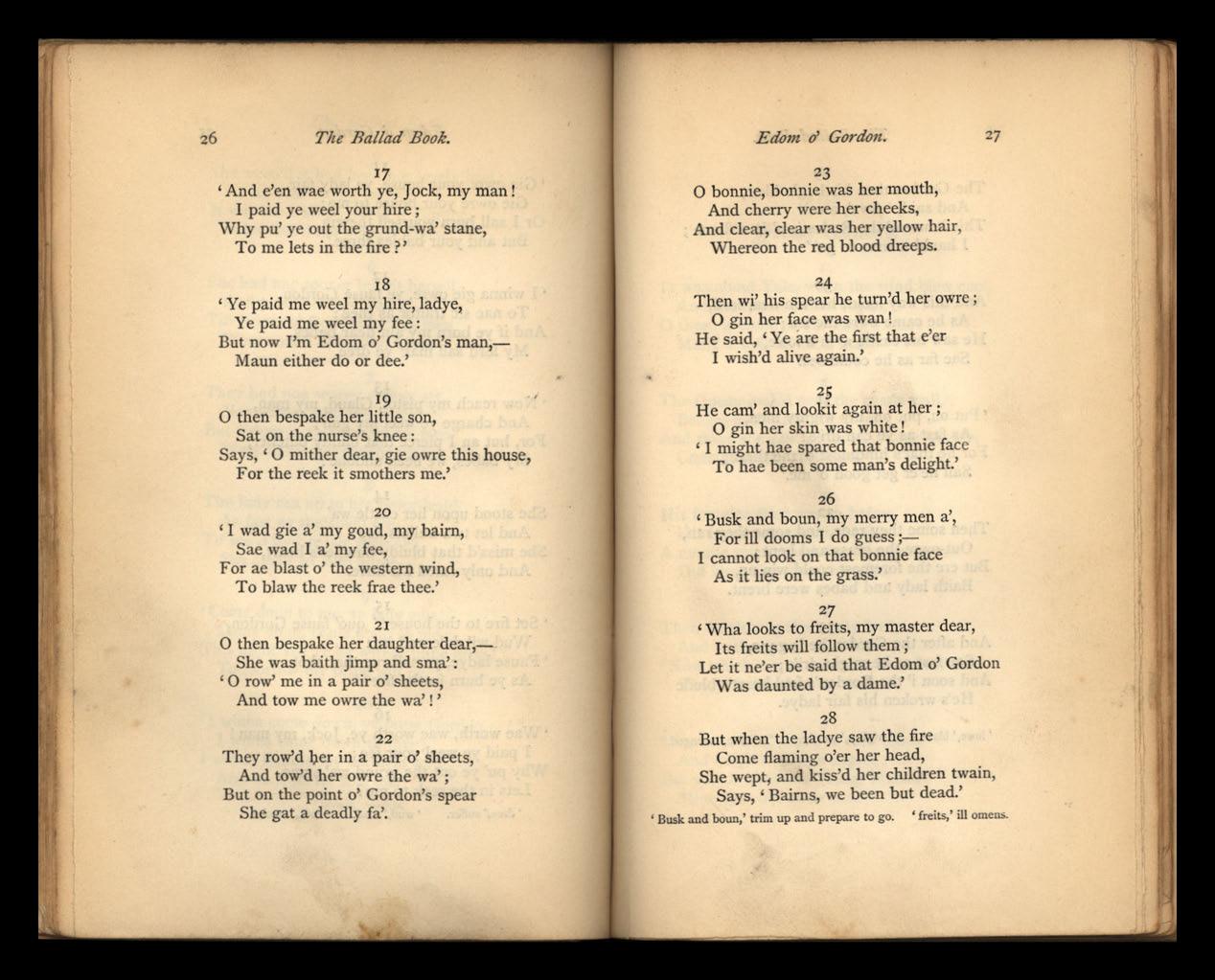
Edam 0' Gordolz.
23
o bonnie, bonnie was her mouth, And cherry were her cheeks, And clear, clear was her yellow hair , Whereon the red blood dreeps.
24
Then wi' his spear he turn'd her owre ; o gin her face was wan ! He said, 'Ye are the first that e'er I wish'd alive again.'
25
He cam' and lookit again at her; o gin her skin was white! , I might hae spared that bonnie fac e To hae been some man's delight.'
26
'Busk and boun, my merry men a', For ill dooms I do guess;I cannot look on that bonnie face As it lies on the grass.'
27
'Wha looks to freits, my master dear, Its freits will follow them;
Let it ne'er be said that Edom 0' Gordon Was daunted by a dame.'
28
But when the ladye saw the fire Come flaming o'er her head, She wept1 and kiss ' d her children twain, Says, ' Bairns, we been but dead.' , Busk and boun.' trim up and prepare to go. ' £reits,' ill omens.
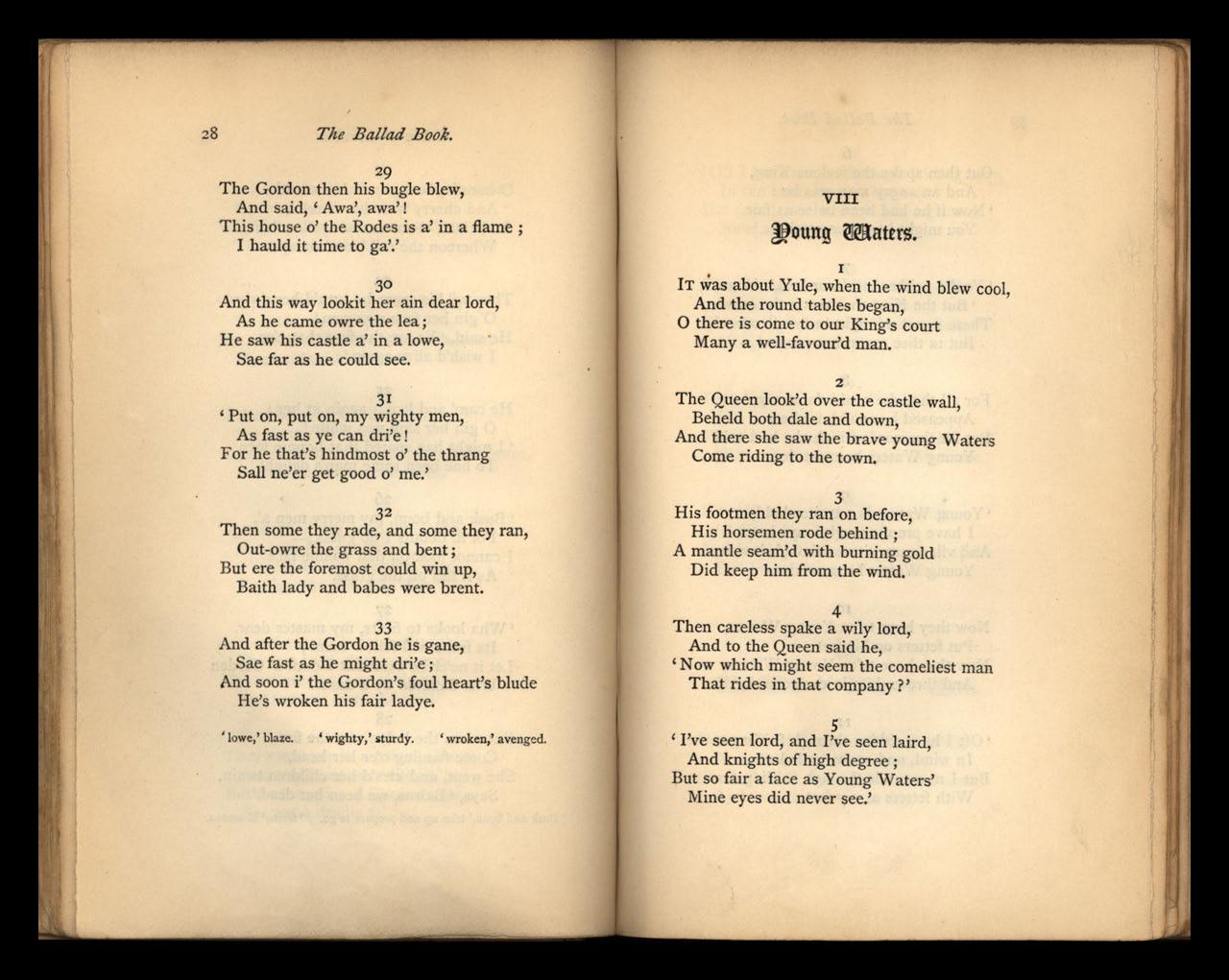
29
The Cordon then his bugle blew, And said, ' Awa', awa' !
This house 0 ' the Rodes is a' in a flame ; I hauld it time to ga'.'
30
And this way lookit her ain dear lord, As he came owre th e lea; He saw his castle a ' in a lowe, Sae far as he could see.
3 1
, Put on, put on, my wighty men, As fast as ye can dri 'e !
For he that' s hindmost 0' the thrang SaIl ne'er get good 0' me.'
3 2
Then some they rade, and some they ran, Out-owre the grass and bent; But ere the foremost could win up, Baith lady and babes were brent.
33
And after the Cordon he is gane, Sae fast as he might dri'e; And soon i' the Cordon's foul heart's blude He's wroken his fair ladye. lowe,' blaze. 'wighty,' iturdy. 'wroken,' avenged. VIII 1
IT was about Yule, when the wind blew cool, And the round tables began, o there is come to our King's court
Many a weIl-favour'd man.
2
The Queen look'd over the castle wall, Beheld both dale and down, And there she saw the brave young Waters Come riding to the town.
3
His footmen they ran on before, His horsemen rode behind; A mantle seam'd with burning gold
Did keep him from the wind.
4
Then careless spake a wily lord, And to the Queen said he, , Now which might seem the comeliest man That rides in that company?'
5
, I've seen lord, and I've seen laird, And knights of high degree; But so fair a face as Young Waters' Mine eyes did never see.'
Out then spake the jealous King,
And an angry man was he :
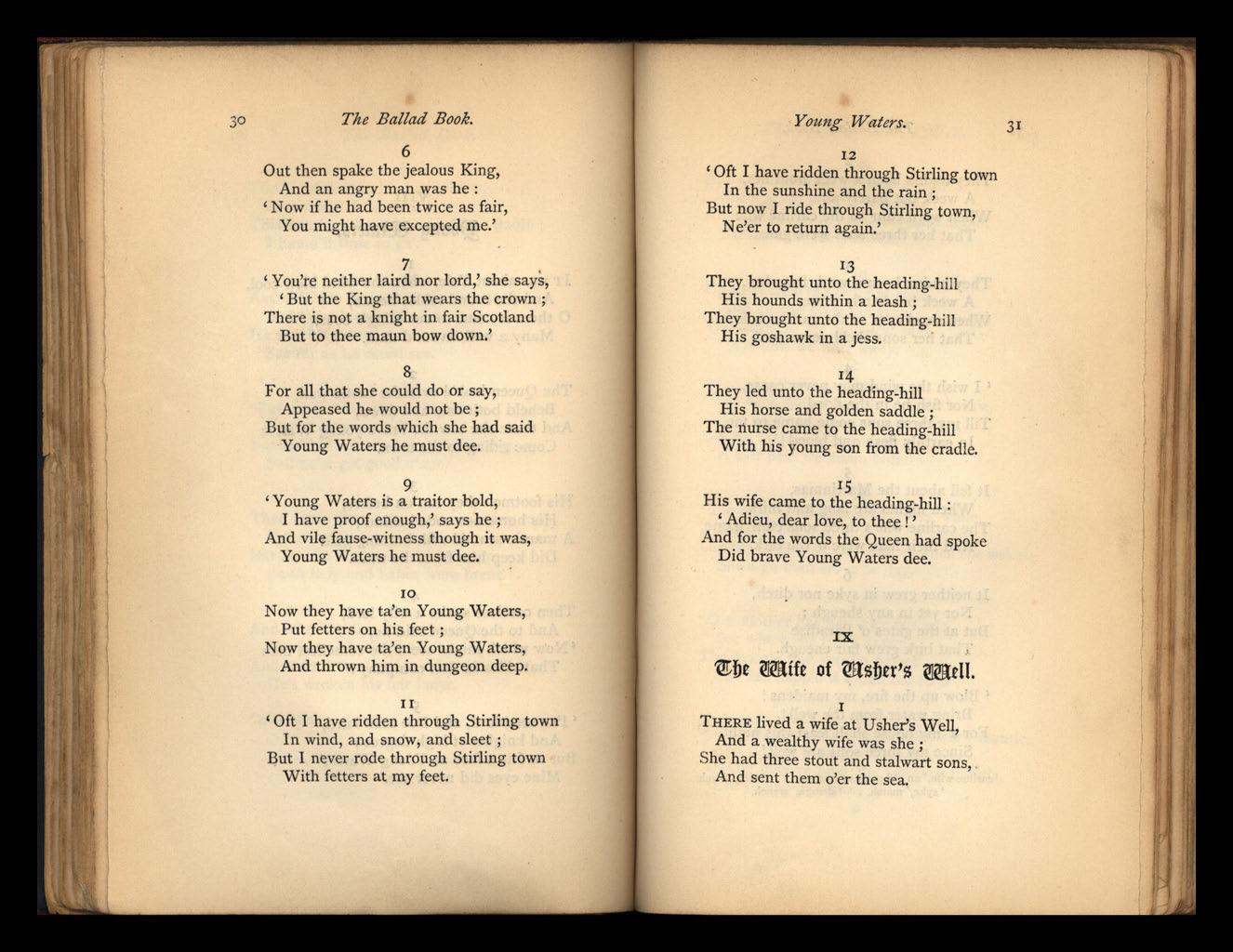
'Oft I have ridden through Stirling town
In the sunshine and the rain; , Now if he had been twice as fair,
But now I ride through Stirling town, You might have excepted me.'
Ne'er to return again.'
'You're neither laird nor lord,' she says,
They brought unto the heading-hill 'But the King that wears the crown; His hounds within a leash; There is not a knight in fair Scotland
But to thee maun bow down.'
8
For all that she could do or say,
They brought unto the heading-hill
His goshawk in a jess.
14
They led unto the heading-hill Appeased he would not be ;
His horse and golden saddle; But for the words which she had said
The nurse came to the heading-hill Young Waters he must dee.
With his young son from the cradle. 9
15
, Young Waters is a traitor bold,
His wife came to the heading-hill : I have proof enough,' says he ; , Adieu, dear love, to thee! ' And vile fause-witness though it was,
And for the words the Queen had spoke Young Waters he must dee. Did brave Young Waters dee.
10
Now they have ta'en Young Waters, Put fetters on his feet; Now they have ta'en Young Waters, IX And thrown him in dungeon deep.
'Oft I have ridden through Stirling town
THERE lived a wife at Usher's Well, In wind, and snow, and sleet;
And a wealthy wife was she; But I never rode through Stirling town
She had three stout and stalwart sons, With fetters at my feet. And sent them o'er the sea.
32 The Ballad Book.
2
They hadna been a week from her, A week but barely ane, When word cam' to the carline wife
That her three sons were gane.
3
They hadna been a week from her, A week but barely three, When word cam' to the carline wife
That her sons she'd never see.
4
, I wish the wind may never cease, N or fish be in the flood, Till my three sons come hame to me, In earthly flesh and blood!'
5
It fell about the Martinmas, When nights are lang and mirk, The carline wife's three sons cam' hame , And their hats were 0' the birk.
6
It neither grew in syke nor ditch, N or yet in any sheugh ; But at the gates 0' Paradise That birk grew fair eneugh.
7
, Blow up the fire, my maidens! Bring water from the well ! For a! my house shall feast this night, Since my three sons are well.'
'carline·wife,' an old peasant ·woman . 'birk,' birch. , syke,' marsh. she ug h,' trench.
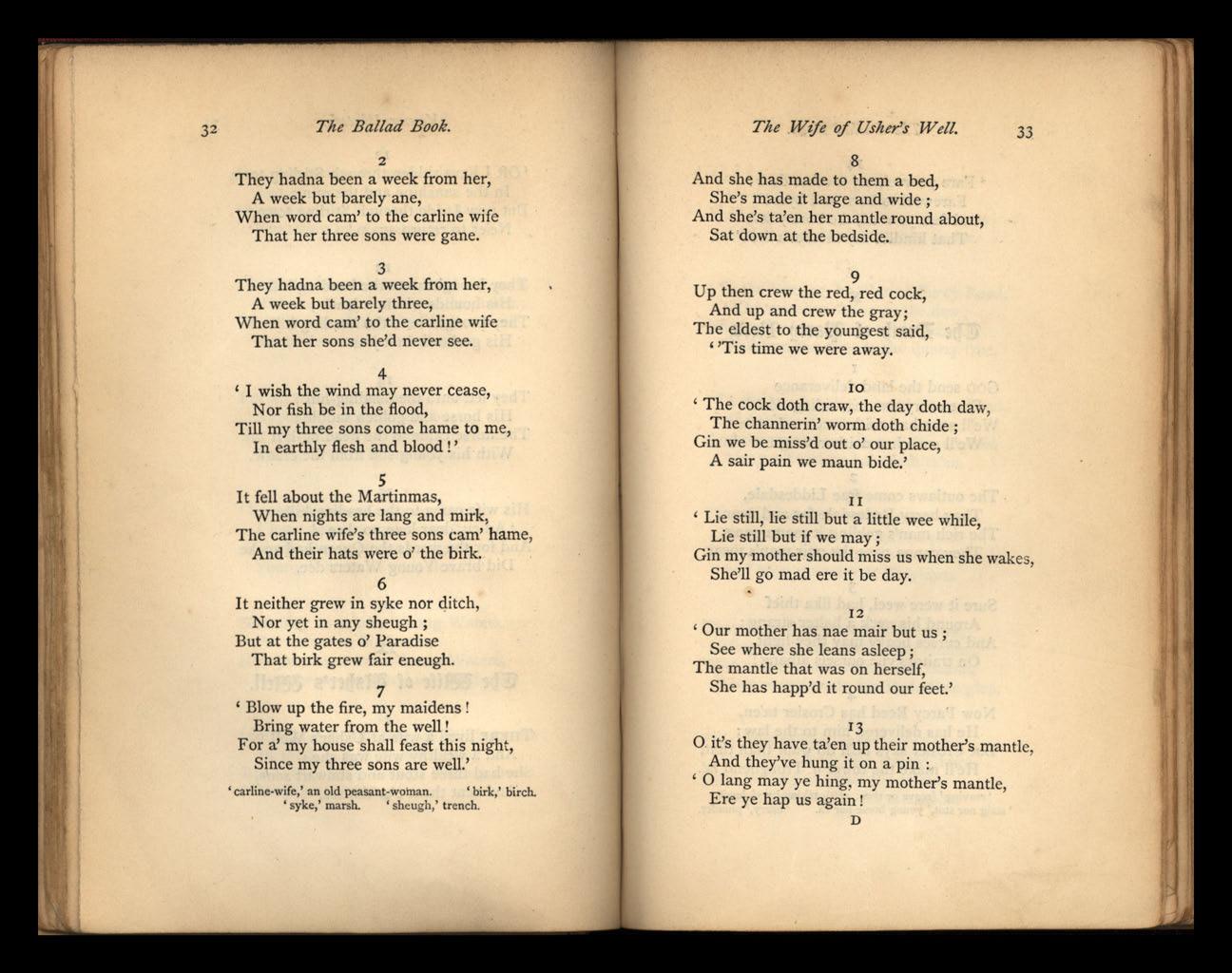
The Wife of Usher's Well. S
And she has made to them a bed, She's made it l arge and wide; And she's ta'en her mantle round about, Sat down at the bedside.
9
Up then crew the red, red cock, And up and crew the gray; The eldest to the youngest said, , 'Tis time we were away.
10
, The cock doth craw, the day doth daw, The channerin' worm doth chide; Gin we be miss'd out 0' our place, A sair pain we maun bide.'
11
, Lie still, lie still but a little wee while, Lie still but if we may;
Gin my mother should miss us when she wake s, She'll go mad ere it be day.
12
, Our mother has nae mair but us ; See where she leans asleep; The mantle that was on herself, She has happ'd it round our feet.'
13
o it's they have ta'en up their mother's mantle , And they've hung it on a pin:
, 0 lang may ye hing, my mother's mantle, Ere ye hap us again!
Ballad Book.
14
, Fare ye weel, my mother dear!
Fareweel to barn and ' byre!
And fare ye weel, the bonny lass That kindles my mothers fire!' x

I
GOD send the land d eliv erance
Frac every reaving, ridin g Scot !
We'll sune h ae neither cow nor ewe, We'll sune hae neither staig nor stot.
2
The outlaws come frae Liddesdale, They herry R ed es dale far and near; The rich man's gelding it maun gang, They canna pass the puir man's mear.
3
Sure it were weel, h a d ilka thief
Around his n eck a halter strang ; And curses he a vy may they light On traitors vile oursels amang!
4
Now Parcy Reed has Crosier ta'en, He has delivere d him to the law;
But Crosier says h e'll do waur than that, He'll make the tower 0' Troughend fa'.
'reaving' (reave or rive; reft), taking by violence. 'staig nor stot ,' young horse nor ox. 'herry,' plunder.
The Deatlt of Parcy R eed.
5
And Crosier says he will do waur-He will do waur if waur can be; He'll make Parcy's bairns a' fatherless i And Parcy's land may then lie lee.
6
, To the hunting, ho!' cried Parcy Reed , The morning sun is on the dew; , The cauler breeze frae off the fells Will lead the dogs to the quarry true.
7
, To the hunting, ! ) cried Parcy Reed, And to the huntmg he has gane; And the three fause Ha' s 0' Girsonsfield Alang wi' him he has them ta'en.
8
They hunted high, they hunted low, By heathery hill and birken shaw' They raised a buck on Rooke n And blew the mort at Ealylawe.
9
They hunted high, they hunted low, They made the echoes ring amain ; With music sweet 0' horn and hound They merry made fair Redesdale
10
They hunted high, they hunted low, They hunted up, they hunted down Until the day was past the prime, ' And it grew late in the afternoon.
36
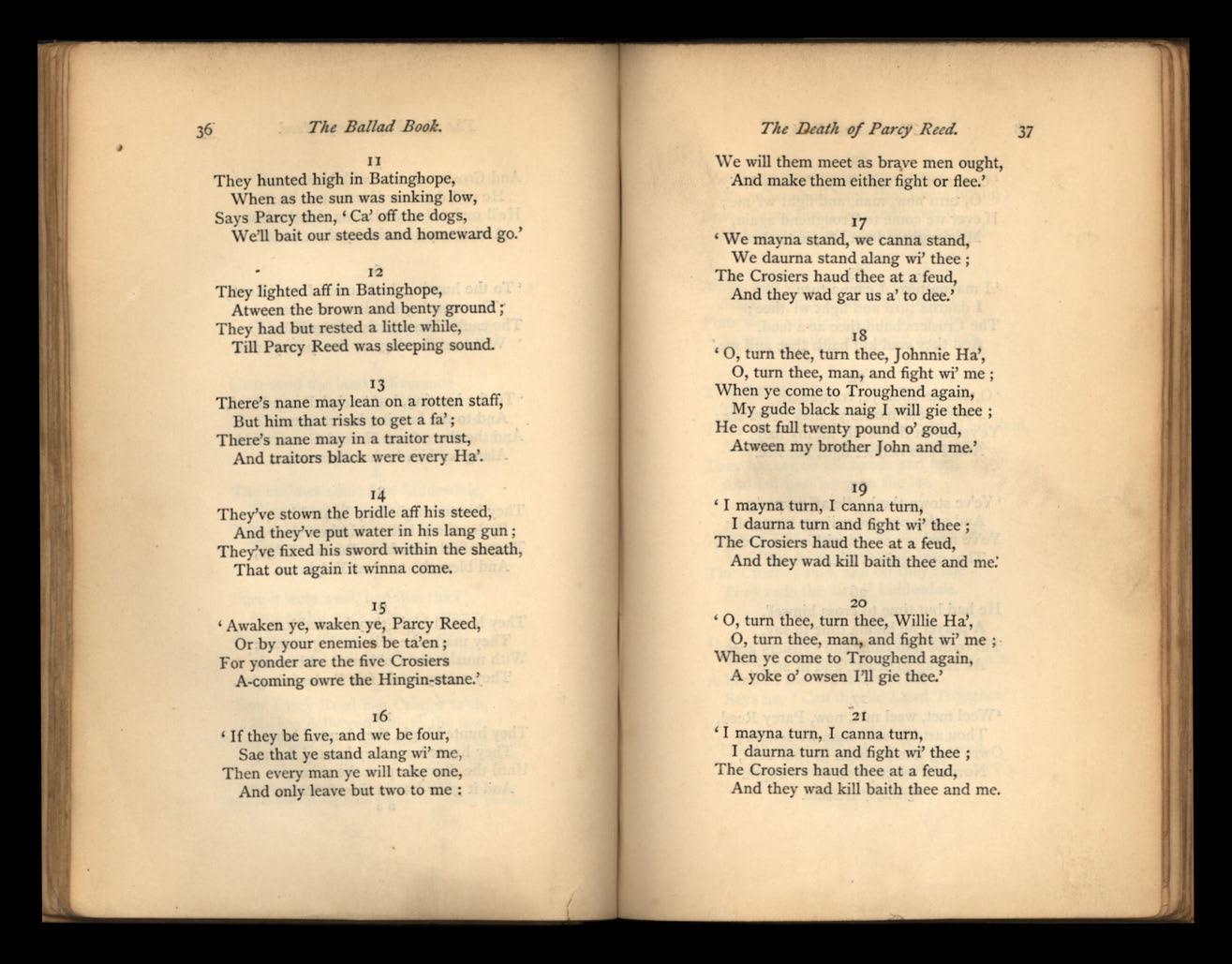
Tlte Ballad Book.
II
Tlte Ikatl: of Parcy Reed. 37
'Ye will them meet as brave men ought, They hunted high in Batinghope, And make them either fight or flee.'
\Vhen as the sun was sinking low, Says Parcy then, ' Ca' off the dogs, 17 'Ve'll bait our steeds and homeward go.'
'We mayna stand, we canna stand, We daurna stand alang wi' thee;
12
They lighted aff in Batinghope,
The Crosiers haud thee at a feud, Atween the brown and benty ground;
And they wad gar us a' to dee.' They had but rested a little while, IS Till Parcy Reed was sleeping sound.
'0, turn thee, turn thee, Johnnie Ha',
13 0, turn thee, man, and fight wi' me ;
There's nane may lean on a rotten staff,
When ye come to Troughend again, But him that risks to get a fa' ;
My gude black naig I will gie thee; There's nane may in a traitor trust,
He cost full twenty pound 0' goud, And traitors black were every Ha'.
14
They've stown the bridle aff his steed,
Atween my brother John and me.'
19
, I mayna turn, I canna turn, And they've put water in his lang gun ; I turn and fight wi' thee; They've fixed his sword within the sheath,
The Crosiers haud thee at a feud That out again it winna come. And they wad kill baith thee me:
15
'Awaken ye, waken ye, Parcy Reed,
20
' 0, turn thee, turn thee, Willie Ha', Or by your enemies be ta'en ; 0, turn thee, man, and fight wi' me ; For yonder are the five Crosiers
'Vhen ye come to Troughend again, A-coming owre the Hingin-stane.'
16
, If they be five, and we be four,
A yoke 0' owsen I'll gie thee.'
21
' I mayna turn, I canna turn, Sae that ye stand alang wi' m e, I daurna turn and fight wi' thee; Then every man ye will take one,
The Crosiers haud thee at a feud, And only leave but two to me :
And they wad kill bailh thee and me.
Tlte Ballad Book.
22
, 0, turn thee, turn thee, Tommy Ha', 0, turn now, man, and fight wi' me; If ever we come to Troughend again, My daughter Jean I'll gie to thee.'
23
, I mayna turn, I canna turn, I daurna turn and fight wi' thee; The Crosiers haud thee at a feud, And they wad kill baith thee and me.'
24
'0, shame upon ye, traitors a'!
I wish your hames ye may never see; Ye've stown the bridle affmy naig, And I can neither fight nor flee.
25
, Ye've stown the bridle aff my naig, And ye've put water i' my lang gun; Ye've fixed my sword within the sheath, That out again it winna come.'
26
He had but time to cross himsel', A prayer he hadna time to say Till round him the keen All riding graithed, and in array. '
27
'Weel met, weel met, now, Parcy Reed, Thou art the very man we sought; Owre lang hae we been in your debt, Now will we pay you as we ought.
• graithed,' accoutred.

Tlte Death of Parcy Reed.
28
'We'll pay thee at the nearest tree, Where we shall hang thee like a hound;' Brave Parcy rais'd his fankit sword, And fell'd the foremost to the ground.
29
Alake, and wae for Parcy Reed, Alake, he was an unarmed man ; Four \\feapons pierced him all at once, As they assailed him there and than.
30
They fell upon him all at once, They mangled him most cruellie ;
39 Their slightest wound might caused his deid, And they have gi'en him thirty-three. They hacket off his hands and feet, And left him lying on the lee.
3 1
, Now, Parcy Reed, we've paid our debt, Ye canna weel dispute the tale,'
The Crosiers said, and off they radeThey rade the airt 0' Liddesdale.
32
It was the hour 0' gloamin' gray, When herds come in frae fauld and pen; A herd he saw a huntsman lie, Says he, 'Can this be Laird Troughen' ? '
33
, There's some will ca' me Parcy Reed, And some will ca' me Laird Troughen'; 'fankit,' entangled.
40 The Ballad Book.
It's little matter what they ca' me, My faes hae made me ill to ken.
34
, There's some will ca' me Parcy Reed, And speak my praise in tower and town; It's matter what they do now, My life-blood rudds the heather brown.
35
'There's some will ca' me Parcy Reed, And a' my virtues say and sing; But now I would much rather hae
A draught 0' water frae the spring!'
36
The herd flung aff his clouted shoon, And to the nearest fountain ran; He made his bonnet serve a cup, And wan the blessing 0' the dying man.
37
'Now, honest herd, ye maun do mair,Ye maun do mair as I ye tell; Ye maun bear tidings to Troughend , And bear likewise my last farewell.
3 8
, A farewell to my wedded wife, A farewell to my brother John, Wha sits into th e Troughend tower, Wi' heart as hard as any stone.
39
, A farewell to my daughter Jean, A farewell to my young sons five;
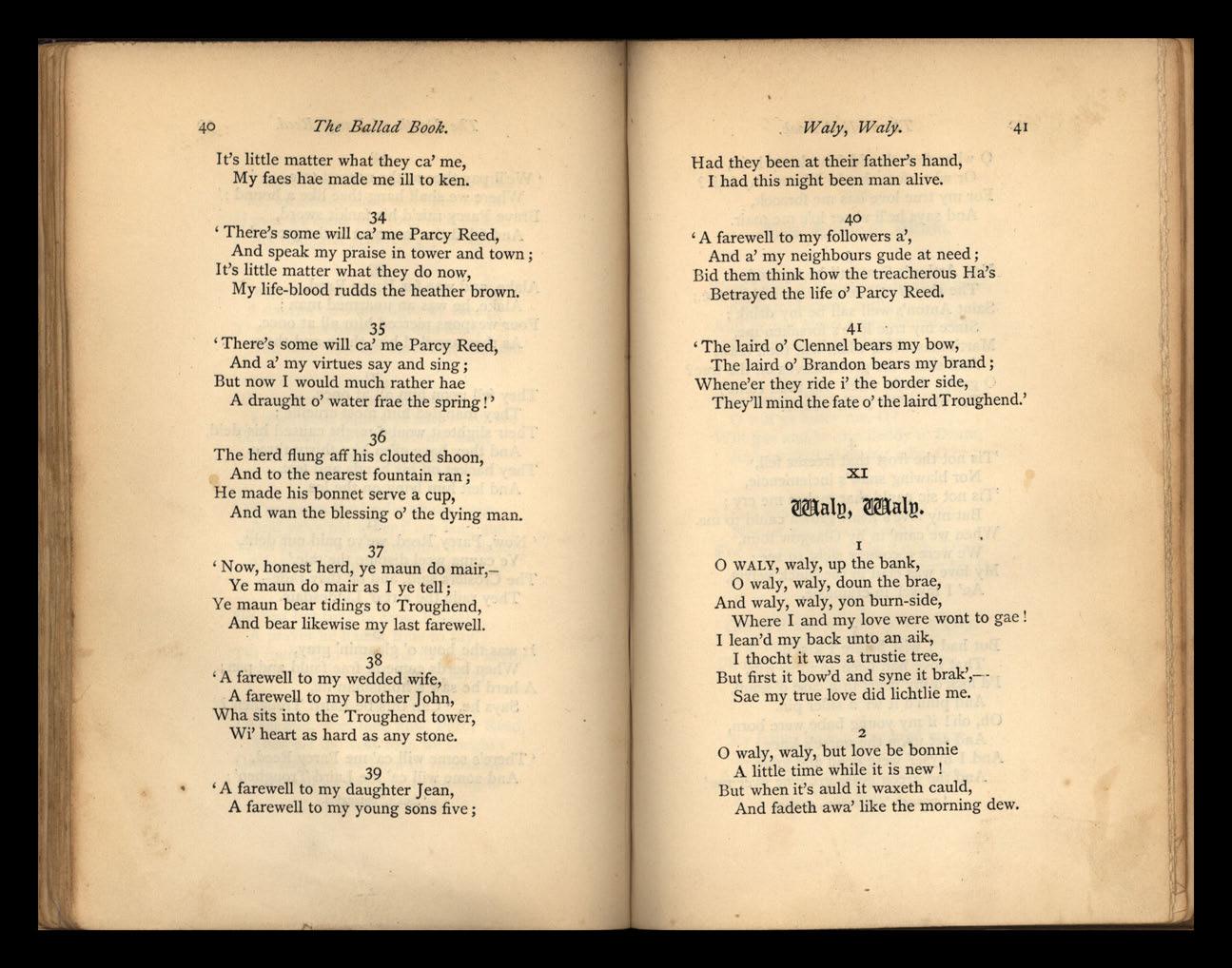
Had they been at their father's hand, I had this night been man alive.
40
'A farewell to my followers a', And a' my neighbours gude at need; Bid them think how the treacherous Ha's Betrayed the life 0' Parcy Reed.
41
, The laird 0' Clennel bears my bow, The laird 0' Brandon bears my brand; Whene'er they ride i' the border side,
They 'll mind the fate 0' the laird Troughend.' XI I
o WALY, waly, up the bank, o waly, waly, doun the brae, And waly, waly, yon burn-side, Where I and my love were wont to gae ! I lean'd my back unto an aik, I thocht it was a trustie tree, But first it bow'd and syne it brak',- .
Sae my true love did lichtlie me.
2
o waly, waIy, but love be bonnie
A little time while it is new!
But when it's auld it waxeth cauld, And fadeth awa' like the morning dew.
42 TIle Ballad Book.
o wherefore should I busk my he id, Or wherefore should I kame my hair?
For my true love has me forsook, And says he'll never lo'e me mair.
3
N 00 Arthur's Seat saIl be my bed,
,!,he saIl ne'er be press'd by me ; Samt Anton s well saIl be my drink'
Since my true love's forsaken me. '
Martinmas wind, when wilt thou blaw, And shake the green leaves off the tree?
o gentle death, when wilt thou come?
For o( my life I am wearie.
4
'Tis not the frost that freezes fell
Nor blawing snaw's inclemencle
'Tis not sic cauld that makes me ;
But my love's heart grown cauld to me.
When we cam' in by Glasgow toun,
We were a comely sicht to see; My love was clad in the black velvet
An' I mysel' in cramasie. '
5
But had I wist -before I kiss'd
That love had been so ill to win
I'd lock'd my heart in a case 0'
And pinn'd it wi' a siller pin.
Oh, oh! if my young babe were born, And set upon the nurse's knee' • And I mysel' were dead and And the green grass growing over me!
I cramasie' (cramoisie ), crim so n.

lLllirll 0' 19 rum.
THE Laird 0' Drum is a-hunting gane, All in a morning early, And he has spied a weel-faur'd May, A-shearing at her barley.
z
, My bonny May, my weel-faur'd May, o will ye fancy me, 0 ? Wilt gae and be the Leddy 0' Drum, And let your shearing a-be, O?'
3
'It's I winna fancy you, kind sir, Nor let my shearing a-be, 0 ; For I'm ower low to be Leddy Drum, And your light love I'll never be, 0.'
4
, Gin ye'Il cast aff that gown 0' grey, Put on the silk for me, 0, I'll make a vow, and keep it true, A light love you'll never be, 0.'
5
, My father he is a shepherd mean, Keeps sheep on yonder hill, 0, And ye may gae and speer at him, For I am at his will, 0.'
TIle Lalrd 0' Drum.
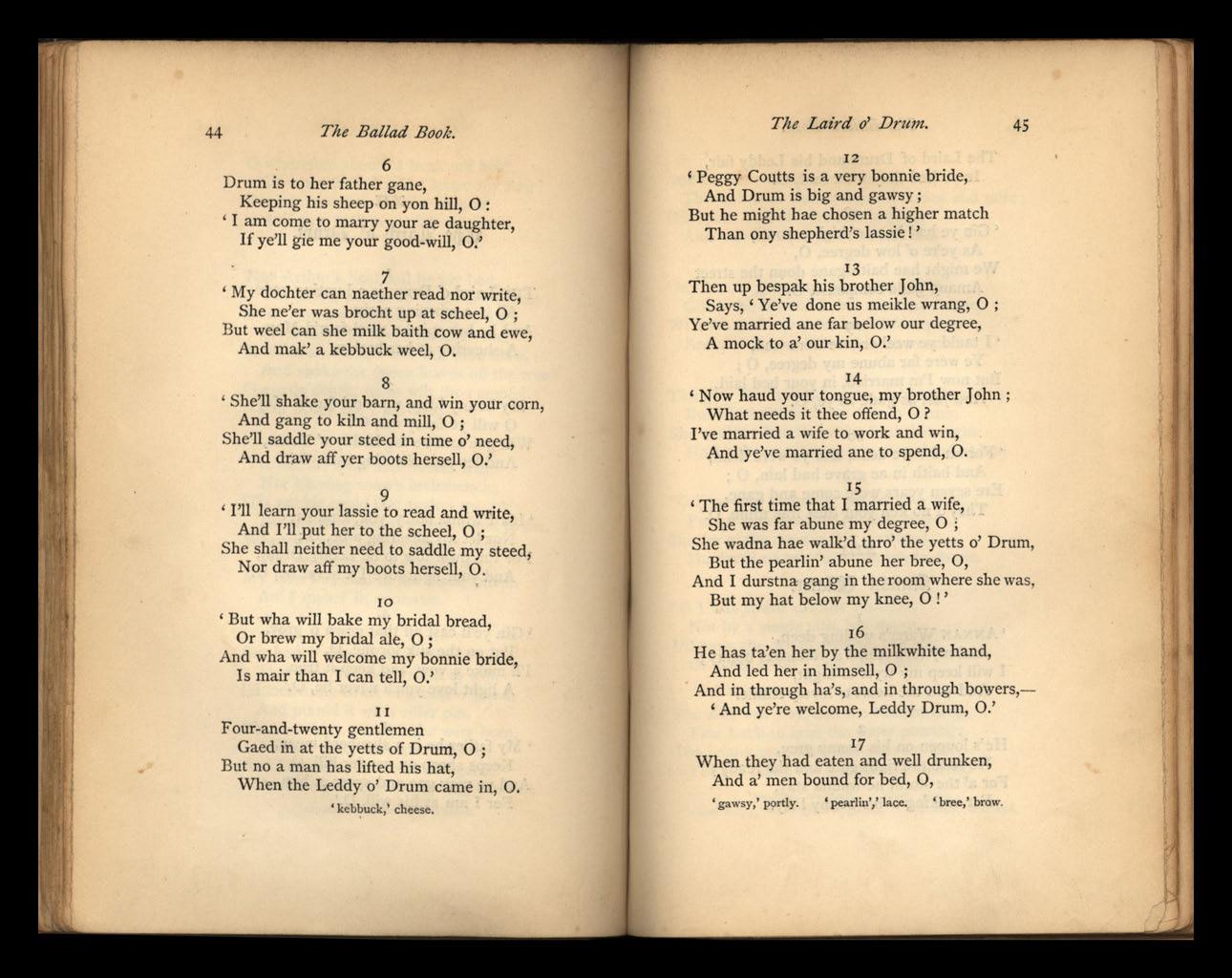
44 The Ballad Book.
6
Drum is to her father gane
Keeping his sheep on hill, 0 :
, I am come to marry your ae daughter If ye'll gie me your good-will, 0.' '
, My dochter can read nor write She ne'er was bro.cht up at scheel, 0 ;' But weel can she mIlk baith cow and ewe And mak' a kebbuck weel, O. '
8
, She'll shake your barn, and win your corn And gang to kiln and mill O· '
She'll saddle your steed in need And draw aff yer boots hersell, 0.' '
9
, I'll learn your lassie to read and write And I'll put her to the scheel O· '
She shall neither need to m; steed, Nor draw affmy boots hersell, O.
10
, But wha will bake my bridal bread Or brew my bridal ale O· ' , , And wha will welcome my bonnie bride Is mair than I can tell, 0.' '
11
Four-and-twenty gentlemen
Gaed in at the yetts of Drum, 0 ; But no a man has lifted his hat, When the Leddy 0' Drum came in, O. cheese.
45
12
, Peggy Coutts is a very bonnie bride, And Drum is big and gawsy; But he might hae chosen a higher match Than ony shepherd's lassie! '
13
Then up bespak his brother John, Says, 'Ye've done us meikle wrang, 0 ; Ye've married ane far below our degree, A mock to a' our kin, 0.'
14
, Now haud your tongue, my brother John; What needs it thee offend, 0 ?
I've married a wife to work and win, And ye've married ane to spend, O.
15
, The first time that I married a wife, She was far abune my degree, 0 ;
She wadna hae walk'd thro' the yetts 0' Drum, But the pearlin' abune her bree, 0, And I durstna gang in the room where she was, But my hat below my knee, 0 ! '
16
He has ta'en her by the milkwhite hand, And led her in himsell, 0 ; And in through ha's, and in through bowers,, And ye're welcome, Leddy Drum, 0.'
17
When they had eaten and well drunken, And a' men bound for bed, 0, gawsy,' portly. 'pearHn',' lace. 'bree,' bro.w.
The Ballad Book.
The Laird of Drum and his Leddy fair, In ae bed they were laid, O.
18
, Gin ye had been 0' high renown, As ye're 0' low degree, 0, We might hae baith gane doun the street Amang gude companie, 0.'
19
, I tauld ye weel ere we were wed, Ye were far abune my degree, 0 ; But now I'm married , in your bed laid, And just as gude as ye, O.
20
'For an I were dead, and ye were dead, And baith in ae grave had lain, 0 ; Ere seven years were come and gane, They'd no ken your dust frae mine, 0.'
XIII mlater. I
'ANNAN Water's wading deep, And my love Annie's wondrous bonny; I will keep my tryst to-night, And win the heart 0' lovely Annie.'
2
He's loupen on his bonny grey, He rade the right gate and the ready; For a' the storm he wadna stay, For seeking 0' his bonny lady.
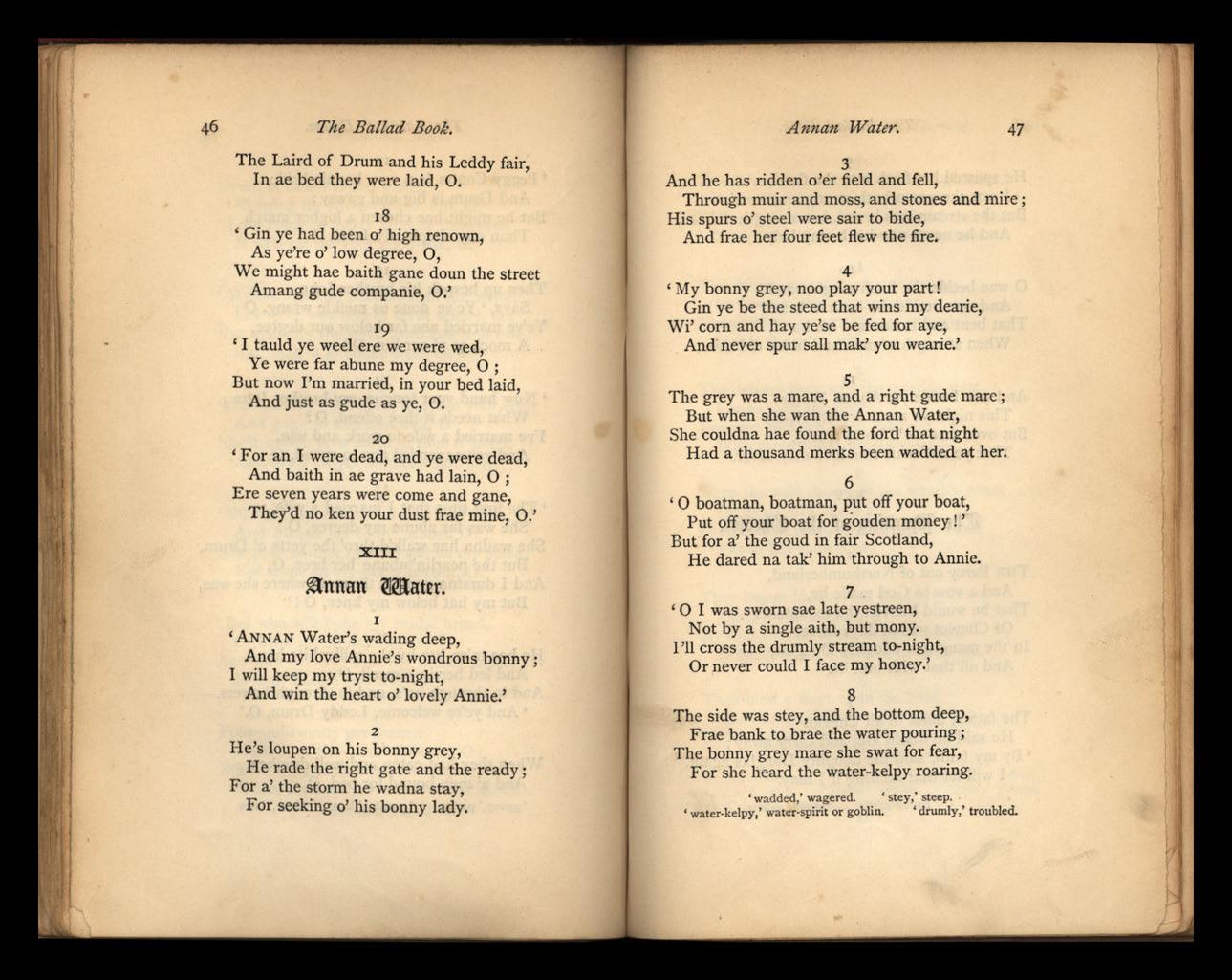
AlIlIa1Z Watey. 47
3
And he has ridden o'er field and fell, Through muir and moss, and stones and mire; His spurs 0' steel were sair to bide, And frae her four feet flew the fire.
4
, My bonny grey, noo play your part! Gin ye be the steed that wins my dearie, Wi' corn and hay ye' se be fed for aye, And never spur sall mak' you wearie.'
5
The grey was a mare, and a right gude marc; But when she wan the Annan Water, She couIdna hae found the ford that night Had a thousand merks been wadded at her.
6
, 0 boatman, boatman, put off your boat, Put off your boat for gouden money! '
But for a' the goud in fair Scotland, He dared na tak' him through to Annie.
7
'0 I was sworn sae late yestreen, Not by a single aith, but mony. 1'11 cross the drumly stream to-night, Or never could I face my honey.'
8
The side was stey, and the bottom deep, Frae bank to brae the water pouring; The bonny grey mare she swat for fear, For she heard the water-kelpy roaring.
f wadde d,' wage re d. ' stey ,' steep. water-ke lpy, ' wa te r-spirit or goblin. drumly/ troubled..
Tlte Ballad Book.
9
He spurred her forth into the flood, I wot she swam both strong and steady; But the stream was broad, her strength did fail, And he never saw his bonny lady.
10
o wae betide the frush saugh wand! And wae betide the bush of brier! That bent and brake into his hand, When strength of man and horse did tire.
11
And wae betide ye, Annan Water!
This night ye are a drumly river; But over thee we'll build a brig, That ye nae mair true love may sever.
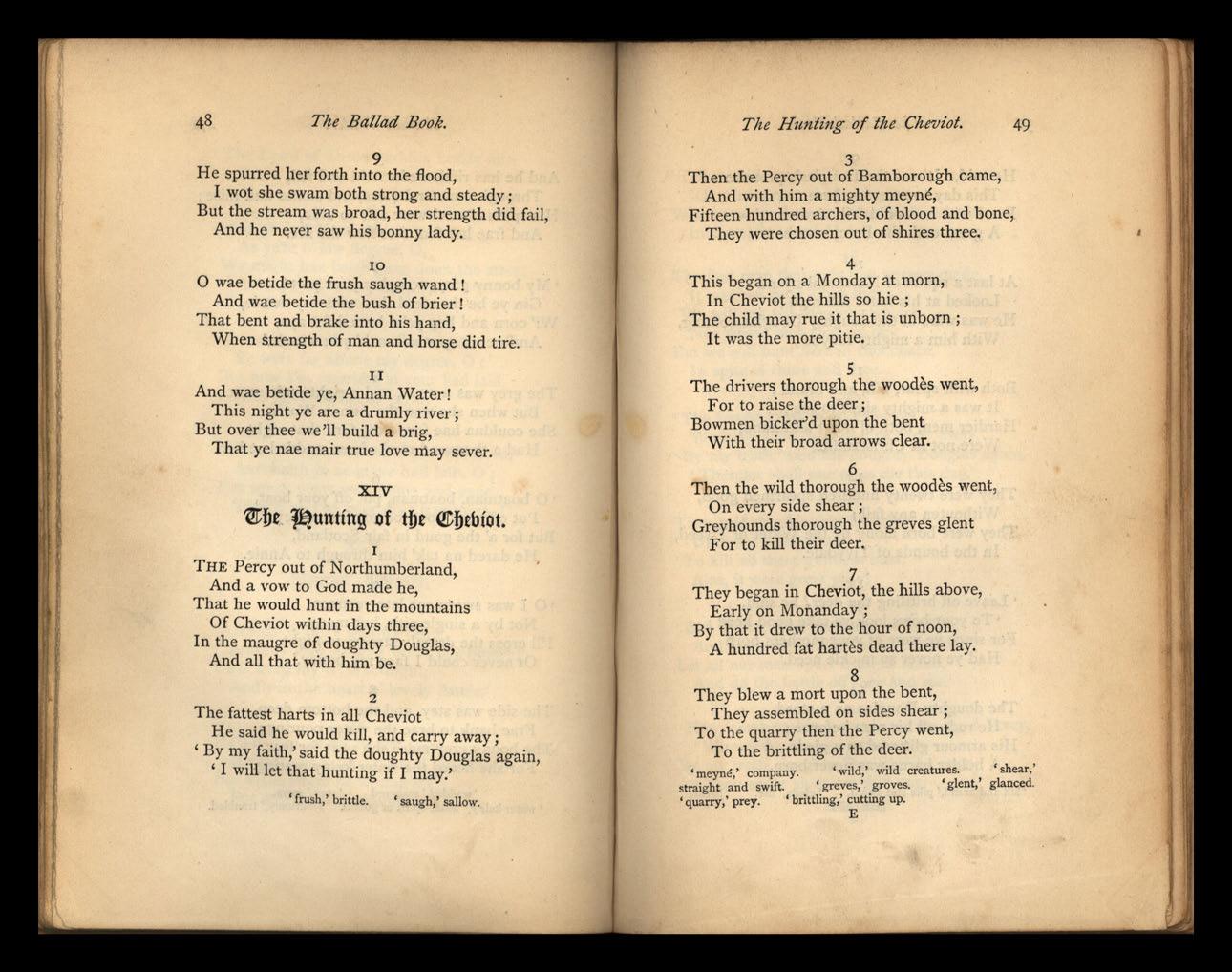
of tfJr C!CfJebiot.
THE Percy out of Northumberland, And a vow to God made he, That he would hunt in the mountains Of Cheviot within days three, In the maugre of doughty Douglas, And all that with him be.
2
The fattest harts in all Cheviot He said he would kill, and carry away; , By my faith,' said the doughty Douglas again , I will let that hunting if I may.' '
I frush,' brittle. I saugh,' sallow.
TIle Hunting of tIle Clteviot.
3
Then the Percy out of Bamborough came, And with him a mighty meyne, 49 Fifteen hundred archers, of blood and bone, They were chosen out of shires three.
4
This began on a Monday at mom, In Cheviot the hills so hie; The child may rue it that is unborn ; It was the more pitie.
5
The drivers thorough the woodes went, For to raise the deer; Bowmen bicker'd upon the bent With their broad arrows clear.
6
Then the wild thorough the woodes went , On every side shear; Greyhounds thorough the greves glent F or to kill their deer.
7
They began in Cheviot, the hills above, Early on Monanday ; By that it drew to the hour of noon, A hundred fat hartes dead there lay.
8
They blew a mort upon the bent, They assembled on sides shear; To the quarry then the Percy went, To the brittling of the deer.
'meyne,' company. I wild,' wild creatures. 'shear,' straight and swift. 'gre ves,' groves. f glent,' glanced . f quarry,' prey. f brittling,' cutting up.
50 TIle Ballad Book.
9
He said, ' It was the Douglas's promise This day to meet me here: But I wist he would fail, verament,'A great oath the Percy sware.
10
At last a squire of orthumberland Looked at his hand full nigh; He was ware of the doughty Douglas coming, With him a mighty meyne ; II
Both with spear, bill, and brand; It was a mighty sight to see; Hardier men, both of heart and hand, Were not in Christiantie.
12
They were twenty hundred spearmen good, Withouten any fail; They were born along by the \Vater of Tweed, In the bounds of Tivydale.
13
, Leave off brittling the deer,' he said, 'To your bows look ye take good heed; For since ye were of your mothers born Had ye never so mickle need.'
14
The doughty Douglas on a steed He rode all his men befome ; His armour glittered as a glede; A bolder barne was never born.
f bill brand,' pike and sword. f glede,' fire. ' barnc,' man -child.
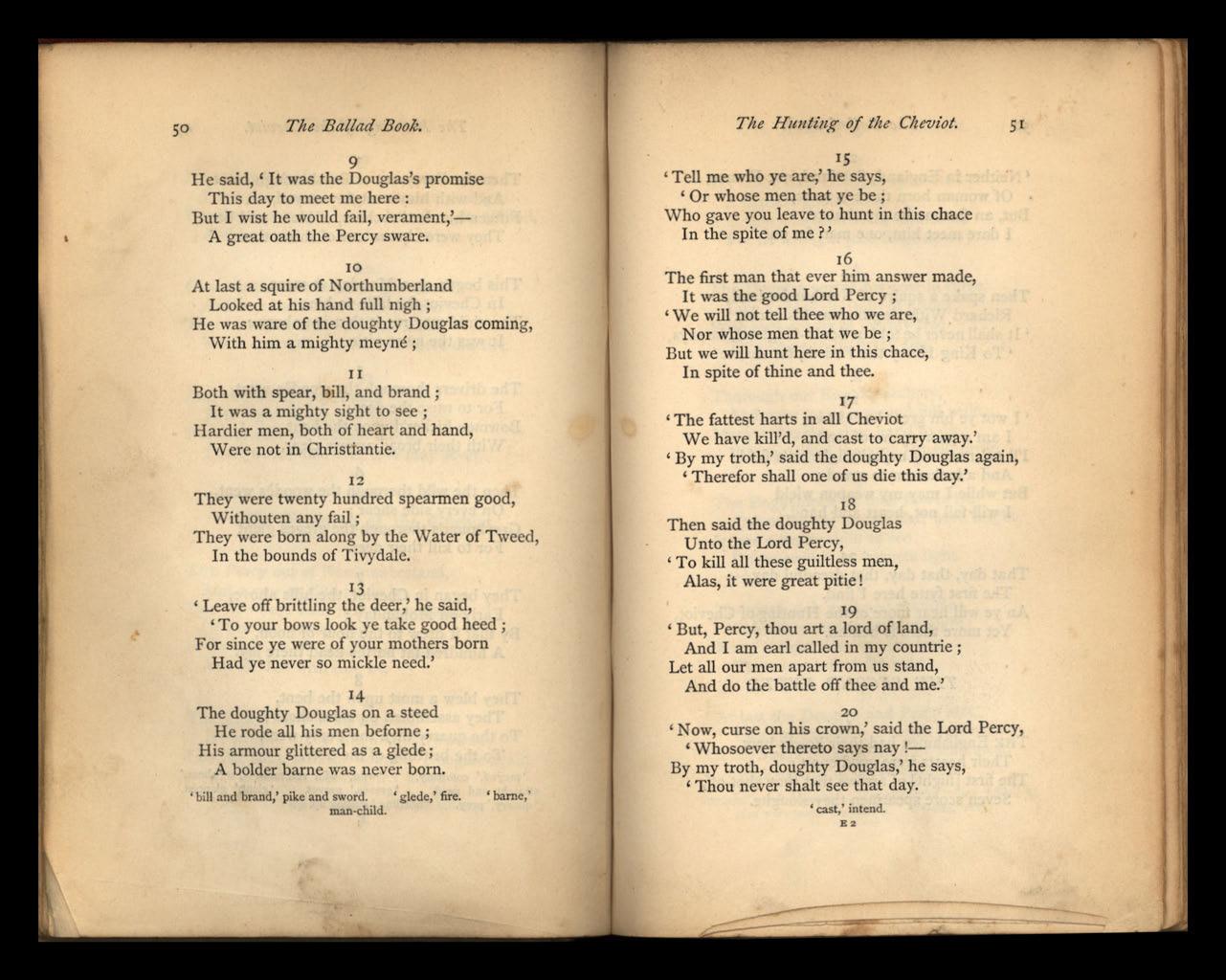
Tlte HUllting of tlte Cl/evio!.
'Tell me who ye are,' he says, , Or whose men that ye be ; Who gave you leave to hunt in this chace In the spite of me ?'
16
The first man that ever him answer made, It was the good Lord Percy ; 'We will not tell thee who we are, N or whose men that we be ; But we will hunt here in this chace, In spite of thine and thee.
17
, The fattest harts in all Cheviot We have kill'd, and cast to carry away.'
, By my troth,' said the doughty Douglas again, , Therefor shall one of us die this day.'
18
Then said the doughty Douglas Unto the Lord Percy, , To kill all these guiltless men, Alas, it were great pitie!
19
, But, Percy, thou art a lord of land, And I am earl called in my countrie ; Let all our men apart from us stand, And do the battle off thee and me.'
20
'Now, curse on his crown,' said the Lord Percy, 'Whosoever thereto says nay !-
By my troth, doughty Douglas,' he says, 'Thou never shalt see that day. , cast,' intend. B2
52 TIle Ballad Book.
21
, Neither in England, Scotland, nor France, , Of woman born there is none; But, an fortune be my chance, I dare meet him, one man for one.'
22
Then spake a squire of Northumberland · Richard Witherington was his name: '
, It shall never be told in South-England' he says 'To King Harry the Fourth, for '
23
, I wot ye bin great lord es two, I am a poor squire of land ; I'll ne'er see my captain fight on a field, And a looker-on to stand: But while I may my weapon wield I will fail not, heart and hand.'
24
That day, th at day, that dreadful day !The first fytte here I find. An ye will h ear more of the Hunting of Chevio t Yet more there is behind. '
THE SECOND FYTTE.
1
THE Engli shmen had their bowes bent Their hearts were good enow; ,
The first [flight] of arrows that they shot off. Seven score spearmen they sloughe. '
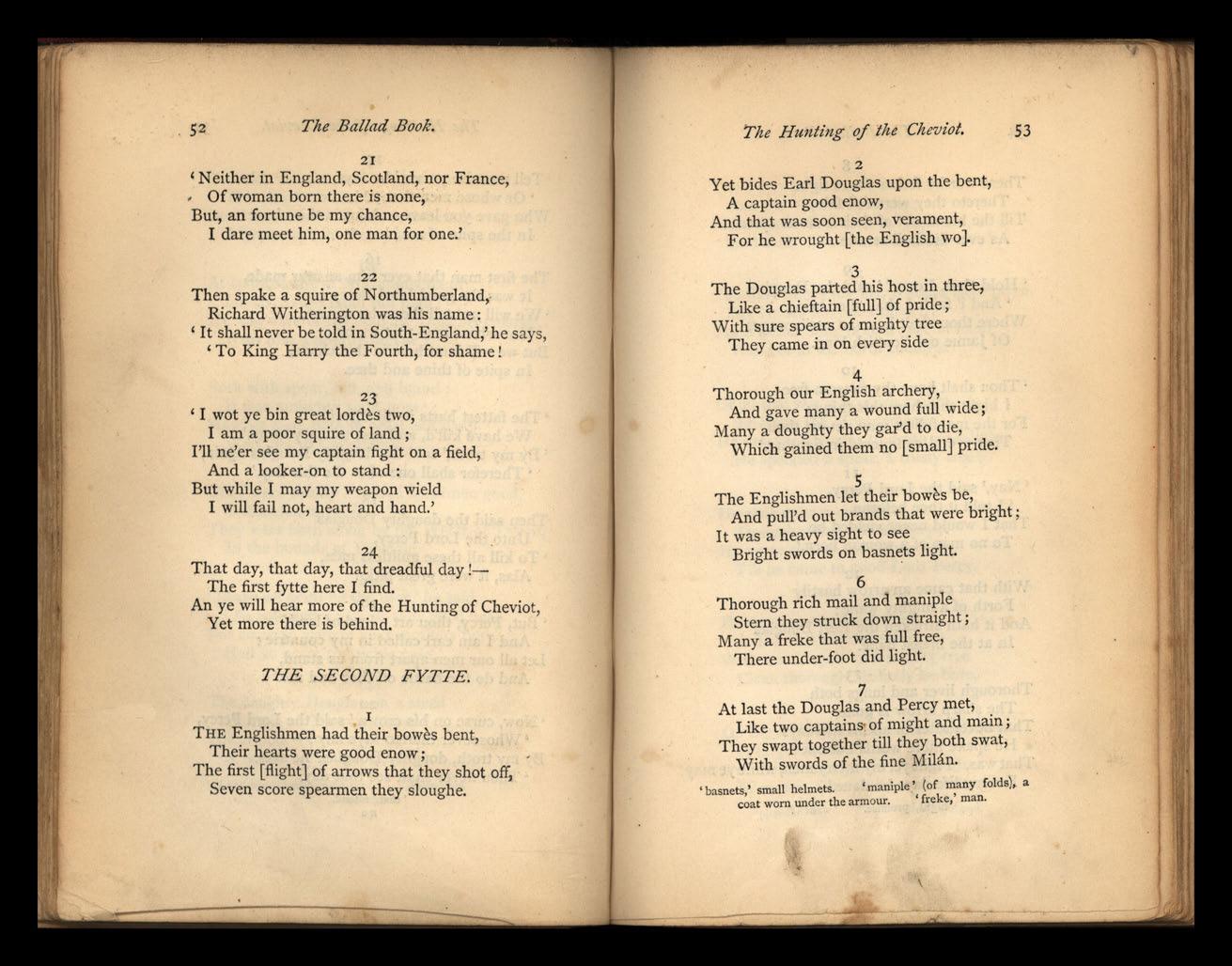
'rlu Hunting of lite Clt eviot.
2
Yet bid es Earl Douglas upon the bent, A captain good enow, And that was soon seen, verament, For he wrought [the English wo].
3
The Douglas parted his host in three, Like a chieftain [full] of pride; With sure spears of mi ghty tree They came in on every side
4
Thorough our English archery, And gave many a wound full wide j Many a doughty they gar'd to die, Which gained them no [small] pride.
5
The Englishmen let their bowes be, And puIl'd out brands that were bright; It was a heavy sight to see Bright swords on basnets light.
6
Thorough rich mail and maniple Stern they struck down straight j Many a freke that was full free, There under-foot did light.
7
At last the Douglas and Percy met, Like two captains. of might and main; They swapt together till they both swat, With swords of the fine Mihin. 'basnets,' small helmets. 'maniple' (o f many folds)" a c oa t worn under the arm our. ' freke,' man.
54 TIle Ballad
8
These worthy frekes for to fight
Thereto they were full fain, Till the blood out of their basnets sprent As ever did hail or rain .
9
, Hold thee, Percy ! ' said the Douglas, , And i' faith I shall thee bring Where thou shalt have an earl's wages Of Jarme our Scottish king.
10
, Thou shalt have thy ransom free i
I hight thee here this thing i
For the manfullest man yet a rt thou That ever I conquered in fighting.'
II
, Nay,' said the Lord Percy, , I told it thee beforne,
That I would never yielded be To no man of a woman born.'
12
With that came an arrow hastily Forth of a mighty wane i And it hath stricken the Earl Douglas In at the breast bane.
13
Thorough liver and lungs both
The sharp arrow is gone, That never after in all his life-days
He spake more words but one:
That was, ' Fight ye, my merry men, wbile ye may! For my life-days be done.'
. bight,' promise. wan e,' ?

14
The Percy leaned on his brand, And saw the Douglas die; He took the dead man by the hand, And said, ' \Vo is me for thee! IS 55
, To have saved thy life, I would have gi"en My landes for years three i For a better man, of heart nor of hand, Was not in the north countrie.'
16
Of all that saw a Scottish knight, Sir Hugh the Montgomeriei . He saw the Douglas to death was dlght; He spended a spear, a trusty tree i
17
He rode upon a courser Through a hundred archery i
He never stinted, nor never blan, Till he came to good Lord Percy.
18
He set upon the Lord Percy A dint that was full sore i With a sure spear of a mighty tree
Clean thorough h is body he bore,
19
On the other side that a man might see
A large cloth-yard and mair. . Two better captains in Christentle Were not, than the two slain there. 'spended ,' ! 'blan,' stopped. •
The Ballad Book.
20
An archer of orthurnberland Saw slain was the Lord Percy: He bare a bend-bow in his hand Was made of trusty tree.
21
An arrow, that was a cloth-yard long, To the hard steel haled he; A dint he set, was both sad and sore, On Sir Hugh the Montgomerie.
22
The dint it was both sad and sore That he on Montgomerie set; The swan-feathers the arrow bore With his heart's-blood they were wet.
23
There was never a freke one foot would flee, But still in stour did stand, Hewing on each other, whilt: they might dree, With many a baleful brand.
24
This battle began in Cheviot
An hour before the noon, And still when even-song bell was rung The battle was not half done .
25 They took [off] on either hand • By the light of the moon; Many had no strength for to stand, In Cheviot the hills aboon. stour,' turmoil of fight dree,' endure.
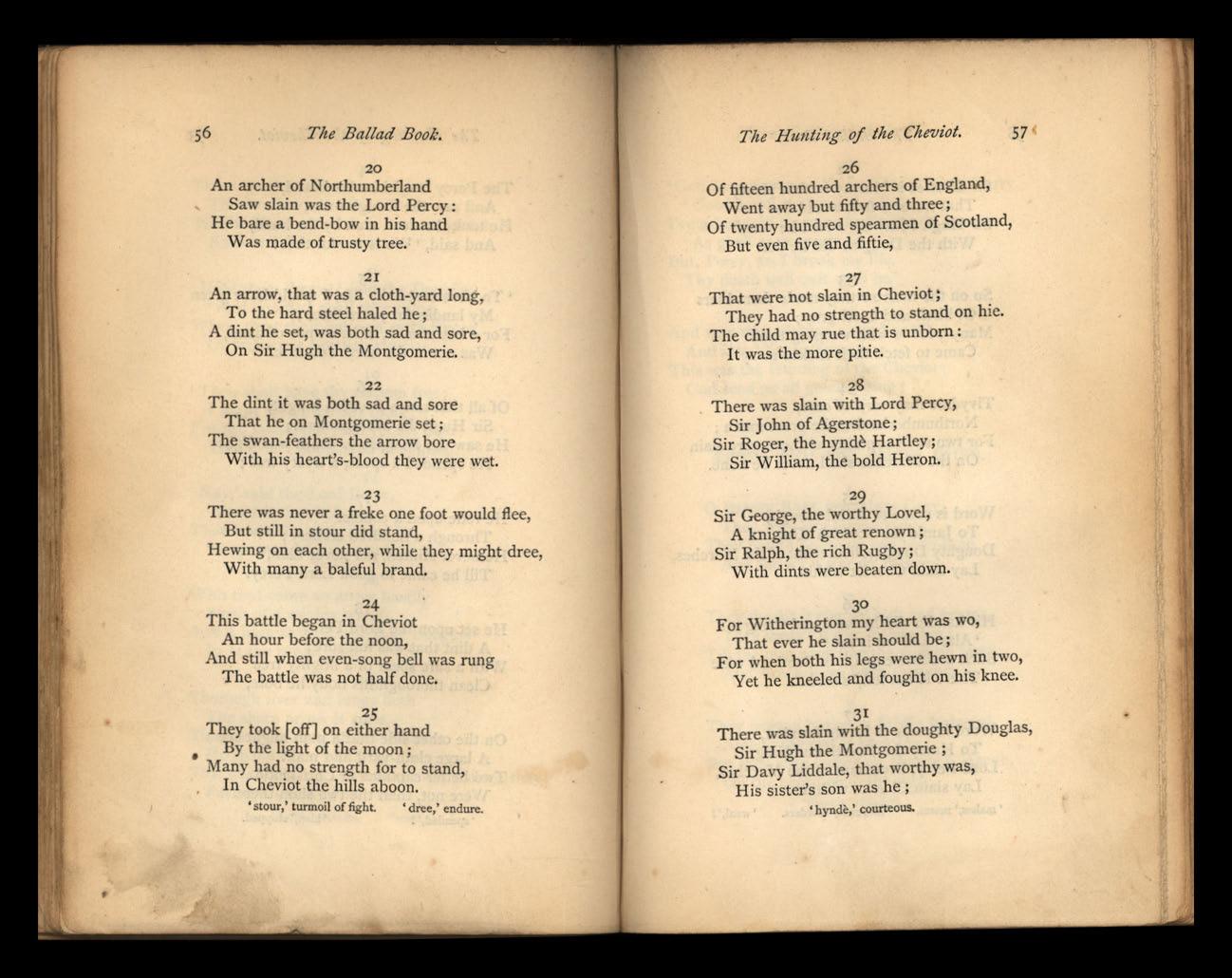
The Hunting of tlze Cllcviot.
26
Of fifteen hundred archers of England, Went away but fifty and three; Of twenty hundred spearmen of Scotland, But even five and fiftie,
27
That were not slain in Cheviot; They had no strength to stand on hie . The child may rue that is unborn : It was the more pitie.
28
There was slain with Lord Percy, Sir John of Agerstone; Sir Roger, the Hartley; Sir William, the bold Heron.
29
Sir George, the worthy Lovel, A knight of great renown; Sir Ralph, the rich Rugby; With dints were beaten down.
30
For Witherington my heart was wo, That ever he slain should be;
For when both his legs were hewn in two, Yet he kneeled and fought on his knee.
3 1
There was slain with the doughty Douglas, Sir Hugh the Montgomerie ; Sir Davy Liddale, that worthy was, His sister's son was he ; courteous.
58 Tile Ballad Book.
32
Sir Charles a Murray in that place, That never a foot would flee'
Sir Hugh Maxwell, a lord he With the Douglas did he dee. '
33
So on the morrow they made them biers Of birch and hazel gray; Many widows with weeping tears Came to fetch their makes away.
34
Tivydale may carp of care, Northumberland make great moan; For two such captains as there were slain On the Marches shall never be none.
35
Word is c?me to Edinborough, To Jamle the Scottish King, Doughty Douglas, lieutenant of the Marches Lay slain Cheviot within . '
36
His handes did he weal and wring: , Alas, and wo is me! Such another captain in Scotland wide There is not left,' said he.
37
Word is come to lovely London, To Harry the Fourth our King Lord Percy, lieutenant of the Lay slain Cheviot within. ' 'makes,' mates. 'l\farches,' Borders. 'weal,'!
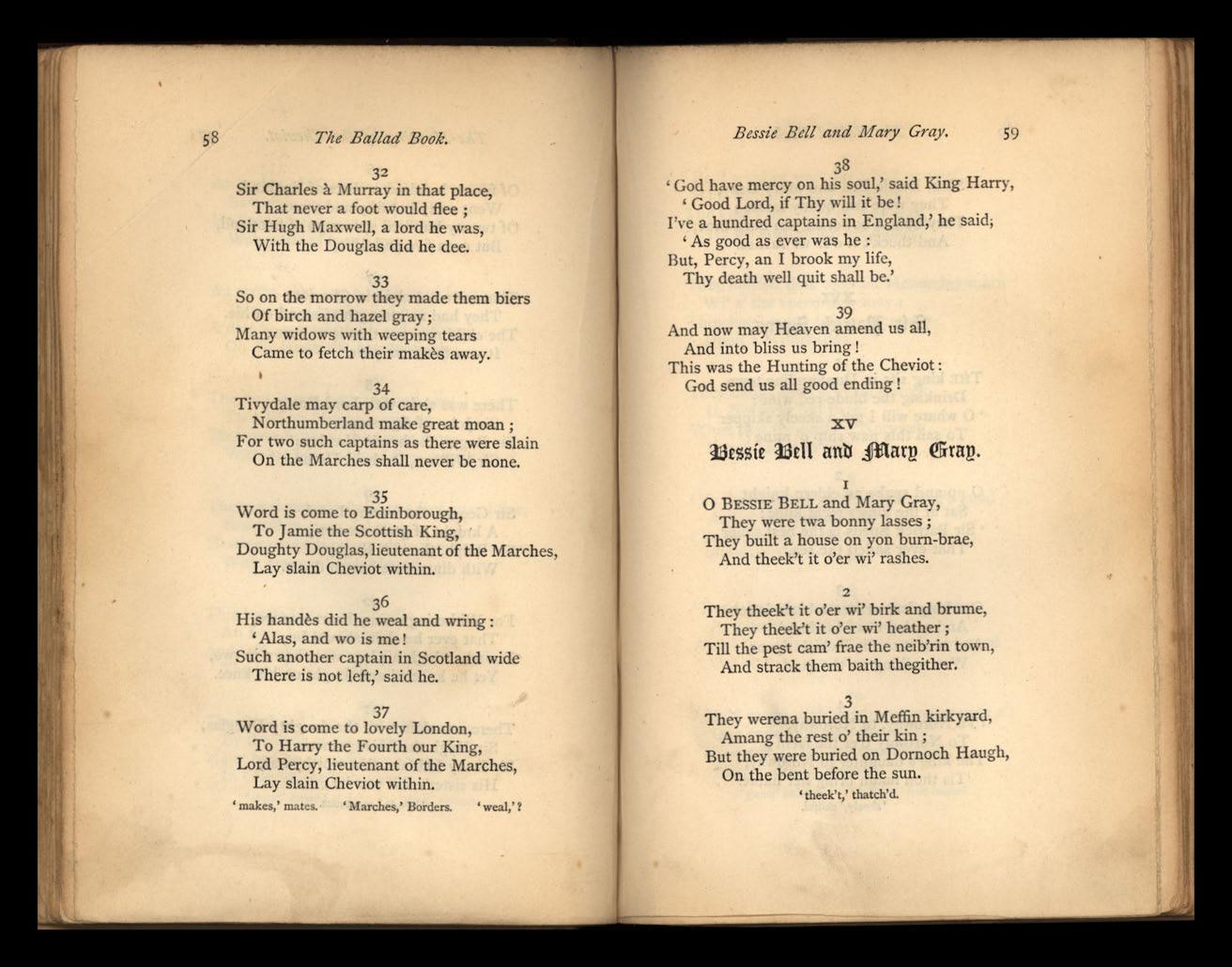
Bessie Bell and Mary Gray. 59
38
, God have mercy on his soul,' said King Harry, , Good Lord, if Thy will it be!
I've a hundred captains in England,' he said; , As good as ever was he :
But, Percy, an I brook my life, Thy death well quit shall be.'
39
And now may Heaven amend us all, And into bliss us bring!
This was the Hunting of the Cheviot: God send us all good ending!
}Sessie }Sell anll (!]ira!2.
o BESSIE BELL and Mary Gray, They were twa bonny lasses ; They built a house on yon burn-brae, And theek't it o'er wi' rashes .
2
They theek't it o'er wi' birk and brume, They theek't it o'er wi' heather; Till the pest cam' frae the neib'rin town , And strack them baith thegither.
3
They werena buried in Meffin kirkyard, Amang the rest 0' their kin ; But they were buried on Dornoch Haugh, On the bent before the sun . • tbeek't,' thatch'd.
60 The Ballad Book.
4
Sing, Bessie Bell and Mary Gray, They were twa bonny lasses ; They built a bower on yon burn-brae, And theek't it o'er wi' rashes.
XVI I
THE king sits in Dunfennline town, Drinking the blude-red wine:
, 0 whare will I get a skeely skipper
To sail this new ship 0' mine?'
2
o up and spake an eldern knight Sat at the king's right knee:
, Sir Patrick Spens is the best sailor That ever sailed the sea.'
3
Our king has written a braid letter
And sealed it wi' his hand, And sent it to Sir Patrick Spens, Was walking on the sand.
4
'To Noroway, to Noroway, To Noroway o'er the faem; The king's daughter to Noroway, 'Tis thou maun bring her hame.'
• skeely,' skil ful.

Sir Pa/rick SPens.
5
, Be it wind or weet, be it hail or sleet,
Our ship must sail the faem; The king's daughter to N oroway, 'Tis we must bring her hame.'
6
They hoisted their sails on Monenday morn Wi' a' the speed they may; . They hae landed safe in N oroway
Upon a Wodensday.
7
They hadna been a week, a week, In Noroway but twae, \Vhen that the lords 0' Noroway Began aloud to say:
8
'Ye Scottishmen spend a' our king's goud And a' our queenis fee.'
'Ye lie, ye lie, ye liars loud, Fu' loud I hear ye lie!
9 .
, For I brought as mickle white mOllle
As gane my men and me,-
And I brought a half-fou 0' gude red goud Out-o'er the sea wi' me.
10
, Mak' ready, mak' ready, my merry men a'! Our gude ship sails the morn.'
, Now ever alake! my master dear, I fear a deadly storm. , gane,' sufficed. C half-rou,' h..1.lf-bushel. .
Ballad Book.
'I saw the new moon late yestreen
Wi' the auld moon in her arm . '
And if we gang to sea, master, ' I fear we'll come to harm.'
12
They hadna sail'd upon the sea
A day but barely three
Till loud and boisterous the wind,
And gurly grew the sea.
13
, 0 where will I get a gude sailor
To talc' my helm in hand
Till I gae up to the tall top:Uast
To see if I can spy land ?'
14
'0 here am I, a sailor gude,
To tak' the helm in hand
Till you gae up to the tall
But I fear you'll ne'er spy land.'
15
He hadna gane a step, a step,
A step but barely ane,
When a bolt flew out 0' our goodly ship, And the salt sea it came in.
16
, Gae fetch a web 0' the silken c1aith
Anither 0' the twine, '
And wap them into our ship's side,
And letna the sea come in.'
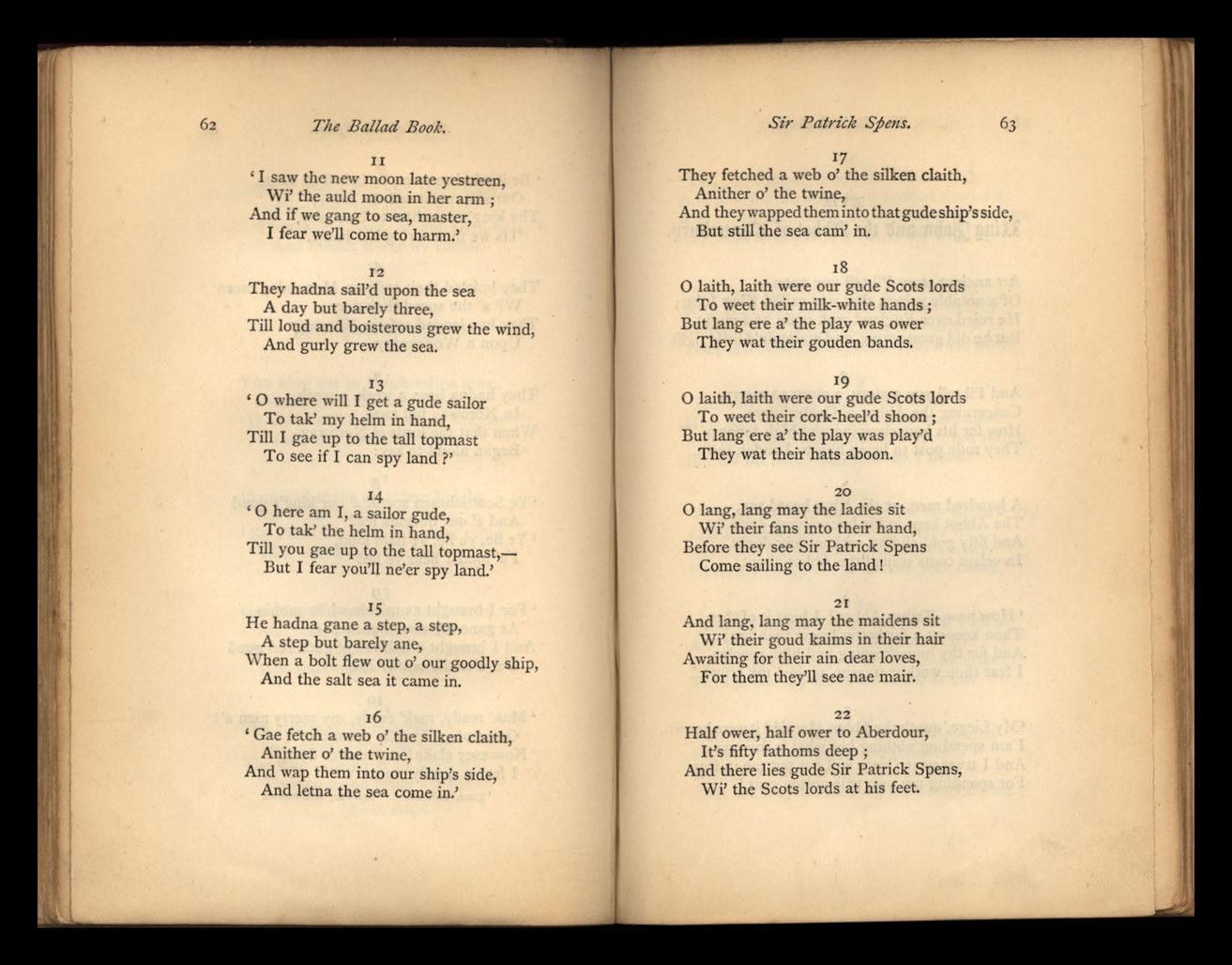
Sir Patrz'ck Spms.
17
They fetched a web 0' the silken c1aith,
Anither 0' the twine,
And theywapped them into that gude ship's side,
But still the sea cam' in.
18
o laith, laith were our gude Scots lords
To weet their milk-white hands;
But lang ere a' the play was ower
They wat their gouden bands.
19
o laith, laith were our gude Scots lords
To weet their cork-heeI'd shoon ;
But lang ere a' the play was play'd
They wat their hats abool1.
20
o lang, lang may the ladies sit
Wi' their fans into their hand,
Before they see Sir Patrick Spens
Come sailing to the land!
21
And lang. lang may the maidens sit
Wi' their goud kaims in their hair
Awaiting for their ain dear loves,
For them they'll see nae mair.
22
Half ower, half ower to Aberdour, It's fifty fathoms deep ;
And there lies gude Sir Patrick Spens, Wi' the Scots lords at his feet.
laing :Jjobn anb' tbe of QCanterbur!!.
AN ancient story I'll tell you anon, Of a notable prince, that was called King John; He ruled over England with main and might, But he did great wrong, and maintain'd little right.
2
And I'll tell you a story, a story so merry, Concerning the Abbot of Canterbury ; How for his housekeeping and high renown, They rode post to bring him to London town.
3
A hundred men, as the King heard say, The Abbot kept in his house every day; And fifty gold chains, without any doubt, In velvet coats waited the Abbot about.
4
, How now, Father Abbot? I hear it of thee, Thou keepest a far better house than me ; And for thy housekeeping and high renown, I fear thou work'st treason against my crown.'
5
'My Liege,' quoth the Abbot, 'I it were known, I am spending nothing but what IS my own; . And I trust your Grace will not put me in fear, -For spending my own true-gotten gear.'
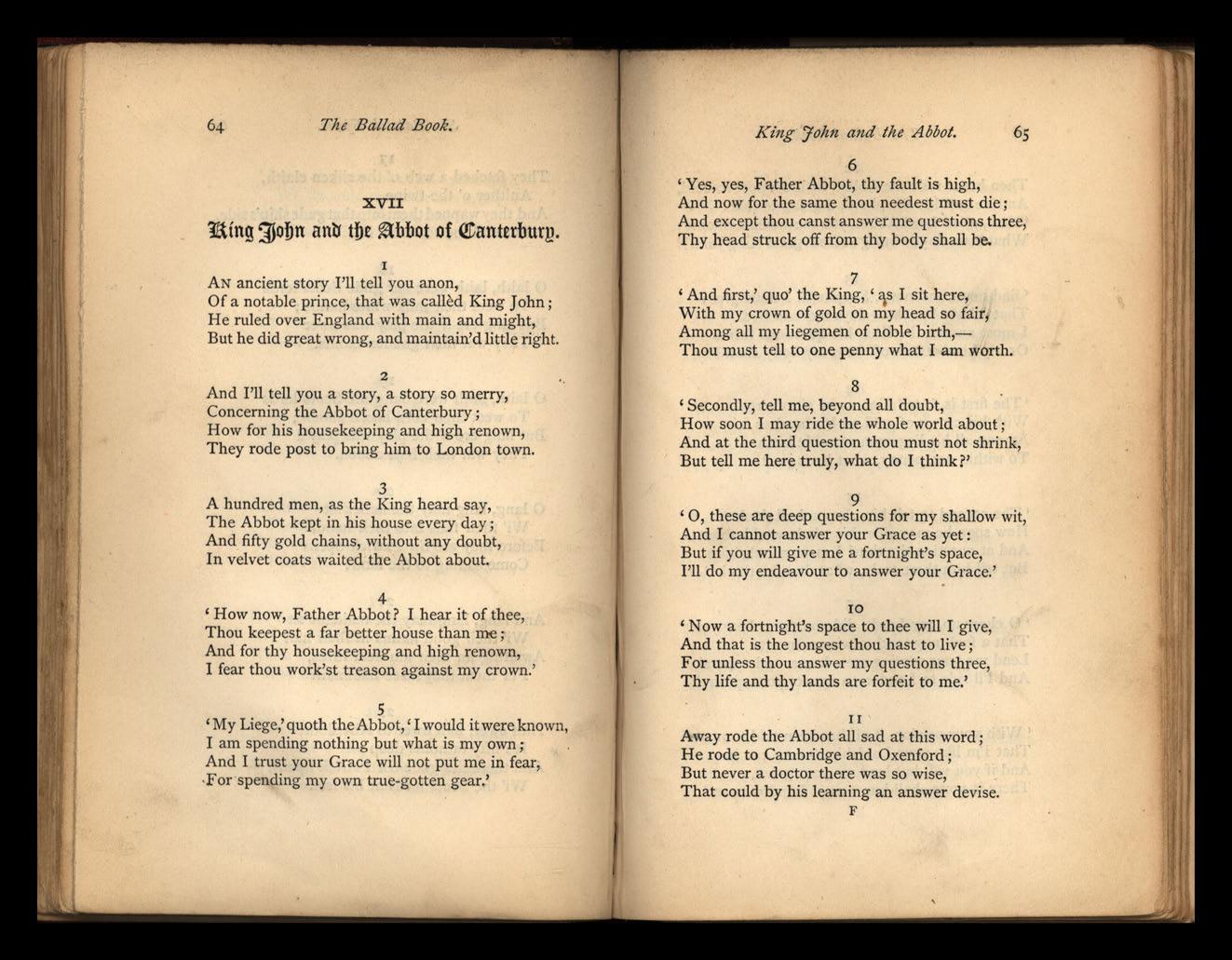
Kt'l1g Jo/m and tlte Abbot.
6
, Yes, yes, Father Abbot, thy fault is high, _ And now for the same thou needest must dIe ; And except thou canst answer me questions three, Thy head struck off from thy body shall be.
7
, And first,' quo' the King, ' 'ls I sit here, , With my crown of gold on my head so faIr, Among all my liegemen of noble birth,Thou must tell to one penny what I am worth.
8
, Secondly, tell me, beyond all doubt, How soon I may ride the whole world about; And at the third question thou must not shrink, But tell me here truly, what do I think?'
9 _
, 0, these are deep questions for my shallow WIt, And I cannot answer your Grace as yet: But if you will give me a fortnight's space, I'll do my endeavour to answer your , Grace.'
IO
, Now a fortnight's space to thee will I give, And that is the longest thou hast to live; For unless thou answer my questions three, Thy life and thy lands are forfeit to me.'
II
Away rode the Abbot all sad at this word; He rode to Cambridge and Oxenford; But never a doctor there was so wise, That could by his learning an answer devise,
66 The Ballad Book.
12
Then home rode the Abbot, with comfort 50 cold, And he met his Shepherd, a-going to fold: 'Now, good Lord Abbot, you are welcome home: What news do you bring us from great King John? '
13
, Sad news, sad newi, Shepherd, I must give; That I have but three days more to live.
I must answer the King his questions three, Or my head struck off from my body shall be.
14
, The first is to tell him, as he sits there, With his crown of gold on his head 50 fair
Among all his liegemen of noble birth.
To within one penny, what he is worth. IS
, The second to tell him, beyond all doubt, How soon he may ride this whole world about; And at question the third I must not shrink, But tell him there truly, what does he think?'
16
, 0 cheer up, my Lord; did you never hear yet
That a fool may teach a wise man wit?
Lend me your serving-men, horse, and apparel, And I'll ride to London to answer your quarrel.
17
, With your pardon, it oft has been told to me
That I'm like your Lordship as ever can be:
And if you will but lend me your gown, There is none shall know us at London town.'

Killg Jolm alld the Abbot.
18
ow horses and serving-men thou shalt have, With sumptuous raiment gallant and brave; With crozier, and mitre, and rochet, and cope, Fit to draw near to our Father the Pope.'
19
ow welcome, Sir Abbot,' the King he did say, "Tis well thou'rt come back to keep thy day; For and if thou canst answer my questions three, Thy life and thy living both saved shall be.
20
, And first as thou seest me sitting here, 'vVith my of gold on my head 50 fair, Among my liegemen of noble birth,Tell to one penny what I am worth.'
21
, For thirty pence our Saviour was sold Among the false Jews, as I have been told j And twenty-nine is the worth of thee j For, I think, thou art one penny worse than he.'
22
The King he laugh'd, and swore by St. Bittle, , I did not think I was worth 50 little!
Now secondly tell me, beyond all doubt, How soon I may ride this world about.'
23
'You must rise with the sun, and ride"with the same, Until the next morning he riseth again; And then your Grace need never doubt But in twenty-four hours you'll ride it about.
68 TIle Ballad Book.
24
;rhe,Kin g he,laugh'd, and swore by St. Jone, I dId not thmk I could do it so soon!
Now from question the third thou must not shrink But tell me truly, what do I think?' '
25
, Yea, that I shall do, and make your Grace merry: You think I'm the Abbot of Canterbury; But I'm his poor shepherd, as plain you may see, That am come to beg pardon for him and for me.'
26
The King he laugh'd, and swore by the mass, , I'll make thee Lord Abbot this day in his place!'
, Now nay, my be not in such speed; For, alas! I can neIther write nor read.'
27
, Four nobles a week, then, I'll give to thee
For this merry jest thou hast shown to me:
And tell the old Abbot, when thou gettest home Thou hast brought him free pardon from King J oim.'
XVIII
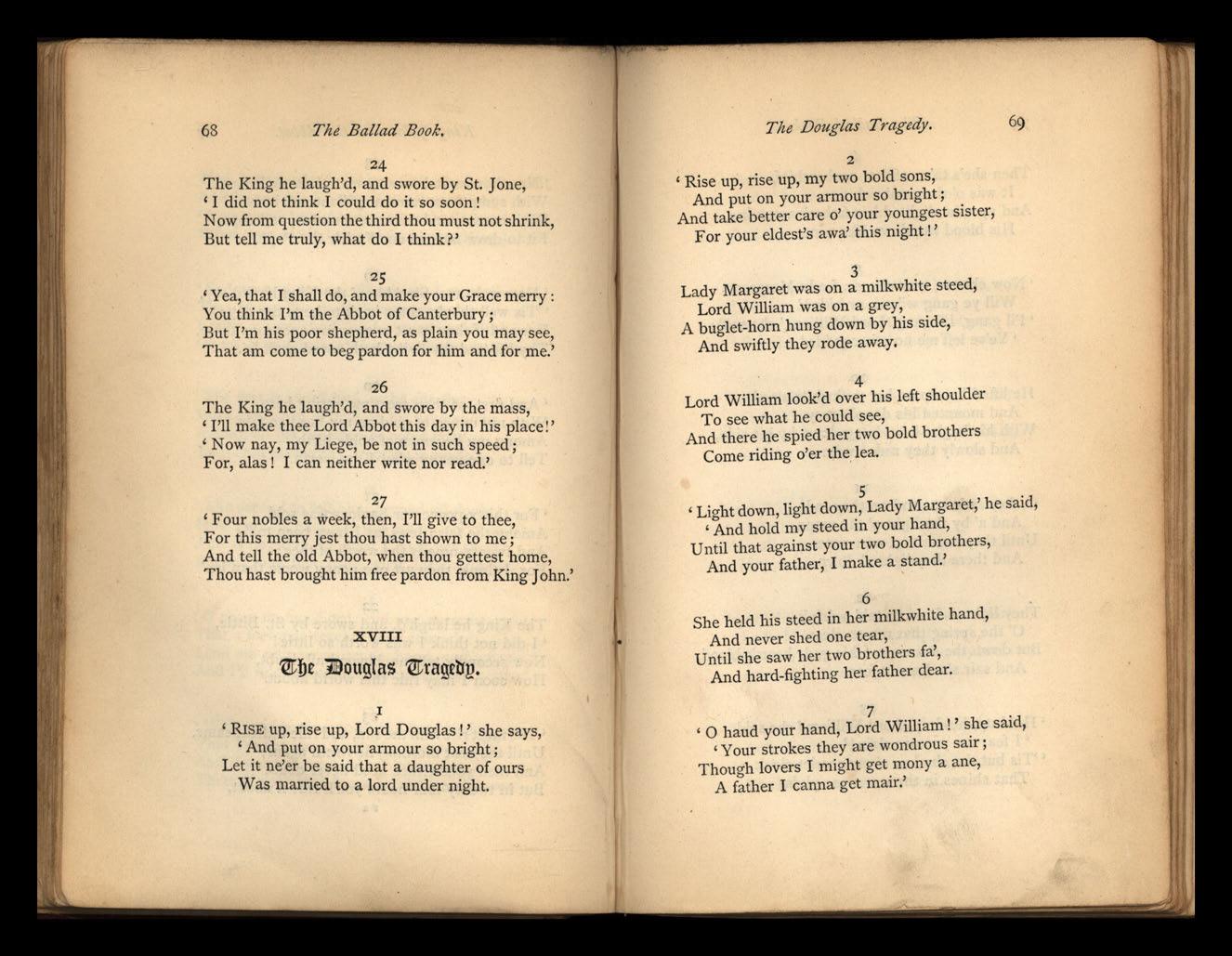
I
, RISE up, rise up, Douglas!' she says, , fut on your armour so bright; Let It ne er be said that a daughter of ours Was married to a lord under night.
Tile Douglas Tragedy.
z
, Rise up, rise up, my two bold sons, And put on your armour so bright; And take better care 0' your youngest sister, For your eldest's awa' this night!'
3
Lady Margaret was on a milkwhite steed, Lord William was on a grey, A buglet-horn hung down by his side, And swiftly they rode away.
4
Lord William look'd over his left shoulder
To see what he could see, And there he spied her two bold brothers Come riding o'er the, lea.
5 . , Light down, light down, Lady Margaret,' he saId, , And hold my steed in your hand, Until that against your two bold brothers, And your father, I make a stand.'
6
She held his steed in her milkwhite hand, And never shed one tear, Until she saw her two brothers fa', And hard-fighting her father dear.
7 . , 0 haud your hand, Lord William! ' s.he saId, , Your strokes they are wondrous salr; Though lovers I might get mony a ane, A father I canna get mair.'
Tile Ballad Book.
8
Then she's ta'en aff her neckerchief, It was 0' the cambrick fine, And aye she dighted her father's wounds; His blood ran down like wine.
9
'Now choose, now choose, Lady Margaret: Will ye gang wi' me, or bide?'
, I'll gang, I'll gang, Lord William,' she said; , Ye've left me no other guide.'
10
He lifted her up on her milkwhite steed, And mounted his dapple-grey, With his buglet-horn hung down by his side, And slowly they rade away.
11
o they rade on, and on they rade, And a' by the light 0' the moon, Until they came to a wan water, And there they lighted down.
J2
They lighted down to tak' a drink
0' the spring that ran so clear, But down the stream ran his gude heart's blood, And sair she 'gan to fear.
13
, Hold up, hold up, Lord William,' she said, , I fear me you are slain!'
, 'Tis but the shadow 0' my scarlet cloak That shines in the water sae plain.'
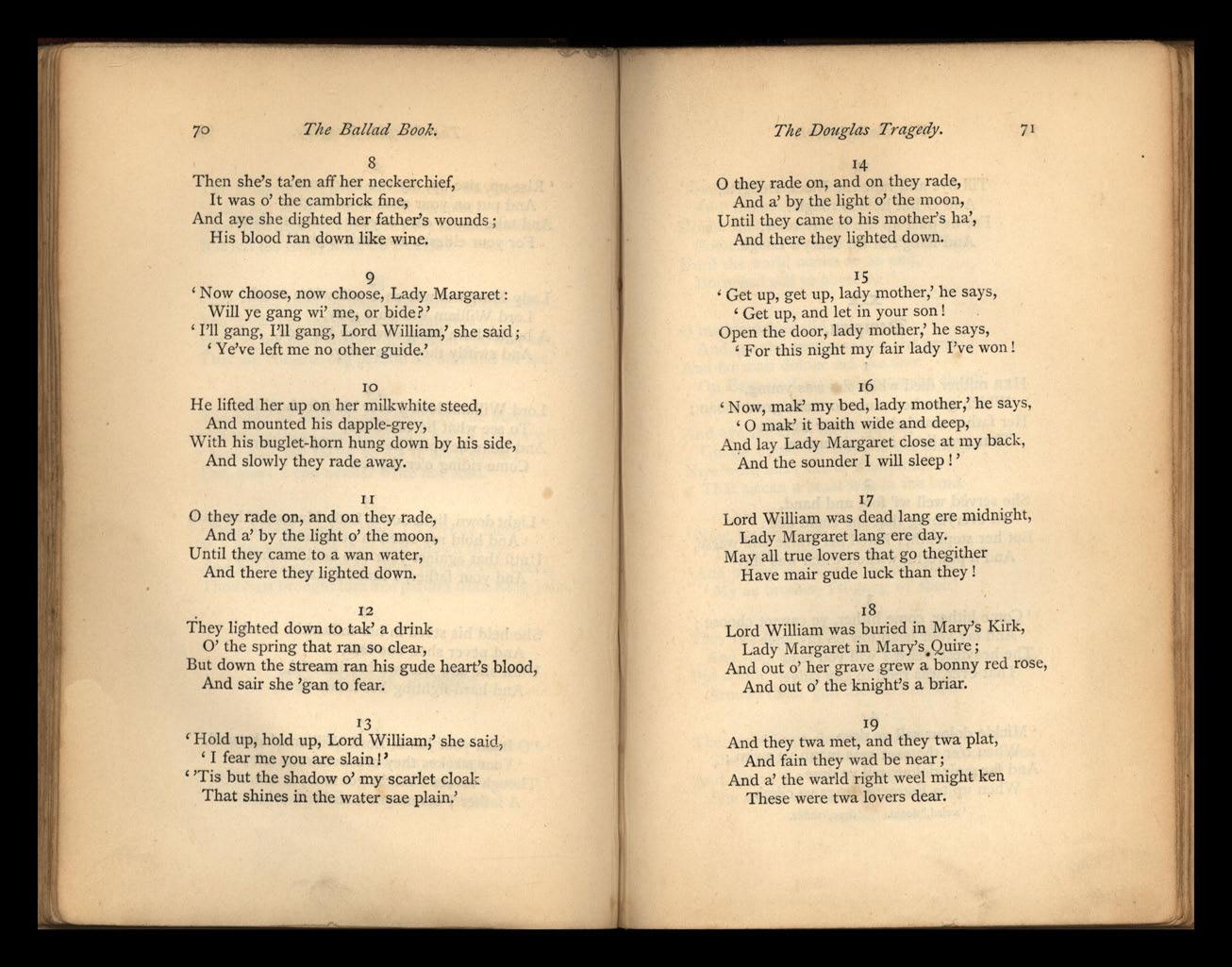
The Douglas Tragedy.
14
o they rade on, and on they rade, And a' by the light 0' the moon, Until they came to his mother's ha', And there they lighted down.
15
, Get up, get up, lady mother,' he says, , Get up, and let in your son!
Open the door, lady mother,' he says,
, For this night my fair lady I've won!
16 71
'Now, mak' my bed, lady mother,' he says, , 0 mak' it baith wide and deep, And lay Lady Margaret close at my back, And the sounder I will sleep! '
17
Lord William was dead lang ere midnight, Lady Margaret lang ere day. May all true lovers that go thegither Have mair gude luck than they!
18
Lord William was buried in Mary's Kirk, Lady Margaret in Mary's.Quire; And out 0' her grave grew a bonny red rose, And out 0' the knight's a briar.
19
And they twa met, and they twa plat, And fain they wad be near; And a' the warld right weel might ken These were twa lovers dear.
Tile Ballad Book.
20
Till bye and rade the Black Douglas, And 0 but he was rough!
For he pu'd up the bonny briar, And flang't in St. Mary's Lough.

HER mither died when she was young
Which gave her cause to make greaf mo a n ;
Her father married the warse woman That ever lived in Christendom.
2
She served well wi' foot and hand, In everything that she could dee ;
But her stepmither hated her warse and wars e And a powerful wicked witch was she. '
3
, Come hither, come hither, ye cannot choose; And lay your head low on mv knee'
The heaviest weird I will you ' That ever was redd to gay lad ye.
4
, Mickle dolour sall ye dree
When o'er the saut seas maun ye swim'
And far mair dolour sall ye dree '
When up to Estmere Crags ye climb. 'weirct.,' doom. 'dree, ' suffer.
K e11lpio1t.
5
, I weird ye to be a fiery snake ; And borrowed saIl ye never be, Unless that Kempion, the king's own son, Come to the crag and thrice kiss thee.
Until the warld comes to an end, Borrowed sall ye never be ! '
6
o mickle dolour did she dree, And aye the saut seas o'er she swam; And far mair dolour did she dree
On Estmere Crags, when up she cIamb.
7
And aye she cried on Kempion, Gin he would but come to her hand ;Now word has gane to Kempion, That siccan a beast was in the land.
8
, Now, by my sooth,' said Kempion; , , This fiery beast I'll gang and see.
, And by my sooth,' said Segramour, , My ae brother, I ' ll gang wi' thee.'
9
They twa hae biggit a bonny boat, And they hae set her to the sea; But a mile before they reach' d the land, Around them 'gan the red fire flee.
10
The worm leapt out, the worm leapt down, She plaited nine times round stock and stane ; And aye as the boat came to the b:ach She struck and banged it off agam. borrowed,' rescued.
, Mind how you steer, my brother dear: Keep further off! ' said Segramour; 'This beast will drown us in the sea, Or burn us up, if we come on shore.'
12
Syne Kempion has bent an arblast bow, And aimed an arrow at her head; And swore, if she didna quit the shore, Wi' that same shaft to shoot her dead.
13
, Out 0' my stythe I winna rise, Nor quit my den for awe 0' thee, Till Kempion, the king's own son, Come to the crag and thrice kiss me.'
14
He's louted him o'er the Estmere Crags, And he has gi'en that beast a kiss: In she swang, and again she cam', And aye her speech was a wicked hiss.
15
, Out 0' my stythe I winna rise, Nor quit my den for the fear 0' thee, Till Kempion, that courteous knight, Come to the crag and thrice kiss me.'
16
He's louted him o'er the Estmere Crag, And he has gi'en her kisses twa : In she swang, and again she cam', The fieriest beast that ever you saw. , sty the, staying-place. ' louted,' bended.
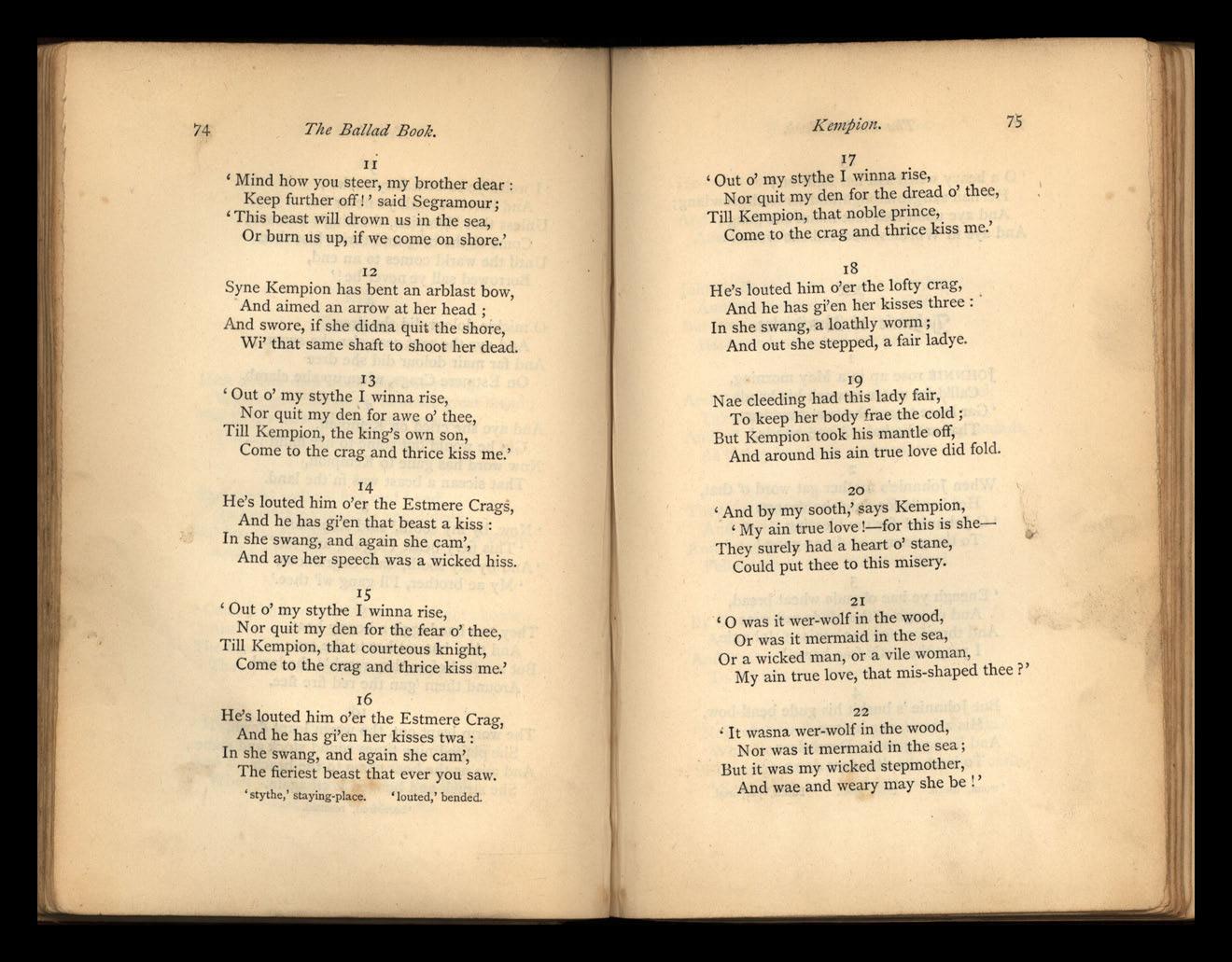
Kempion.
17
, Out 0' my stythe I winna rise, , N or quit my den for the 0 thee, Till Kempion, that noble , Come to the crag and thnce kiSS me.
18
He's louted him o'er the crag, . . And he has gi'en her kisses three. In she swang, a loathly wor:n; And out she stepped, a fair ladye.
19
Nae cleeding had this lady fair, To keep her body frae the cold; But Kempion took his mantle And around his ain true love did fold.
20 , And by my sooth,' says 'My ain true love i-for thiS IS sheThey surely had a heru:t 0' .stane, Could put thee to thiS misery.
21
, 0 was it wer-wolf in the wood, Or was it mermaid in the sea,
Or a wicked man, or a vile woman, ?' My ain true love, that mis-shaped thee.
22
, It wasna wer-wolf in the wood, N or was it mermaid in the sea; But it was my wicked stepmother, I' And wae and weary may she be .
TIle Ballad Book.
23
, 0 a heavy weird saIl her light on; H er hair sallgrow rough, and her teeth grow lang; And aye upon four feet maun she gang; And aye in W ormeswood saIl she wonn ! '
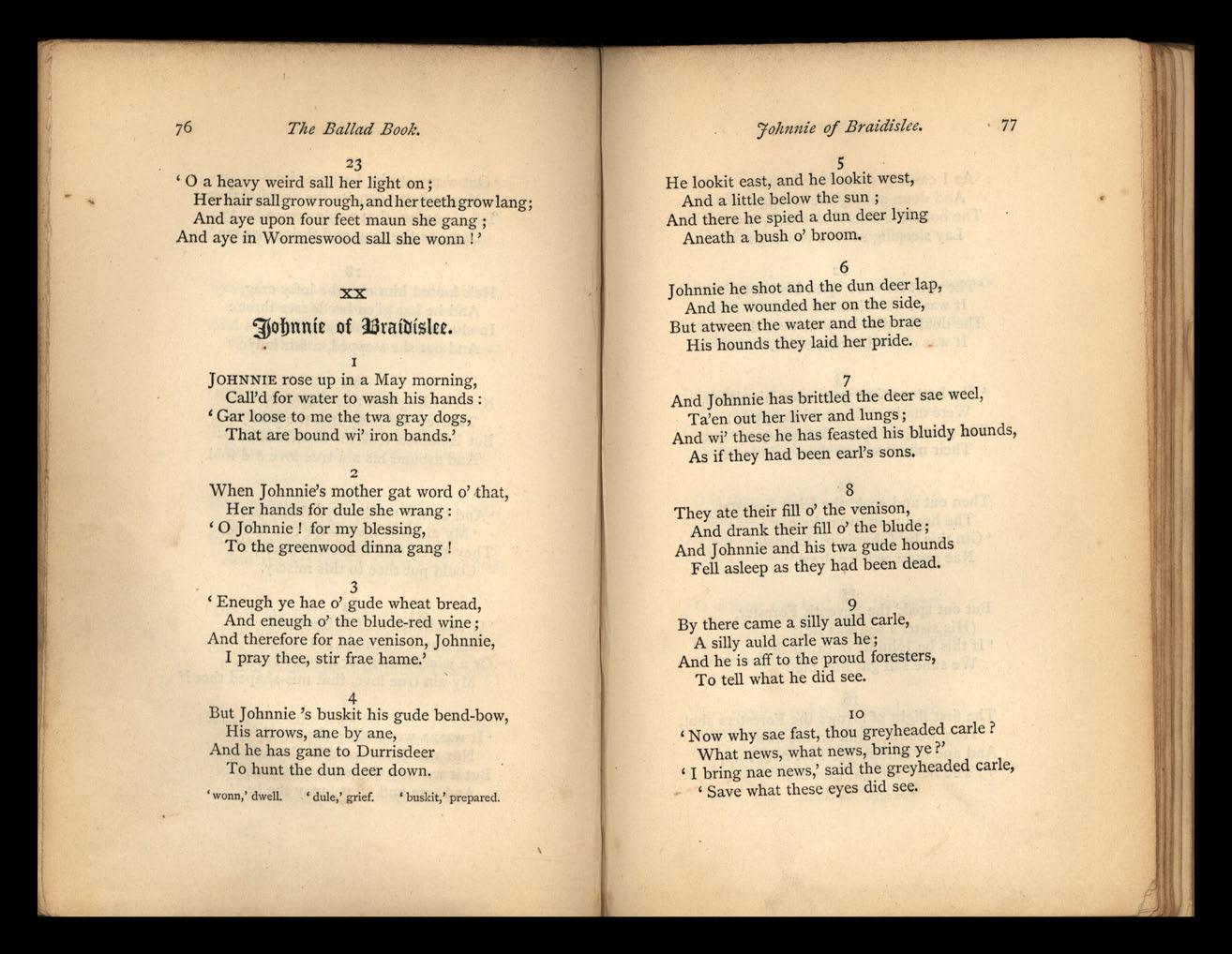
JOHNNIE rose up in a May morning, Call'd for water to wash his hands:
, Gar loose to me the twa gray dogs, That are bound wi' iron bands.'
2
When Johnnie's mother gat word 0' ,that, Her hands for dule she wrang : , 0 Johnnie! for my blessing, To the greenwood dinna gang!
3
, Eneugh ye hae 0' gude wheat bread, And eneugh 0' the blude-red wine; And therefore for na e venison, Johnnie, I pray thee, stir frae hame.'
4
But Johnnie 's buskit his gude bend-bow, His arrows, ane by ane, And he has gane to Durrisdeer To hunt the dun deer down.
4 wonn,' dwell. ' dule,' grief. I buskit,' prepared.
Joll1tllie of Braz"dislee
5
He lookit east, and he lookit west, And a little below the sun; And there he spied a dun deer lying Aneath a bush 0' broom.
6
J ohnnie he shot and the dun deer lap, And he wounded her on the side, But atween the water and the brae His hounds they laid her pride.
7 · 77
And Johnnie has brittled the deer sae weel , Ta'en out her liver and lungs; And wi' these he has feasted his bluidy hounds, As if they had been earl's sons.
8
They ate their fill 0' the venison, And drank their fill 0' the blude ; And Johnnie and his twa gude hounds Fell asleep as they had been dead.
9
By there came a silly auld carle, A silly auld carle was he; And he is aff to the proud foresters, To tell what he did see.
10
, Now why sae fast, thou carle ? What news, what news, bring ye ? , I bring nae news,' said the greyheaded carle, , Save what these eyes did see.
The Ballad Book.
11
'As I came over by Merriemass
And doun amang the scroggs' The bonniest chiel that ever I Lay sleeping atween twa dogs.
12
, The shirt he wore upon his back, It was 0' the Holland fine' The doublet that he wore that It was 0' the Lincoln twine. '
13
'The buttons that were upon his sleeve Were made 0' the goud sae gude . ' The gray dogs that he lay Their mouths were dyed wi' blude.'
14
Then out and spak' the First Forester
The head man ower them a' : ' , Gin this be Johnnie 0' Braidislee N ae nearer will we draw.' '
15
But out spak' the Seventh Forester (His sister's son was he) : ' , If this be Johnnie 0' Braidislee We sune sail gar him die!' '
16
The first flight of arrows the Foresters shot They wounded him on the knee . ' And ane to anither the Foresters
, The next will gal' him dee.' ' , scroggs,' low bushes.

JO/l1l11ie of Braidislee.
17
Johnnie has set his back to an aik, His foot against a stane ; He has shot against the Foresters, Though they be seven to ane.
18
, Stand stout, stand stout, my noble hounds , Stand stout, and dinna flee!
Stand fast, stand fast, my gude gray dogs, And we will mak' them dee ! '
19
Johnnie he shot twa Foresters, His hounds they pu'd doun three; Out shot the Master Forester, Strak' Johnnie aboon the bree.
20
, 0 is there nae bird in a' this forest
Will do as mickle for me
As dip its wing in the wan water And straik it on my ee-bree ?
21
'0 is there nae bird in a' the forest
To sing as I can say,To flee fu' fast to my mithers window, And bid fetch Johnnie away?'
22
They made a rod 0' the hazel bush, Anither 0' slae-thorn tree, And mony were the men, I trow, At fetching hame Johnnie. 'brce,' brow.
80 The Ballad Book.
23
Out and spak' his auld mither, And fast her tears did fa' :
, Ye wadna be warned, my son J ohnnie, Frae the hunting to bide awa' ! '
24
Now Johnnie's gude bend-bow is broke, And his gude gray dogs are slain; And his body lies dead in Durrisdeer; And his hunting it is done.

o WILLIE's large 0' limb and lith, And come 0' high degree; And he is gone to Earl Richard To serve for meat and fee.
2
Earl Richard had but ae daughter, Fair as a lily flower; And they made up their love-contract Like proper paramour.
3
It fell upon a simmer'? nicht, Whan the leaves were fa ir and green, That Willie met his gay ladie Intil the wood alane. 'lith,' joint.
The Bz"rtlt of Robht Hood.
4
, 0 narrow is my gown, Willie, That wont to be sae wide, And gane is a' my fair colour, That wont to be my pride.
5
, But gin my father should get word What's past between us twa, Before that he should eat or drink, He'd hang you o'er that wa'.
6
, But ye'll come to my bower, Willie, At the setting 0' the sun; And kep me in your arms twa, And latna me fa' down.'
7
o whan the sun was near gane down, He's doen him till her bower; And there, by the lee licht 0' the moon , Her window she lookit o'er.
8
I ntill a robe 0' red scarlet She lap, and caught nae Willie was large 0' lith and limb, And keepit her in his arm.
9
And they've gane to the gude greenwood, And ere the night was dune, She's borne to him a bonny young son, Amang the leaves sae green. 'lee,' calm . C kep,' catch.
G
82 Tlte Ballad Book.
10
Whan night was gane and day was come, And the sun began to peep, . Up and raise the Earl Richard Out 0' his drowsy sleep.
II
He's ca'd upon his merry young men, . By ane, by twa, and by three, , 0 what's come 0' my daughter dear, That she's na come to me ?
12
, I dreamt a dreary dream last nightGod grant it come to gude ! I dreamt I saw my daughter dear Drown in the saut sea flood.
13
'My daughter, maybe, is dead or sick; Or gin she be stown awa', I mak' a vow, and I'll keep it true, I'll hang ye ane and a' !'
14
They sought her back, they sought her fore, They sought her up and down; They got her in the gude greenwood Nursing her bonny young son.
He took the bonny boy in his arms, And kist him tenderlie ; Says, ' Though I would your father hang, Your mother's dear to me.'

16
He kist him o'er and o'er again; , My grandson I thee claim; And Robin Hood in g ude greenwood, 'Tis that shall be your name.'
17
There's mony ane sings 0' grass, 0' grass, And mony ane sings 0' corn; And mony ane sings 0' Robin Hood, Kens little whar' he was born.
18
It was na in the ha', the ha', N or in the painted bower; But it was in the gude greenwood, Amang the lily flower.
THE reivers they stole Fair Annie, As she walked by the sea; But a noble knight was her ransom soon, Wi' goud and white monie.
2
She bided in strangers' land wi' him, And none knew whence she came; She lived in the castle wi' her love, But never told her name.
• reivers , takers by violence, robbers, pirates. G'
The Ballad Book.
3
, It's narrow, narrow, mak' your bed, And learn to lie your lane; For I'm gaun o'er the sea, Fair Annie, A braw Bride to bring hame. Wi' her I will get goud and gear, Wi' you I ne'er gat nane.
4
, And wha will bake my bridal bread, Or brew my bridal ale?
And wha will welcome my bright Bride, That I bring o'er the dale?'
5
, It's I will bake your bridal bread, And brew your bridal ale;
And I will welcome your bright Bride, That you bring o'er the dale.'
6
, But she that welcomes my bright Bride Maun gang like maiden fair; • She maun lace up her robe sae jimp, And comely braid her hair.
7
, Bind up, bind up your yellow hair, And tie it on your neck; And see you look as maiden-like As the day that first we met.'
8
, 0 how can I gang maiden-like, When maiden I am nane ? Have I not borne six sons to thee, And am wi' child again?'
C jimp,' trim.

Fair Amtie.
9
, I'll put cooks into my kitchen, And stewards in my hall, And I'll have bakers for my bread, And brewers for my ale; But you're to welcome my bright Bride, That I bring owre the dale.'
Three months and a day were gane and past , Fair Annie she gat word, That her love's ship was come at last, Wi' his bright young Bride aboard.
II
She's ta'en her young son in her arms, Anither in her hand; And she's gane up to the highest tower, Looks over sea and land.
12
, Come doun, come doun, my mother dear, Come aff the castle wa' ! I fear if langer ye stand there, Ye'lllet yoursell doun fa'.'
13
She's ta'en a cake 0' the best bread, A stoup 0' the best wine; And a' the keys upon her arm, And to the yett is gane.
14
, 0 ye're welcome hame, my ain gude lord, To your castles and your towers; Ye're welcome hame, my ain gude lord, To your ha's, but and your bowers. , yett, gate .
86 TIle Ballad Book.
And welcome to your hame, fair lady! For a' that's here is yours.'
15
, Owhatna lady's that, my lord, That welcomes you and me ?
Gin I be lang about this place, Her friend I mean to be.'
16
Fair Annie served the lang tables Wi' the white bread and the wine'
But aye she drank the wan water ' To keep her colour fine.
17
And she gaed by the first table, And smiled upon them a' ;
But ere she reach'd the second table, The tears began to fa'.
18
She took a napkin lang and white And hung it on a pin; , It was to wipe away the tears, As she gaed out and in.
19
When bells were rung and mass was sung, And a' men bound for bed, The bridegroom and the bonny bride In ae chamber were laid. .

Falr Am/le.
20
Fair Annie's ta'en a harp in her hand, To harp thir twa asleep; But aye, as she harpit and she sang, Fu' sairly did she weep.
21
, 0 gin my sons were seven rats, Rinnin' on the castle wa', And I mysell a great grey cat, I soon wad worry them a' !
22
, 0 gin my sons were seven hares, Rinnin' o'er yon lily lee, And I mysell a good greyhound, Soon worried they a' should be ! '
23
Then out and spak' the bonny young Bride, In bride-bed where she lay:
, That's like my sister Annie,' she says; , Wha is it doth sing and play?
24
, I'll put on my gown,' said the new-come Bride, , And my shoes upon my feet; I will see wha doth sae sadly sing, And what is it gars her greet.
25
, What ails you, what ails you, my housekeeper, Thflt ye mak' sic a mane?
Has ony wine-barrel cast its girds, Or is a' your white bread gane ?'
88 The Ballad Book.
26
, It is na because my wine is spilt, Or that my white bread's gane ; But because I've lost my true love's love, And he's wed to anither ane.'
27
, N 00 tell me wha was your father?' she says, , N 00 tell me wha was your mother? And had ye ony sister?' she says, , And had ye ever a brother?'
28
'The Earl of Wemyss was my father, The Countess of Wemyss my mother, Young Elinor she was my sister dear, And Lord John he was my brother.'
29
, If the Earl of Wemyss was your father, I wot sae was he mine; And it's 0 my sister Annie ! Your love ye sall na tyne.
30
, Tak' your husband, my sister dear; You ne'er were wrang'd for me, Beyond a kiss 0' his merry mouth As we came o'er the sea.
31
, Seven ships, loaded weel, Came o'er the sea wi' me ; Ane 0' them will tak' me hame, And six I'll gie to thee.'
I tyne,' lose.
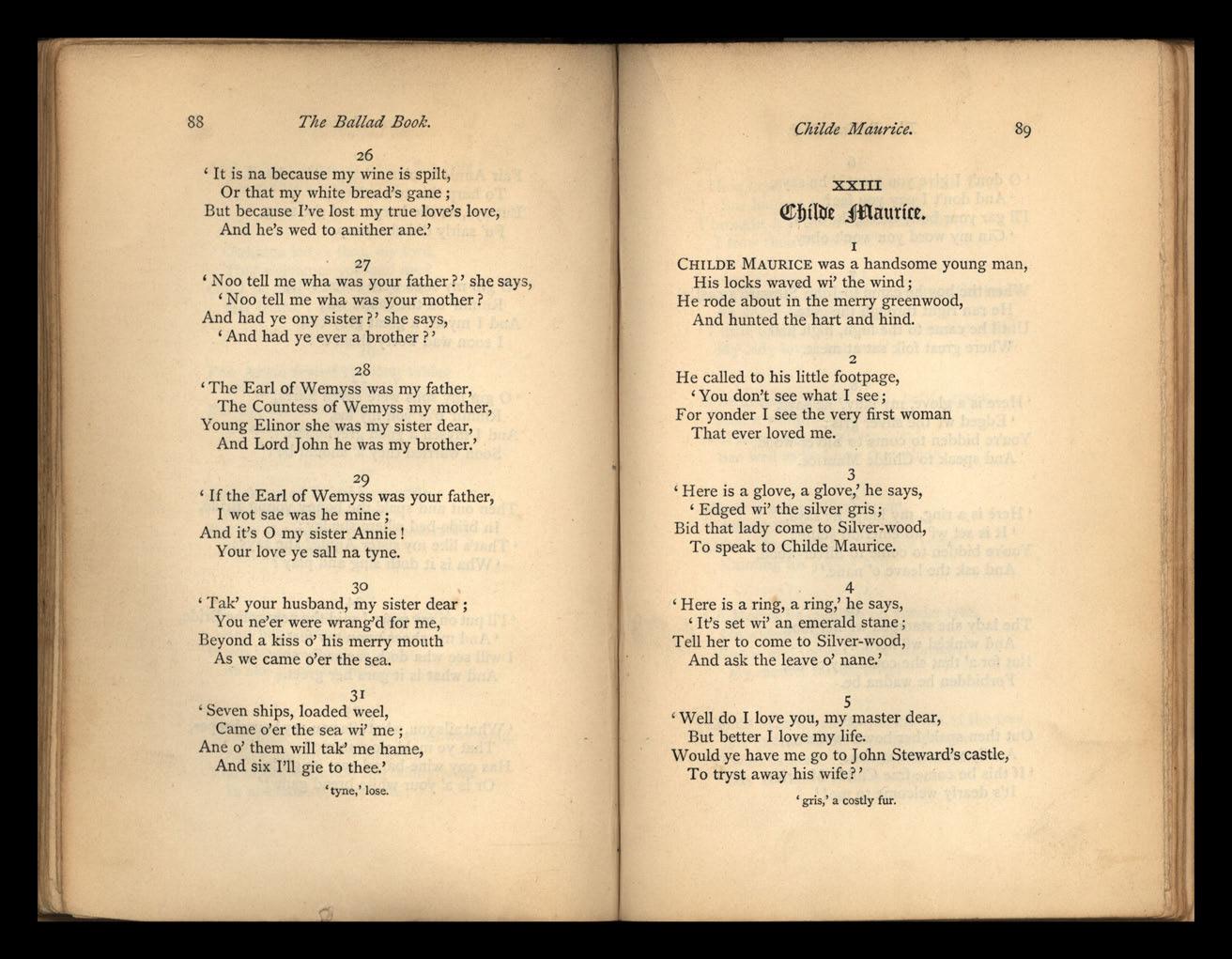
CHILDE MAURICE was a handsome young man, His locks waved wi' the wind; He rode about in the merry greenwood, And hunted the hart and hind.
2 He called to his little footpage,
, You don't see what I see; For yonder I see the very first woman That ever loved me.
3
, Here is a glove, a glove,' he says, , Edged wi' the silver gris; Bid that lady come to Silver.wood, To speak to Childe Maurice.
4
, Here is a ring, a ring,' he says, , It's set wi' an emerald stane; Tell her to come to Silver-wood, And ask the leave 0' nane.'
5
'Well do I love you, my master dear, But better I love my life. Would ye have me go to John Steward's castle, To tryst away his wife?'
, gris,' a costly fur.
90 The Ballad Book.
6
, 0 don't I give you meat?' he says, , And don't I pay you fee? I'll gar your body bleed,' he says, 'Gin my word you won't obey.'
7
When the boy he came to John Steward's castle, He ran right through the gate, Until he came to the high, high hall Where great folk sat at meat.
8
'Here is a glove, my lady,' ne says, , Edged wi' the silver gris ; You're bidden to come to Silver-wood, And speak to Childe Maurice.
9
, Here is a ring, my lady,' he says, , I t is set wi' an emerald stane; Y olire bidden to come to Silver-wood, And ask the leave 0' nane.'
10
The lady she stamped wi' her foot, And winked wi' her e'e; But for a' that she could say or do, Forbidden he wadna be.
11
Out then spak' her bower-woman; A wily woman was she:
, If this be come frae Childe Maurice , It's dearly welcome to me! '
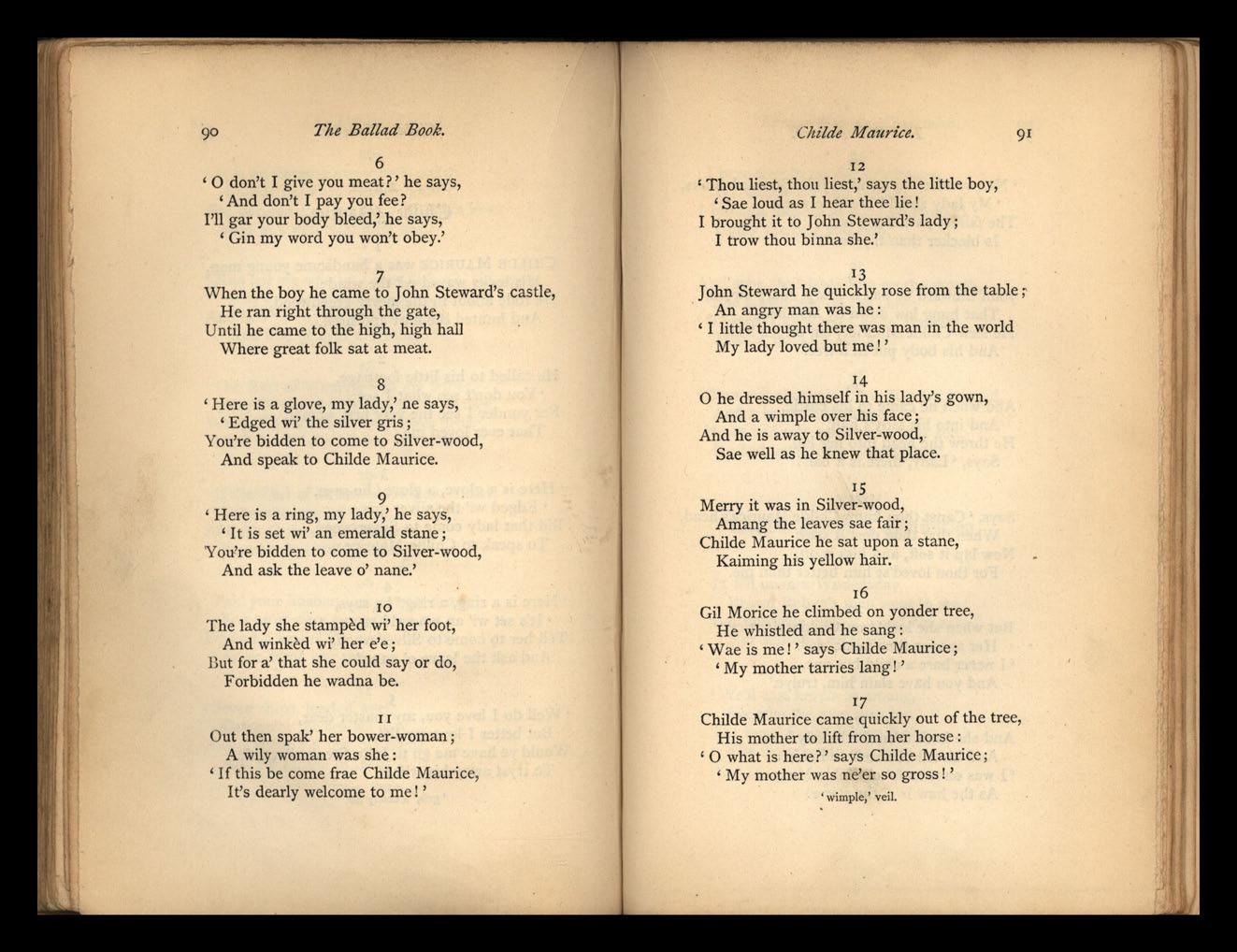
C'ltilde Mauyice.
12
, Thou liest, thou liest,' says the little boy, , Sae loud as I hear thee lie! I brought it to John Steward's lady; I trow thou binna she.'
13 9 1
John Steward he quickly rose from the table ;'
- An angry man was he : , I little thought there was man in the world
My lady loved but me! '
14
o he dressed himself in his lady's gown, And a wimple over his face; And he is away to Silver-wood,Sae well as he knew that place.
15
Merry it was in Silver-wood, Amang the leaves sae fair; Childe Maurice he sat upon a stane, Kaiming his yellow hair.
16
Gil Morice he climbed on yonder tree, He whistled and he sang: , Wae is me! ' says Childe Maurice; , My mother tarries lang! '
17
Childe Maurice came quickly out of the tree, His mother to lift from her horse:
, 0 what is here?' says Childe Maurice; , My mother was ne'er so gross! ' I wimple,' veil .
92 Tile Ballad Book.
18
, N ae wonder, naewonder,' John Steward thinks, , My lady should lo'e thee weel; The fairest part 0' my bodie Is blacker than thy heel! '
19
John Steward he had a sharp, sharp sword, That hung low down by his knee; He slew Childe Maurice, cut off his head
And his body put in a tree. '
20
And when he came to his castle, And into his lady's hall, He threw the head into her lap, Says, ' Lady, there is a ball! '
21
Says, ' Canst thou know Childe Maurice's head
When that thou dost it see? '
Now lap it soft, and kiss it oft, For thou loved'st him better than me.'
22
But when she look'd on Childe Maurice, Her answer thus made she:
, I never bare a child but one, And you have slain him, trulye.'
23
And she hath ta'en the bloody head, And kissed it, cheek and chin: , I was once as fu' 0' Childe Maurice
As the haw is 0' the stane!
Brown RobYlt'S Confession.
24
, I bare thee in my father's house
Wi' mickle sin and shame' ' I brought thee up in good g:eenwood
Under the dew and rain.'
25
And syne she kissed him on the mouth
She kissed him on the chin: ' , 0 better I lo'ed my Childe Maurice
Than a' my kith and kin! '
26
, 0 an evil chance! ' John Steward he said And a waefu' man was he . '
, If you had told me he was son, He had never been slain by me.'
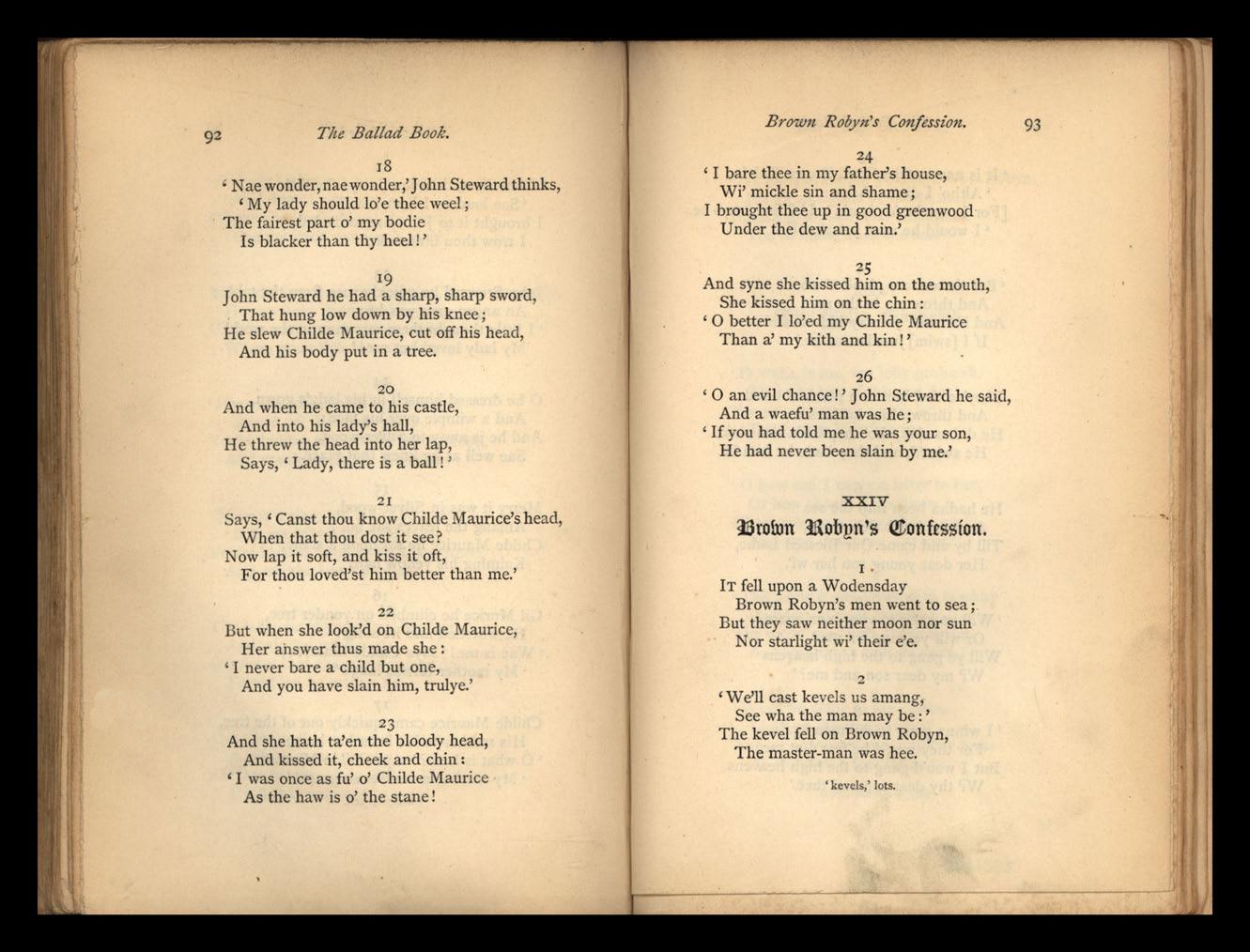
IT fell upon a Wodensday
Brown Robyn's men went to sea;
But they saw neither moon nor sun N or starlight wi' their e'e.
2
'We'll cast kevels us amang,
See wha the man may be : '
The kevel fell on Brown Robyn, The master-man was hee. kevels,' lots.
94 The Ballad Book.
3
, It is nae wonder,' said Brown Robyn, , Altho' I dinna thrive;
[For I murther'd my ain auld father,' says he; , I wou ld he were yet alive!]
4
, But tie me to a plank 0' wood, And throw me in the sea; And if I sink, ye may bid me sink, If I [swim] just lat me be.'
5
They've tied him to a plank 0' wood
And thrown him in the sea;
. He didna sink, tho' they bade him sink, He swim'd, and they bade lat him be.
6
He hadna been into the sea
An hour but barely three, Till by and came Our Blessed Ladie, Her dear young son her wi'.
7
'Will ye gang to your men again? Or will ye gang wi' me?
Will ye gang to the high heavens Wi' my dear son and me?'
8
, I winna gang to my men again, For they wou'd be fear'd at me; But I wou'd gang to the high heavens Wi' thy dear son and thee.'
TIle Jolly Goshawk. 95
9
'It's for nae honour ye did, Brown Robynj It's for nae gude ye did to me; But it's a' for your fair confession You've made upon the sea.' xxv.
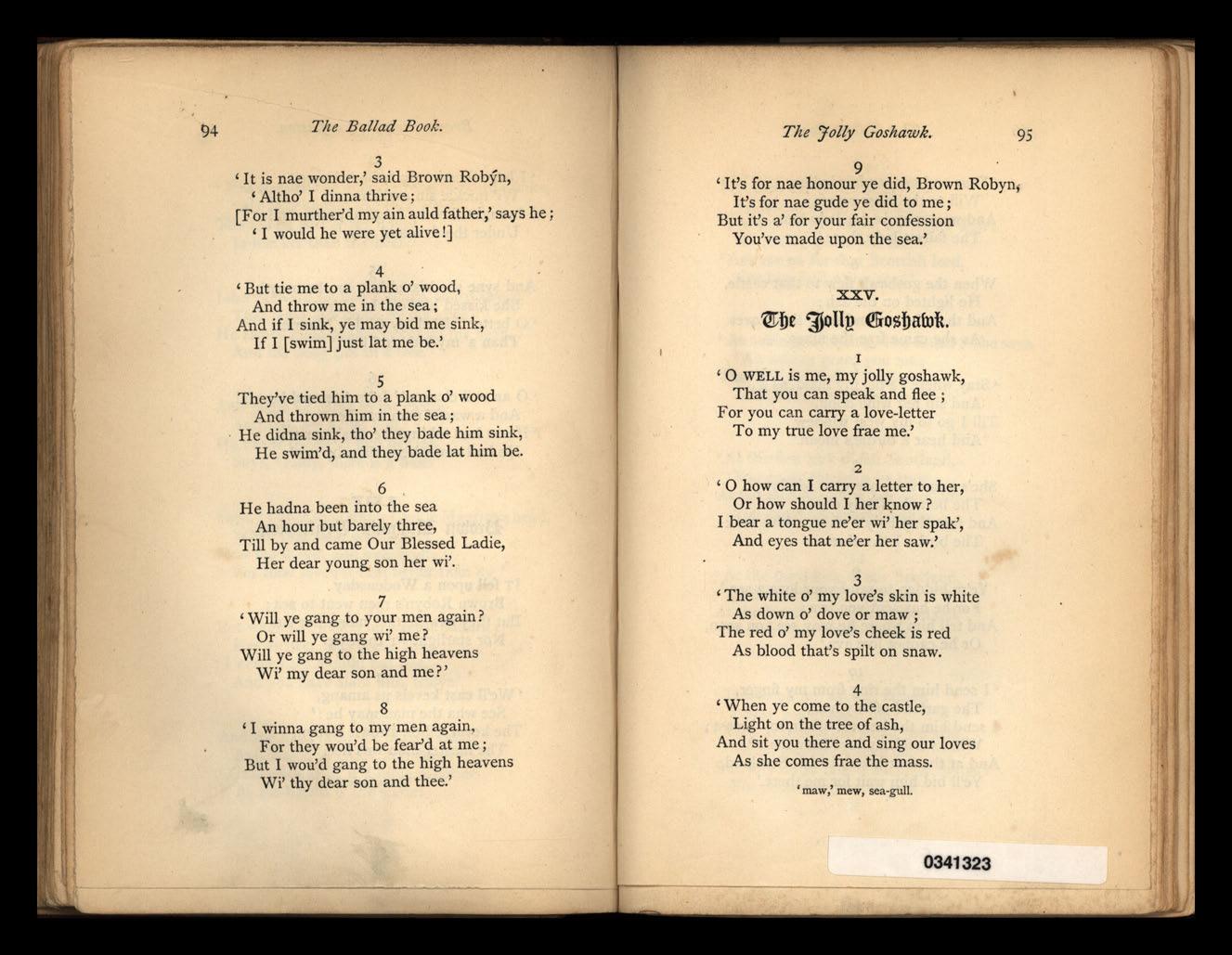
I
, 0 WELL is me, my jolly goshawk, That you can speak and flee; For you can carry a love-letter
To my true love frae me.'
2
, 0 how can I carry a letter to her, Or how should I her know?
I bear a tongue ne'er wi" her spak', And eyes that ne'er her saw.'
3
, The white 0' my love's skin is white
As down 0' dove or maw; The red 0' my love's cheek is red
As blood that's spilt on snaw.
4
'When ye come to the castle, Light on the tree of ash, And sit you there and sing our loves
As she comes frae the mass. 'rnaw,' mew, sea-gull.
TIll! Ballad Book.
5
, Four and twenty fair ladies Will to the mass repair; And weel may ye my lady ken, The fairest lady there.'
6
When the goshawk flew to that castle, He lighted on the ash; And there he sat and sang their loves As she came frae the mass.
7
, Stay where ye be, my maidens a', And sip red wine anon, Till I go to my west window And hear a birdie's moan.'
8
She's gane unto her west window, The bolt she fainly drew; And into that lady's white, white neck The bird a letter threw.
9
, Ye're bidden to send your love a send, F or he has sent you twa; And tell him where he may see you soon, Or he cannot live ava.'
10
, I send him the ring from my finger, The garland off my hair, I send him the heart that's in my breast j What would my love have mair ?
And at the fourth kirk in fair Scotland, Ye'll bid him wait for me there.'
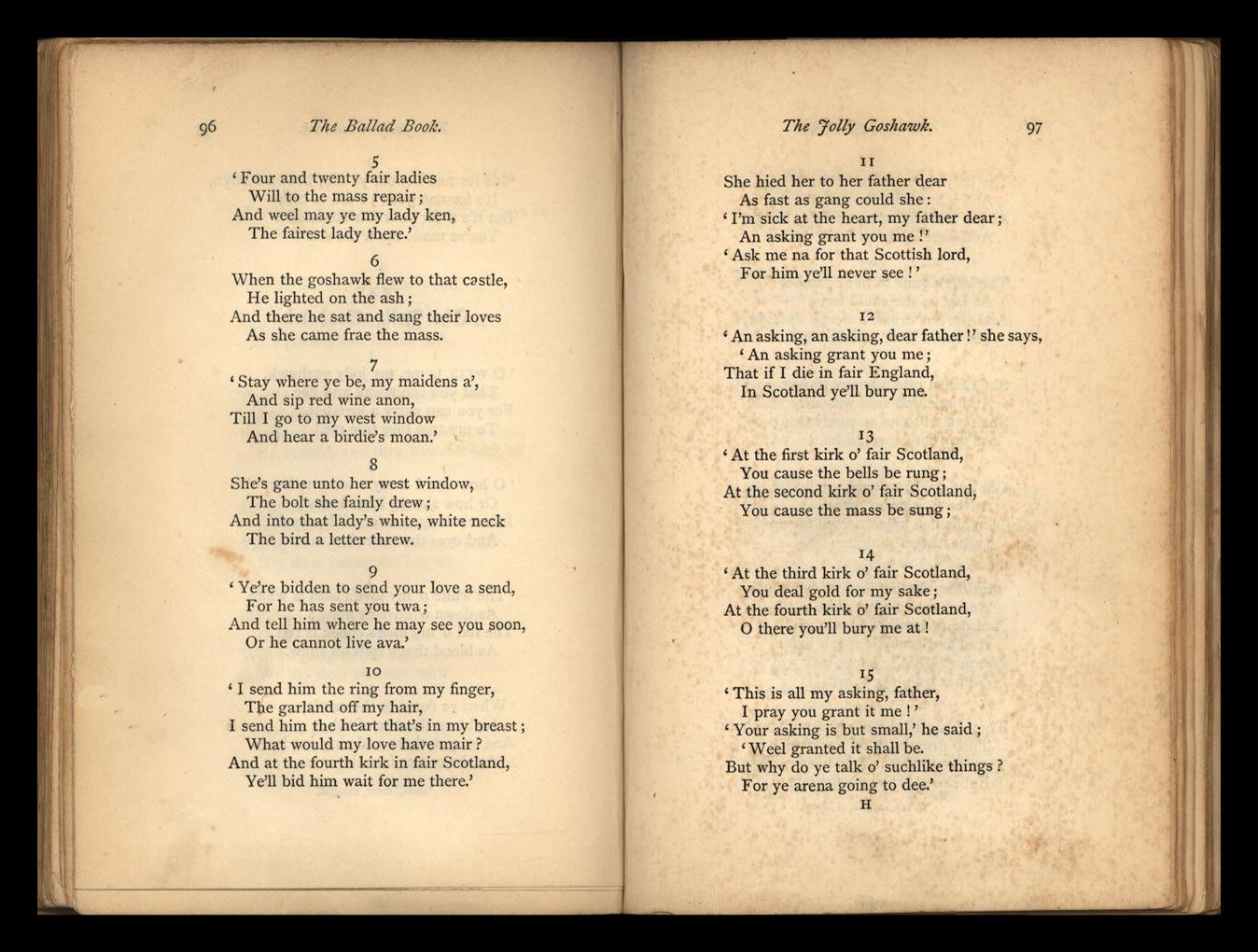
The Jolly Goshawk.
11
She hied her to her father dear As fast as gang could she:
, I'm sick at the heart, my father dear; An asking grant you me !'
, Ask me na for that Scottish lord, F or him ye'll never see! '
12 , 97
, An asking, an asking, dear father!' she says,
, An asking grant you me; That if I die in fair England, In Scotland ye'll bury me.
13
, At the first kirk 0' fair Scotland, You cause the bells be rung; At the second kirk 0' fair Scotland, You cause the mass be sung;
14
, At the third kirk 0' fair Scotland, You deal gold for my sake; At the fourth kirk 0' fair Scotland, o there you'll bury me at !
15
, This is all my asking, father, I pray you grant it me ! '
, Your asking is but small,' he said; 'Weel granted it shall be. But why do ye talk 0' suchlike things? For ye arena going to dee.' H
Ballad Book.
16
The lady's gane to her chamber, And a moanfu' woman was she, As gin she had ta'en a sudden brash, And were about to dee.
17
The lady's gane to her chamber As fast as she could fare; And she has drunk a sleepy draught, She mix'd it wi' mickle care.
18
She's fallen into a heavy trance, And pale and cold was she; She seemed to be as surely dead As ony corpse could be.
19
Out and spak' an auld witch-wife, At the fireside sat she:
Gin she has killed hers ell for love, I wot it weel may be :
20
, But drap the het lead on her cheek, And drap it on her chin, And drap it on her bosom white, And she'll maybe speak again. ' Tis much that a young lady will do To her true love to win.'
2I
They drapped the het lead on her cheek, They drapped it on her chin, They drapped it on her bosom white, . But she spake none again.
• brash,' attack of illness.
The Jolly Goslwwk.
22
Her brothers they went to a room, To make to her a bier; boards were a' 0' the cedar wood, The edges 0' silver clear.
23
Her sisters they went to a room, To make to her a sark; The cloth was a' 0' the satin fine, And the stitching silken-wark.
24
• Now well is me, my jolly goshawk, That ye can speak and flee! Come show me any love-tokens That you have brought to me.'
25
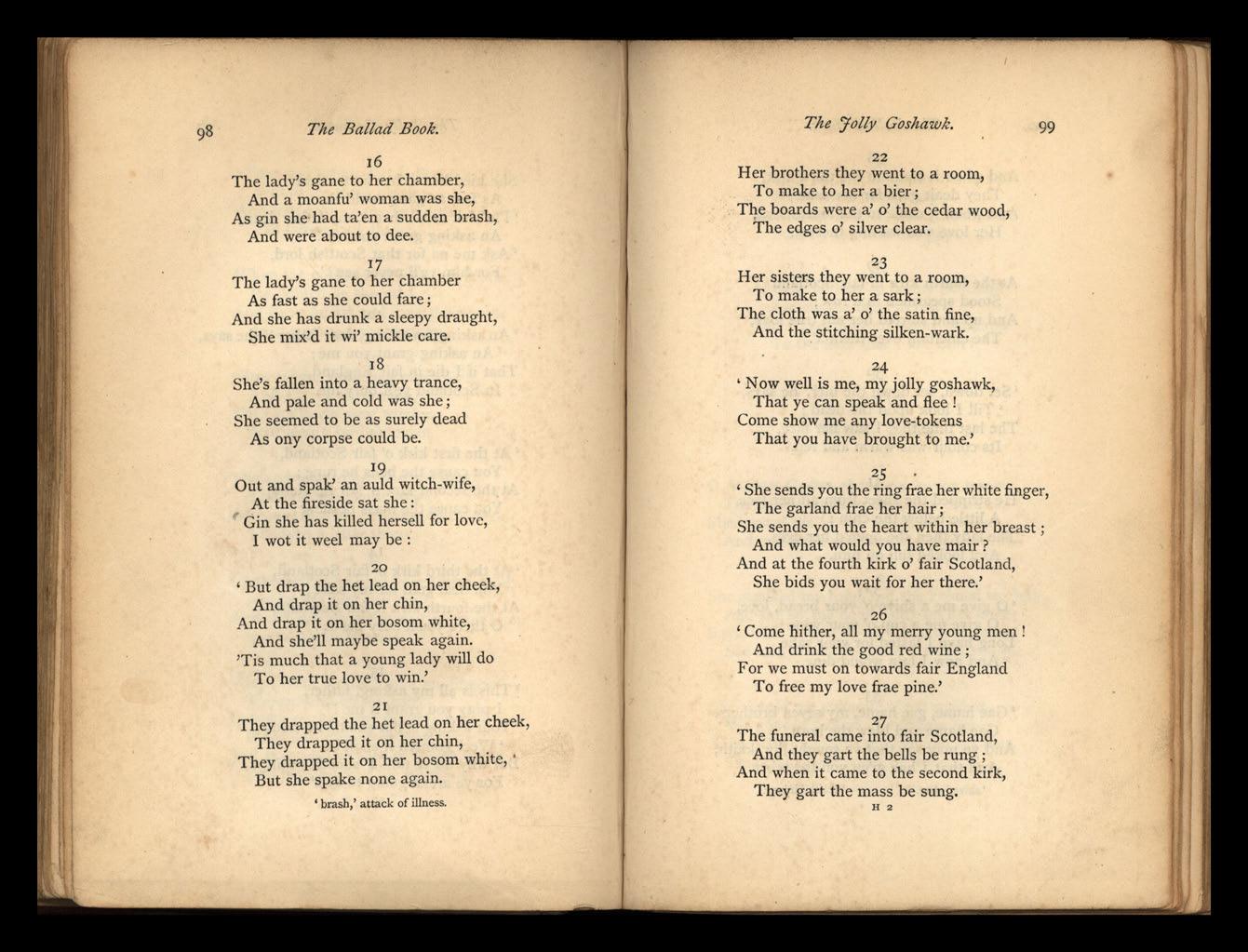
99
, She sends you the ring frae her white finger, The garland frae her hair; She sends you the heart within her breast ; And what would you have mair ? And at the fourth kirk 0' fair Scotland, She bids you wait for her there.'
26
, Come hither, all my merry young men! And drink the good red wine; For we must on towards fair England To free my love frae pine.'
27
The funeral came into fair Scotland, And they gart the bells be rung; And when it came to the second kirk, They gart the mass be sung H 2
lOO TIle Ballad Book.
28
And when it came to the third kirk, They dealt gold for her sake; And when it came to the fourth kirk, Her love was waiting thereat.
29
At the fourth kirk in fair Scotland
Stood speannen in a row; And up and started her ain true love, The chieftain over them a'.
30
, Set down, set down the bier,' he says,
, Till I look upon the dead;
The last time that I saw her face, Its colour was warm and red.'
3 1
He stripped the sheet from aff her face
A little below the chin;
The lady then she open'd her eyes, And looked full on him.
32
, 0 give me a shive 0' your bread, love, o give me a cup 0' your wine!
Long have I fasted for your sake, And now I fain would dine.
33
, Gae hame, gae hame, my seven brothers, Gae hame and blaw the horn !
And ye may say that ye sought my skaith, And that I hae gi'en you the scorn.
• shi.e,' slice. • skaith,' injury
Alison Gross.
34
'I cam' na here to bonny Scotland
To lie down in the clay;
But I cam' here to bonny Scotland
To wear the silks sae gay!
35
, I cam' na here to bonny Scotland
Am;:ng the dead to rest;
But I cam' here to bonny Scotland
To the man that I lo ' e best! '
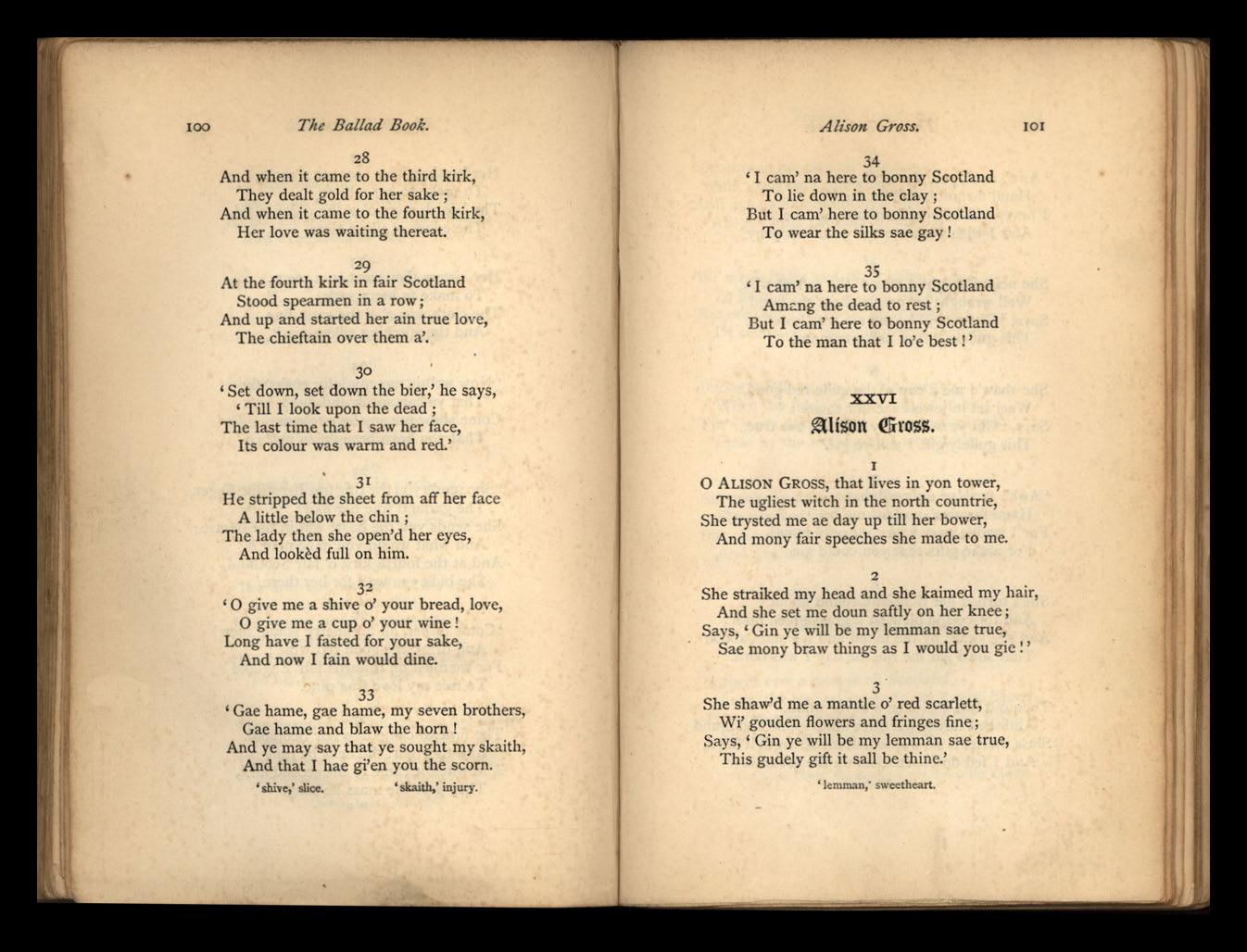
Qli-ross,
o ALISON GROSS, that lives in yon tower, The ugliest witch in the north countrie, She trysted me ae day up till her bower, And mony fair speeches she made to me.
2
She straiked my head and she kaimed my hair, And she set me doun saftly on her knee; Says, ' Gin ye will be my lernman sae true, Sae mony braw things as I would you gie ! '
3
She shaw'd me a mantle 0' red scarlett, Wi' gouden flowers and fringes fine; Says, ' Gin ye will be my lemman sae true, This gudely gift it sall be thine.'
I lenllnan,' s weetheart.
102 Tlte Ballad Book.
4
, Awa!, awa', ye ugly witch, Haud fa r awa', and lat me be ! I never will be your lemman sae true, And I wish I were out 0' your company.'
5
She neist brought a sark 0' the saftest silk, Well wrought wi' pearls about the band ; Says, ' Gin ye will be my ain true love, This gudely gift ye sall command.'
6
She shaw'd me a cup 0' the gude red goud, Weel set in jewels sae fair to see; Says, ' Gin ye will be my lemman sae true, This gudely gift I will ye gie.'
7
, Awa', awa', ye ugly witch, Haud far awa!, and lat me be ! For I wadna ance kiss your ugly mouth For a' the gifts that you could gie.'
S
She's turned her richt and round about, And thrice she blew on a grass-green horn ; And she sware by the moon and the stars aboon That she'd gar me rue the day I was born.
9
Then out has she ta'en a silver wand, And she's turned her three times round and round; She's mutter'd sic words that my strength it fail'd, And I fell doun senseless on the ground. 'sark: shirt.
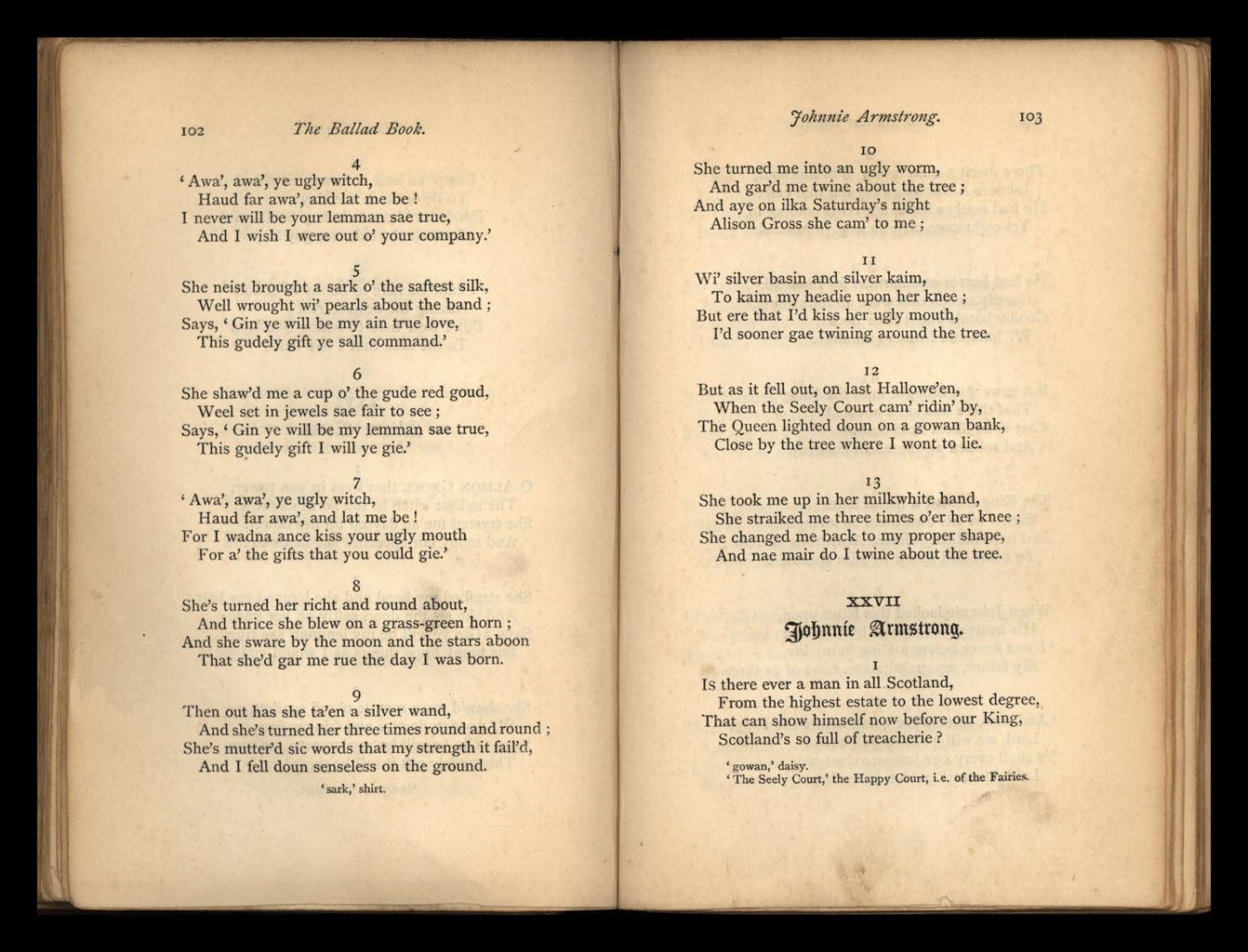
Joltmde A rmstroug.
10
She turned me into an ugly worm, And gar'd me twine about the tree; And aye on ilka Saturday's night Alison Gross she cam' to me ;
II
Vii' silver basin and silver kaim, To kaim my headie upon her knee; But ere that I'd kiss her ugly mouth, I'd sooner gae twining around the tree.
12
But as it fell out, on last Hallowe'en, When the Seely Court cam' ridin' by, The Queen lighted doun on a gowan bank, Close by the tree where I wont to lie.
13
She took me up in her milkwhite hand,
She straiked me three times o'er her knee; She changed me back to my proper shape, And nae mair do I twine about the tree.
XXVII I
Is there ever a man in all Scotland, From the highest estate to the lowest degree , That can show himself now before our King, , Scotland's so full of treacherie ?
, go wan,' dai sy.
, The Seely Court,' the H appy Court, i, e. of the Fairie.,
104 TIle Ballad Book.
2
There dwelt a man in fair Westmorland, Johnnie Armstrong they did him call ; He had neither lands nor rents coming in, Yet eightscore men he kept in his hall.
3
He had horses and harness for them all, Goodly steeds that were all milkwhite, Goodly bands about their necks, Wi' hats and feathers all alike.
4
But news was brought unto the King That there was sic a one as he, That lived like a bold outlaw, And robbed all the north countrie.
5
The King he sent a broad letter Sign' d wi' his own hand so lovinglie, And hath bidden Johnnie Armstrong therein To come and speak wi' him speedilie.
6
When Johnnie looked this .letter upon, His heart was blithe as bird on tree: , I was never before a King in my life, My father, my grandfather, none of us three.
7
, And now, since we're going before the King, Lord, we will go most gallantlie ! Ye shall everyone have a velvet coat, Laid down wi' golden laces three.

JoJl1mie Armstrong.
8
'Ye shall every one have a scarlet cloak, Laid down wi' silver laces white; \Vi' your golden bands about your necks, Black hats, white feathers, all alike.'
9
But when J ohnnie went from Giltnock Hall, The wind blew hard, and fast did it rain:
, Now fare thee well, thou Giltnock Hall ! I fear I shall never see thee again.'
10
Now Johnnie he is to Edinborough gone, Wi' his eightscore men so gallantlie ; Every one on a milkwhite steed, Wi' sword and buckler at his knee.
11
When J ohnnie came before the King, He fell down low upon his knee:
, 0 pardon, my sovereign liege! ' he said, '0 pardon my eights core men and me!'
12
, Thou shalt have no pardon, thou traitor stron g, For those thy eightscore men nor thee; To-morrow morning, by ten 0' the clock, Ye all shall hang on the gallows-tree.'
13
Then J ohnnie look'd over his left shoulder, And to his merry men thus said he : (I have asked grace of a graceless face; No pardon there is for you and me.'
106 The Ballad Book.
14
At Johnnie's belt was a bright broadsword, That swiftly out of his sheath pull'd he ; And had not the King moved his foot aside, He had smitten the head from his fair bodie.
15
Saying, ' Fight on, my merry men all, And see that none of you be ta'en ; . Rather than men shall say we were hang'd, Let them report how we were slain.'
16
Then, I wot, fair Edinborough rose, And so beset poor J ohnnie around, That fourscore and ten of John's best men Lay gasping there on bloody ground.
17
Like a bold fellow John laid about, And like a madman there fought he ; Till a false Scot drew in behind, And ran him through the fair bodie.
18
Says J ohnnie, ' Fight on, my merry men all! I'm a little wounded, but I'm not slain; I will lay me down to bleed awhile, And then rise and fight with you again.'
19
So they fought on courageously, Till every man of them was slain; But little Musgrave, that was Johnnie's foot-page, On his master's horse rode off unta'en.

Katlzarille Jallfarie.
20
But when he came to Giltnock Hall, The lady spied him presentlie : 107 , What news, what news, thou little foot-page? 'Vhat news from thy master, and his companie ?'
21
, My news is bad news, lady,' he said, , And very bad, as you may see; My master, Johnnie Armstrong, is slain, And all his gallant companie.'
22
Out then spake his little son, As he stood by his nurse's knee :
, If ever I live to be a man, I'll revenge my father's death,' said he.
XXVIII
'itatbatine gJanfarie.
1
THERE was a may, and a weel-far'd may, Lived high up in yon glen: Her name was Katharine Janfarie, She was courted by mony men.
2
Doun cam' the Laird 0' Lamington, Doun frae the South Countrie ; An<;l he is for this bonny lass, Her bridegroom for to be.
108 The Ballad Book.
3
He ask'd no her father and mither, N or the chief 0' a' her kin ; But he whisper'd the bonny lass hersel', And did her favour win.
4
Doun cam' an English gentleman, Doun frae the English border; He is for this bonny lass, To keep his house in order.
5
He ask'd her father and mither, And a' the lave 0' her kin; But he never ask'd the lassie hers el' Till on her wedding-e'en .
6
But she has wrote a long letter, And sealed it with her hand; And sent it away to Lamington, To let him understand.
7
The first line 0' the letter he read, He was baith fain and glad; But or he has read the letter o'er, He's turn'd baith wan and sad.
8
Then he has sent a messenger, To run through all his land; And four and twenty armed men Were all at his command.
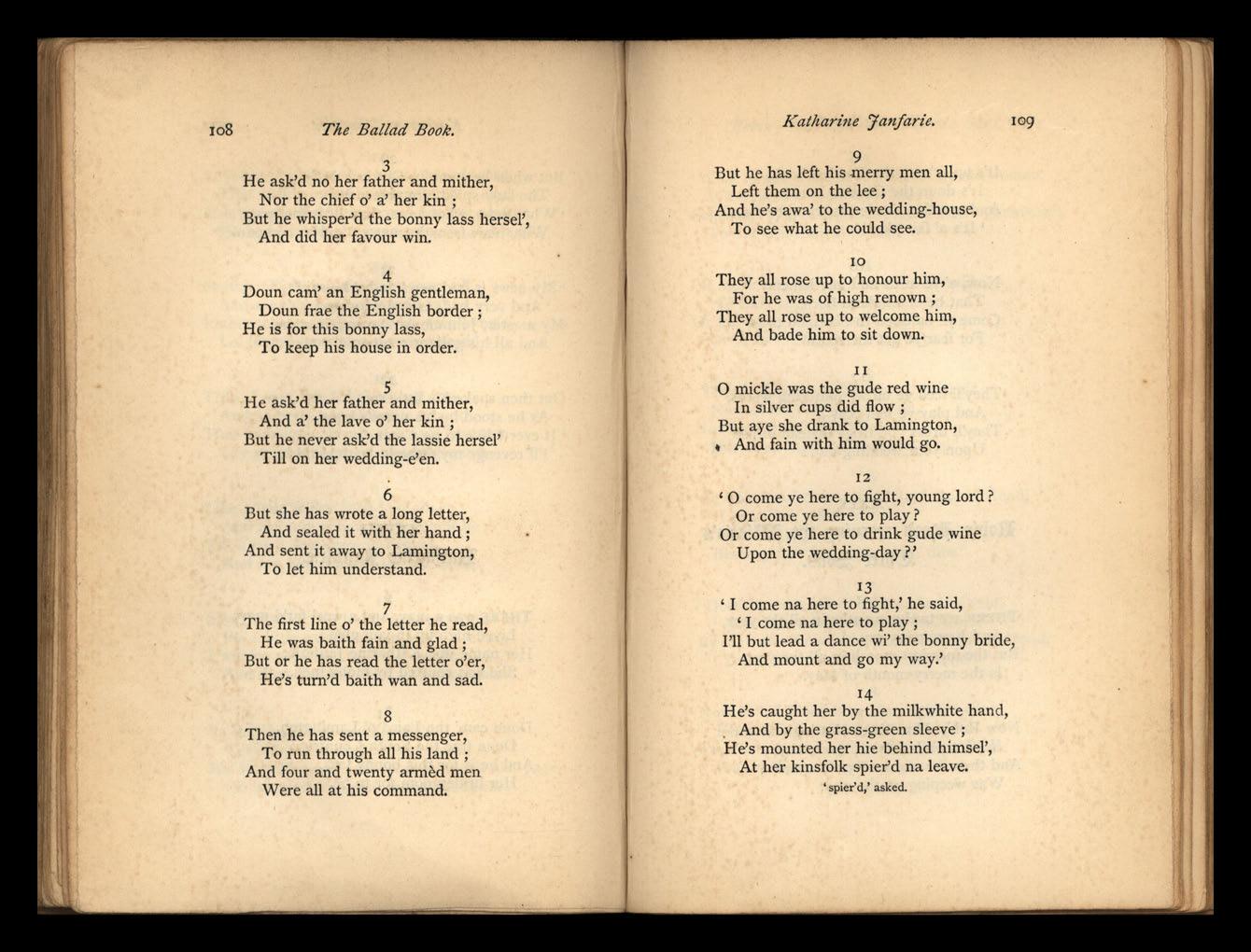
Katltarille Jal1farie.
9
But he has left his merry men all, Left them on the lee; And he's awa' to the wedding-house, To see what he could see.
10
They all rose up to honour him, For he was of high renown; They all rose up to welcome him, And bade him to sit down.
II
o mickle was the gude red wine In silver cups did flow; But aye she drank to Lamington,
• And fain with him would go.
12
, 0 come ye here to fight, young lord? Or come ye here to play? Or come ye here to drink gude wine Upon the wedding-day?'
13
, I come na here to fight,' he said, , I come na here to play;
I'll but lead a dance wi' the bonny bride, And mount and go my way.'
14
He's caught her by the milkwhite hand, . And by the grass-green sleeve; He's mounted her hie behind himsel', At her kinsfolk spier'd na leave. , spier' cl,' asked.
1 IO Tile Ballad Book.
15
It's up, it's up the Couden bank, It's doun th e Couden brae ; And aye they made the trumpet sound, , It's a' fair play! '
16
Now, a' ye lords and gentlemen That be of England born, Come ye na doun to Scotland thus, F or fear ye get the scorn !
17
They'll feed ye up wi' flattering words, And play ye foul play; They'll dress you frogs instead of fish Upon your wedding-day!

THERE are twelve months in all the year, As I hear many say, But the merriest month in all the year Is the merry month of May.
2
Now Robin Hood is to Nottingham gone, With a link a down, and a day, And there he met a silly old woman, Was weeping on the way.
Robill Hood and tlte Widow's Sons. 1 I 1
3
'What news? what news? thou silly old woman, What news hast thou for me ?'
Said she, ' There's my three sons in Nottingham town To-day condemned to die.'
4
, 0, have they parishes burnt?' he said, , Or have they ministers slain? Or have they robbed any virgin? Or other men's wives have ta'en ?'
5
, They have no parishes burnt, good sir, Nor yet have ministers slain, Nor have they robbed any virgin, Nor other men's wives have ta'en.'
6
'0, what have they done?' said Robin Hood, , I pray thee tell to me.'
, It's for slaying of the king's fallow deer, Bearing their long bows with thee.'
7
, Dost thou not mind, old woman,' he said, , How thou mad est me sup and dine?
By the truth of my body,' quoth bold Robin Hood, 'You could not tell it in better time.'
8
Now Robin Hood is to Nottingham gone, With a link a down, and a day, And there he met with a silly old palmer, Was walking along the highway. palmer,' pilgrim .
112 The Ballad Book.
9
, What news? what news? thou silly old man, What news, I do thee pray?'
Said he, ' Three squires in Nottingham town Are condemn'd to die this
10
, Come change thy apparel with me, old man, Come change thy apparel for mine; Here is ten shillings in good silver, Go drink it in beer or wine.'
II
, 0, thine apparel is good,' he said,
, And mine is ragged and torn ; Wherever you go, wherever you ride, Laugh not an old man to scorn.'
12
, Come change thy apparel with me, old churl, Come change thy apparel with mine; Here is a piece of good broad gold, Go feast thy brethren with wine.'
13
Then he put on the old man's hat , It stood full high on the crown : , The first bold bargain that I come at, I t shall make thee come down.'
14
Then he put on the old man's cloak, Was patch'd black, blue, and red; He thought it no shame, all the day long, To wear the bags of bread.
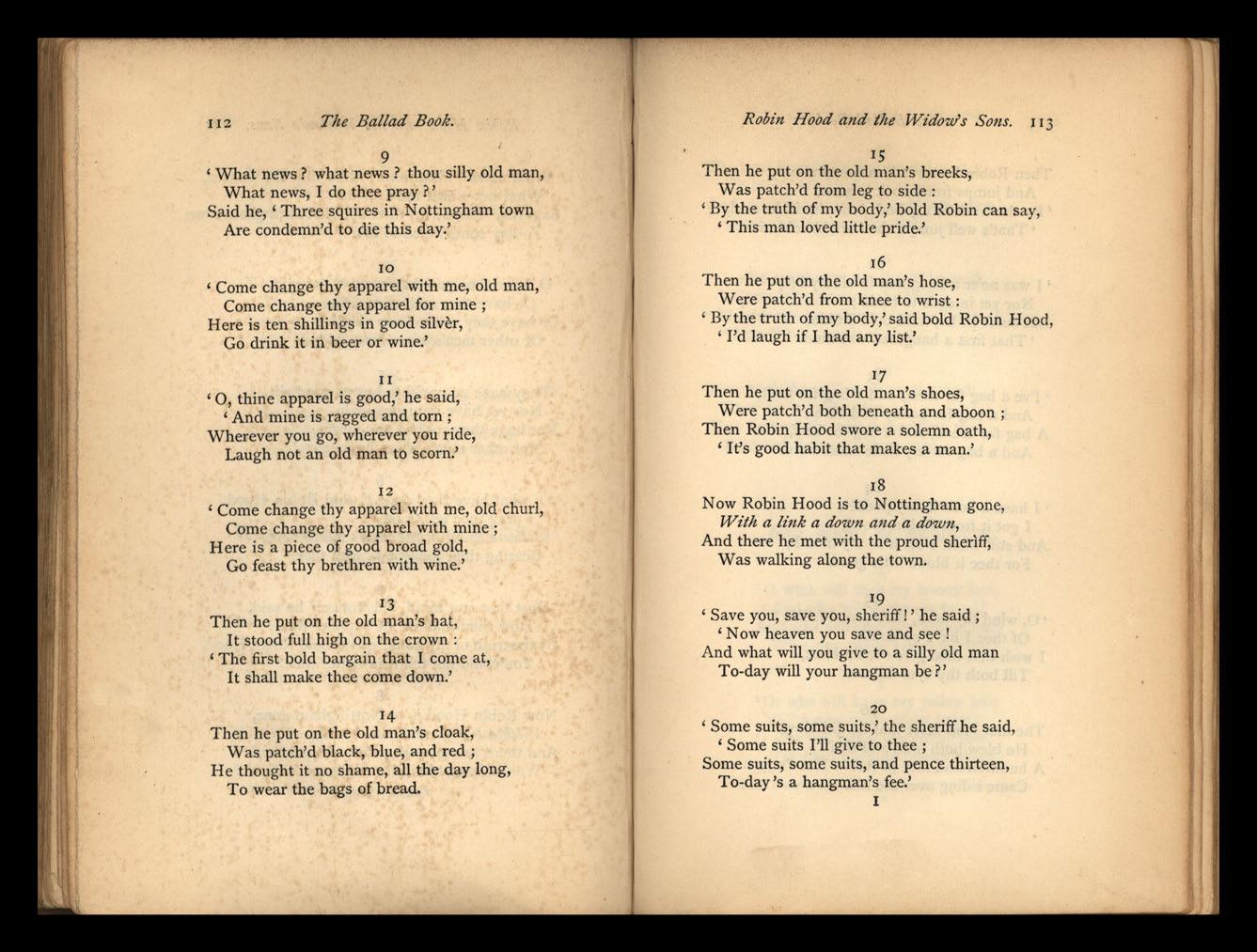
Robi1t Hood and the Wido ·ws SOilS. 113
15
Then he put on the old man's breeks Was patch'd from leg to side: '
'By th.e truth of my ?ody,' bold Robin can say, , ThiS man loved httle pride.'
16
Then he put on the old man's hose, Were patch'd from knee to wrist:
, By the truth of my body,' said bold Robin Hood , I'd laugh if I had any list.' '
17
Then he put on the old man's shoes, Were patch'd both beneath and aboon .
Then Robin Hood swore a solemn oath ' , It's good habit that makes a man.' '
18
Now Robin Hood is to Nottingham gone, With a link a down and a down, And there he met with the proud sheriff, Was walking along the town.
19
, Save you, save you, sheriff! ' he said; 'Now heaven you save and see! And what will you give to a silly old man To-day will your hangman be?'
20
, Some suits, some suits,' the sheriff he said, , Some suits I'll give to thee; Some suits, some suits, and pence thirteen, To-day's a hangman's fee.'
I
114 The Ballad Book.
21
Then Robin he turns him round about, And jumps from stock to stone:
, By the truth of my body,' the sheriff he said, , That's well jumpt, thou nimble old man.'
22
, I was ne'er a hangman in all my life, N or yet intends to trade; But curst be he,' said bold Robin, , That first a hangman was made !
23
, I've a bag for meal, and a bag for malt, And a bag for barley and corn ; A bag for bread, and a bag for beef, And a bag for my little small horn.
24
, I have a horn in my pocket, I got it from Robin Hood, And still when I set it to my mouth, For thee it blows little good.'
25 , 0, wind thy horn, thou proud fellow! Of thee I have no doubt. I wish that thou give such a blast, Till both thy eyes fallout.'
26
The first loud blast that he did blow, He blew both loud and shrill ; A hundred and fifty of Robin Hood's men Came riding over the hill.
Fair Amlie of Lochroyan.
27
The next loud blast that he did give, He blew both loud and amain, And quickly sixty of Robin Hood's men Came shining over the plain.
28
, 0, who are those,' the sheriff he said , Come tripping over the lee?' ,
, They're my attendants,' brave Robin did say' , They'll pay a visit to thee.' '
29
They took the gallows from the slack They set it in the glen, , They hanged the proud sherIff on that Released their own three men. '

1
, 0 WHA will shoe my bonny foot, And wha will glove my hand? And wha will lace my middle jimp Wi' a new-made London band?
2
, Or wha will kaim my yellow hair Wi' a new-made silver kaim ? o wha will father my young son Till Lord Gregory comes hame ?'
, slack,' lower ground. I jimp,' neat. 'kaim,' comb.
116 The Ballad Book.
3
, Thy father will shoe thy bonny foot, Thy mother will glove thy hand, Thy sister will lace thy middle jimp, Till Lord Gregory comes to land.
4
, Thy brethren will kaim thy yellow hair Wi' a new-made silver kaim ; And God will be thy bairn's father , Till Lord Gregory comes hame.'
5
, 0 gin I had a bonny boat, And men to sail wi' me,
It's I wad gang to my true lo ve, Sin' he winna come to me ! '
6
Her father's gi'e n her a bonny boat, And sent h er to the strand; She's ta'en her young son in her arm s, And turn'd her back to the land.
7
Her mast was cover'd wi ' beaten gold, And it shon e across the sea; The sails were 0' the grass-green silk, And the ropes 0 taffetie.
8
And now she has been on the sea sailing
For seven lang days or more, She's landed one night frae her bonny bo a t ear to her true love's door.
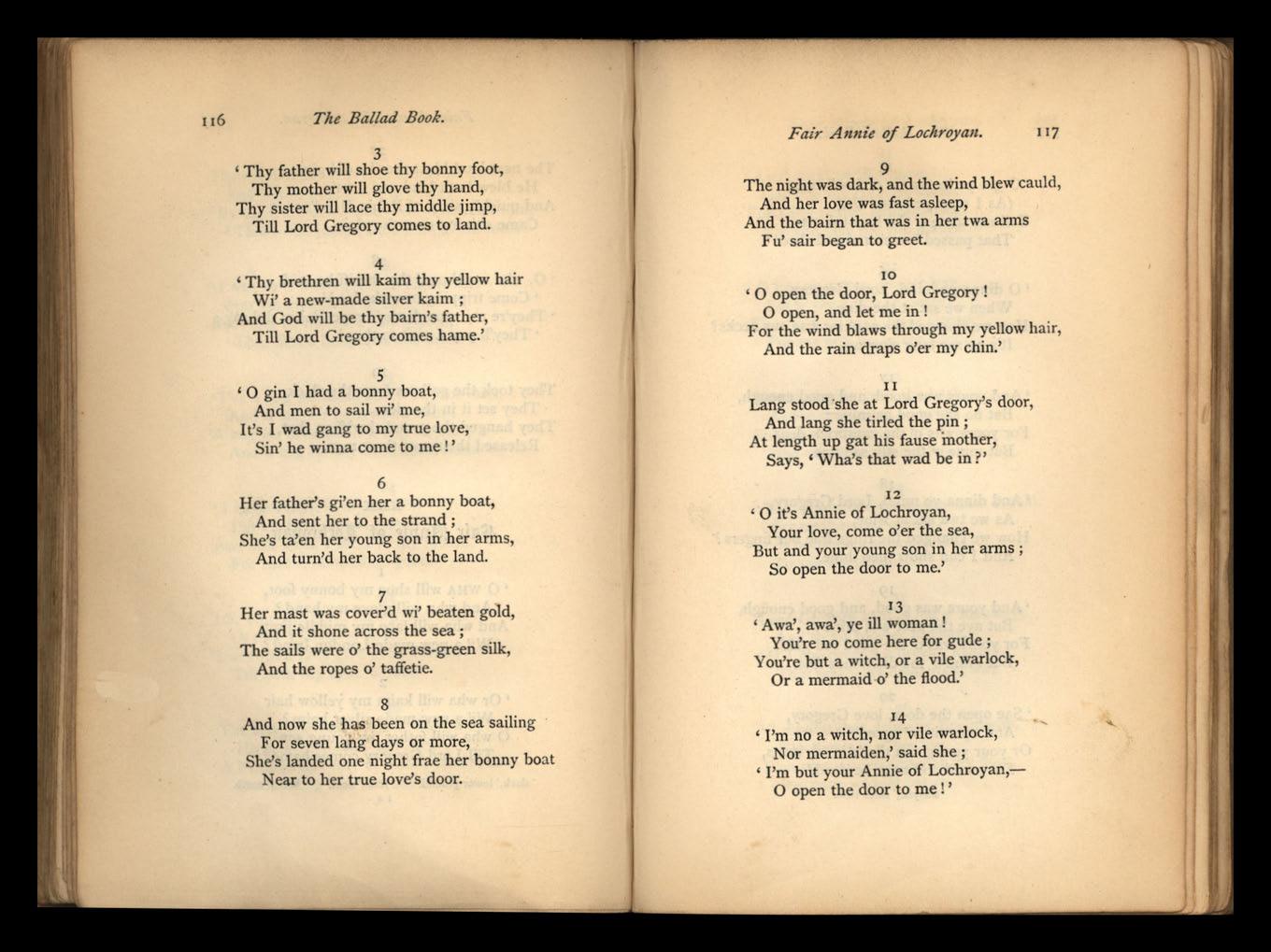
Fair Amzie of Lockroyall. 117
9
The night was dark, and the wind blew cauld , And her love was fast asleep, And the bairn that was in her twa arms Fu' sair began to greet.
10
, 0 open the door, Lord Gregory ! o open, and let me in !
For the wind blaws through my yellow h ai r, And the rain draps o' er my chin.'
Il
Lang stood 'she at Lord Gregory's door, And lang she tirled the pin; At length up gat his fause inother, Says, 'Wha' s that wad be in?'
12
, 0 it's Annie of Lochroyan, Your love, come o' er the sea, But and your young son in her arms; So open the door to me.'
13
' Awa!, awa', ye ill woman! You're no come here for gude ; You're but a witch, or a vile warlock, Or a mermaid 0' the flood.'
14
, I'm no a witch, nor vile warlock, Nor mermaiden,' said she;
, I'm but your Annie of Lochroyan,o open the door to me ! '
lIS Tile Ballad Book.
15
, 0 gin ye. be Annie of Lochroyan (As I trow ye binna she), Tell me some 0' the love-tokens That passed 'tween me and thee.'
16
, 0 dinna ye mind, Lord Gregory, When we sat at the dine, How we changed the napkins frae our necks? It's no. sae lang sinsyne.
17
, And yours was good, and good enough, But no sae good as mine; For yours was 0' the cambrick dear But mine 0' the silk sae fine.
18
'And dinna ye mind, Lord Gregory, As we twa sat at wine, How we changed the rings frae our fingers? And I can show thee thine.
19
, And yours was good, and good enough· , But aye the best was mine; For was 0' the good red gold, But mme 0' the diamonds fine.
20
, Sae open the door, love Gregory, And open it wi' speed; Or your young son that's in my arms, For cauld will soon be dead.'
, sinsyne, J since then.
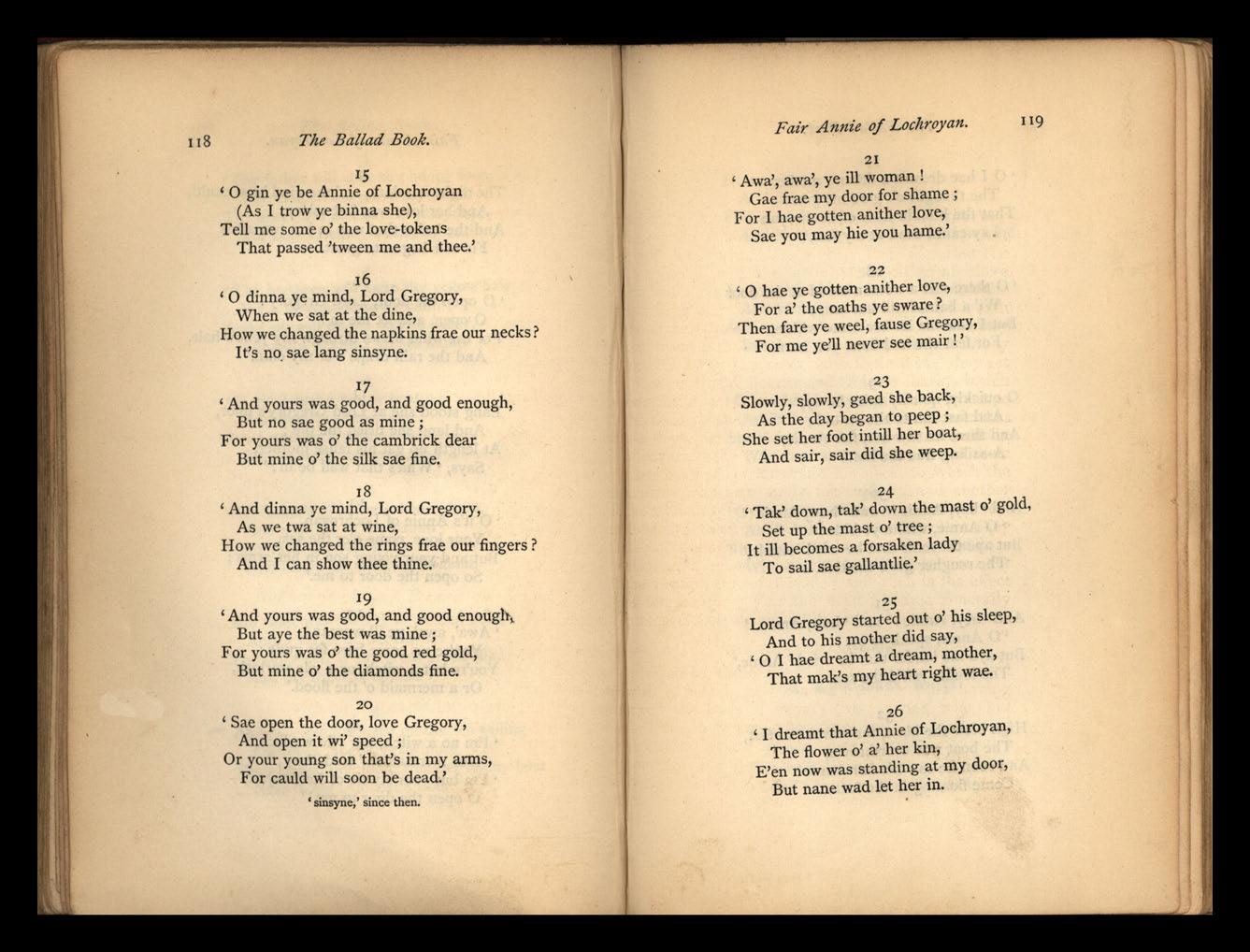
Fair Amu'e of Loc1lroyan.
21 'Awa', awa', ye ill woman! Gae frae my door for shame; For I hae gotten anither love, Sae you may hie you hame.'
22
, 0 hae ye gotten anither love, For a' the oaths ye sware? Then fare ye weel, fause Gregory, For me ye'll never see mair!'
23
Slowly, slowly, gaed she back, As the day began to peep; She set her foot intill her boat, And sair, sair did she weep. 1I9
24
, Tak' down, tak' down the mast 0' gold, Set up the mast 0' tree; It ill becomes a forsaken lady To sail sae gallantlie.'
25
Lord Gregory started out 0' his sleep, And to his mother did say, '0 I hae dreamt a dream, mother, That mak's my heart right wae.
26
, I dreamt that Annie of Lochroyan, The flower 0' a' her kin, E'en now was standing at my door, But nane wad let her in.
120 The Ballad Book.
27
'0 I hae dreamt a dream, motherThe thought o't gars me greetThat the bonnie Lass of Lochroyan Lay cauld dead at my feet.'
28
, 0 there was a woman stood at the door Wi' a bairn intill her arm ; But I couldna let her come within, For fear she had done you hann.'
29
o quickly, quickly raise he up, And fast ran to the strand; And there he saw her, fair Annie, A-sailing frae the land.
30
And' hey, Annie !' and' how, Annie ! ' , 0 Annie, winna ye bide?'
But aye the mair that he cried' Annie,' The rougher grew the tide.
31
And' hey, Annie !' and' how, Annie ! ' , 0 Annie, speak to me ! '
But aye the louder that he cried' Annie ' The louder rair'd the sea. '
32
High blew the blast, the waves ran fast, The boat was overthrown, And soon he saw his fair Annie Come floating in the, foam.
A Lyke-wake Dirge.
33 He caught her by the yellow hair, And drew her up on the sand; Fair Annie's corpse lay at his feet, T21 And his young son came never to land.
34
And syne he kissed her on the cheek, And kissed her on the chin; And syne he kissed her on the mouth, But there was nae breath within.
35 , 0 wae betide my mother!
An ill death may she dee !
She turned my true love frae my door, Wha cam' sae far to me !
36 , 0 wae to my cruel mother!
An ill death may she dee ! She turned fair Annie frae my door, Wha died for love 0' me ! '

THIS ae nighte, this ae nighte, Everz'e nz'glzte and alle, Fire, and sleete, and candle-lighte, A lid Cl&rz'ste receive tlly saUli.
122 The Ballad Book.
When thou from hence away art past, Everie nigllte and alle,
To Whinny-muir thou comest at last, Atld Cltriste receive tlly saule.
If ever thou gavest hosen and shoon, Everie nigltte and alle, Sit thee down and put them on, And Cltriste receive thy saule.
If hosen and shoon thou gavest nane,
Everie nigltte and alle,
The whinnes shall pricke thee to the bare bane, A lld Cltriste receive tlly saule.
From Whinny-muir when thou mayst passe, Everie nighte and atle,
To Brigg 0' Dread thou comest at last, And Cltriste receive thy saute.
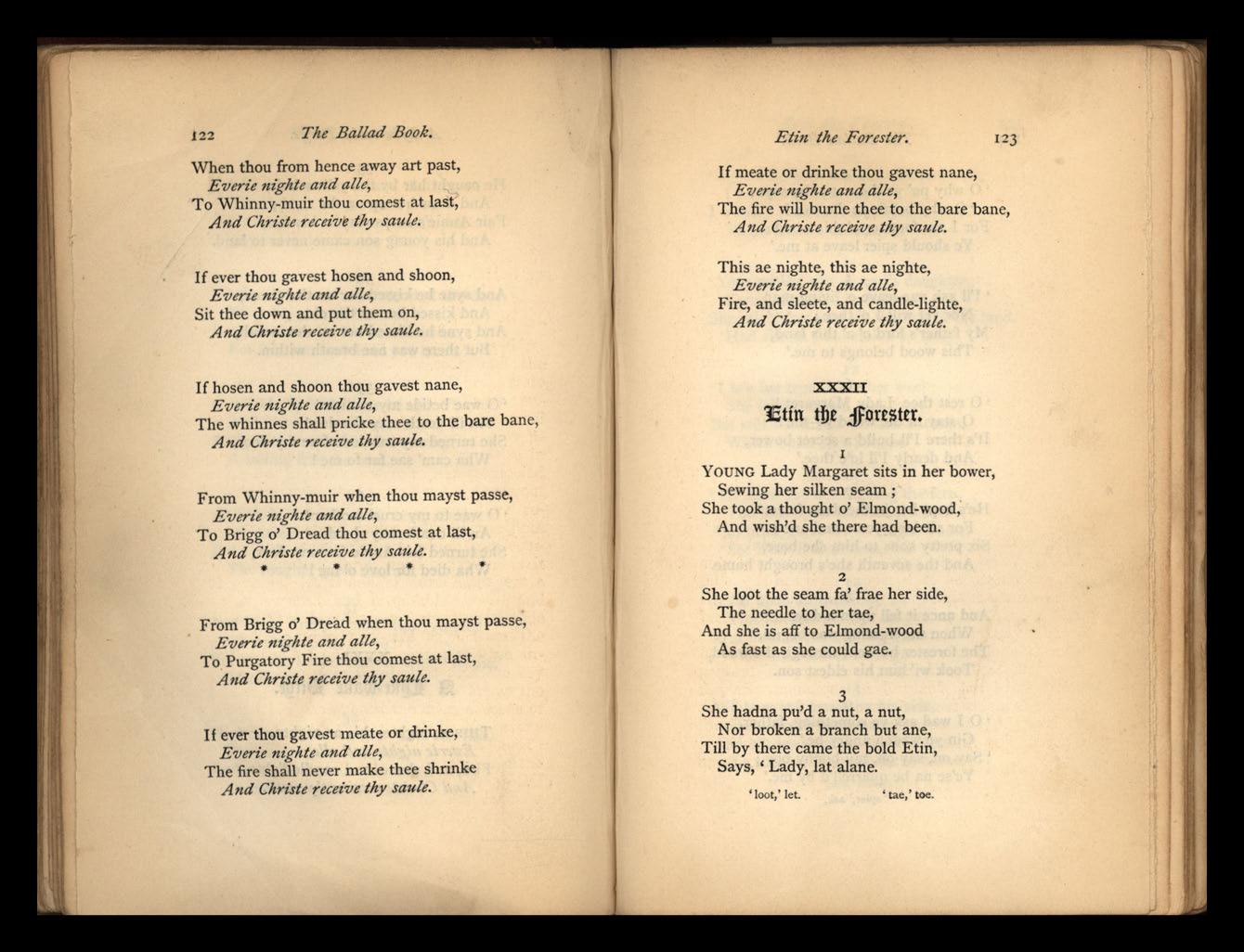
From Brigg 0' Dread when thou mayst passe, Everie nigllte and alle,
To Purgatory Fire thou comest at last, And Christe receive tlly saute.
If ever thou gavest meate or drinke, Everie 1zigltte and atte,
The fire shall never make thee shrinke And Cltriste receive thy saute.
Eti1t tlte Forester. 12 3
If meate or drinke thou gavest nane
Everie 1tighte and alle, '
The fire will burne thee to the bare ban e And Cltriste receive tlly saule. '
This ae nighte, this ae nighte, Everie 1tigltte and alle, Fire, and sleete, and candle-lighte, And Cltriste receive thy saute.
1
YOUNG Lady Margaret sits in her bower
Sewing her silken seam; ,
She took a thought 0' Elmond-wood
And wish'd she there had been. '
2
She loot the seam fa' frae her side, The needle to her tae, And she is aff to Elmond-wood
As fast as she could gae.
3
She hadna pu'd a nut, a nut, N or broken a branch but ane, Till by there came the bold Etin, Says, ' Lady, lat alane. 'loo t,' let. 'tae,' toe.
124 The Ballad Book.
4
, 0 why pu' ye the nut?' he says; , 0 why break ye the tree?
For I am forester 0' this wood : Ye should spier leave at me.'
5
• I'll ask nae leave 0' living man, N or yet will I 0' thee; My father's lord 0' a' this land, This wood belongs to me.'
6
, 0 rest thee, Lady Margaret ! o stay in the wood wi' me! It's there I'll build a secret bower, And dearly I'lllo'e thee.'
7
He's kept her in the deep forest
For six lang years and ane ; Six pretty sons to him she bore, And the seventh she's brought hame.
8
And ance it fell upon a day, When the hunting was begun, The forester he went through the wood, Took wi' him his eldest son.
9
, 0 I wad ask ye something, father, Gin ye wadna angry be.'
• Say on, say on, my bonny boy; Ye'se na be quarrell'd by me.' . spier,' ask.

Eti1t the Forester.
10
, My mither's cheeks are afttimes weet, I never see them dry ; I wonder what is it aileth her To mourn sae constantly.'
11
, Your mither was an earl's daughter, Sprung frae a high degree;
12 5 She might hae wed wi' the first in the land, Had she na been stolen by me.
12
, I lo'e her true, I lo'e her weel ; She lo'es me weel and true; But still she thinks on former times, Which aften gars her rue.'
13
, I'll shoot the deer amang the fern, The bird upon the tree, And bring them to my mither ham e , See if she'll merrier be.'
14
It fell upon anither day, This forester thought lang ; And he is to the hunting gane The forest leaves amang.
15
Wi' bow and arrow by his side, He took his path alane ; And left his seven young children To stay wi' their mither at hame . , gars,' makes.
The Ballad Book.
16
, I'd ask ye something, mither, An ye wadna angry be.'
, Ask on, ask on, my eldest son; Ask ony thing at me.'
17
'Your cheeks are afttimes weet, mither ; You're weeping, as I can see.'
'Nae wonder, nae wonder, my little son, N ae wonder though I should dee !
18
, For I was ance an earl's daughter, Of noble birth and fame;
And now I'm the mither 0' seven sons Wha ne'er gat christendame.'
19
He's ta'en his mither by the hand, His six brithers also, And they are on through Elmond-wood As fast as they could go.
20
They wistna weel whar' they were gaen, And weary were their feet; They wistna weel whar' they were gaen, Till they stopp'd at her father's gate.
21
, I hae nae money in my pocket, But jewel-rings I hae three; I'll gie them to you, my little son, And ye'll enter there for me.

Etht tlte Forester.
22
, Ye'll gie the first to the proud porter, And he willlat you in ; Ye'll gie the next to the butler-boy, And he will show you ben.
23
I Ye'll gie the third to the minstrel That's harping in the ha', To play good luck to the bonny boy That comes frae the greenwood shaw.'
24
He ga'e the first ring to the proud porter, And he open'd and lat him in ; He gale the next to the butler-boy, And he has shown him ben;
25
He ga'e the third to the minstrel That was harping in the ha', And he play'd success to the bonny boy That cam' frae the greenwood shaw.
26
Now when he caJ:Il' before the Earl, He fell down low on his knee; The Earl he turned round about, And the saut tear blint his e'e.
27
, Win up, win up, my bonny boy, Gang frae my companie ; Ye look sae like my dear daughter, My heart will burst in three!' , ben,' to the inner.
128 TIle Ballad Book.
28
, If I look like your dear daughter, A wonder it is nane ; If I look like your dear daughter, I am her eldest son.'
29
, 0 tell me soon, ye little wee boy, Where may my Margaret be?'
, She's just now standing at your gates, And my six brithers her wi'.'
30
'Now where are a' my porter-boys
That I pay meat and fee,
To open my gates baith braid and wide, And let her come in to me ?'
3 1
When she cam' in before the Earl, She fell down low on her knee: , Win up, win up, my daughter dear; This day ye'll dine wi' me.'
32
I Ae bit I canna eat, father, Ae drop I canna drink, Till I see Etin, my dear husband; Sae long for him I think!'
33
'Now where are a' my range:-s bold That I pay meat and fee, To search the forest far and wide, And bring Etin to me?'

Etin tlte Forester.
34
Out then speaks the little wee boy: , N a, na, this mauna be ; Without ye grant a free pardon, I hope ye'll na him see! '
35 , 0 h ere I grant a free pardon Well seal'd wi' my own han' ; And mak' ye search for Etin, As soon as ever ye ca n.'
36
They search'd the country braid and wide, The forest far and near, And they found him into Elmond-wood, Tearing his yellow hair.
37
, Win up, win up now, Etin, Win up and boun' wi' me ; For we are come frae the castle, And the Earl wad fain you see.'
38
, 0 lat him tak' my head,' he says, , Or hang me on a tree; For since I've lost my dear lady, Life's no plea sure to me ! '
39
'Your head will no be touch'd, Etin, Nor sall you hang on tree; Your lady's in her father's house, And all he wants is thee.' , boun',' go. K
13° TIle Ballad Book.
40
When he came in before the Earl, He fell down low on his knee :
, Win up, win up now, Etin ; This day ye'se dine wi' me.'
41
As they were set at their dinner, The boy he asked a boon: , I wish we were in haly kirk, To get our christendoun.
42
'For we hae lived in guid greenwood
These seven years and ane ; But a' this time since e'er I mind Was never a kirk within.'
43
, Your asking's na sae great, my boy, But granted it sail be : This day to haly kirk saIl ye gang, And your mither saIl gang you wi'.'
44
When she cam' to the haly kirk, She at the door did stan' ; She was sae sunken down wi' shame, She couldna come farther ben.
45
Till out and spak' the haly priest, Wi' a kindly word spak' he : , Come ben, come ben, my lily-flower, And bring your babes to me.'
TIle Lawlallds 0' Holland.

0' 111oIlanb.
1
, THE love that I hae chosen, I'll therewith be content; The saut sea sail be frozen Before that I repent. Repent it sail I never Until the day Idee; But the Lawlands 0' Holland Hae twinn'd my love and me.
2
, My love he built a bonny ship, And set her to the main, Wi' twenty-four brave mariners To sail her out and hame.
But the weary wind began to rise, The sea began to rout, And my love and his bonny ship Turned withershins abou-t.
3
, There sail nae mantle cross my back, No kaim gae in my hair, Neither saIl coal nor candle-light Shine in my bower mair ; Nor saIl I choose anither love Until the day Idee, Sin' the Lawlands 0' Holland Hae twinn'd my love and me.'
'Lawlands, ' Lowland s. 'twinn'd, ' separated . 'withershins,' the wrong way. K2
13 2 The Ballad Book.
4
, N 00 haud your tongue, my daughter dear, Be still, and bide content; There's ither lads in Galloway; Ye needna sair lament.'
'0 there is nane in Galloway, There's nane at a' for me.
r never lo'ed a lad but ane, And he' s drown'd in the sea.'
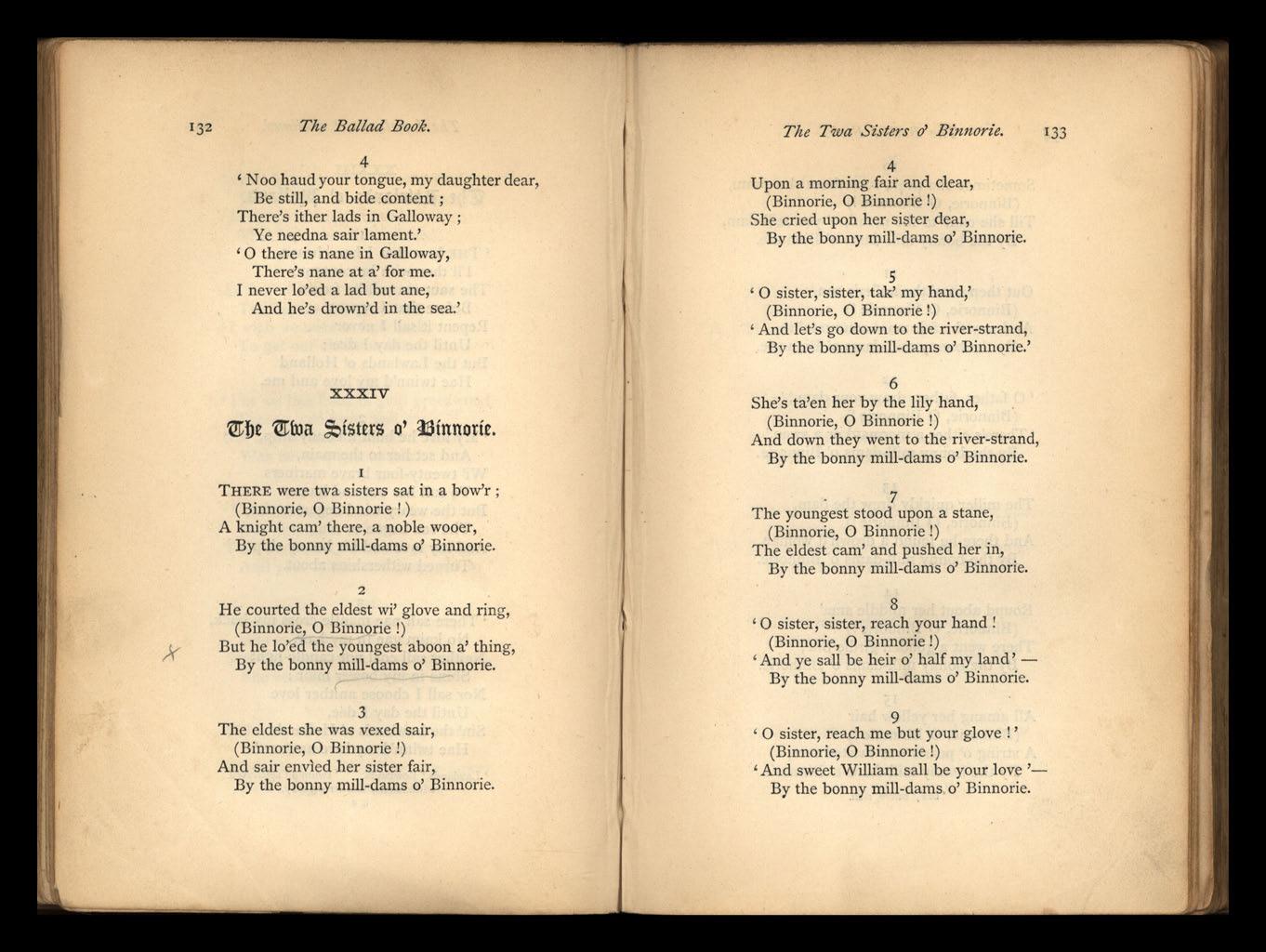
'ID:be 'ID:wa 0' }Sinnorte.
I
THERE were twa sisters sat in a bow'r ; (Binnorie, 0 Binnorie ! )
A knight cam' there, a noble wooer, By the bonny mill-dams 0' Binnorie.
2
He courted the eldest wi' glove and ring, (Binnorie, 0 Binnorie !)
But he lo'ed the youngest aboon a' thing, By the bonny mill-dams 0' Binnorie.
3
The eldest she was vexed sair, (Binnorie, 0 Binnorie !)
And sair envled her sister fair, By the bonny mill-dams 0' Binnorie.
The Twa Sisters 0' BimlOrie.
4
Upon a morning fair and clear, (Binnorie, 0 Binnorie !)
She cried upon her dear, By the bonny mill-dams 0' Binnorie.
5
, 0 sister, sister, tak' my hand,' (Binnorie, 0 Binnorie !)
, And let's go down to the river-strand, By the bonny mill-dams 0' Binnorie.'
6
She's ta'en her by the lily hand, (Binnorie, 0 Binnorie !)
And down they went to the river-strand, By the bonny mill-dams 0' Binnorie.
7
The youngest stood upon a stane, (Binnorie, 0 Binnorie !)
The eldest cam' and pushed her in, By the bonny mill-dams 0' Binnorie.
8
'0 sister, sister, reach your hand! (Binnorie,O Binnorie!)
, And ye saIl be heir 0' half my land'By the bonny mill-dams 0' Binnorie.
9
, 0 sister, reach me but your glove!' (Binnorie,O Binnorie!)
, And sweet William sall be your love ,By the bonny mill-dams 0' Binnorie.
134
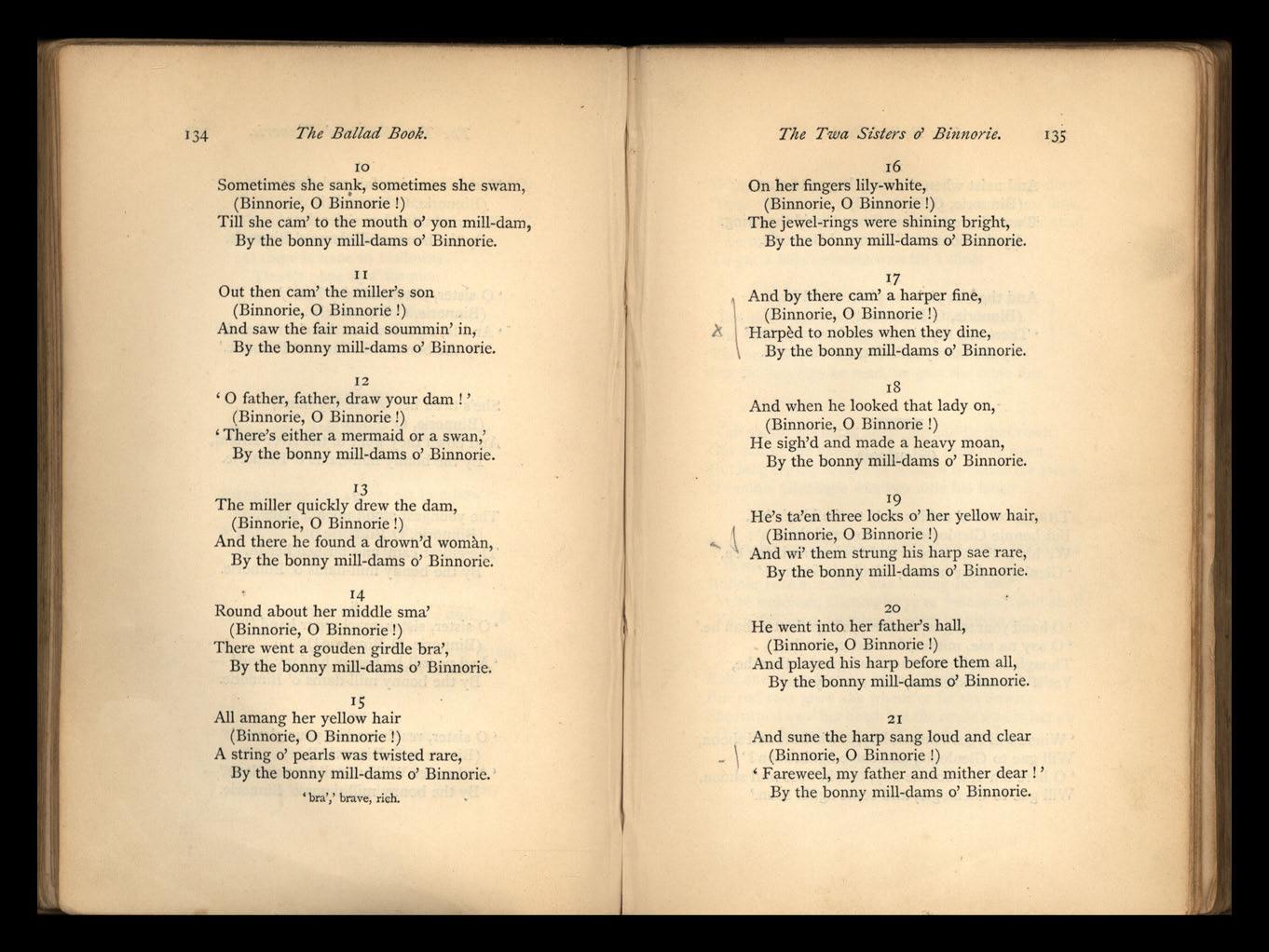
Tlze Ballad Book.
10
Sometimes she sometimes she swam, (Binnorie,O Binnorie !)
Till she cam' to the mouth 0' yon mill-dam, By the bonny mill-dams 0' Binnorie.
II
Out then cam' the miller's son (Binnorie, 0 Binnorie !)
And saw the fair maid soummin' in, By the bonny mill-dams 0' Binnorie.
12
, 0 father, father, draw your dam! ' (Binnorie, 0 Binnorie !)
, There's either a mermaid or a swan,' By the bonny mill-dams 0' Binnorie.
13
The miller quickly drew the dam, (Binnorie, 0 Binnorie !)
And there he found a drown'd woman, By the bonny mill-dams 0' Binnorie.
14
Round about her middle sma' (Binnorie, 0 Binnorie !)
There went a gouden girdle bra', By the bonny mill-dams 0' Binnorie.
15
All amang her yellow hair (Binnorie, 0 Binnorie !)
A string 0' pearls was twisted rare, By the bonny mill-dams 0' Binnorie. 'bra',' brave, rich.
Tlte Twa Sisters 0' B£1l1tor£e.
16
On her fingers lily-white, (Binnorie, 0 Binnorie !)
The jewel-rings were shining bright, By the bonny mill-dams 0' Binnorie.
17 135
And by there cam' a harper fine, \ (Binnorie, 0 Binnorie !) )( Harped to nobles when they dine, By the bonny mill-dams 0' Binnorie.
18
And when he looked that lady on, (Binnorie,O Binnorie !)
He sigh'd and made a heavy moan, By the bonny mill-dams 0' Binnorie.
19
He's ta'en three locks 0' her yellow hair, (Binnorie, 0 Binnorie !)
And wi' them strung his harp sae rare, By the bonny mill-dams 0' Binnorie.
20
He went into her father's hall, (Binnorie, 0 Binnorie !)
And played his harp before them all, By the bonny mill-dams 0' Binnorie.
21
And sune the harp sang loud and clear (Binnorie, 0 Binnorie !)
, Fareweel, my father and mither dear! ' By the bonny mill-dams 0' Binnorie.
Tlze Ballad Book.
22
And neist when the harp began to sing, (Binnorie, 0 Binnorie !)
'Twas ' F areweel, sweetheart! ' said the string, By the bonny mill-dams 0' Binnorie.
23
And then as plain as plain could be, (Binnorie, 0 Binnorie !)
, There sits my sister wha drowned me ! ' By the bonny mill-dams 0' Binnorie. xxxv <!5 lenlogfe.
THREESCORE 0' nobles rade to the king's ha',
But bonnie Glenlogie's the flower 0' them a' ;
Wi' his milkwhite steed and his bonnie black e'e, , Glenlogie, dear mither, Glenlogie for me ! '
2
, 0 haud your tongue, dochter, ye'll get better than he.'
, 0 say na sae, mither, for that canna be ;
Though Drumlie is richer, and greater than he,
Yet if I maun lo'e him, I'll certainly dee.
3
, Where will I get a bonnie boy, to win hose and shoon, Will gae to Glenlogie, and come again soon?'
, 0 here am I, a bonnie boy, to win hose and shoon
Will gae to Glenlogie, and come again soon.' '

Glenlogie. 137
4
When he gaed to Glenlogie,'twas 'Wash and go dine;' 'Twas 'Wash ye, my pretty boy, wash and go dine.'
, 0 'twas ne'er my father's fashion, and it ne'er shall be mine,
To gar a lady's errand wait till I dine.
5
, But there is, Glenlogie, a letter for thee.'
The first line he read, a low smile ga'e he ;
The next line he read, the tear blindit his e'e ;
But the last line he read, he gart the table flee.
6
, Gar saddle the black horse, gar saddle the brown; Gar saddle the swiftest steed e'er rade frae town; ,
But lang ere the horse was brought round to the green, o bonnie Glenlogie was twa mile his lane.
7
When he cam' to Glenfeldy's door, sma' mirth was there;
Bonnie Jean's mother was tearing her hair; 'Ye're welcome, Glenlogie, ye're welcome,' said she, , Ye're welcome, Glenlogie, your J eanie to see.'
8
Pale and wan was she, when Glenlogie gaed ben,
But red rosy grew she whene'er he sat down;
She turned awa' her head, but the smile was in her e'e:
, 0 binna feared, mither, I'll maybe no dee.'
, his lane,' alone.
13 8 Tile Ballad Book.
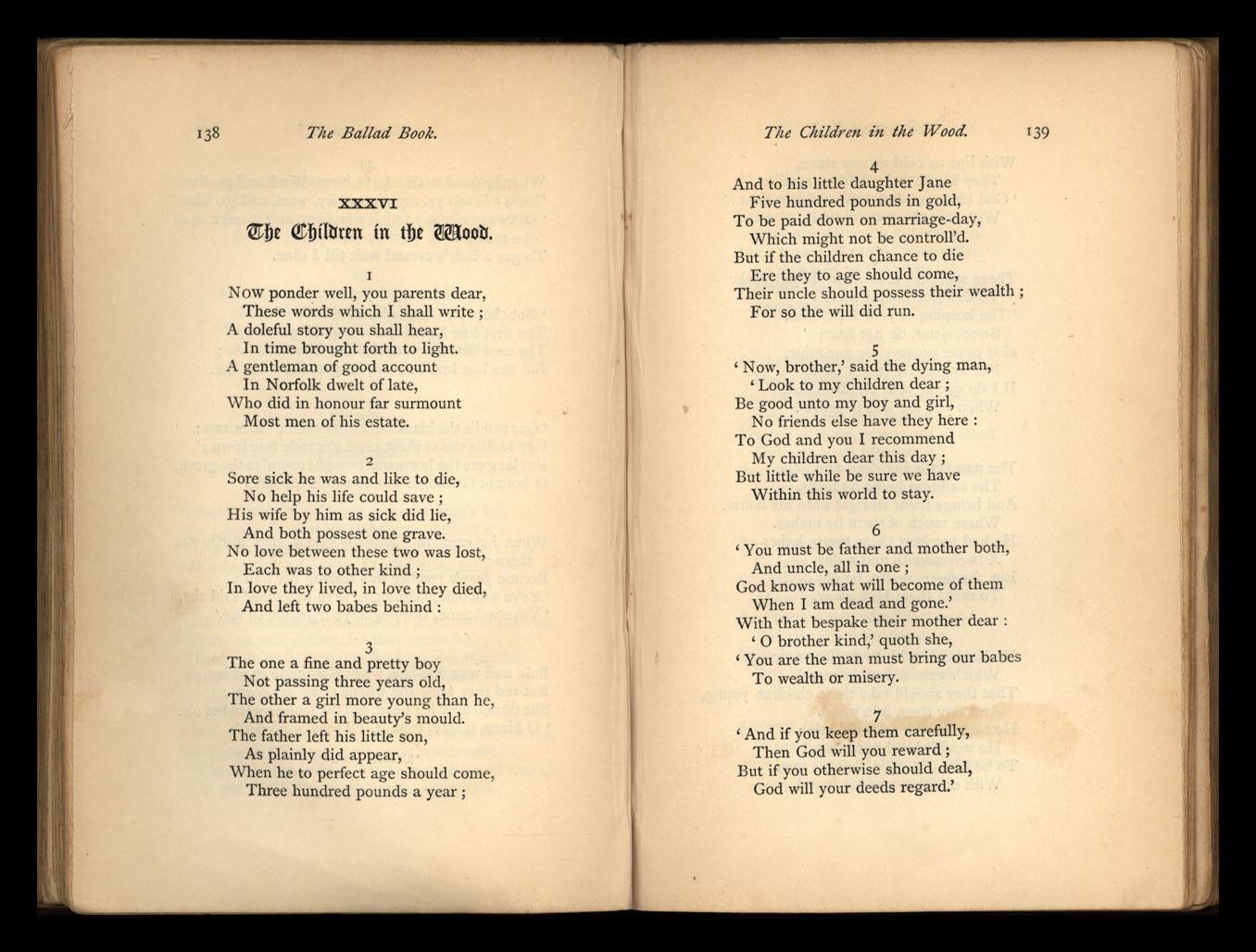
4
And to his little daughter Jane :XXXVI
QCbiUmn in tbe MloolJ.
Five hundred pounds in gold,
To be paid down on marriage-day, Which might not be controll'd.
But if the children chance to die I Ere they to age should come, Now ponder well, you parents dear, Their uncle should possess their wealth; These words which I shall write; For so the will did run.
A doleful story you shall hear, In time brought forth to light.
A gentleman of good account
S
'Now, brother,' said the dying man, In Norfolk dwelt of late,
' Look to my children dear ; Who did in honour far surmount
Be good unto my boy and girl, Most men of his estate.
No friends else have they here:
To God and you I recommend
My chi ldren dear this day; Sore sick he was and like to die,
2
But little while be sure we have No help his life could save;
Within this world to stay. His wife by him as sick did lie, And both possest one grave.
6 No love between these two was lost,
' You must be father and mother both, Each was to other kind; And uncle, all in one; In love they lived, in love they died, God knows what will become of them And left two babes behind: When I am dead and gone.'
3
The one a fine and pretty boy
Not passing three years old,
With that bespake their mother dear :
' 0 brother kind,' quoth she,
, You are the man must bring our babes
To wealth or misery. The other a girl more young than he , And framed in beauty's mould.
7
The father left his little son,
' And if you keep them carefully, As plainly did appear, Then God will you reward; When he to perfect age should come ,
But if you otherwise should deal, Three hundred pounds a year; God will your deeds regard.'
Tlte Ballad Book.
With lips as cold as any stone, They kiss'd their children small :
, God bless you both, my children dear! ' With that the tears did fall.
8
These speeches then their brother spake . To this sick couple there:
, The keeping of your little ones, Sweet sister, do not fear; God never prosper me nor mine, Nor aught else that I have, If I do 'yrong yout children dear When you are laid in grave! '
9
The parents being dead and gone, The children home he takes, And brings them straight unto his house, Where much of them he makes. He had not kept these pretty babes
A twelvemonth and a day, But, for their wealth, he did devise To make them both away.
10
He bargain'd with two ruffians strong, Which were of furious mood, That they should take these children young, And slay them in a wood. He told his wife an artful tale: He would the children send To be brought up in London town With one that was his friend.
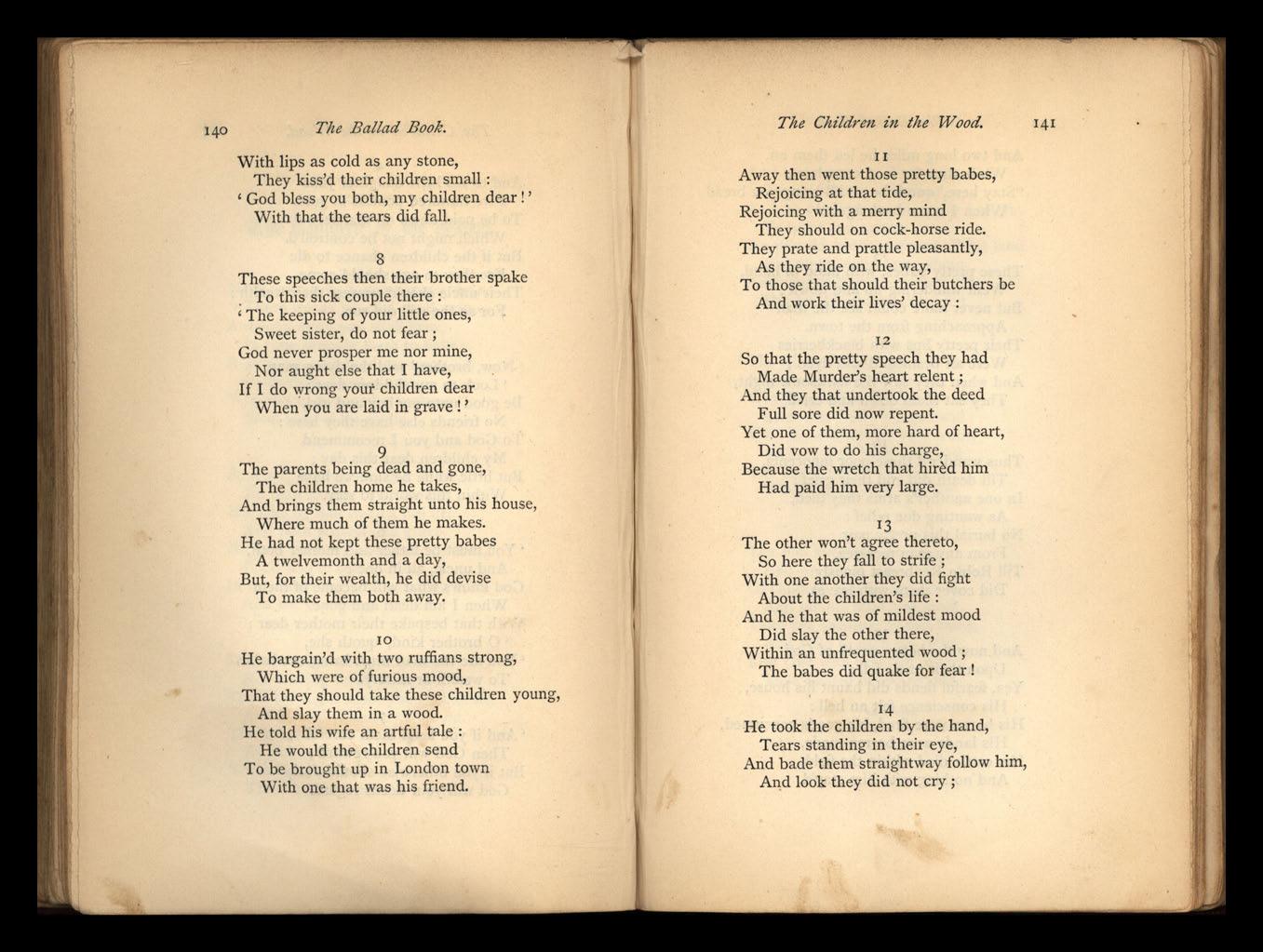
Tlte Cltildrm in tile Wood.
11
Away then went those pretty babes, Rejoicing at that tide, Rejoicing with a merry mind They should on cock-horse ride. They prate and prattle pleasantly, As they ride on the way, To those that should their butchers be And work their lives' decay:
12
So that the pretty speech they had Made Murder's heart relent; And they that undertook the deed Full sore did now repent. Yet one of them, more hard of heart, Did vow to do his charge, Because the wretch that hired him Had paid him very large .
13
The other won't agree thereto, So here they fall to strife; With one another they did fight About the children's life: And he that was of mildest mood Did slay the other there, Within an unfrequented wood; The babes did quake for fear!
14
He took the children by the hand, Tears standing in their eye, And bade them straightway follow him, And look they did not cry;
J42 Tile Ballad Book.
And two long miles he led them on, While they for food complain; , Stay here,' quoth he; 'I'll bring you bread When I come back again.'
15
These pretty babes, with hand in hand, Went wandering up and down; But never more could see the man Approaching from the town. Their pretty lips with blackberries Were all besmear'd and dyed; And when they saw the darksome night, They sat them down and cried.
16
Thus wander'd these poor innocents, Till death did end their grief; In one another's arms they died, As wanting due relief: No burial this pretty pair From any man receives, Till Robin Redbreast piously Did cover them with leaves.
17
And now the heavy wrath of God
Upon their uncle fell ; Yea, fearful fiends did haunt his house, His conscience felt an hell :' His barns were fired, his goods consumed, His lands were barren made, His cattle died within the field, And nothing with him stay'd.
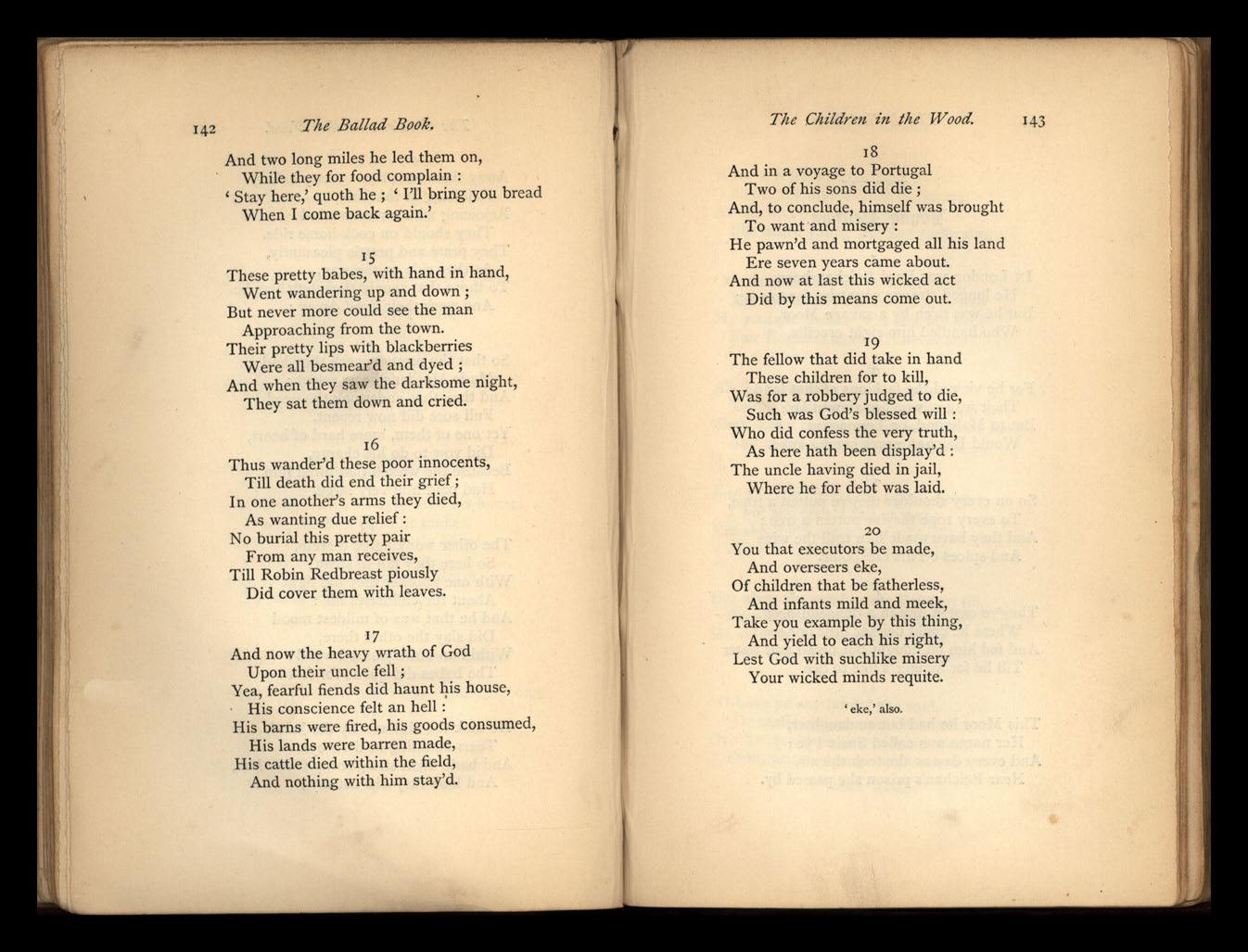
Tlte Cltildrm £n tlte Wood.
18
And in a voyage to Portugal Two of his sons did die; And, to conclude, himself was brought To want and misery; He pawn'd and mortgaged all his land Ere seven years came about. And now at last this wicked act Did by this means come out.
19
The fellow that did take in hand
These children for to kill, Was for a robbery judged to die, Such was God's blessed will : Who did confess the very truth, As here hath been display'd ; The uncle having died in jail, Where he for debt was laid.
20
You that executors be made, And overseers eke, Of children that be fatherless, And infants mild and meek, Take you example by this thing, And yield to each his right, Lest God with suchlike misery Your wicked minds requite. , eke,' also.
I . London was Lord Beichan born, He longed strange countries for to see; But he was ta'en by a savage Moor, Who handled him right cruellie.
2
For he viewed the fashions of that land; Their way of worship he ; But to Mahound, or Termagant, Would Beichan never bend a knee.
3
So on every shoulder they've putten a rope, To every rope they've putten a tree; And they have made him trail the wine And spices on his fair bodie.
4
They've casten him in a dungeon deep, Where he could neither hear nor see; And fed him on nought but bread and water Till he for hunger's like to dee.
5
This Moor he h ad but ae daughter, Her name was called Susie Pye; And every day as she took the air, rear Beichan's prison she passed by.
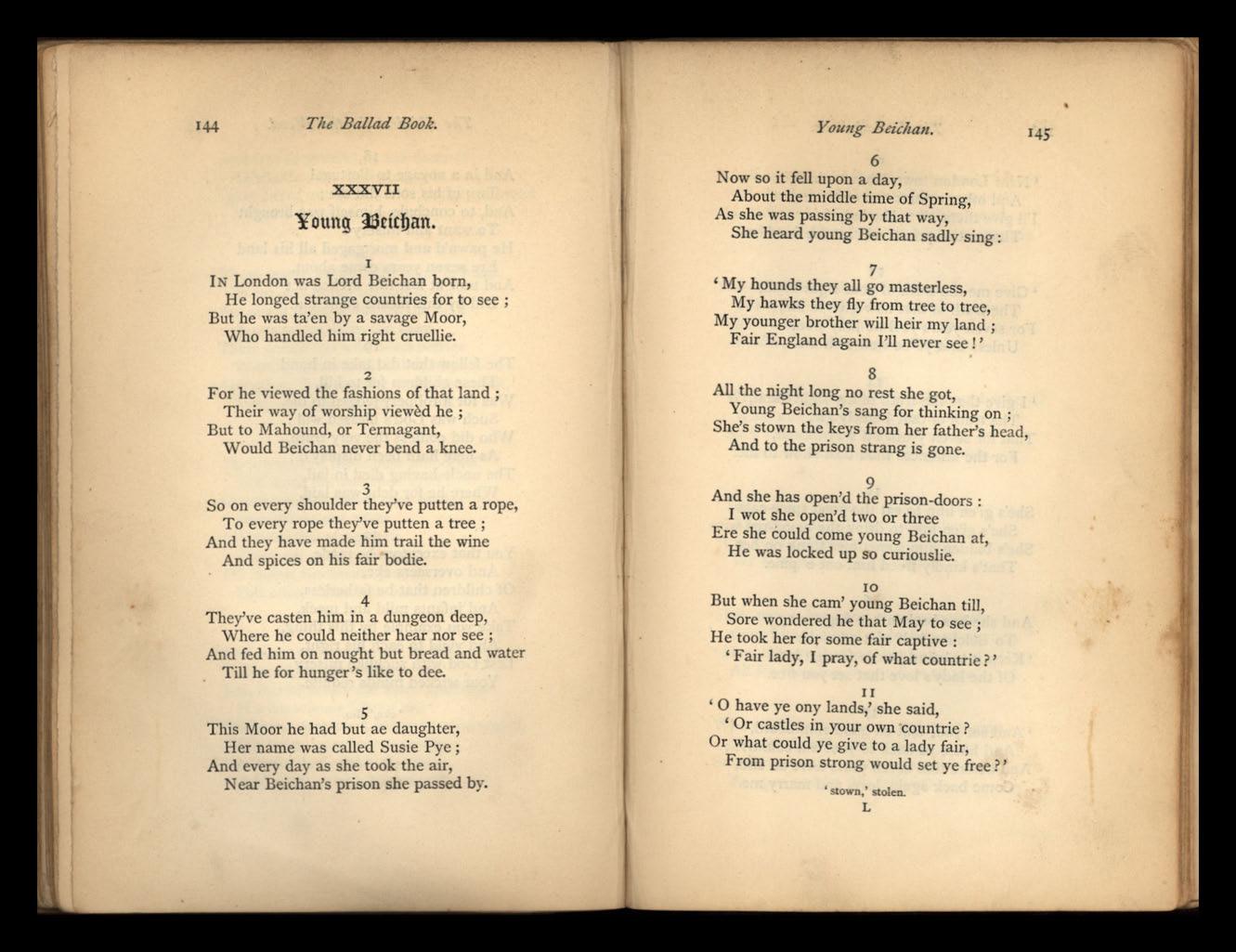
Young Beichall.
6
ow so it fell upon a day, About the middle time of Spring, As she was passing by that way, She heard young Beichan sadly sing:
7
, My hounds they all go masterless, My hawks they fly from tree to tree, My younger brother will heir my land; Fair England again I'll never see! '
8
All the night long no rest she got, Young Beichan's sang for thinking on; She's stown the keys from her fath er's head, And to the prison strang is gone.
9
And she has open'd the prison-doors: I wot she open'd two or three Ere she could come young Beichan at, He was locked up so curiouslie.
IO
But when she cam' young Beichan till, Sore wondered he that May to see; He took her for some fair captive: , Fair lady, I pray, of what countrie?'
11
, 0 have ye ony lands,' she said, , Or castles in your own countrie ? Or what could ye give to a lady fair, From prison strong would set ye free?'
Slown, t stolen.
TIle Ballad Book.
12
, N car London town I have a hall, And other castles two or three; I'll gi vc them all to the lady fair That out of prison will set me free.'
13
, Give me the truth of your right hand, The truth of that now give to me, For seven years ye'll no lady wed, Unless that ye be wed with me.'
14
, I give thee the truth of my right hand, The truth of that I freely gie, That for seven years I'll stay unwed, F or the kindness thou dost show to me.'
IS
She's gi'en him to eat the good spice-cake, She's gi'en him to drink the blood-red WIn C , She's bidden him sometimes think on her That's kindly freed him out 0' pine.
16
And she has broken her finger-ring; To Beichan half of it gave she:
, Keep it to mind you in foreign land Of the lady's love that set you free.
17
, And set your foot on good ship-board, And haste ye back to your ain countrie ; And before that seven years have an end, Come back again, love, and marry me.'

YOUllg Beicllall. 147
18
But long ere seven years had an end, She longed full sore her love to see' So she's set her foot on good ship-boa;d, And turned her back on her own countrie.
19
She sailed east, she sailed west, Till to fair England's shore she came, \Vhere a bonny shepherd she espied Feeding his sheep upon the plain.'
20
, What news, \vhat news, thou bonny shepherd? What news hast thou to tell to me ?'
, Such I hear, ladie,' he says, , The like was never in this countrie.
21
, There is a wedding in yonder hall, And ever the bells ring merrilie ; It is Lord Beichan's wedding-day Wi' a lady fair 0' high degree.'
22
She's putten her hand into her pocket Gi'en him the gold and white :
, Hey, take ye that, my bonny boy, All for the news thou tellest to me.'
23
When s.he came to young Beichan's gate, She tlrled softly at the pin; So ready was the proud porter To open and let this lady in.
L 2
The Ballad Book.
24
'Is this young Beichan's house?' she said, , Or is that noble lord within?'
, Yea, he sits in hall among them all, And this is the day 0' his weddin'.'
25
, 0 has he wed anither love? o has he clean forgotten me ?' And sighing said that fair ladie, , I wish I were in my own countrie ! '
26
And she has ta'en her gay gold ring, That with her love she brake so free; Says, ' Gie him that, ye proud porter, And bid the bridegroom speak with me.'
27
The porter came his lord before, And kneeled low down on his knee:
, What aileth thee, my proud porter, And wherefore is thy courtesie ?'
:z8
, I have been porter at your gates, It's now for thirty years and three; But there stands a lady now thereat, And so fair a lady I never did see.'
29
Then out and spak' the bride's mother; An angry woman, I wot, was she: 'Ye might have excepted our bonny bride, And twa or three of our companie.'
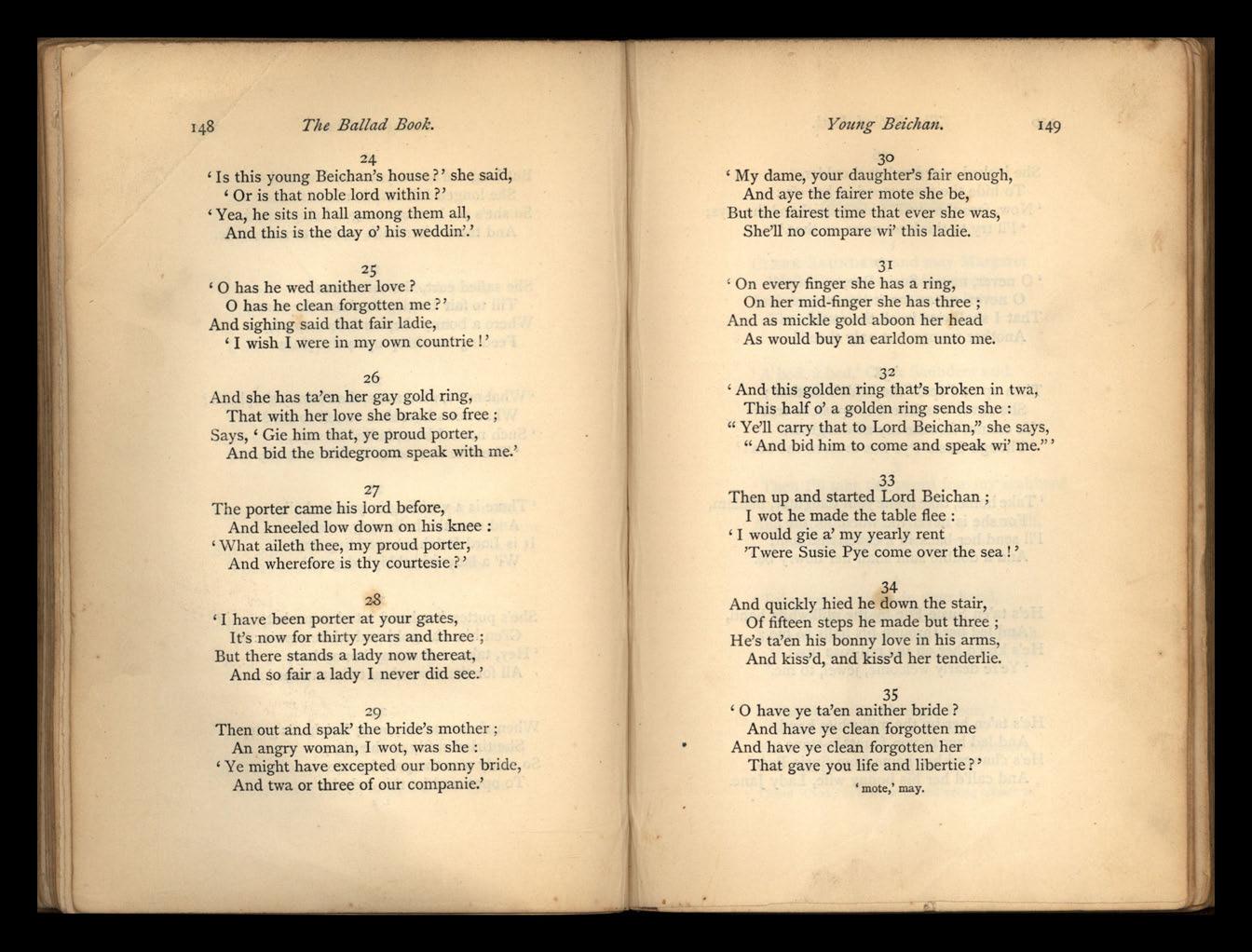
YOU1lg Beichall.
30
, My dame, your daughter's fair enough, And aye the fairer mote she be, But the fairest time that ever she was, She'll no compare wi' this ladie.
3 1
, On every finger she has a ring, On her mid-finger she has three; And as mickle gold aboon her head As would buy an earldom unto me.
32
, And this golden ring that's broken in twa, This half 0' a golden ring sends she:
" Ye'll carry that to Lord Beichan," she says, " And bid him to come and speak wi' me. " ,
33
Then up and started Lord Beichan ; I wot he made the table flee:
, I would gie a' my yearly rent 'Twere Susie Pye come over the sea! '
34
And quickly hied he down the stair, Of fifteen steps he made but three; He's ta'en his bonny love in his arms, And kiss'd, and kiss'd her tenderlie.
35
, 0 have ye ta'en anither bride? And have ye clean forgotten me And have ye clean forgotten her That gave you life and libertie ?' 'mote,' may.
Tlte Ball,td Book.
3 6
She looked over her left shoulder, To hide the te a rs stood in her e'e : , Now, fare thee well, young Beichan,' she says; , I'll try to think no more on thee.'
37
, 0 never, never, Susie Pye, o never, never can it b e, That I shall wed in all the world Another woman but only thee! '
38
Then up and spak' the bride's mother ; She never was heard to speak so free: 'Ye cannot forsake my ae daughter, Though Susie Pye has crossed the sea! '
39
, Take home, take home your daughter, madam, F or she is never the worse for me ; I'll send her back in a coach and four, And a double sum shall her dowry be.'
40
He's ta'en Susie Pye by the milkwhite hand, And led her through his halls so hie; He's kiss'd her on the red-rose lips: 'Ye're dearly welcome, jewel, to me.'
41
He's ta'en her by the milkwhite hand , And led her to yon fount a in-stane ; He's changed her name from Susie Pye, And call'd her his bonny wife, Lady Jane.
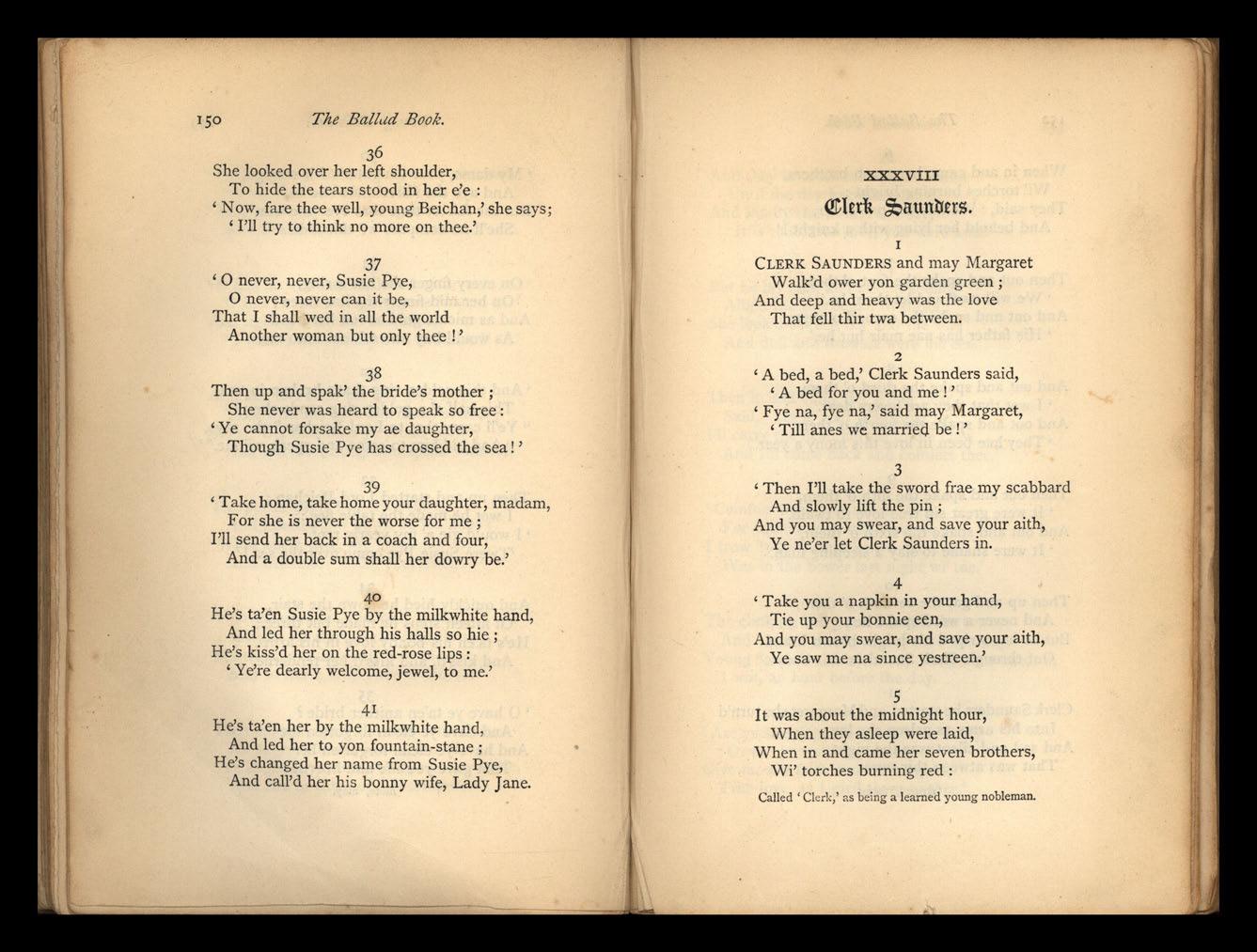
CLERK SAUNDERS and may Margaret Walk'd ower yon gard e n green; And deep and heavy was the love That fell thir twa between.
2
, A bed, a bed,' Clerk Saunders s a id, , A bed for you and me ! '
, Fye na, fye na,' said may Margaret, , Till anes we married. be ! '
3
, Then I'll take the sword frae my scabbard And slowly lift the pin;
And you may swear, and save your aith, Ye ne'er let Clerk Saunders in.
4
, Take you a napkin in your hand, Tie up your bonnie een,
And you may swear, and save your aith, Ye saw me na since yestreen.'
5
It was about the midnight hour, vVhen they asleep were laid, Wh en in and came her seven brothers, Wi' torches burning red:
Ca ll ed ' Cl e rk ,' as b ein g a lea rned yo ung n obleman.
The Ballad Book.
6
When in and came her seven brothers, Wi' torches burning bright :
They said, 'We hae but one sister, And behold her lying with a knight! '
7
Then out and spake the first 0' them, 'We will awa' and let them be.'
And out and spake the second 0' them, , His father has nae mair but he.'
8
And out and spake the third 0' them, , I wot that they are lovers dear.'
And out and spake the fourth 0' them, , They hae been in love this mony a year.'
9
Then out and spake the fifth 0' them, , It were great sin true love to twain.'
And out and spake the sixth 0' them, , It were shame to slay a sleeping man.'
10
Then up and gat the seventh 0' them, And never a word spake he ;
But he has striped his bright brown brand Out through Clerk Saunders' fair bodye.
11
Clerk Saunders he started, and Margaret she turn'd Into his arms as asleep she lay; And sad and silent was the night That was atween thir twae.
• striped,' thrust.
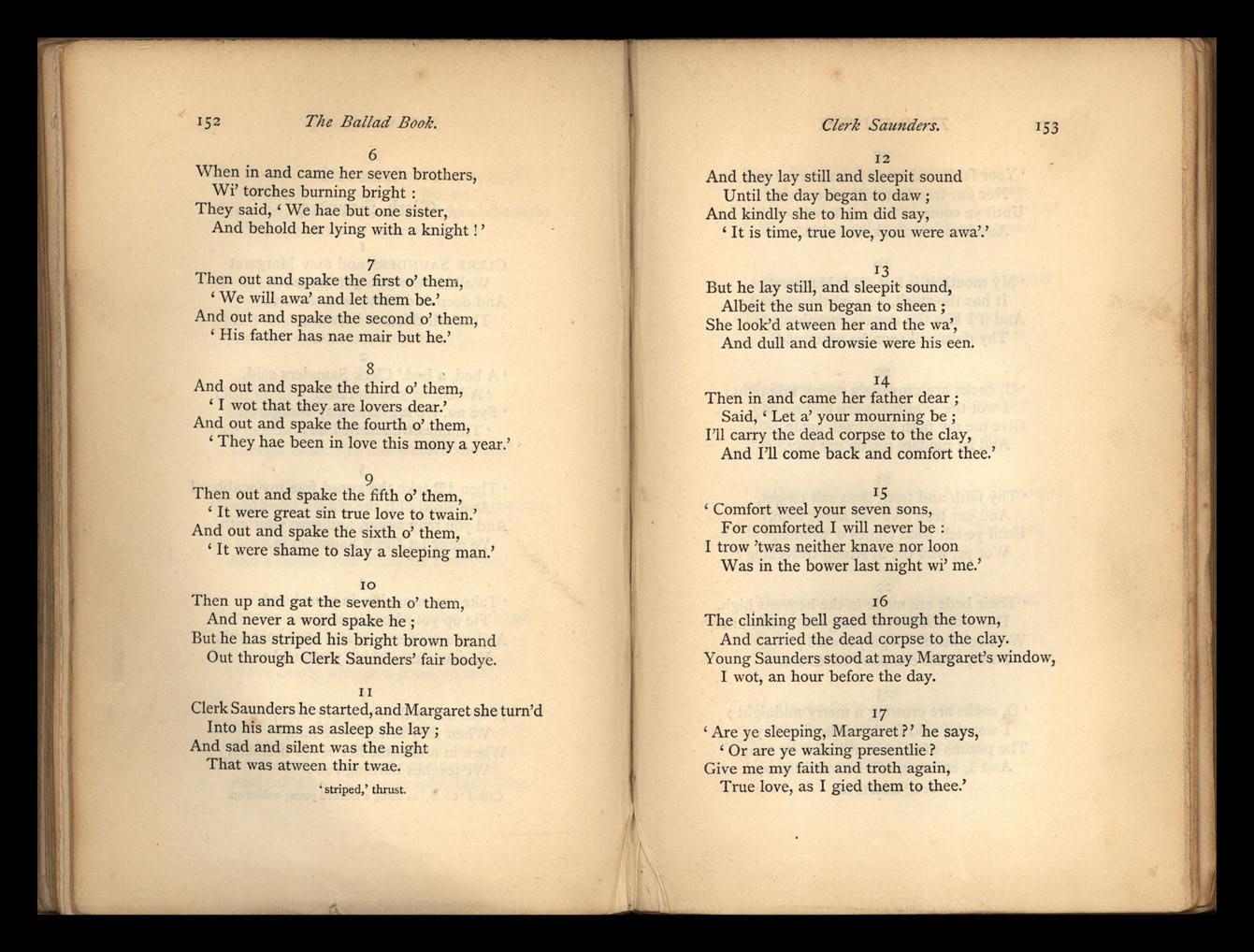
Clerk Smmders.
12
And they lay still and sleep it sound
Until the day began to daw; And kindly she to him did say, , It is time, true love, you were awa'.'
13
But he lay still, and sleepit sound, Albeit the sun began to sheen; She look'd atween her and the wa', And dull and drowsie were his een.
14
Then in and came her father dear; Said, ' Let a' your mourning be ; I'll carry the dead corpse to the clay, And I'll come back and comfort thee.'
15
, Comfort weel your seven sons, For comforted I will never be : I trow 'twas neither knave nor loon Was in the bower last night wi' me.'
16
The clinking bell gaed through the town, And carried the dead corpse to the clay.
Young Saunders stood at may Margaret's window, I wot, an hour before the day.
17
, Are ye sleeping, Margaret?' he says, , Or are ye waking presentlie ?
Give me my faith and troth again, True love, as I gied them to thee.'
The Ballad Book.
18
, Your faith and troth ye sall never get, N or our tru e love saIl never twin, Until ye come within my bower, And kiss me cheek and chin.'
19
, My mouth it is full cold, Margaret ; It has the smell, now, of the ground; And if I kiss thy comely mouth, Thy days will soon be at an end.
20
, 0, cocks are crowing a merry midnight; I wot the wild fowls are boding d ay . Give me my faith and troth again, And let me fare me on my way.'
21
, Thy faith and troth th ou saIl na get, And our true love sall never twin, Until ye tell what comes 0' women, Wot ye, who die in strong traivelling ?'
22
, Their beds are made in the heavens hi gh, Down at the foot of our good Lord's knee, Weel set about wi' gillyflowers ; I wot, sweet company for to see.
23
, 0, cocks are crowing a merry midnight ; I wot the wild fowls are boding day; The psalms of heaven will soon be sung, And :r., ere now, will be miss 'd away.' , twin,' break in two.

Clerk Satt1lders. 155
24
Then she has taken a crissom wand, And she h as stroken her troth thereon ; She has given it him out a t the shot-window, Wi' mony a sad sigh and heavy groan.
25
, I thank ye, Marg'ret; I thank ye, Marg'ret ; Ever I thank ye heartilie ; But gin I were living, as I am dead, I'd keep my faith and troth with th ee.'
26
It's hosen and shoon, and gown alone, She c1imb'd the wall, and follow'd him, Until she came to the green forest, And there she lost the sight 0' him.
27
, Is there ony room at your head, Saunders?
Is there ony room at yo ur feet? Is there ony room at your side, Saunders, Where fain, fain, I wad sleep?'
28
, There's na e room at my head, Marg'ret, There's nae room at my feet; My bed it is fu' lowly now, Amang the hungry worms I sleep.
29
, Cauld mould is my covering now, But and my winding-sheet; The dew it falls nae sooner down Than my resting-plac e is weet.'
, cri sso m ' (1)
TIle Ballad B(>ok.
30
Then up and crew the red, red cock, And up and crew the gray: , 'Tis time, 'tis time, my dear Marg'ret, That you were going away.
3 1
, And fair Marg'ret, and rare Marg'ret, And Marg'ret, 0' veri tie, Gin e'er ye love another man, N e'er love him as ye did me.'
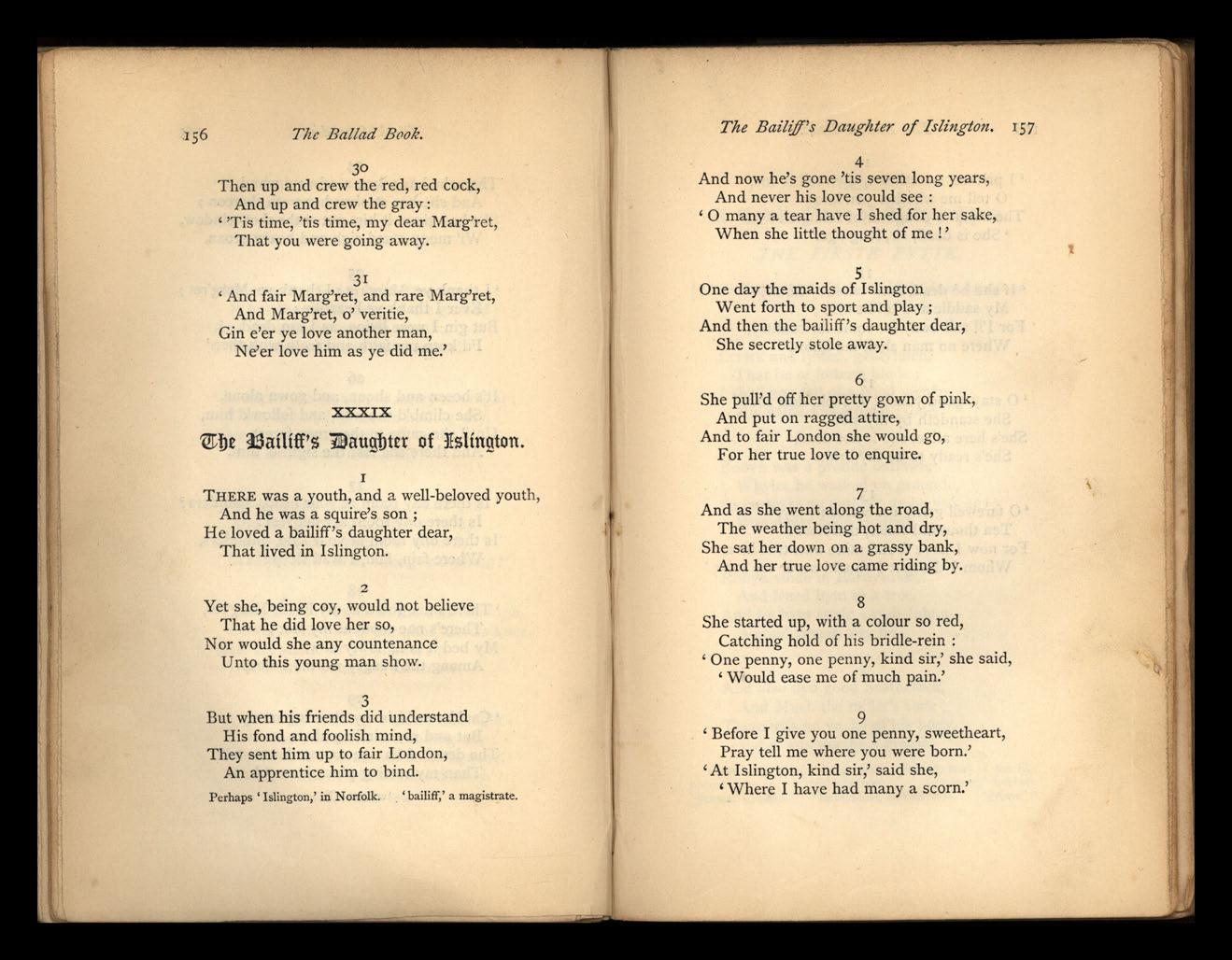
;lSailiff's '1iaugbter of :!Islington.
THERE was a youth, and a well-beloved youth, And he was a squire's son; He loved a bailiff's daughter dear, That lived in Islington.
2
Yet she, being coy, would not believe That he did love her so, N or would she any countenance Unto this young man show.
3
But when his friends did understand His fond and foolish mind, They sent him up to fair London, An apprentice him to bind. Perhaps 'Islington,' in Norfolk . . ' bailiff,' a magistrate.
The Bailiff's Daughter of IS/£1tgt01Z. r 57
4
And now he's gone 'tis seven long years, And never his love could see : , 0 many a tear have I shed for her sake, When she little thought of me ! '
5
One day the maids of Islington Went forth to sport and play; And then the bailiff's daughter dear, She secretly stole away.
6
She pull'd off her pretty gown of pink, And put on ragged attire, And to fair London she would go, For her true love to enquire.
7
And as she went along the road, The weather being hot and dry, She sat her down on a grassy bank, And her true love came riding by.
8
She started up, with a colour so red, Catching hold of his bridle-rein:
, One penny, one penny, kind sir,' she said, , Would ease me of much pain.'
9
, Before I give you one penny, sweetheart, Pray tell me where you were born.'
, At Islington, kind sir,' said she, '\\There I have had many a scorn.'
The Ballad Book.
IQ
, I prithee, sweetheart, then tell to me, o tell me whether you know The bailiff's daughter of Islington?'
, She is dead, sir, long ago.'
II
, If sh e be dead, then take my horse, My sa ddle and bridle also; For I'll sail away for some far country, Where no man shall me know.'
J2
, 0 stay, good youth! 0 look, dear love!
She st a ndeth by thy side; She's here alive, she is not dead, She's ready to be thy bride.'
13
, 0 farewell grief, and welcome j oy , Ten thousand times, ther efore!
For now I have found mine own true lov e, Whom I thought I should never see mo r c."
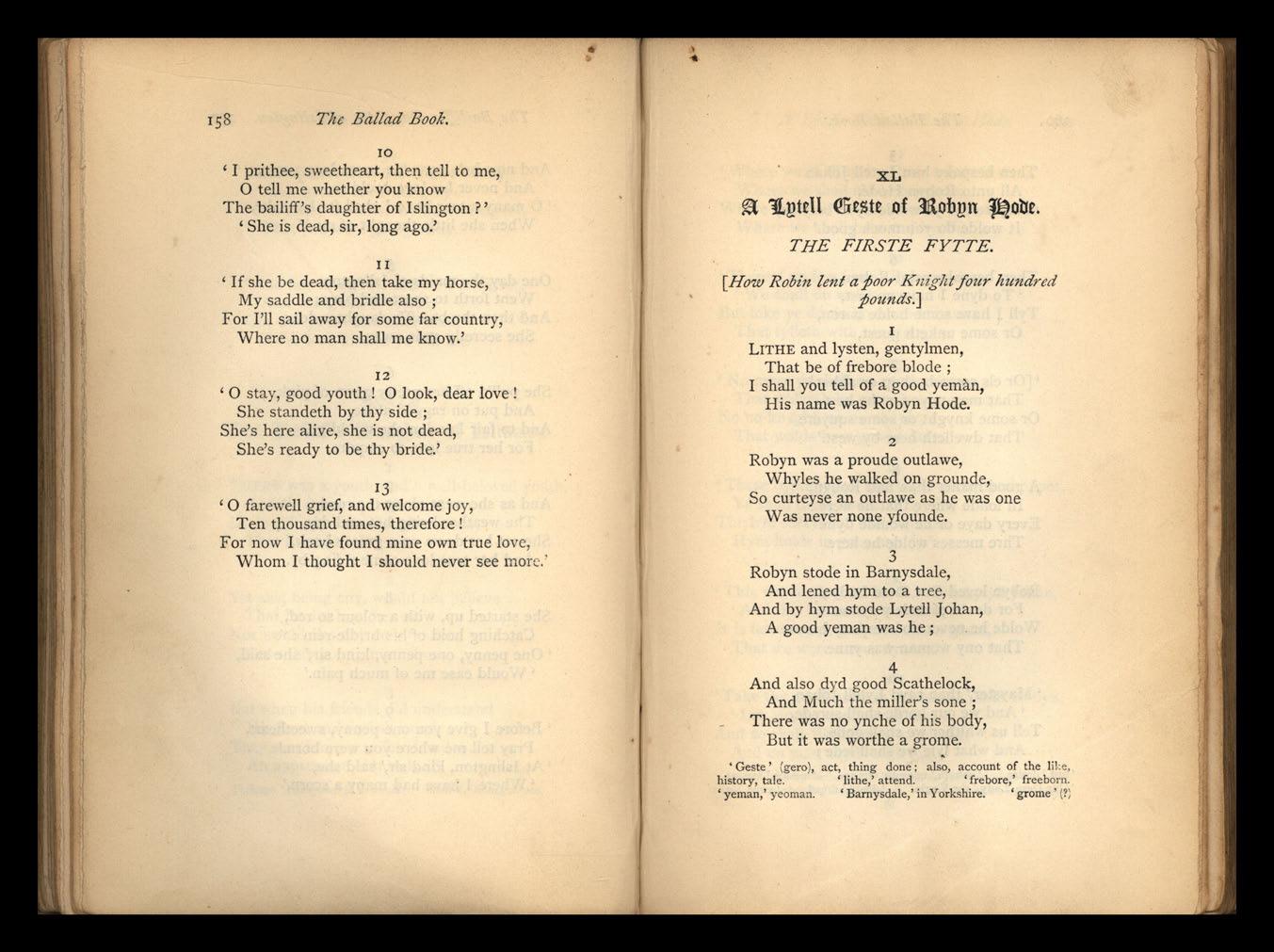
a 'lLntcU <!licste of lftob}1n 111 ob e.
THE FIRSTE FYTTE.
[How Robin lmt a poor K lIigltt four hUlldred poullds. ]
I
LITHE and lysten, gentylmen, That be offrebore bla d e; I shall you tell of a good yem im, His name was Robyn Hode.
2
Robyn was a proude outlawe, Whyles he walked on grounde, So curteyse an outlawe as he was one Was never none yfounde .
3
Robyn stode in Barnysdale, And lened hym to a tr ee, And by hym stode Lytell ]ohan, A good yeman was he ;
4
And also d yd g ood Scathelock, And Much the miller's sane; Th ere was no ynche of his body, But it was worthe a grome
. Ge ste ' (ge ro ), act, thing don e ; a lso, account or the li ke, history, tal e. 'lithe,' atte nd . 'frebore,' fre eborn. , yeman,' yeoman. ' Barnysdale, ' in Yorkshire. ' grome ' (?:
J60 TIle Ballad Book.
5
Then bespake him Lytell Johan
All unto Robyn Hode, , Mayster, yf ye wolde dyne betyme, It wolde do you moch good.'
6
Then bespake good Robyn, , To dyne I have no lust, Tyll I have some bolde baron, Or some unketh guest,
7
'[Or els some by shop or abbot]
That may paye for the best; Or some knyght or some squyere That dwelleth here by west.'
8
A good maner than had Robyn, In londe where that he were: Every daye or he woulde dyne Thre messes wolde he here.
9
Robyn loved Our Dere Lady; For doute of dedely synne Wolde he never do company harme That any woman was ynne.
10
'Mayster,' than sayd Lytell Johan, , And we our borde shall sprede, Tell us whither we shall gone, And what l¥fe we shalllede ; 'lust,' desire. ' unketh,' uncouth , strange. 'messes,' ma sses. 'Our Dere Lady,' the Virgin. 'doute,' dread. 'ynne,' in.
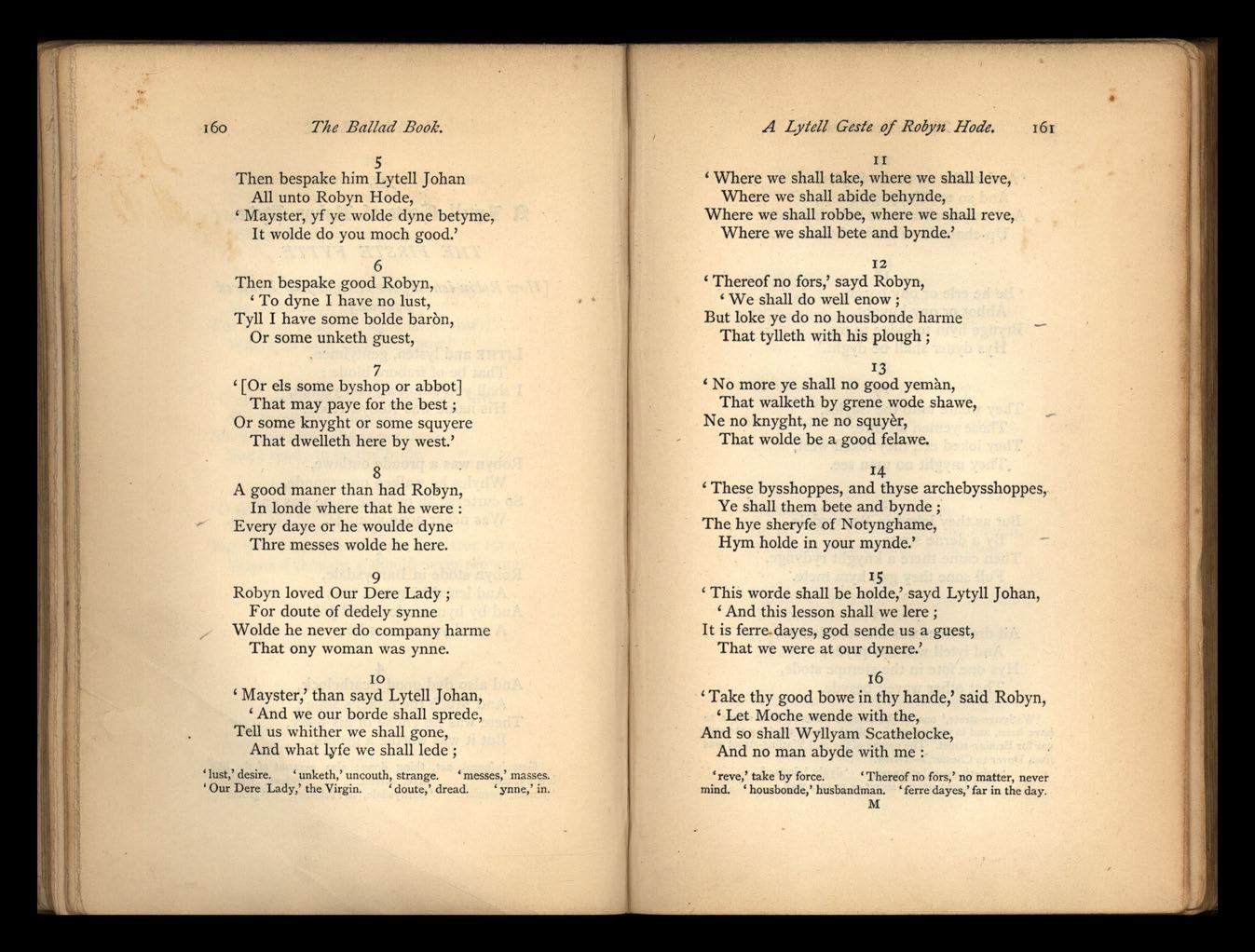
A Lytell Gute of Roby?: Hode.
11
, Where we shall take, where we shallleve, Where we shall abide behynde, Where we shall robbe, where we shall reve, Where we shall bete and bynde.'
12
'Thereof no fors,' sayd Robyn, , We shall do well enow ; But loke ye do no housbonde harme
That tylleth with his plough;
13
, No more ye shall no good yem1m, That walketh by grene wode shawe, Ne no knyght, ne no squyer, That be a good felawe.
14 r6r
, These bysshoppes, and thyse archebysshoppes, Ye shall them bete and bynde ; The hye sheryfe of Notynghame, Hym holde in your mynde.'
15
'This worde shall be holde,' sayd Lytyll Johan, , And this lesson shall we lere ; It is ferre.dayes, god sende us a guest, That we were at our dynere.'
16
, Take thy good bowe in thy hande,' said Robyn, , Let Moche wende with the, And so shall Wyllyam Scathelocke, And no man abyde with me :
'reve,' take by force. (Thereof no fors, ' no matter, never mind. ' housbonde,' husbandman. 'ferre dayes,' far in the day .
162 The Ballad Book.
17
, And walke up to the Sayles, And so to Watlynge-strete, And wayte after some unketh guest, U p-chaunce ye mowe them mete.
18
, Be he erle or ony baron, Abbot or ony knyght, Brynge hym to lodge to me , Hys dyner shall be dyght .'
19
They wente unto the Sayles, These yemen all thre, They loked est, they loked west, They myght no man see.
20
But as they loked in Barnysdale, By a derne strete
Then came there a knyght rydynge, Full sone they gan hym mete.
21
All dreri then was his semblaunte, And lyt ell was hys pryde, Hys one fote in the sterope stode, That other waved besyde.
'Watlynge-strete/ one of the Roman roads: 'This seems to have been, and in many parts is st ill, th e name used by the vulgar for Erming-street. The course of th e real Watling-street was from Dover to Chester.'-Ritsolf.. 'unketh guest,' stranger. 'dyght,' dressed. , dernc strete/ secret or private way.
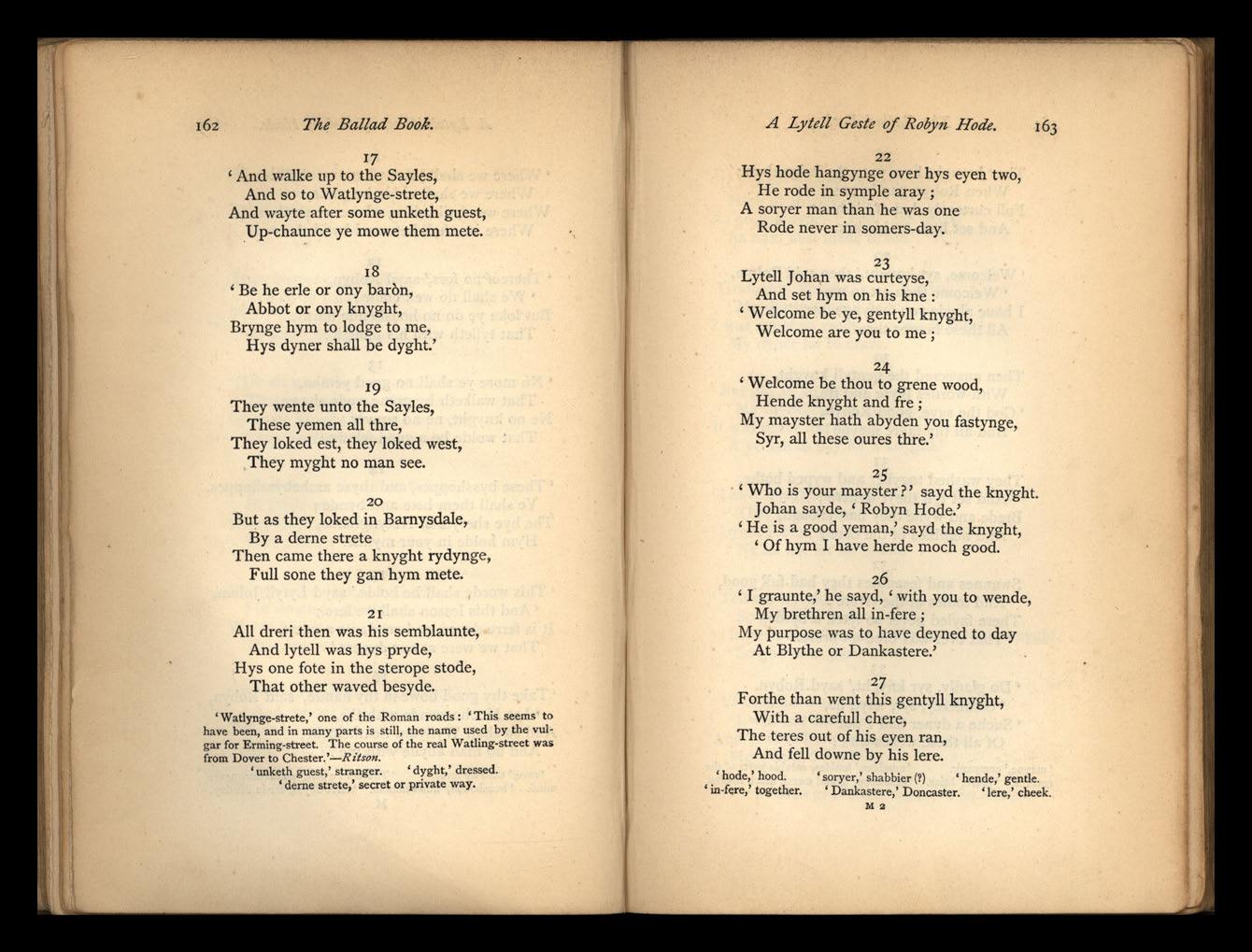
A Lyte!l Geste of RobYIl Hod/!.
22
Hys hode hangynge over hys eyen two He rode in sympJe aray; , A soryer man than he was one Rode never in somers-day.
23
Lytell Joha,n was curteyse, And set hym on his kne :
'Welcome be ye, gentyll knyght, Welcome are you to me ;
24
, Welcome be thou to grene wood, Hende knyght and fre ; My mayster hath abyden you fastynge, Syr, all these oures thre.'
25
. 'Who is your mayster?' sayd the knyght. Johan sayde, 'Robyn Hode.'
, He is a good yeman,' sayd the knyght, , Of hym I have herde moch good.
26
, I graunte,' he say?, ' with you to wende, My brethren all m-fere ; My purpose was to have deyned to day At Blythe or Dankastere.'
27
than went this gentyll knyght, WIth a carefull ch ere, The teres out of his eyen ran, And fell downe by his lere. 'hode,' hood. (sorye r,' shabbie r (1) 'hende,' gentle. 'in-fere,' together. f Danka stere,' Doncaster. 'Iere,' cheek. M.
The Ballad Book.
28
They brought h ym unto the lodge dore ; When Robyn gan hym se, Full curteysly dyd of his hode, And set hym on his kne.
29
'Welcome, syr knyght,' then said Robyn, , Welcome thou art to me ; I haue abyde you fas tynge, syr, All these houres thre.'
30
Then answered the gentyll knyght , With wordes fayre and fre, , God the save, good Robyn, And all thy fayre meyne ! '
3 1
They washed togyder and wyped bothe, And set tyll theyr dynere ; Brede and wyne they had ynough, And nombles of the dere ;
32
Swannes and fesauntes they had full good , And foules of the rivere ; There fayled never so lytell a byrde, That ever was bred on brere.
33
, Do gladly, syr knyght,' sayd Robyn. , Gramercy, syr,' sayd he, , Suche a dyner had I not Of all these wekes thre :
, meyne,' company. (nombles,' umbles, eatable parts of the entrails. ( brere,' briar. C gramercyJ' grand merci, much thanks.

A Lytell Ceste of Robyn Hode.
34
, If I come agayne, Robyn, Here by this countre, As good a dyner I shall thee make, As thou hast made to me.'
35
, Gramercy, knyght,' sayd Robyn, , My dyner whan I have, I was never so gredy [I swear to thee], My dyner for to crave.
36
, But payor ye wende,' sayd Robyn, , Me thynketh it is good ryght ; It was never the man er, by my troth, A yeman to pay for a knyght. '
37
, I have nought in my cofers,' sayd the knyght, , That I may profer for shame.'
, Lytell Johan, go loke,' sayd Robyn, , Ne let not for no blame.
38
, Tell me trouth,' sayd Robyn, , So god have parte of thee.'
, I have no more but ten shillings,' sayd the knyght, , So god have parte of me.
39
, Yf thou have no more,' sayd Robyn, , I wyll not one peny ; And yf thou have ' nede of ony more, More shall I len thee.
or ye wende,' ere you go. I Ne le t not for no blame,' stop not for any chiding.
40
, Go now forth , Lytell Johan, The trouthe tell thou me :
Yf there be no more but ten shillings, Not one peny than I se.'
41
Lytell J ohan spred downe his mantell · Full fayre upon the grounde, And there he founde in the knyghtes co fer But even halfe a pounde.
42
LytyU J ohan let it lye full stylI, And went to his mayster full lowe.
, What tydynge, J ohan ?' sayd Robyn. , Syr, the knyght is trewe inough.'
43
, Fyll of the best wyne,' sayd Robyn , , The knyght shall begynne ; Moch wonder thynketh me Thy c19thynge is so thynne.
44
, Tell me one worde,' sayd Robyn, , And counsell shall it be ; I trowe thou were made a knyght of forse , Or elles of yemanry ;
45
, Or elles thou hast ben a sory housband, And leved in stroke and stryfe ; An okerer, or elles a lechoure,' sayd Robyn , , With wronge hast thou lede thy lyfe.' 'counsell,' in confidence. f of (orse' (1). 'trowe,' hold (or truth, am sure. sory housband,' m ·manager. f okerer,' usurer.
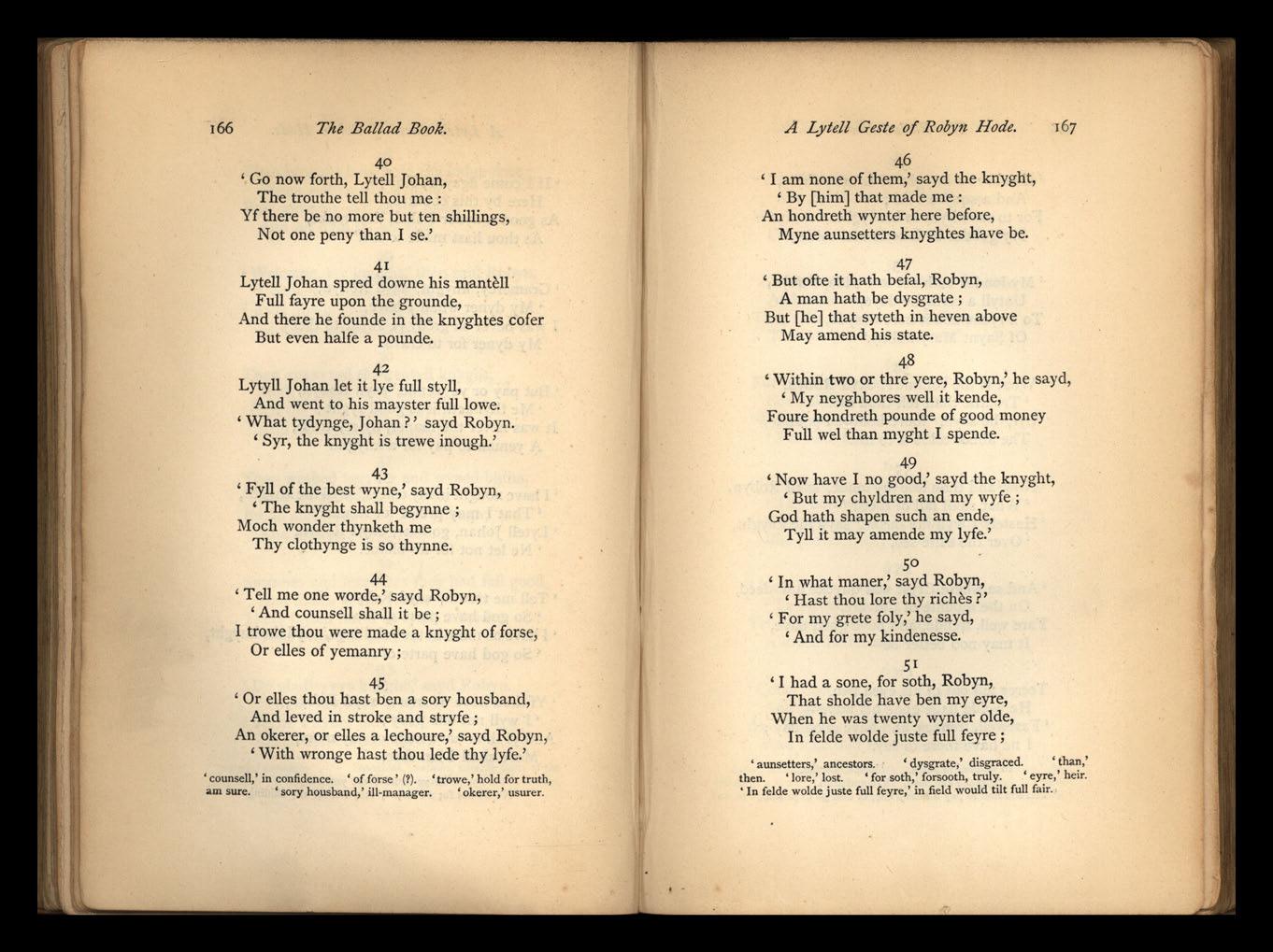
A Lytell Geste of Robytt Hode.
46
, I am none of them,' sayd the knyght, , By [him] that made me : An hondreth wynter here before, Myne aunsetters knyghtes have be.
47
, But ofte it hath befal, Robyn, A man hath be dysgrate ; But [he] that syteth in heven above May amend his state.
48
, Within two or thre yere, Robyn,' he sayd, , My neyghbores well it ken de, Foure hondreth pounde of good money Full wel than myght I spende.
49
'Now have I no good,' sayd the knyght, , But my chyldren and my wyfe ; God hath shapen such an en de, Tyll it may amende my lyfe.'
50
, In what maner,' sayd Robyn, 'Hast thou lore thy riches?'
, For my g,ete foly,' he sayd, , And for my kindenesse.
51
, I had a sone, for 50th, Robyn, That sholde have ben my eyre, When he was twenty wynter olde, In felde wolde juste full feyre ; 'aunsetters,' ancestors. 'dysgrate,' disgraced. 'than,' then. lore,' lost. for 50th,' forsooth, truly. I eyre,' heir. ' In feIde wolde juste fun (eyre ,' in field would tilt full fair .
168 The Ballad Book.
52
, He slewe a knyght of Lancastshyre, And a squyre bold; For to save hym in his ryght My goodes beth sette and solde ; if.
53
, My londes beth set to wedde, Robyn, Untyll a certayne daye, To a ryche abbot here besyde, Of Saynt Mary abbay.'
54
, What is the somme ?' sayd Robyn, , Trouthe than tell thou me.'
, Syr,' he sayd, ' foure hondred pounde, The abbot tolde it to me.'
55
, Now, and thou lese thy londe,' sayd Robyn, , What shall fall of thee? '
, Hastely I wyll me buske,' sayd the knyght, , Over the salte see,
56
, And se where Cryst was quycke and deed, On the mounte of Calvare Fare well, frende, and have good daye, It may noo better be-'
57
Teeres fell out of his eyen two, He wolde haue gone his waye, Farewell, frendes, and have good day; I ne have more to say.'
'to wedde,' in pawn. f buske,' betake.
C quycke and deed,' aHve and dead.
* His SOn had to pay a heavy fine, or else go to prison.
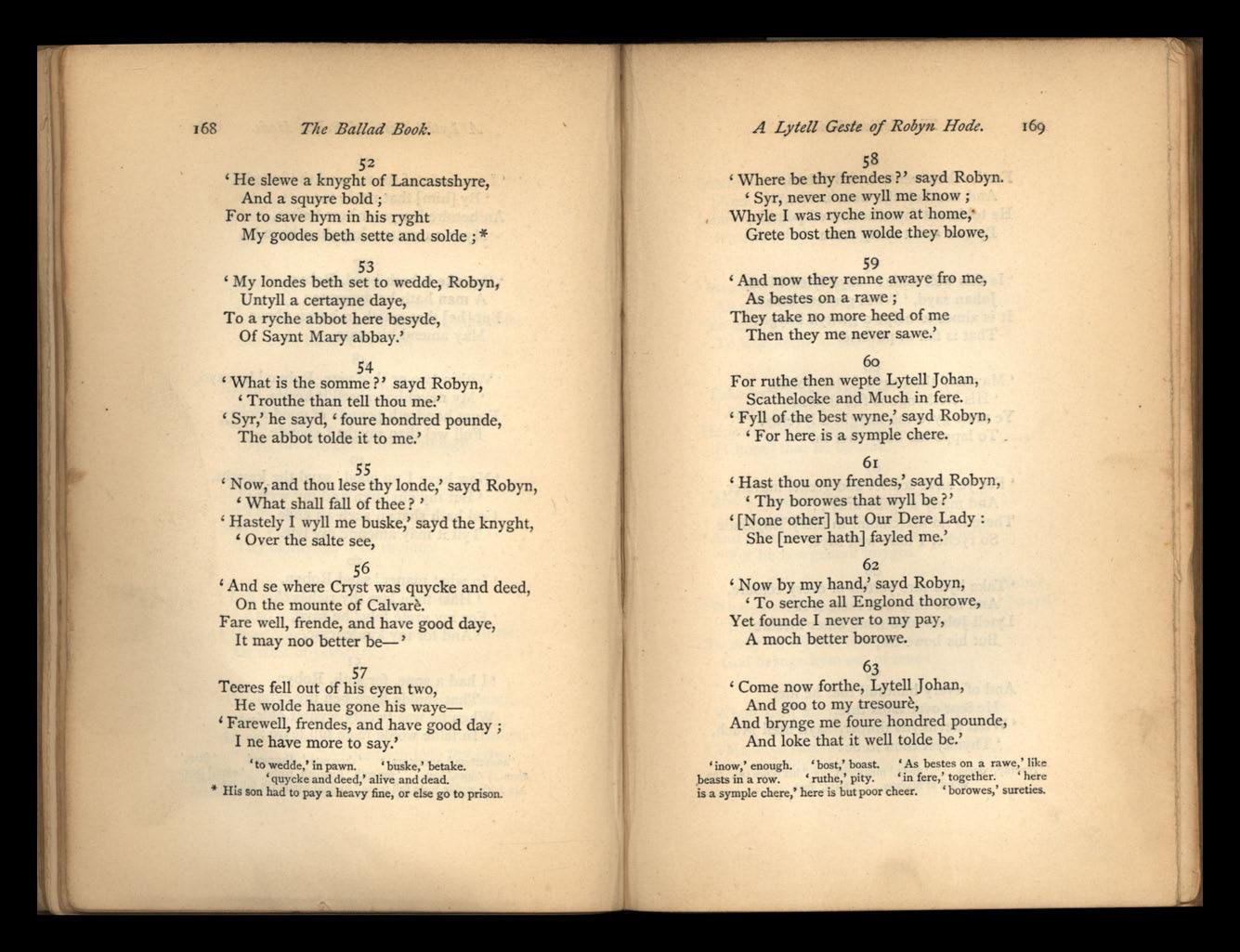
A Lytelt Geste of Robpt Hode.
58
'Where be thy frendes?' sayd Robyn. , Syr, never one wyll me know; Whyle I was ryche inow at home; Grete bost then wolde they blowe,
59
, And now they renne awaye fro me, As bestes on a rawe ; They take no more heed of me Then they me never sawe.'
60
For ruthe then wepte Lytell Johan, Scathelocke and Much in fere.
, Fyll of the best wyne,' sayd Robyn , , For here is a symple chere.
61
, Hast thou ony frendes,' sayd Robyn, , Thy borowes that wyll be?'
'[ one other] but Our Dere Lady: She [never hath] fayled me.'
62
, Now by my hand,' sayd Robyn, , To serche all Englond thorowe, Yet founde I never to my pay, A moch better borowe.
63
'Come now forthe, Lytell Johan, And goo to my tresoure, And brynge me foure hondred pounde, And loke that it well tolde be.'
inow,' enough. 'host,' boast. As bestes on a rawe ,' like ,beasts in a row. f ruthe,' pity . fin fere,' together. 'here is a symple chere,' here is but poor cheer. 'borowes,' sureties.
The Ballad Book.
64
Forthe then wente Lytell Johan, And Scathelocke went before, He tdlde out foure houndred pounde, By two and twenty score.
65
, Is this well tolde?' sayd lytell Much. Johan sayd, ' What greveth thee? It is almes to helpe a gentyll knyght That is fall in
66
, Mayster,' than sayd Lytell J ohan, , His dothynge is full thynne ; Ye must gyve the knyght a lyveray, To lappe his body ther in. .
67
, For ye have scarlet and grene, mayster, And many a ryche aray ; There is no march aunt in mery Englonde So ryche, I dare well saye.'
68
, Take hym thre yerdes of every coloure, And loke that well mete it be.'
Lytell Johan toke none other mesure But his bowe tre,
69
And of every handful! that he met He lept over fotes thre.
I What devilkyns draper,' sayd litell Much, I Thynkyst thou to be?'
(lyveray,' dress. f me te , ' measure d. 'his bowe tre,' the wood of his bow. ' fotes,' feet .
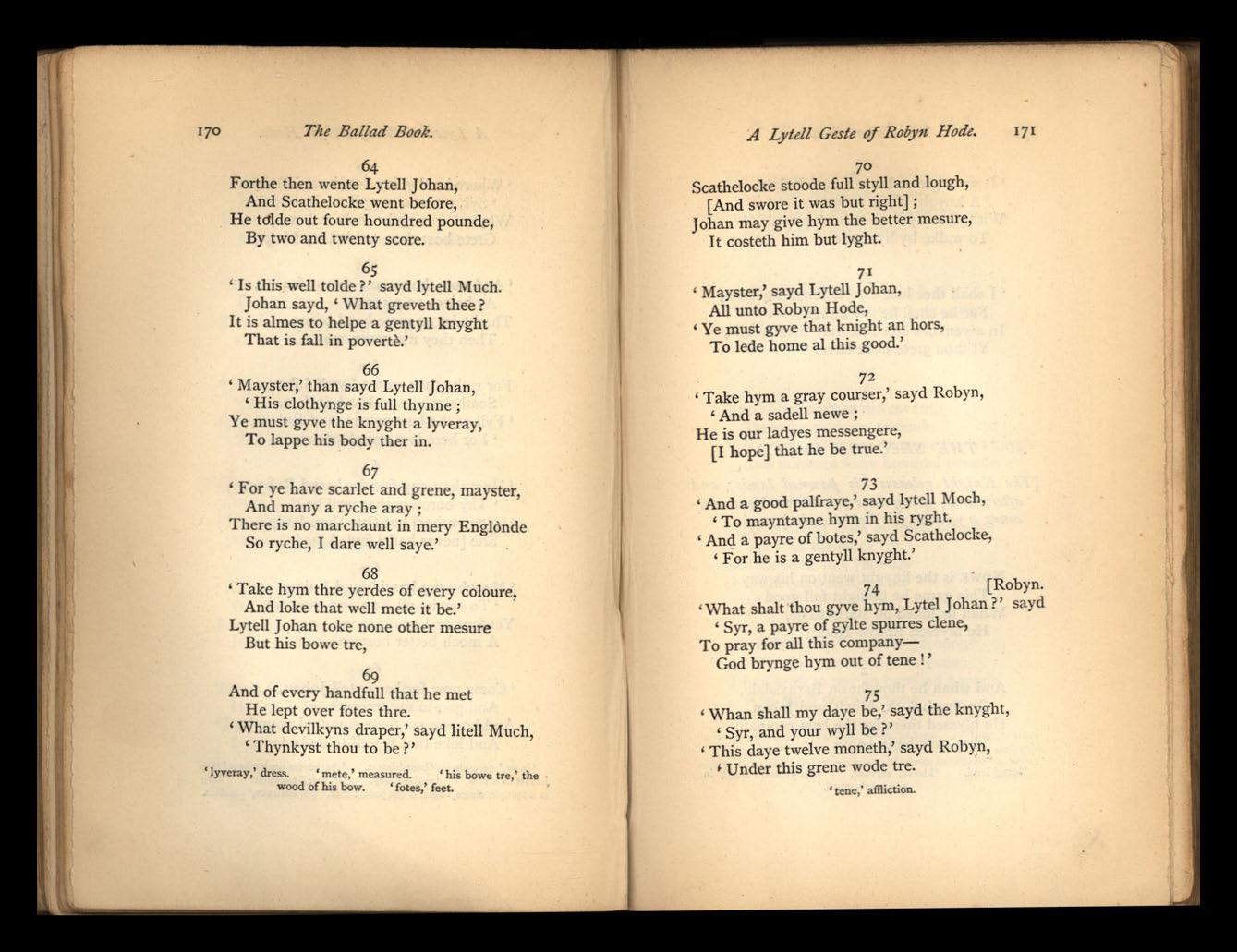
A Lytell Geste of RobY't Hode.
70
Scathelocke stoode full styll and lough, [And swore it was but right]; Johan may give hym the better mesure, It costeth him but lyght.
71
, Mayster,' sayd Lytell Johan, All unto Robyn Hode, 'Ye must gyve that knight an hors, To lede home al this good.'
72
I Take hym a gray courser,' sayd Robyn, I And a sadell ne we ; He is our ladyes messengere, [I hope] that he be true.'
73
, And a good palfraye,' sayd lytel! Moch, I To mayntayne hym in his ryght.
, And a payre of botes,' sayd Scathelocke, , For he is a gentyll knyght.'
74 [Robyn.
' What shalt thou gyve hym, Lytel Johan?' sayd , Syr, a payre of gylte spurres dene, To pray for all this companyGod brynge bym out of tene ! '
75
, Whan shall my daye be,' sayd the knyght, 'Syr and your wyll be ?'
, This daye twelve moneth,' sayd Robyn, I Under this grene wo de tre. tene,' afRiction.
A Lytell Geste of Robytz Hode.

The Ballad Book.
7 6
, It were grete shame,' sayd Robyn, , A knyght alone to ryde, Without squyer, yeman, or page, To walke by hys syde.
77
'I shall thee lene Lytyll Johan my man, For he shall be thy knave; In a yeman's steed he may thee stonde, Yf thou grete nede have.' .
THE SECONDE FYTTE.
[Tlze Knight releases Ms pawned lands,' and afterwards, going to repay Robin Hood, S1lCcours a yeoman for Robin's sake.]
I
N OWE is the knyght went on his way; This game he thought full g9 0d ; Whan he loked on Barnysdale, He blyssed Robyn Hode ; 2 And whan he thought on Barnysdale, On Scathelock, Much, and Johan, He blyssed them for the best company
That ever he in come.
'lene,' lend. 'knave,' servant. 'in a yeman's steed,' in yeoman's stead.
4
, And to the abbot of that place Foure hondr"ed pounde I must pay: And but I be there upon this nyght My londe is lost for ay.'
5
The abbot sayd to his covent, There he stode on grounde,
'This day twelfe moneth came there a knyght And borowed foure hondred pounde.
6
, [He borowed foure hondred pounde] Upon all his londe fre, But he come this ylke day Disheryted shall he be.'
7
, It is full erely,' sayd the pryoure,*
, The day is not yet ferre gone; I had lever to pay an hondred pounde And lay it downe a none. '
'covent,' convent. ' a none,' anon, at once. 'lever' rather. * prio,r, an abbey, was the officer immediately the abbot; 1D prlones and conventual cathedrals he was the superior. R,'tson .
8
, The knyght is ferre beyonde the see, In Englonde is his ryght, And suffreth honger and colde And many a sory nyght :
9
, It were grete pyte,' sayd the pryoure, , So to have his londe ; And ye be so Iyght of your conseyence, Ye do to him moch wronge.'
10
, Thou arte ever in my berde,' sayd the abbot, , By our saynt Rycharde.'
With that cam in a fat-heded monke, The high cellarer :
11
, He is dede or hanged,' sayd the monke , By him that bought me d ere; And we shall have to spende in this place Foure hondred pounde by yere.'
12
The abbot and the high cellarer, Sterte forthe full bolde ; The High Justyce of Englonde [With] the abbot there dyd holde.
13
The High Justyc e and many mo Had take into their honde Wholly all the knyghtes det, To put that knyght to wronge.

A Lytell Geste of Robytz Hode.
14
They demed the knyght wonder sore, The abbot and hys meyne : , But he come this ylke day Disheryted shall be.'
15
, He wyll not come yet,' sayd the justyce, , I dare well undertake.'
But in sorry tyme for them all, The knyght came to the gate.
16
Than bespake that gentyll knyght Untyll his meyne, , Now put on your simple wedes That ye brought fro the see.'
17
[They put on their simple wedes,] And came to the gates anone, The porter was redy hymselfe, And welcomed them everychone.
18
'Welcome, syr knyght,' sayd the porter, 'My lord to mete is he, And so is many a gentyll man, For the love of thee.'
19
Tpe porter swore a full grete othe, [When he his horse did see] : , Here be the best coresed horse That ever yet sawe I me.
demed: doomed, judged. 'meyne,' company. 'yIke,' same. 'wedes,' clothes. f mete,' meat. 'so,' should be 'wo' {?} 'coresed,' harnessed {Halliw<II}
TIle Ballad Book.
20
, Lede them into the stable,' he sayd, , That eased myght they be.'
, They shall not come therin,' sayd the knyght, [' Thy stable liketh not me.']
21
Lordes were to mete isette In that abbotes hall, The knyght went forth and kneled downe, And salved them grete and small.
22
, Do gladly, syr abbot,' sayd the knyght, , I am come to hoIde my day.'
The fyrst word the abbot spake, , Hast thou brought my pay?'
23
, Not one peny,' sayd the knyght, [' Alas! it might not be.']
, Thou art a shrewed dettour,' sayd the abbot; , Syr justyce, drynke to me.
24
"What doost thou here,' sayd the abbot, , But thou haddest brought thy pay?'
, Fore heaven,' than sayd the knyght, , To pray of a lenger daye.'
25
, Thy daye is broke,' sayd the justyce, , Londe get est thou none.'
, Now, good syr justice, be my frende, And fen de me of my fone.' salved,' said save you! ' fone,' foes.
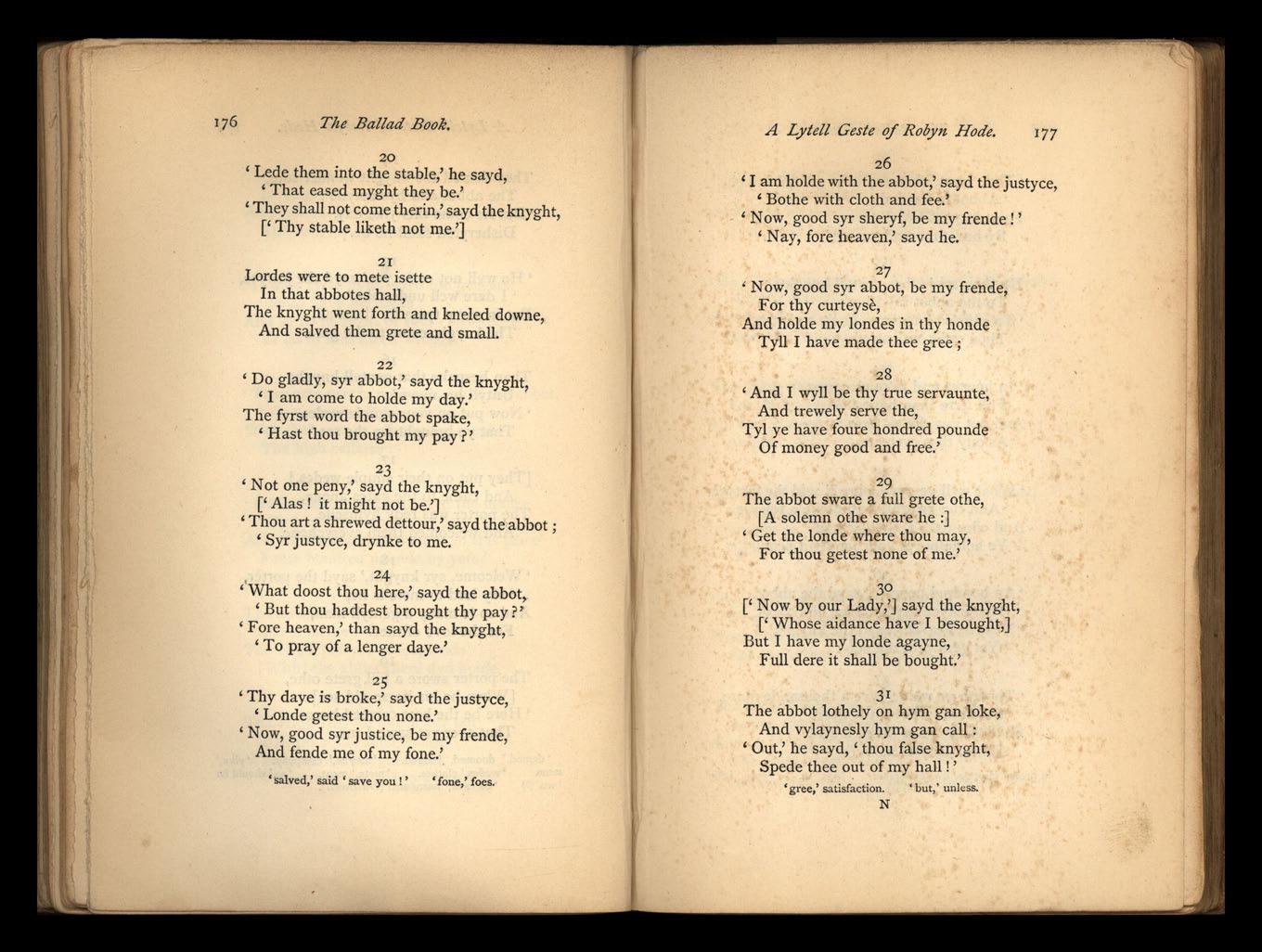
A Lytell Ceste of Robyn Hode. 177
26
, I am hoIde with the abbot,' sayd the justyce, , Bothe with cloth and fee.'
'Now, good syr sheryf, be my frende!' 'Nay, fore heaven,' sayd he.
27
'Now, good syr abbot, be my frende, For thy curteyse, And holde my londes in thy honde Tyll I have made thee gree ;
28
, And I wylI be thy true servaunte, And trewely serve the, Tyl ye have foure hondred pounde Of money good and free.'
29
The abbot sware a full grete othe, [A solemn othe sware he :]
, Get the Ion de where thou may, For thou getest none of me.'
30
[' Now by our Lady,'] sayd the knyght, [' Whose aidance have I besought,]
But I have my londe agayne, Full dere it shall be bought.'
3 1
The abbot lothely on hym gan loke, And vylaynesly hym gan call :
, Out' he sayd, ' thou false knyght, thee out of my hall! ' I gree,' satisfaction. ' but,' unl ess.
Tlze Ballad Book.
32
, Thou lyest,' then sayd the gentyll knygh t, , Abbot in thy hal ; False knyght was I never, By him that made us all.'
33
Up then stode that gentyll knyght, To the abbot sayd he, , To suffre a knyght to knele so longe, Thou canst no curteysye ;
34
, In joustes and in tourn ement · Full ferre than have I be, And put myselfe as ferre in pre es As ony that ever I se.'
35
'What wyll ye gyve more?' said the justyc e, , And the knyght shall make a releyse ; And elles dare I safely swere Ye holde never your londe in pees.'
36
'An hondred pounde,' sayd the abbot. The justyce sayd, ' Gyve him two.' ' Nay, be heaven,' sayd the knyght, , Yet gete ye it not 500 :
37
, Though ye wolde gyve a thousande mor e, Yet were ye never the nere ; Shall there never be myn eyre, Abbot, justyse, ne frere.' in prees,' in press, i. e. o f comba t. '500,' SQ. , eyre,' heir. fr e re,' fria r.
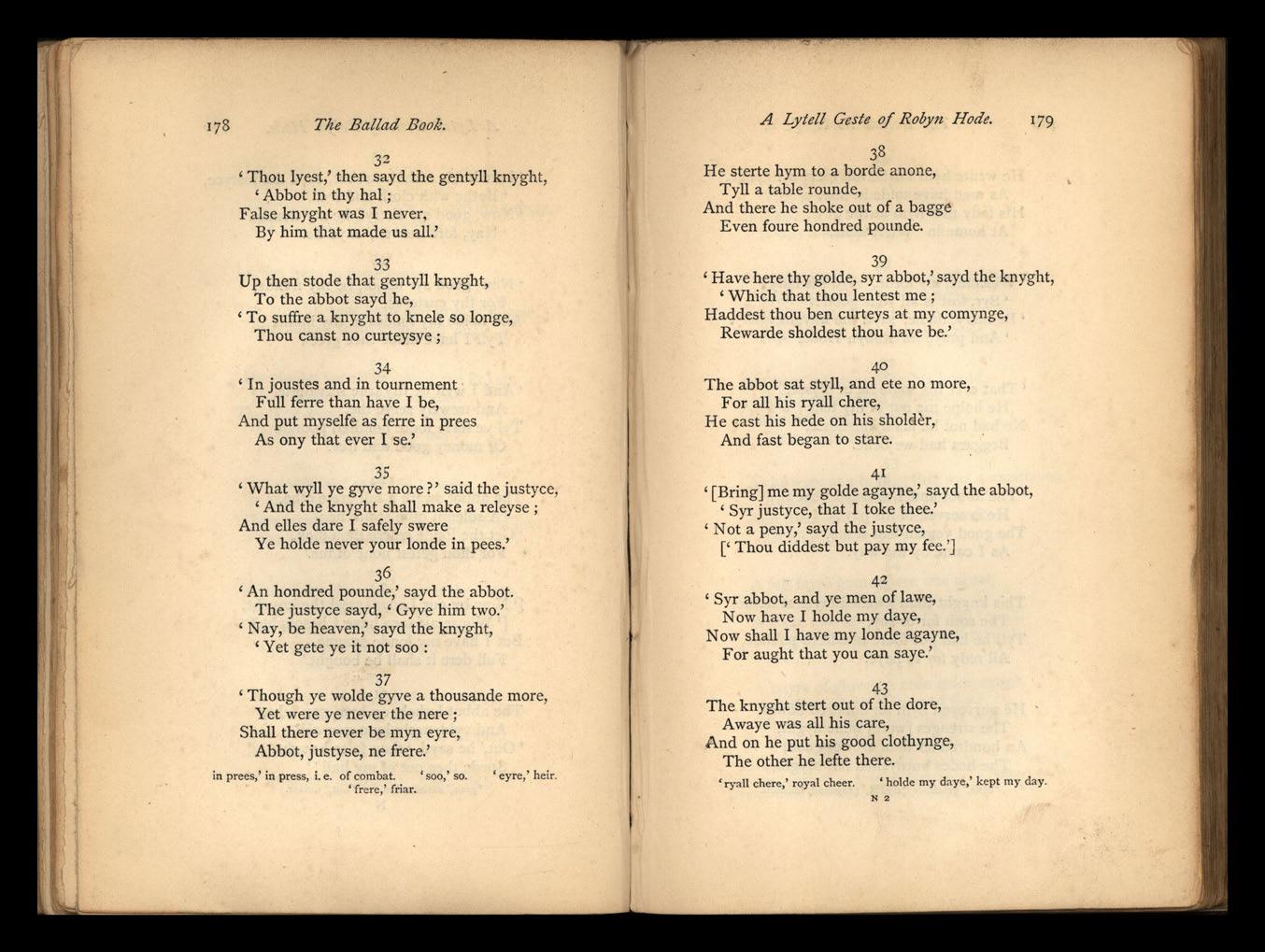
A Lytell Geste of Robyn Hode.
3 8
He sterte hym to a borde a none, Tyll a table rounde, And there he shoke out of a bagge Even foure hondred pounde.
39
, Have here thy golde, syr abbot,' sayd the knyght , , Which that thou lentest me ; Haddest thou ben curt eys at my comynge, Rewarde sholdest thou have be.'
40
The abbot sat styll, and ete no more, For all his ryall chere, He c as t his hede on his sholder, And fast began to stare.
41
, [Bring] me my golde agayne,' sayd the abbot, , Syr justyce, that I toke thee.'
, Not a p eny,' sayd the justyce, [' Thou diddest but pay my fe e.']
42
, Syr abbot, and ye men of lawe, Now have I holde my daye, Now shall I have my londe agayne, For aught that you can saye.'
43
The knyght stert out of the dore, Awaye was all his care, And on he put his good clothynge, The other he lefte there. 'ryall chere,' royal chee r. 'holde my daye,' kep t mr day . N 2
180 Tlze Ballad Book.
44
He wente hym forthe full mery syngynge, As men have tolde in tale, His lady met hym at the gate, At home in ' Wierysdale.'
45
'Welcome, my lorde,' sayd his lady; , Syr, lost is all your good?' , Be mery, dame,' sayd the knyght , , And praye for Robyn Hode,
46
, That ever his soule be in blysse, He holpe me out of my tene ; Ne had not be his kyndenesse, Beggars had we bene.
47
, The abbot and I acordyd bene; He is served of his pay; The good yeman lent it me, As I came by the way.'
48
This knyght than dwelled fayre at home, The soth for to say, Tyll he had got foure hondreth pounde, All redy for to paye.
49
He purveyed hym an hondred bowes ; The strenges [were] welle dyght, An hondred shefe of arowes good, The hedes burnyshed full bryght, (tene,' grief. ' dyght,' prepared, finished .

A Lytell Ceste of RobYlt Hode
50
And every arowe an elle longe, With pecocke well ydyght, Inocked all with whyte sylver, It was a semly syght. ,
51
He purveyed hym an hondreth men, Well harneysed in that stede, And hymselfe in that sa me sete, And clothed in whyte and red e.
52
He bare a launsgay in his honde, And a man ledde his male, And reden with a lyght songe, Unto Barnysdale.
53
As he went at a brydge ther was a wrastelyng , And there taryed was he, And there was all the best yemen Of all the west countree.
54
A full fayre game there was upset ,
A whyte bull up ipyght ; .
A grete courser with sadle and brydJl, With golde burneyshed full bryght;
55
A payre of gloves, a rede golde rynge, A pype of wyne, in good fay: What man bereth him best, I wys, The pryce shall bere away.
e inocked ,' not ched. ( stede,' place (1) 'sete ' (1 ) 'laun sgay,' lance(?) 'male ,' se t up. ' ipyght,' fixed, fastened. 'fay ,' faith. 'pryce, pn ze .
182 The Ballad Book.
56
There was a yeman in that place, And best worthy was he ; And for he was ferre, [without] frend bestad, Islayne he sholde have be.
57
The knyght had ruth of this yem1m, In place where that he stode, He said that yoman sholde have no harme , For love of Robyn Hode.
58
The knyght presed into the place, An hondred folowed hym fre, With bowes bent, and arowes sharpe, For to shende that company.
59 They sholdred all, and made hym rome, To wete what he wolde say, He toke the yeman by the honde, And gave hym all the playe ;
60
He gave fyve marke for his wyne, There It laye on the molde, And bad it sholde be sette a-broche Drynke who so wolde. '
61
Thus longe taryed this gentyll knyght, Tyll that playe was done,So longe abode Robyn fastynge, . Thre houres after the none. '.rerre,' from afar. 'bestad,' beset (1) 'shende,' hurt, punish. 'there ,' where. ' molde,' ground.

THE THYRDE FYTTE.
[L£ttle 'John goes £nto the serv£ce of the Sheriff, robs Ms house, and mtices him into the Ilands of Robi11 Hood.]
LYTH and lysten, gentyll men, All that now be h ere, . Of Lytell Johan, that was the knyghtes man, Good myrthe shall ye here.
2
It was upon a mery day, That yonge men wolde go shete, Lytell Johan fet his bowe anone, And sayd he wolde them mete.
3
Thre tymes Lytell Johan shot about, And alway cleft the wan de, The proude sheryf of N otyngham By the markes gan stande.
4
The sheryf saw how J ohan shot, And a great oath sware he : , This man is the best archere That yet sawe I me. 'she te,' shoot. ' fet, fetched .
The Ballad Book.
5
, Say me now, wyght yonge man, Thy name now tell to me, In what countre were thou born And where may thy be?'
6
, In Holdernesse I was bore, I wys, all of my dame; Men call me Reynolde Grenelefe, Whan I am at hame.'
7
, Say me, Reynaud Grenelefe, Wolte thou dwell with me?
And every yere I wyll the gyve Twenty marke to thy fee.'
8
, I have a mayster,' sayd Lytell Johan , A curteys knyght is he ; , May ye gete leve of hym, The better may it bee.'
9
The sheryfe gate Lytell Johan
Twelve monethes of the knyght, Therfore he gave him ryght anone A good hors and a wyght.
la
Now is Lytel Johan the sheryffes man, Heaven gyve us well to spede; But alway thought Lytell Johan To quyte hym well his mede. strong, active. (I wys,' I know, i. e. truly. To quyte' &c., to pay him well his due.

A Lyte11 Geste of Robyn Hode.
II
, Now so heaven me helpe,' sayd Lytel J ohan, , And by my trewe lewte, I shall be the worste servaunte to hym That ever yet had he.'
12
It befell upon a wednesday, The sheryfe on hontynge was gone, And Lytel J ohan lay in his bed, And was foryete at home.
13
Therfore he was fastynge Tyl it was past the none.
, Good syr stuard, I pray thee, Geve me to dyne,' sayd Lytel Johan.
14
, I t is too long for Grenelefe, Fastynge so long to be; Therfore I pray the, stuarde, My dyner gyve thou me.'
15
, Shalt thou never ete ne drynke,' sayd the stuarde, , Tyll my lord be come to towne.'
'I make myn avowe,' sayd Lytell Johan, , I had lever to cracke thy crowne.'
16
The butler was ful uncurteys, There he stode on flore, He sterte to the buttery, And shet fast the dore.
'lewte,' loyalty, faith . ( {oryet e ,' forgotten. ( none,' noon .
186 The Ballad Book.
17
Lytell Johan gave the buteler such a rap, His backe yede nygh on two; Tho he lyved an hundreth wynter, The wors he sholde go.
18
He sporned the dore with his fote, It went up wel and fyne, And there he made a large lyveray
Both of ale and wyne.
19
'Syth ye wyl not dyne,' sayd Lytel Johan, , I shall gyve you to drynke, . And though ye lyve an hondred wynter, On Lytell Johan ye shall thynk.'
20
Lytell J ohan ete, and Lytell [J ohan] dronke, The whyle that he wolde.
The sheryfe had in his kechyn a coke, A stoute man and a bolde. .
21
, I make myn avowe,' sayd the coke, , Thou arte a shrewde hynde, In an housholde to dwel, For to ask thus to dyne.'
22
And there he lent Lytel J ohan
Good strokes thre.
, I make myn avowe,' sayd Lytell J ohan, , These strokes lyketh well me.
(yede,' went. C lyveray : ' the quantity of provisions delivered a t one time by the butler was called a livery (Ri/sol: ). 'hynde,' servant.
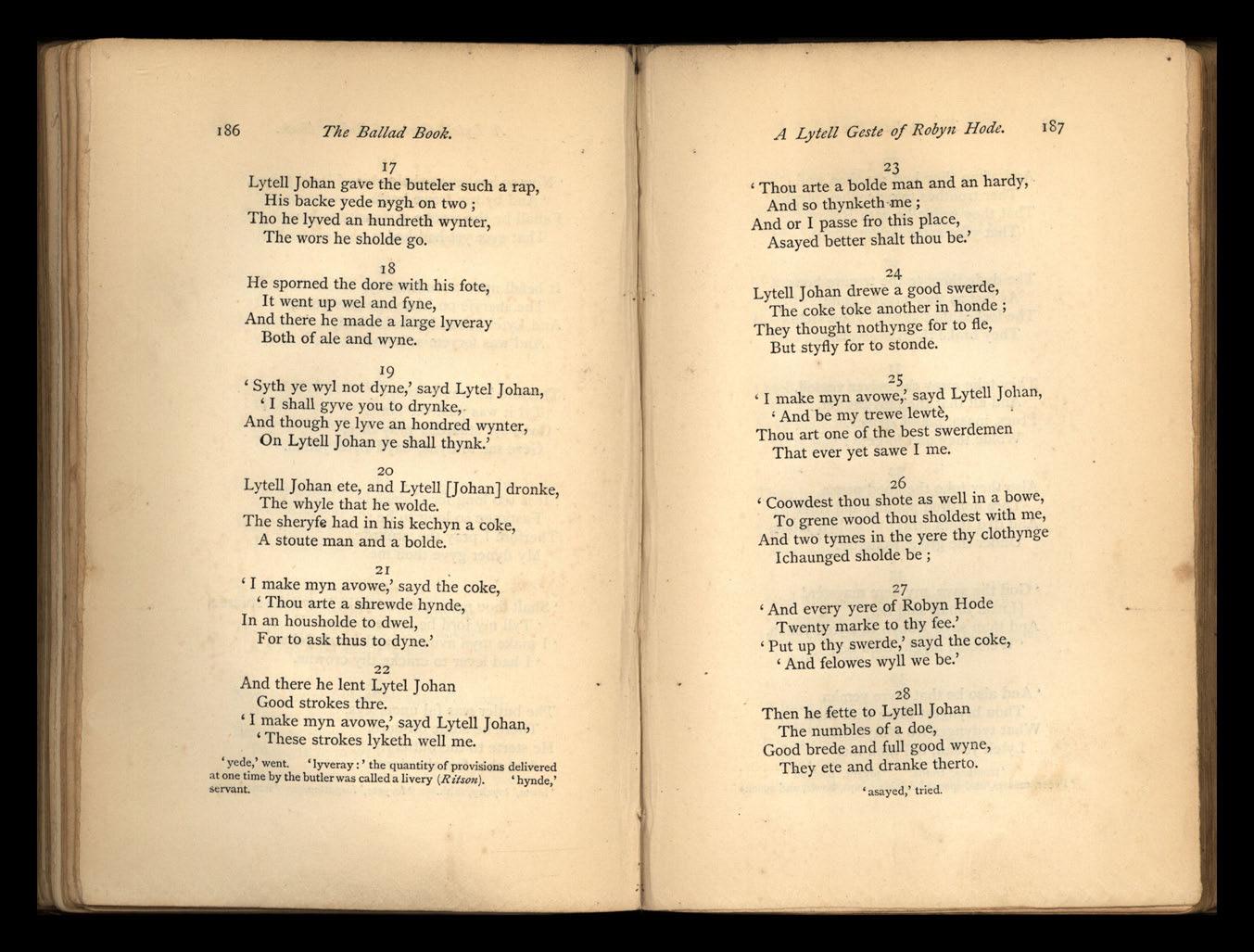
A Lytell Geste of Robyn Hode.
23
, Thou arte a bolde man and an hardy, And so thynketh ·me; And or I passe fro this place, Asayed better shalt thou be.'
24
Lytell Johan drewe a good swerde, The coke toke another in honde ; They thought nothynge for to fie, But styfiy for to stonde.
25
, I make myn avowe,' sayd Lytell J ohan, , And be my trewe lewte, . Thou art one of the best swerdemen That ever yet sawe I me.
26
, Coowdest thou shote as well in a. bowe, To grene wood thou sholdest with me, And two tymes in the yere thy clothynge Ichaunged sholde be ;
27
, And every yere of Robyn Hode Twenty marke to thy fee.'
, Put up thy swerde,' sayd the coke, 'And felowes wyll we be.'
28
Then he fette to Lytell Johan
The numbles of a doe, Good brede and full good wyne, They ete and dranke therto. 'asayed,' tried.
188 TIle Ballad Book.
29
And whan they had dronken well, Ther trouthes togyder they plyght, That they wolde be with Robyn That ylke same day at nyght.
30
The dyde them to the tresure-hous, As fast as they myght gone, The lockes that were of good stele They brake them everychone ;
31
They toke away the sylver vessell, And all that they myght get, Peces, masars, and spones, W olde they non forgete ;
32
Also they toke the good pence, Thre hondred pounde and three; And dyd them strayt to Robyn Hode , Under the grene wode tre.
33
, God the save, my dere mayster,' [Little Johan said he,] And than sayd Robyn to Lytell Johan, 'Welcome myght thou be ;
34
, And also be that fayre yemlm Thou bryngest there with thee. What tydynges fro N otyngham ?
Lytell Johan, tell thou me.' 'trouthes,' troths. 'plyght,' pledged. , Feces, masars, and spones,' drinking cups, bowls, and spoons .

A Lytell Geste of Robyn Hode.
35
'vVell thee greteth the proude sheryfe, And sende thee here by me
His coke and his sylver vessell, And thre hondred pounde and thre.'
36
, I make myn avow,' sayd Robyn, , However the thing may be, It was never by his good wyll, This good is come to me ! '
37
Lytell Johan hym there bethought On a shrewed wyle . Fyve myle in the forest he ran, Hym happed at his wyll;
38
Than he met th e proud sheryf, Huntynge with hounde and horne, Lytell Johan coud his curteysye, And kneled hym beforne :
39
God thee save, my dere mayster, Keep thee well,' sayd he. , Raynolde Grenelefe,' sayd the sheryfe, , Where hast thou nowe be ?'
40
, I have be in this forest, A fayre syght can I se, It was one of the fayrest syghtes That ever yet sawe I me;
• Hym at his wyll,' i. e. it chanced to him as he wished (?)
Tile Ballad Book.
41
'Yonder I se a ryght fayre hart, His coloure is [full shene], Seven score of dere upon an herde Be all with hym bedene ;
42
, His tynde are so sharp, mayster, Of sexty and well mo, That I durst not shote for drede Lest they wolde me 5100.'
43
, I make myn avowe ! ' sayd the sheryf, , That syght wolde I fayn se.'
, Buske you thyderwarde, my dere mayster, Anone, and wen de with me.'
44
The sheryfe rode, and Lytell Johan Of fote he was full smarte, And whan they came afore Robyn : , Lo, here is the mayster harte ! '
45
Styll stode the proude sheryf, A sory man was he : 'Wo worth the, Raynolde Grenelefe! Thou hast now betrayed me ! '
46
, I make myn avowe,' sayd Lytell Johan, , Mayster, ye be to blame; I was mysserved of my dynere, When I was with you at hame.'
'shene,! bright. • beden • .' besides (1) buske, betake. 'tynde,t antlers.

A Lytell Ceste of Roby1Z Hode.
47
Soone he was to supper And served with sylver whyte ; And whan the sheryf se his vessell, For sorowe he myght not ete.
48
, Make good chere,' sayd Robyn Hode, , Sheryfe, for charyte, And for the love of Lytell Johan, Thy Iyfe is graunted to the.'
49
When they had supped well, The day was all ago ne, Robyn commaunded Lytell J oh an To drawe off his hosen and his shone,
50
His kyrtell and his cote a pye, That was furred well fyne, And take him a grene man tell, To lappe his body therin.
51
Robyn commaunded his wyght yong men, Under the grene wood tre, They shall lay in that same sorte That the sheryf myght them se.
52
All nyght laye that proud sheryf, In his breche and in his sherte, No wonder it was, in grene wode, Tho his sydes do smerte.
I kyrtell and cote a pye,' jacket and cloak. , no wonder,' i. e. nothing uncommon .
Tile Ballad Book.
53
, Make glad chere,' sayd Robyn Bode, , Sheryfe, for charyte, For this is our order I wys, Under the grene wood tre.'
54
, This is harder order,' sayd the sheryfe, , Than ony anker or frere ; For al the golde in mery Englonde I wolde not longe dwell here.'
55
, All these twelve monethes,' sayd Robyn, , Thou shalte dwell with me; I shall thee teche, proud sheryfe, An outlawe for to be.'
56
, Or I here another nyght lye,' sayd the sheryfe, , Robyn, nowe I praye thee, Smyte of my hede rather to-morne, And I forgyve it thee.
57
, Lete me go,' then sayd the sheryf, 'For saynt Charyte, And I wyll be thy best frende That ever yet had thee.'
58 , Thou shalte swere me an othe,' sayd Robyn, , On my bryght bronde, Thou shalt never awayte me scathe, By water ne by londe ; 'anker,' anchorite. 'scathe,' injury.
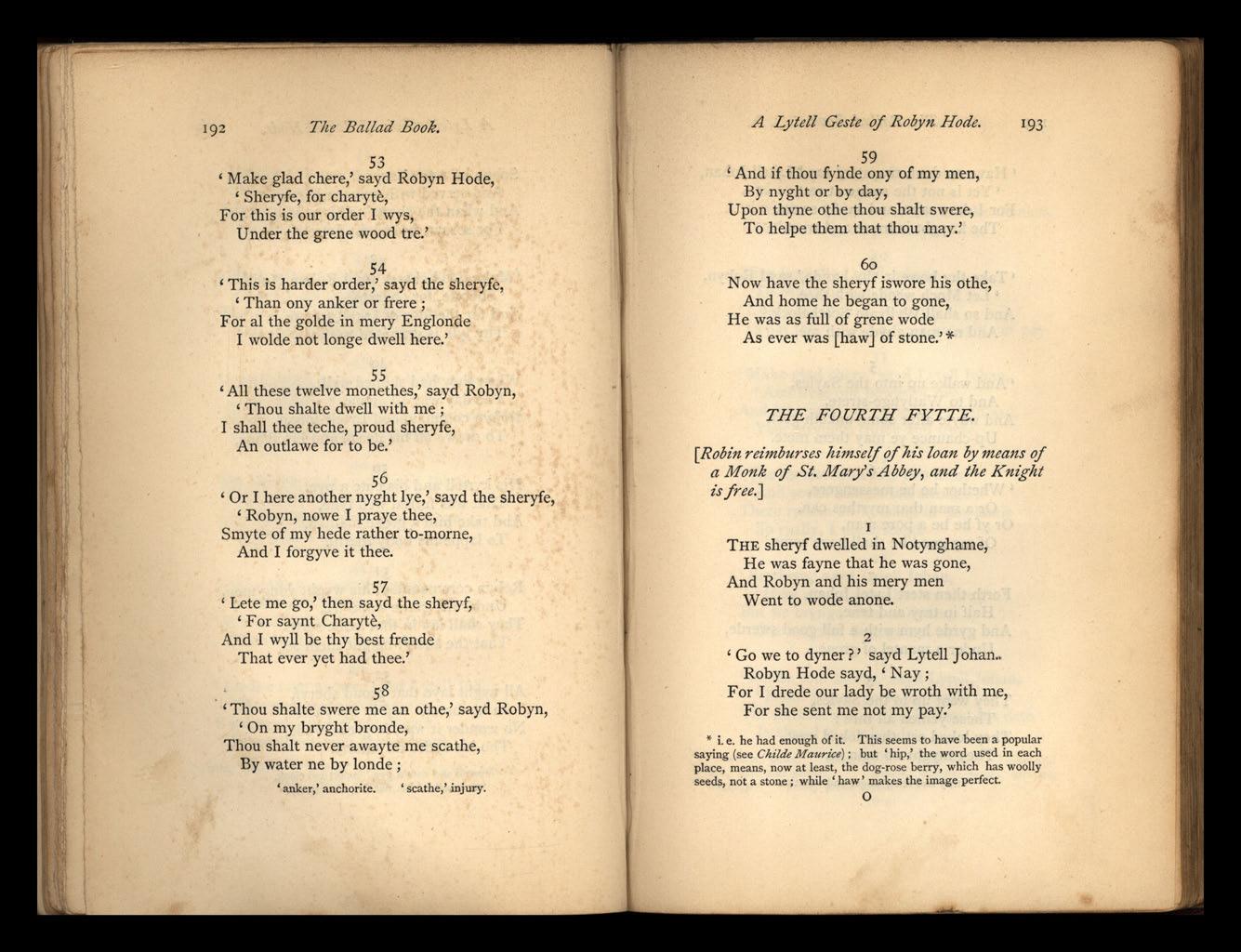
A Lytell Geste of Robyn Hode.
59
, And if thou fynde ony of my men, By nyght or by day, Upon thyne othe thou shalt swere, To helpe them that thou may.'
60
Now have the sheryf iswore his othe, And home he began to gone, Be was as full of grene wode As ever was [haw] of stone.' '*
THE FOURTH FYTTE.
[Robin reimburses llimself of llis loan by means of a Monk of St. Mary's Abbey, and the Knight is free.]
I
THE sheryf dwelled in N otynghame, Be was fayne that he was gone, And Robyn and his mery men Went to wode anone.
2
, Go we to dyner?' sayd Lytell Johan Robyn Bode sayd, ' Nay; For I drede our lady be wroth with me, For she sent me not my pay.'
* i. e. he had enough of it. This seems to have been a popular saying (see Cltilde Maurice ) ; but 'hip,' the word used in each place, means, now at least, the dog-rose berry, which has woolly seeds, not a stone; while' haw' makes the image perfect. o
194 Tlte Ballad Book.
3
, Have no dout, mayster,' sayd Lytell Johan, , Yet is not the sonne at rest; For I dare saye, and saufly swere, The knyght is trewe and trust.'
4
, Take thy bowe in thy hande,' sayd Robyn, , Let Moch wende with thee, And so shall Wyllyam Scathelock, And no man abyde with me,
5
, And walke up into the Sayles, And to Watlynge-strete, And wayte after some unketh gest, Up-chaunce ye may them mete.
6
, Whether he be messengere, Or a man that myrthes can, Or yf he be a pore man, Of my good he shall have some .'
7
Forth then stert Lytel Johan, Half in tray and tene, And gyrde hym with a full good swerde, Under a mantel of grene.
8
They went up to the Sayles, These yemen all thre ; They loked est, they loked west, They myght no man se.
, tray and tene,' anger and vexation.
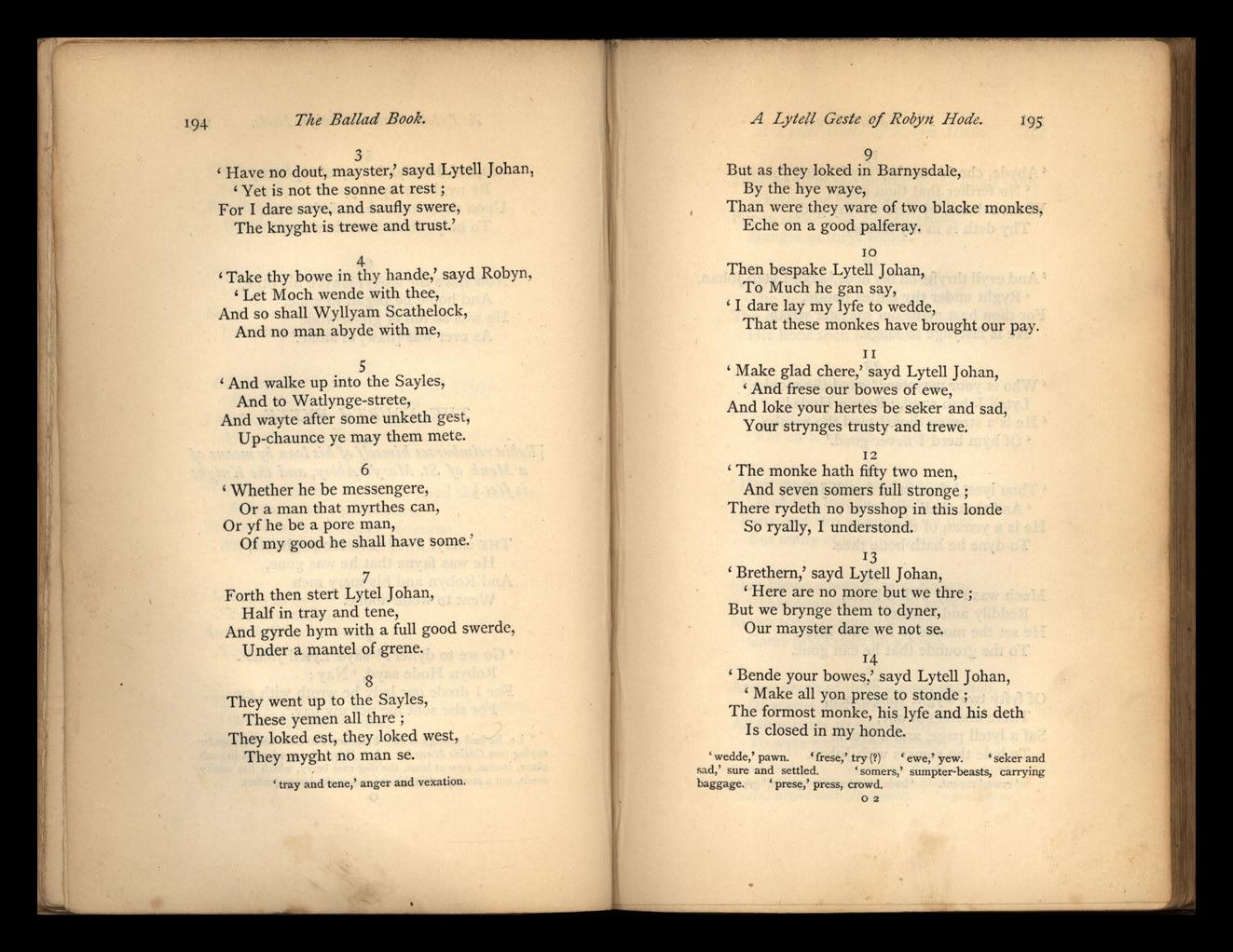
A Lytell Ceste of Robyn Hode.
9
But as they loked in Barnysdale, By the hye waye, 195 Than were they ware of two blacke monkes, Eche on a good palferay.
10
Then bespake Lytell Johan, To Much he gan say, , I dare lay my lyfe to wedde, That these monkes have brought our pay.
11
• Make glad chere,' sayd Lytell Johan, , And frese our bowes of ewe, And loke your hertes be seker and sad, Your strynges trusty and trewe.
12
, The monke hath fifty two men, And seven somers full stronge ; There rydeth no bysshop in this londe So ryally, I understond.
13
'Brethern,' sayd Lytell Johan, , Here are no more but we thre ; But we brynge them to dyner, Our mayster dare we not se.
14
, Bende your bowes,' sayd Lytell J ohan, , Make all yon prese to stonde ; The formost monke, his lyfe and his deth Is closed in my honde.
' wedde,' pawn. ' frese,' try (1) , ewe,' yew. ' seker and sa d,' s ure and settled. ( sorners, ' sumpter-beasts, carrying baggage. ' prese,' press, crowd . 02
Til e Ballad Book.
15
, Abyde, chorle monke,' sayd Lytell J ohan, , No ferther that thou gone; Yf thou doost, by dere worthy god, Thy deth is in my honde.
16
, And evyll thryfte on thy hede,' sayd Lytell J ohan, , Ryght under thy hatt es bonde, '
For thou hast made our mayster wroth, He is fastynge so lon ge.'
17
, Who is your mayster?' sayd the monke.
Lytell Johan sayd, 'Rob yn Hode.'
, He is a stronge thefe,' sayd the monke, , Of hym herd I never good.'
18
'Thou lyest,' than sayd Lytell Johan, , And that shall rewe thee; He is a yeman of the forest, To dyne he hath bode thee.
19
Much was redy with a bolte, Reddily and a-none, He set the monke to fore the brest, To the grounde that he can gone.
20
Of fyfty two wyght yonge men, There abode not one, Saf a lytell page, and a grome
To lede the somers with Johan. 'rewe,' repent. 'bode,' bidden. , gromc,' groom .
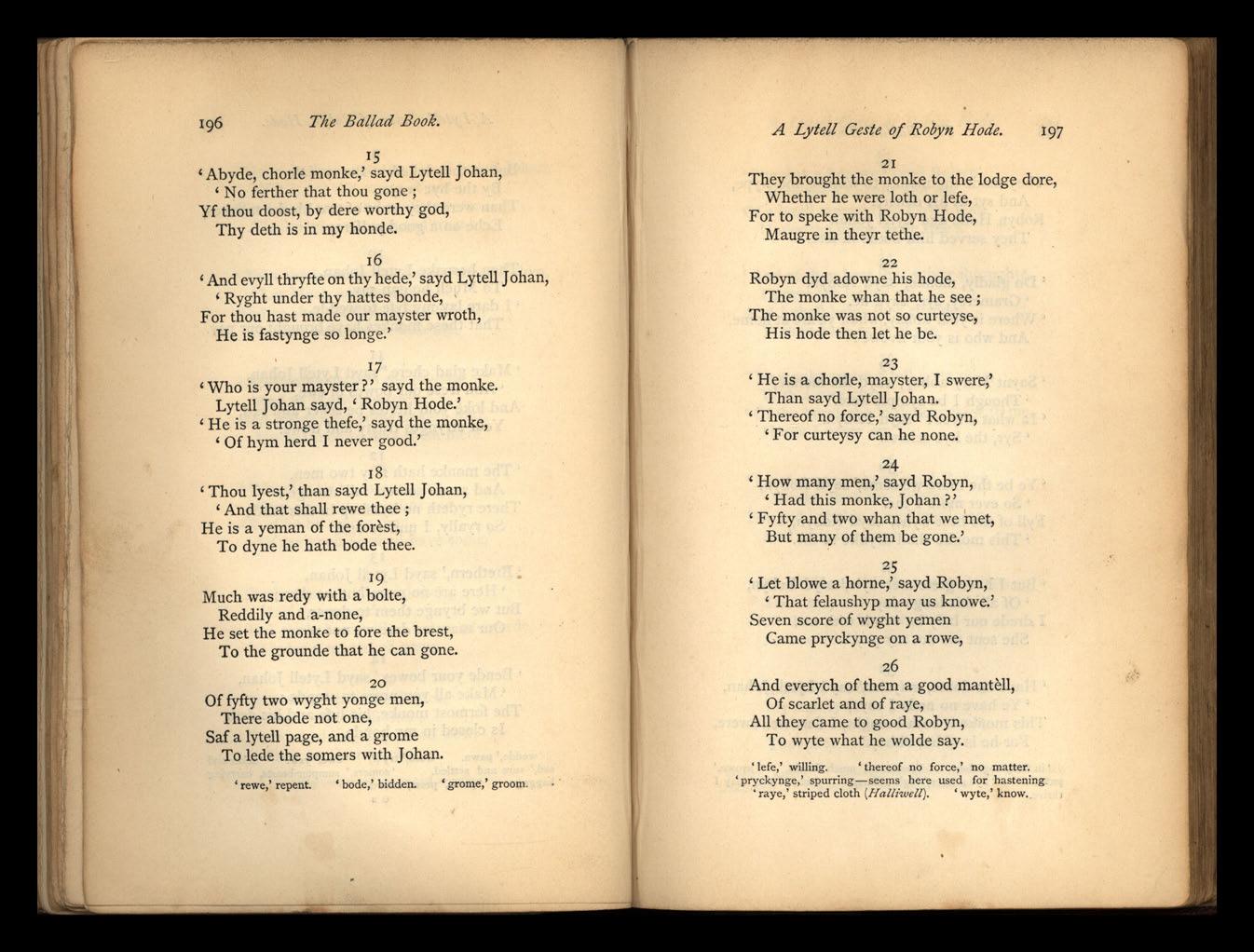
A Lytell Geste of Robyn Hode. 197
21
They brought the monke to the lodge dore, Whether he were 10th or lefe, For to speke with Robyn Hode, Maugre in theyr tethe.
22
Robyn dyd adowne his hode, The monke whan that h e see'
The .monke was not so curteyse: HIs hode then let he be.
23
, He is a chorle, mayster, I swere,' Than sayd Lytell J ohan.
, Thereof no force,' sayd Robyn, , For curteysy can he none.
24
, How many men,' sayd Robyn, , Had this monke, J ohan ?'
, Fyfty and two whan that we met, But many of them be gone.'
25
, Let blowe a home,' sayd Robyn, , That felaushyp may us knowe.'
Seven score of wyght yemen Came pryckynge on a rowe,
26
And everych of them a good man tell, Of scarlet and of raye, All they came to good Robyn, To wyte what he wolde say.
, 'Iefe,' wi!ling.. 'thereof no force,' no matter. pryckynge, spurrmg-seems here used for hastening raye ,' striped cloth (H alliwell). ' wytc,' know.
The Ballad Book.
27
They made the monke to wasshe and wype t And syt at his denere. Robyn Hode and Lytel J ohan They served him bothe in fere.
28
, Do gladly, monke,' sayd Robyn. , Gramercy, syr,' sayd he.
, Where is your abbay, whan ye are at home, And who is your avowe?'
29
, Saynt Mary abbay,' sayd the monke, , Though I be symple here.'
, In what offyce?' sayd Robyn. , Syr, the hye selerer.'
30
'Ye be the more welcome,' sayd Robyn, , So ever mote I the.
Fyll of the best wyne,' sayd Robyn, , This monke shall drynke to me.
3 1
, But I have grete mervayle,' sayd Robyn, , Of all this longe day, I drede our lady be wroth with me, She sent me not my pay.'
32
'Have no doute, mayster,' sayd Lytell Johan, 'Ye have no nede I saye, This monke it hath brought, I dare well swere, For he is of her abbay.'

33
, She was a borowe,' sayd Robyn , Betwene a knyght and me, Of a lytell money that I hym lent, Under the grene wo de tree;
34
, And yf thou hast that sylver ibroughte, I praye the let me se, And I shall helpe thee eftsones, Yf thou have nede of me.'
35
The monke swore a full grete othe, With a sory chere : , Of the borowehode thou spekest to me, Herde I never ere.'
36 , I make myn avowe,' sayd Robyn, , Monke, thou arte to blame, For god is holde a ryghtwys man, And so is his dame.
37
in fere,' together. ' g ramercy,' much thanks. 'avowe,' patron. 'hye selerer,' high·cellarer. 'mote I the,' m.a y l thrive . A Lytell Geste of Robytt Hode.
199
, Thou toldest with thyn owne tonge, Thou may not say nay, How thou arte her servaunt, And servest her every day:
38
, And thou art made her messengere, My money for to pay, Therfore I con thee more thanke, Thou arte come at thy day.
(borowe,' surety. 'eftsones,' hereafter (RitsOll ) ; immediately ( H alliwell }. ' sory chere,' sad countenance. ' ere, ' before .
200 TIle Ballad Book.
39
, What is in your cofers ?' sayd Robyn, , Trewe then tell thou me.' , Syr,' he sayd, 'twenty marke, Al so mote I the.'
40
, Yf there be no more,' sayd Robyn, 'I wyll not one peny ; Yf thou hast myster of ony more, Syr, more I shalllende to the;
4I
, And yf I fynde more,' sayd Robyn, , I wys thou shalte it forgone; For of thy spendynge sylver, monk, Therof wyll I ryght none.
42
'Go nowe forthe, Lytell Johan, And the trouth tell thou me ; If there be no more but twenty marke, No peny that I se.'
43 . Lytell Johan spred his mantell do\vne ; As he had done before, And he tolde out of the monkes male, Eyght hundreth po un de and more.
44
Lytell J ohan let it lye full styll, And went to his mayster in hast : , Syr,' he sayd, 'the monke is trewe ynowe, Our lady hath doubled your cost.' 'myster,' need. 'male,' budget.

A Lytell Geste of Robylt Hode.
45
, I make myn avowe,' sayd Robyn, '(Monke, what tolde I thee?)
Our lady is the trewest woman That ever yet founde I me.
46
, By all that's good,' sayd Robyn, , To seche all Englond thorowe, Yet founde I never to my p ay
A moche better borowe.
47
, Fyll of the best wyne, do hym drynke,' sayd Robyn ; , And grete well thy lady hende, And yf she have nede of Robyn Hode, She shall hym fynde a frende ;
48
, And yf she nedeth ony more sylver, Come thou agayne to me, And, by this tok en she hath me sent, She shall have such thre.' .'
49
The monke was going to London ward, There to holde grete mote, The knyght that rode so hye on hors, To brynge hym under fote.
50
'Whither be ye away?' sayd Robyn. , Syr, to manors in this Ionde, To reken with our reves, That have done moch wronge.' 'hende,' gentle. 'mo te,' meeting. 'reves,' bailiffs.
202 Tlte Ballad Book.
51
The monke toke the hors with spurre, No lenger wolde he abyde. , Aske to drynke,' than sayd Robyn, , Or that ye forther ryde.'
52
'Nay, fore heaven,' than sayd the monke, , Me reweth I cam so nere ; For better chepe I myght have dyned In Blythe or in Dankestere.'
53
, Crete well your abbot,' sayd Robyn,
, And your pryour, I you pray, And byd hym sende me such a monke To dyner every day.'
54
Now lete we that monke be styll, And speke we of that knyght, Yet he came to holde his day Whyle that it was lyght.
55 He dyde him streyt to Barnysdale, Under the grene wode tre, And he founde there Robyn Hode, And all his mery meyne.
56
The knyght lyght downe of his good palfdty, Robyn whan he gan see, So curteysly he dyde adoune his hode, And set hym on his knee. '.Dankestere,' Doncaster. ( meyne,' company.
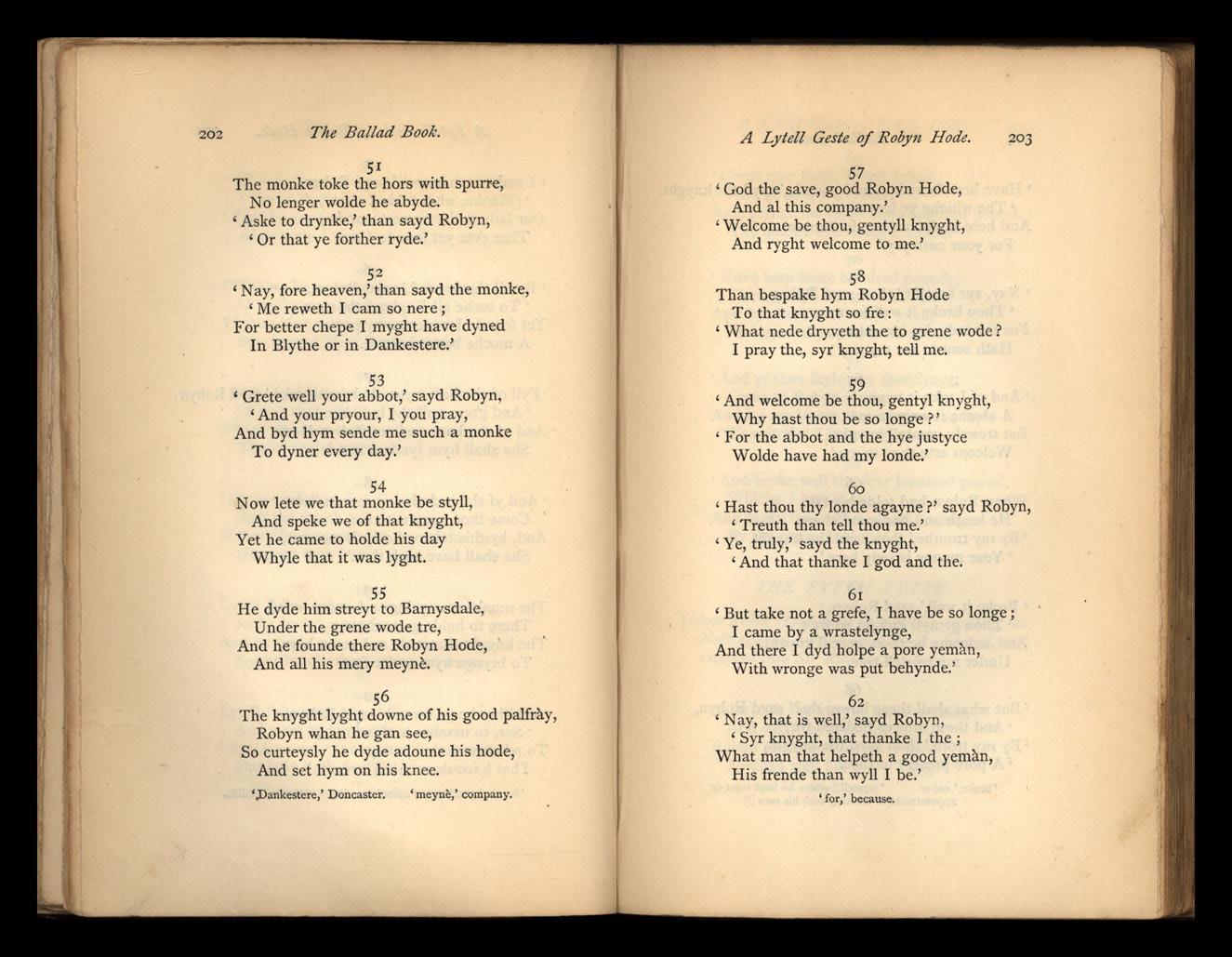
A Lytell Geste of Robyn Hode.
57
, God the save, good Robyn Hode, And al this company.'
'Welcome be thou, gentyll knyght, And ryght welcome to me.'
58
Than bespake hym Robyn Hode
To that knyght so fre :
, What nede dryveth the to grene wode ?
I pray the, syr knyght, tell me.
59
, And welcome be thou, gentyl knyght, Why hast thou be so longe ?'
, For the abbot and the hye justyce Wolde have had my londe.'
60 20 3
, Hast thou thy londe agayne ?' sayd Robyn, , Treuth than tell thou me.'
'Ye, truly,' sayd the knyght, , And that thanke I god and the.
61
, But take not a grefe, I have be so longe; I came by a wrastelynge, And there I dyd holpe a pore yem1m, With wronge was put behynde.'
62
, Nay, that is well,' sayd Robyn, , Syr knyght, that thanke I the; What man that helpeth a good yem1m, His frende than wyll I be.' for,' because.
204 The Ballad Book.
63
'Have here foure hondred ·pounde,' sayd the knyght, , The whiche ye lent to me; And here is also an hondred more For your curteysy.'
64
'Nay, syr knyght,' than sayd Robyn, 'Thou broke it well for ay ; For our lady, by her selerer, Hath sent to me my pay;
65
, And yf I toke it twyse, A shame it were to me: But trewely, gentyll knyght, Welcom arte thou to me.'
66
Whan Robyn had tolde his tale, He leugh and had good chere.
, By my trouthe,' then sayd the knyght, 'Your money is redy here.'
6 7
, Broke it well,' sayd Robyn, , Thou gentyll knyght so fre ; And welcome be thou, gent ill knyght, Under my trystell tree .
68
, But what shall these bowes do ?' sayd Robyn, , And these arowes ifedered fre ?'
'By my troth,' than sayd the knyght, , A pore present to thee.'
'broke,' enjoy. 'tryste ll,' where he kept tryst or appointment of mee ting with his men (?)
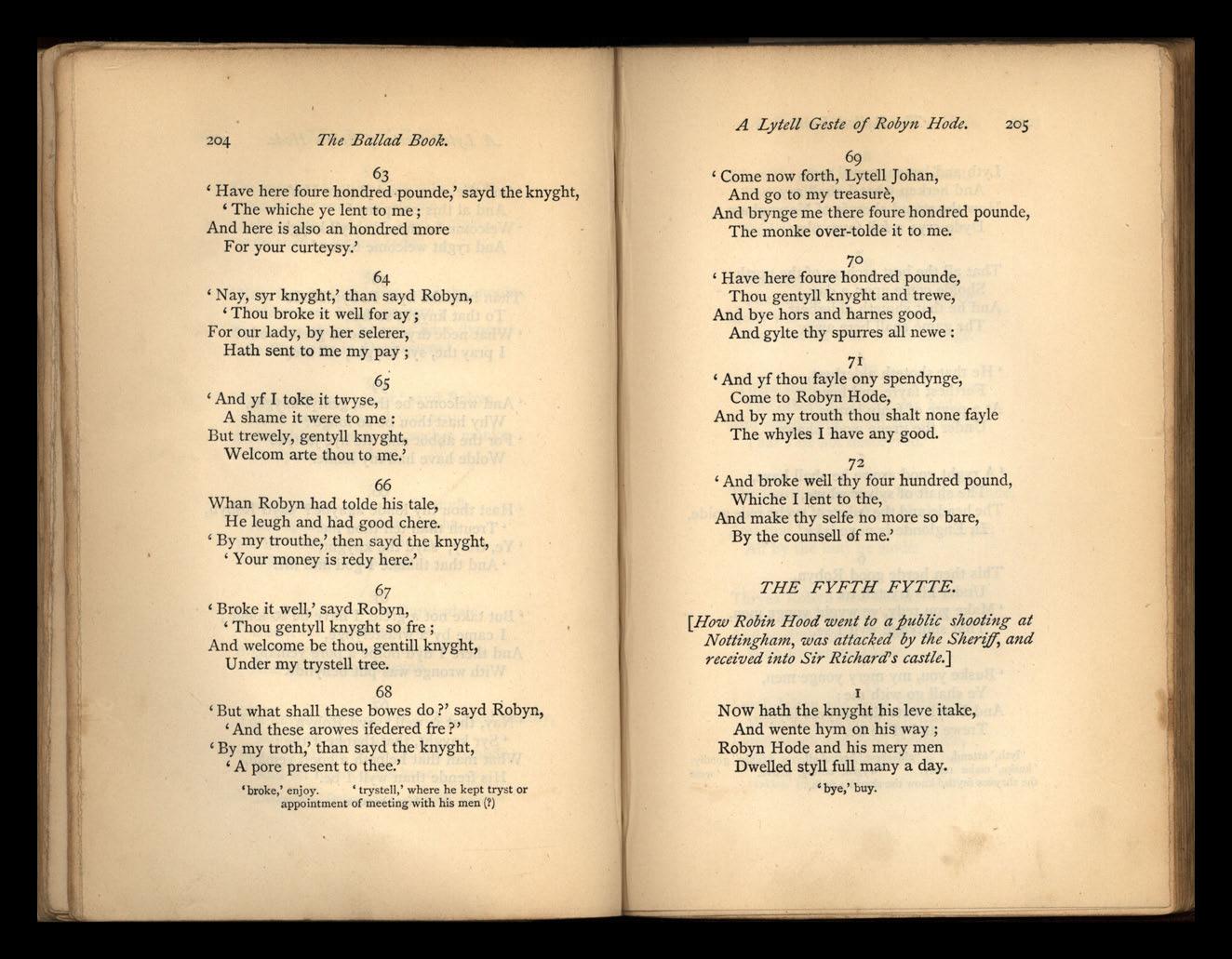
A Lytell Gcste of Robyn Hode .
69
'Come now forth, Lytell Johan, And go to my treasure, And brynge me there foure hondred pounde, The monke over-tolcle it to me.
70
, Have here foure hondred pounde, Thou gentyll knyght and trewe, And bye hors and harnes good, And gylte thy spurres all newe :
71
, And yf thou fayle ony spendynge, Come to Robyn Hode, And by my trouth thou shalt none fayle The whyles I have any good.
72
, And broke well thy four hundred pound, Whiche I lent to the, And make thy selfe no more so bare, By the counsell of me.'
THE FYFTH FYTTE.
[How Robin Hood went to a public slLOotillg at Nottinglwm, was attacked by tlte Slleriff, and received into Sir Ricltard's castle.]
1
Now hath the knyght his leve itake, And wente hym on his way; Robyn Hode and his mery men
Dwelled styli full many a day. 'bye,' buy
:106 The Ballad Book.
2
Lyth and lysten, gentil men, And herken what I shall say, Row the proud sheryfe of Notyngham Dyde crye a full fayre play:
3
That all the best archers of the north Sholde come upon a day, And he that shoteth alderbest The game shall bere away.
4
, Re that shoteth alderbest, Furthest fayre and lowe, At a payre of fynly buttes, Under the grene wode shawe.
5
, A ryght good arowe he shall have, The shaft of sylver whyte, The heade and the feders of ryche rede gold e, In Englonde is none lyke.'
6
This herde good Robyn, Under his trystell tre:
, Make you redy, ye wyght yonge men, That shotynge wyll I se.
7
, Buske you, my mery yonge men, Ye shall go with me; And I wyll wete the shryves fayth , Trewe and yf he be.'
lyth,' attend. 'alde rbe st,' be st of an. 'fynly, ' goodl y. I buske,' make ready. wyg ht, ' strong, active. I we te the shryves fayth,' know the sheriff's faith.

A Lytell Geste of Robyn Hode.
8
Whan they had theyr bowes ibent, Theyr takles fedred fre, Seven score of wyght yonge men Stode by Robyns kne.
9
Whan th ey cam to N otyngham, The buttes were fayre and longe, Many was the bold archere That shoted with bowes stronge.
10
, There shall but syx shote with me, The others shal kepe my hede, And stande with good bowes bent, That I be not desceyved.'
The fourth outlawe his bowe gan ben de, And that was Robyn Rode, And that behelde the proude sheryfe, All by the butt he stode.
12
Thryes Robyn shot about, And alway he slist the wand, And so dyde good Gylberte, With the whyte hande.
13
Lytell Johan and good Scatheloke Were archers good and fre ; Lytell Much and good Reynolde, The worste wolde they not be.
'takI es,' tackl es, i. e . arrows. 'slist,' slice d.
208 TIle Ballad Book.
14
Whan they had shot aboute, These archours fayre and good, Evermore was the best, Forsoth, Robyn Rode. IS
Rym was delyvered the goode arow, For best worthy was he ; Re toke the yeft so curteysly ; To grene wode wolde he.
16
They cryed out on Robyn Rode, And great homes gan they blowe. , Wo worth thee, treason!' sayd Robyn, , Full evyl thou art to knowe.
17 .
, And wo be thou, thou proud sheryf, Thus gladdynge thy gest, Other wyse thou behote me In yonder wvlde forest;
18
, But had I thee in grene w.ode, Under my trystell tre, Thou sholdest leve me a better wedde Than thy trewe lewte.'
19
Full many a bowe there was bent, And arowes let they glyde, Many a kyrteIl there was rent, And hurt man)' a syde.
• yeft,' gift. 'gest/ 'behote,' promised. (wedde,' pledge. 'lewte,' loyalty, good faith. 'kyrtell,' short coat.
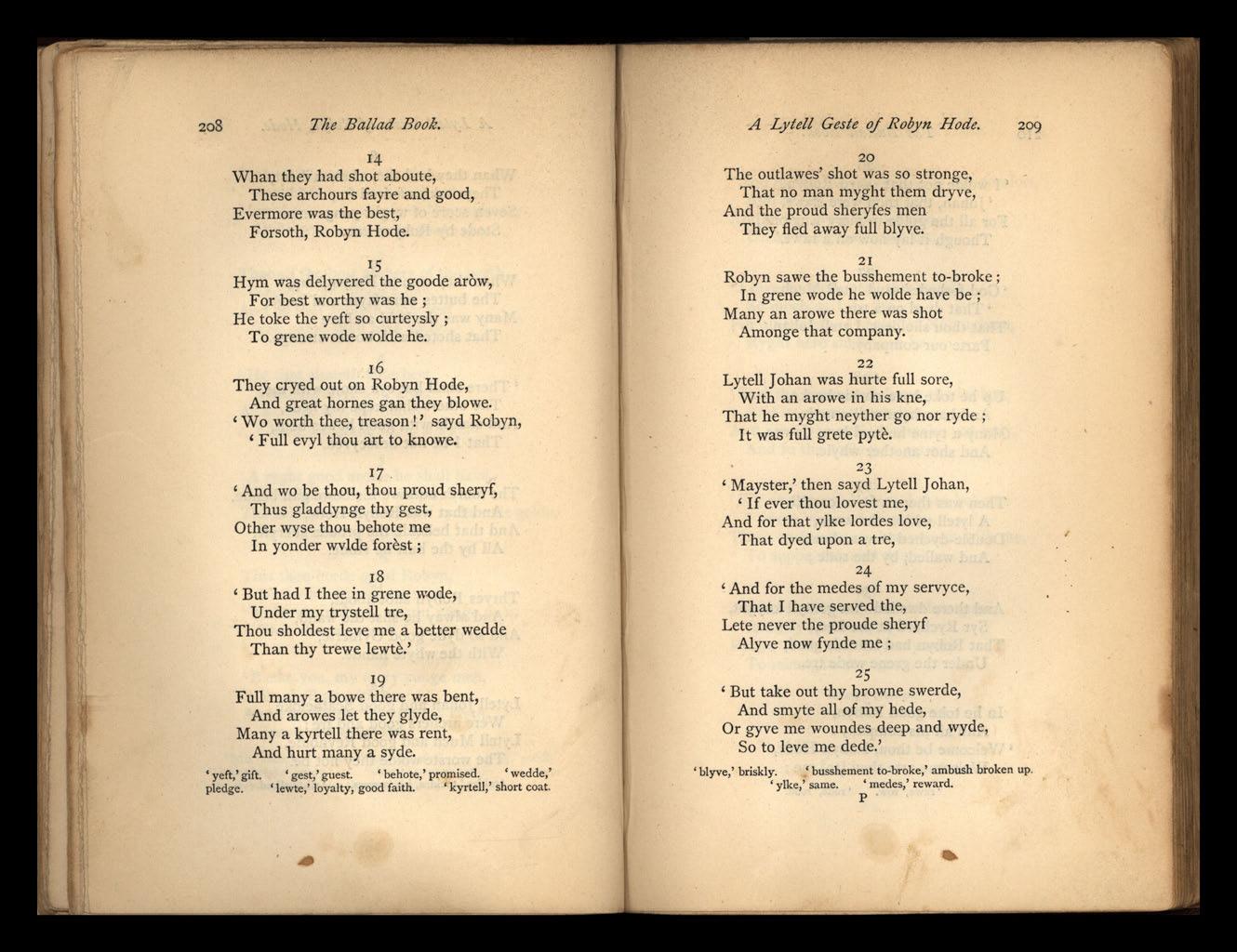
A Lytell Geste 0/ Robylt Hode.
20
The outlawes' shot was so stronge, That no man myght them dryve, And the proud sheryfes men They fled away full blyve.
21
Robyn sawe the busshement to-broke ; In grene wo de he wolde have be ; Many an arowe there was shot Amonge that company.
22
Lytell Johan was hurte full sore, With an arowe in his kne, That he myght neyther go nor ryde ; I t was full grete pyte.
23
, Mayster,' then sayd Lytell J ohan, , If ever thou lovest me, And for that ylke lordes love, That dyed upon a tre,
24
, And for the me des of my servyce, That I have served the, Lete never the proude sheryf AIyve now fynde me ;
25
, But take out thy browne swerde, And smyte all of my hede, Or gyve me woundes deep and wyde, So to leve me dede.'
'blyve,' briskly. 'busshement to-broke,' ambush broken up . , ylke,' same. medes,' reward. p
210 The Ballad Book.
26
, I wolde not that,' sayd Robyn, , J oh an, that thou were slawe, For all the golde in mery Englond, Though it lay now on a rawe.'
27
, God forbede,' sayd lytell Much, 'That dyed on a tre, That thou sholdest, Lytell Johan, Parte our company.'
28
Up he toke hym on his backe, And bare hym well a myle, Many a tyme he layd hym downe, And shot another why le.
29
Then was there a fayre castell, A lytell within the wode, Double-dyched it was about, And walled, by the rode;
30
And there dwelled that gentyll knyght, Syr Rychard at the Lee, That Robyn had lent his good, Under the grene wode tre.
3 1
In he toke good Robyn, And all his company: 'Welcome be thou, Robyn Rode, Welcome arte thou [to] me; , rawe,' row. .. , rode,' rood.
A Lytell Geste of Robyn Hode. 2II
3 2
, And moche [I] thanke the of thy comfort, And of thy curteysye, And of thy grete kyndenesse, Under the grene wo de tre. .
33
, I love no man in all this worlde So moch as I do the; For all the proud sheryf of Notyngham, Ryght here shalt thou be.
34
, Shet the gates, and drawe the bridge, And let no man corn in ; And arme you well, and make you redy, And to the walle ye wynne.
35
, For one thyng, Robyn, I thee behote : I sw ere by saynt Quyntyn, These twelve dayes thou wonest with me, To suppe, ete, and dyne.'
36
Bordes were layed, and clothes spred, Reddely and anone ; Robyn Rode and his mery men To mete gan they gone.
, behote,' promise.
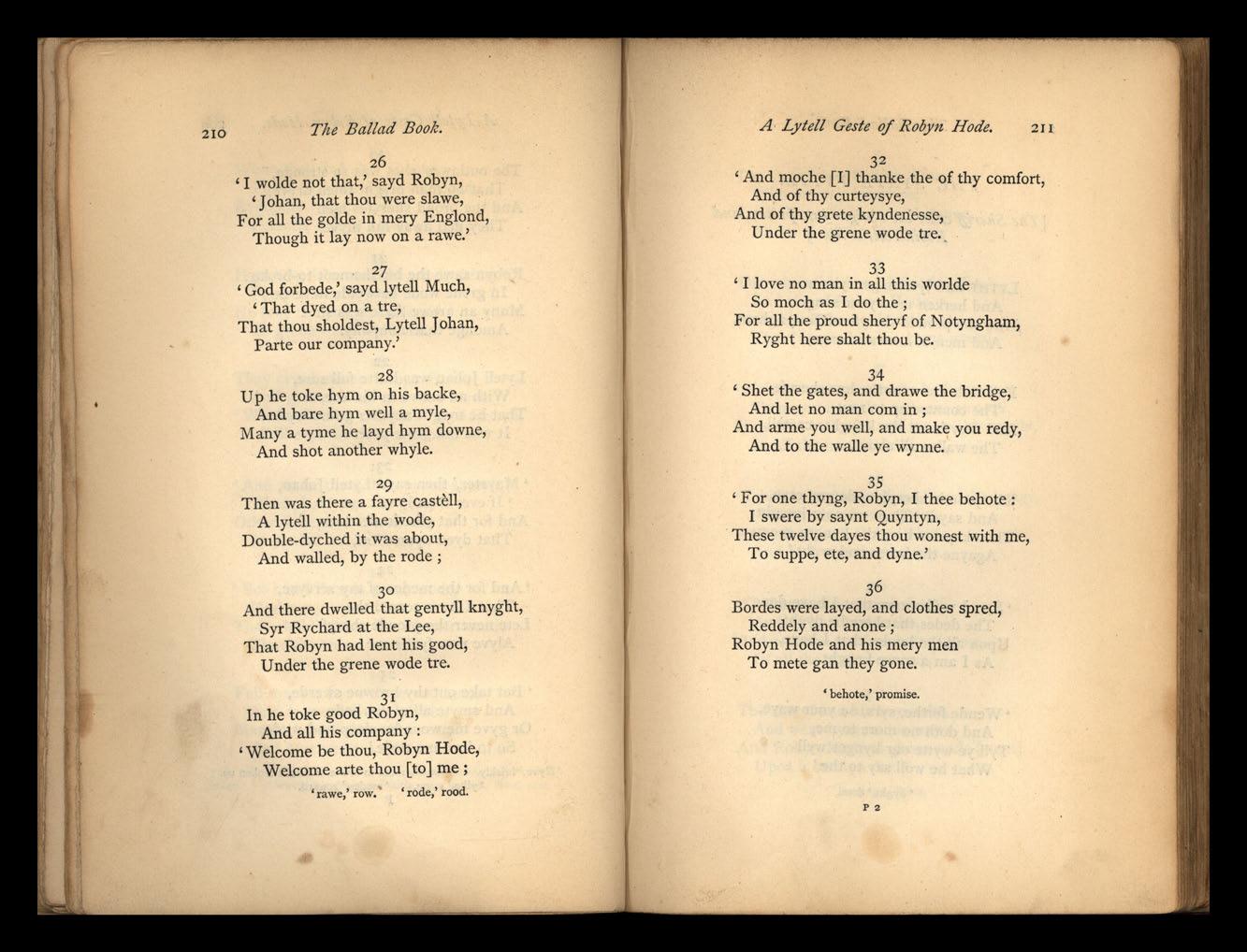
P 2
The Ballad Book.
2I2

THE SYXTE FYTTE.
[The SlteriJ! casts tlte Klligltt into prisoll, and Robin resczees /tim.]
I
LYTHE and lysten, gentylmen, And herken unto your songe ; How the proude sheryfe of N otyngham , And men of armes stronge,
2
Full faste came to the hye sheryfe, The countre up to rout, And they beset the knyghts castell, The walles all about.
3
The proude sheryf Iou de gan crye, And sayd, ' Thou tray tour knyght, Thou kepeste here the kynges enemye, Agayne the lawes and ryght.'
4
, Syr, I wyll avowe that I have done The dedes that here be dyght, Upon all the londes that I have, As I am a trewe knyght.
5
'Wende forthe, syrs, on your waye, And doth no more to me, Tyll ye wytte our kynges wyll What he woll say to the.' , dyght,' don e.
A Lytell Geste of RobY't Hode.
6
The sheref thus had his answere, With out ony leasynge, F orthe he yode to London toune, All for to tel our kynge.
7
There he tolde him of that knyght, And eke of Robyn Hode, And also of the bolde archeres, That [wonned in the grene wode].
8
, He wolde avowe that he had done, To mayntayne the outlawes stronge,
He wolde be lorde, and set you at nought, In all the north londe.'
9
, I woll be at Notyngham,' sayd the kynge, , Within this fourtynyght, And take I wyll Robyn Hode, And so I wyll that knyght.
10
, Go home, thou proud sheryf, And do as I bydde the, And ordayne good archeres inowe, Of all the wyde countree.'
II
The sheryf had his leve itake, And went hym on his way; And Robyn Hode to grene wode [went] Upon a certayn day; 'leasynge,' lying.
214
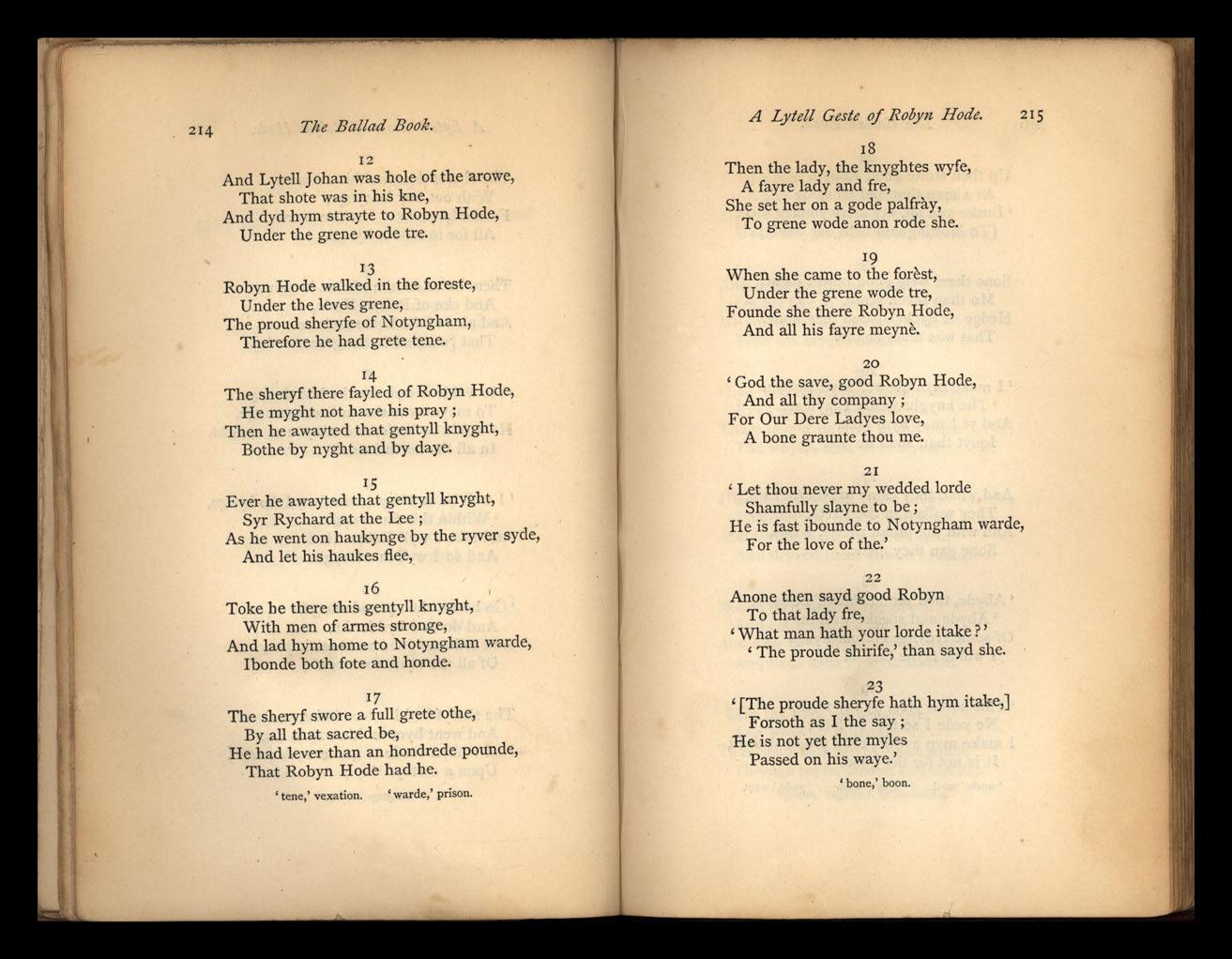
Tile Ballad Book.
12
And Lytell Joh an was hole of the arowe,
A Lytell Ceste of Robyll Hode. 21 5
18
Then the lady, the knyghtes wyfe, That shote was in his kne,
A fayre lady and fre, And dyd hym strayte to Robyn Rode, She set her on a gode palfray, Under the grene wode tre.
To grene wode anon rode she.
19
13
Robyn Rode walked in the foreste,
When she came to the forest, Under the leves grene, Under the grene wode tre, The proud sheryfe of N otyngham, Founde she there Robyn Rode, Therefore he had grete tene. And all his fayre meyne.
20
14
The sheryf there fayled of Robyn Rode,
'God the save, good Robyn Rode, Re myght not have his pray; And all thy company; Then he awayted that gentyll knyght,
For Our Dere Ladyes love, Bothe by nyght and by daye.
15
Ever he awayted that gentyll knyght,
A bone graunte thou me.
21
' Let thou never my wedded lorde Syr Rychard at the Lee; Shamfully slayne to be; As he went on haukynge by the ryver syde,
Re is fast ibounde to N otyngham warde, And let his haukes flee, F or the love of the.'
22
16
Toke he there this gentyll knyght,
Anone then sayd good Robyn With men of armes strange, To that lady fre, And lad hym home to N otyngham warde,
'What man hath your lorde itake ? ' Ibonde both fote and honde.
' The proude shirife,' than sayd she.
23
17
The sheryf swore a full grete othe,
' [The proude sheryfe hath hym itake,] By all that sacred be, Forsoth as I the say; Re had lever than an hondrede pounde, He is not yet thre myles That Robyn Rode had he. Passed on his waye.' 'tene,' vexation . C warde,' prison. ' bone,' boon.
Tile Ballad Book.
24
Up then sterte good Robyn, As a man that had be wode : , Buske you all, my mery younge men, [To Nottingham lieth our road.']
25
Sone there were good bowes ibent, Mo than seven score, Hedge ne dyche spared they none, That was them before.
26
, I make myn avowe,' sayd Robyn, , The knyght wolde I fayn se, And yf I may hym take, Iquyt than shall he bee.'
27
And whan they came to N otyngham, They walked in the strete, And with the proud sheryf, I wys, Sone gan they mete.
28
, Abyde, thou proud sheryf,' he sayd, , Abyde and speake with me ; Of some tydynges of our kynge I wolde fayne here of the.
29
, This seven yere, by my troth, Ne yede I so fast on fote : I make myn avowe, thou proud sheryfe, It is not for thy good.'
, wade, mad. ' iquyt,' quit. yede,' went .
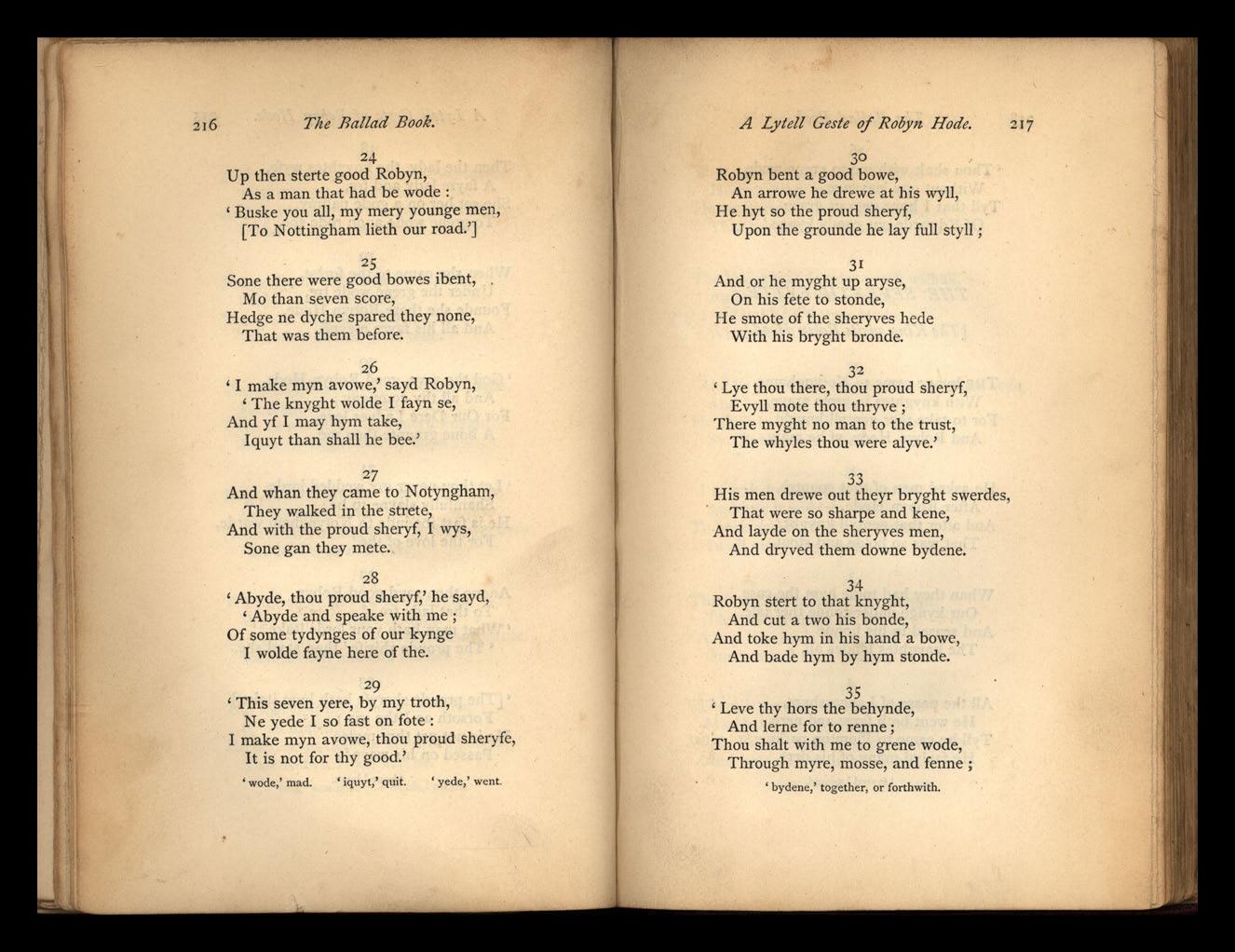
A Lytell Geste of Robyn Hode.
30
Robyn bent a good bowe, An arrowe he drewe at his wyll, He hyt so the proud sheryf, Upon the grounde he lay full styli ;
3 1
And or he myght up aryse, On his fete to stonde, He smote of the sheryves hede With his bryght bronde.
32
, Lye thou there, thou proud sheryf, Evyll mote thou thryve ; There myght no man to the trust, The whyles thou were alyve.'
33
His men drewe out theyr bryght swerdes, That were so sharpe and kene, And layde on the sheryves men, And dryved them downe bydene.
34
Robyn stert to that knyght, And cut a two his bonde, And toke hym in his hand a bowe, And bade hym by hym stonde.
35
, Leve thy hors the behynde, And lerne for to renne; Thou shalt with me to grene wode, Through myre, mosse, and fenne ; 'bydene J ' together, or forthwith.
218
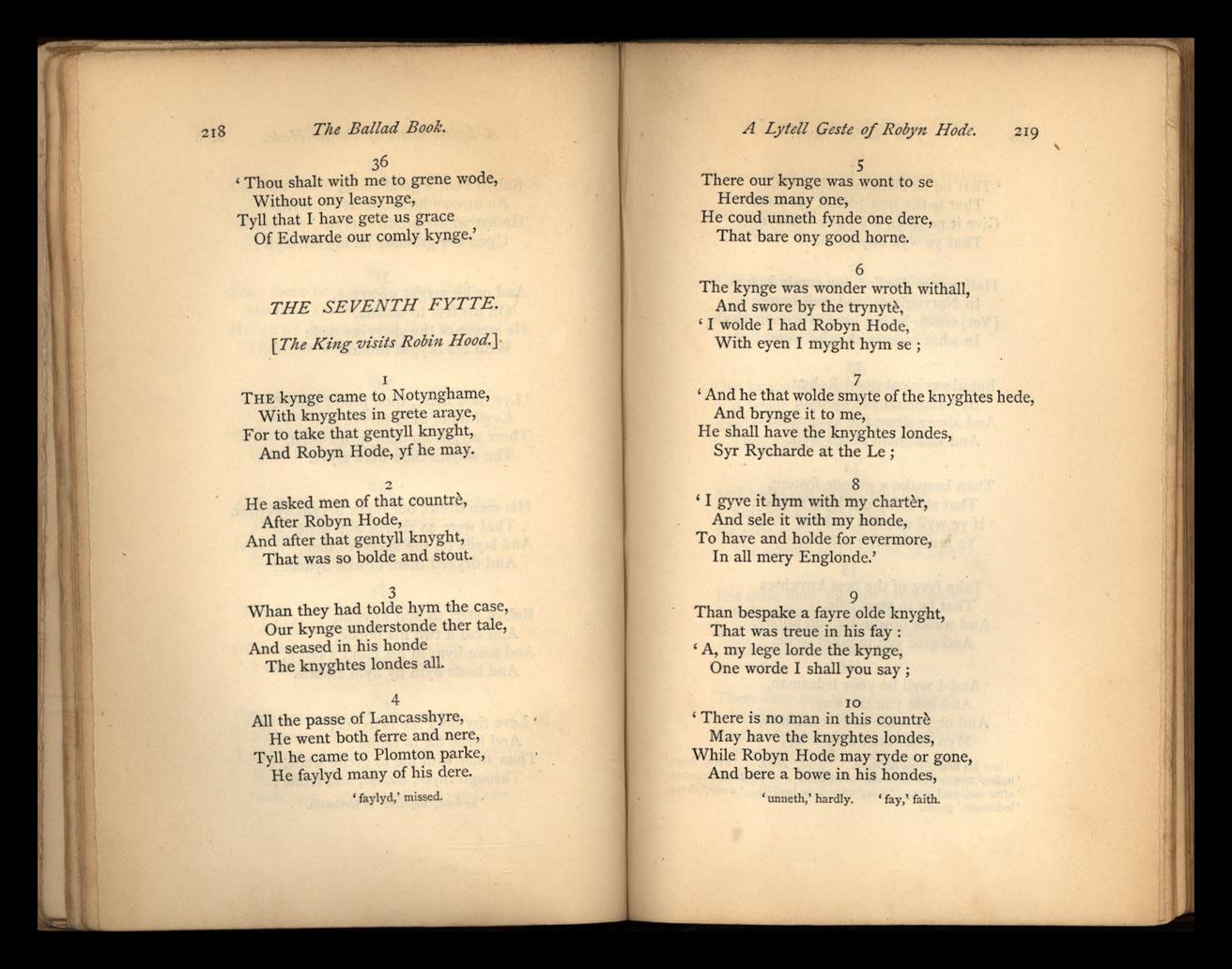
Tile Ballad Book.
36
, Thou shalt with me to grene wode, Without ony leasynge, Tyll that I have gete us grace Of Edwarde our comly kynge.'
THE SEVENTH FYTTE.
[Tile King visits Robi11 Hood.]-
1
THE kynge came to N otynghame, With knyghtes in grete araye, For to take that gentyll knyght, And Robyn Rode, yf he may.
2
Re asked men of that After Robyn Hode, And after that gentyll knyght, That was so bolde and stout.
3
Whan they had tolde hym the case, Our kynge understonde ther tale, And seased in his honde The knyghtes londes all.
4
All the passe of Lancasshyre, He went both ferre and nere, Tyll he came to Plomton parke, Re faylyd many of his dere. • faylyd,' misse d.
A Lytell Gute of RobY1t Hode.
5
There our kynge was wont to se Herdes many one, He coud unneth fynde one dere, That bare ony good home.
6
The kynge was wonder wroth withall, And swore by the , I wolde I had Robyn Hod e, With eyen I myght hym se ;
7
, And he that wolde smyte of the knyghtes hede, And brynge it to me, He shall have the knyghtes londes, Syr Rycharde at the Le ;
8
, I gyve it hym with my charter, And sele it with my honde, To have and holde for evermore, In all mery Englonde.'
9
Than bespake a fayre olde knyght, That was treue in his fay: , A, my lege lorde the kynge, One worde I shall you say;
10
, There is no man in this May have the knyghtes londes, While Robyn Hode may ryde or gone, And bere a bowe in his hondes, 'unlleth , ' hardly. C {ay," faith.
220 The Ballad Book.
II
, That he ne shalllese his hede, That is the best ball in his hode : Give it no man, my lorde the kynge, That ye wyll any good.'
12
Half a yere dwelled our comly kynge In N otyngham, and well more; [Yet] coude he not here of Robyn Hode l In what countre that he were;
13
But alway went good Robyn By halke and eke by hyIl, And alway slewe the kynges dere, And welt them at his wyll.
14
Than bespake a proude fostere, That stode by our kynges kne : , If ye wyll se good Robyn, Ye must do after me.
15
, Take fyve of the best knyghtes
That be in your lede, And walke downe by yon abbay, And gete you monkes wede.
16
, And . I wyll be your ledesman, And lede you the way, And or ye come to N otyngham, Myn pede then dare I lay, - 'lese his hede,' lose his head. C hode,' hood. «here,' hear. halke,' corner (1) 'welt,' overthrew. '(ostere,' forester. 'after me,' as I say. 'lede,' train (1) or land (1) 'wede,' dress . , ledesman,' guide.

A Lytell Ceste of Robyn Hode.
17
, That ye shall mete with good Robyn, On lyve yf that he be, Or ye come to N otyngham, With eyen ye shall hym se.'
18
Full hastly our kynge was dyght, So were his knyghtes fyve, Everych of them in monkes wede, And hasted them thyder blyth.
19
Our kynge was grete above his cole, A brode hat on his crowne, Ryght as he were abbot-Iyke, They rode up in-to the towne.
20
Styf botes our kynge had on, Forsoth as I you say, He rode syngynge to grene wode, The covent was clothed in graye,
21
His male hors, and his grete somers, Folowed our kynge behynde, TyIl they came to grene wode, A myle under the lynd(!,
22
There they met with good Robyn, Stondynge on the waye, And so dyde many a bo l de archere, For soth as I 'You say.
'cole,' neck (?) or cowl (1) 'male hors,' baggage-horse. ' sa rners,' sumpt ers. 'lynde,' trees (lindens ).
222 The Ballad Book.
23
Robyn toke the kynges hors Hastely in that stede, And sayd, ' Syr abbot, by your leve, A whyle ye must abyde ;
24
'We be yemen of this foreste, Under the grene wode tre, 'Ve lyve by our kynges dere, Other shyft have not we ;
2S
, And ye have chyrches and rentes both, And gold full grete plente ; Gyve us some of your spendynge, For saynt Charyte.'
26
Than bespake our cumly kynge, Anone than sayd he, , I brought no more to grene wode But forty pounde with me.
27
'I have layne at Notyngham
This fourtynyght with our kynge, And spent I have full moche good, On many a grete lordynge ;
28
, And I have but forty pounde, No more than have I me, But yf I had an hondred pounde, I would it to the.'

A Lytell Geste of Robytt Hode.
29
Robyn toke the forty pounde, And departed it in two partye, Halfendell he gave his mery men, And bad them mery to be.
30
Full curteysly Robyn gan say, , Syr, have this for your spendyng, We shall mete a nother day.'
, Gramercy,' than sayd our kynge ;
3 1 --,)
, But well the greteth Edwarde our kynge, And sent to the his seale, And byddeth the corn to N otyngham, Both to mete and mele.'
3 2
He toke out the brode tarpe, And sone he lete hym se ; Robyn coud his courteysy, And set hym on his kne :
33
, I love no man in all the worlde So well as I do my kynge. Welcome is my lordes seale; And, monke, for thy tydynge.
34
, Syr abbot, for thy tydynges, To day thou shalt dyne with me For the love of my kynge Under my trystell tre.'
• !arpe,' (1)
224 TIle Ballad Book.
35
Forth he lad our comly kynge, Full fayre by the honde, Many a dere there was slayne, And full fast dyghtande.
3 6
Robyn toke a full grete home, And loude he gan blowe : Seven score of wyght yonge men Came redy on a rowe,
37
All they kneeled on theyr kne, Full fayre before Robyn. The kynge sayd hymselfe untyll, And swore by saynt Austyn,
38
, Here is a wonder semely syght ; Me thynketh by this sign, His men are more at his byddynge, Then my men be at myn.'
39
Full hastly was theyr dyner idyght, And therto gan they gone, They served our kynge with al theyr myght, Both Robyn and Lytell Johan.
40
Anone before our kynge was set
The fatte venyson, The good whyte brede, the good red wyne, And therto the fyne ale browne. dyghtande,' readied. ' wyght,' active.
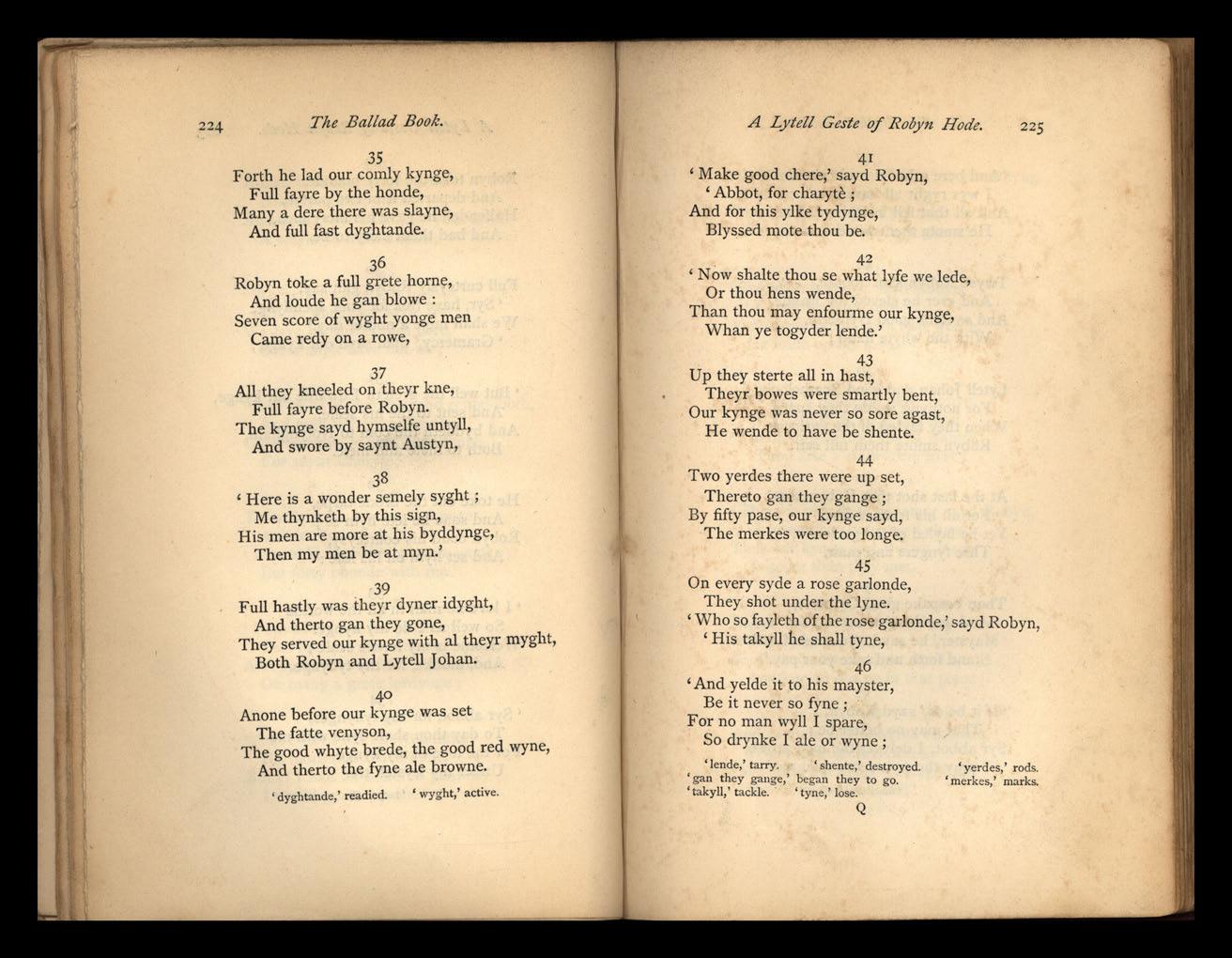
A Lytell Geste of Robyn Hode.
41
, Make good chere,' sayd Robyn, , Abbot, for charyte ; And for this ylke tydynge, Blyssed mote thou be.
42
, Now shalte thou se what lyfe we lede, Or thou hens wende, Than thou may enfourme our kynge, Whan ye togyder lende.'
43
Up they sterte all in hast, Theyr bowes were smartly bent, Our kynge was never so sore agast, He wende to have be shente.
44
Two yerdes there were up set, Thereto gan they gange ; By fifty pase, our kynge sayd, The merkes were too longe.
45
On every syde a rose garlon.de, They shot under the lyne.
'Who so fayleth of the rose garlond e,' sayd Robyn, , His takyll he shall tyne,
46
'And yelde it to his mayster, Be it never so fyne ; For no man wyll I spare, So drynke I ale or wyne ;
{lende/ tarry. 'shente,' destroyed. 'yerdes,' rods . gan they gauge,' be ga n they to go. mcrk es,' marks. 'takyll,' tackle. tyn e,' lose.
The Ballad B ook.
47
, And bere a buffet on his hede, I wys ryght all bare.'
And all that fell in Robyn's lote, He smote them wonder sare.
48
Twyse Robyn shot aboute, And ever he c1eved the wande, And so dyde good Gylbert e, With the whyte hand;
49
Lytell Johan and good Scathelocke, For nothyng wolde they spare, When they fayled of the garlonde, Robyn smote them full sair.
50
At the last shot that Robyn shot , For all his frendes fare, Yet he fayled of the garlond e, Thre fyngers and mair.
51
Than bespake good Gylberte, And thus he gan say: he sayd, 'your taJ....yll is lost, Stand forth and take your pay.'
52
, If it be so,' sayd Robyn, 'That may no better be ; Syr abbot, I delyver the myn arowe, I pray the, syr, serve thou me.' •fare,' boast (1)
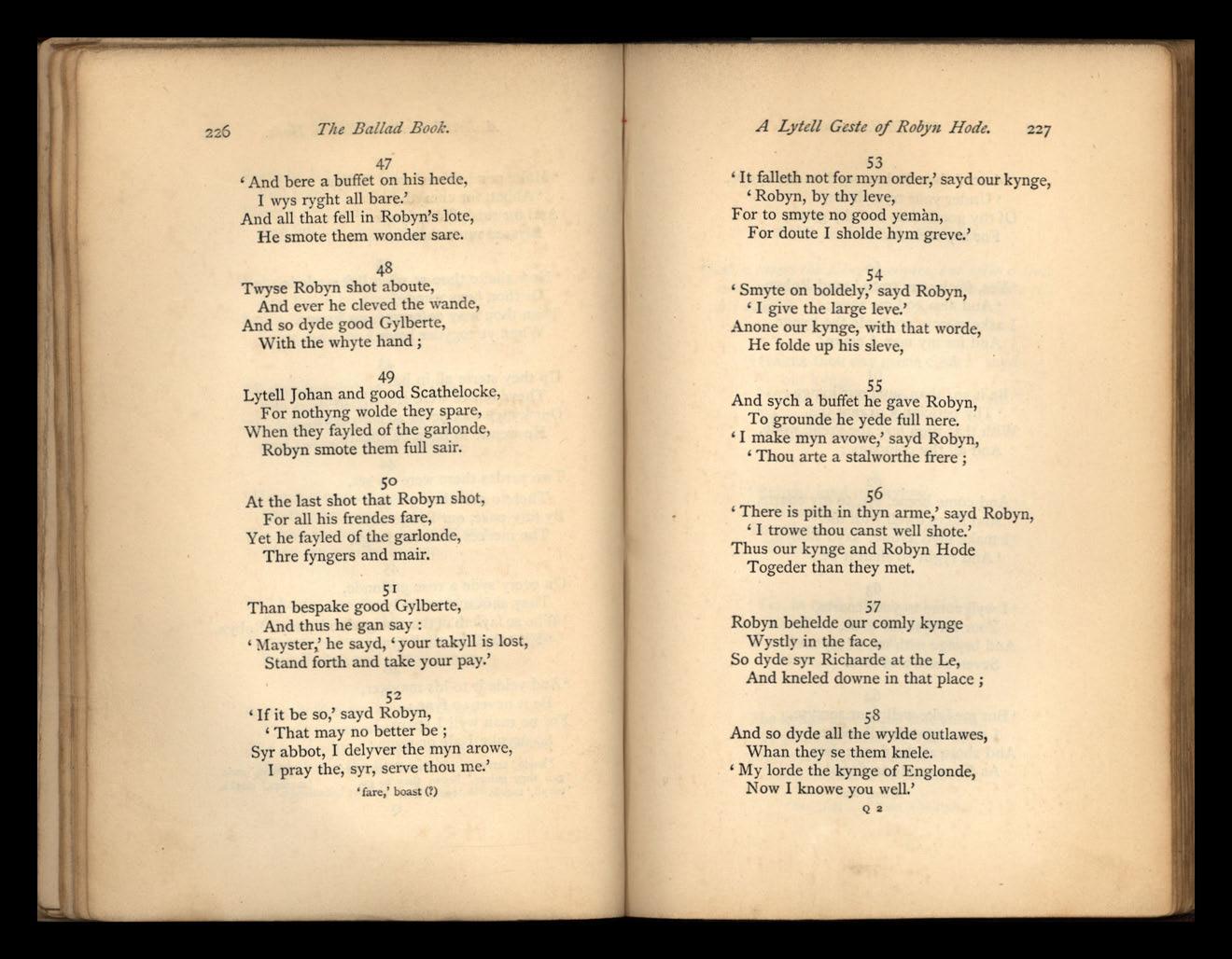
A Lytelt Ceste of Robpl H ode. 227
53
, It falleth not for myn order,' sayd our kynge, 'Robyn, by thy Ieve, For to smyte no good yemlm, For doute I sholde hym greve.'
54
, Smyte on boldely,' sayd Robyn, , I give the large leve.'
Anone our kynge, with that worde, He folde up his sIeve,
55
And sych a buffet he gave Robyn, To grounde he yede full nere.
, I make myn avowe,' sayd Robyn, , Thou arte a stalworthe frere ;
56
, There is pith in thyn arme,' sayd Robyn, , I trowe thou canst well shote.'
Thus our kynge and Robyn Hode Togeder than they met.
57
Robyn behelde our cornly kynge Wystly in the face, So dyde syr Richarde at the Le, And kneled downe in that place;
58
And so dyde all the wylde outlawes, Whan they se them knele.
'My Iorde the kynge of Englonde, Now I knowe you well.'
Q •
TIle Ballad Book.
59
, Mercy,' then Robyn sayd to our kynge, , Under your trystyll tre, Of thy goodnesse and thy grace, For my men and me !
60
'Yes, for by my troth,' sayd Robyn, 'And also god me save; I aske mercy, my lorde the kynge, And for my men I crave.'
61
, Be it so,' than sayd our kynge ; , Thy peticion I graunt the, \Vith that thou leve the grene wode, And all thy company;
62
, And come home, syr, to my courte, And there dwell with me.'
'I make myn avowe,' sayd Robyn, , And ryght so shall it be ;
63
, I wyll come to your courte, Your servyse for to se, And brynge with me of my men Seven score and thre.
64
'But me lyke well your servyse, I tome agayne full soone, And shote at the donne de re, As I am wonte to done.' , donoe,' dun.

THE EIGHTH FYTTE.
[Robin enters tIle King's service, but after a tim e returns to tIle greenwood, where lie abides till ltis deatlt.]
I
'HASTE thou ony grene cloth?' sayd our kynge, 'That thou wylte sell nowe to me? '
'Ye, in troth,' sayd Robyn, • Thyrty yerdes and thre.
2
, Robyn,' sayd our kynge, 'Now pray I the To sell me some of that cloth, To me and my meyne.'
3
'Yes, in troth,' then sayd Robyn, , Or elles I were a foie; A nother day ye wyll me clothe, I trowe, ayenst the Yole.'
4
The kynge kest of his cote then, A grene garment he dyde on, And every knyght had so, I wys, They clothed them full soone.
, foI e,' fool. 'Yole,' Christmas.
23 0 TIle Ballad Book.
5
Whan they were clothed in Lyncolne grene, They kest away theyr graye. , Now we shall to N otyngham,' All thus our kynge gan say.
6
Theyr bowes bente and forth they went, 5hotynge all in-fere, Towarde the towne of Notyngham, Outlawes as they were.
7
Our kynge and Robyn rode togyder, For soth as I you say, And they shote plucke-buffet, As they went by the way;
8
And many a buffet our kynge wan Of Robyn Hode that day: And nothynge spared good Robyn Our kynge in his pay.
9
, So heaven me helpe,' sayd our kynge, , Thy game is nought to lere ; I sholde not get a shote of the, Though I shote all this yere.'
10
All the people of N otyngham They stode and behelde ; They sawe nothynge but mantels of grene, They covered all the felde ; as,' as if. wan,' rece ive d. 'n oug ht to lere,' nowise to learn .
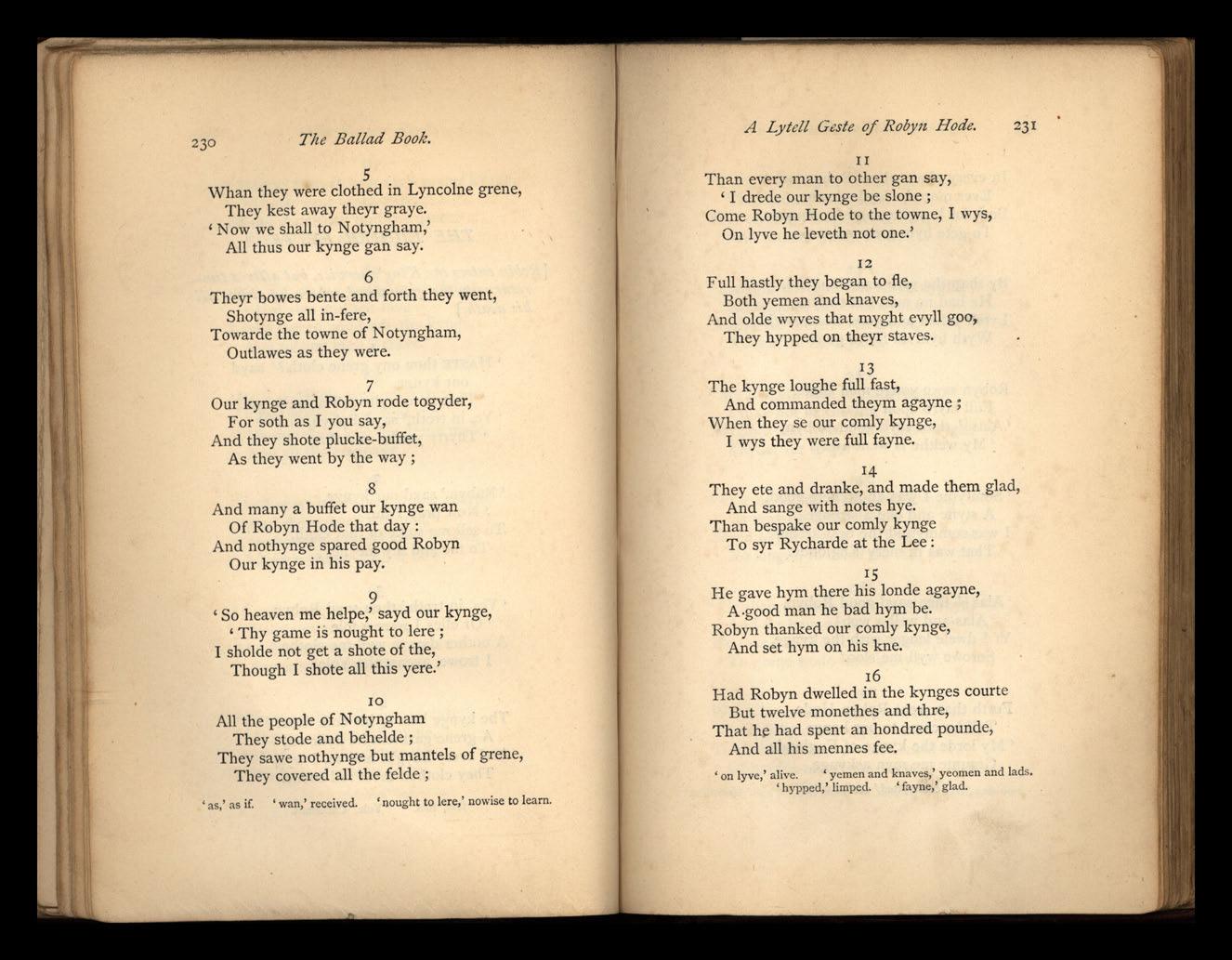
A Lytell Geste of RobYIl Hode. II
Than every man to other gan say , I drede our kynge be slone; , Come Robyn Hode to the towne, I wys, On lyve he leveth not one.'
12
Full hastly they began to fie, Both yemen and knaves, And olde wyves that myght evyll goo, They hypped on theyr staves.
13
The kynge loughe full fast, And commanded theym agayne ; When they se our comly kynge, I wys they were full fayne.
14 23 1
They ete and dranke, and made them glad , And sange with notes hye. Than bespake our comly kynge
To syr Rycharde at the Lee:
15
He gave hym there his londe agayne, A.good man he bad hym be. Robyn thanked our comly kynge, And set hym on his kne.
16
Had Robyn dwelled in the kynges courte
But twelve monethes and thre, That had spent an hondred pounde, And all his mennes fee.
' on lyve,' alive. y e me n and kn aves,' y eo men and lads. hyppe d, ' limpe d. 'fa y ne,' g lad.
23 2 Tlte Ballad Book.
17
In every place where Robyn came, Ever more he layde downe, Both for knyghtes and for squyres, To gete hym grete renowne.
18
By than the yere was all ago ne, He had no man but twayne, Lytell Johan and good Scathelocke, Wyth hym all for to gone.
19
Robyn sawe yonge men shote, Full fayre upon a day:
, Alas!' than sayd good Robyn, 'My welthe is went away.
20
, Somtyme I was an archere good, A styffe and eke a stronge ; I was commytted the best archere That was in mery Englonde.
21
, Alas!' then sayd good Robyn, , Alas and well a woo!
Yf I dwele lenger with the kynge, Sorowe wyll me 5100.'
22
Forth than went Robyn Hode, Tyll he came to our kynge : • , My lorde the kynge of Englonde, Graunte me myn askynge. , commytted,' settled to be.
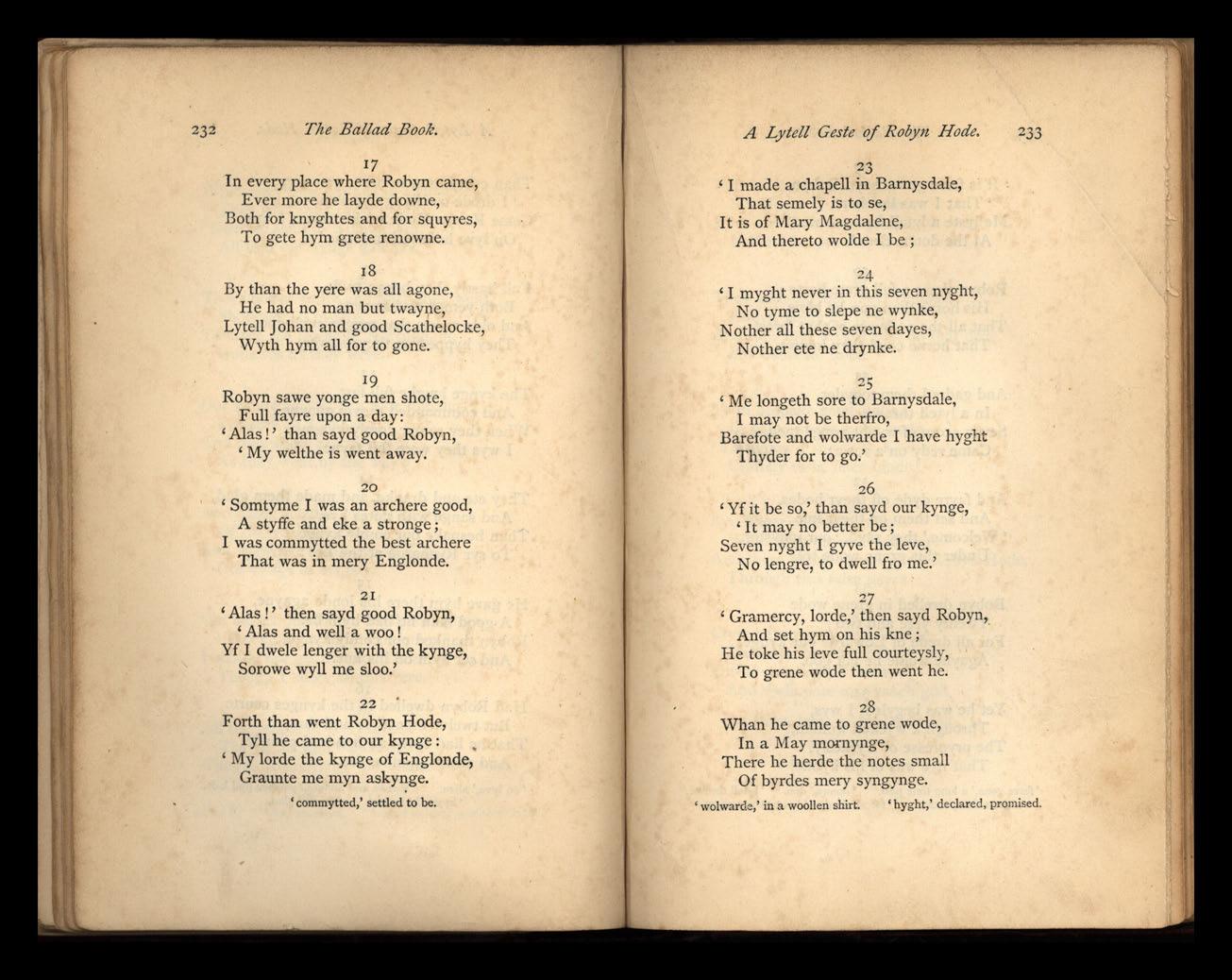
A Lytell Geste of Robyn Hode.
23 , I made a chapell in Barnysdale, That semely is to se, I t is of Mary Magdalene, And thereto wolde I be ;
24
, I myght never in this seven nyght, No tyme to slepe ne wynke, Nother all these seven dayes, N other ete ne drynke.
25
, Me longeth sore to Barnysdale, I may not be therfro, Barefote and wolwarde I have hyght Thyder for to go.'
26
'Yf it be so,' than sayd our kynge, 'It may no better be; Seven nyght I gyve the leve, No lengre, to dwell fro me.'
27
, Gramercy, lorde,' then sayd Robyn,. And set hym on his kne ; He toke his leve full courteysly, To grene wo de then went he.
28
Whan he came to grene wode, In a May momynge, There he herde the notes small Of byrdes mery syngynge.
' wolwarde, ' in a woollen shirt. 'hyght, declared, promised.
234 The Ballad Book.
29
J It is ferre gone,' sayd Robyn, , That I was last here, Me Iyste a lytell for to shot e At the donne dere.'
30
Robyn slewe a full gret e harte ; His home than g an he blow, That all the ou flaw es of that forest That home coud they knowe,
3 1
And gadred them togyder, I n a Iytell throwe,
Seven scor e of wy ght yonge men, Came redy on a rowe ;
32
And fayre dyde off theyr hodes, And set th em on theyr kne : 'Welcome,' they sa yd, 'our may st er, Und er this grene wode tre.'
33
Robyn dw ell ed in gre ne wod e Twenty yer e and two ; For a ll dr ed e of Edwa rd e our kynge, Ag ayne wolde he not g oo.
34
Yet he was b egyl ed , I wys, Throu gh a wy ck e d woman, The pryoresse of Kyrkesly, Th a t nye was of his kynn e, ferre gone,' a long t im e pas t. ' danne, ' .'l y tell a. sho rt time, soon. ' fo r all drede of, no twlthstandmg.
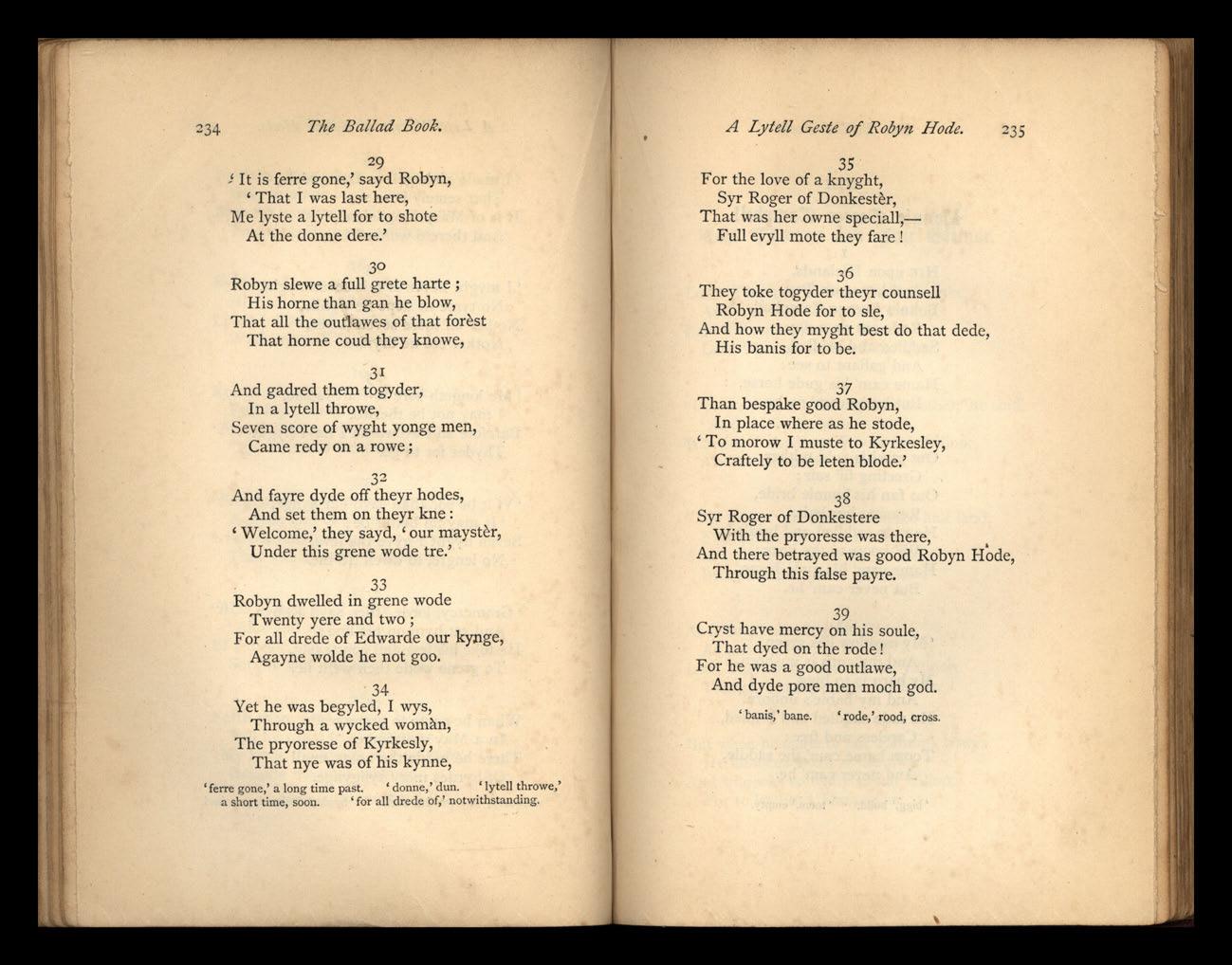
A Lytell Geste of Robyn Hode.
35
For th e love of a knyg ht, Syr Roger of Donkester, That wa s her owne speciall,Full evyll mote they far e!
36
They toke togyder theyr counsell Robyn Hode for to sle, And how th ey myg ht best do th a t ded e, His banis for to be.
37
Than bespake good Robyn, In place where as he stode, , To morow I muste to Kyrkesley, Craftely to be leten blod e.'
38
Syr Roger of Donkestere
With the pryoresse was there, • And there betrayed was good Robyn Hod e, Through this false payre.
39
Cryst have mercy on his soule, Th a t dyed on the rod e !
For h e was a g ood outlawe, And dyde pore men moch god.
, bani s, bane. ' rode, ' rood, cr oss.
Tile Ballad Book.
HIE upon Hielands, And low upon Tay, Bonnie George Campbell Rode out on a day; Saddled and bridled, And gallant to see:
Hame cam' his gude horse, But hame cam' na he.
2
Out ran his auld mither, Greeting fu' sair; Out fan his bonnie bride, Reaving her hair. He rade saddled and bridled, Wi' boots to the knee: Hame cam' his gude horse, But never cam' he.
3
'My meadow lies green, And my corn is unshorn, My barn is to bigg, And my babie's unborn.' He rade saddled and bridled, Careless and free: Toom hame cam' the saddle, And never cam' he. 'bigg/ build. 'toom,' empty.

LORD ' THOMAS he was a bold forester, And a chaser of the king's deer ; Fair Ellinor was a fine woman, Lord Thomas he loved her dear.
2
, Come riddle my riddle, dear mother,' he said, , And riddle for both in one; Whether I shall marry with fair Ellinor, And let the brown girl alone ?'
3
, The brown girl she has houses and land, Fair Ellinor she has none, And I charge you, on my blessing, Bring me the brown girl home.'
4
As it befell on a high holiday, As many there are beside, Lord Thomas he went to fair Ellinor, Th at should have been his bride.
5
But when he came to fair Ellinor's bower He knocked there at the ring, And who was so ready as fair Ellinor For to let Lord Thomas in.
6
, What news? what news? Lord Thomas,' she said , , What news hast thou brought unto me ?' , I am come to bid thee to my wedding, And that is bad news for thee.'
7
'0 God forbid, Lord Thomas,' she said, , That such a thing should be done! I thought to have been thy bride my own self, And you to have been bridegroom.'
8
, Come riddle my riddle, dear mother,' she said , , And riddle it all in one; Whether I shall go to Lord Thomas's weddin g, Or whether I shall tarry at home ?'
9
, There's many that are your friend, daught er , But there's many that are your foe; And I charge you, on my blessing, To Lord Thomas's wedding don't go.'
10
'There's many that are my friend, mother, If a thousand more were my foe: Betide me life, betide me death, To Lord Thomas's wedding I'll go.'
I I
She clothed herself in gallant attire, And her merry men all in green, And as they rid through every town, They took her to be some queen.
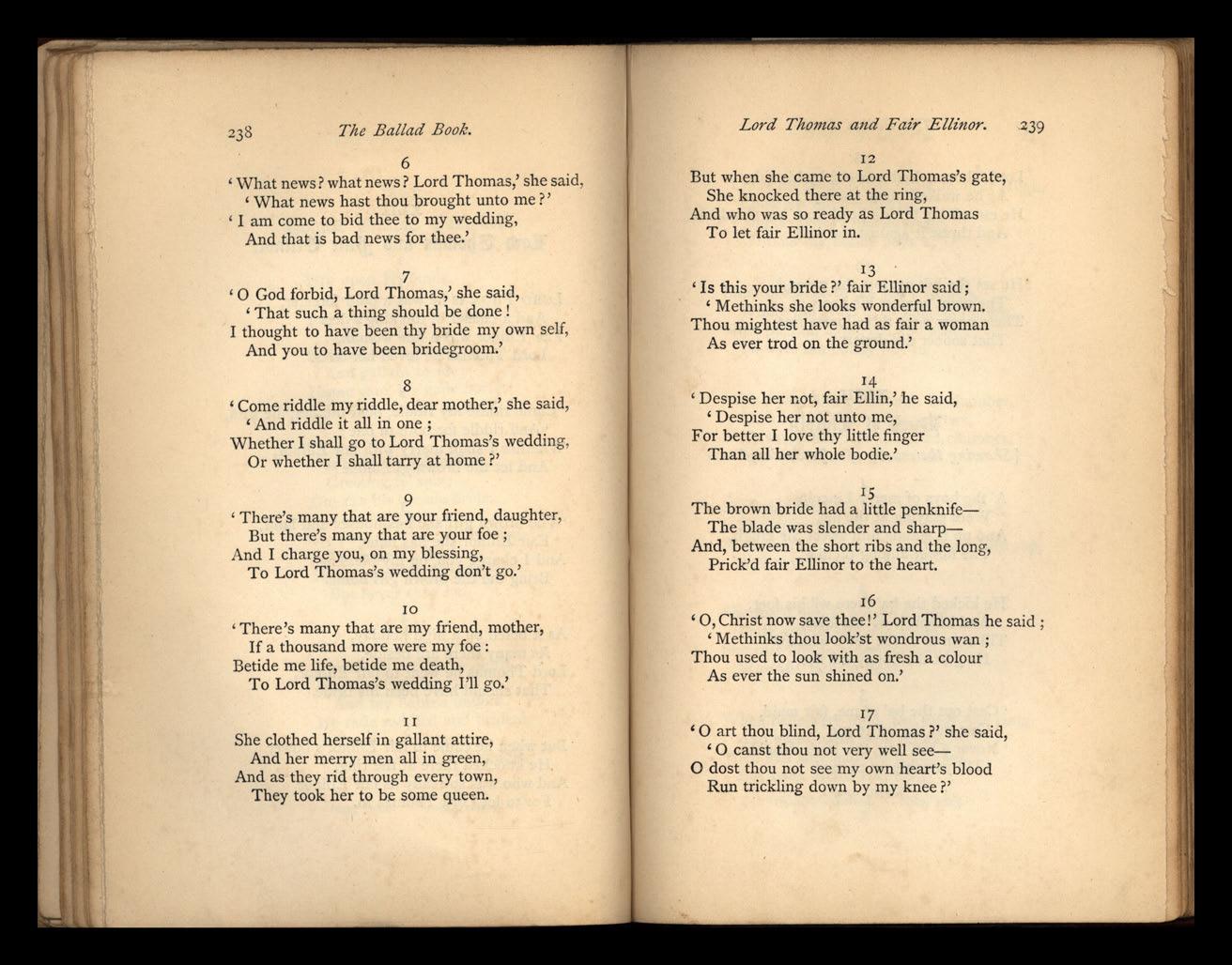
Lord TllOmas and Fair Ell£llor.
12
But when she came to Lord Thomas's gate, She knocked there at the ring, And who was so ready as Lord Thomas To let fair Ellinor in.
13
'Is this your bride?' fair Ellinor said; , Methinks she looks wonderful brown. Thou mightest have had as fair a woman As ever trod on the ground.'
14
, Despise her not, fair Ellin,' he said, , Despise her not unto me, For better I love thy little finger Than all her whole bodie.'
IS
The brown bride had a little penknifeThe blade was slender and sharpAnd, between the short ribs and the lon g Prick'd fair Ellinor to the heart. '
16
'0, Christ now save thee!' Lord Thomas he said· , Methinks thou look'st wondrous wan· ' Thou used to look with as fresh a colour' As ever the sun shined on.'
17
, 0 art thou blind, Lord Thomas?' she said, , 0 canst thou not very well seeo dost thou not see my own heart's blood Run trickling down by my knee ?'
Tlte Ballad Book.
18
Lord Thomas had a sword by his side, As he walked about the hall ; He cut off his bride's head from her shoulders, And threw it against the wall.
19
He set the hilt against the ground , The point against his heart: There never were three lovers met, That sooner did depart.
XLIII of 1Lincoln.
[Showing tlte cruelty of a 'Jew's dallgltter.]
I
A' the boys of merry Lincoln Were playing at the ba', And up it stands him sweet Sir Hugh, The flower among them a'.
"
He kicked the ba' there wi' his foot, And keppit it wi' his knee, Till even in at the Jew's window He gart the bonny ba' flee.
3
, Cast out the ba' to me, fair maid, Cast out the ba' to me.'
, Never a bit,' says the Jew's daughter, 'Till ye come up to me.'
'k eppit,' caug ht.
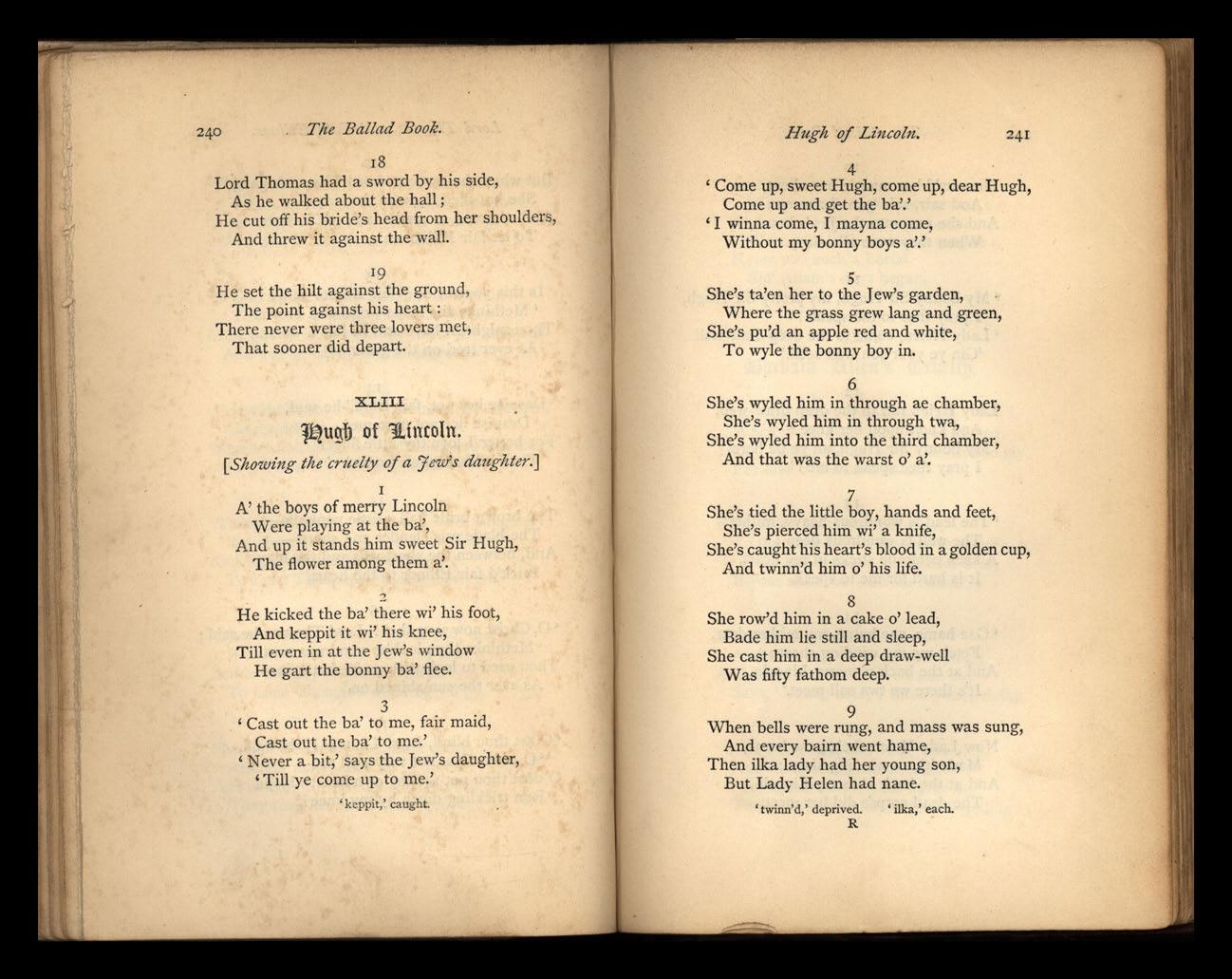
Huglt of Lincobt. 241
4
'Come up, sweet Hugh, come up, dear Hugh, Come up and get the ba'.'
, I winna come, I mayna come, Without my bonny boys a'.'
5
She's ta'en her to the Jew's garden, Where the grass grew lang and green, She's pu'd an apple red and white, To wyle the bonny boy in.
6
She's wyled him in through ae chamber, She's wyled him in through twa, She's wyled him into the third chamber, And that was the warst 0' a'.
7
She's tied the little boy, hands and feet, She's pierced him wi' a knife, She's caught his heart's blood in a golden cup, And twinn'd him 0' his life.
8
She row'd him in a cake 0' lead, Bade him lie still and sleep, She cast him in a deep draw-well Was fifty fathom deep.
9
When bells were rung, and mass was sung, And every bairn went ha)lle, Then ilka lady had her young son, But Lady Helen had nane. 'twinn'd,' deprived . 'ilka,' each. R
10
She row'd her mantle her about, And sair, sair 'gan she weep; And she ran unto the J ew's house, When they were all asleep.
11
My bonny Sir Hugh, my pretty Sir Hugh, I pray thee to me speak! '
, Lady Helen, come to the deep draw-well 'Gin ye your son wad seek.'
12
Lady Helen ran to the deep draw-well, And knelt upon her knee: 'My bonny Sir Hugh, an ye be here, I pray thee speak to me ! '
13
, The lead is wondrous heavy, mither, The well is wondrous deep ; A keen penknife sticks in my heart, It is hard for me to speak.
14
, Gae hame, gae hame, my mither dear, Fetch me my winding-sheet; And at the back 0' merry Lincoln, It's there we twa saIl meet.'
Now Lady Helen she's gane hame, Made him a winding-sheet; And at the back 0' merry Lincoln, The dead corpse did her meet.
Barbara AlIen's Cruelty.
16
And a' the bells 0' merry Lincoln Without men's hands were rung; And a' the books 0' merry Lincoln Were read without men's tongue: N ever was such a burial Sin' Adam's days begun.
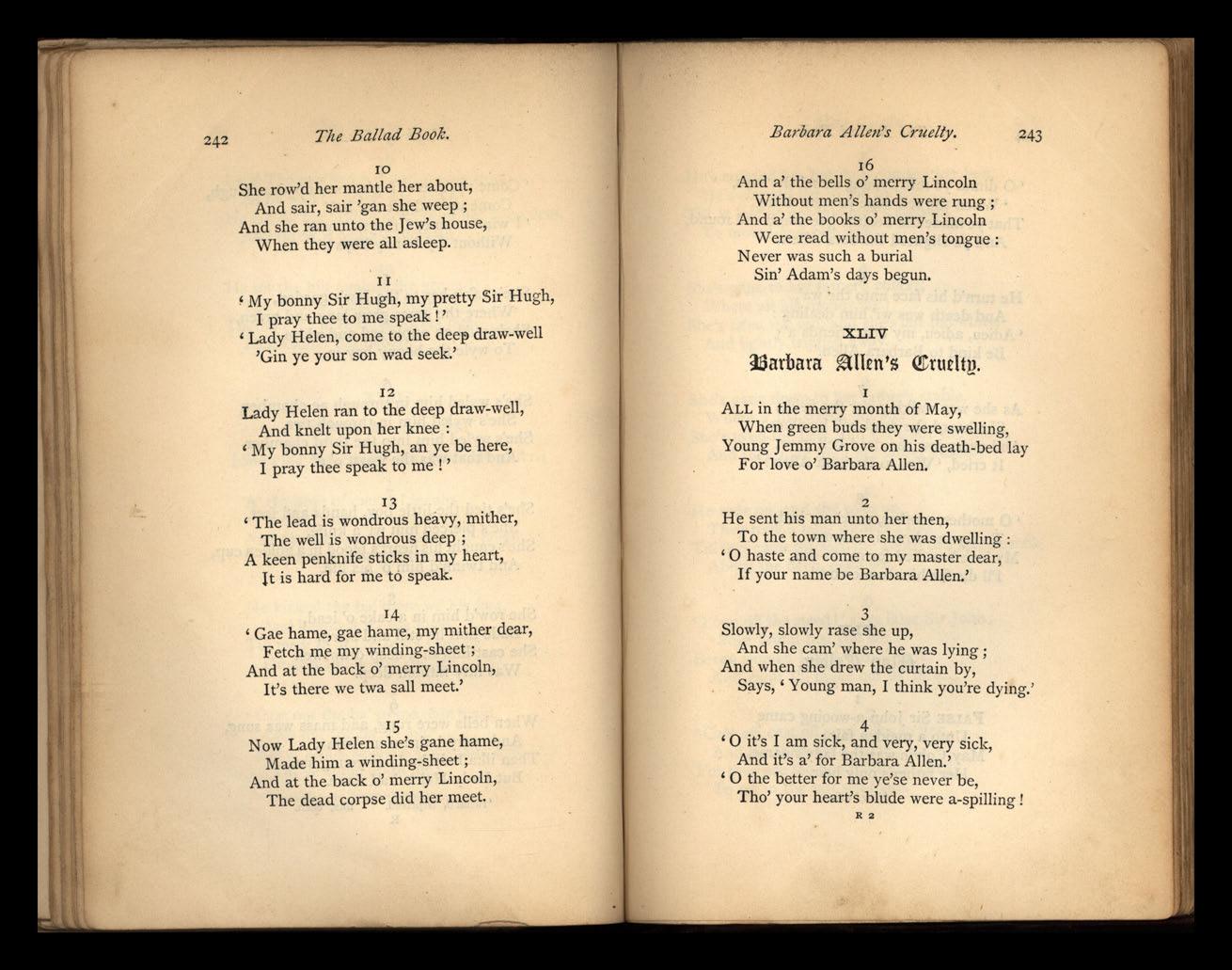
ALL in the merry month of May,
When green buds they were swelling, Young Jemmy Grove on his death-bed lay For love 0' Barbara AlIen.
2
He sent his man unto her then, To the town where she was dwelling: , 0 haste and come to my master dear, If your name be Barbara Allen.'
3
Slowly, slowly rase she up, And she cam' where he was lying; And when she drew the curtain by, Says, 'Young man, I think you're dying.'
4
, 0 it's! am sick, and very, very sick, And It'S a' for Barbara Alien.' , 0 the better for me ye'se never be, Tho' your heart's blude were a-spilling!
R.
Tlte Ballad Book.
5
, 0 dinna ye min', young man,' she says, , When the red wine ye were filling, That ye made the healths gae round and round, And ye slighted Barbara Alien?'
6
He tum'd his face unto the wa', And death was wi' him dealing: , Adieu, adieu, my dear friends a' ; Be kind to Barbara Allen.'
7
As she was walking o'er the fields, She heard th e dead-bell knelling ; And every jow the dead-bell gave, It cried, 'Woe to Barbara Alien!'
8
, 0 mother, mother, mak' my bed, To lay me down in sorrow. My love has died for me to-day, I'll die for him to-morrow.'
XLV QC oluin. I
FALSE Sir John a-wooing came Unto a maiden fair; May Colvin was the lady's name, Her father's only heir. 'jow,' toll.
May Colvin . 245
2
He's courted her but, he's courted her ben
He's courted her in the ha' . ' Till at last he got this lady' s To mount and ride awa'.
3 She s gane to father's coffers, Where all hiS money lay; She's ta'e n the red, and she's left the white And lightly tripped away. '
,
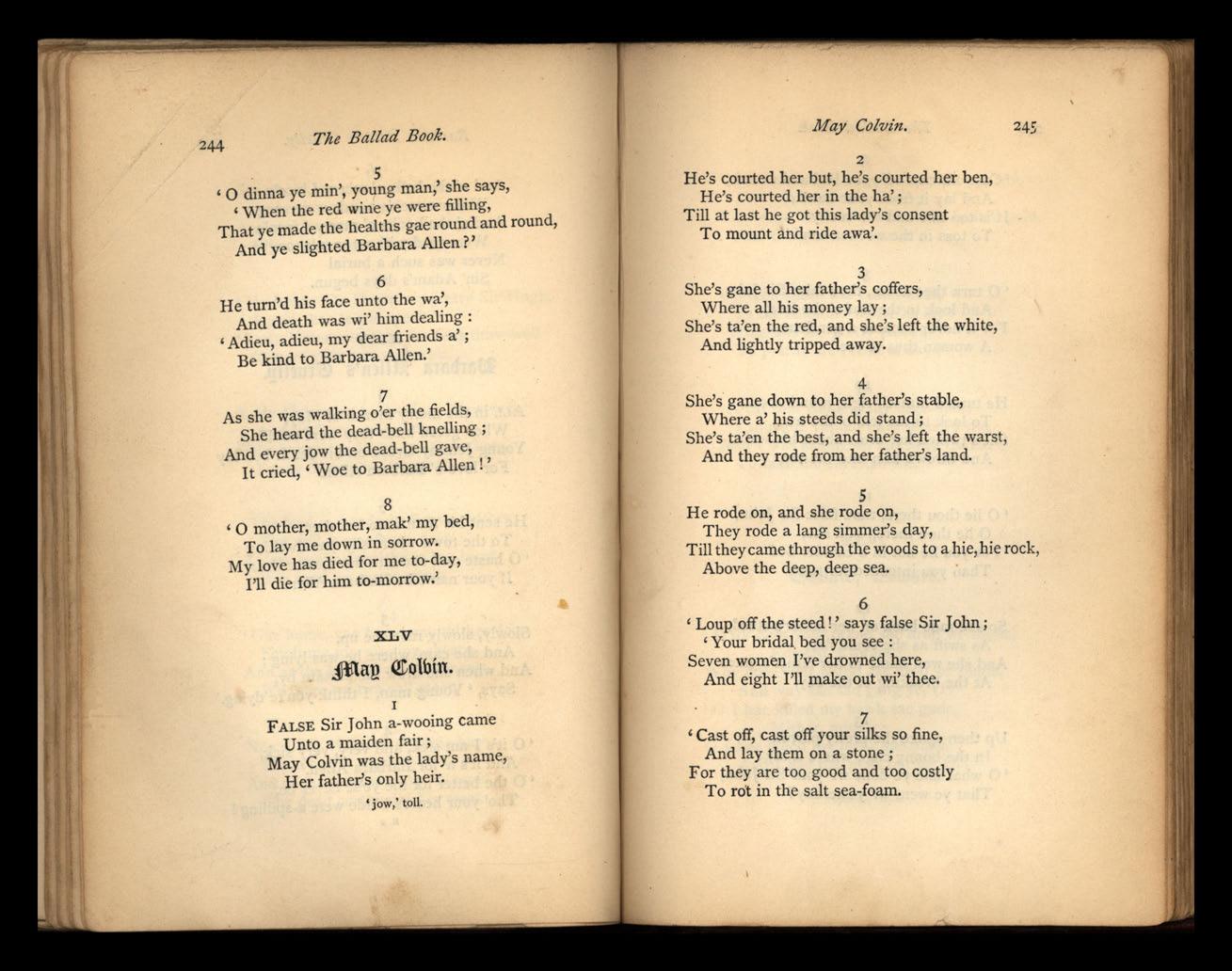
4
She's gane down to her father's stable
Where a' his steeds did stand, ' She's ta'en the best, and she's left the warst And they rode from her father's land '
5
He rode on, and she rode on, .They rode a lang simmer's day, Till they came through the woods to a hie hie rock Above the deep, deep sea. . ' ,
6
, Loup off the steed! ' says false Sir John . , Your bridal, bed you see : ' Seven women I've drowned here And eight I'll make out wi'
7
, Cast off, cast off your silks so fine, And lay them on a stone; For they are too good and too costly
To rol in the salt sea-foam.
8
( Cast off, cast off your Holland smock, And lay it from your hand; I t is too fine and too costly To toss in the wet sea-sand.'
9
( 0 turn thee about, thou false Sir John, And look to the le af 0' the tree, For it never be came a gentleman A woman thus to see.'
10
He turned himself right round about,
To look to the leaf 0' the tree; She's twined her arms about his waist, And thrown him into the sea.
II
, 0 lie thou there, thou false Sir John, o lie thou there,' said she, (For you lie not in a caulder bed Than you intended for me.'
12
So she rade back on her father's steed, As swift as she could flee, And she won hame to her father's gates At the breaking of the day
13
Up then spake the pretty parrot, In the bonpy cage where it lay:
, 0 what hae ye done wi' your Sir John, That ye went wi' yesterday?'
Edward, Edward. 247
14
( Now hold your tongue, my pretty parrot, And talk nae mair 0' me ; Your cage shall be made 0' the beaten gold, And the spakes 0' ivorie.'
15
Up then spake her father dear, In the chamber where h e l ay: ( What ails th e pretty parrot, To prattle ere break of d ay? '
16
, A cat that came to my cage-door, I thought 'twould have worried me, And I was calling on fair May Colvin To take the cat from me.'
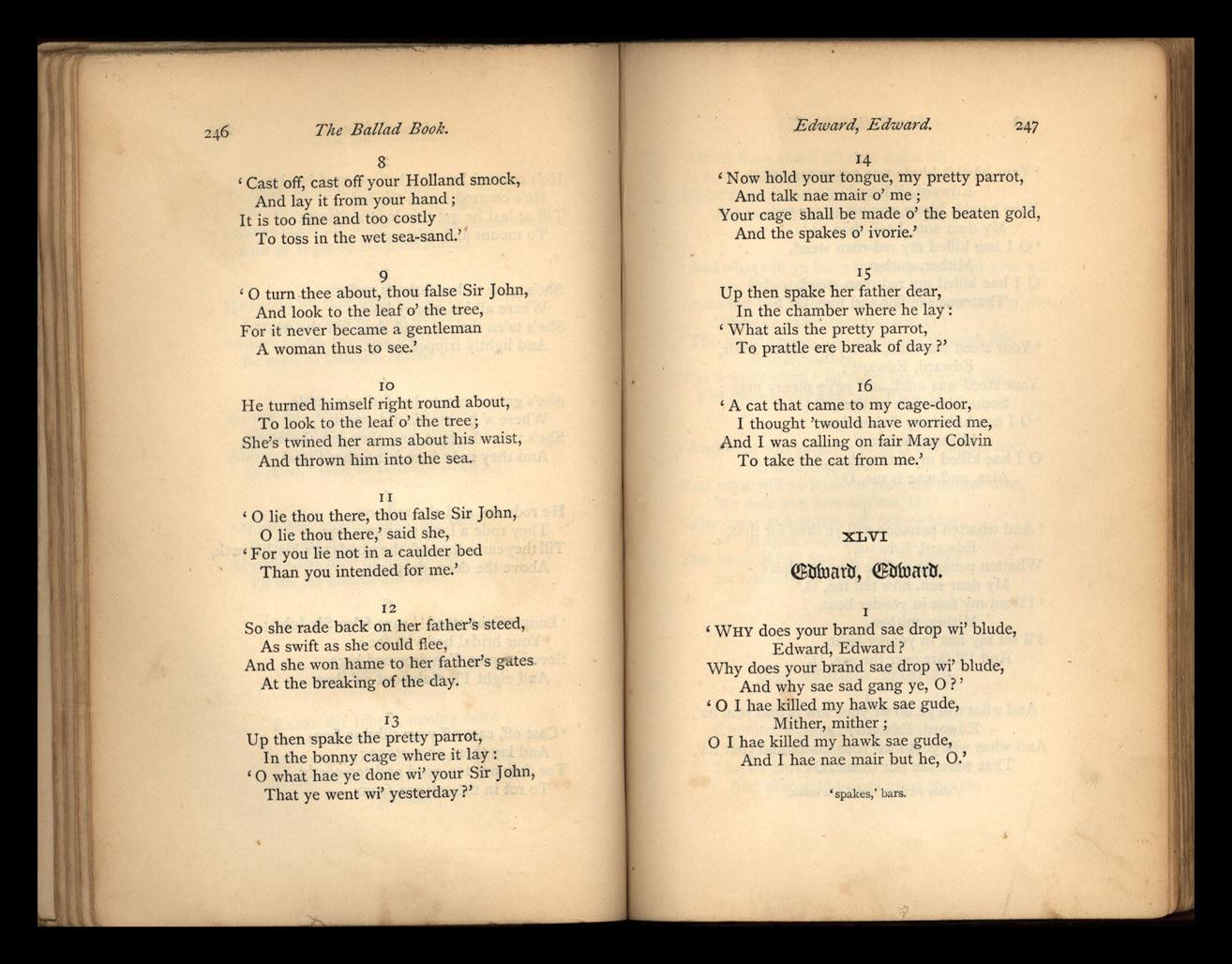
XLVI I
, WHY does your brand sae drop wi' blude, Edward, Edward?
Why does your brand sae drop wi' blude, And why sae sad gang ye, 0 ? '
(0 I hae killed my hawk sae gude, Mither, mither ; o I hae killed my hawk sae gude, And I hae nae mair but he, 0.'
, spakes,' bars.
The Ballad Book.
2
'Your hawk's blude was never sae red, Edward, Edward ; Your hawk's blude was never sae red, My dear son, I tell thee, 0.'
, 0 I hae killed my red-roan steed, Mither, mither ;
o I hae killed my red-roan steed, That was sae fair and free, 0.'
3
'Your steed was auld, and ye've plenty mair, Edward, Edward ; Your steed was auld, and ye've plenty mair; Some ither dule ye dree, 0.'
, 0 I hae killed my father dear, Mither, mither ;
o I hae killed my father dear, Alas, and wae is me, 0 ! '
4
, And whatten penance will ye dree for that , Edward, Edward?
Whatten penance will ye dree for that?
My dear son, now tell me, 0.'
, I'll- set my feet in yonder boat, Mither, mither ; I'll set my feet in yonder boat, And I'll fare over the sea, 0.'
5
, And what will ye do wi' your tow'rs and your ha', Edward, Edward ?
And what wiII ye do wi' your tow'rs and your ha', That were sae fair to see, 0 ? '
C dulc ye drec,' grief you suffer.
Tile Outlaw Murray.
, I'll let them stand till they doun fa', Mither, mither ; I'll let them stand till they doun fa',
For here never mair maun I be, 0.'
6
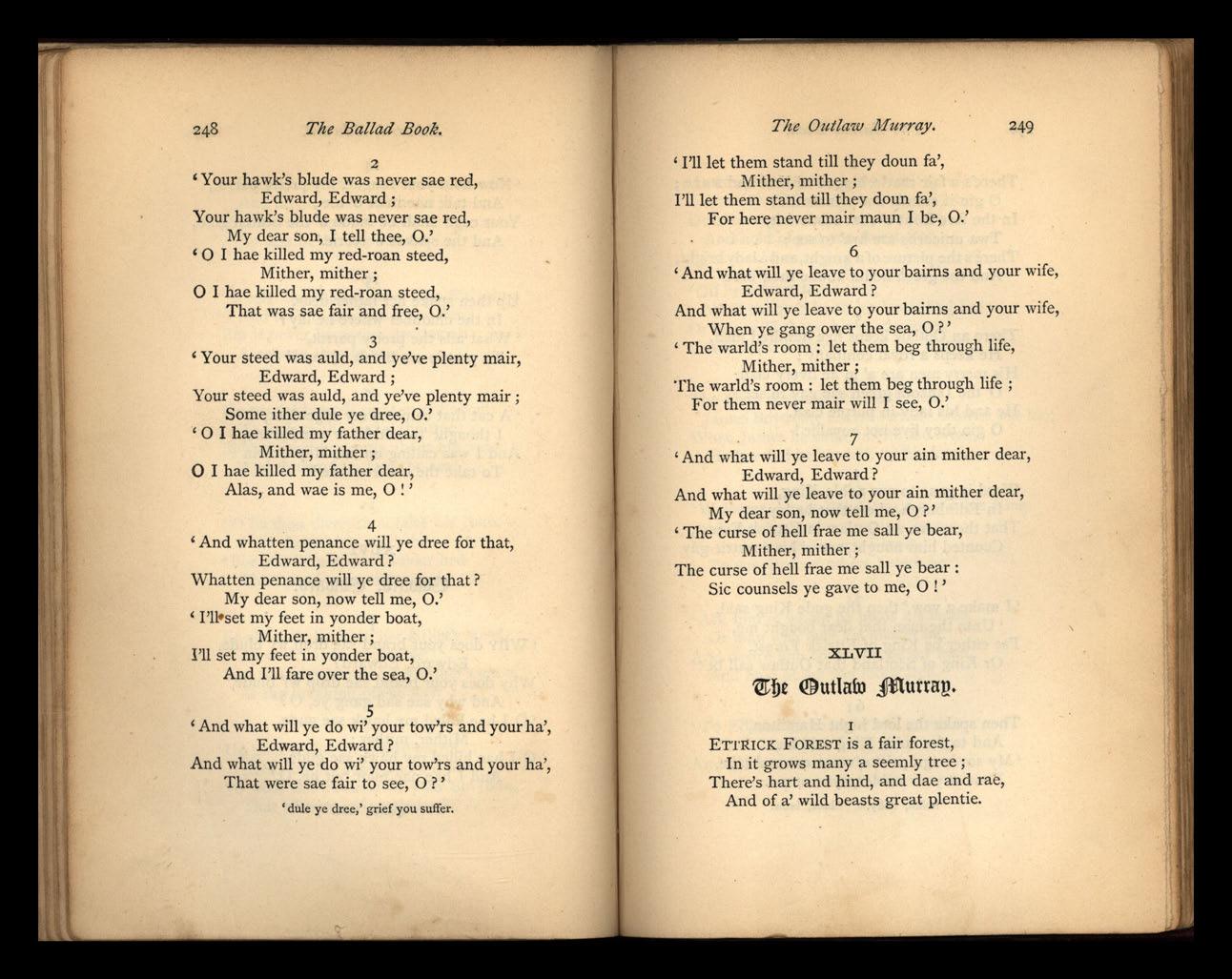
249
, And what will ye leave to your bairns and your wife, Edward, Edward?
And what will ye leave to your bairns and your wife, When ye gang ower the sea, 0 ?'
, The warld's room; let them beg through life, Mither, mither ; The warld's room: let them beg through life; For them never mair will I see, 0.'
7
'And what will ye leave to your ain mither dear, Edward, Edward?
And what will ye leave to your ain mither dear, My dear son, now tell me, O?'
, The curse of hell frae me saIl ye bear, Mither, mither ;
The curse of hell frae me saIl ye bear: Sic counsels ye gave to me, 0 ! ' XLVII
®utlafu ftlunaJ).
I
ETTRICK FOREST is a fair forest,
In it grows many a seemly tree; Th ere's hart and hind, and dae and rae, And of a' wild beasts great plentie.
Tile Ballad Book.
2
There's a fair castle bigged wi' lime and stane ; o gin it stands not pleasantlie !
In the fore front 0' that castle fair, Twa uni corns are bra' to see; There's the picture of a knight, and alady bright, And the green hollin abune their bree.
3
There an Outlaw keeps five hundred men, He keeps a royal company;
His merry men are a' in ae livery clad, 0' the Lincoln green sae gay to see; He and his lady in purple clad, o gin they live not royallie !
4
Word is gane to our noble King, In Edinburgh where that he lay, That there was an Outlaw in Ettrick Forest, Counted him nought, nor a' his courtrie gay.
5
, I make a vow,' then the gude King said, 'Unto the man that dear bought me, l'se either be King of Ettrick Forest, Or King of Scotland that Outlaw sall be!'
6
Then spake the lord hight Hamilton, And to the noble King said he, , My sovereign prince, some counsel take, First at your nobles, syne at me. {hollin,' holly. 'bree,' brow.
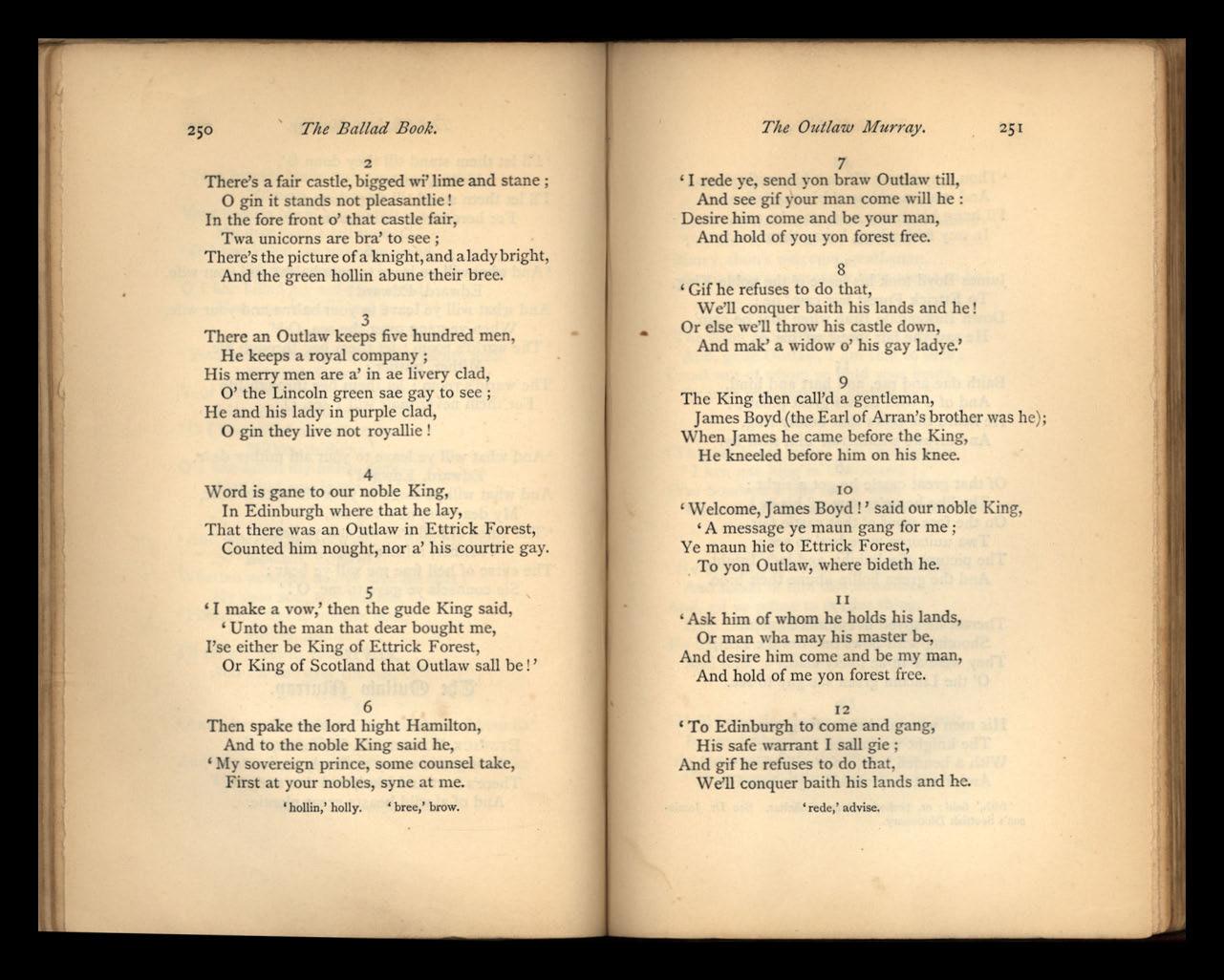
TIle Outlaw Mm'ray.
7
'1 rede ye, send yon braw Outlaw till, And see gif your man come will he : Desire him come and be your man, And hold of you yon forest free.
8
, Cif he r efuses to do that, \Ve'll conquer baith his lands and he! Or else we II throw his castle down, And mak' a widow 0' his gay ladye.'
9
The King then call'd a gentleman, James Boyd (the Earl of Arran's brother was h e); When James he came b e fore the King, He kneeled before him on his knee.
10
, Welcome, James Boyd ! ' said our noble King, , A message ye maun gang for me; Ye maun hie to EttI'ick Forest, To yon Outlaw, where bideth he.
II
, Ask him of whom he holds his lands, Or man wha may his master be, And desire him come and be my man, And hold of me yon forest free.
12
, To Edinburgh to come and gang, His safe warrant I sall gie ; And gif he refuses to do that , We'll conquer baith his lands and he. t rede,' advise.
The Ballad Book.
13
, Thou mayst vow I'll cast his castle down, And mak' a widow 0' his ga y ladye ; I'll hang his m erry m en, pair by pair, In ony frith where I may them see.'
14
James Boyd took his leave 0' the noble King, To Ettrick Forest fair cam' he; Down Birke ndale Brae when that he cam', He saw the fair forest wi' his ee.
ISBaith dae and rae, and hart and hind, And of a' wild beasts great plentie ; He heard the bows that boldly ring, And arrows whidderan' him near by.
16
Of that great castle he got a sight; The like he ne'e r saw wi' his ee ! On the fore front 0' th a t castle fair, Twa unicorns were bra' to see; The picture of a knight, and lady bright, And the green hollin abune their bree.
17
Thereat he spyed five hundred men, Shooting with bows on N ewark Lee; They were a' in ae livery clad, 0' the Lincoln green sae gay to see.
18
His men were a' cl a d in the green, The knight was arm ed capapie, With a bended bow, on a milkwhite steed; And ·I wot they rank'd right bonnilie.
I frith,' field; OT, pe rh aps, place of shelt er. See Dr. ,son's Scottish Di c ti onary.
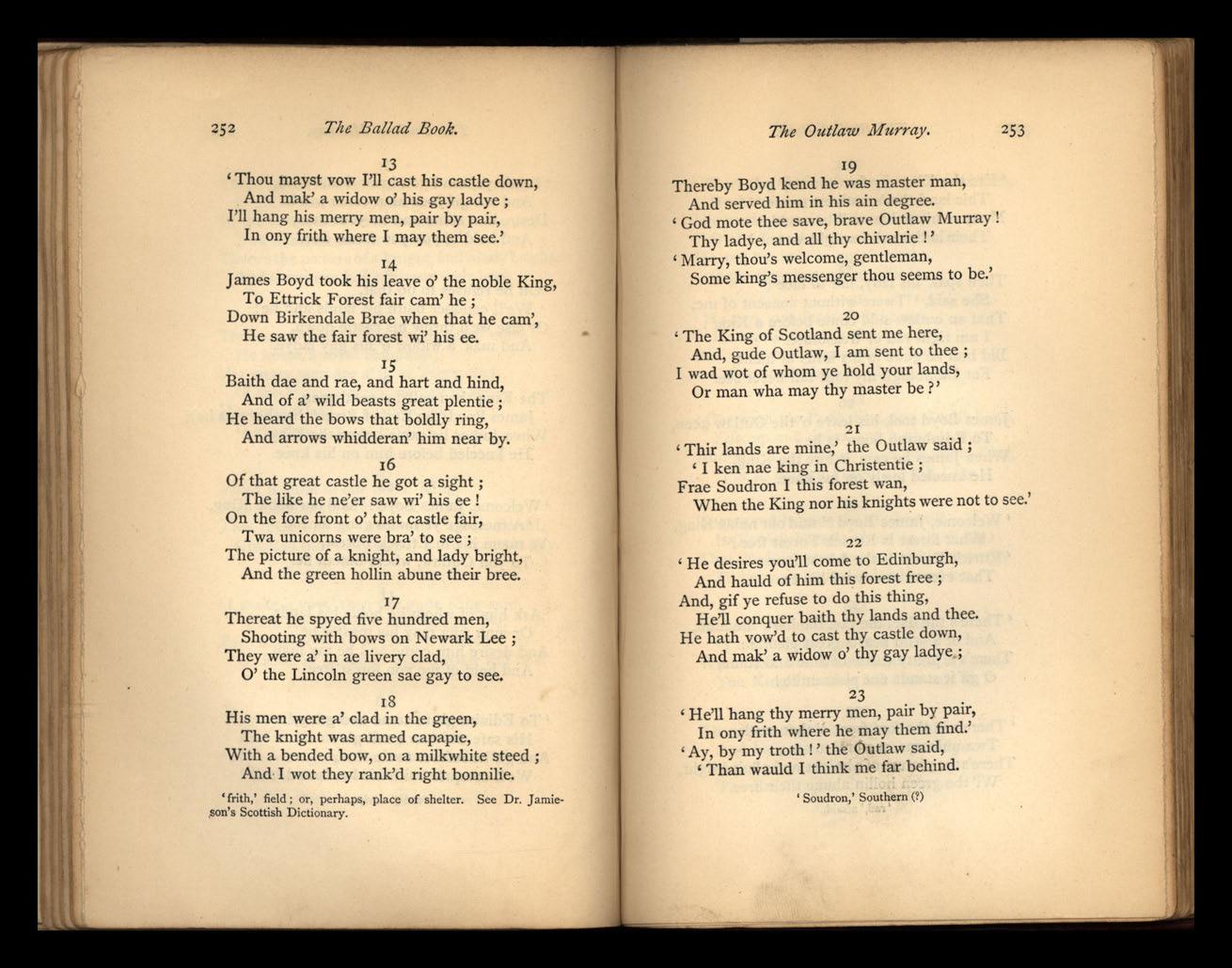
The Outlaw Murray.
19
Thereby Boyd kend he was master man, And served him in his ain degree.
, God mote thee save, brave Outlaw Murray ! Thy ladye, and all thy chivalrie ! '
, Marry, thou's welcome, gentleman, , Some king's messenger thou seems to be.
20
, The King of Scotland sent me here, And, gude Outlaw, I am se nt to thee; I wad wot of whom ye hold your lands, Or man wha may thy master be ?'
21
, Thir lands are mine,' the Outlaw said; , I ken nae king in Christen tie ;
253 Frae Soudron I this forest wan, When the King nor his knights were not to see.'
22
, He desires you'll come to Edinburgh, And hauld of him this forest free; And, gif ye refuse to do this thing, He'll conquer baith thy lands and thee. He hath vow'd to cast thy castle down, And mak' a widow 0 ' thy gay ladye ;
23
, He'll hang thy merry men, pair by pair, In ony frith where he may them find.'
' Ay, by my troth! ' the Outlaw
, Than wauld I think me far behmd.
S oudron,' Southern (1)
254
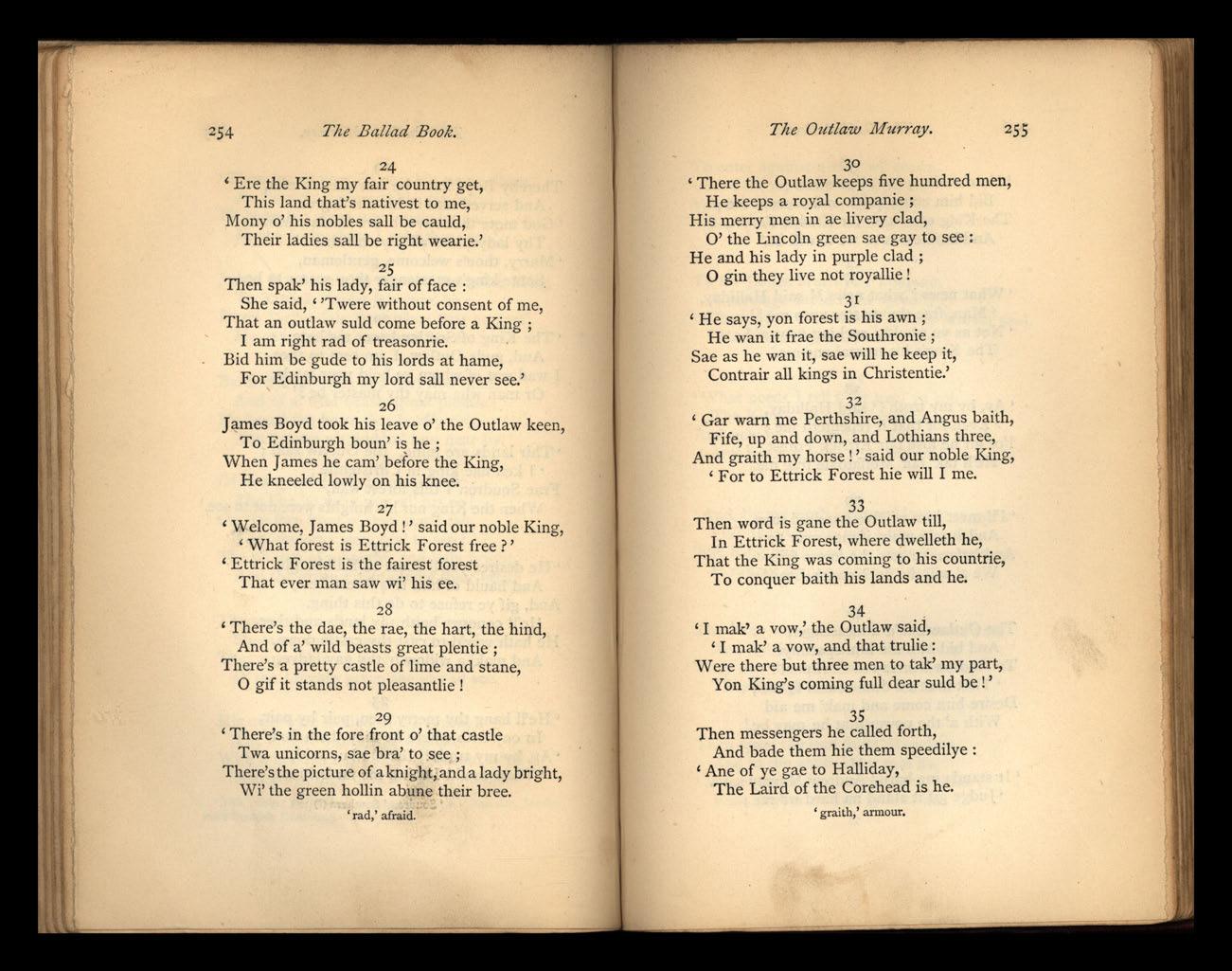
The Ballad Book.
24
, Ere the King my fair country get, This land that's nativest to me, Mony 0' his nobles saIl be cauld, Their ladies sall be right wearie.'
25
Then spak' his lady, fair of face: She said, "Twere without consent of me, That an outlaw suld come before a King; I am right rad of treasonrie.
Bid him gude to his lords at hame, For Edll1burgh my lord saIl never see.'
26
James Boyd took his leave 0' the Outlaw keen To Edinburgh boun' he ; , When James he cam' before the King, He kneeled lowly on his knee.
27
, Welcome, James Boyd ! ' said our noble King, , What forest is Ettrick Forest free?'
'Ettrick Forest is the fairest forest That ever man saw wi' his ee.
28
, There's the dae, the rae, the hart, the hind, And of a' wild beasts g reat plentie ; There's a pretty castl e of lime and stane o gif it stands not pleasantlie ! '
29
, There's in the fore front 0' that castle Twa unicorns, sae bra' to see; There's the picture of aknight, anda lady bright, Wi' the green holIin abune their bree. (rad ,' afraid.
The Outlaw Murray. 255
30
, There the Outlaw keeps five hundred men, He keeps a royal companie ; His merry men in ae livery clad, 0' the Lincoln green sae gay to see: He and his lady in purple clad; o gin they live not royallie !
3 I
, He says, yon forest is his awn; He wan it frae the Southronie ; Sae as he wan it, s a e will he keep it, Contrair all kings in Christen tie.'
3 2
, Gar warn me Perth shire, and Angus baith, Fife, up and down, and Lothians three, And graith my horse!' said our noble King, , For to Ettrick Forest hie will I me.
33
Then word is gane the Outlaw till, In Ettrick Forest, where dwelleth he, That the King was coming to his countrie, To conquer baith his lands and he.
34 .
, I mak' a vow,' the Outlaw said, , I mak' a vow, and that trulie : Were there but three men to tak' my part, Yon King's coming full dear suld be ! '
35
Then messengers he called forth, And bade them hie them speedilye :
, Ane of ye gae to Halliday, The Laird of the Corehead is he.
, gra ith,' annour.
TIle Ballad Book.
36
, He certain is my sister's son; Bid him come quick and succour me ; The King comes on for Ettrick Forest, And landless men we a' will be.'
37
'What news? what news?' said Halliday, , Man, frae thy master unto me ?'
, Not as ye would; seeking your aid; The King's his mortal enemie.'
38
, Ay, by my troth! ' said Halliday, , Even for that it repenteth me ; For gifhe lose fair Ettrick Forest, He'll tak' fair Moffatdale frae me.
39
, I'll meet him wi' five hundred men, And surely mair, if mae may be ; And before he gets the forest fair, We a' will die on N ewark Lee ! '
40
The Outlaw call'd a messenger, And bid him hie him speedilye To Andrew Murray of Cockpool :
, That man's a dear cousin to me ; Desire him come and mak' me aid With a' the power that he may be.'
41
, It stands me hard,' Andrew Murray said, , Judge gif it stand na hard wi' me ;
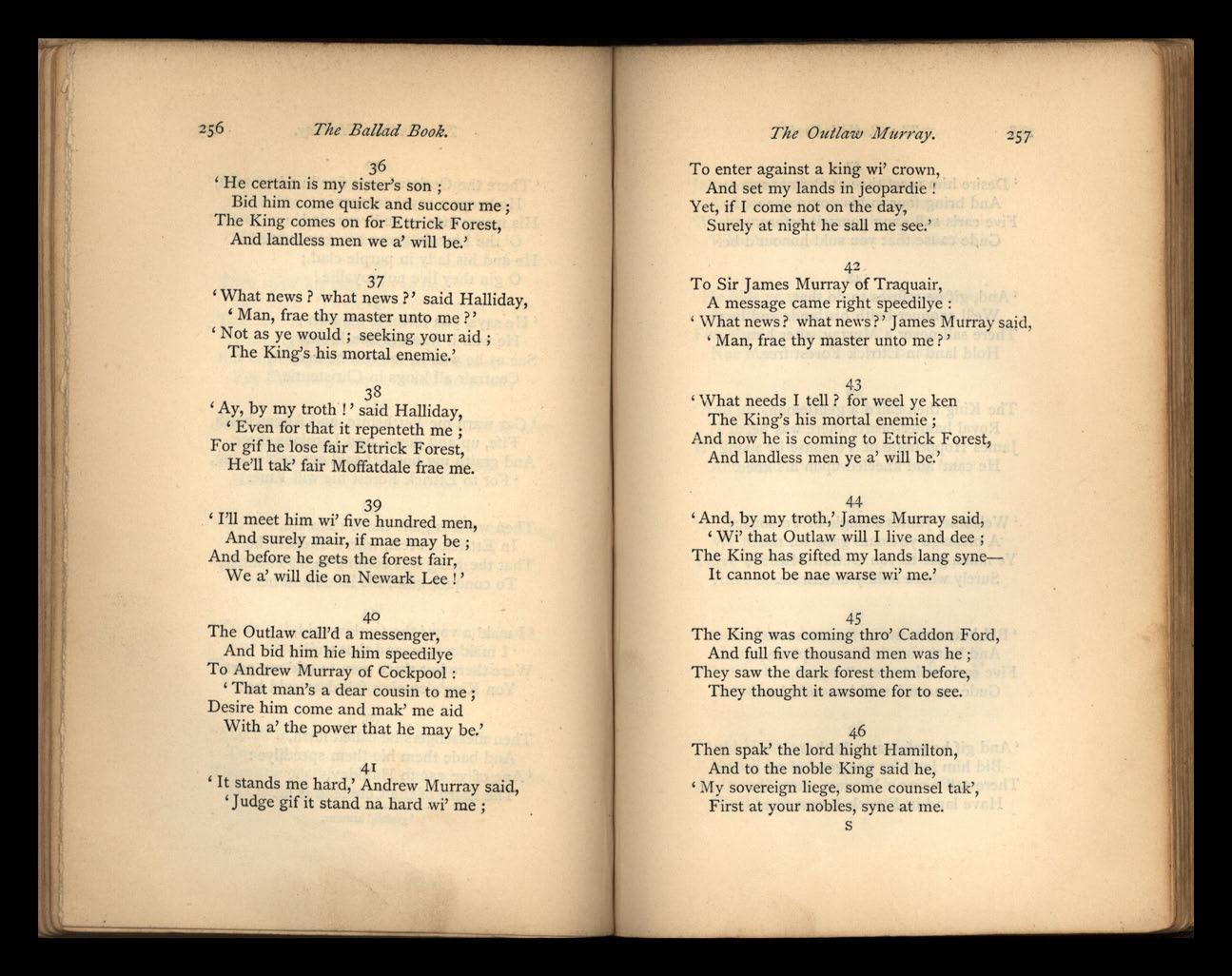
TIle Outlaw Mltrray.
To enter against a king wi' crown, And set my lands in jeopardie ! Yet, if I come not on the day, Surely at night he saIl me see.'
42
To Sir James Murray of Traquair, A message came right speedilye :
, \Vhat news? what news?' J ames M urray said , , Man, frae thy master unto me?'
43
, What needs I tell? for weel ye ken The King's his mortal enemie ; And now he is coming to Ettrick Forest, And landless men ye a' will be.'
44
'And, by my troth,' James Murray said, , Wi' that Outlaw will I live and dee ; The King has gifted my lands lang syneIt cannot be nae warse wi' me.'
45
The King was coming thro' Caddon Ford, And full five thousand men was he ; They saw the dark forest th em before, They thought it awsome for to see.
46
Then spak' the lord hight Hamilton, And to the noble King said he,
, My sovereign liege, some counsel tak' , First at your nobles, syne at me.
Tile Ballad Book.
47
, Desire him meet thee at Permanscore, And bring four in his companie; Five earls sail gang yours ell before, Gude cause tliat you suld honour'd be.
48
, And, gif he refuses to do that, We'll conquer baith his lands and he; There sall never a Murray, after him, Hold land in Ettrick Forest free.'
49
The King then call'd a gentleman, Royal banner-bearer there was he, James Hoppringle of Torsonse by name; He cam' and kneeled upon his knee.
50
'Welcome, James Pringle of Torsonse!
A message ye maun gang for me : Ye maun gae to yon Outlaw Murray, Surely where boldly bideth he.
51
, BidJlim meet me at Permanscore, AnH bring four in his companie; sall come wi' mysell, Gude -reason I suld honour'd be.
52
, And gif he refuses to do that, Bid him look for nae good 0' me ; There sail never a Murray, after him , Have land in Ettrick Forest free.'
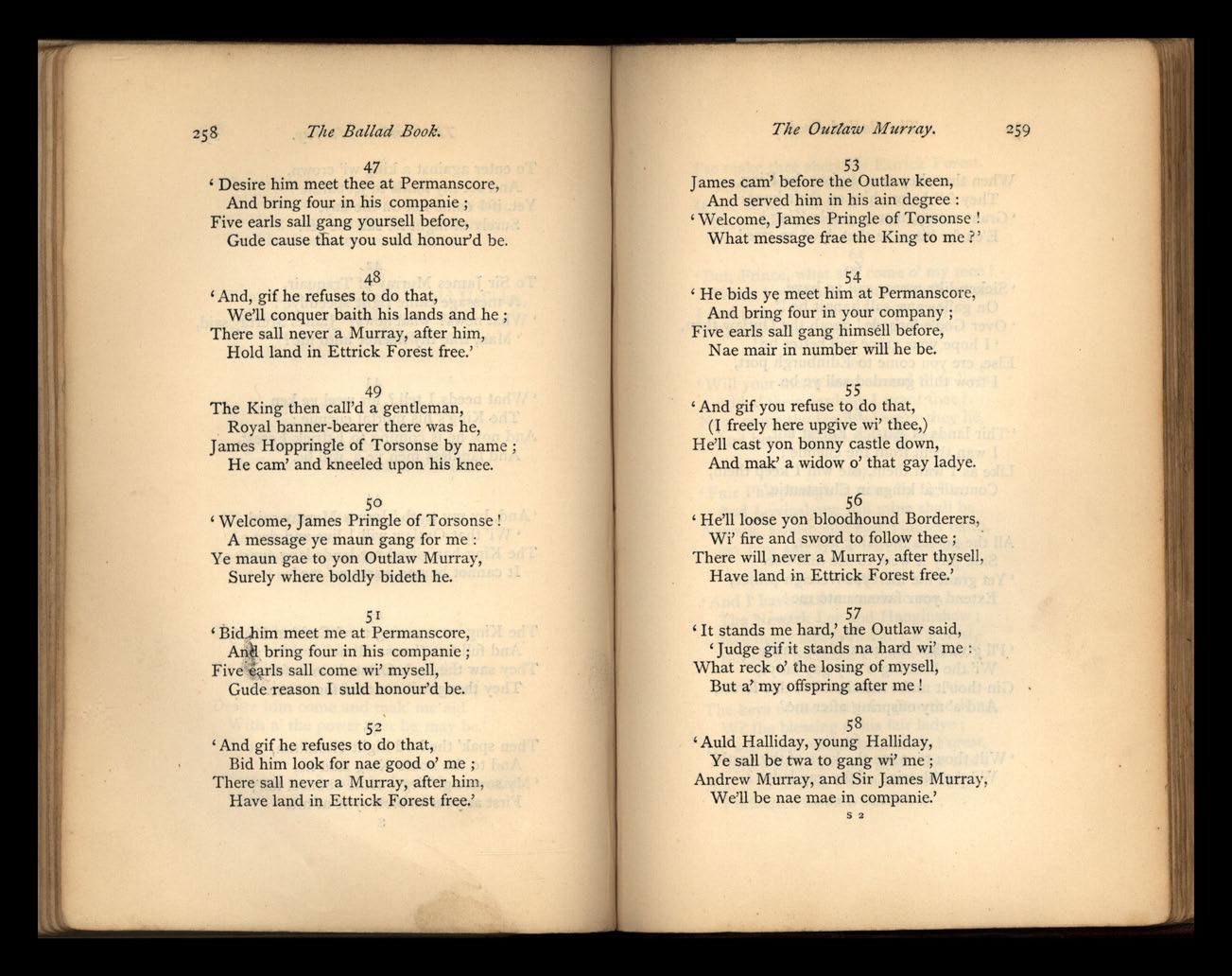
The Ottrlaw Mttrray.
53
J ames cam' before the Outlaw keen, And served him in his ain degree: 'Welcome, J ames Pringle of Torsonse ! What message £rae the King to me ? '
54
, He bids ye meet him at Perm an score, And bring four in your company; Five earls sall gang himsell before, N ae mair in number will he be.
55
, And gif you refuse to do that, Cl freely here upgive wi' thee,) He' ll cast yon bonny castle down, And mak' a widow 0' that gay ladye.
56
, He'll loose yon bloodhound Borderers , Wi' fire and sword to follow thee; There will never a Murray, after thysell, Have land in Ettrick Forest free.'
57
, It stands me hard,' the Outlaw said, , Judge gif it stands na hard wi' me : What reck 0' the losing of mysell, But a' my offspring after me !
58
'Auld Halliday, young Halliday, Ye sall be twa to gang wi' me ; Andrew Murray, and Sir James Murray, We'll be nae mae in companie.'
s •
260 TIle Ballad Book.
59
When that they cam' before the King, They fell before him on their knee:
'Grant mercy, mercy, noble King! E'en for his sake that dyed on tree.'
60
, Sicken like mercy sail ye have, On gallows ye sall hangit be ! '
, Over God's forbode,' quoth the Outlaw then , I hope your grace will better be ! ' Else, ere you come to Edinburgh port I trow thin guarded sail ye be. '
6r
'Thir lands of Ettrick Forest fair, I wan them from the enemie . Like as I wan them, sae will I keep them Contrair a' kings in Christen tie.' '
62
All the nobles the King about, Said pity it were to see him dee. 'Yet grant me mercy, sovereign prince, Extend your favour unto me !
63 , I' ll give thee the keys of my castle .Wi' blessing 0' my gay ladye,' Gm thou It make me sheriff of this forest And a' my offspring after me.' '
64
'Wilt thou give me the keys of thy castle Wi' the blessing of thy gay ladye ? ' , &icken,' such.
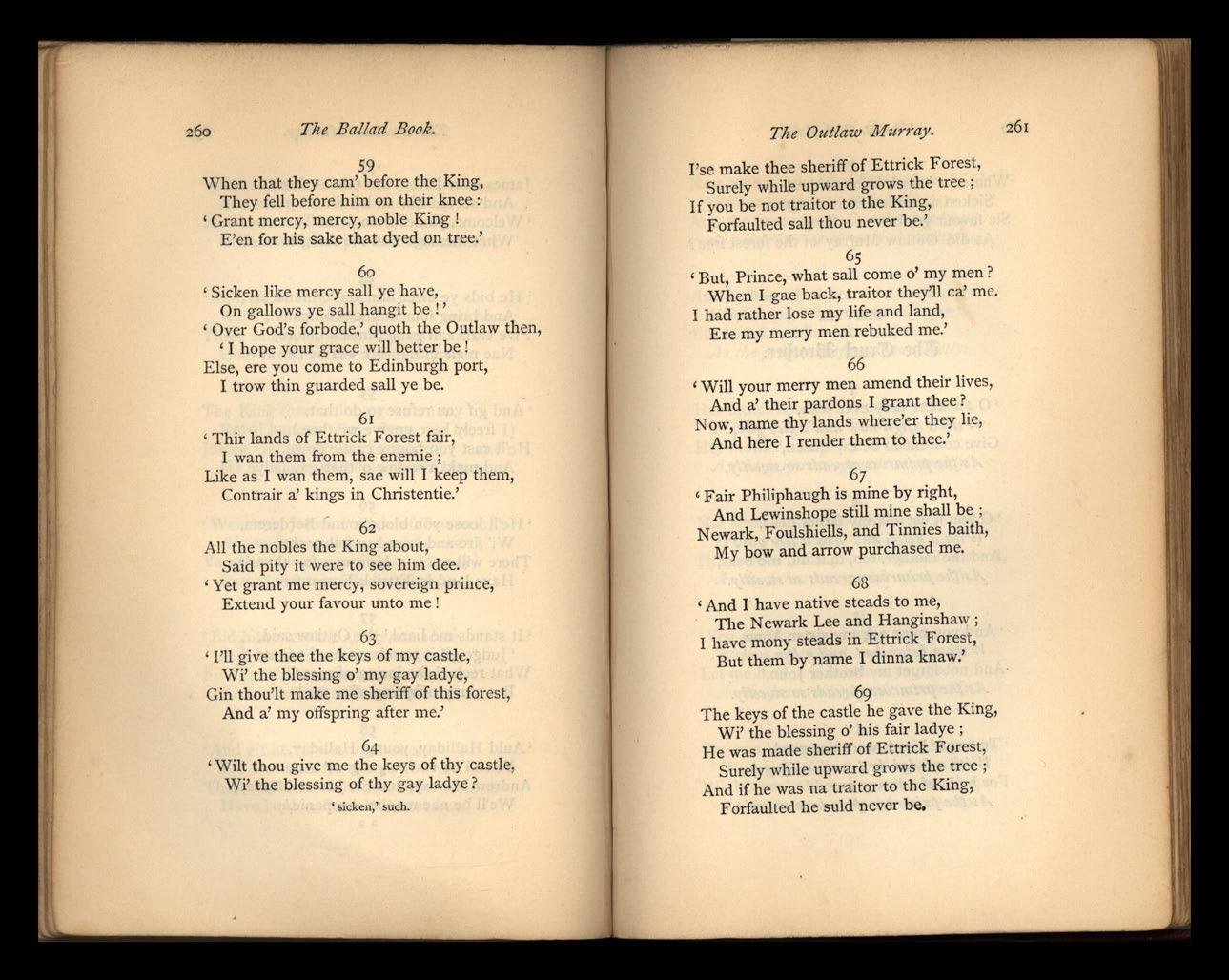
The Outlaw Murray.
I'se make thee sheriff of Ettrick Forest, Surely while upward grows the tree; If you be not traitor to the King, Forfaulted sall thou never be.'
65
'But, Prince, what sall come 0' my men? When I gae back, traitor they'll ca' me. I had rather lose my life and land, Ere my merry men rebuked me.'
66
'Will your merry men amend their lives , And a' their pardons I grant thee? Now, name thy lands where'er they lie, And here I render them to thee .'
67
, Fair Philiphaugh is mine by right, And Lewinshope still mine shall be ; Newark, Foulshiells, and Tinnies baith, My bow and arrow purchased me.
68
, And I have native steads to me, The Newark Lee and Hanginshaw; I have mony steads in Ettrick Forest, But them by name I dinna knaw.'
69
The keys of the castle he gave the King, Wi' the blessing 0' his fair ladye ; He was made sheriff of Ettrick Forest, Surely while upward grows the tree ; And if he was na traitor to the King, Forfaulted he suld never be.
262 Tile Ballad Book.
70
Wha ever heard, in ony times, Si cken an outlaw in his degree Sic favour get before a King, As did Outlaw Murray of the forest free?

X L VI II
(!tr uel )lSrot ber.
I
'0 FAIREST lady ever seen,
With a heigll-llO! and"a lily gay, Give consent to be my queen,' " As tile primrose spreads so sweetly,
2
, 0 you must ask my father dear, Witll a IIe£glz-llO! and a lily gay, And the too, that did me bear,' As the przmrose spreads so sweetly.
3
, And you must ask my sister Anne With a heigh-llo! and a lily gal, And not forget my brother John,' As tile primrose spreads so sweetly .
4
, To anger him it were not good, Witll a IIe£gll-IIO! and a lily gay For he is of a heavy mood,' , As the primrose spreads so sweetly.
The Brotlter.
5
Now he has asked h er father dear, With a lteigh-llO! and a lily gay, And the mother, too, that did h er bear, As tlte primrose spreads so sweetly.
6
And he has asked her sister Anne, Witll a Iteigh-ho! and a lily gay,·
But he left out her brother John,
As tlte primrose spreads so sweetly.
7
, Her father handed her down the stair, With a lteiglt-llO! and a lily gay,"
Her mother kindly kiss'd her there, As tlte primrose spreads so sweetly .
8
Her sister Anne through the close' her"led, Witll a lteiglt-ho! and a lily gay," Her brother John put her up on her steed , As the primrose spreads so sweetly.
9
, You are high and I am low, With a lteiglt-llO! and a lily gay /
Let me have a kiss before you go, '
As tile primrose spreads so sweetly.
10
She was louting down to kiss him swe et, With a lteigh-ho! and a lily gay /
Wi' his penknife he wounded her deep, As th e p r im r ose spreads so sweetly.
The Ballad Book.
Il
, Ride. saftly said the best young man,
, a hezgh-ho.l and a lily gay __
I thmk our bride looks pale and wan,'
As the primrose spreads so sweetly.
12
'0 me my horse, I pray, Wztlt a hezgh-ho.l a1ld a lily gay, And let me breathe, if so I may,'
As th e primrose spreads so sweetly.
13
, 0 lean me on my true love's breast
Witlt a heigh-ho.l and a lily gay;'
I want a little time to rest,'
As the primrose spreads so sweetly.
14
, I wish I had an hour,' she said
, With a Ilt!igh-ho.l and a lily
To make my will ere I am dead,'
As the primrose spreads so S".ueetly .
, 15
o what would ye leave to your father dear?'
Witlt a heigh-ho! and a lily gay.
, The milkwhite steed that brought me here'
As the pn"mrose spreads so sweetly. '
16
, What wou1d ye give to your mother dear ?'
With a heigh-/to.l atld a lily gay.
wedcling-shift which I do wear,'
As tlte primrose spreads so sweetly.
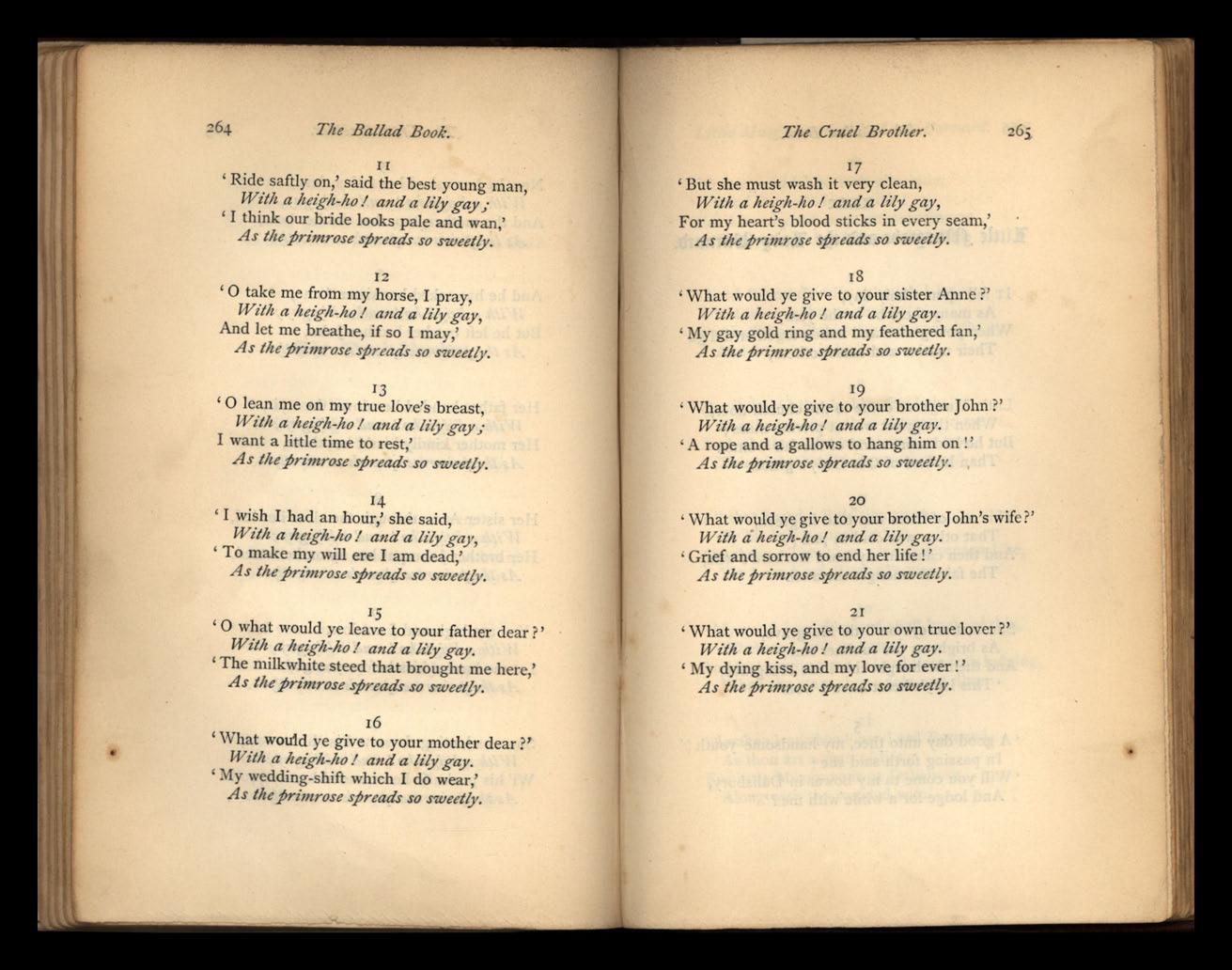
TIle Cruel Brollter.
17
, But she must wash it very clean,
Witlt a Izeigh-llo! alld a lily gay, For my heart's blood sticks in every seam, '
As th e primrose spreads so S".ueetly.
18
'What would ye give to your sister Anne ?'
With a Ilt!igh-llO! a1ld a lily gay.
, My gay gold ring and my feathered fan, '
As tIl e primrose spreads so sweetly.
19
'What would ye give to your brother John? '
With a Ilt!igll-ho! and a lily gay.
, A rope and a gallows to hang him on !'
As tIlt! pn"mrose spreads so sweetly
20
, What would ye give to your brother John's wife?'
Witlt a Ilt!iglt-ho.l alld a lily gay.
, Grief and sorrow to end her life! '
As th e primrose spreads so sweetly.
21
, What would ye give to your own true lover ?'
Witlt a heigh-llo! and a lily gay.
, My dying kiss, and my love for ever
As the primrose spreads so sweetly.
266 The Ballad Book. XLIX
I
IT fell upon a holy-day,
As many there be in the year,
When young men and maids together did go Their matins and mass to hear,
2
Little Musgrave came to the church-door
When the priest was at private mass' '
But he had more mind of the fair wom;n
Than he had of Our Lady's grace.
This one of them was 3clad in green
That other was clad in pall; . ' .
And then came in my Lord Barnard's wife
The fairest amongst them all. '
4
She cast an eye on little Musgrave
As bright as the summer sun' '
And then bethought this little Musgrave
'This lady's heart have I won.' '
'A 5 good unto thee, my handsome youth!'
In passmg forth said she'
, Will you come to my in Dalisbury, And lodge for a while with me ?'
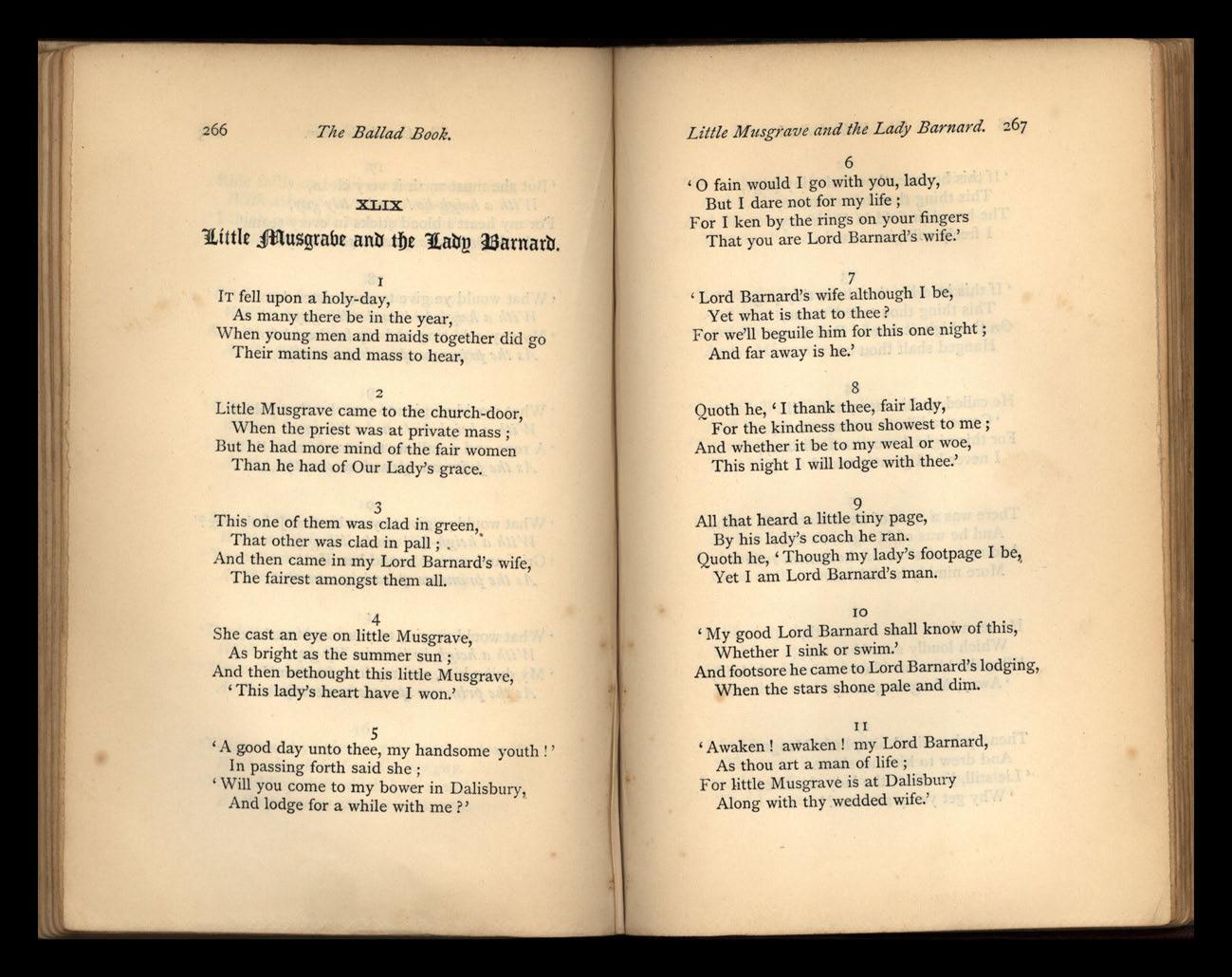
Little Mttsgrave and tile Lady Bantard. '267
6
, 0 fain would I go with you, lady, '
But I dare not for my life;
For I ken by the rings on your fingers
That you are Lord Barnard's wife.'
7
, Lord Barnard's wife although I be, Yet what is that to thee?
For we'll beguile him for this one night; And far away is he.'
8 Quoth he, ' I thank thee, fair lady, For the kindness thou showest to me; And whether it be to my weal or woe, This night I will lodge with thee.'
9
All that heard a little tiny page, By his lady's coach he ran.
Quoth he, ' Though my lady's footpage I be"
Yet I am Lord Barnard's man.
IO
'My good Lord Barnard shall know of this, Whether I sink or swim.'
And footsore he came to Lord Barnard's lodging, When the stars shone pale and dim.
II
, Awaken! awaken! my Lord Barnard,
As thou art a man of life; For little Musgrave is at Dalisbury Along with thy wedded wife. '
z68 The Ballad Book.
12
, If this be true, thou little tiny page
This thing thou telIest to me '
The broadest field in Dalisbur; I freely will give to thee.
'If h' b ' 13 t IS e a thou little tiny page
This thing thou tell est to me '
On the highest tree in Dalisbu;" Hanged shalt thou be.'
14
He called up his merry men all :
, Come saddle to me my steed'
For this night I must to Dalisbu;y I never had greater need.' '
15
There was a man of Lord Barnard's train
And he was of Musgrave' s kin' ' And aye as fast as the horsemen
More nimbly he did run.
16
He set a horn unto his mouth
Which loudly to say; When he blew hIs blast so clear and shrill
, Away, Musgrave, away ! ' '
17
Then up he raised him, little Musgrave And drew to him his shoon : '
, Lie still, lie still!' the lady she cried' 'Why get ye up so soon?' '
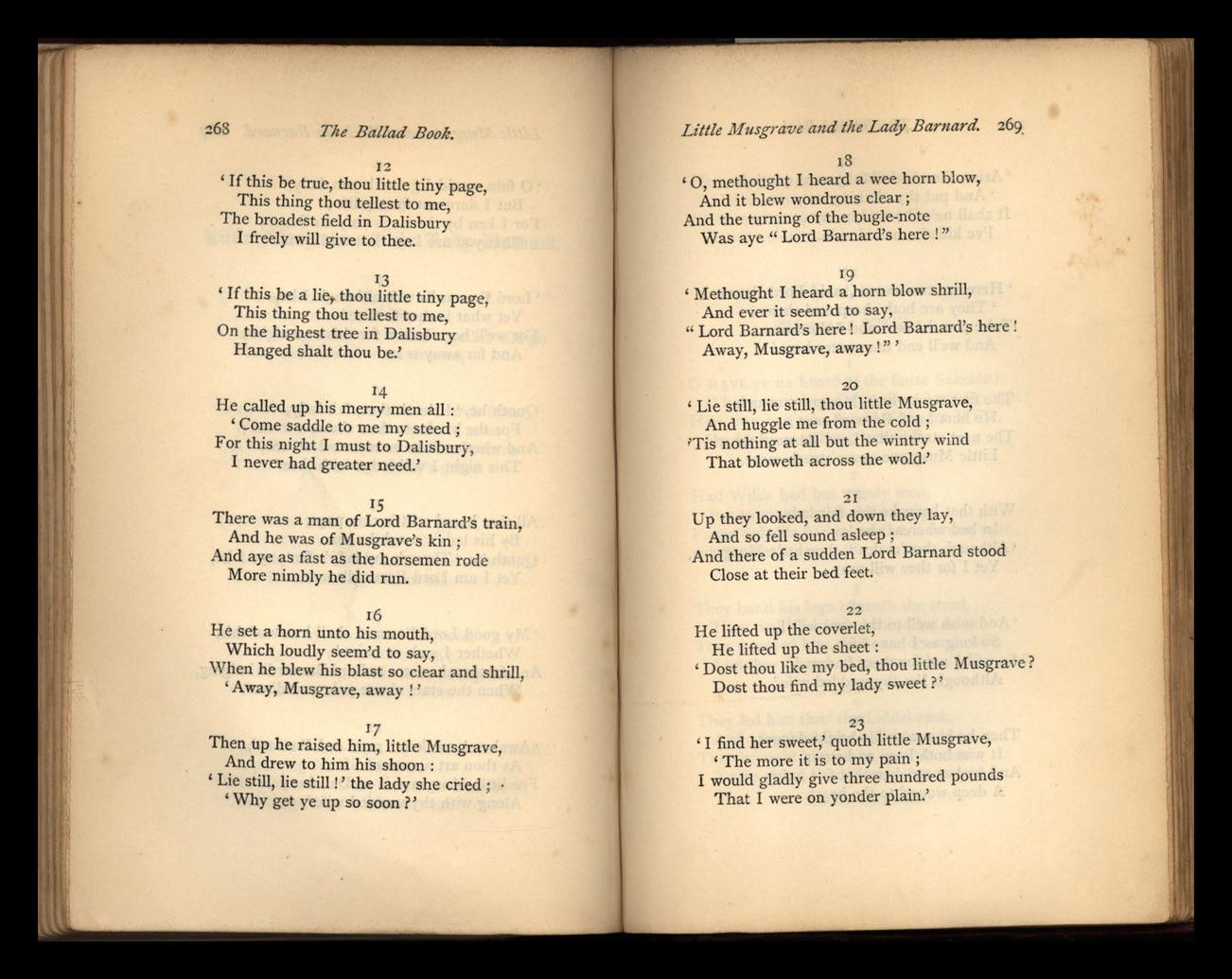
Little Musgrave alld Ihe Lady Bamard. 26 9.
18
, 0, methought I heard a wee horn blow, And it blew wondrous clear; And the turning of the bugle-note Was aye" Lord Barnard's here !"
19
, Methought I heard a horn blow shrill, And ever it seem'd to say, " Lord Barnard's here! Lord Barnard's here Away, Musgrave, away!'"
20
, Lie still, lie still, thou little Musgrave, And huggle me from the cold; ITis nothing at all but the wintry wind
That bloweth across the wold.'
21
Up they looked, and down they lay, And so fell sound asleep; And there of a sudden Lord Barnard stood Close at their bed feet.
22
He lifted up the coverlet, He lifted up the sheet: , Dost thou like my bed, thou little Musgraye? Dost thou find my lady sweet?'
23
'I find her sweet,' quoth little Musgrave, , The more it is to my pain; I would gladly give three hundred pounds That I were on yonder plain.'
Tlu Ballad Book.
24
'Arise, thou little Musgrave,' quoth he, , And put thy clothing on ; It shall ne'e r be said in my country I've killed a naked man.
25 , Here are two swords,' said Lord Barnard, , They are both sharp and shear ; Take you the best and I the worst, And we'll end the matter here.'
26
The first stroke little Musgrave struck, He hurt Lord Barnard sore; The next stroke that Lord Barnard struck, Little Musgrave never struck more.
27
With that bespake this fair lady In bed whereas she lay: 'Although thou'rt dead, thou little Musgrave Yet I for thee will pray;
28
, And wish well to thy soul will I, So long as I have life; So will I not for thee, Bamard, Although I'm thy wedded wife.'
29
Then he has ta'en his bright dagger, I t was both keen and sharp, And he has stricken that fair lady A deep wound to the he art.
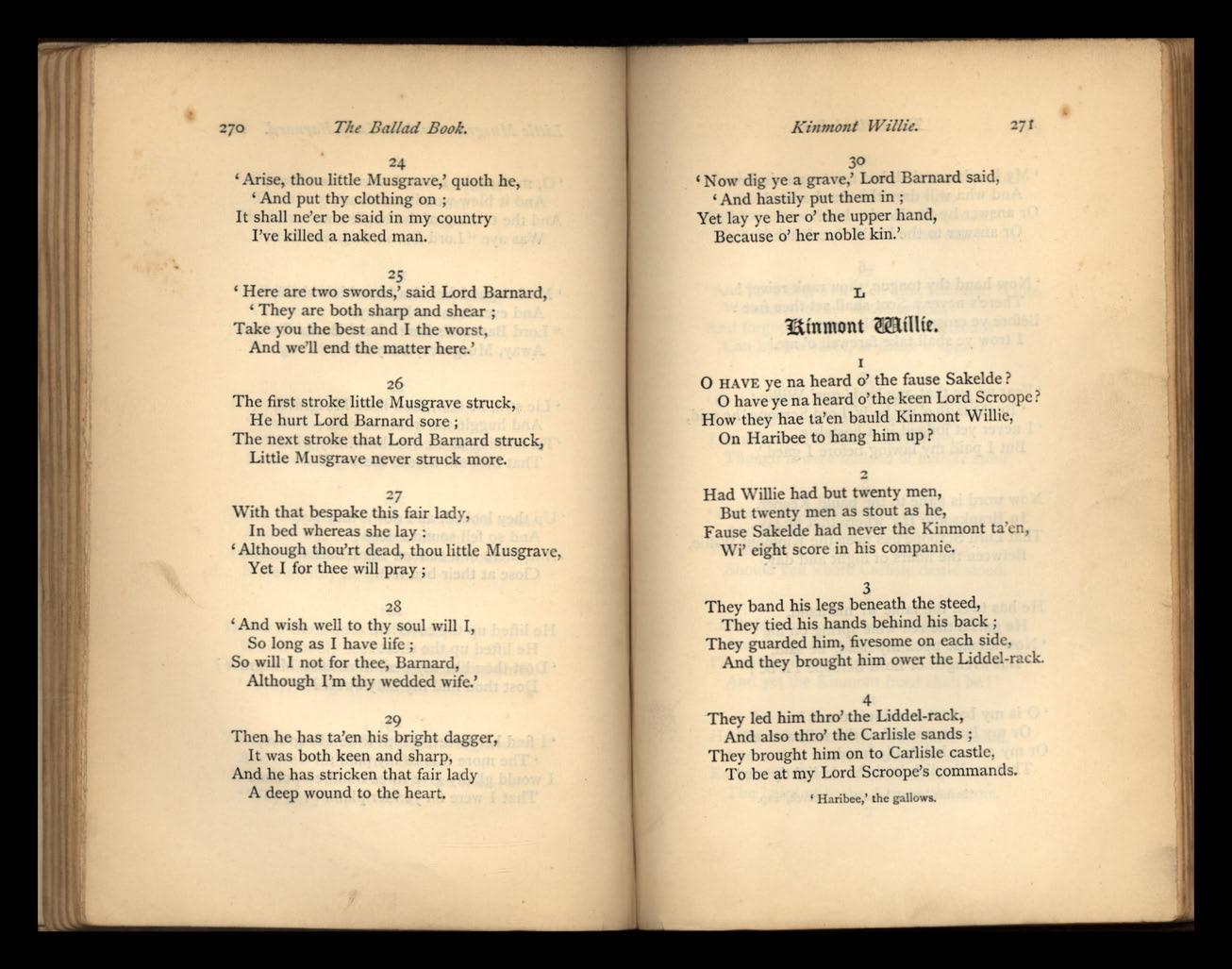
Kill1ll01lt f,Villit.
30
, ow dig ye a grave,' Lord Barnard said , And hastily put them in ; Yet lay ye her 0' the upper hand, Because 0' her noble kin.' L
I
o HAVE ye na heard 0' the fause Sakelde ? o have ye na heard 0' the keen Lord Scroope? How they hae ta'en bauld Kinmont Willie, On Haribee to hang him up?
2
Had Willie had but twenty men, But twenty men as stout as he, Fause Sake1de had never the Kinmont ta'en, \Vi' eight score in his companie.
3
They band his legs beneath the steed, They tied his hands behind his back ; They guarded him, fivesome on each side, And they brought him ower the Liddel -rack.
4
They led him thro' the Liddel-rack, And also thro' the Carlisle sands; They brought him on to Carlisle castle, To be at my Lord Scroope's commands.
I H:lribee J ' the gallows.
The Ballad Book.
5
, My hands are tied, but my tongue is free, And wha will dare this deed avow? Or answer by the Border law? Or answer to the bauld Bucc1euch?'
6
, Now haud thy tongue, thou rank reiver ! There's never a Scot shall set thee free: Before ye cross my castle yate, I trow ye shall take farewell 0' me.'
7
' Fear na ye that, my lord,' quo' Willie :
, By the faith 0' my body, Lord Scroope,' he said,
, I never ye t lodged in a hostelrie,
But I paid my lawing before I gaed.'
8
Now word is gane to the bauld Keeper, In Branksome Ha' where that he lay,
That Lord Scroope has ta' en the Kinmont WiIlie, Between the hours of night and day.
9
He has ta' en the t a ble wi' his hand, He garr'd the red wine spring on hie:
, Now a curse upon my head, ' he said, , But avenged of Lord Scroope I'll be !
ID
, 0 is my basnet a widow' s curch?
Or my lance a wand of the willow-tree?
Or my arm a lady's lily hand, That an English lord should lightly me ! 'basnet,' small he lmet. ' curch/ cap.

K£mllollt W£llie.
rr
, And have they ta'en him, Kinmont Willie, Against the truce of Border tide, And forgotten that the bauld Bucc1euch Is keeper here on the Scottish side?
12 273
, And have they e'en t a 'en him, Kinmont \Villie, Withouten either dread or fear, And forgotten that the bauld Bucc1euch Can back a steed, or shake a spear?
13
, 0 were there war between the lands, As well I wot that there is none, I would slight Carlisle castle high, Though it were builded of marble stone.
14
, I would set that castle in a low, And sloken it with English blood! There's never a man in Cumberland Should ken where Carlisle castle stood.
IS
, But since nae WaIJS between the lands, And there is peace, and peace should be, I'll neither harm English lad or lass, And yet the Kinmont freed shall be ! '
16
He has call'd him forty Marchmen bauld, I trow they were of his ain name, Except Sir Gilbert Ellidt, call'd The Laird of Stobs, I mean the same.
T
TIle Ballad Book.
17
He has call'd him forty Marchmen bauld, Were kinsmen to the bauld Bucc1euch ; With spur on heel, and splent on spauld, And gluves of green, and feathers blue.
18
There were five and five before them a', Wi' hunting-horns and bugles bright: And five and five carn' wi' Bucc1euch , Like warden' s men, array'd for fight.
19
And five and five, like masons gang, That carried the ladders lang and hie; And five and five, like broken men; And so they reach' d the Woodhouselee.
20
And as we cross'd the ' Bateable Land , When to the English side we held , The first 0' men that we met wi ' , Whae sould it be but fause Sakelde ?
21
'Where be ye gaun, ye hunters keen?' Quo' fause Sakelde; 'come tell to me ! '
'We go to hunt an English stag, Has trespass' d on the Scots countrie.'
22
'Where be ye gaun, ye marshal men?' Quo' fause Sakelde; 'come tell me true! '
'We go to catch a rank reiver, Has broken faith wi' the bauld Bucc1euch.' f splent on spauId,' armour on shoulder.
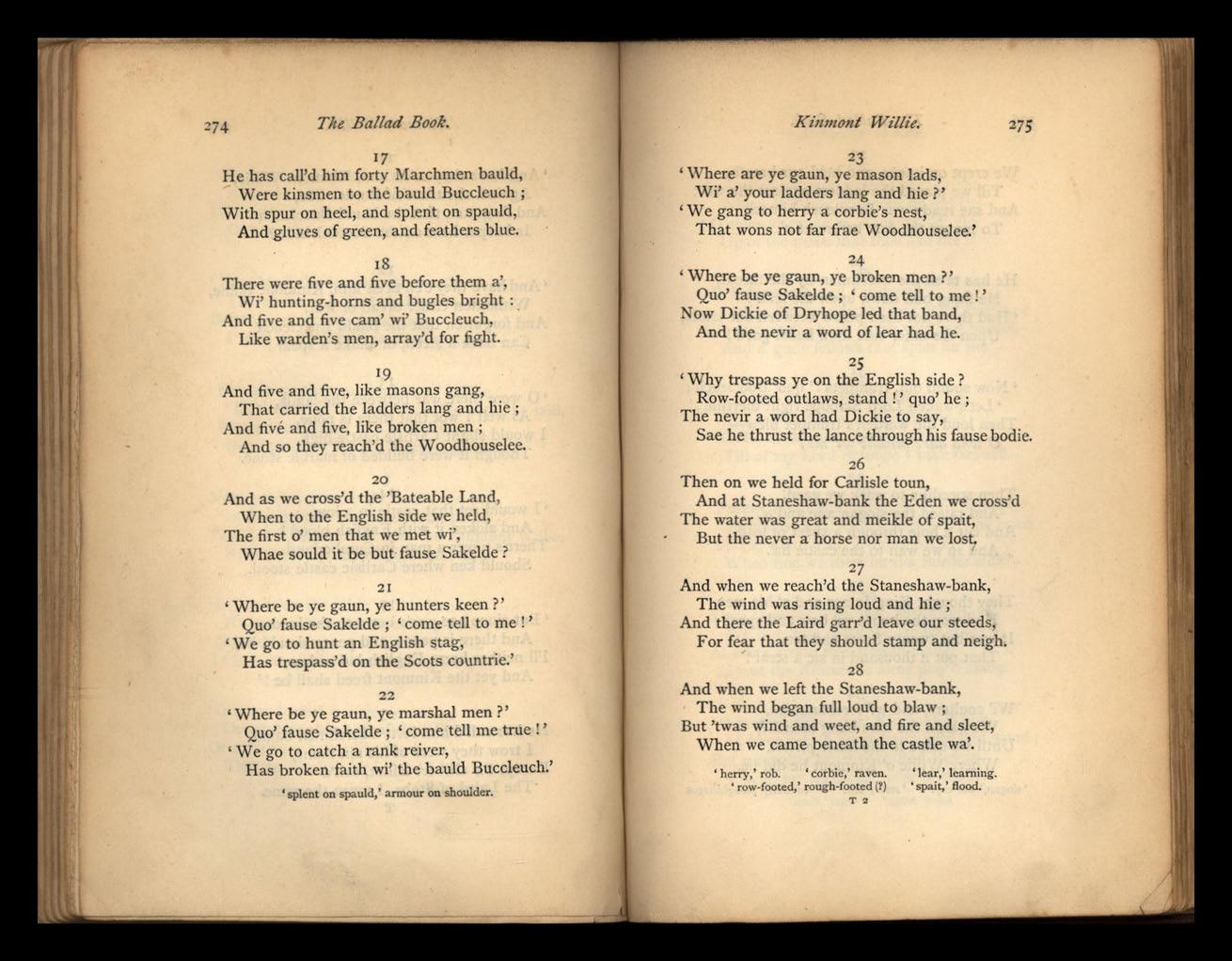
Kill1ll011t Willie.
23
, are ye gaun, ye mason lads, Wl' a' your ladders lang and hie?'
, We gang to herry a corbie's nest, That wons not far frae W oodhouselee.'
24
'Where be ye gaun, ye broken men?'
Quo' fause Sakelde; 'come tell to me ! '
ow Dickie of Dryhope led that band, And the nevir a word of lear had he.
25
, Why trespass ye on the English side?
Row-footed outlaws, stand! ' quo' he; The nevir a word had Dickie to say,
Sae he thrust the lance through his fause bodie.
26
Then on we held for Carlisle toun, And at Staneshaw-bank the Eden we cross'd The water was great and meikle of spait, But the never a horse nor man we
27
And when we reach'd the Staneshaw-bank, The wind was rising loud and hie; And there the Laird garr'd leave our steeds, For fear that they should stamp and neigh.
28
And when we left the Staneshaw-bank, The wind began full loud to blaw ; But 'twas wind and weet, and fire and sleet, When we came beneath the castle wa'.
he rry, ' rob. 'corbie / raven . 'lear,' learning,
• r o w-footed ,' rough-footed (f ) • spait,' flood T 2
276 The Ballad Book.
29
'Ve crept on knees, and held our breath, Till we placed the ladders against the wa' ; And sae ready was Bucc1euch himsell To mount the first before us a'.
30
He has ta'en the watchman by the throat, He Bung him down upon the lead: I Had there not been peace between our lands, Upon the other side thou hadst gaed !
3 1
I Now sound out, trumpets!' quo' Bucc1euch ; I Let's waken Lord Scroope right merrilie "!' Then loud the warden's trumpet blewo wluz dare meddle wi' me?
3 2
Then speedilie to wark we gaed And raised the slogan ane and a' , And cut a hole through a sheet of lead, And so we wan to the castle ha'.
33
They thought King James and a' his men Had won the house wi' bow and spear ; It was but twenty Scots and ten, That put a thousand in sic a stear !
34
\Vi' coulters, and wi' forehammers, We garr'd the bars bang merriIie, Until wc came to the inner prison, Where Willie 0' Kinmont he did lie. 'sloga.n,' war·cry. 'steal',' 5lir. coulters,' ploughshares.
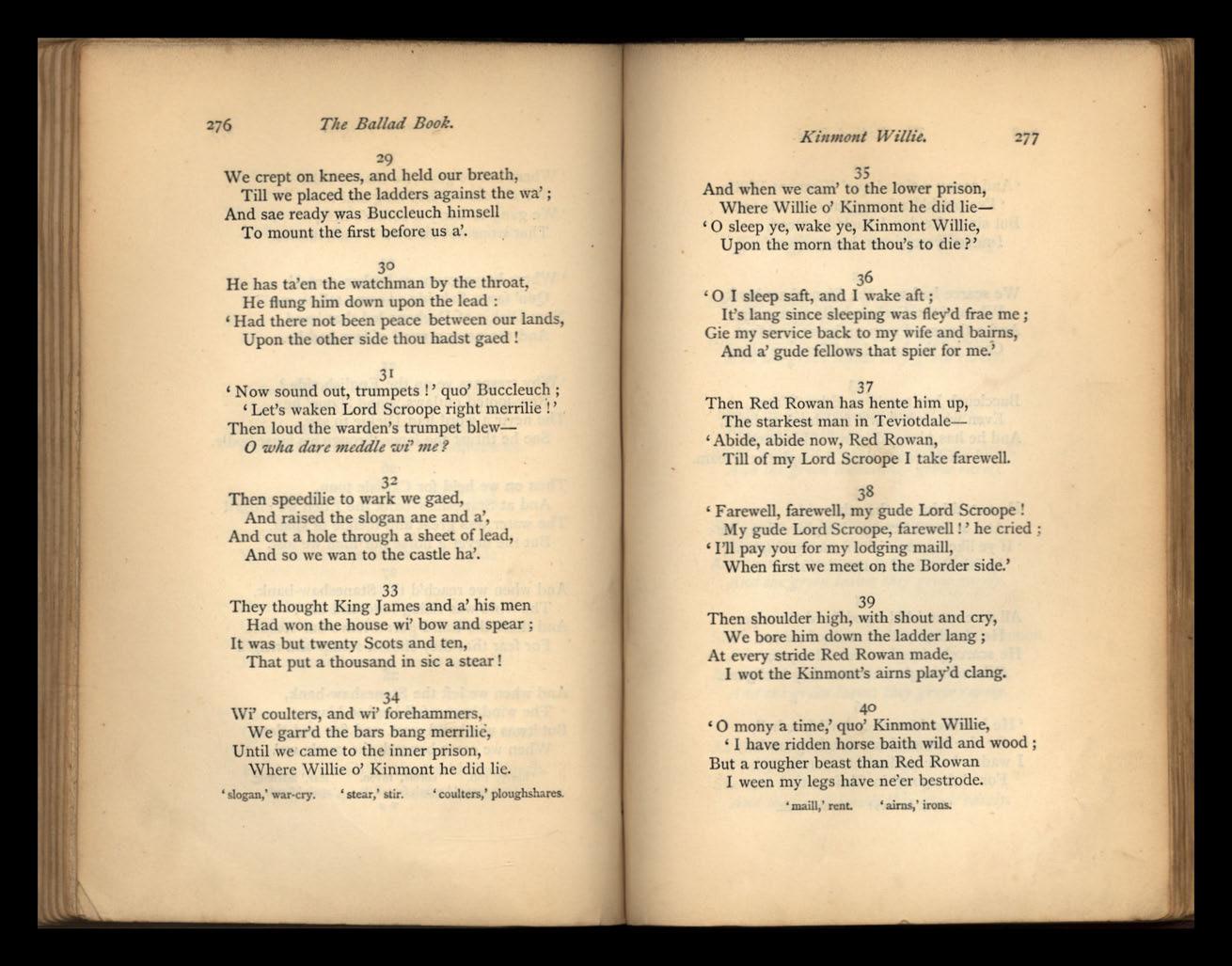
Ki1l1nont
35
And when we cam' to the lower prison, Where Willie 0' Kinmont he did lie'0 sleep ye, wake ye, Kinmont Willie, Upon the mom that thou's to die?'
36
'0 I sleep saft, and I wake aft; It's lang since sleeping was Hey'd frae me; Gie my service back to my wife and bairn , And a' gude fellows that spier for me.'
37
Then Red Rowan has hente him up, The starkest man in TeviotdaleI Abide, abide now, Red Rowan, Till of my Lord Scroope I take farewell.
38 , Farewell, farewell my gude Lord Scroope ! ::\ly gude Lord croope, farewell . ' he cried ; , I'll pay you for my lodging maill, When first wc meet on the Border side.'
39
Then shoulder high, with shout and cry, 'Ve bore him down the ladder lang; At every stride Red Rowan made, I wot the Kinmont's airns play'd clang.
40
'0 mony a time,' quo' Kinmont Willie, I I have ridden horse baith wild and wood; But a rougher beast than Red Rowan I ween my legs have ne'er bestrode.
4 maill, rent. ' aims, t irons.
The Ballad Book.
41
, And mony a time,' quo' Kinmont Willie, , I've prick'd a horse out oure the furs; But since the day I back'd a steed, I never wore siccan heavy spurs.'
42
We scarce had won the Staneshaw-bank, When a' the Carlisle bells were rung, And a thousand men on horse and foot Cam' wi' the keen Lord Scroope along.
43
Bucc1euch has turn'd to Eden Water, Even where it flow'd frae bank to brim, And he has plunged in wi' a' his band, And safely swam them through the stream.
44 He turn'd him on the other side, And at Lord Scroope his glove flung h e ;
, If ye like na my visit in merry England, In fair Scotland come visit me ! '
45
All sore astonish'd stood Lord Scroope, He stood as still as rock of stane ; He scarcely dared to trew his eyes, When through the water they had gane.
46
, He is either himsell a devil frae hell, Or else his mother a witch maun be ; I wadna have ridden that wan water For a' the gowd in Christentie.'
I furs,' furrows? 'trew,' trust

LI jfine jflo("otrf.i in tbe lTalle}1.
I SHE sat down below a thorn, Fine flowers ill the valley>'
And there she has her sweet babe born, A nd tIle grem leaves they grow rarely.
2 , Smile na sae sweet, my bonny babe, Fineflowers in tIle valley>,
An ye smile sae sweet, ye'll smile me dead,' And the grem leaves tltey grow rarely.
3
She's ta'en out her little penknife, Fine flowers £,t tlte valley>,
And twinn'd the sweet babe 0' its life, And tile grem leaves they grow rarely.
4
She's howket a grave by the light 0' the moon, Fine flowers in the valley>,
And there she's buried her sweet b abe in, And the green leaves they grow rarely.
5
As she was going to the church, Fine flowers in the valley,
She saw a sweet babe in the porch, Altd the grem leaves they grow rarely. ,/
280 TIll! Ballad Book.
6
'0 sweet babe, if thou wert mine, Fi1lejlow ers ilt tlle ' valley, I wad deed thee in silk and sabelline,' AlId till! grem leaves tlll!y grow rarely.
7
, 0 mother mine, when I was thine, Finejlowers ill till! valley, You did na prove to me sae kind,' And tile grem leaves they grow rarelj.
8
, But now I'm in the heavens hie, Fine jlowers i1l tile valley / And ye have the pains 0' hell to dree'And the grem leaves tlll!y grow rarely.
]geatb an'b I WHEN Robin Hood and Little John, Down a down, a down, a dowll, Went o'er yon bank of broom, Said Robin Hood to Little John, 'We have shot for many a pound: Hey down, a down, a down.
2
'But I am not able to shoot one shot more, My arrows will not flee; But I have a cousin lives down below, Please God, she will bleed me.'
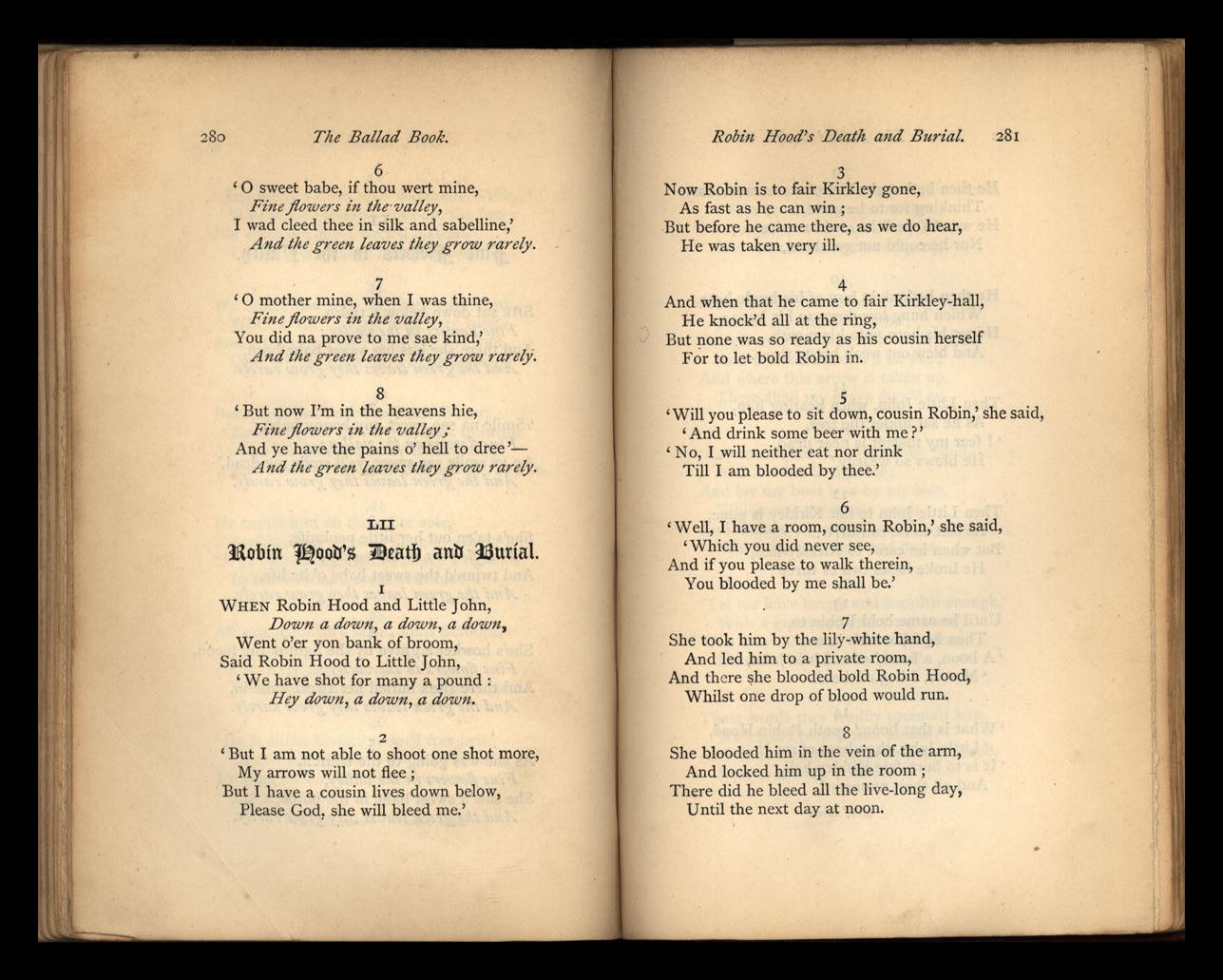
Robin Hood's Death alld Burial.
3
Now Robin is to fair Kirkley gone, As fast as he can win; But before he came there, as we do hear, He was taken very ill.
4
And when that he came to fair Kirkley-hall, He knock'd all at the ring, But none was so ready as his cousin herself For to let bold Robin in.
5
'Will you please to sit down, cousin Robin,' she said, , And drink some beer with me?'
, No, I will neither eat nor drink Till I am blooded by thee.'
6
'Well, I have a room, cousin Robin,' she said, 'Which you did never see, And if you please to walk therein, You blooded by me shall be.'
7
She took him by the lily-white hand, And led him to a private room, And th ere blooded bold Robin Hood, Whilst one drop of blood would run.
8
She blooded him in the vein of the arm, And locked him up in the room; There did he bleed all the live-long day, Until the next day at noon.
282 The Ballad Book.
9
He then bethought him of a casement door, Thinking for to be gone; He was so weak he could not leap, N or he could not" get down .
10
He then bethought him of his bugle-horn, Which hung low down to his knee; He set his horn unto his mouth, And blew out weak blasts three.
II
Then Little John, when hearing him, As he sat under the tree, , I fear my master is near dead, He blows so wearily.'
12
Then Little John to fair Kirkley is gone, As fast as he can dri'e ; But when he came to Kirkley-hall, He broke locks two or three:
13
Until he came bold Robin to, Then he fell on his knee : , A boon, a boon,' cries Little John, 'Master, I beg of thee.'
14
'What is that boon,' quoth Robin Hood, , Little John, thou begs of me ?' 'It is to burn fair Kirkley-hall, And all their nunnery.' 'dri'e,' drive.
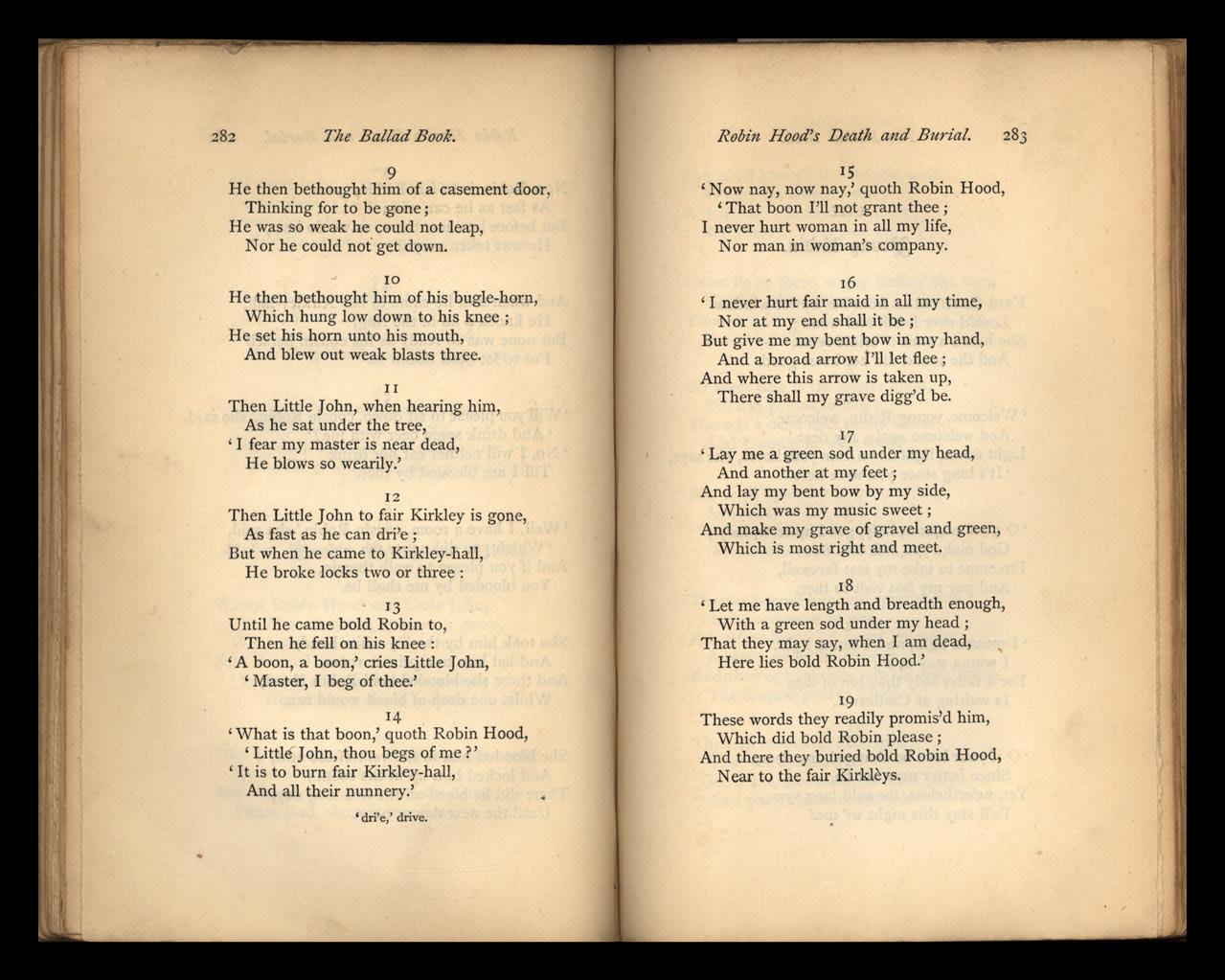
Robin Hood's Deatlt and Burial.
15
'Now nay, now nay,' quoth Robin Hood, , That boon I'll not grant thee; I never hurt woman in all my life, N or man in woman's company.
16
, I never hurt fair maid in all my time, N or at my end shall it be ; But give me my bent bow in my hand, And a broad arrow 1'11 let flee; And where this arrow is taken up, There shall my grave digg'd be.
17
, Lay me a green sod under my head, And another at my feet; And lay my bent bow by my side, Which was my music sweet; And make my grave of gravel and green, Which is most right and meet.
18
, Let me have length and breadth enough, With a green sod under my head; That they may say, when I am dead, Here lies bold Robin Hood.'
19
These words they readily promis'd him, Which did bold Robin please; And there they buried bold Robin Hood, N ear to the fail' Kirkleys.
Tile Ballad Book. LIII
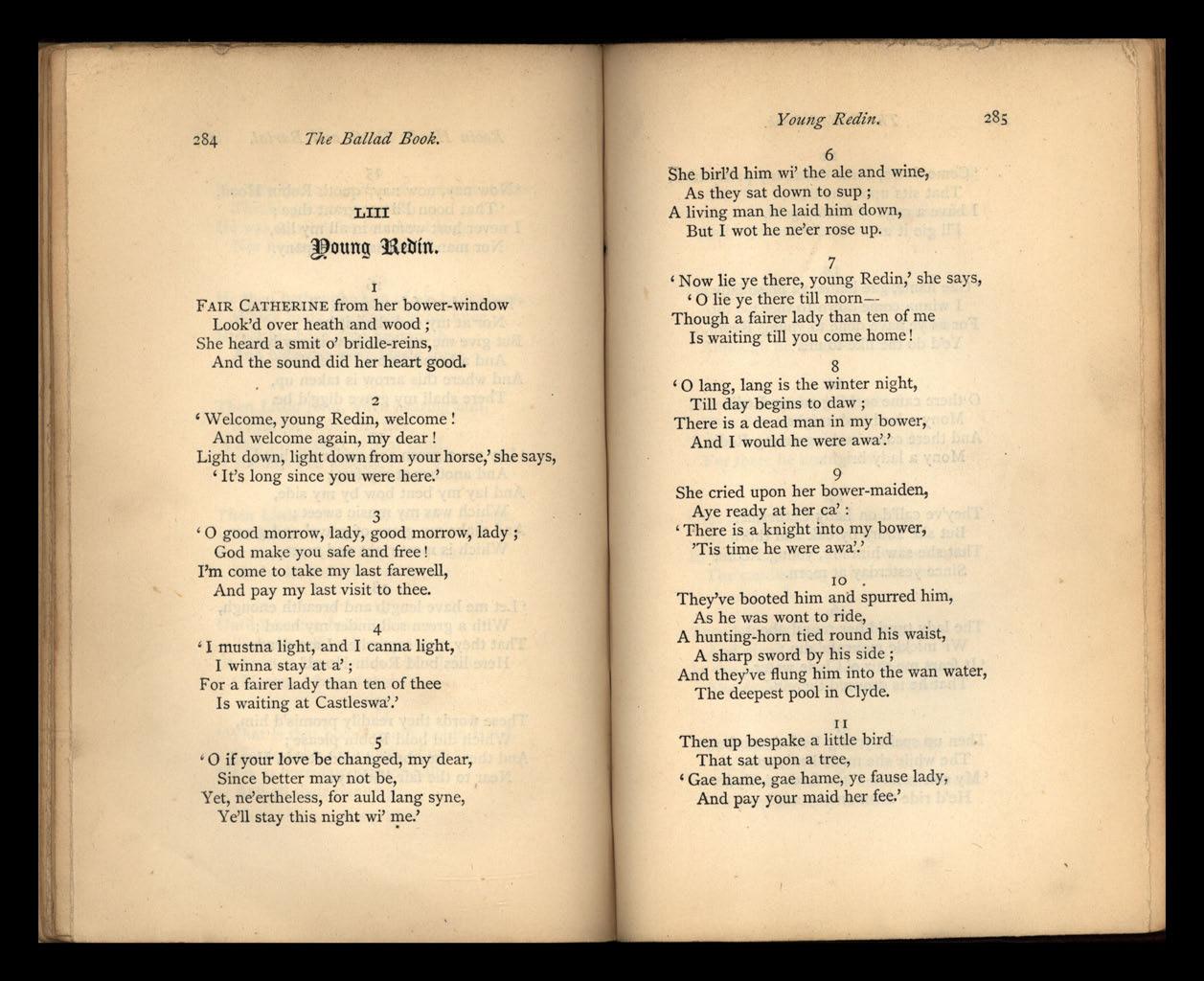
FAIR CATHERINE from her bower-window
Look'd over heath and wood; She heard a smit 0' bridle-reins, And the sound did her heart good.
2
, Welcome, young Redin, welcome! And welcome again, my dear!
Light down, light down from your horse,' she says, 'It's long since you were here.'
3
'0 good morrow, lady, good morrow, lady; God make you safe and free!
I'm come to take my last farewell, And pay my l as t visit to thee.
4
' I mustna light, and I canna light, I winna stay at a' ; For a fairer lady than ten of thee Is waiting at Castleswa' .'
5
, 0 if your love be changed, my dear, Since bett er may not be, Yet, ne'erthel ess , for auld lang syne, Ye'll stay this night wi' I!le.'
YOUllg Redin.
6
She birl'd him wi' the ale and wine, As they sat down to sup; A living man he laid him down, But I wot he ne'er rose up.
7
, Now lie ye there, young Redin,' she says, , 0 lie ye there till morn -Though a fairer lady than ten of me Is waiting till you come hom e !
8 , 0 lang, lang is the wint er ni ght, Till day begins to daw ; There is a dead man in my bowe r, And I would he were awa'.'
9
She cried upon her bower-maiden, Aye ready at her ca' :
, There is a knight into my bower, 'Tis time he were awa'.'
10 .
They've booted him and spurred him, As he was wont to ride, A hunting-horn tied round his waist, A sharp sword by his side;
And they've flung him into the wan water, The deepest pool in Clyde.
II
Then up bespake a little bird
That sat upon a tree, , Gae hame, gae hame, ye faus e lady, And pay your maid her fee.'
286 · The Ballad Book.
12
, Come down, come down, my pretty bird, That sits upon the tree; I have a cage of beaten gold, I'll gie it unto thee.'
13
, Gae hame, gae hame, ·ye fause lady; I winna come down to thee; For as ye have done to young Redin, Ye' d do the like to me.'
14
o there came seeking young Redin
Mony a lord and knight, And there came seeking young Redin
Mony a lady bright.
15
They've calI'd on Lady Catherine, But she sware by oak and thorn
That she saw him not, young Redin, Since yesterday at morn.
16
The lady turn' d her round about, Wi' mickle mournfu' din:
, It fears me sair 0' Clyde water That he is drown'd therein.'
17
Then up spake young Redin's mother, The while she made her mane:
'My son kenn'd a' the fords 0' Clyde, He'd ride them ane by

Young Redill.
18
, Gar dive, gar dive! ' his father he cried, , Gar dive for gold and fee!
o wha will dive for young Redin's sake And wha will dive for me ?'
19
They dived in at ae pool-side, And out again at the other: 'We'll dive nae mair for young Redin, . Although he were our brother.'
20
Then out it spake a little bird
That flew above their head:
, Dive on, dive on, ye divers all, F or there he lies indeed.
21
, But leave off your day diving, And dive at dark of night; In the pool where young Redin lies in The candles they'll burn bright.'
22
They left off their day diving, And dived at dark of night; In the pool where young Redin lay The candles they burn'd bright
23
The deepest pool in a' the stream
They found young Redin in ; Wi' a great stone tied across the breast
To keep his body down.
288 Th e Ballad Book.
24
Then up and spake the little bird, Says, ' What needs a' this din? It was his light leman took his life And hided him in the linn.' '
25
She sware h er by the sun and moon, She sware by grass and corn, She hadna seen him, young Redin Since Monanday at mom. '
26
, It's surely been my bower-womano ill may her betide!
I ne 'er wad hae slain my young Redin, And thrown him in the Clyde.'
27
Now they hae cut baith fern and thorn, The bower-woman to brin .
And they hae made a big And put this maiden in ;
But the fire it took na on her cheek, It took na on her chin.
28
Out they hae ta'en the bower-woman, And put her mistress in ;
The flame took fast upon her cheek, Took fast upon her chin, Took fast upon her fair body, Because of her deadly sin. 'brin , ' burn.
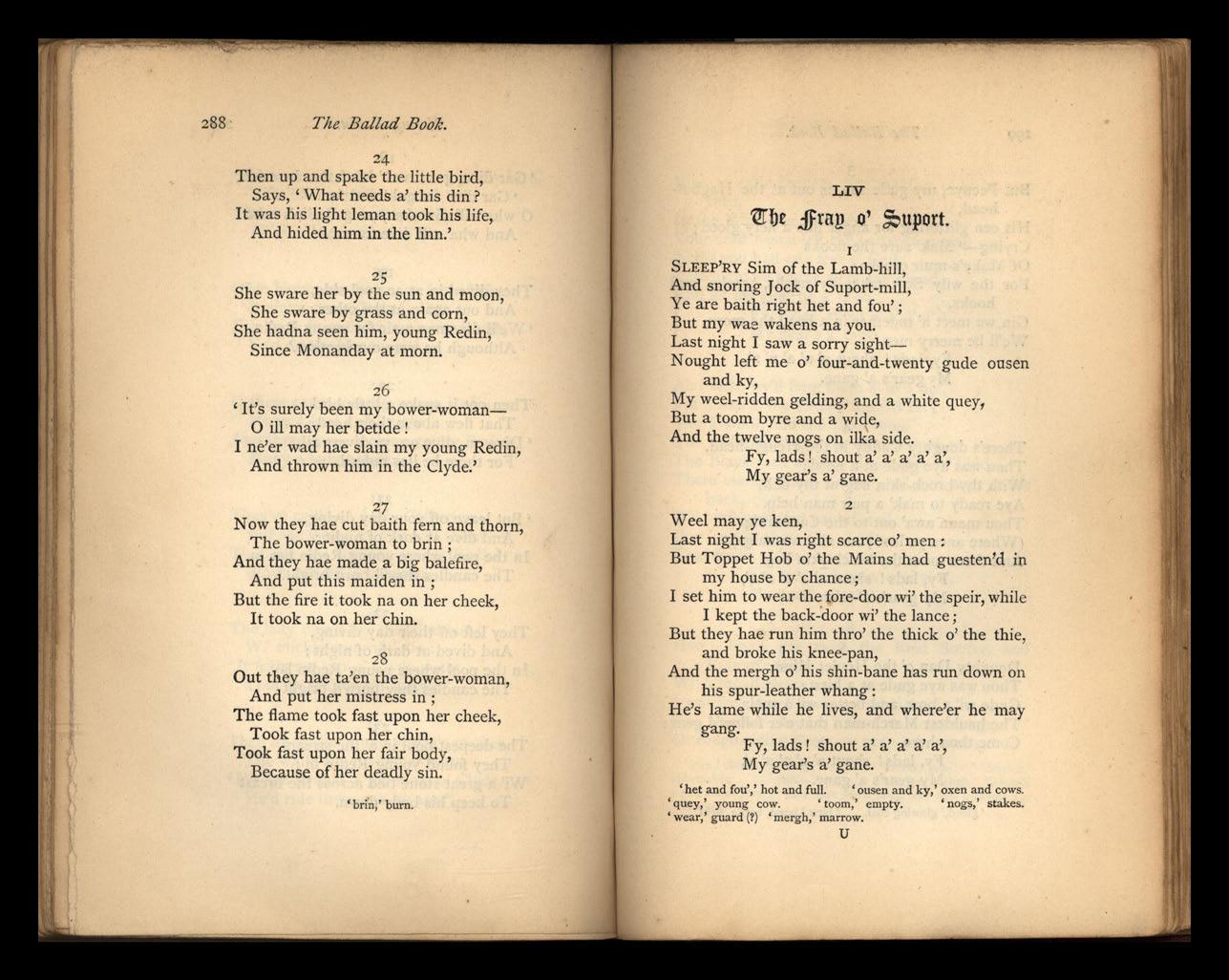
'([be jfra!! 0'
SLEEP'RY Sim of the Lamb-hill
And snoring Jock of Suport-mili,
Ye are baith right het and fou' ;
But my wae wakens na you.
Last night I saw a sorry sight-
N ought left me 0' four-and-twenty gude Ollsen and ky,
My weel-ridden gelding, and a white quey,
But a toom byre and a wide,
And the twelve nogs on ilka side.
Fy, lads! 'shout a' a' a' a' a',
My gear's a' gane. 2
Weel may ye ken,
Last night I was right scarce 0' men;
But Topp et Hob 0' the Mains had guesten'd in my house by chance;
I set him to wear fore-door wi' the speir, while I kept the back-door wi' the lance;
But they hae run him thro' the thick 0' the thie and broke his knee-pan, '
And the mergh 0' his shin-bane has run down on his spur-leather whang :
He's lame while he lives, and where'er he may gang.
Fy, lads! shout a' a' a' a' a',
M y gear's a' gane.
, 'het ,and fou',' hot and full. (ousen and ky,' oxen and cows. quey, young cow. 'toom,' empty. 'nogs,' stakes. wear,' guard (1) 'mergh, J marrow.
Tile Ballad Book.
3
But Peenye, my gude son, is out at the Hagbuthead,
His een glittering for anger like a fiery gleed; Crying-' Mak' sure the nooks Of Maky's-muir crooks; For the wily Scot takes by nooks, crooks, and hooks.
Gin we meet a' together in a head the morn, We'U be merry men.'
Fy, lads! shout a' a' a' a' a',
My gear's a' gane.
4
There's doughty Cuddy in the Heugh-head, Thou was aye gude at a need; With thy brock-skin bag at thy belt,
Aye ready to mak' a puir man help.
Thou maun awa' out to the Cauf-craigs
(Where anes ye lost your ain twa naigs), And there toom thy brock-skin bag.
Fy, lads! shout a' a' a' a' a',
My gear's a' ta'en.
5
Doughty Dan 0' the Houlet Hirst, Thou was aye gude at a birst ; Gude wi' a bow, and better wi' a speir, The bauldest March-man that e'er follow'd gear: Come thou here.
Fy, lads! shout a' a' a' a' a',
M y gear's a' gane.
gleed,' glowing coal. I birst, ' burst, battle, fight.

The Fray o' Sttport.
6
Rise, ye carle coopers, frae making 0' kirns and tubs,
In the Nicol forest woods.
Your craft hasna left the value of an oak rod.
But if you had ony fear 0' God, Last night ye hadna slept sae sound, And let my gear be a' ta'en.
Fy, lads! shout a' a ' a' a' a',
My gear's a'ta'en.
7
Ah! lads, we'll fang them a' in a net,
For I hae a' the fords 0' Liddel set·
The Dunkin and the Door-loup, '
The Willie-ford and the Water-slack
The Black-rack and the Trout-dub of Liddel.
There stands John Forster, wi' five men at his back,
Wi' bufft coat and cap of steil.
Boo! ca' at them e'en, Jock; That ford's sicker, I wat weil.
Fy, lads! shout a' a' a' a' a', My gear's a' ta'en.
8
Hoo! hoo! gar raise the Reid Souter, and Ringan's Wat.
Wi' a broad elshin and a wicker I wat weil they'll mak' a ford sicker.
Sae, whether they be Elliots or Arrnstrangs
Or rough-riding Scots, or rude Johnstones, '
'kirn,' chum. , 'fa,ng:' catch. 'sicker/ sure. 'Souter,' shoemaker. . elshln, awl. ' wicker,' switch. [They'U make a ford sure, If they have but a broad awl and a switch fot' weapons.]
u.
The Ballad Book.
Or whether they be frae the Tarras or Ewsdale, They maun turn and fight, or try the deeps 0' Liddel.
Fy, lads! shout a' a' a' a' a',
My gear's a'ta'en.
9
, Ah! but they will play ye anither jigg, For they will out at the big rig, And thro' at Fargy Grame' s gap.'
But 1 hae anither wile for that:
For 1 hae little Will, and Stalwart Wat, And lang Aicky, in the Souter Moor , Wi' his sle uth-dog sits in his watch right sure.
Gin the dog gie a bark, He'll be out in his sark, And die or win.
Fy, lads! shout a' a' a' a' a ' ,
My gear's a' ta'en.
10
Ha! boys !-I see a party appearing-wha's yon ?
Methinks it's the Captain of Bewcastle, and J ephtha's John, Coming down by the foul steps of Catlowdie's loan: They'll make a ' sicker, come which way they will.
Ha, lads! shout a' a' a' a' a',
My gear's a' ta' en.
11
Captain Musgrave, and a' his band, Are coming down by the Siller-strand,
f ri g,' ridge.
And the Muckle toun-bell 0' Carlisle is rung: My gear was a' weel won, And before it's carried o'er the Border, mony a man's gae down.
Fy, lads! shout a' a' a' a' a',
My gear's a' gane.
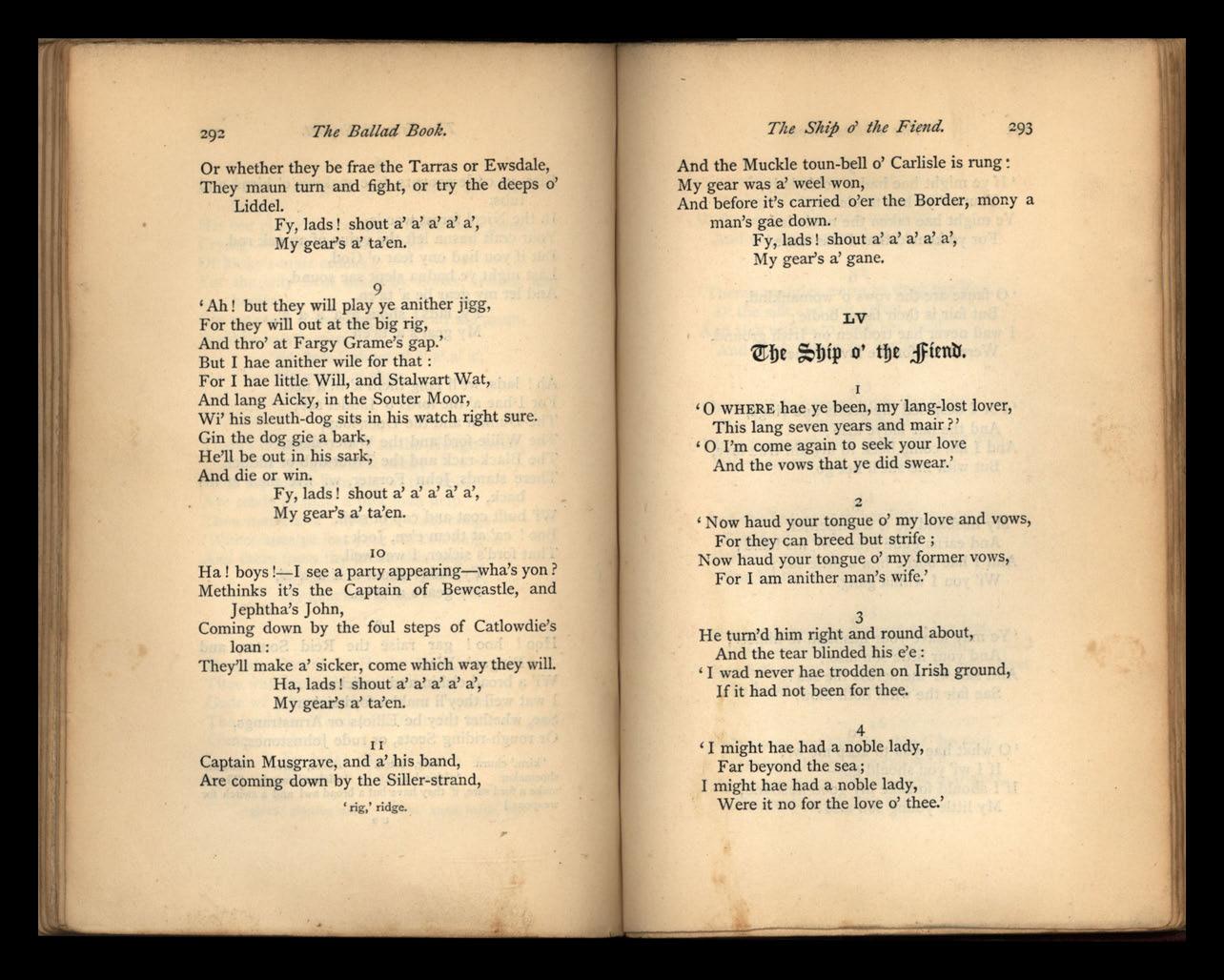
'm:be 0' jfirnb.
I
'0 WHERE hae ye been, my lang-Iost lover, This lang seven years and mair ?' '0 I'm come again to seek your love And the vows that ye did swear.'
2
, Now haud your tongue 0' my love and vows, For they can breed but strife; Now haud your tongue 0' my former vows, For 1 am anither man's wife.'
3
He turn'd him right and round about, And the teal' blinded his e'e : , 1 wad never hae trodden on Irish ground, If it had not been for thee.
4
I 1 might hae had a noble lady, Far beyond the sea; I might hae had a noble lady, Were it no for the love 0' thee.'
5
, If ye might hae had a noble lady, Yoursel' ye hae to blame; Ye might hae taken the noble lady, For ye kenn'd that I was nane.'
6
' 0 fause are the vows 0' womankind, But fair is their fause bodie
I wad never hae trodden on I;ish ground Were it no for the love 0 ' thee! '
7
, For I despised the pearls and rings, And the fair ladye also; And I am come back to my ain true love
But with me she'll not go.' '
8 ,
, My husband he is a carpenter, And earns gude bread wi' his hand; And I hae borne him a little son' Wi' you I winna gang.' '
9 , Ye may leave your husband to himsel', And your little son also; And sail wi' me across the sea: Sae fair the wind doth blow.'
10
, 0 what hae you to keep me wi', lf I wi' you should goIf I should forsake my good husband, My little young son also?'
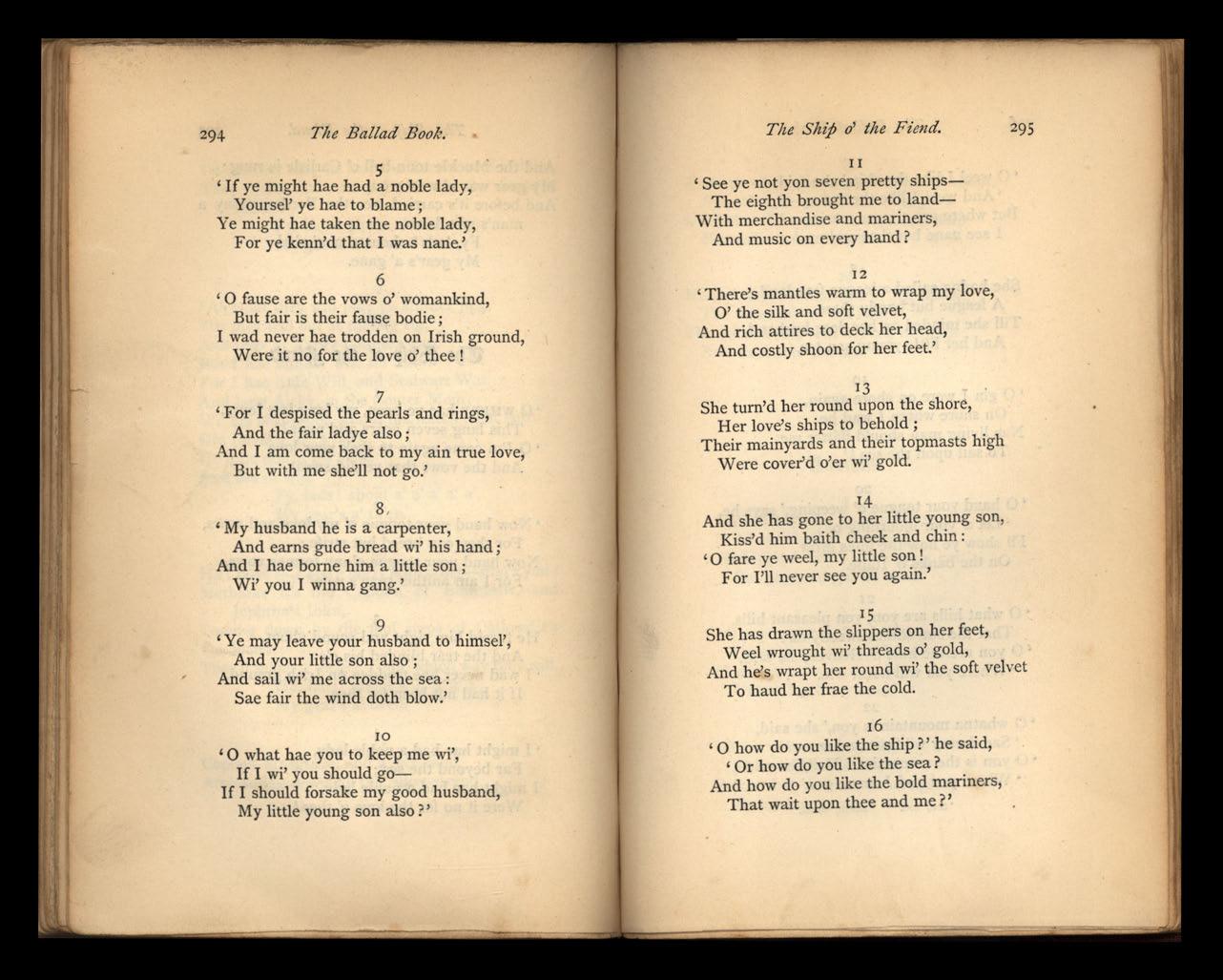
TIle SllijJ 0' the Fiend.
11
, See ye not yon seven pretty shipsThe eighth brought me to landWith merchandise and mariners, And music on every hand?
12
, There's mantles warm to wrap my love, 0' the silk and soft velvet, And rich attires to deck her head, And costly shoon for her feet.'
13
She tum'd her round upon the shore, Her love's ships to behold; Their mainyards and their topmasts high Were cover'd o'er wi' gold.
14
And she has gone to her little young son, Kiss'd him baith cheek and chin: '0 fare ye weel, my little son! For I 'll never see you again.'
She has drawn the slippers on her feet, Weel wrought wi' threads 0' gold, And he's wrapt her round wi' the soft velvet
To haud her frae the cold
16
, 0 how do you like the ship?' he said, , Or how do you like the sea?
And how do you like the bold mariners, That wait upon thee and me?'
The Ballad Book.
J7
, 0 weel I like the ship,' she said, , And weel I like the sea; But where are a' your mariners? I see nane but thee and me.'
18
She hadna sailed a league frae land, A league but barely three, Till she on her dear husband, And her little young son tee.
19
, 0 gin I were on shore again, On shore where I wad be, N ae living man should flatter me To sail upon the sea!'
20
, 0 haud your tongue 0' weeping,' says he, , Let a' your mourning be ; I'll show ye how the lilies grow On the banks 0' Italie.'
21
, 0 what hills are yon, yon pleasant hills, That the sun shines sweetly on ?'
, 0 yon are the hills 0' Heaven,' he said, , Where you will never win.'
22
, 0 whatna mountain is yon,' she said, 'Sae dreary wi' frost and snow?'
, 0 yon is the mountain 0' Hell,' he cried, , Where you and I maun go ! ' . tee,' too. ' maun, ' must.
Lamkt'1t.
23
And aye when she turn'd her round about, Aye taller he seem'd for to be ; Until that the tops 0' that gallant ship N ae taller were than he.
24 He strack the mainmast wi' his hand, The foremast wi' his knee; The gallant ship was broken in 'twain And, sank into the sea.
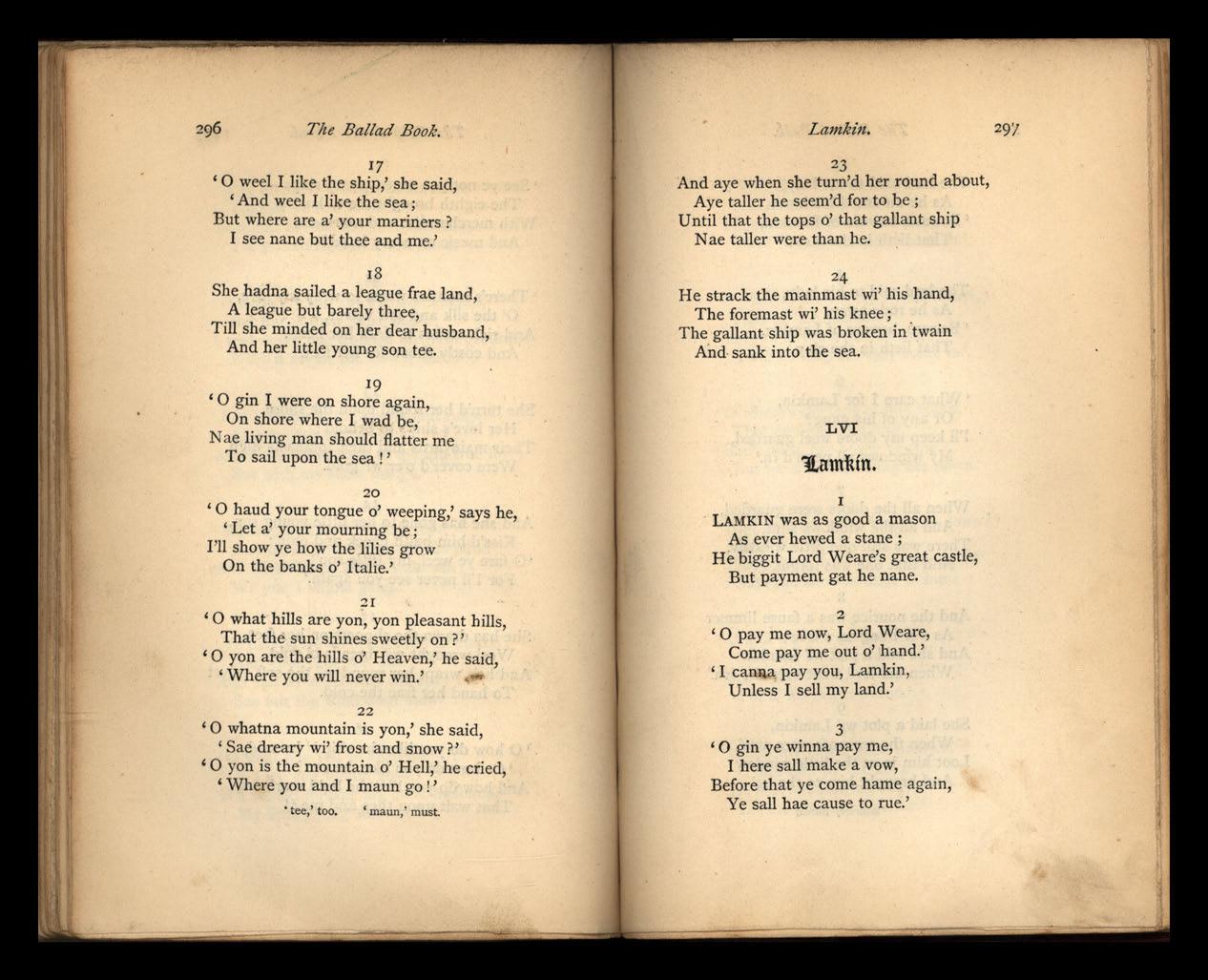
LAMKIN was as good a mason As ever hewed a stane ; He biggit Lord Weare' s great castle, But payment gat he nane.
2
'0 pay me now, Lord Weare, Come pay me out 0' hand.' , I pay you, Lamkin, Unless I sell my land.'
3
, 0 gin ye winna pay me, I here saIl make a vow, Before that ye come hame again, Ye saIl hae cause to rue.' 29'1
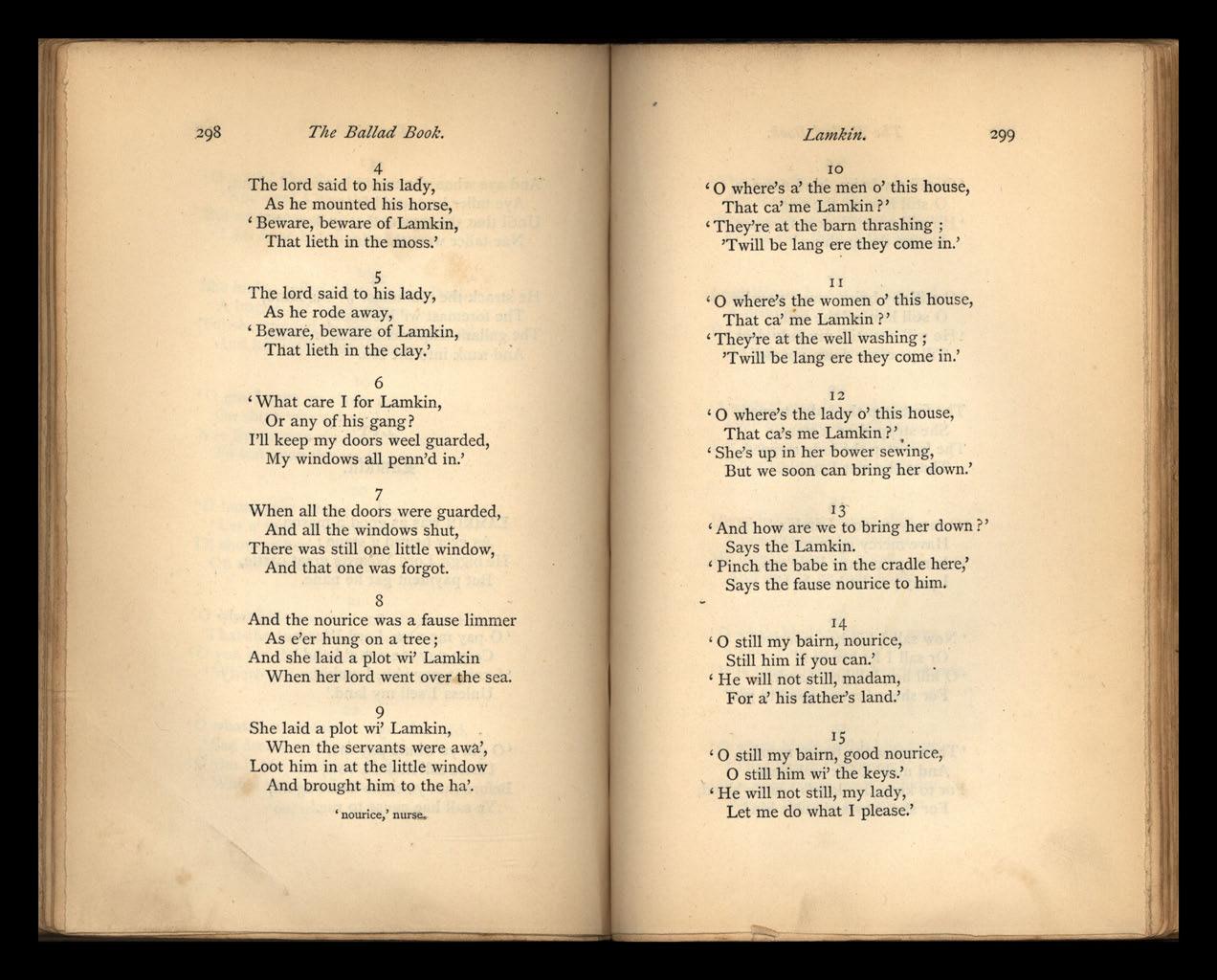
The Ballad Book.
4
The lord said to his lady, As he mounted his horse, 'Beware, beware of Lamkin, That lieth in the moss.'
5
The lord said to his lady, As he rode away, 'Beware, beware of Lamkin, That lieth in the clay.'
6
'What care I for Lamkin, Or any of his gang?
I'll keep my doors weel guarded, My windows all penn'd in.'
7
When all the doors were guarded, And all the windows shut,
There was still one little window, And that one was forgot.
8
And the nourice was a fause limmer As e'er hung on a tree; And she laid a plot wi' Lamkin When her lord went over the sea.
9
She laid a plot wi' Lamkin, When the servants were awa', Loot him in at the little window And brought him to the ha'. , nourice,' Lamkin.
10
'0 where's a' the men 0' this house, That ca' me Lamkin?'
, They're. at the barn thrashing; 'Twill be lang ere they come in.'
11
, 0 where's the women 0' this house, That ca' me Lamkin ?'
, They're at the well washing; 'Twill be lang ere they come in.'
12
, 0 where's the lady 0' this house, That ca's me Lamkin?'.
, She's up in her bower sewing, But we soon can bring her down.'
13
'And how are we to bring her down?' Says the Lamkin.
, Pinch the babe in the cradle here,' Says the fause nourice to him.
14
, 0 still my bairn, nourice, Still him if you can.'
, He will not still, madam, For a' his father's land.'
15
, 0 still my bairn, good nourice, o still him wi' the keys.'
, 'He will not still, my lady, Let me do what I please.'
300 TIle Ballad Book.
16
, 0 still my bairn, kind nourice, o still him wi' the ring.'
, He will not still, dear mistress, Let me do anything.'
17
, 0 still my bairn, sweet nourice, o still him wi' the bell.'
, He will not still, my lady dear, Till ye come down yoursel'.'
18
The first step the lady stepped, She on a stane; The last step the lady stepped, There she met Lamkin.
19
'0 mercy, mercy, Lamkin !
Have mercy upon me ! o harm ye not my little son, I pray you let him be ! '
20
, Now sall I kill her, nourice? Or sall I let her be ?'
, 0 kill her, kill her, Lamkin, For she ne'er was good to me.'
21
'Then scour the basin, nourice, And mak' it fair and clean, For to keep this lady's heart's blood, For she comes 0' noble kin.'
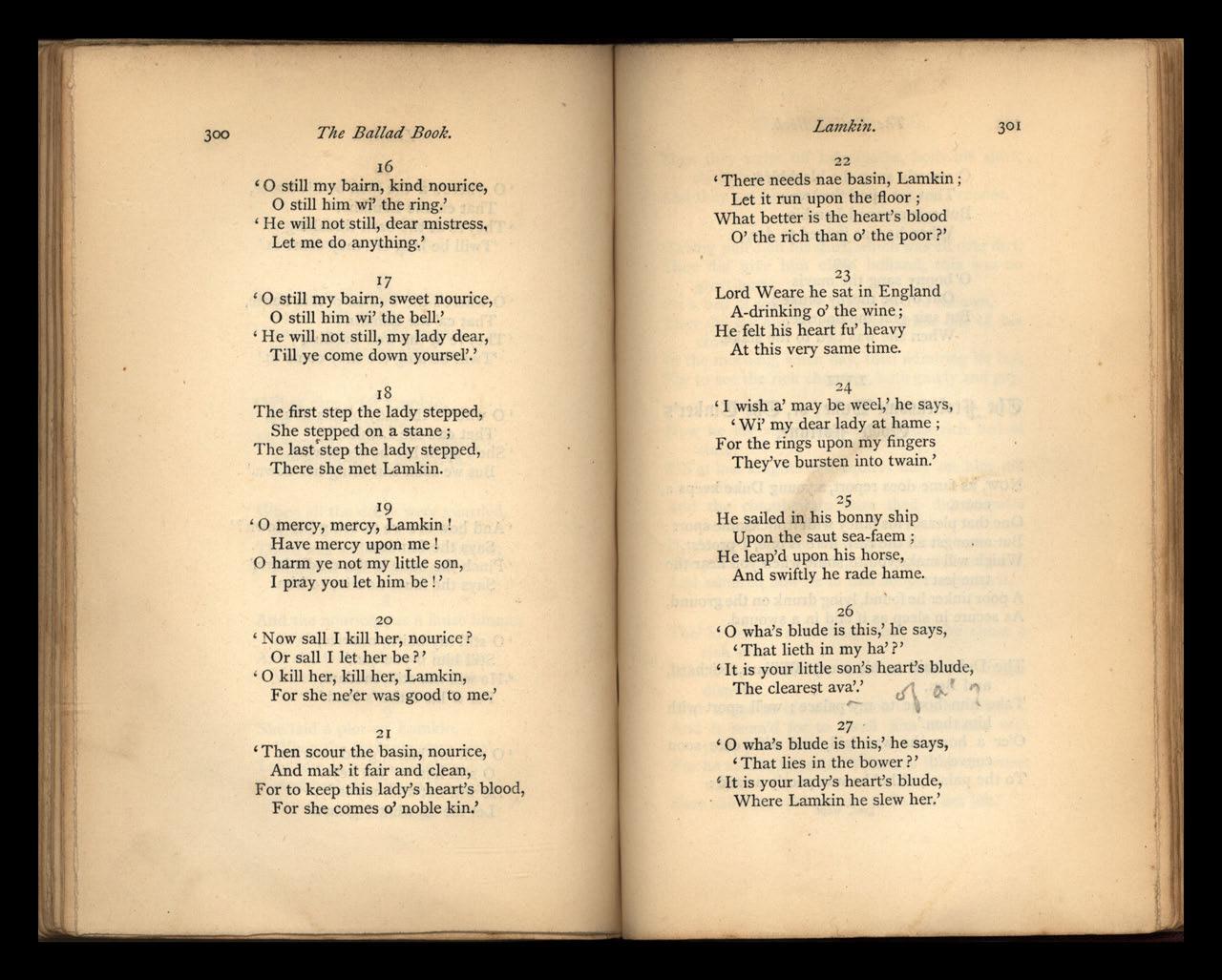
Lamki?l.
22
, There needs nae basin, Lamkin; Let it run upon the floor; What better is the heart's blood 0' the rich than 0' the poor ?'
23
Lord Weare he sat in England
A-drinking 0' the wine; He felt his heart fu' heavy At this very same time.
24 .' I wish a' may be weel,' he says, 'Wi' my dear lady at hame ; For the rings upon my fingers They've bursten into twain.'
25
He sailed in his bonny ship Upon the saut sea-faem ; He leap'd upon his horse, And swiftly he rade hame.
26
, 0 wha's blude is this,' he says, 'That lieth in my ha'?'
, It is your little son's heart's blude, The clearest ava'.' "",
27
, 0 wha's blude is this,' he says, , That lies in the bower?'
, It is your lady's heart's blude, Where Lamkin he slew her.'
302
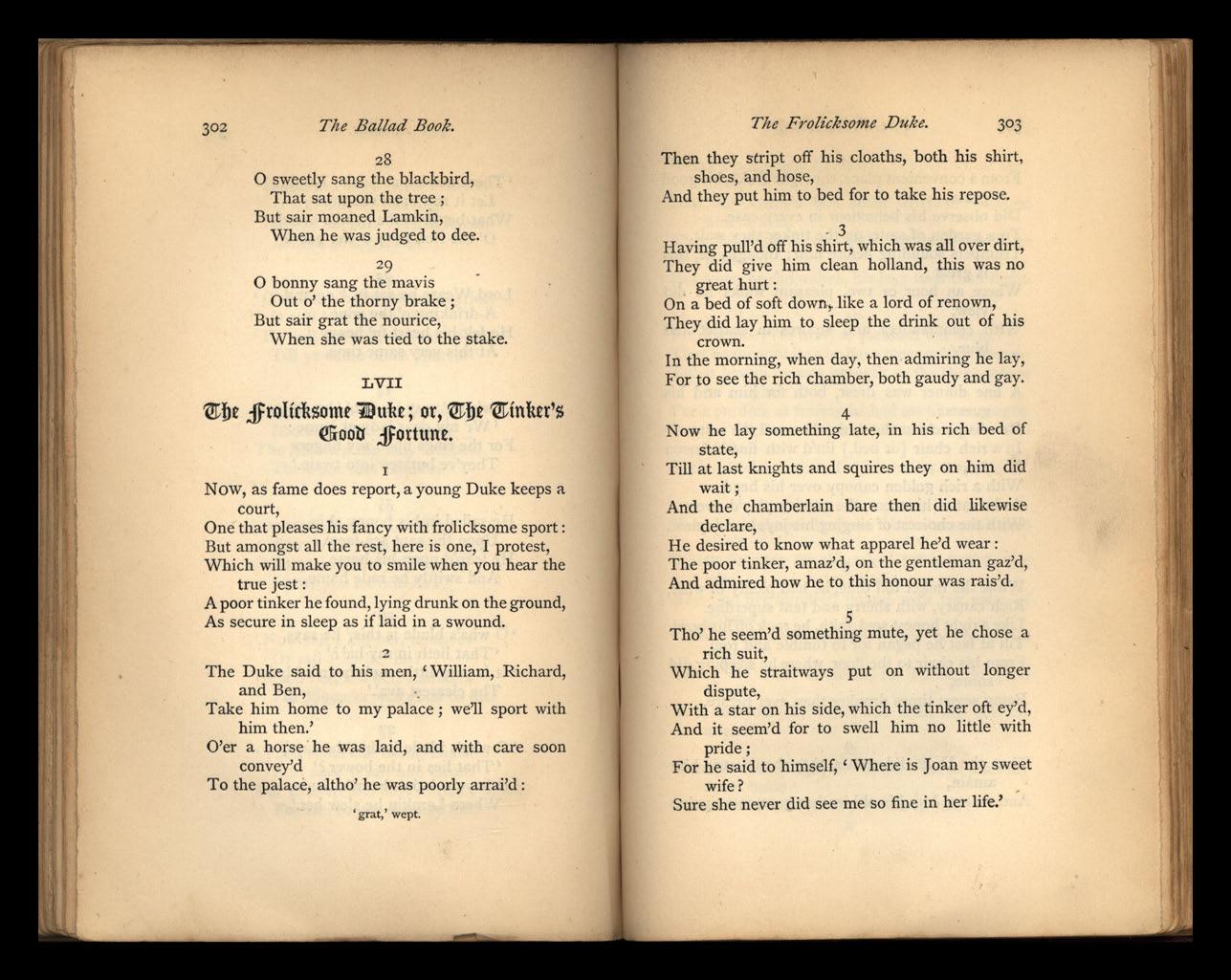
Tile Ballad Book.
28
o sweetly sang the blackbird, That sat upon the tree; But sair moaned Lamkin, When he was judged to dee.
29
o bonny sang the mavis Out 0' the thorny brake; But sair grat the nourice, When she was tied to the stake.
jfrolicksomr 19uke j or, -m;inker's Q£oob' jfortune.
INow, as fame does report, a young Duke keeps a court,
One that pleases his fancy with frolicksome sport:
But amongst all the rest, here is one, I protest, Which will make you to smile when you hear the true jest:
A poor tinker he found, lying drunk on the ground, As secure in sleep as if laid in a swound.
2
The Duke said to his men, 'William, Richard, and Ben, Take him home to my palace; we'll sport with him then.'
O'er a horse ' he was laid, and with care soon convey'd
To the palace, altho' he was poorly arrai'd:
C grat,' wept.
Tlte Frolicksome Duke.
Then they stript off his cloaths, both his shirt, shoes, and hose,
And they put him to bed for to take his repose.
. 3
Having pull'd off his shirt, which was all over dirt, They did give him clean holland, this was no great hurt:
On a bed of soft down, like a lord of renown, They did lay him to sleep the drink out of his crown.
In the morning, when day, then admiring he lay, For to see the rich chamber, both gaudy and gay.
4
Now he lay something late, in his rich bed of state,
Till at last knights and squires they on him did wait;
And the chamberlain bare then did likewise declare,
He desired to know what apparel he'd wear:
The poor tinker, amaz'd, on the gentleman gaz'd, And admired how he to this honour was rais'd.
5
Tho' he seem'd something mute, yet he chose a rich suit,
Which he straitways put on without longer dispute,
With a star on his side, which the tinker oft ey'd, And it seem'd for to swell him no little with pride;
F or he said to himself, 'Where is Joan my sweet wife?
Sure she never did see me so fine in her life.'
Tlu Ballad Book.
6
From a convenient place, the right Duke, his good grace,
Did observe his behaviour in every case.
To a garden of state, on the tinker they wait, Trumpets sounding before him: thought he, this is great:
Where an hour ' or two, pleasant walks he did view,
With commanders and squires in scarlet and blue.
7
A fine dinner was drest, both for him and his guests:
He was plac' d at the table above all the rest, In a rich chair [or bed,] lin'd with fine crimson red,
With a rich golden canopy over his head:
As he sat at his meat, the musick play'd sweet, With the choicest of singing his joys to compleat.
8
While the tinker did dine, he had plenty of wine, Rich canary, with sherry and tent superfine.
Like a right honest soul, faith, he took offhis bowl, Till at last he began for to tumble and roul
From his chair to the floor, where he sleeping did snore, Being seven times drunker than ever before.
9
Then the Duke did ordain, they should strip him amain,
And restore him his old leather garments again:

Tlu Frolicksome Duke. 30 5
'Twas a point next the worst, yet perform it they must,
And they carry'd him strait where they found him at first.
Then he slept all the night, as indeed well he might;
But when he did waken, his joys took their flight.
10
For his glory [to him] so pleasant did seem,
That he thought it to be but a meer golden dream;
Till at length he was brought to the Duke, where he sought
For a pardon, as fearing he had set him at nought,
But his highness he said, 'Thou'rt a jolly bold blade:
Such a frolick before, I think, never was plaid.'
11
Then his highness bespoke him a new suit and cloak,
Which he gave for the sake of this frolicksome joke,
Nay, and five hundred pound, with ten acres of ground:
'Thou shalt never,' said he, ' range the counteries round,
Crying old brass to mend, for I'll be thy good friend,
Nay, and Joan thy sweet wife shall my duchess attend.'
12
Then the tinker reply'd: 'What! must J oan my sweet bride
Be a lady in chariots of pleasure to ride? x
TI,e Ballad Book.
we have gold and land ev'ry day at command?
Then I shall be a squire, I well understand. Well I thank your good grace, and your love embrace; I was never before in so happy a case ! '

LORD INGRAM and Childe Vyet
\Vere both born in one hall; And both laid their loves on one lady,The worse did them befall
2
Lord Ingram woo'd Lady Maisry
From father and from mother;
Lord Ingram woo'd Lady Maisry
From sister and from brother.
3
Lord Ingram woo'd Lady Maisry
With leave of all her kin:
But Childe Vyet woo'd herself alone, And she loved none but him.
4
Now Lady Maisry she sat in her bower
Dressing her hair one day; And in there came her proud father, In robes and rich array.
Chi/de Vyet/ or, The Brothers.
5 , Get up now, Lady Maisry, Put on your wedding-gown; For this is the and Lord Ingram's here, And your wedding must be done! '
6
, 0 where shall I get a bonny boy Will win gold to his fecWill run unto Childe Vyet's ha' With this letter from m e ?
7 , I'd rather be Childe Vyet's wife, The white fish for to sell, Before I'd be Lord Ingram's wife, To wear the silks so well.
8 , I'd rather be Childe Vyet's wife With him to beg my bread. ' Before I'd be Lord Ingram's To wear the gold so red.'
9
'0 here I am, the boy,' says one, , Will win gold to his fee, And carry any letter away To Childe Vyet from thee.'
10
The first line that Childe Vyet read, The tear blinded his e' e; The next line that he looked on, An angry man was he.
X2
Tile BaLlad Book. II
, What ails my own brother,' he says, , That he'll not let my Love be ? But I'll come in haste to my brother·s wedding; My lady she shall be free! '
12
But when he came to his brother's wedding, Childe Vyet could ne'er get in ; For every gate was guarded weel, And his way he might not win.
13
'Tween Mary Kirk and the Castle 'Twas all spread o'er with garl, To keep the lady and her maidens From treading upon the mar!'
14
From Mary Kirk to the Castle Was spread a cloth of gold, To keep that l ady and her maidens From setting foot on the mould.
15
There was no cook in the kitchen That got not a gown of gray; And a' was blithe and gladsome; But Lady Maisry was wae.
16
There was not a groom in the stable That got not a coat of green; And a' was blithe and gladsome ;Lady Maisry, she was wi' wean. • gad,' gravel (I)
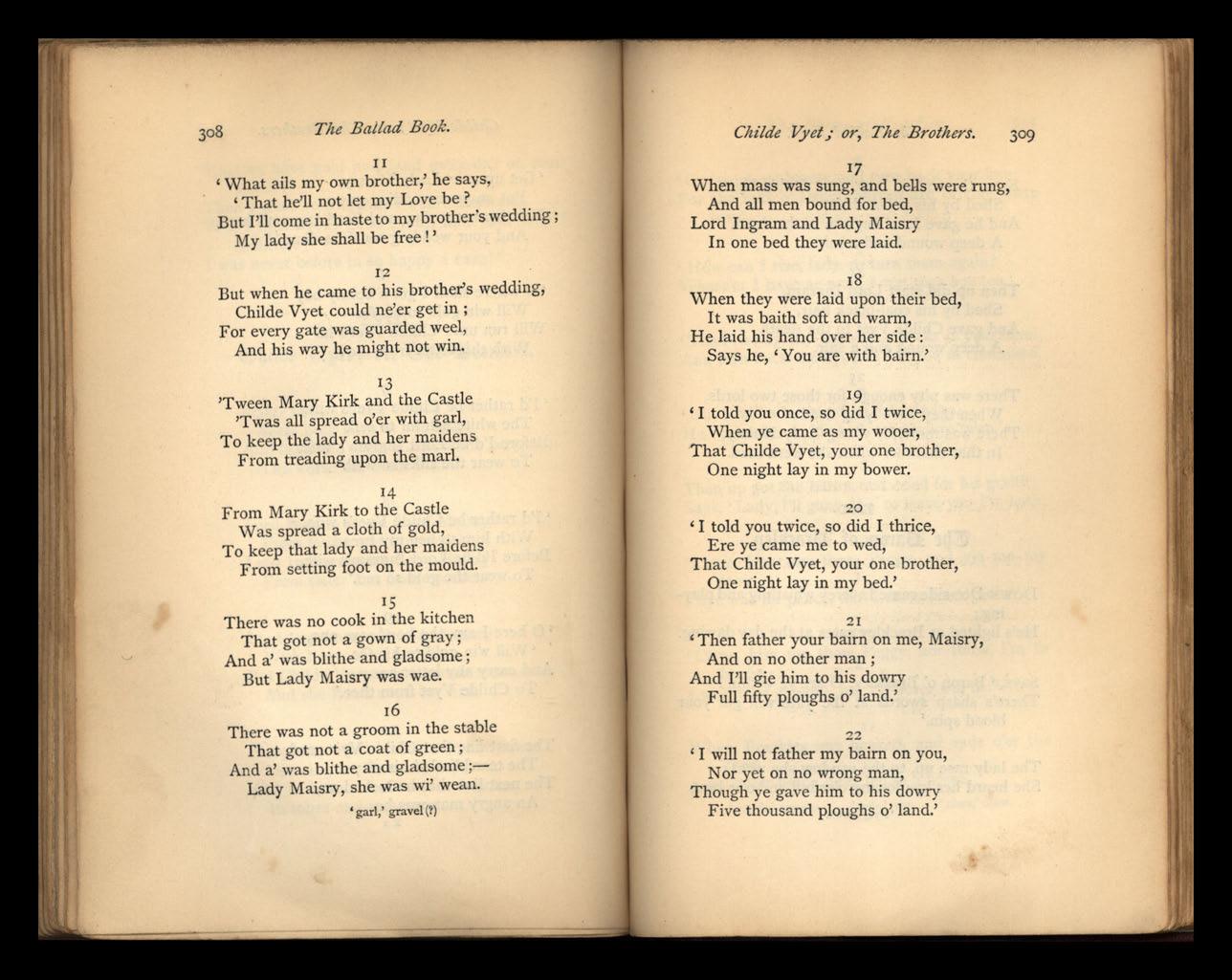
CMlde Vyet / OY, Tile Brotlters.
17
When mass was sung, and bells were rung, And all men bound for bed, Lord Ingram and Lady Maisry In one bed they were laid.
18
·When they were laid upon their bed, It was baith soft and warm, He laid his hand over her side: Says he, 'You are with bairn.'
19
' I told you once, so did I twice, When ye came as my wooer, That Childe Vyet, your one brother, One night lay in my bower.
'I told you twice, so did I thrice, Ere ye came me to wed, That Childe Vyet, your one brother, One night lay in my bed.'
21
, Then father your bairn on me, Maisry, And on no other man; And I'll gie him to his dowry Full fifty ploughs 0' land.'
22
, I will not father my bairn on you, N or yet on no wrong man, Though ye gave him to bis dowry Five thousand ploughs 0' land.'
3
10 The Ballad Book.
23
From the curtain leap' d out Childe Vyet, Shed by his yellow hair, And he gave Lord Ingram to the death A deep wound and a sair.
24
Then up did start Lord Ingram, Shed by his coal-black hair, And gave Childe Vyet to the death
A deep wound and a sair.
25
There was pity for those two lords, When they were lying dead; There was more for young Lady Maisry, In th a t chamber when she went mad. LIX ;J:Saron of ;J:Sraddel1.
DOWN Dee-side came Inverey whistling and playing; He's lighted at Brackley yates at the day dawing.
2
Says, ' Baron 0' Brackley, 0 are ye within? There's sharp swords at the yate will gar your blood spin.'
3
The lady rase up, to the window she went; She heard her kye lowing o'er hill and o'er bent 'kye,' cows.
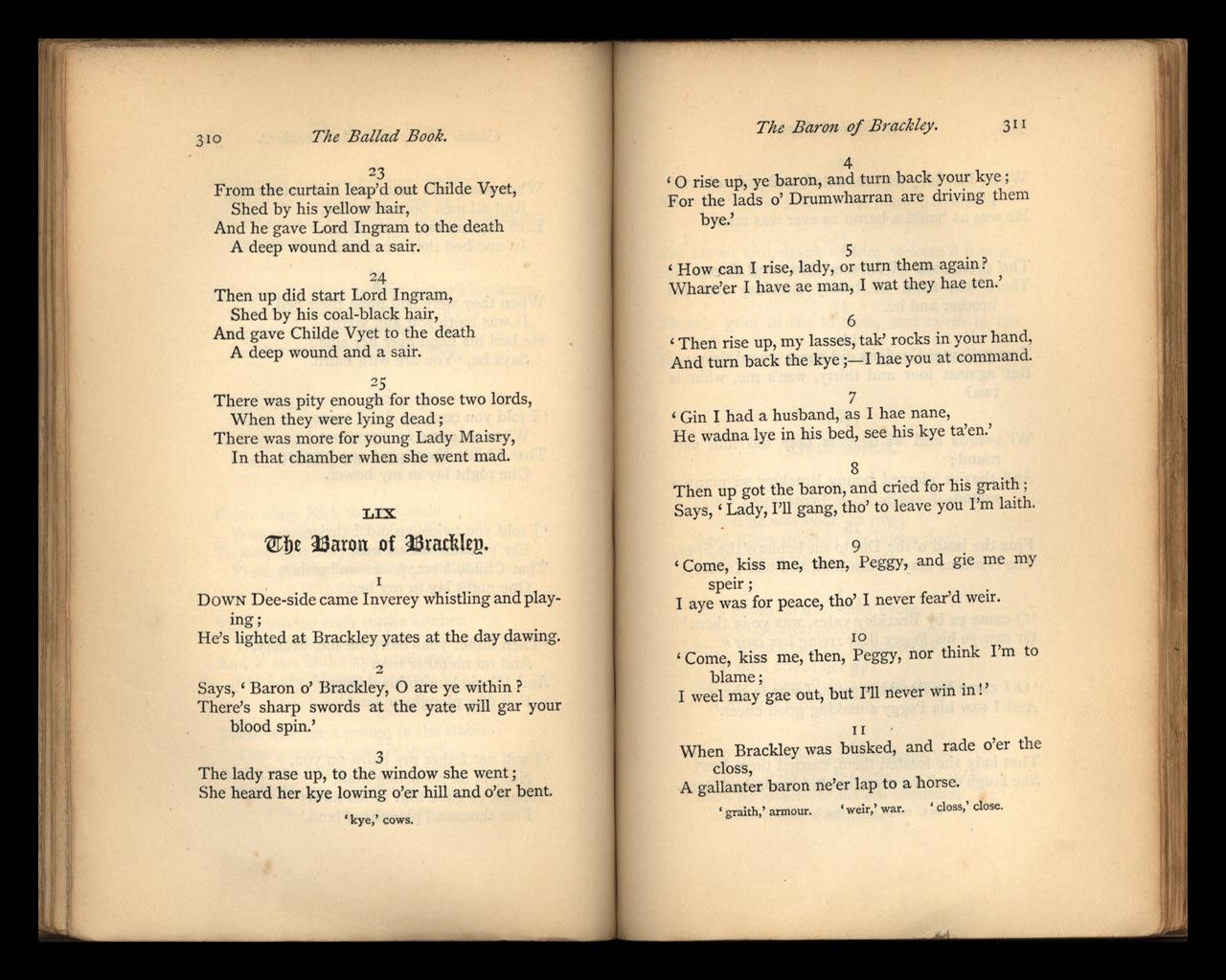
TIle Baron of Brackley. 31 I
4
, 0 rise up, ye baron, and turn back your kye ; For the lads 0' Drumwharran are driving th em bye.'
5
'How can I rise, lady, or turn them again? Whare'er I have ae man, I wat they hae ten.'
6
, Then rise up, my lasses, t ak' rocks in your hand, And turn back the kye ;-1 hae you at command.
7
, Gin I had a husband, as I hae nane, He wadna lye in his bed, see his kye ta'e n.'
8
Then up got the baron, and cried for his graith; Says, ' Lady, I'll gang, tho' to leave you I'm laith .
9
'Come, kiss me, then, Peggy, and gie me my speir;
I aye was for peace, tho' I never fear'd weir.
10
'Come, kiss me, then, Peggy, nor think I'm to blame;
I weel may gae out, but I'll never win in!'
II
When Brackley was busked, and rade o'er the closs, A gallanter baron ne'er lap to a horse.
C graith,' armour. 'weir,' war. 'closs,' close .
3 12 The Ballad Book.
When Brackley was mounted, and rade o'er the green, He was as bauld a baron as ever was seen .
Tho' there cam' wi' Inverey thirty and three, There was nane wi' bonny Brackley but his brother and he .
14
Twa gallanter Gordons did never sword draw; But against four and thirty, wae's me, what is twa?
15
Wi' swords and wi' daggers they did him surround;
And they've pierced bonny Brackley wi' many a wound .
Frae the head 0' the Dee to the banks 0' the Spey, The Gordons may mourn him, and ban Inverey. 17
'0 came ye by Brackley yates, was ye in there? Or saw ye his Peggy dear riving her hair ?' 18
'0 I came by Brackley yates, I was in there, And I saw his Peggya-making good cheer.'
19
That lady she feasted them, carried them ben; She laugh'd wi' the men that her baron had slain. , ban,' curse. I ben,' within.
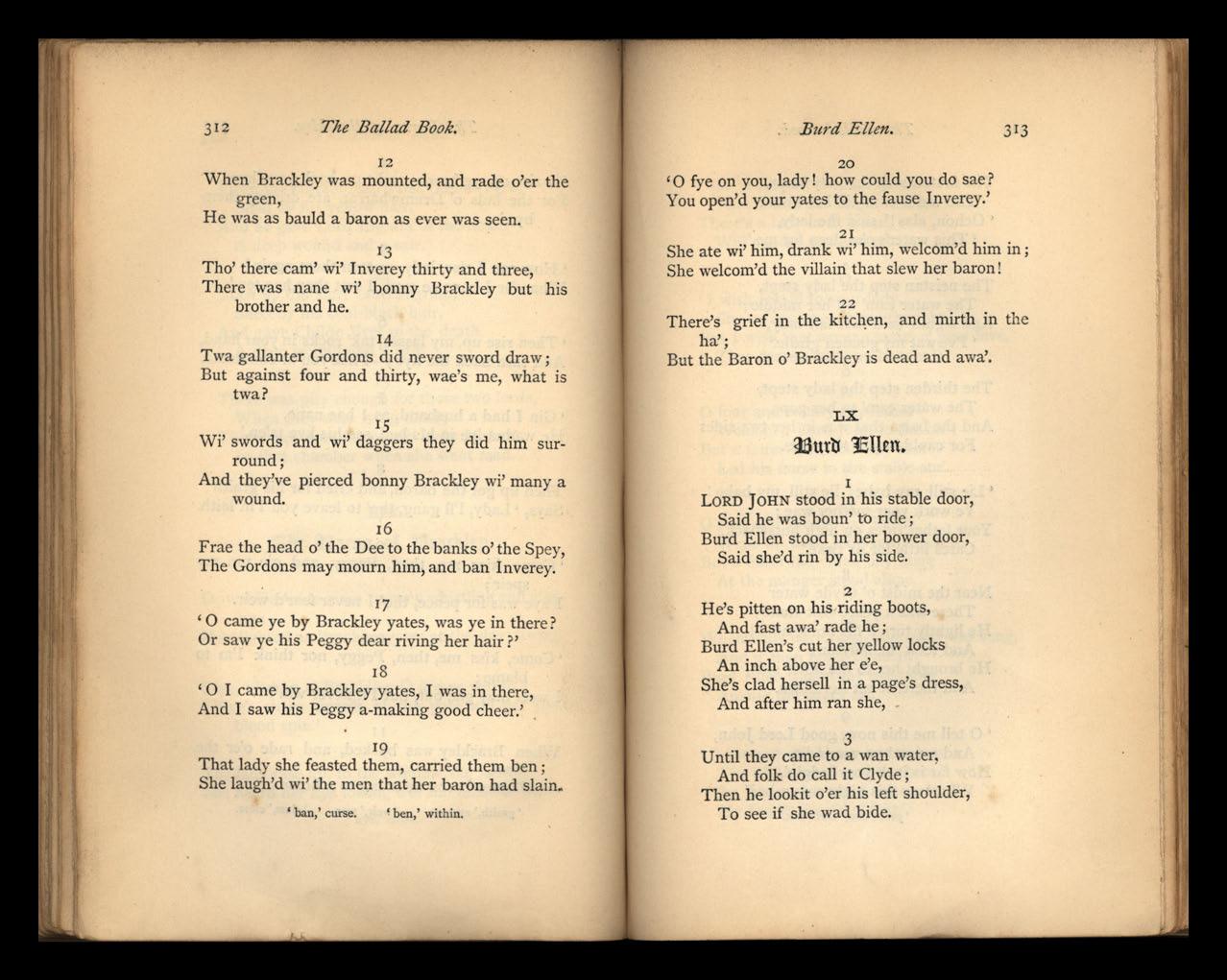
Burd Ellm.
20
'0 fye on you, lady! how could you do sae? You open'd your yates to the fause Inverey.'
21 3 13
She ate wi' him, drank wi' him, welcom'd him in; She welcom'd the villain that slew her baron!
There's grief in the kitchen, and mirth in the ha"
But the'Baron 0' Brackley is dead and awa'.
;)Burb lEntll . I
LORD JOHN stood in his stable door, Said he was boun' ro ride; Burd Ellen stood in her bower door, Said she'd rin by his side 2
He's pitten on his riding boots, And fast awa' rade he; Burd Ellen's cut her yellow locks
An inch above her e'e, She's clad hersell in a page's dress, And after him ran she, 3
Until they came to a wan water, And folk do call it Clyde; Then he lookit o'er his left shoulder, To see if she wad bide.
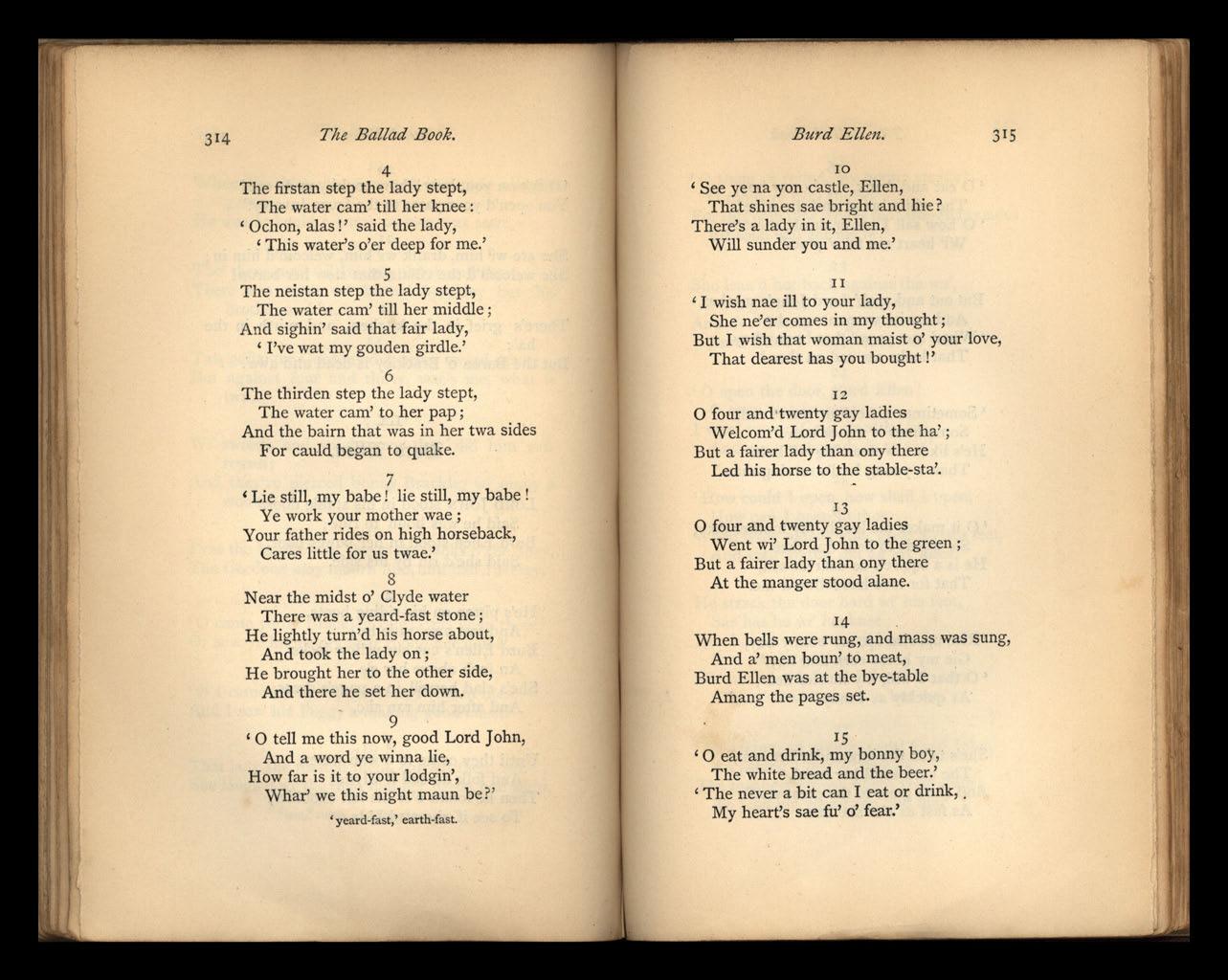
3 14 Tlte Ballad Book.
4
The firstan step the lady stept, The water cam' till her knee: , Ochon, alas!' said the lady, , This water's o'er deep for me.'
5
The neistan step the lady stept, The water cam' till her middle; And sighin' said that fair lady, , I've wat my gouden girdle.'
6
The thirden step th e lady stept, The water cam' to her pap; And the bairn that was in her twa sides For cauld began to quake.
7
, Lie still, my babe! lie still, my babe! Ye work your mother wae ; Your father rides on high horseback, Cares little for us twae.'
8
N ear the midst 0' Clyde water
There was a yeard-fast stone; He lightly turn'd his horse about, And took the lady on; He brought her to the other side, And there he set her down.
9
, 0 tell me this now, good Lord John, And a word ye winna lie, How far is it to your lodgin', Whar' we this night maun be? ' 'yeard-fast,' earth-fast. Burd Ellm.
10
, See ye na yon castle, Ellen, That shines sae bright and hie? There's a lady in it, Ellen, Will sunder you and me.'
11
, I wish nae ill to your lady, She ne'er comes in my thought; But I wish that woman maist 0' your love, That dearest has you bought!'
12
o four and ' twenty gay ladies We1com'd Lord John to the ha'; But a fairer lady than ony there Led his horse to the stable-sta'.
13
o four and twenty gay ladies
Went wi' Lord John to the green; But a fairer lady than ony there At the manger stood alane.
14
When bells were rung, and mass was sung, And a' men boun' to meat, Burd Ellen was at the bye-table Amang the pages set.
15
'0 eat and drink, my bonny boy, The white bread and the beer.'
, The never a bit can I eat or drink, . My heart's sae fll' 0' fear.'
3 16 Tile Ballad Book.
16
, 0 eat and drink, my bonny boy, The white bread and the wine.'
, 0 how sall I eat or drink, master, Wi' heart sae fu' 0' pine?'
17
But out and spak' Lord John's mother, And a wise woman was she:
, Whar' met ye wi' that bonny boy
That looks sae sad on thee?
18
, Sometimes his colour waxes red, Sometimes it waxes wan; He's liker a woman big wi' bairn
Than a young lord's serving-man.'
19
, 0 makes me laugh, my mother dear, SIC words to hear frae thee; He is a squire's ae dearest son, That for love has follow'd me.
20
, Rise up, rise up, my bonny boy, Gie my horse corn and hay.'
, 0 that I will, my master dear, As quickly as I may.'
21
She's ta'en the hay under her arm, The corn intill her hand, And she's gane to the great stable As fast as e'er she can.

Burd Ellm.
22
, 0 room ye round, my bonny steeds!
o room ye near the wa' ! 3 17
For this pain that strikes me through my sides Fu' soon will gar me fa'.'
23
She lean'd her back against the wa', Strong travail cam' her on ; And e'en amang the great horse's feet Burd Ellen brought forth her son.
, 0 open the door, Burd Ellen!
o open and let me in; I want to see if my steed be fed, And my greyhounds fit to rin.' .
25
, How could I open, how shall I open, How can I open to thee,
When lying amang your great steed's feet, And your young son on my knee?'
26
He strack the door hard wi' his foot, Sae has he wi' his knee; Iron hinges and wooden bars Into the floor f1ang he.
, Be not afeard, Burd EIlen!' he says; , There's nane comes in but me.'
27
'An asking, an asking, sweet Lord John, An asking I beg of thee,-
Th e meanest woman about your place, To tend my young son and me.'
The Ballad Book.
28
, Tak' up, tak' up my bonny young son!
Gar wash him wi' the milk ; Tak' up, tak' up my fair lady!
Gar row her in the silk.
29
'Be of good cheer, Burd Ellen!' he says, , 0 be of good cheer, I pray; Your bridal and your churching both Shall be upon one day.'
My love he built me a bonny bower, And clad it a' wi' lily flower; A brawer bower ye ne'er did see Than my true love he built for me.
2
There came a man, by middle day, He spied his sport, and went away; And brought the King that very night, Who brake my bower and slew my knight.
3
He slew my knight, to me sae dear ; He slew my knight, and poin'd his gear; My servants all for life did flee, And left me in extremetie. 'gar,' make. 'row,' roll. 'poin'd,' seized.
4
I sew'd his sheet, making my mane; I watch'd the corpse, myself alane ; I watch'd his body night and day; No living creature came that way.
5
I took his body on my back, And whiles I gaed, and whiles I sat; I digg'd a grave, and laid him in, And happ'd him wi' the sod sae green.
6
But think na ye my heart was sair, When I laid the moul' on his yellow hair? o think na ye my heart was wae, When I tum'd about, awa' to gae?
7
N ae living man I'll love again, Since that my lovely knight is slain; Wi' ae lock of his yellow hair I'll chain my he art for evermair.
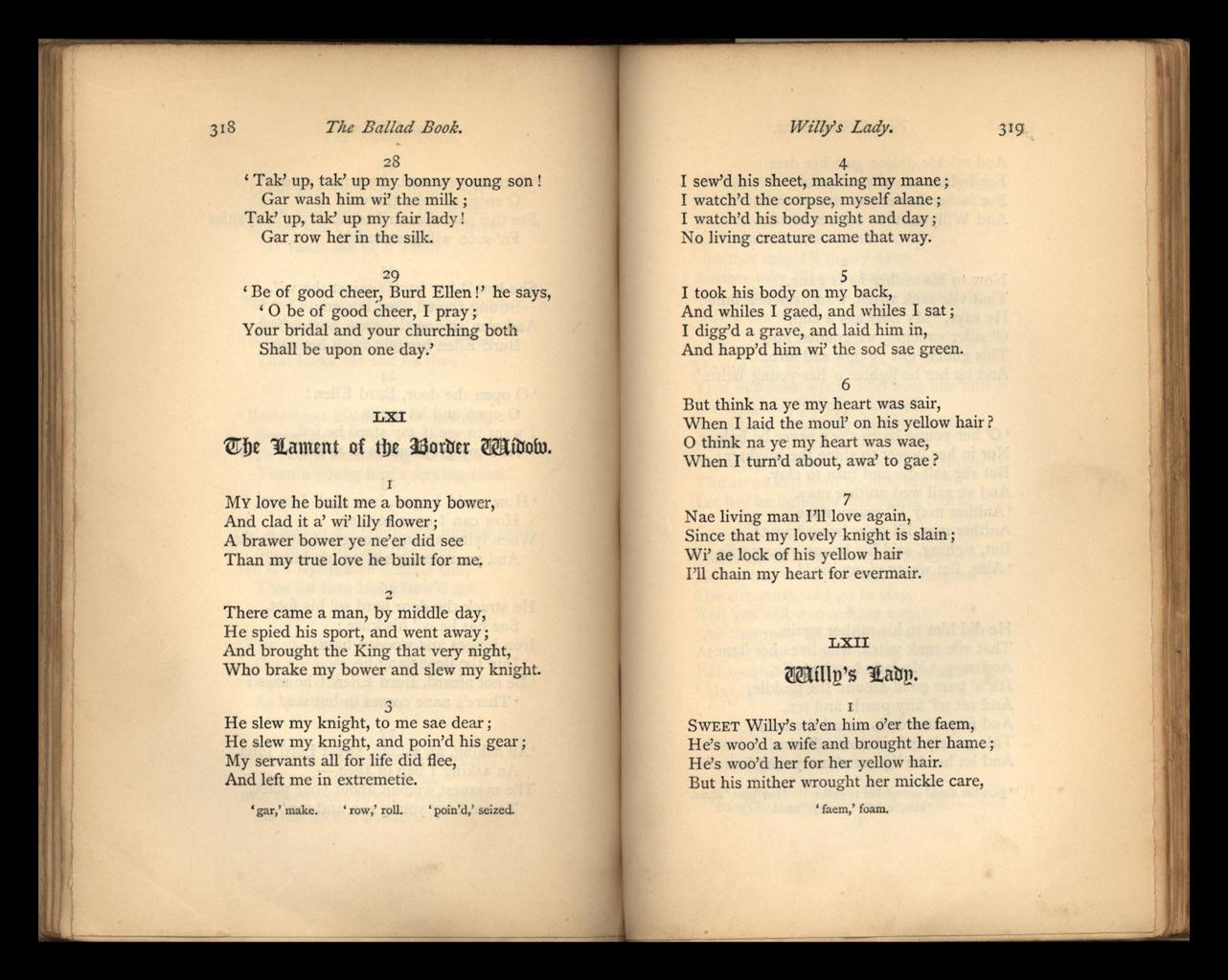
LXII I
SWEET Willy's ta'en him o'er the faem, He's woo'd a wife and brought her hame; He's woo'd her for her yellow hair. But his mither wrought her mickle care, , faem,' foam.
320 Tile Ballad Book.
And mickle dolour gart her dree ; For lighter can she never be, But in her bower she sits wi' pain, And Willy mourns for her in vain.
2
Now to his mither he is gane, That vile rank witch, who lives her 'lane; He says, ' My lady has a cup, 0' siller wrought, wi' gouden lip; This gudely gift ye now sail aim, And let her be lighter 0' her young bairn.'
3
, 0' her young bairn she's never be lighter, N or in her bower to shine the brighter ; But she sall die and turn to clay, And ye sall wed anither may.'
'Anither may I'll marry nane, Anither may I'll ne'er bring hame.'
But, sighing, said his bonny young wife, 'Alas, I'm weary 0' my life! '
4
He did him to his mither again, That vile rank witch, who lives her 'lane; And says, 'My lady has a girdle, It's a' pure goud around the middle, And set wi' fifty pearls and ten, And fifty diamonds round the hem; This gudely gift ye now sail aim, And let her be lighter 0' her young bairn.'
gart her dreer' caused her to suffer. C her 'lane,' alon e. aim ,' earn. ' may,' maid
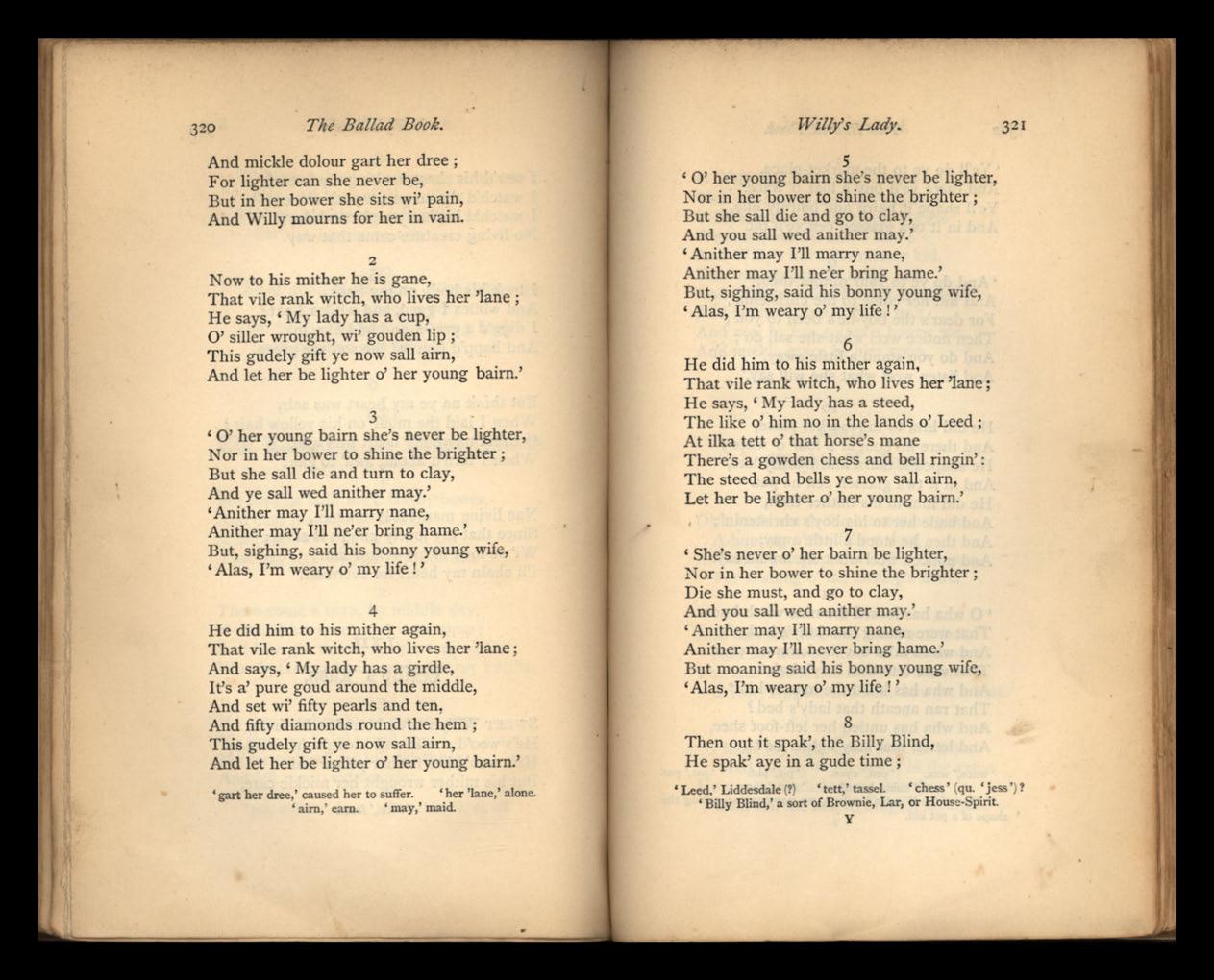
Witty's Lady.
5
, 0' her young bairn she's never be lighter, Nor in her bower to shine the brighter; But she sall die and go to clay, And you sall wed anither may.'
, Anither may I'll marry nane, Anither may I'll ne'er bring hame.'
But, sighing, said his bonny young wife, 'Alas, I'm weary 0' my life! '
6
He did him to his mither again, That vile rank witch, who lives her 'lane;
He says, 'My lady has a steed, The like 0' him no in the lands 0' Leed; At ilka tett 0' that horse's mane
There's a gowden chess and bell ringin' : The steed and bells ye now sail aim, Let her be lighter 0' her young bairn.'
7
, She's never 0' her bairn be lighter, Nor in her bower to shine the brighter; Die she must, and go to clay, And you sall wed anither may.'
'Anither may I'll marry nane, Anither may I'll never bring hame.'
But moaning said his bonny young wife, 'Alas, I'm weary 0' my life! '
8
Then out it spak', the Billy Blind, He spak' aye in a gude time; 3 21
• !.eed,' Liddesdale (1) • tott,' tassel • chess' :qu. 'jess ' ) ? Billy Blind,' a sort of Brownie, LarJ or Hous e-Spirit. y
322 Tlte Billlad Book.
'Ye'll do ye to the market-place, And there ye'll buy a loa f 0' wace. Ye'll shape it b ai rn a nd bairnly hke, And in it twa glassen ee n ye'll pit.
9
, And do ye to your mither then, And bid her come to the christenin', For dear's the boy he's been to you; Then notice weel what she sail do ; And do you stand a little away, And list en weel what sh e will say.'
10
He did him to the market-place, And there he bought a loaf 0' wace ; He shaped it bairn and bairnly like, And in it twa glassen een he pat. He did him to his mither then, And bade her to his boy's christenin' ; And then he stood a little away, And notic ed weel what s h e would say.
11
, 0 wha has loosed the nine witch-knots
Th at were amang that lady's locks?
And wha's ta'en out the kaims 0' care That were into that lady's hair?
And wha has kill'd the master kid • That ran aneath that lady's bed?
And wha h as untied h er l eft- foot shee, And letten th a t l ady li ghter be?'
4 wace,' wax. (een,' eyes. C pit,' put. (pat,' pu t. (kaims,' combs. (shee,' shoe .
.. ODe of the \V itch's familiars, we may imagine, taking the shape of a pet kid.
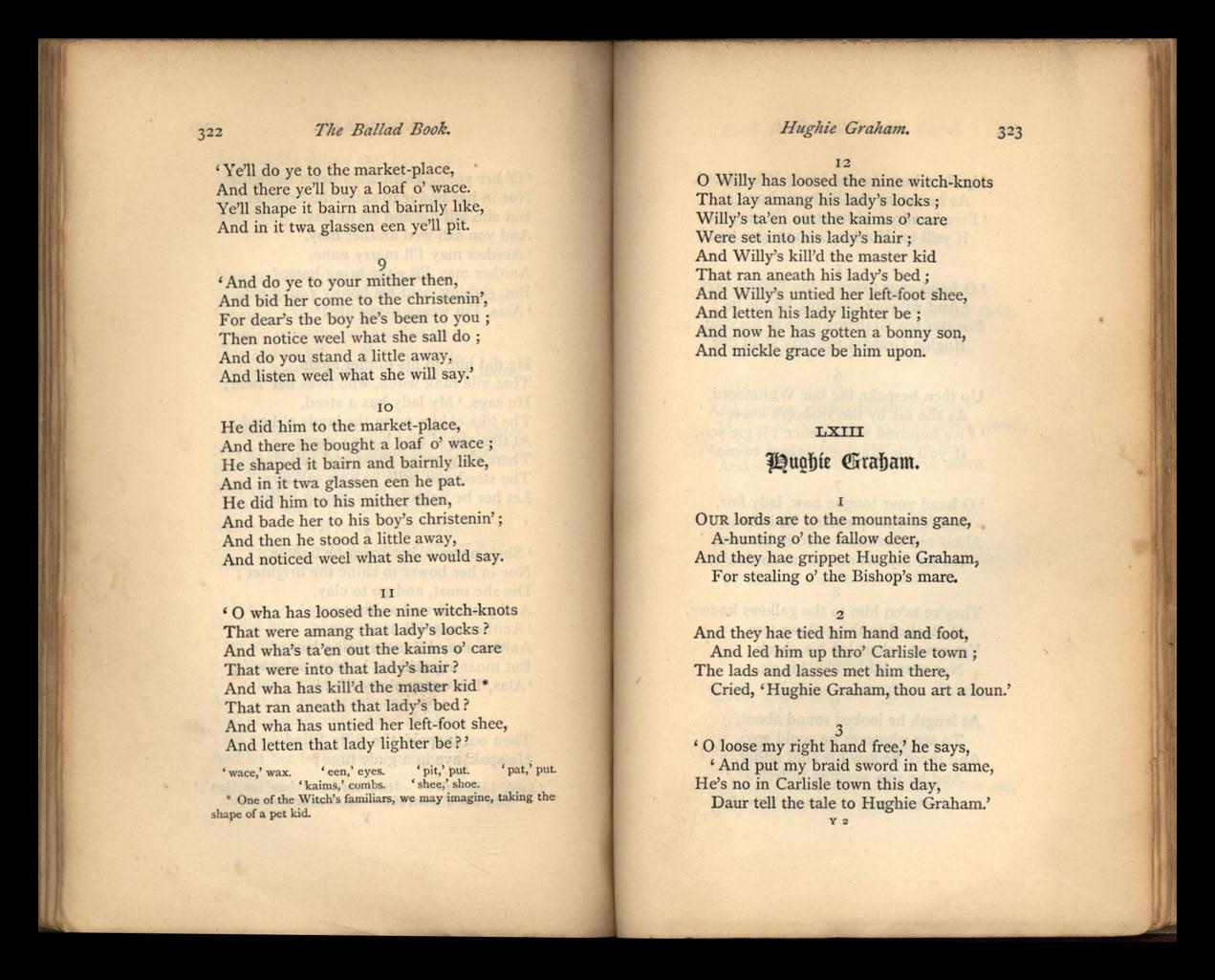
12
o Willy h as loo se d th e nine witch-knots
That lay amang his lady 's lo cks; Willy's ta'en out the kaims 0' care
Were set into his lady's h ai r;
And Willy's kill'd the master kid
That ran aneath his lady's bed;
And Willy's untied her left-foot shee, And letten his lady lighter be ;
And now he has gotten a bonny son, And mickle grace be him upon. LXIII Qlirabam.
O UR lords are to the mountains gane, A-hunting 0' the fallow deer,
And they h ae grippet Hughie Graham, For stealing 0 ' the Bishop's mare.
2
And they hae tied him hand and foot, And led him up thro' Carlisle town; Th e lads and lasses met him there, Cried, 'Hughie Graham, thou art a loun.'
3
, 0 loose my right hand free,' he says,
, And put my braid sword in the same, He's no in Carlisle town this day, Daur tell the tale to Hughie Graham.'
Y2
TIle Ballad Book.
4
Up then bespake the brave Whitefoord, As he sat by the Bishop's knee, , Five hundred white stots I 'll gie you, If ye'lllet Hughie Graham gae free.'
5
, 0 haud your tongue,' the Bishop says, , And wi' your pleading let me be ; For tho' ten Grah a ms were in his coat, Hughie Graham this day shall d ee.'
6
Up then bespake the fair Whitefoord, As she sat by the Bishop's knee, , Five hundred white pence I 'll gie you: If ye'll gie Hughie Graham to me.'
7
, 0 haud your tongue now, lady fair, And wi' your pleading let it be ; Altho' ten Grahams were in his coat, It's for my honour he maun dee.'
8
Th ey've ta'en him to the gallows knowe, He looked to the gallows tree, Yet never colour left his cheek, N or ever did he blin' his e'e.
9 ,
At length he look ed round about, To see whatever he could spy, And there he saw his auld father, And he was weeping bitterly. , stots, J oxen. 'knowe,' little hill.
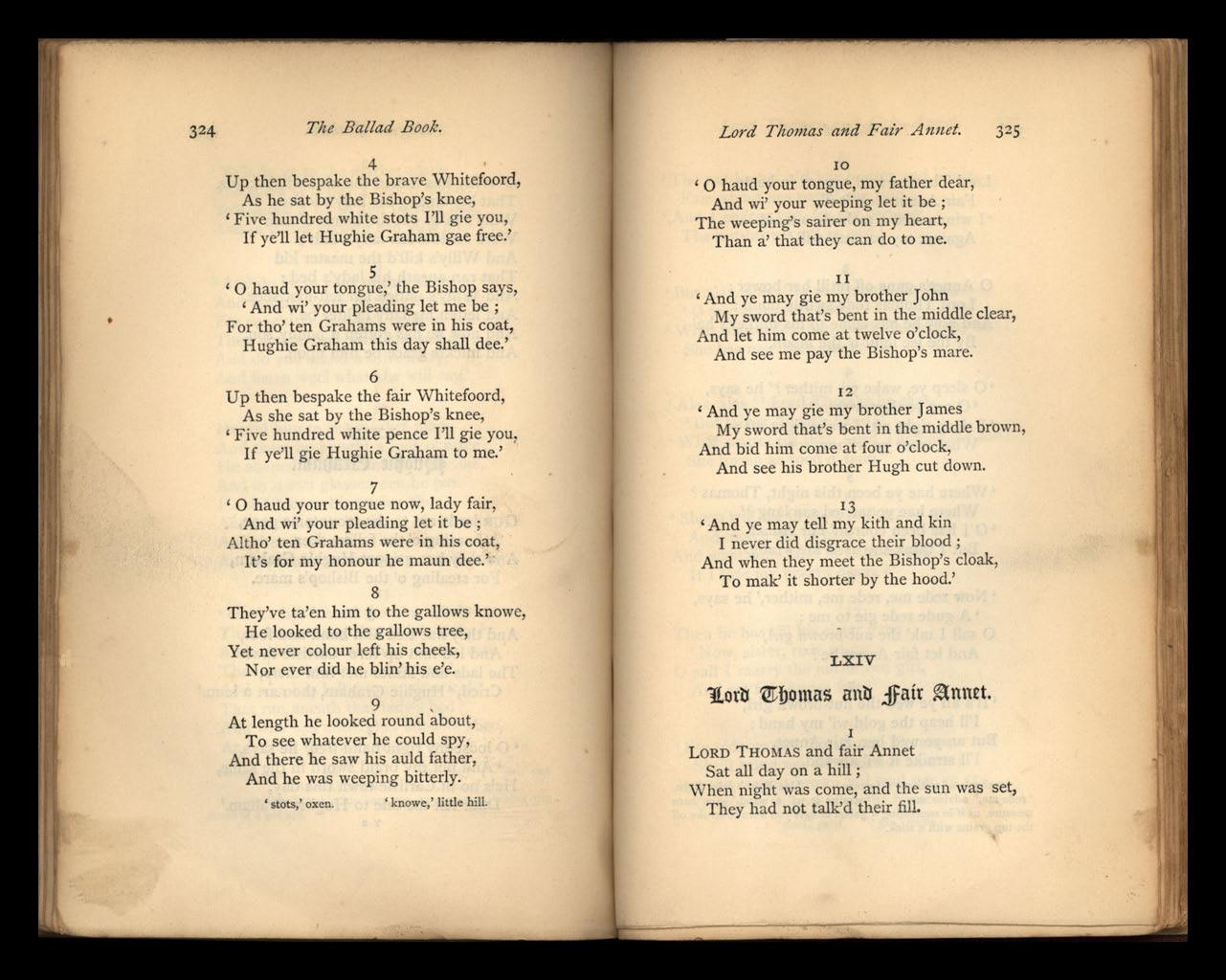
Lord TllOmas and Fair A1l1ut.
10
, 0 haud your tongue, my father dear, And wi' your weeping let it be ; The weeping's sairer on my heart, Than a' that they can do to me.
11
, And ye may gie my brother John My sword that's bent in the middle clear, And let him come at twelve o'clock, And see me pay the Bishop's mare.
12
'And ye may gie my brother James My sword that's bent in the middle brown, And bid him come at four o'clock, And see his brother Hugh cut down.
13
, And ye may tell my kith and kin I never did disgrace their blood; And when they meet the Bishop's cloak, To mak' it shorter by the hood.'
'lLodJ
anb' jfait' I
L ORD THOMAS and fair Annet
Sat all day on a hill ; When night was come, and the sun was set, They had not talk'd their fill.
TIle Ballad Book.
2
Lord Thomas said a word in haste, Fair Annet took it ill : 'I winna wed a tocherless maid Against my parents' will.'
3
o Annet's gane off intill her bower; Lord Thomas rode swiftly doun ; And now he has come to his mither's ha' By the lee light 0' the moon.
4
'0 sleep ye, wake ye, mither?' he says, '0 are ye therewithin ?' , I sleep right aft, I wake right aft; What want ye wi' me, son?
5
, Where hae ye been this night, Thomas? Where hae ye tarried sae lang ?'
'0 I hae been courtin' fair Annet, But I think she used me wrang.
6
'Now rede me, rede me, mither,' he says, , A gude rede gie to me : o sall I tak' the nut-brown girl, And let fair Annet be?'
7
'It's an ye wed the nut-brown girl, 1'11 heap the gold wi' my hand; But an ye wed her, fair Annet, 1'11 straike it wi' a wand.
'tocherless,' without a fortune. C lee li g ht,' calm light. . rede me,' advise me. 'straike it wi' :l wand,' give bare measure, as if in measuring a gallon of oats you were to stroke off the top grains with a stick.

Lord Tltomas alld Fair A1l1ut.
8
'The nut-brown girl has houses and lands, Fair Annet has nane,' she said; , And I charge you, for my benison, The nut-brown girl to wed.'
9
, But alas, alas!' Lord Thomas he says, , 0 fair is Annet's face ! '
, What matter for that, Lord Thomas my son? She has nae ither grace.'
10
, Alas, alas! ' Lord Thomas he says, , But fair is Annet's hand! '
, What matter for that, Lord Thomas my son? She hasna ae rood 0 land.'
I[
, Sheep will die in cots, mither, And owsen die in byre; And what's the land or gold to me, If I lose my heart's desire?'
12
Then he has till his sister gane : 'Now, sister, rede ye me; o sail I marry the nut-brown girl, And set fair Annet free ?'
13
, I'se rede ye tak' fair Annet, Thomas , She'll bring neither dool nor shame; Hut the crabbit brown girl wad gar ye cry, o what is this we brought hame ! ' 'dool,' grief. 'gar,' make.
32 8 The Ballad Book.
14
'No, I will tak' my mither's counsel, And marry me out 0' hand; And I will tak' the nut-brown girl With her houses and her land."
15
His sister has found a bonnie boy, Wad fain win hose and shoon; One that will rin to fair Annet's bower, By the lee light 0' the moon.
16
The boy he is come to Annet's bower, And tirled at the pin, And wha sae ready as Annet hersel' To open and let him in.
17
, Ye are bidden come to Lord Thomas's weddin', At twal 0' the clock at noon;
Ye.are bidden come to Lord Thomas's weddin', And ye cannot come ower soon.
18
'Ye mauna put on the black, the black, N or yet the dowie brown, But the silken blue, and your kerch sae white, And your bonnie locks hangin' down.'
19
'It's I will come to Lord Thomas's weddin', At twal 0' the clock at noon; It's I will come to Lord Thomas's weddin'I thought it would be my own. dowie, I mournrul. kerch,' kerchief.
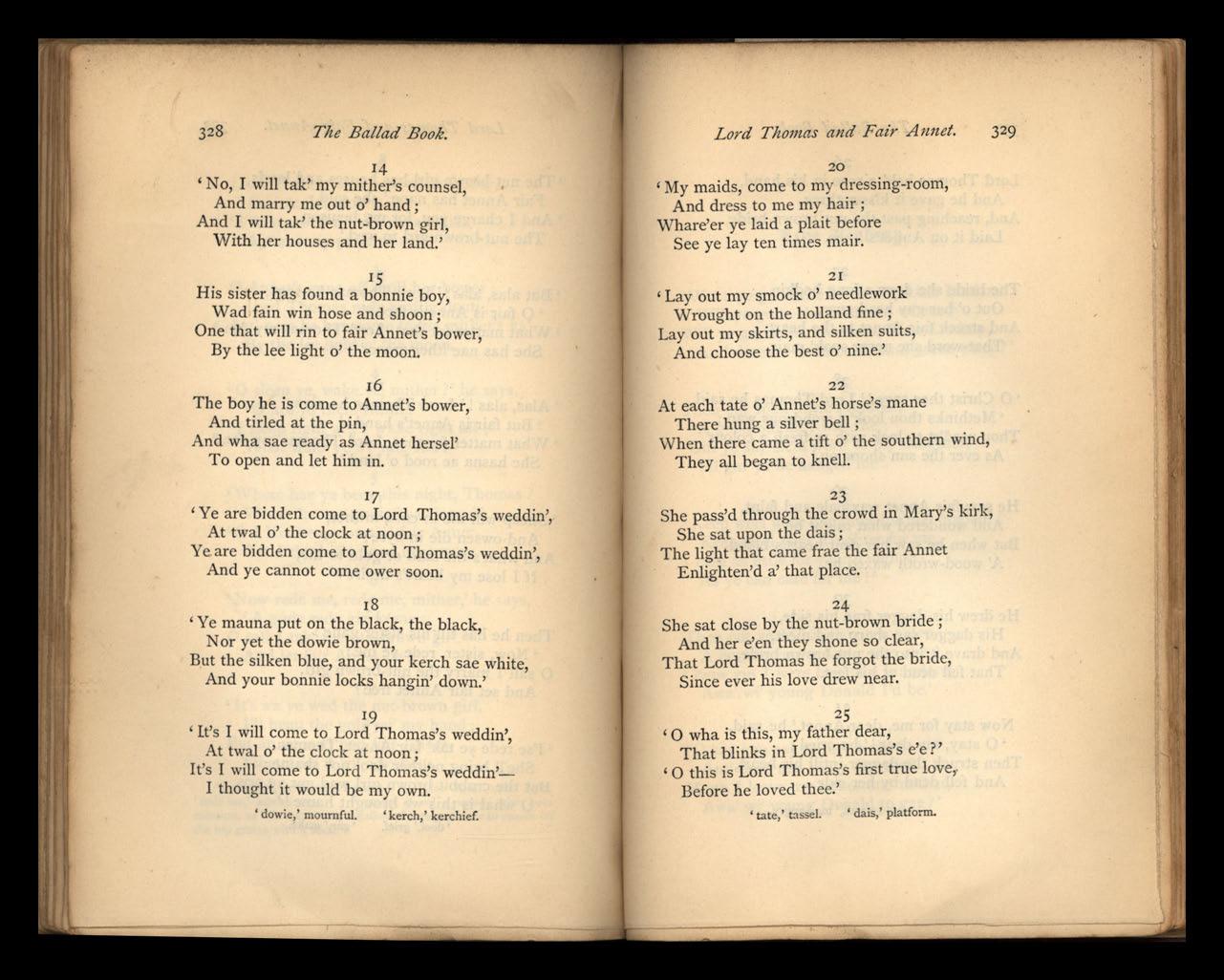
Lord TII01JlaS and Fair A1I1ut.
20
, My maids, come to my dressing-room, And dress to me my hair; Whare'er ye laid a plait before See ye lay ten times mair.
21
, Layout my smock 0' needlework Wrought on th e holland fine; Layout my skirts, and silken suits, And choose the best 0' nine.'
22
At each tate 0' Annet's horse's mane
There hung a silver bell ; When there came a tift 0' the southern wind, They all began to knell.
23
She pass'd through the crowd in Mary's kirk, She sat upon the dais; The light that came frae the fair Annet Enlighten'd a' that place.
24
She sat close by the nut-brown bride; And her e'en they shone so clear, That Lord Thomas he forgot the bride, Since ever his love drew near.
25
, 0 wha is this, my father dear, That blinks in Lord Thomas's e'e?'
, 0 this is Lord Thomas's first true love,. Before he loved thee.'
, tate,' t..1Ssel. dais,' platform.
32 9
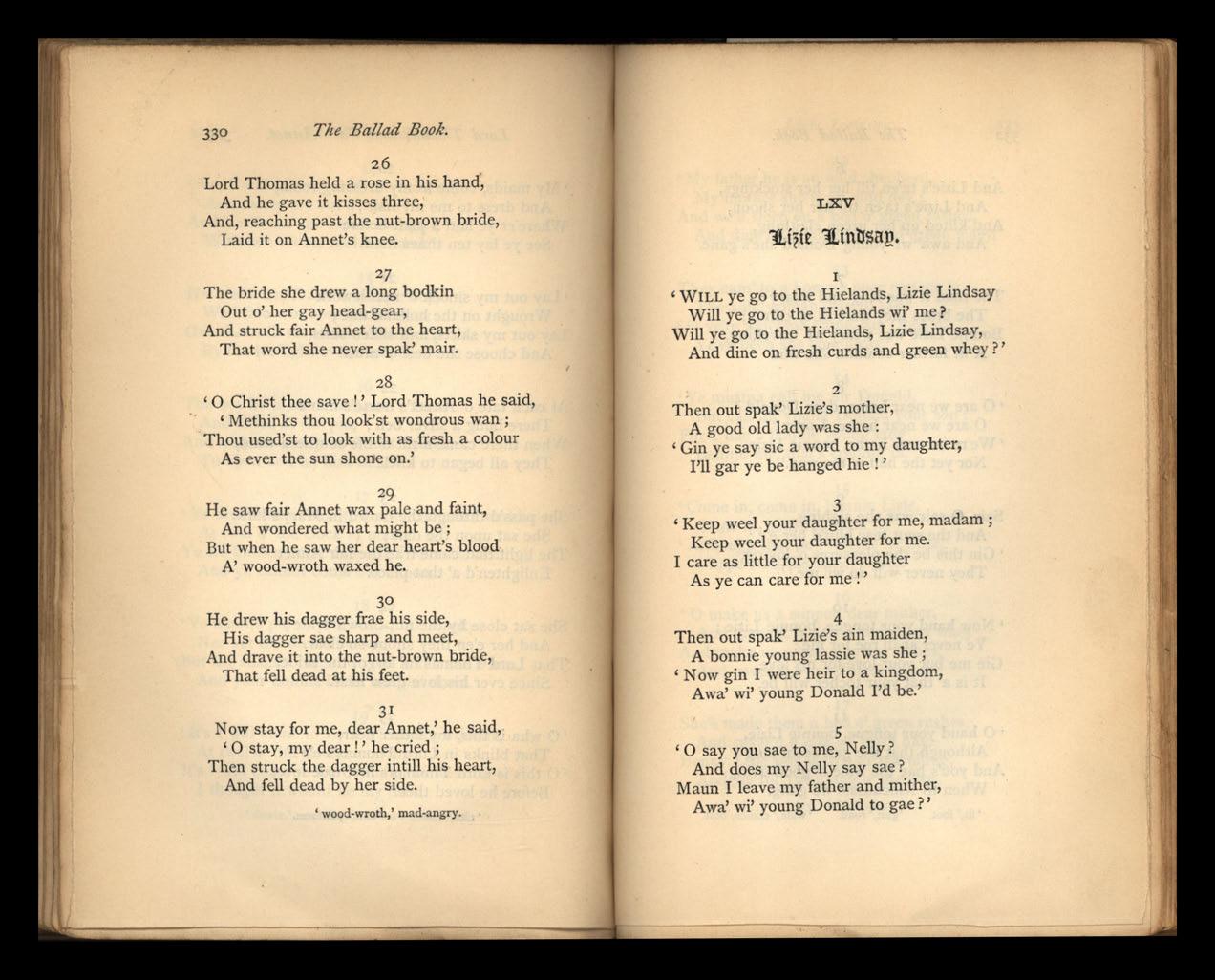
33 0 Tlte Ballad Book.
26
Lord Thomas held a rose in his hand, And he gave it kisses three, And, reaching past the nut-brown bride, Laid it on Annet's knee.
27
The bride she drew a long bodkin Out 0' her gay head-gear, And struck fair Annet to the heart, That word she never spak' mair.
28
'0 Christ thee save!' Lord Thomas he said, , Methinks thou look'st wondrous wan; Thou used 's t to look with as fresh a colour As ever the sun shone on.'
29
He saw fair Annet wax pale and faint, And wondered what might be ; But when he saw her dear heart's blood A' wood-wroth waxed he .
30
He drew his dagger frae his side, His dagger sae sharp and meet, And drave it into the nut-brown bride, That fell dead at his feet
3 1
Now stay for me, dear Annet,' he said, '0 stay, my dear! ' he cried; Then struck the dagger intill his heart, And fell dead by her side.
C wood-wrath,' mad-angry. L X V 1
, WILL ye go to the Hielands, Lizie Lindsay Will ye go to the Hielands wi' me? Will ye go to the Hie1ands, Lizie Lindsay, And dine on fresh curds and green whey?
2
Then out spak' Lizie's mother, A good old lady was she:
, Gin ye say sic a word to my daughter, I'll gar ye be hanged hie! '
3
, Keep weel your daughter for me, madam; Keep weel your daughter for me. I care as little for your daughter As ye can care for me ! '
4
Then out spak' Lizie's ain maiden, A bonnie young lassie was she; , Now gin I were heir to a kingdom, Awa' wi' young Donald I'd be.'
5
'0 say you sae to me, Nelly? And does my N elly say sae?
Maun I leave my father and mither, A wa! wi' young Donald to gae ? '
33 2 TIle Ballad Book.
6
And ta'en till her her stockings, And LlZle's ta'en till her her shoon And kilted up her green claithing, ' . And awa' wi' young Donald she's gane.
7
The road it was lang and weary ; The braes they were ill to climb; Bonnie Lizie was weary wi' travelling, A fit further couldna she win.
8
, 0 are we near hame, dear Donald ? o are we near hame, I pray?'
'We're no near hame, bonnie Lizie, Nor yet the half 0' the way.'
9
Sair, 0 sair was she sighing, And the saut tear blin' d h e r e!e : , Gin this be the pleasures 0' loving, They never will do wi' me ! '
10
, ow haud your tongue, bonnie Lizie ; Ye never shall rue for me . Gie but your love for m; love, I t IS a' that your tocher will be.
11
, 0 haud your tongue, bonnie Lizie, Although that the gait seem lang ; And you's hac the wale 0' good living When to Kincaussie we gang. 'fit,' foot. 'gait,' TO:ld. 'wale,' choice , best.
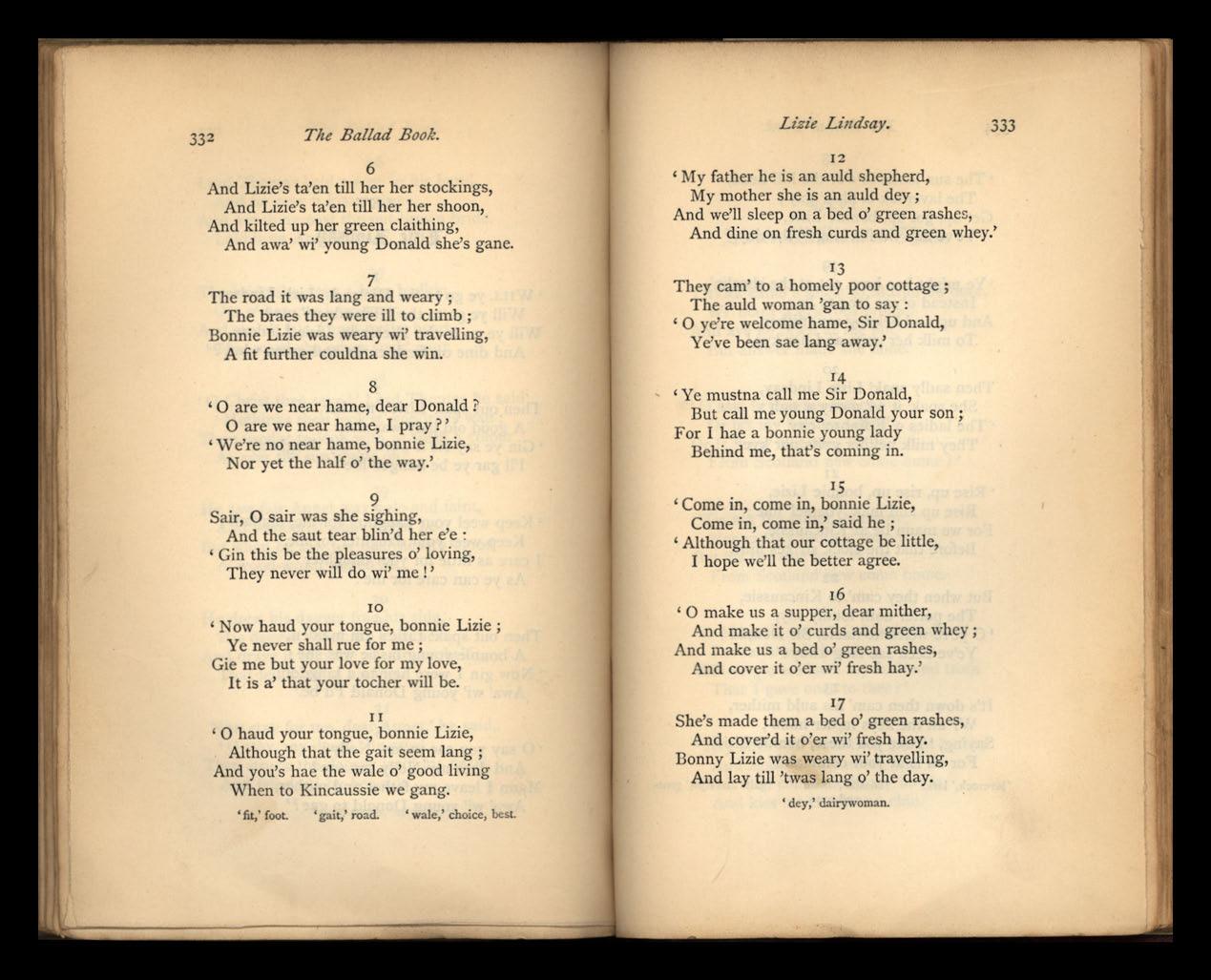
Lisie Lilldsay.
12
'My father he is an auld shepherd, My mother she is an auld dey ;
333 And we'll sleep on a bed 0' green And dine on fresh curds and green whey.'
13
They cam' to a homely poor cottage; The auld woman 'gan to say: , 0 y e! re welcome hame, Sir Donald, Ye!ve been sae lang away.'
14
'Ye mustna call me Sir Donald, But call me young Donald your son; For I hae a bonnie young lady Behind me, that's coming in.
15
, Come in, come in, bonnie Lizie, Come in, come in,' said he ; , Although that our cottage be little, I hope we'll the better agree.
16
, 0 make us a supper, dear mither, And make it 0' curds and green whey; And make us a bed 0' green rashes, And cover it o' er wi' fresh hay.'
17
She's made them a bed 0' green rashes And cover'd it o'er wi' fresh hay. '
Bonny was weary wi' travelling, And lay till 'twas lang 0' the day. dey, ' dairywoman.
334 TIl e Ballad Book.
18
, The sun looks in o'er the hill-head, The laverock is liltin' gay; Get up, get up, bonnie Lizie, Y dve lain till it's lang 0' the day.
19
'Ye might hae been out at the shealin', Instead 0 ' sae lang to lie; And up and helping my mither To milk her gaits and her kye.'
20
Then sadly spak' Lizie Lindsay, She spak' it wi' mony a sigh: , The ladies 0' Edinbro' city They milk neither gaits nor kye.'
21
, Rise up, rise up, bonnie Lizie, Rise up and mak' yoursel' fine; For we maun be at Kincaussie, Before that the clock strikes nine.'
22
But when they cam' to Kincaussie,
The porter doth loudly say, , 0 ydre welcome hame, Sir Donald ; Ye've been sae lang away!'
23
It's down then cam' his auld mither, Wi' all the keys in her hand; Saying, ' Take you these, bonnie Lizie, For all is at your command.'

I
THERE came a ghost to Marjorids door, Wi' many a grievous groan, And aye he tirled at the pin, But answer made she none.
2
, 0 say, is that my father?
Or is't my brother J olm?
Or is it my true love WilIy, From Scotland new come home?'
3
"Tis not thy father, Marjorie, N or yet thy brother John; But 'tis thy true love Willy, From Scotland new come home.
4
'laverock, I lark. , shealin',' shed. and cows. , gaits and kye ,' goats LXVI miilliam's <!Iibost.
, 0 Marjorie sweet! 0 Marjorie dear ! For faith and charitie, Will ye gie me back my faith and troth That I gave once to thee?'
5 , Thy faith and troth thou gavest to me, And again thou'lt never win, Until thou come within my bower And kiss me cheek and chin.'
TIle Ballad Book.
6
, My lips they are sae bitter,' he says, , My breath it is sae strang, If ye get ae kiss from me to-night, Your days will not be lang.
7
'The cocks are crawing, MarjorieThe cocks are crawing again; The dead wi' the quick they mustna star, And I must needs begone.'
8
She follow'd him high, she follow'd him low, Till she came to yon churchyard green; And there the deep grave opened up, And young William he lay down.
9
, What three things are these, sweet William, That stand beside your head?'
, 0 it's three maidens, Marjorie, That once I promised to wed.'
10
, What three things are these, sweet William, That stand close at your side ?'
, 0 it's three babes, ' he says, ' Marjorie, That these three maidens had.'
II
, What three things are these, sweet William, That lie close at your feet?'
, 0 it's three hell-hounds, Marjorie, That's waiting my soul to keep,.'
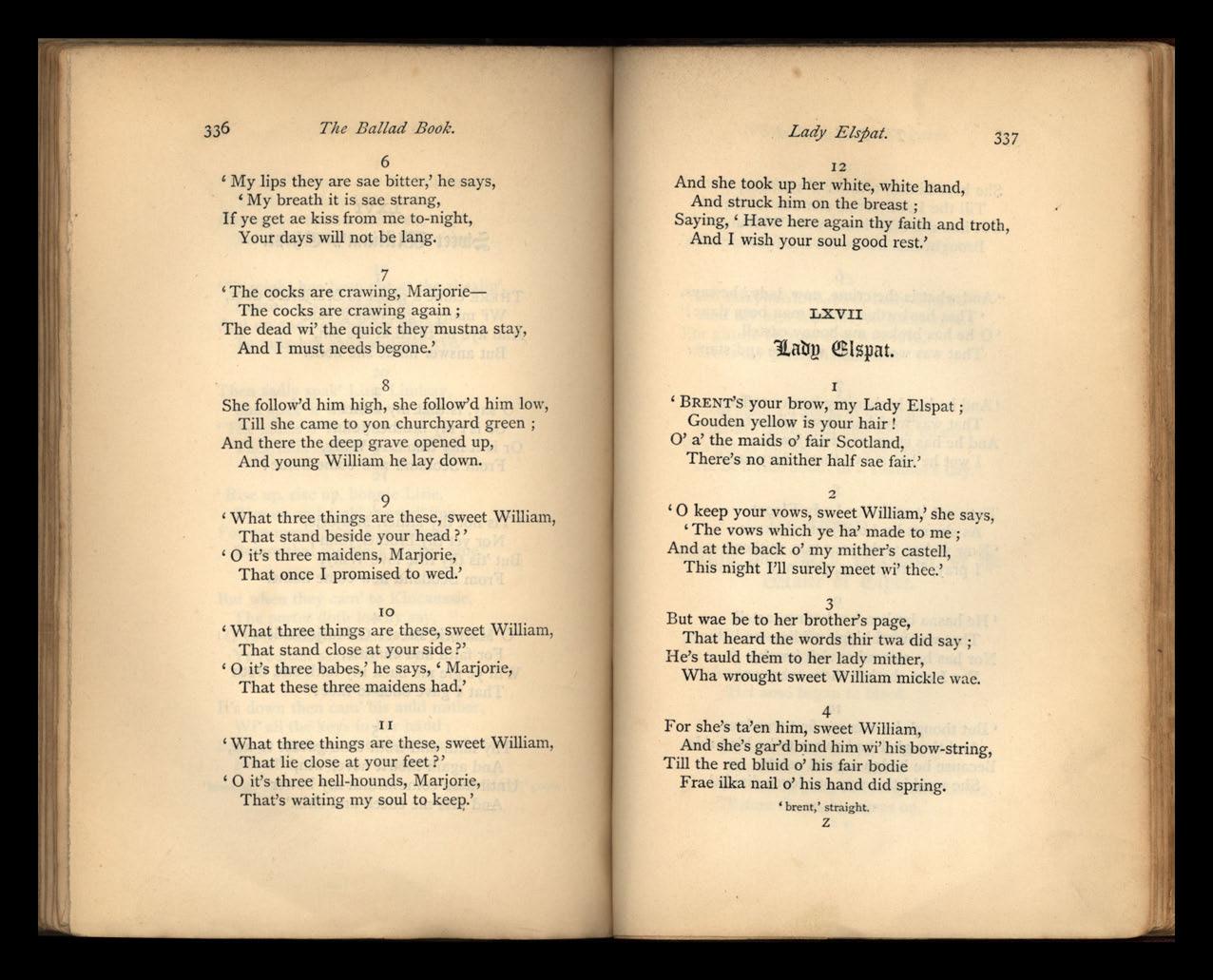
Lady Elspat. 337
12
And she took up her white, white hand, And struck him on the breast; Saying, ' Have here again thy faith and troth And I wish your soul good rest.' ' LXVII
1LRb'l1 ($\spat.
I
, BRENT'S your brow, my Lady Elspat ; Gouden yellow is your hair!
0' a' the maids 0' fair Scotland, There's no anither half sae fair.'
2
, 0 keep your vows, sweet William,' she says, , The vows which ye ha' made to me ; And at the back 0' my mither's castell, This night I'll surely meet wi' thee.'
3
But wae be to her brother's page, That heard the words thir twa did say; He's tauld them to her lady mither, Wha wrought sweet William mickle wae.
4
For she's ta'en him, sweet William, And she's gar'd bind him wi' his bow-string, Till the red bluid 0' his fair bodie Frae ilka nail 0' his hand did spring. , brent,' s traight.
Z
Tile Ballad Book.
5
She kept him in a tower 0' strength, Till the Lord-justice came to town; Out has she ta'en him, sweet William, Brought him before the Lord-justice boun'.
6
, And what is the crime, now, lady,' he says , 'That has by this young man been dane? ' , 0 he has broken my bonny casteil, That was weel biggit wi' lime and stan e.
7
, And he has broken my bonny coffers , That wa s weel bandit wi' aiken ban ' ; And he has stown my rich jewels; I wot he has stown them every ane.'
8
Then out it spak her Lady Elspat, As she sat by Lord-justice's knee; 'Now ye hae tauld your tale, mither, I pray, Lord-justice, ye'il now hear m c.
9
'He hasna broken her bonny castell, That was weel biggit wi' lime and stane ; N or has he stown her rich jewels, For I wat she has them every ane.
10
, But though he was my first true love, And though I had sworn to be his bride, Because he hadna a great estate, She would this way our loves divide.' ( aiken ,' oaken.
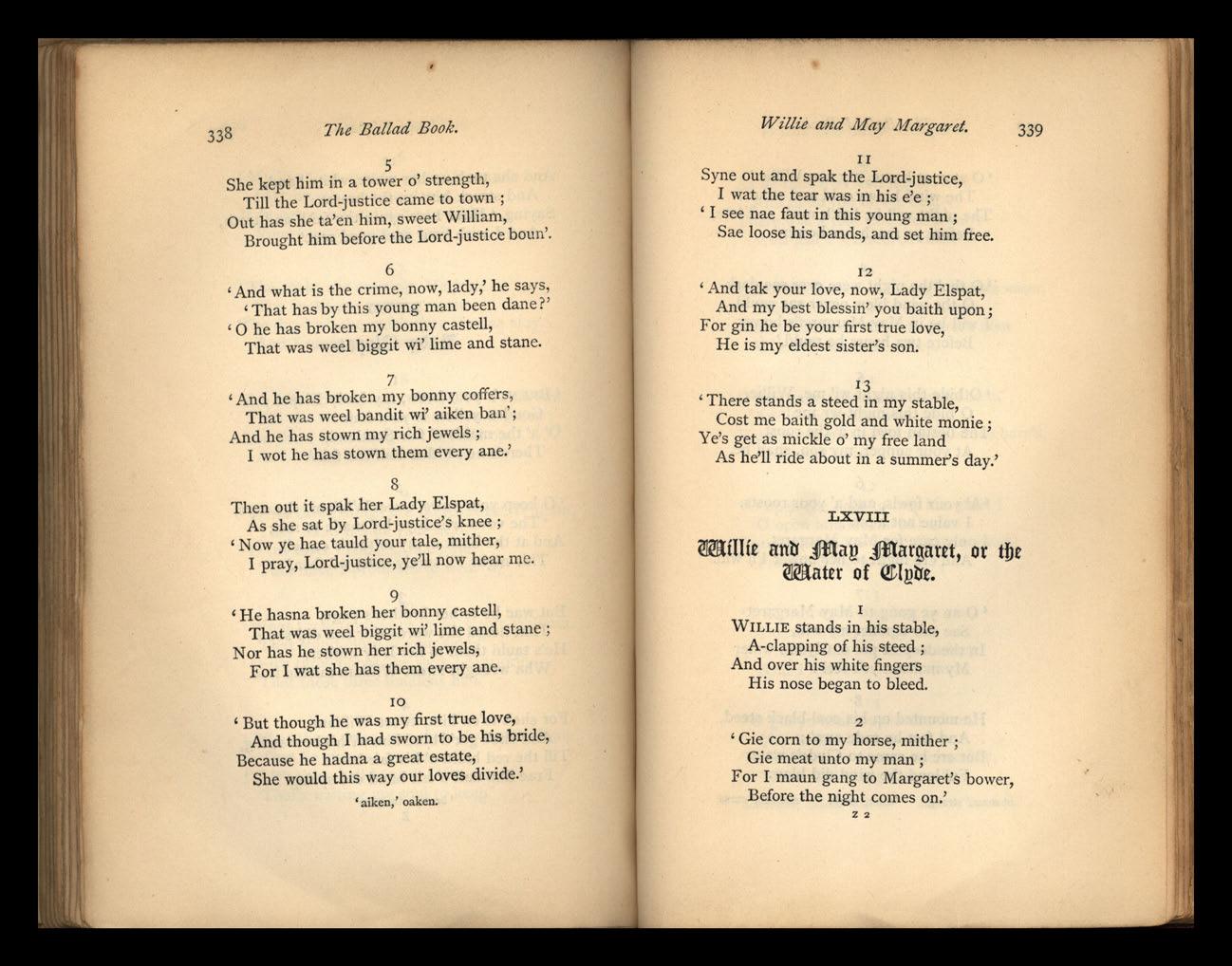
Willie alld May Margaret II
Syne out and spak the Lord-justice, I wat the tear was in his e'e .
, I see nae faut in this young rr:an ; Sae loose his bands, and set him free.
12
, And tak your love, now, Lady Elspat, And my best bless in' you baith upon' For gin he be your first true love, , He is my eldest sister's son.
13
, There stands a steed in my stable, Cost me baith gold and white monie . Ye's get as mickle 0' my free land ' As he'll ride about in a summer's day.'
OOlillie anb' or tbe OOlater of QCI!1b'e.
WILLIE stands in his stable, A-clapping of his steed; And over his white fingers His nose began to bleed.
2
, Gie corn to my horse, mither ; Gie meat unto my man; For I maun ga.ng to Margaret's bower, Before the mght comes on.'
Z 2
The Ballad Book.
3
'0 stay at hame, my son Willie !
The wind blaws cold and stour ; The night will be baith mirk and late, Before ye reach her bower.'
4
'0 tho' the night were ever sae dark, o the wind blew never sae cauld, I will be in May Margaret's bower Before twa hours be tauld.'
5
, 0 bide this night wi' me, Wi11ie, o bide this night wi' me !
The bestan fowl in a' the roost
At your supper, my son, shall be.
6
, A' your fowls, and a' your roosts, I value not a pin;
I only care for May Margaret, , .,
And ere night to her bower I 11 Will.
7
, 0 an ye gang to May Margaret
Sae sair against my will, In the deepest pot 0' Clyde's water
My malison ye's feel! '
8
He mounted on his coal-black steed, And fast he rade awa' ;
But ere he came to Clyde's water
Fu' loud the wind did blaw. stour,' strong. 'mirk,' dark. 'malison,' curse.
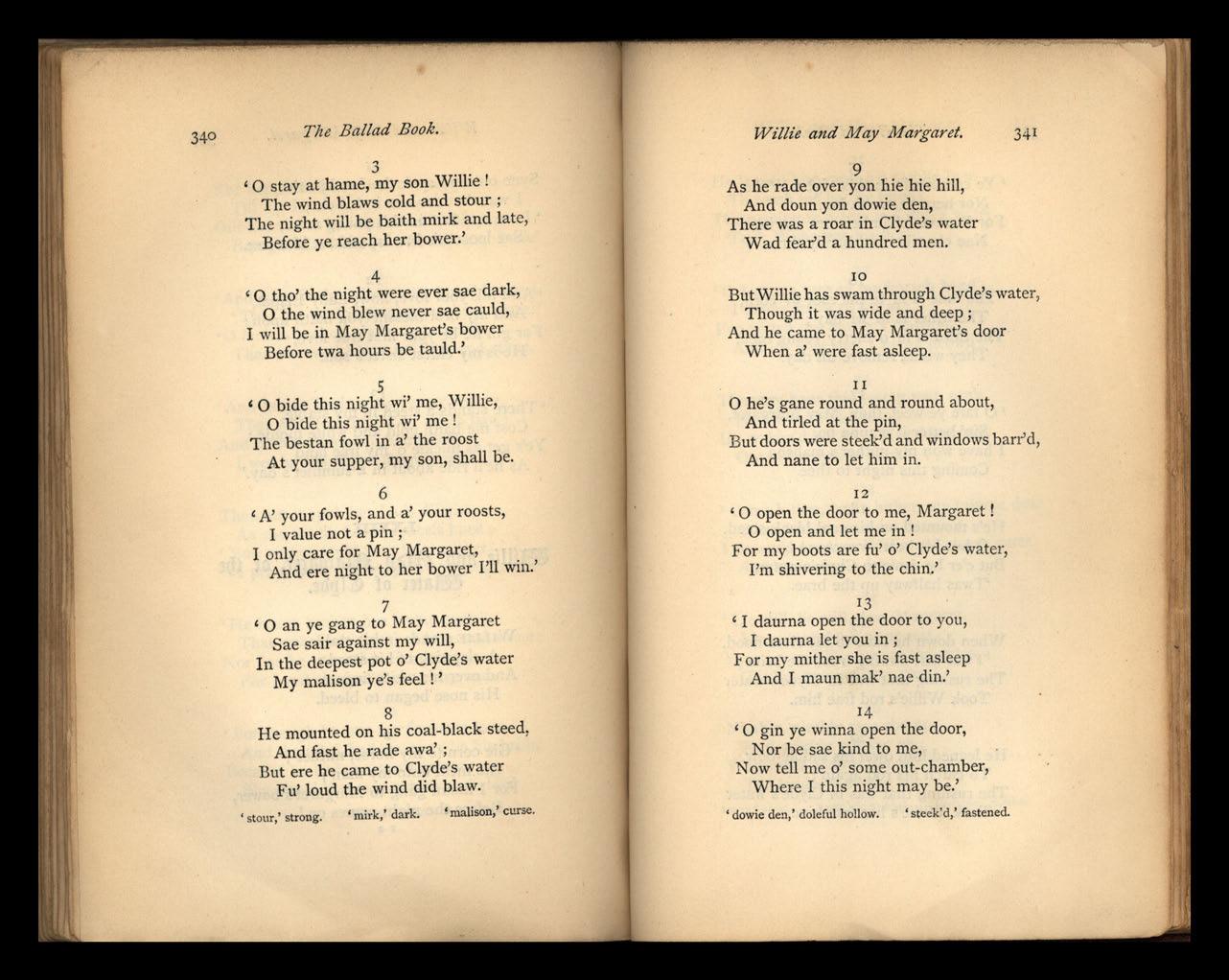
W£llie and May Margaret.
9
As he rade over yon hie hie hill, And do un yon dowie den, There was a roar in Clyde's water
Wad fear'd a hundred men .
10
But Willie has swam through Clyde's water, Though it was wide and deep; And he came to May Margaret's door
When a' were fast asleep.
11
o he's gane round and round about, And tided at the pin, But doors were steek'dand windows And nane to let him in.
12
, 0 open the door to me, Margaret ! o open and let me in !
For my boots are fu' 0' Clyde's water, I'm shivering to the chin;
13
, I daurna open the door to YOll, I daurna let you in ;
For my mither she is fast asleep And I malln mak' nae din.'
14
, 0 gin ye winna open the door, N or be sae kind to me, Now tell me 0' some out-chamber, Where I this night may be.'
C dowie den,' doleful hollow. 'steek'd: fastened.
15
'Ye canna win in this night, Willie, N or here ye canna be ; For I've nae chambers out nor in Nae chamber but barely three.'
16
, The tane is fu' to the roof wi' corn, The tither is fu' wi' hay; The third is fu' 0' merry young men, They winna remove till day.'
17
, 0 ye weel, then, May Margaret, Sm better it mauna be. I have won my mithers malison Coming this night to thee.'
18
He's mounted on his coal-black steed o but his heart was wae ! '
But e'er he came to Clyde'S water, 'Twas halfway up the brae.
19
When down he rade to the river-flood, 'Twas fast flowing ower the brim; The rushing that was in Clyde's water Took Willie's rod frae him.
20
He leaned him ower his saddle-bow To catch his rod again; The rushing that was in Clyde's water Took Willie's hat frae him.
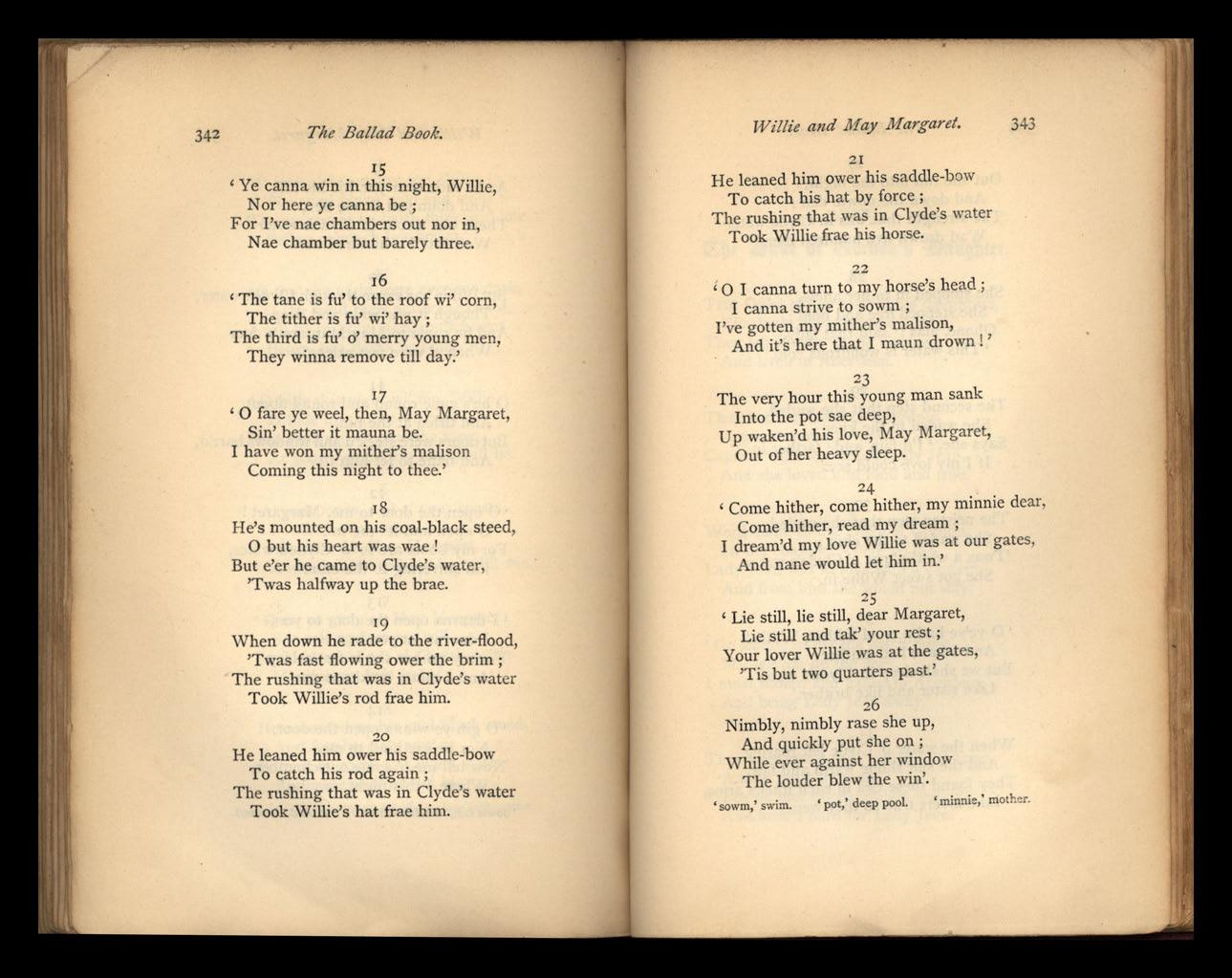
W£llie and lI-fay Margaret.
21
He leaned him ower his saddle-b ow
To catch his hat by force; The rushing that was in Clyde's wa ter Took Willie frae his horse.
22
, 0 I canna turn to my horse's head; I canna strive to sowm ; I've gotten my mither' s malison, And it's here that I maun drown ! '
23
The very hour this young man sank Into the pot sae deep, Up waken' d his love, May Margaret, Out of her heavy sleep.
24
, Come hither, come hither, my minnie dear, Come hither, read my dream; I dream'd my love Willie was at our gates , And nane would let him in.'
25
, Lie still, lie still, dear Margaret, Lie still and tak' your rest; Your lover Willie was at the gat es, 'Tis but two quarters past.'
26
Nimbly, nimbly rase she up, And quickly put she on ; \Vhile ever against her window
The louder blew the win'. 'sowm,' swim . 'pot,' deep pool. 'minnie;
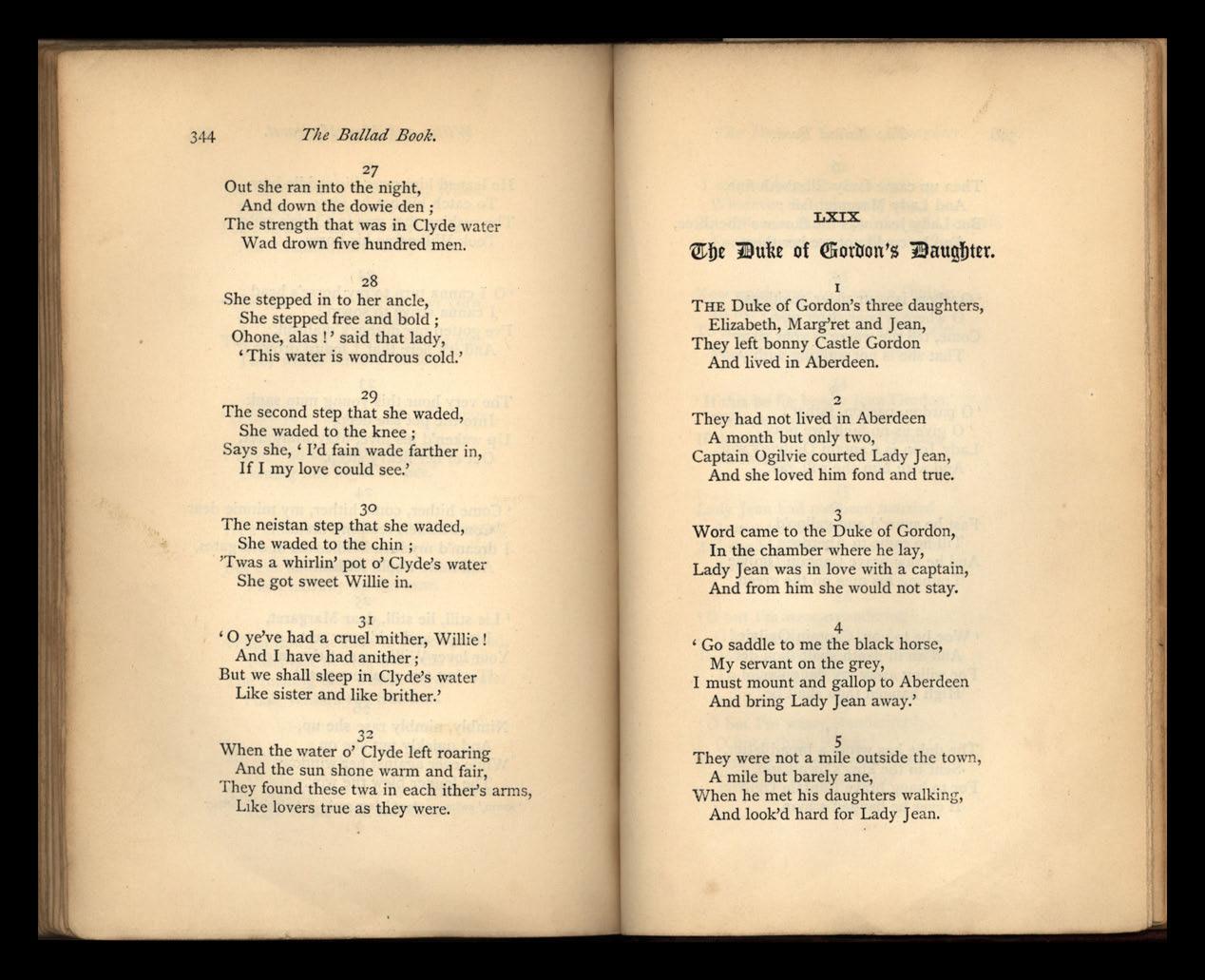
344 Tlte Ballad Book.
27
Out she ran into the night, And down the dowie den; The strength that was in Clyde water Wad drown five h undred men.
28
She stepped in to her anele, She stepped free and bold; Ohone, alas!' said that lady, , This water is wondrous cold.'
29
The second step that she waded, She waded to the knee; Says she, ' I'd fain wade farther in, If I my love could see.'
30
The neistan step that she waded, She waded to the chin; 'Twas a whirlin' pot 0' Clyde's water She got sweet Willie in
3 1
, 0 ye've had a cruel mither, Willie! And I have had anither; But we shall sleep in Clyde's water Like sister and like brither.'
3 2
When the water 0' Clyde left roaring And the sun shone warm and fair, They found these twa in each ithelJs arms, Like lovers true as they were. LXIX
]9uke of i9augbter.
I
THE Duke of Gordon's three daughters, Elizabeth, Marg'ret and Jean, They left bonny Castle Gordon And lived in Aberdeen.
2
They had not lived in Aberdeen
A month but only two, Captain Ogilvie courted Lady Jean, And she loved him fond and true.
3
W ord came to the Duke of Gordon, In the chamber where he lay, Lady Jean was in love with a captain, And from him she would not stay.
4
, Go saddle to me the black horse, My servant on the grey, I must mount and gallop to Aberdeen And bring Lady Jean away.'
5
They were not a mile outside the town, A mile but barely ane, When he met his daughters walking, And look'd hard for Lady Jean.
TIle Ballad Book.
6
Then up came Lady Elizabeth fine, And Lady Margaret fair;
But Lady Jean was the flower 0' the three, And he could not see her there.
7
, 0 where is your sister, maidens?
o where is your sister now?
Come, tell me where is your sister
That she is not walking with you?'
8
, 0 pardon, pardon, father!
o give us no fault, we pray!
Lady Jean is Captain Ogilvie's wife, And with him she will gae.'
9
Fast he spurr'd and gallop'd,
Till he came to Aberdeen; And he saw brave Captain Ogilvie
Training his men on the green.
10
, Woe be to you, Captain Ogilvie ! And an ill death shalt thou dee. For wiling away my daughter, High hanged thou shalt be.'
I I
The duke has wrote a broad letter, Sent to the king's own hand, For to hang brave Captain
If ever he hanged a man.
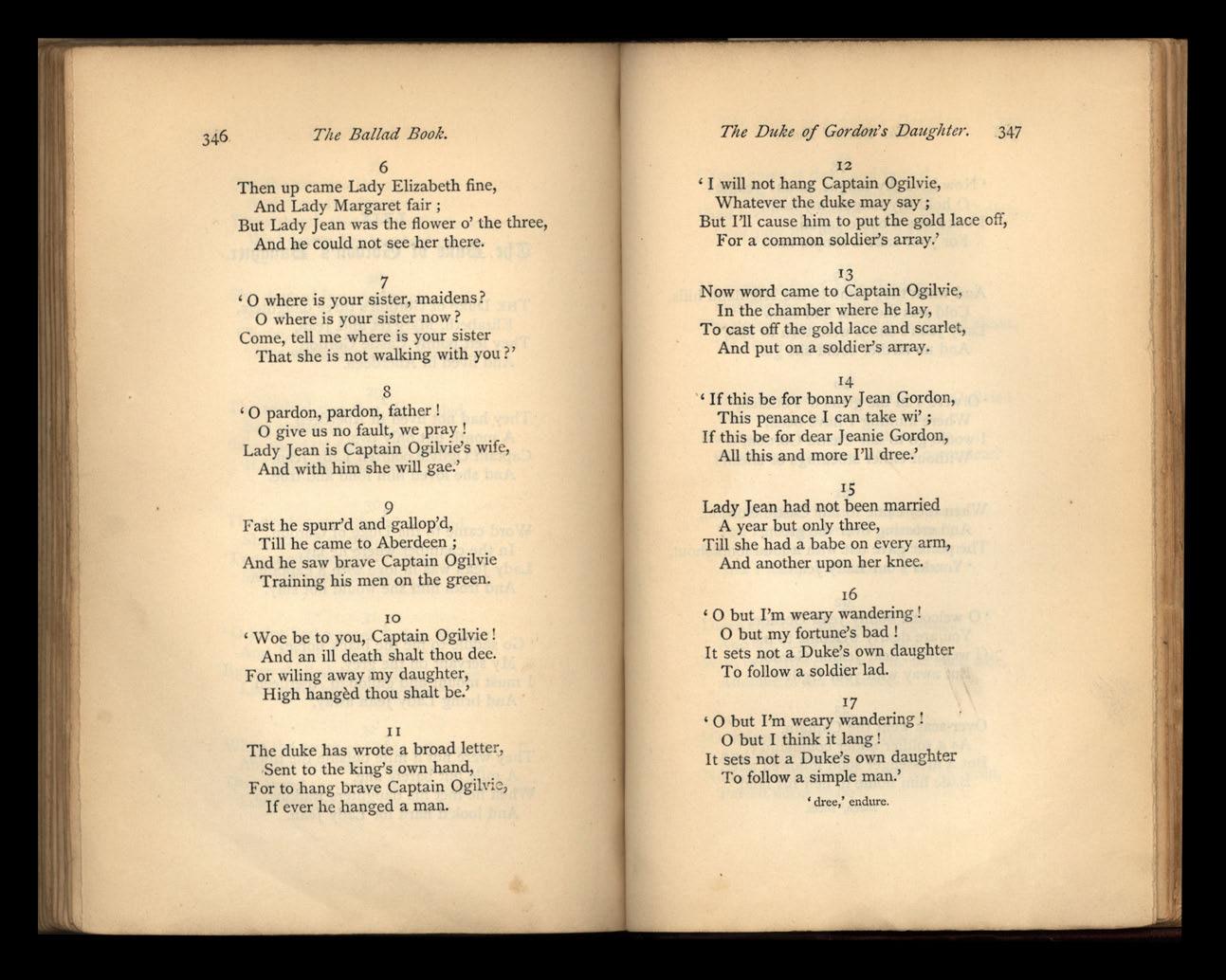
TIle Duke of Gordon's Daugltter.
12
, I will not hang Captain Ogilvie, Whatever the duke may say; 347
But I'll cause him to put the gold lace off, For a common soldier's array.'
13
Now word came to Captain Ogilvie, In the chamber where he lay, To cast off the gold lace and scarlet, And put on a soldier's array.
14 , If this be for bonny Jean Gordon, This penance I can take wi' ; If this be for dear J eanie Gordon, All this and more I'll dree.'
15
Lady Jean had not been married A year but only three, Till she had a babe on every arm, And another upon her knee.
16
, 0 but I'm weary wandering! o but my fortune's bad!
I t sets not a Duke's own daughter
To follow a soldier lad.
17
, 0 but I'm weary wandering!
o but I think it lang ! It sets not a Duke's own daughter
To follow a simple man.'
C drcc.:::,' endure.
Tlte Ballad Book.
18
, Now hold thy tongue, bonny J eanie ! o hold thy tongue, my Iamb! I once was a noble captainFor your sake a simple m an.'
19
And when they came to the Highland hill s, Cold was the frost and snow; Lady Jean's shoes were torn to bit s, And no farther could she go.
20
'0 were I in the glens 0' FoudIen, Where hunting I have been, I would go to fair Castle Gordon, Without either stockings or sheen!
2I
When they came to fair Castle Gordon, And crossing over the green, The porter gave out with a loud loud shout, 'Yonder's our Lady Jean!'
22
, 0 welcome bonny Jean Gordon, You are dearly welcome to me! o welcome, dear J eanie Gordon, But away with your Ogilvie ! '
23
Over-seas went the Captain, As a soldier under command; But a messenger soon followed after, Bade him home to heir his land. , sheen,' shoes.
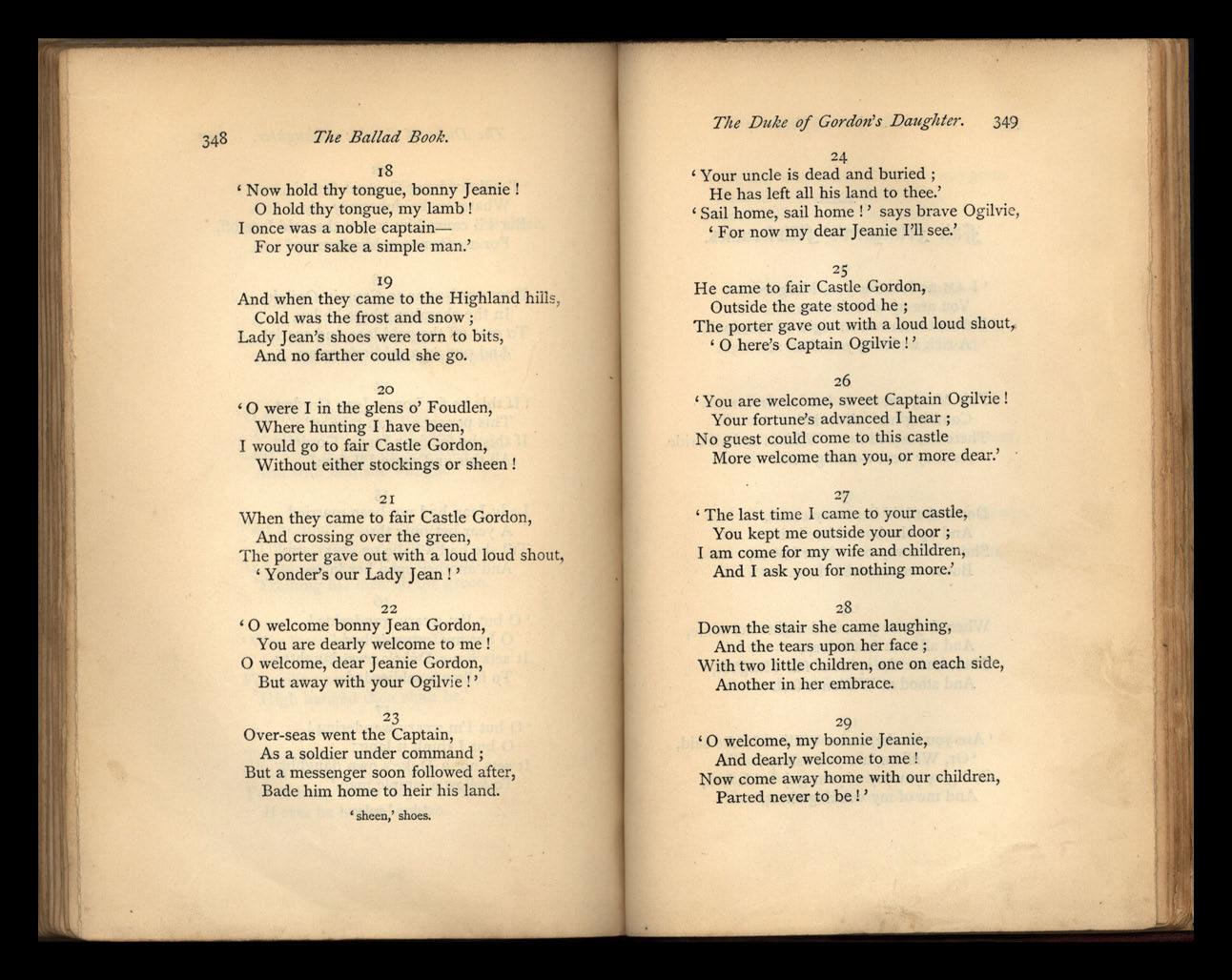
Tlte Duke of Cordon's Daugltter.
24
, Your uncle is dead and buried; He has left all his land to thee.'
349 , Sail home, sail hom e !' says brave Ogi lvi e, 'For now my dear Jeanie I'll see.'
25
He came to fair Castle Gordon, Outside the gate stood he ; The porter gave out with a loud loud shout, , 0 here' s Captain Ogilvie ! '
26
'You are welcome, sweet Captain Ogilvie! Your fortune's advanced I hear; No guest could come to this castle More welcome than you, or more dear.'
27
, The last time I came to your castle, You kept me outside your door; I am come for my wife and children, And I ask you for nothing more.'
28
Down the stair she came laughing, And the tears upon her face; With two little children, one on each side, Another in her embrace.
29
'0 welcome, my bonnie Jeanie, And dearly welcome to me ! Now come away home with our children, Parted never to be ! '
350 Tile Ballad Book.

I
, I AM no love for you, Margaret, You are no love for me. Before to-morrow at eight of the clock, A rich wedding you shall see.'
2
Fair Margaret sat in her bower-window
Combing her yellow hair;
There she espied sweet William and his bride, As they were a-riding near.
3
Down she laid her ivory comb, And up she bound her hair; She went away out of her bower, But never returned there.
4
\Vhen day was gone and night was come, And all men fast asleep, There came the spirit of fair Marg'ret, And stood at William's feet.
5 , Are you awake, sweet William ?' she said, 'Or, William, are you asleep?
God give you joy of your gay bride-bed, And me of my winding-sheet.'
6
When day was come, and night was gone, And all men waked from sleep, Sweet William to his lady said, 'Alas, I have cause to weep.
7
, I dreamt a dream, my dear ladye,Such dreams are never good,I dreamt my bower was full of red swine, And the walls ran down with blood.'
8
He called up his merrymen all, By one, by two, and by three; Saying, ' I 'll away to fair Margaret's bower, By the leave of my ladye.'
9
And when he came to fair Margaret's bow er, He knocked at the ring; And who so ready as h er seven brethren, To let sweet William in.
10
He turned down the covering-sheet, To see the face of the dead.
, Methinks she looks all pale and wan; She hath lost her cherry red.
II
'I would do more for thee, Margaret, Than would any of thy kin: And I will kiss thy pale cold lips, Though a smile I cannot win.'
352 Tlte Ballad Boo!.:.
IZ
With that bespake the seven brethren, Making most piteous moan, 'You may go and kiss your jolly brown bride, And let our sister alone! '
13
, If I do kiss my jolly brown bride, I do but what is right; I ne'er made a vow to yonder poor corpse, By day, nor yet by night.
14
, Deal on, d eal on, ye merrymen all, Deal on your cake and your wine; Whatever is dealt at her funeral to-day, Shall be dealt to-morrow at mine.'
15
Fair Margaret died as it might be to-day, Sweet WilIiam he died the morrow, Fair Margaret di ed for pure true love, Sweet William he died for sorrow.
16
Margaret was buried in the lower chancel, And William in the higher; Out of her breast there sprang a rose-tree, And out of his a briar.
17
They grew till they grew unto the church-top, And then they could grow no higher; And there they tied a true-lover's knot, Which made all people admire.

Lord ROllald.
18
At last the clerk of the parish came, As the truth doth well appear, And by misfortune he cut them down, Or else they had now been here .
, 0 WHERE hae ye been, Lord Ronald, my son? o where hae ye been, my handsome young man?'
, I hae been to the wood; mother, make my bed soon,
For I'm weary wi' hunting, and fain would lie down.'
Z
'\Vhere gat ye your dinner, Lord Ronald,my son?
\ Vhere gat ye your dinner, my handsome young man?'
, I dined wi' my lo ve; mother, make my bed soon, For I'm weary wi' hunting, and fain would lie down.'
3
, \Vhat gat ye to dinner, Lord Ronald , my son? What gat ye to dinner, my handsome young man?
'I gat eels boil' d in broo; mother, make my bed soon,
For I 'm weary wi' hunting, and fain would lie down.' AA
35-+ TIle Ballad Book.
4
, And where are your bloodhounds, Lord Ron ald, my son?
And where are your bloodhounds, my handsome youn g man?'
, 0 they swell' d and they died; mother, make my bed soon,
For I'm weary wi' huntin g, and fain would lie down.'
5
'0 I fear ye are poison'd, Lord Ronald, my son!
o I fe a r ye are poison' d, my h andso me young man!'
, 0 yes, I am poison'd! mother, make bed
For I 'm sick at the h ear t, and I fam would he down.'
LXXII
¥ ouug :J)Obll aull bis -m:rue
A FAIR maid sat at her bower-door, Wringing her lily hands;
And by it came a sprightly youth
Fast trippin g o'er th e st rand s. :2
'\Vhere gang ye, young John,' she says, 'Sae early in the day?
It gars me think, by yo ur fast trip , Your journey's far away.'
C gars,' makes.

Young 'John and Ms True Sweetheart. 355
3
He turn'd about wi' an angry look
And said, 'Wh a t 's that to thee?
I'm gae n' to see a lovely may That fa irer far than ye.'
4
'Now hae you pl ayed me this fause love In simmer, mid the flow'rs ? '
I sall r epay ye back again
In winter, 'mid the show'rs.
5
'But .again, dear love, and again, dear love, WIll ye not turn again?
For as ye look to ither women Sall I to ither men.'
6
, 0 make your choice 0' whom you please For I my choice will h ave' '
I , ' ve chosen a fairer may than the e I never will deceive.' '
7
She' s kilted up her claithing fine, And after him gaed she;
But aye he said, 'Turn back, turn back, Nae further gang wi' me!'
8
'But. again, dear love, and again, dear love, WIll ye never lo ve me again?
Alas for lovin g you sae weel, And you nae me again!'
.. TIle Ballad Book.
9
The firstan town that they cam' till, He bought her brooch and ring; But aye he bade her turn again, And nae farther gang wi' him.
10
, But again, dear love, and again, dear love, Will ye never love me again? Alas! for loving you sae weel, And you na me agai n! '
II
The second town that they cam' till, His he art it grew mair fain; And he was as deep in love wi' her As she wi' him again.
12
The neistan town that they cam' till, He bou ght her wedding-gown; And made her lady 0' ha's and bowers, In bonny Berwick town.
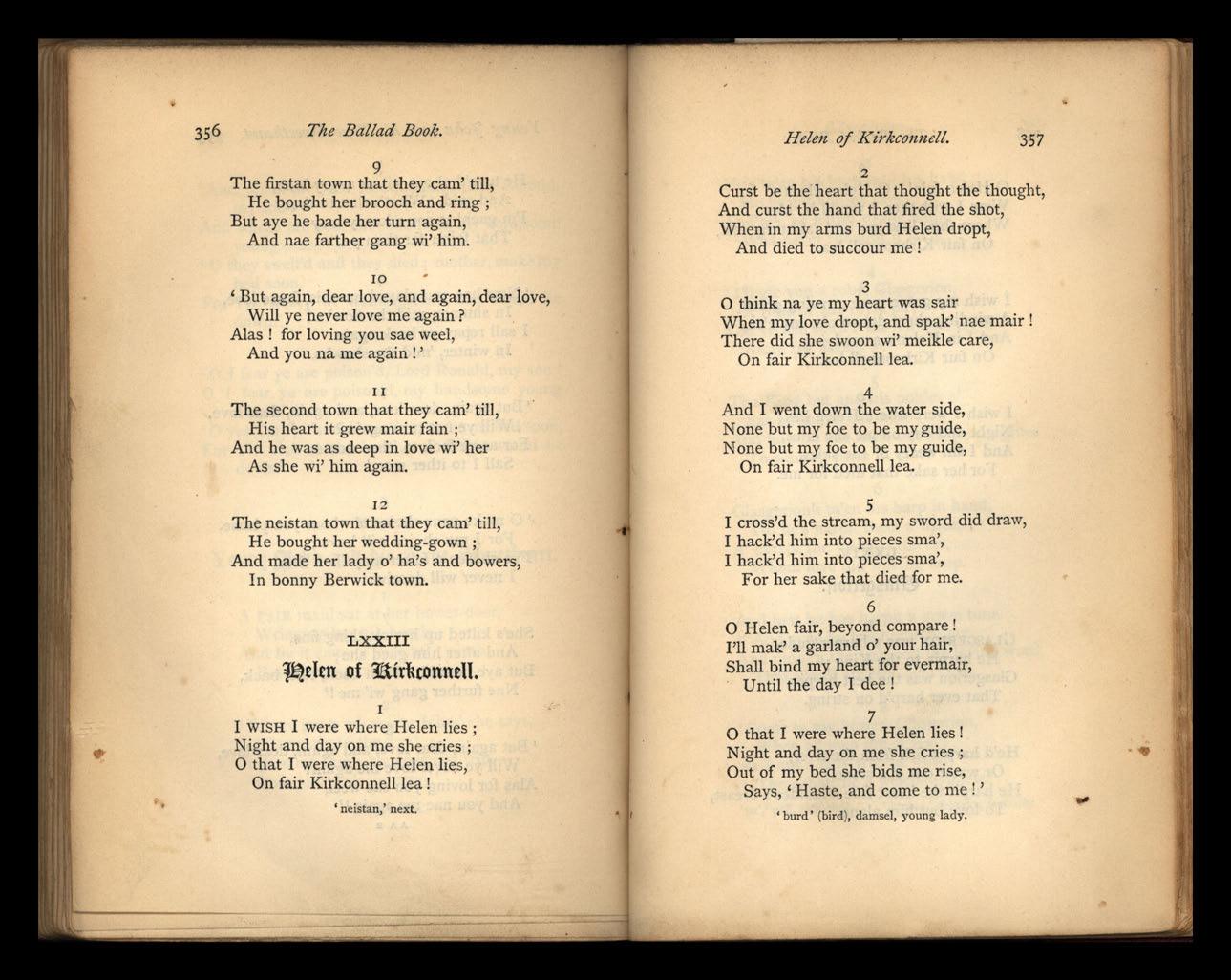
I WISH I were where Helen lies; Night and day on me she cries; o that I were where Helen On fair Kirkconnelllea !
I neistan,' next.
Helm of K£rkc01l1lCII. 357
2
Curst be the heart that thought the thought, And curst the hand that fired the shot, "Vhen in my arms burd Helen dropt, And died to succour me !
3
o think na ye my heart was sair When my love dropt, a nd spak' nae mair ! There did she swoon wi' meikle care, On fair Kirkconnell lea.
4
And I went down the water side, None but my foe to be my guide, N one but my foe to be my guide, On fair Kirkconnelllea.
5
I cross'd the stream, my sword did draw, I hack'd him into pieces sma', I hack' d him into pieces sma', For her sake that died for me.
6
o Helen fair, beyond compare! I'll mak' a garland 0' your hair, Shall bind my heart for evermair, Until the day Idee!
7
o that I were where Helen lies! Night and day on me she cries; Out of my bed she bids me rise, Says, ' Haste, and come to me ! '
• burd' (bi rd ), damsel, young lady. .,.
35 8 Tile Ballad Book.
8
o Helen fair! 0 Helen chaste! Were I with thee I would be blest Where thou liest low and tak'st th; rest On fair Kirkconnelllea. '
I . 9 grave were growing green, A wllld.mg-sheet drawn o'er my e'en, And I III Helen's arms lying On fair Kirkconnelllea. '
IO
I I were where Helen lies! NIght and day on me she cries And I am weary of the skies ' For her sake that died for LXXIV
Qlilasget'ion.
I
GLASGERI?N was a harper gude, He harplt to the King' Glasgerion was the best harper That ever harp'd on string.
2
He'd harp a fish from the river Or water out 0' a stane . ' He harpit the heart frae a'maiden's breast To love but him alane. '
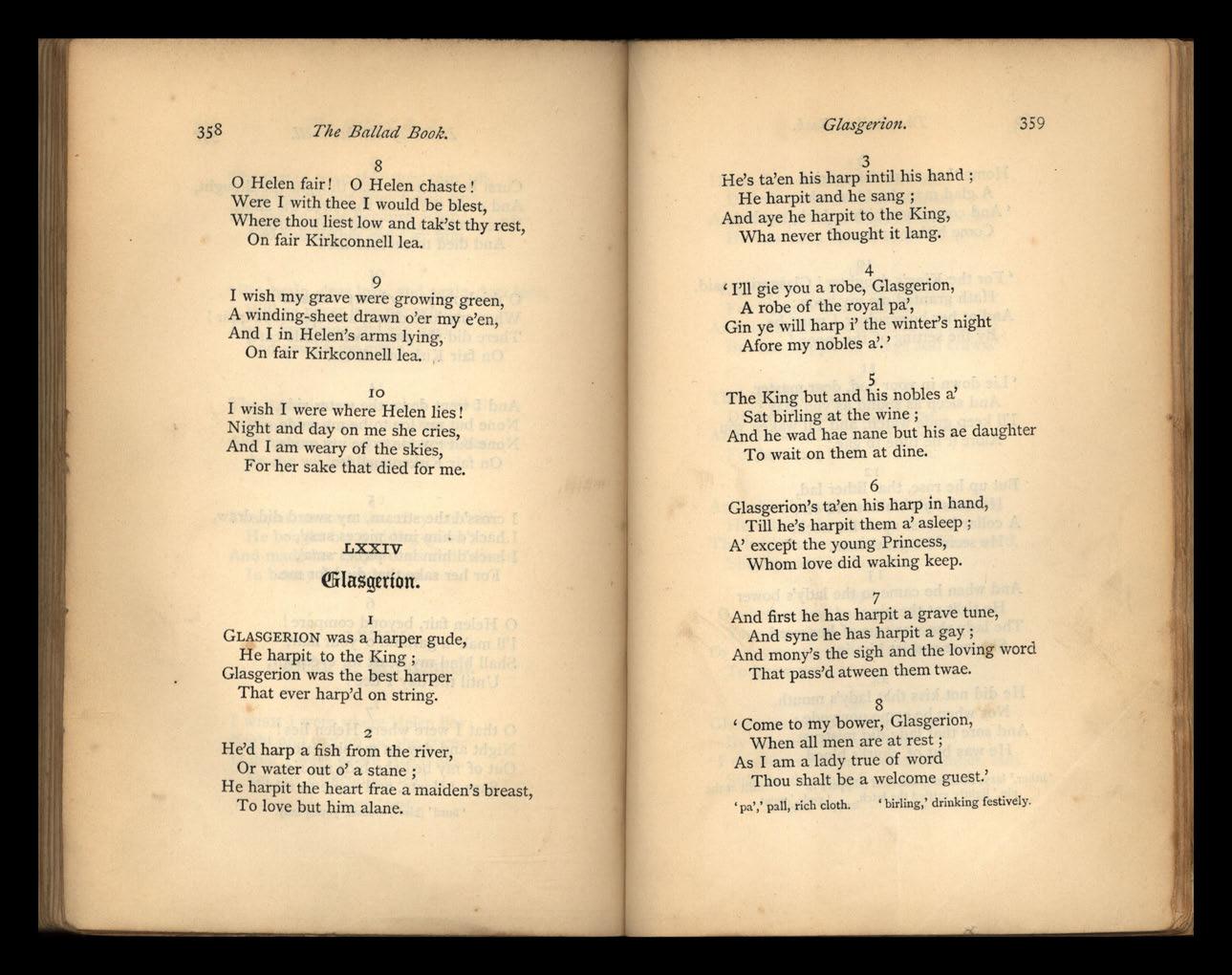
35 9
3
He's ta'en his harp intil his hand; He harpit and he sang; And aye he harpit to the King, Wha never thought it lang.
4
, I'll gie you a robe, Glasgerion, A robe of the royal pa', Gin ye will harp i' the winter's night Afore my nobles a'. '
5
The King but and his nobles a' Sat birling at the wine; And he wad hae nane but his ae daughter To wait on them at dine.
6
Glasgerion's ta'en his harp in hand , Till he's harpit them a' asleep; A' except the young Princess, Whom love did waking keep.
7
And first he has harpit a grave tune, And syne he has harpit a gay; And mony's the sigh and the loving word That pass'd atween them twae.
8
, Come to my bower, Glasgerion, When all men are at rest; As I am a lady true of word Thou shalt be a welcome guest.'
, pa',' p3.11, rich cloth. C birling, I drinking festively.
The Ballad Book.
9
Home then came Glasgerion ; A glad man, lord! was he : 'And come thou hither, Jack, my boy, Come hither unto me.'
10
, For the King's daughter,' Glasgerion said, Hath granted me my boon: And at her bower-door I must be, By the setting of the moon.'
II
, Lie down in your bed, dear master, And sle ep as sound a s you may; I'll keep gude watch, and I'll waken you Afore it be time to gae.'
12
But up he rose, th a t lither lad, His master's clothes did on ; A collar he cast upon his neck, He seem' d a gentleman.
13
And when he came to the lady's bower He tirlit at the pin: The lady she was true of her word She rose and let him in. '
14
He did not kiss th a t l a dy's mouth, N or when he came nor yode ; And sore that l a dy did mistrust He was but of churl's blood.
' Iith er,' lazy, dissolute, d ecei tful (s lippery ?). • tirlit at the pin,' li g htly rattled th e lat c h. ' yode,' went.

15
Home then came that lither lad, Did off baith cloak and shoon, And cast the coll a r from off his neck: He was but a churl's son.
16
'Won up, won up, good master! For I fear it is d ay- d a wn, And there' s nae a cock in a' the land But has wappit its wings and crawn.'
17
Then quickly rose Glasgerion, Did on his hosen and shoon, And cast a collar about his neck; For he was a lord's own son. IS
And when he came to the lady's bower, He tirlit at the pin : The lady was more than true of her word, She rose and let him in.
19
, 0 whether now have you left with me
Your bracelet or your glove?
Or are you returned back again To know more of my love?'
20
Glasgerion swore a full great oath, By oak and ash and thorn, , I was never before in your chamber, lady, Sith the day that I was born.' 'wappit,' flappe d. 'crawn ,' crow'd.
TIle Ballad Book.
2I
, 0 then it was your lither foot page; He hath beguilM me:' Then she pull'd forth a little sharp knife That hang down by her knee.
22
O'er her white feet the red blood ran Or ever a hand could stay; And dead she lieth on her bower-floor, At the dawning 0' the day.
23
Home then he runs, Glasgerion, And woe, good lord! was he : Says, 'Come thou hither, Jack my boy, Come hither unto me.'
24
, If I had taken a life to-night, Jack, I would tell it to thee; But if I have taken no life to-night, Jack, thou hast taken three.'
25
And he pullM out his bright brown sword, And dried it on his sleeve, And there smote off that lither lad's head, Who did his lady grieve.
26
He set the sword's point to his breast, The pummil to a stone: Through the falsen ess of that lither lad, These three lives were all gone.
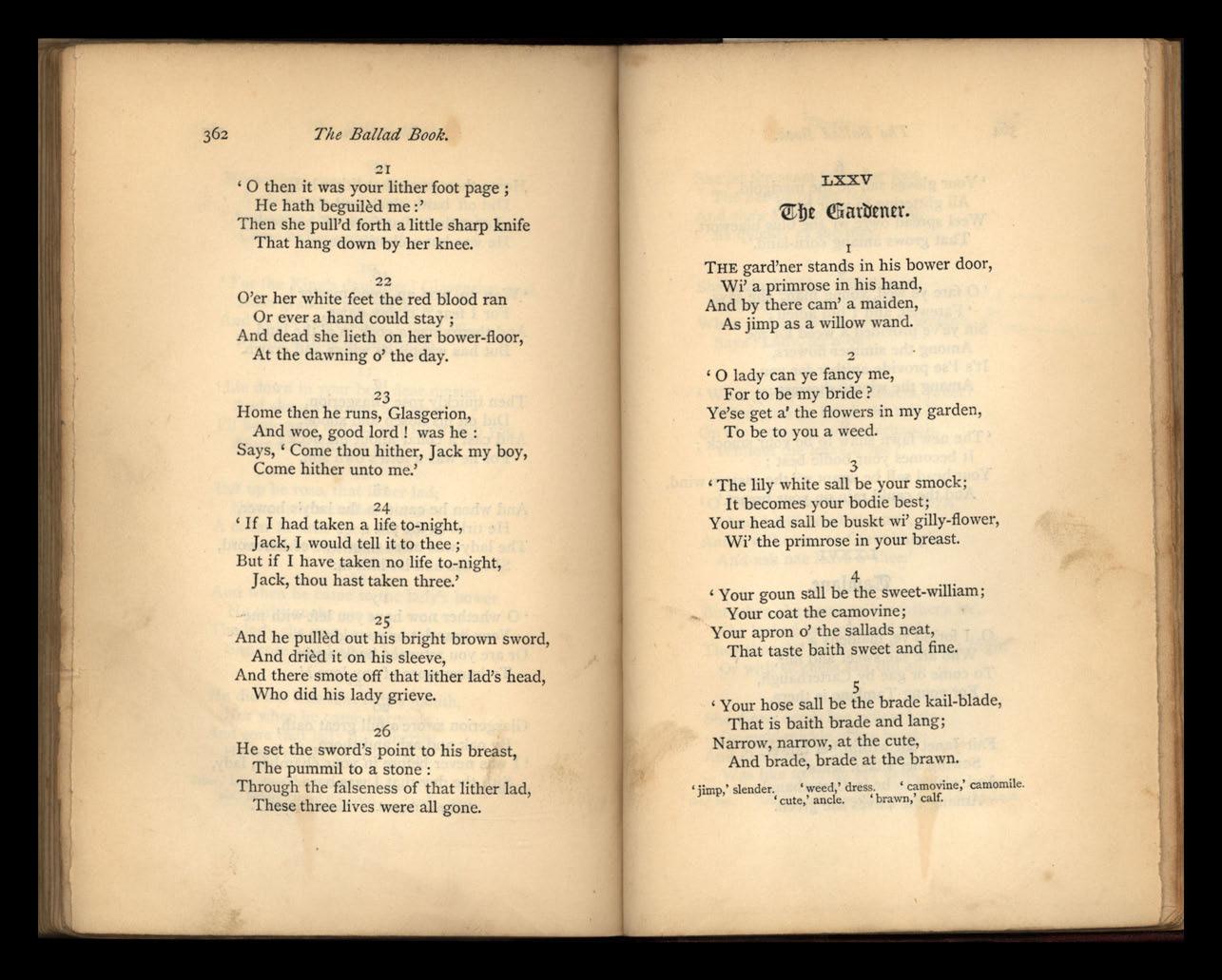
LXXV I
THE gard'ner stands in his bower door, Wi' a primrose in his hand, And by there cam' a maiden, As jimp as a willow wand.
2
'0 lady can ye fancy me, For to be my bride? Ye'se get a' the flowers in my garden, To be to you a weed.
3
, The lily white sall be your smock; It becomes your bodie best; Your he ad sall be buskt wi' gilly-flower, Wi' the primrose in your breast.
4
'Your goun sall be the sweet-william; Your coat the camovine; Your apron 0' the sallads neat, That taste baith sweet and fine.
5
'Your hose sall be the brade kail-blade, That is baith brade and lang; Narrow, narrow, at the cute, And brade, brade at the brawn.
'jimp,' slender. (weed,' dre ss. camomile. (cute,' anele. (brawn, calf.
The Ballad Book.
6
'Your gloves saIl be the marigold, All glittering to your hand, Weel spread owre wi' the blue blaewort, That grows amang corn-land.'
7
• 11 <!A. MAj' ,O fare ye weil, young man,' she says, 'T 'tMl. 'Fareweil, and I bid adieu; .. '( .. Sin ye've provided a weed for me
Among the simmer flowers, It's I'se provide anither for you, Amang the winter-showers:
8
'The new fawn s naw to be your smock; I t becomes your bodie best; Your head saIl be wrapt wi' the eastern wind, And the cauld rain on your breast.'
LXXVI I
0, I forbid ye, maidens a', Who are sae sweet and fair, To come or gae by Carterhaugh, For young Tarnlane is there.
2
Fair Janet sat within her bower, Sewing her silken seam, And wish'd to be in Carterhaugh, Amang the leaves sae green.
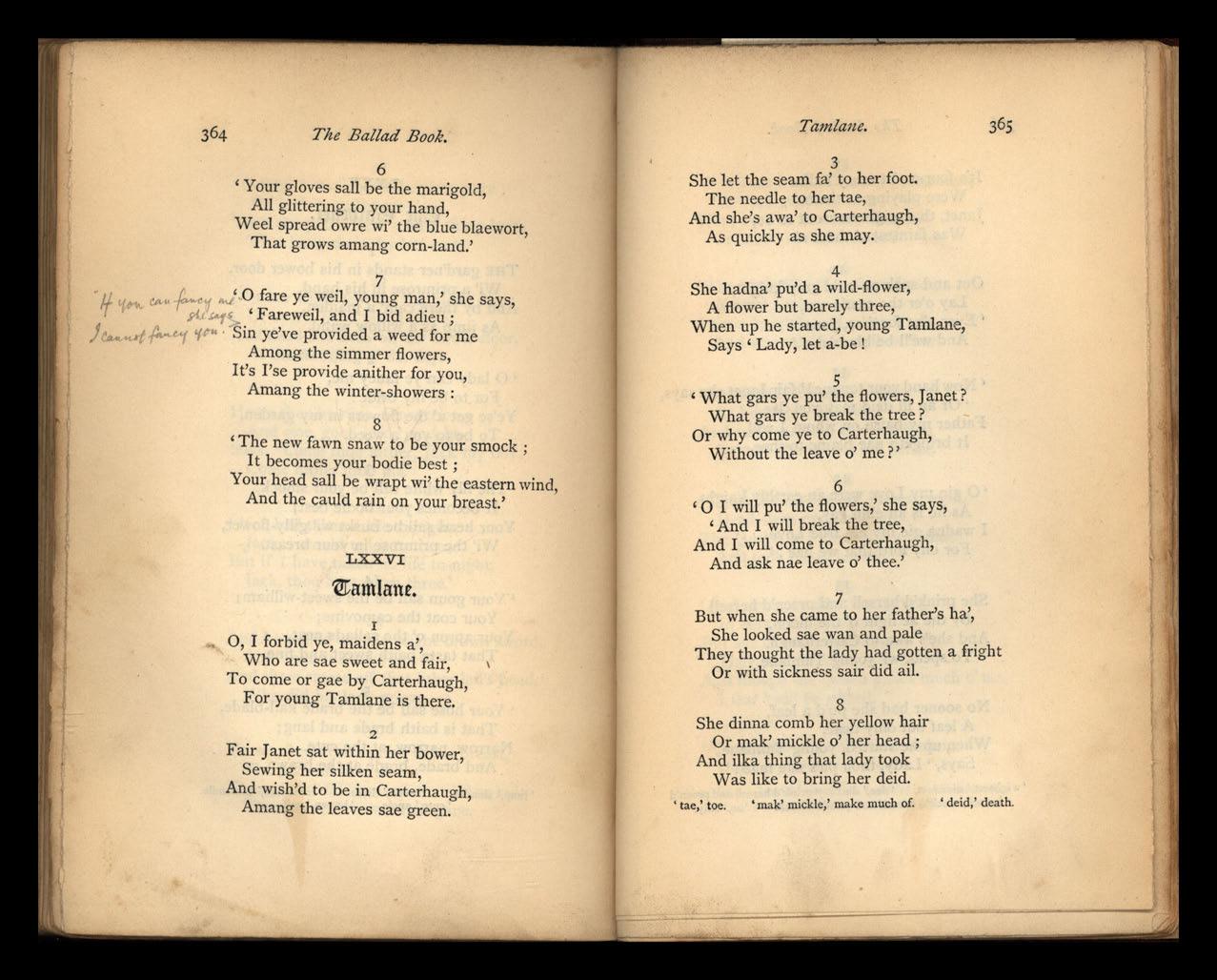
Tamla1le.
3
She let the seam fa' to her foot. The needle to her tae, And she's awa' to Carterhaugh, As quickly as she may.
4
She hadna' pu'd a wild-flower, A flower but barely three, When up he started, young Tamlane, Says' Lady, let a-be!
5
'What gars ye pu' the flowers, Janet? What gars ye break the tree?
Or why come ye to Carterhaugh, Without the leave 0' me?'
6
'0 I will pu' the flowers,' she says, , And I will break the tree, And I will come to Carterhaugh, And ask nae leave 0' thee.'
7 ,
But when she came to her father's ha, She looked sae wan and pale They thought the got ten a fright Or with sickness salr did all.
8
She dinna comb her yellow hair Or mak' mickle 0' her head; And ilka thing that lady took Was like to bring her deid.
' tae,' toe. 'mak' rnickle,' make much of. ' deid,' death.
The Ballad Book.
9
It's four-and-twenty ladies Were playing at the ba' ; Janet, that wightest wont to be, Was faintest 0' them a'.
10
Out and spak an auld grey knight, Lay o'er the castle wa',, Ever alas for thee, Janet ! And we'll be blamed a'.'
11
, Now haud your tongue!' fair Janet she says , Or an ill deid may you dee ! ' Father my bairn on whom I will It bringeth nae blame to thee.'
12
, 0 gin my Love were an earthly knight
As he is an elfin gay, ' I wadna gie my ain true Love For ony lord that we hae ! '
13
She prink'd hersell and preen'd hersell By the ae light a' the moon, And she's awa to Carterhaugh, To speak wi' young Tamlane.
I4
No sooner had she pu'd a leaf, A leaf but only twae, When up he started, young Tamlane, Says, ' Lady, thou pu's nae mae ! '
C wightest,' nimbl e st. . , dee,' die. 'prink'd herselI and preen'd hersell,' deck'd herself and pinn'd he rself. 'ae,' only.
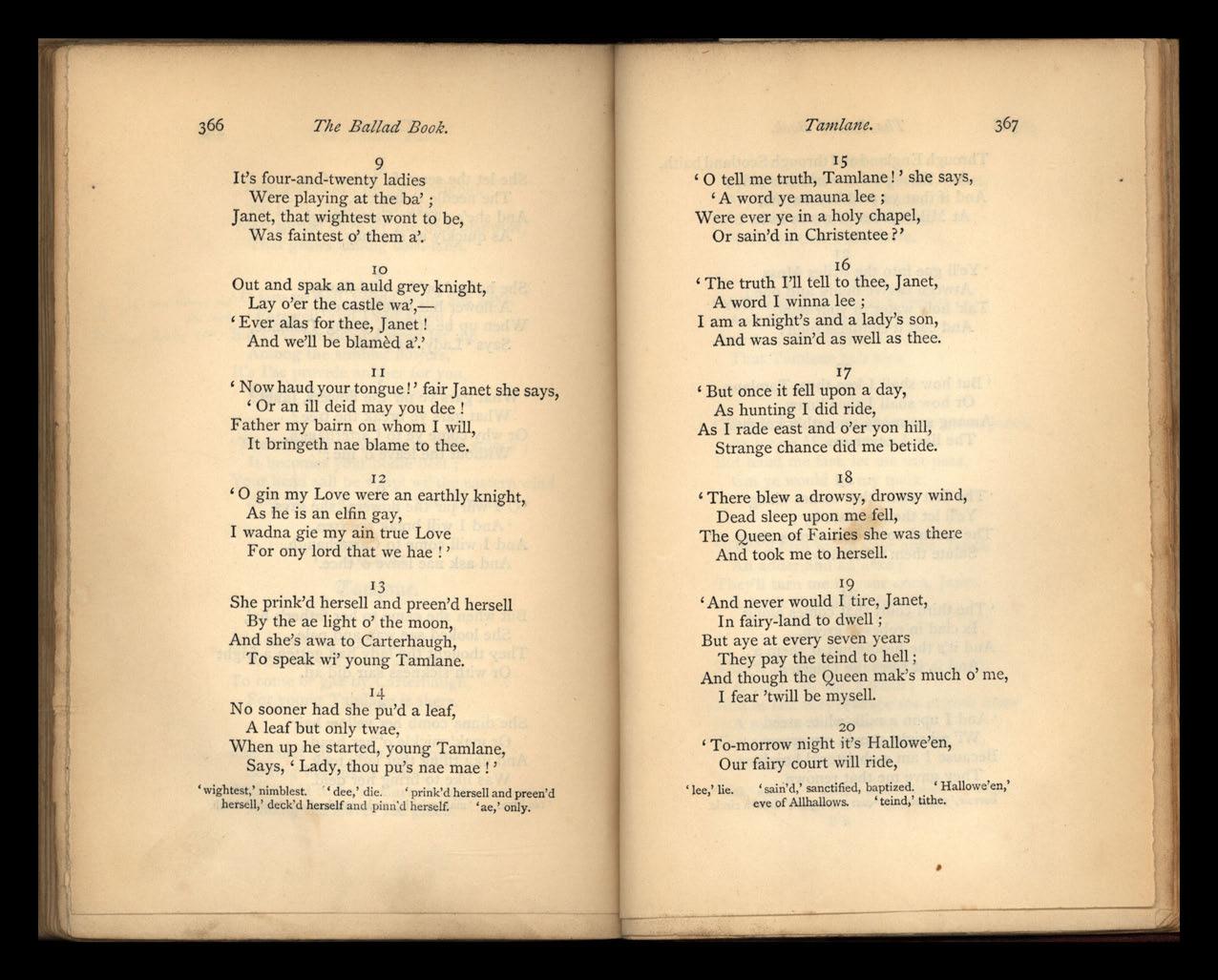
Tamlalte.
15
, 0 tell me truth, Tamlane! ' she says, , A word ye mauna lee ; Were ever ye in a holy chapel, Or sain'd in Christentee?'
16
, The truth I'll tell to thee, Janet, A word I winna lee; I am a knight's and a lady's son, And was sain'd as well as thee.
17
, But once it fell upon a day, As hunting I did ride, As I rade east and o'er yon hill, Strange chance did me betide.
18
, There blew a drowsy, drowsy wind, Dead sleep upon me fell, The Queen of Fairies she was there And took me to hersell.
19
, And never would I tire, Janet, In fairy-land to dwell ; But aye at every seven years They pay the teind to hell ; And though the Queen mak' s much 0' me, I fear 'twill be my sell.
20
, To-morrow night it's Hallowe'en, Our fairy court will ride, 'lee,' lie. 'sain'd,' sanctifie d, baptized. 'Hallowe'en,' eve of Allhallows. • teind,' tithe.
TIle Ballad Book.
Through England and through Scotland baith, And through the world sae wide; And if that ye wad borrow me, At Miles Cross ye maun bide.
21
'Ye'll gae into the Miles Moss
Atween twelve hours and one; Tak' holy water in your hand, And cast a compass roun'.'
22 , But how sh all I ken thee, Tamlane, Or how shall I thee knaw, Amang sae mony unearthly knights , The like I never saw?'
23
'The first court that comes along Ye'll let them a' pass by ; The second court that comes along Salute them reverently.
24
, The third court that comes along Is clad in robes 0' green, And it's the head court 0' them a', And in it rides the Queen;
25
, And I upon a milk-white steed Wi' a bright star in my crown; Because I am a christen'd knight They gave me that renown. borrow,' ransom. , cast a compass,' draw a circle.
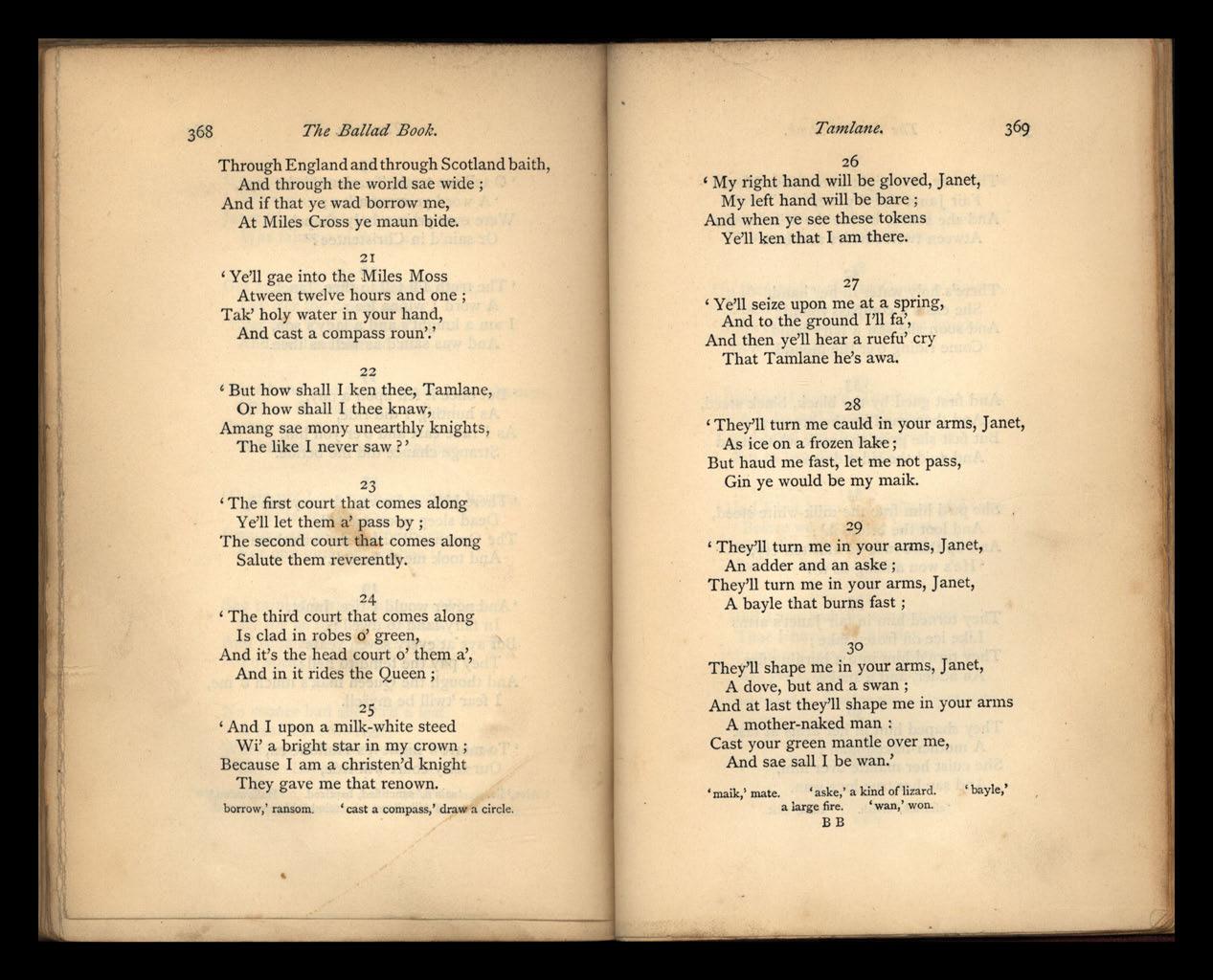
Tamlalle.
26
, My right hand will be gloved, Janet, My left hand will be bare; And when ye see these tokens Ye'll ken that I am there.
27
'Ye'll seize upon me at a spring, And to the ground 1'11 fa', And then ye'll hear a ruefu' cry That Tamlane he's awa.
28
, They'll turn me cauld in your arms, J anet, As ice on a frozen lake; But haud me fast, let me not pass, Gin ye would be my maik.
29
, They'll turn me in your arms, J anet, An adder and an aske ; They'll turn me in your arms, Janet, A bayle that burns fast;
30
They'll shape me in your arms, J anet, A dove, but and a swan; And at last they'll shape me in your arms A mother-naked man: Cast your green mantle over me, And sae sall I be wan.' mate. 'aske,' a kind of li zard . a large fire . ' wan, won. BB 'bayle,'
37 0 TIle Ballad Book.
3 1
The very next night unto Miles Moss Fair Janet she is gone, And she stands beside the Miles Cross Atween twelve hours and one.
There's holy water in her hand, She casts a compass round; And soon she saw a fairy band Come riding o'er the mound.
33
And first gaed by the black, black steed, And then gaed by the brown; But fast she gript the milk-white steed And pu'd the rider down.
34
She pu'd him frae the milk-white steed, And loot the bridle fa' ; And up there rase an eldritch cry, , H e's won amang us a' ! '
35
They turned him in fair Janet's arms Like ice on frozen l a k e; They turn'd him into a burning fire, An adder, and a snake.
36 They shaped him in her arms at last A mother-naked man; She cuist her mantle over him, And sae her true-love wan. 'eldritch,' elvish. , cuist,' cast.

Ta1lllalle.
37
Up then and spak' the Queen 0' Fairi es, Out 0' a bush 0 ' broom, , She that has borrow' d young Tamlane, Has gotten a stately groom! '
38
Up then and spak' the Queen 0' Fairies, Out 0' a bush 0' rye, , She's ta'e n awa the bonniest knight In a' my companie !
39
, But had I kenn'd, Tamlane,' she says, , A lady wad borrow'd thee, I wad ta'e n out thy twa grey e'en, Put in twa e'en 0' tree.
40
, Had I but kenn'd, Tamlane,' she says, , Before we cam' frae hame, I wad ta'en out your heart 0' flesh, Put in a heart of stane.
41
, Had I but had the wit yestreen That I have coft this day, I ' d paid my teind seven times to hell Ere you 'd been won away!' , tree,' wood. ' cort,' bought. 'teind,' tithe .
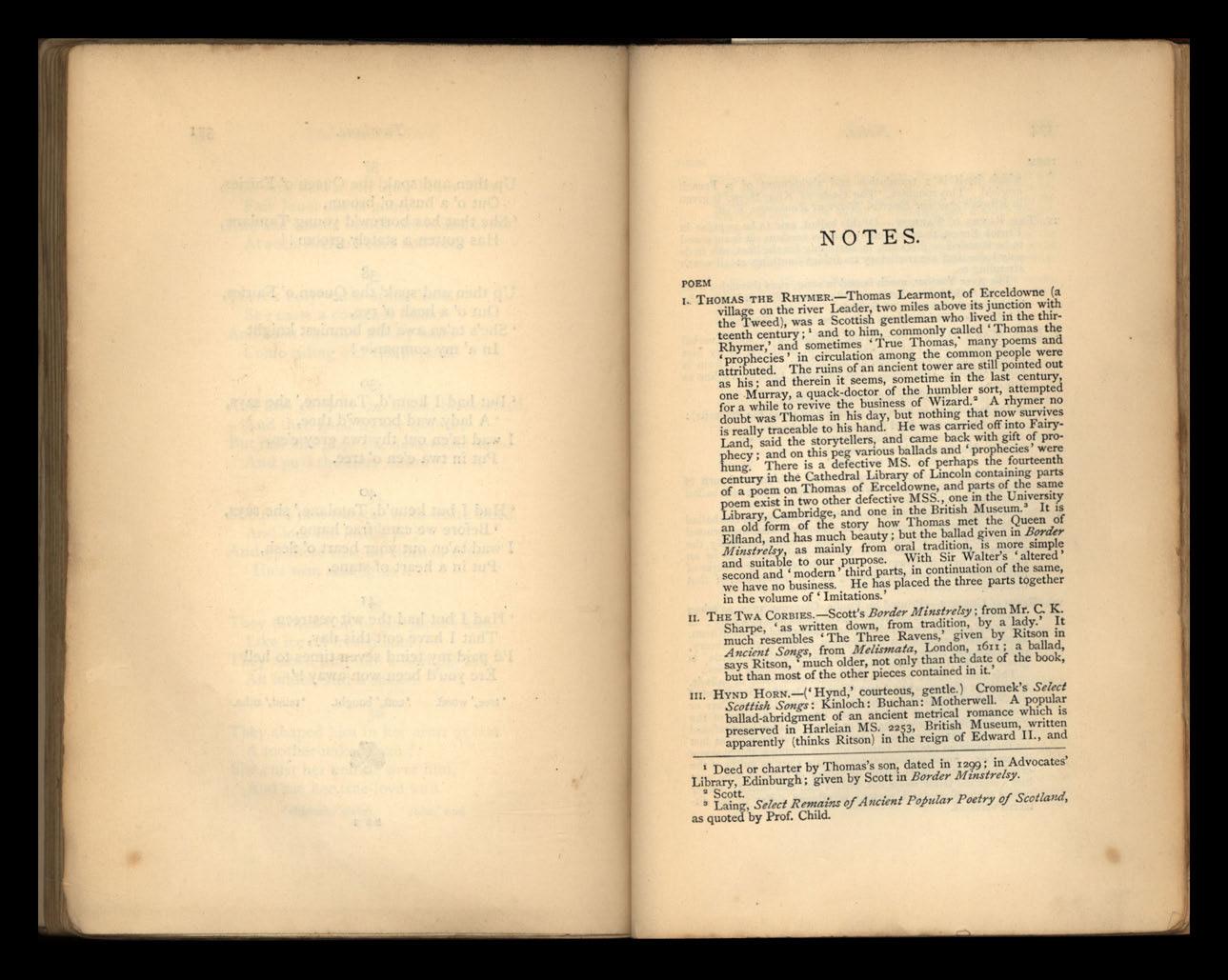
POEM
I. THOMAS THE RHYMER -Thomas Leannont, of Erceldowne (a village on the river Leader, tw o miles above its junction with the Tweed ), was a Scottish gentleman who lived in the thirteenth century; and t o him, commonly called' Thomas the and sometimes 'True Thomas,' many poems and 'prophecies ' in circulation among the common people were attributed. The ruins of an ancient tower are still poInted out as his; and therein it seems, sometime in the last century, one Murray, a quack-doctor of the humbler sort, attempted for a while to revive the business of \Vizard. 2 A rhymer no doubt was Thomas in his day, but nothing that now survives is really traceable to his hand. He was carried off into FairyLand, said the storytellers, and came back with gift of prophecy; and on thi s peg various ballads and prophecies' were hung. There is a defective MS. of perhaps the fourteenth century in the Cathedral Library of Lincoln containing parts of a poem on Thomas of Erceldowne, and parts of the same poem exist in two other defective MSS ., one in the University Library, Cambridge, a nd one in the British 1t IS an old form of the story how Thomas met the Queen of EIRand, and has much beauty; but the ballad given in Border Millstrelsy, as mainly from oral tradition , is more simple and suitable to our purpose. With Sir Waiter's I altered' second and' modem' third pa rts, in continuation of the same, we have no busi ness. He has placed the three parts together in the volume of I Imitations.'
lI. THE TWA CORBlES.-Scott's Border Mi1lstrelsy; from Mr. C K. Sharpe, I as written down, from tradition, by a lady.' It much resembles 'The Three Ravens,' given by Ritson in Anciell,t from Melismata, London, 16u; a ballad, says Ritson, much older, not only than the date of the book, but than most of the other pieces contained in it.'
lIt. HVND H ORN.-{' Hynd,' courteous, gentle.) Cromek's Select Scottis" S01'gs: Kinl och: Buchan: Motherwell. A popular ballad-abridgment of an ancient metrical romance which is preserved in Harleian MS. 2253, British Museum, written apparently (thinks Ritson ) in the reign of Edward H., and
1 Deed or charter by Thomas's so n, dated in 129]: in Advocates' Library, Edinburgh; given by Scott in Border J,ft1tstre/sy. Scatl
• Laing, Select RemaiP.s of A1lclimt Popular Poetry of Scotland, as quoted by Prof. Child.
POEM
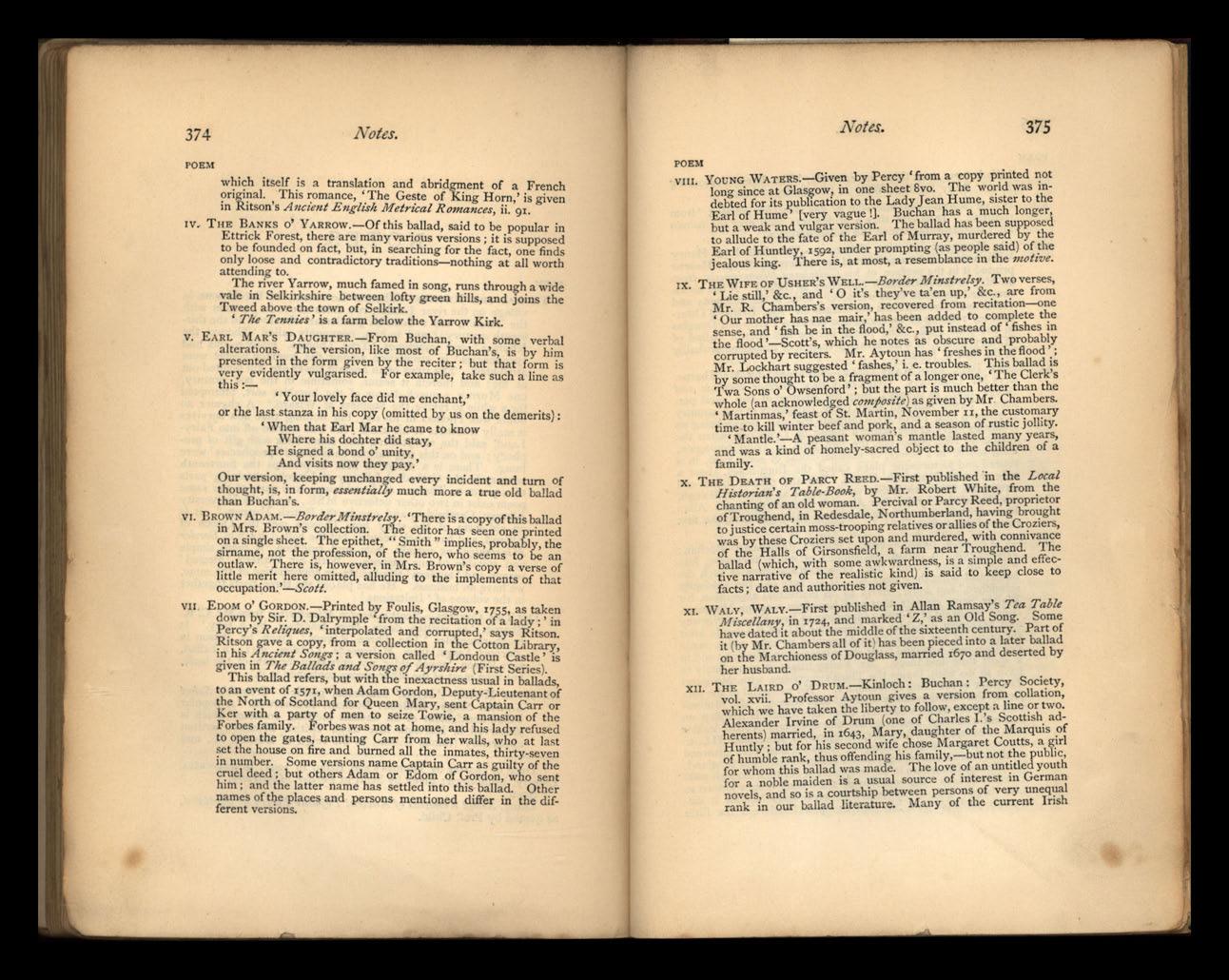
itself .is a trnnslation and abridgment of a F h
, ThiS romance, 4 The Geste of Kin H "
m Rltson s Allciellt E1lglisll. Metrical Roma:ces,Ort'g;S given
IV_ THE BANKS 0' YARRow.-Ofthis ballad said t be Ettnck Forest, there are many various ":ersio o"t .popu lar m lbe l foundeddon fact, in searching for contradictory traditions--nothing at all worth
The river Yarrow much fam d' vale in between ioft; ;;'If; hill; a wihde Tweed above the town of Selkirk. ,an Joms t e , Tlu TefUtus' is a (arm below the Yarrow Kirk.
V. EARL DAUGHTER.-From Buchan with so ha alterations: The version, like most o( Such ' f!1e b vC h ' I presented m the form given by the reciter. ban s, IS y vhe!y evidently vulgarised. For example (ol.rm IS t IS:- ' u. me as
'Your lovely face did me enchant' or the Ic;st stanza in his copy (omitted by us'on the demerits):
When that Earl Mar he came to knOIV his dochter did stay, He Signed a bond 0' unity And visits now they pay.'
Our versi.on,. keeping unchanged every incident and turn of thh ougBht, Ihs, m (orm, esse1l.tially much more a true old L_II d t an uc an's. :l
VI. a copy of this ballad
0." a single sheet. The "Smith,f r°l:actnted Slrname, not the .professlon, or t he hero, to the :rhere IS, however, In Mrs. Brown's an littl e merit here omitted alluding to the' i OPY a verse of occupation. '-Scott.' Imp ements of that
Vll EOOM 0' GOROON -Printed by' F r GI D.'D;tlrymple
s e Interpolated and corrupted' says . It5;On a copy, from a collection in the Cotton Lib n. hiS (lncunt a version caned 'Londoun Ca lr.l,rr, glVen.1O TkL Ballads mm Songs 0/ Ayrshire ( F'rst S S! e ,s t This ballad f refers, but with the inexactness in o a n event 0 1571 when Adam G d D . , NO,rth of for Queen
Ker With a party of men t o seize a ptal,n rr or Forbes family. Forhes was not at home ;nd Of thci to open the gates, taunting Carr from her w II hY re use the h ouse on fire and burned all th e ;h' at last lD number, Some versions name Captain Ca y-seven deed; but others Adam o r Edom of of the him. and the latter name has settled into this balldd CO sh nt ets o( tq.e places and persons mentioned differ in' the td·,ef. r 11 n versions.
Notes. 375
VIlI. YOUNG WATERs.-Given by Percy 'from a copy printed not long since at in one sheet Bvo. The world was indebted for its pubhC:ltion to the Lady Jean Hume, sister to the Earl ofHume' (very vague!]. Buchan has a much longer, but a weak and vulgar version. The ballad has been supposed t o a llude to the fate of the Earl of Murray, murdered by the Earl of Huntley, 1592, under prompting (as people said) of the jealous king. There is, at most, a resemblance in the 11lotive.
IX. THE \VIF E OF USHER'S \V ELL.-Border Minstrels),. Twoverses, , Lie still,' &c., and' 0 it's they've ta'cn up,' &c., are from :Mr. R. Chambers's version, recovered from 'OUT mother has nae mair,' has been added to the sense, and' fish be in the flood,' &c., put instead of fishes in the flood '-Scott' s, which he notes as obscure and probably corrupted by reciters. :Mr. Aytoun has 'freshes in the flood' ; Mr. Lockhart suggested' (ashes,' i. e . troubles. This ballad is by some thought to be a fragment of a longer one, 'The Clerk's rlwa Sons 0' Owsenford' ; but th e part is much better th3n the whole (an acknowledged composite ) as given by 1I1r Chambers. , Martinmas,' (east of St. Nlartin, November Il, the customary time t o kill winter beef and pork, and a season of rustic jollity. peasant woman's mantle lasted many years, and was a kind of homcly-s.,cred object to the children of a family.
x. THE DEATH OF PARCV REED.-First published -in the Local Historian's Tahle-Book, Mr. Robert \Vhite, from the chanting o( an old woman. Percival or Parcy Reed, proprietor ofTroughend, in Redesdale, Northumberland, having brought to justice cert.1.in moss-trooping relatives or allies of the Croziers, was by the se Croziers set upon and murdered, with connivance of the Halls of Girsonsfield, a farm near Troughend. The balla d (which, with some awkwardness, is a simple and effective narrative of the r ealistic kind) is said to keep close to facts; date and authorities not given.
Xl. W LY, WALY.-First published in Allan Ramsay's Tea Tahlt ftfisullallY, in 1724, and marked' Z,' as an Old Song, Some have dated it about the middle of the sixteenth century. Part of it (by Mr. Chambers all of it l has been pieced into a later ballad on the :Marchioness of Douglass, roamed 1670 and deserted by her husband.
XII. THE LAIRD 0' DRUM,-Kinloch: Buchan: Percy Society, vol. xvii. Professor Aytoun gives a version from collation, which we have t.1.ken the liberty to follow, except a line or two. Alexander Irvine of Drum (one of Charles l,'s Scottish adherents) married, in 1643, Mary, daughter of the Marquis of H untly; but (or his second wife ch ose l\fargaret Contts, a gi rl of humble rank, thus offending his family,-but not the public, for whom this ballad was made. The love of an untitled youth for a noble maiden is a usual source of interest in German novels, and so a courtship between persons of very unequal rank in our ballad literature. Many of the current Irish
3,6 Notes.
POEM
ballads turn upon this; for example • The Bonny Lab Boy,' 'Willy Reilly,' • Willy of Lough-Erne Shore.' ounng
XTII. W,ATER.-Millstrelsy of tl,e Scat/is/I. Border 'from traditIOn. It i.s 5.'\id ,that a bridge was built over the' An after the drowning which the ballad narrates. nan
XIV. THE OF THE CHEVIOT.-This ballad (of Ft s IS here presented in modem spellin Henry pnnted I,t In the preface to his Gulklmus . efime an M.S. In 0-e collection at Oxford It certamed historical baSIS whatever: some of the incidents a'nd .,re rmowed from the ballads on • The Battle of Otterume, re atmg to an encounter between Percy and DOll fas yc'h:. The better known but inferior or in of1 i.0dermsed version of this, done probably
xv. BESslE BELL AND MARV GRAY.-Recovered b M Sh says Mr. Chambers Given in L l' A . Y r. arpe, Songs (1827), as coliated from th: c,s 'IlcU!'(t Ballads (l1ld sons.' Bessie Bell and Mary Gray aged pergel!tI.emen near Perth were friends. Bessie o :eiuntry 'IVISlt t o Mary at her father's house of Lynedoch p ague of J666 broke out the two I . e to live !n a bower, k?ntag:ion, and pIcturesque place called the B -b mdbo , In a mile west of Lynedoc h House B h urn raes, a ut a
XVI. slew them, and their bodies we;e and spot by the river Almond. (Pennant's Tour. ) verse With the same title, and using the first
SIR PATRICK SPENS -Percy' Scott· J . Jhe S\;bjj'ct of bates and what they dleretouched' say som' fi . , u eVl ent y 'Valte r e. re e rs to an meffectual expedition, Sir called th M ·gudefsseNs, that may have been sent for Margaret e al 0 orway (daughter of Eric K" f N ' of her Queen of Scotland' but she rem a' d .12 5, W IC made a short time died there: Afr Finlav liliC: km. Norway! and in have to do with Tames the Th' d' - m. s It likely to daughter of the King of s :nNrrlage Margaret ject of the ballad exists in history; says of hub- b?
'the ballad is er!rho entlc and slOgs the fate of certain Scottish her of Aldxander Ill., to testil
lished 1829 says"'! thr: have been' &c., (as Motherwell sa ) a IS ,no,:, no.wn to tremely probable that S· P k S ys --:rnd thinks It ex- Ir atne pens lived near the little
Notes. 377
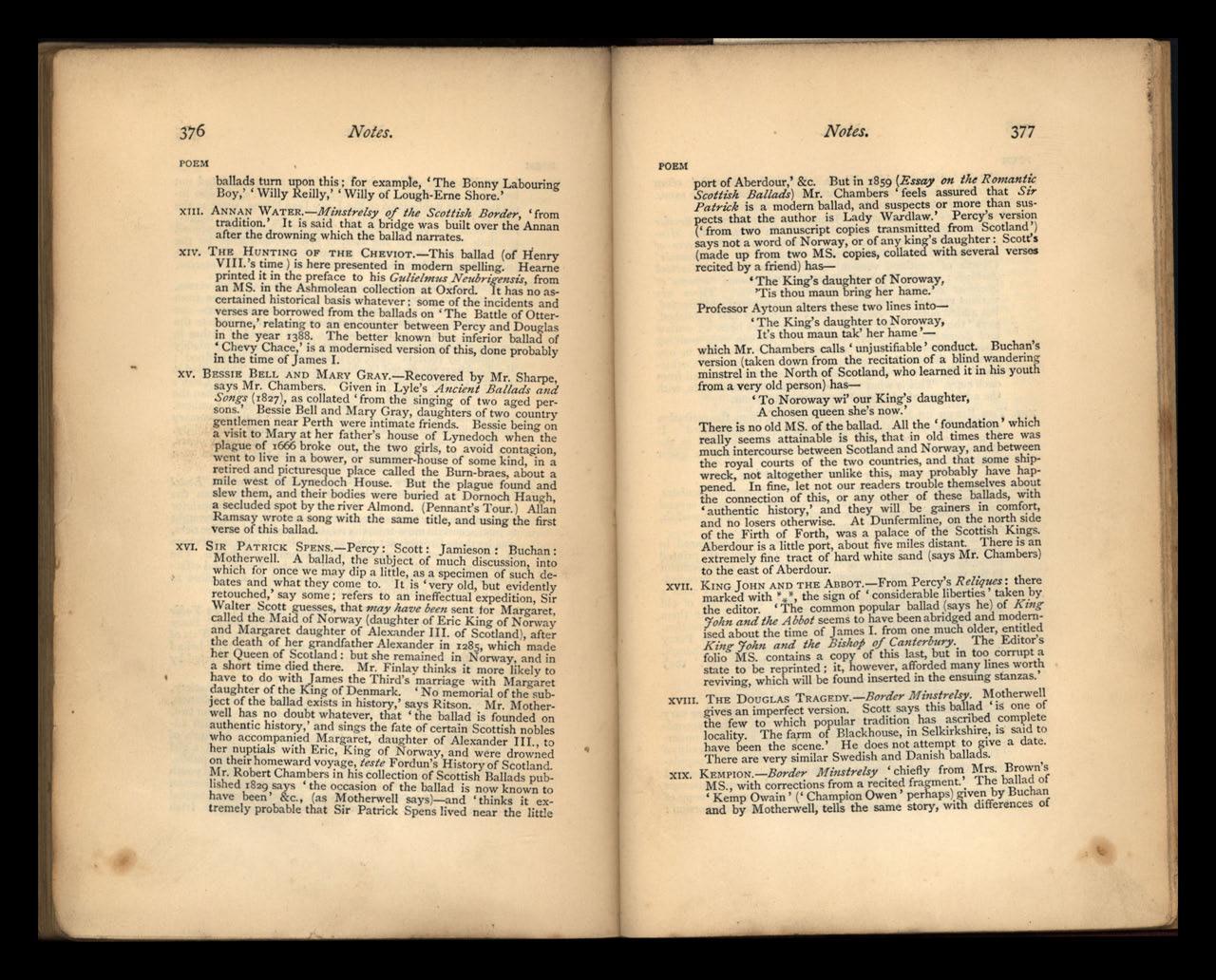
POEM
port of Aberdour,' &c. But in J8S91Essay on th. Romantic Scottish Ballads) Mr Chambers feels assured that Sir Pa/rick is a modern ballad, and suspects or more than sus'{>:Ccts that the author is Lady 'Vardlaw.' Perey's version (' from two manuscript copies transmitted from Scotland ') says not a w ord of Norway, or of any king's daughter: Scott's (made up fr om two MS. copies, collated with several versos recited by a friend) has-
• The King's daughter of N oroway, "fis thou maun bring her hame.'
Professor Aytoun alters these two lines into-
'The King's daughter to Noroway, It's thou maun tak' her hame'which Mr. Chambers calls' unjustifiable' conduct. Buchan's version (taken down from the recitation of a blind wandering minstrel in the North of Scotland, who learned it in his youth from a very old person) has-
e To N oroway wi' our King's daughter, A chosen queen she's now.'
There is no old MS. of the ballad. All the' foundation' which really seems attainable is this, that in old times there was much intercourse between Scotland and Norway, and between the royal courts of the two countries, and that some shipwreck, not altogether unlike this, may probably have happened. In fine, let not our readers trouble themselves about the connection of this, or any other of these ballads, with 'authentic history,' and they will be gainers in comfort, and no losers otherwjse. At Dunfermline, on the north side of the Firth of Forth, was a palace of the Scottish Kings. Aberdour is a little port, about five miles distant. There is an extremely fine tract of hard white sand (says Mr. Chambers) to the east of Aberdour.
XVII. KING JOHN AND THE AUBOT.-From Percy's Rtliqu.es: th ere marked with "*., the sign of 'considerable liberties' taken by the editor. 'The common populaJ ballad (says he ) of Ki1t!r 'John 41td tlte Abbot seems to have been abridged and modernised about the time of J ames I. from one much older, entitled Ki,,!: 'Joh" and th. Bishop of Canterbury. The Editor's folio MS. contains a copy of this last, but in t oo corrupt a state to be reprinted; it, however, afforded many lines worth reviving, which will be found inserted in the ensumg stanzas.'
XVIII. THE DOUGLAS TRAGEDv.-Border M£1utrtls),. gives an imperfect version. Scott says this ballad C is onc of the few to which popular tradition has ascribed com1?lete locality. The farm of Blackhouse, in Selkirkshire, is s.'ud to have been the scene .' He does not attempt to give a date. There are very similar Swedish and Danish ballads.
XIX. KEMPION.-Border Mbutrelsy 'chiefly from Mrs. Brown's with corrections from a recited fragment.' The ballad of , Kernp Owain' (' Champion Owen' perhaps) given by Buchan and by Motherwell, tells the same stoIY, with differences of
POEM
detail. 'The Laidly Worm of Spindlestonheugh,' often printed in ballad-books, is a partly modt!rn version of the same. The subject is a favourite one in popular fiction.
xx. JOHNNIE OF BRAIDlSLEE.-' Johnny of Breadislee,' in Border Min.strels!: Johnie of Braidisbank,' in Motherwell's Mz'1I.strelsy: ; Johnny Cock' (two versions ) in Fry's Pieces of Allcient Poetry, Bristol, 1814: 'Johnie of Cocklesmuir' (North of Scotland version ) in Kinloch's A,uimt Scottisl, Ballads: also in Buchan's Scottisll. Tradt'tiollal verSio1tS of Aucien.t Ballads, PeTey Society, vol. xvii. These are various versions of one story. We have compared and selected, but added nothing. Scott, whose version was first published, says 'the hero of this ballad appears to have been an outlaw and deerstealer-probably one of the broken men residing upon the Border. There are several different copies, in one of which the principal personage is called" Johnie of Cockielaw." The stanzas of greatest merit have been selected from each copy.' This is what we also have endeavoured to do, with the advantage of additional copies to select from.
XXI THE BIRTH OF ROBIN HOOD. -Jamieson, from the recitation of Mrs. Brown, {without the alteration of a single word.' It is not one of the {Robin Hood Ballads,' as printed in the Gar(allds, and collected by Ritson. Buchan gives a queer verSlOn,, What aileth my love Clementina ?' &c. &c.
xxn. FAIRANNIE.-Herd: Scott: Jamieson: Motherwell: Chambers. The story of 4 Fair Annie,' of which we have in print several different Scottish versions, is found in old French, in Swedish, in Danish, in Dutch, in German.
XXIII. CHILDE MAURICE.-Of this ballad, before it appeared in Percy's R eliques, two editions are known to have been printed in Scotland under the title of Gi11Iorice.' An advertisement the secon? edition (G lasgow, 1755 ) sta tes that its prese rvatIOn was owmg to a lady who favoured the printers with a copy, as it was carefully collected from the mouths of old women and nurses,' and 'any r eader who can r ende r them more complete' is requested to m ake public his informa tion. 9n this, four other sta nzas were forthcoming, which Percy Inserted when he published the ballad in his R eiiques, though, 'perhaps, aft e r all, only an ingenious interpolation:' they began thus:
, His hair was like the threeds of gold Drawne frae Minerva's loorne' (!). besides this particular piece of ingenuity, and other very thoug h unacknowledged patches, this Ballad, accordmg to Scott (see Motherwell's Min.stre/sy, p. 259), had under?"one 'a total revisal about the period when the tragedy of .Douglas' thereon] was in the zenith of its populanty: ' IS, before Percy to ok it in hand. The Bishop had fo!-md In that mysterious Folio MS., in whose existence Rlt son was so slow to believe, a very old imperfect copy of the same ballad;' but greatly prefers the modem version:

( is much improved and heightened, and many additIOnal strokes are thrown in.'
In .806, Tamieson printed from the Folio MS. the ballad of 'Childe Maurice.' A few lines, perhaps half a dozen, arc wanting, but the story is complete. There seems to be little or no doubt that the name' Gil itself is a modern corruption. A version was recited to Mr. Motherwell, about the year
the title of 'Gil began to supersede the old form. Mr. Motherwell al so got a ve rsion of the ballad, in 1825, from the recitation of Widow McCormack, of Paisley, under the title of Child Norice.' This version, which is brief, and has several good points, he considers as the true original of all the others, and that 4 Child N orice' (i. e. Nurseling) is the right form of the name. This, however, remains unproven, and if we go by internal evidence, the version in the Folio MS. is certainly the oldest we have. In it the slayer of 4 Child ' is named John Steward.
For our version we have collated (add ing nothing) the Folio version and the sets of Mothenvell's two old women; disregarding the thoroughly corrupt version of the Reliques.
XXIV. BROWN ROBYN'S CONFEssloN.-This curious ballad-version of a Catholic miracle is from Buchan, i. lIO, who does not s..1.y where he found it.
xxv. THE YOUNG GOSHAWK.-Mainly from Motherwell. Scott'. 'selected' version (' The Gray Goss-Hawk ') is much sophisticated. Buchan has a version entitled, 'The Scottish Squire.'
XXVI. ALISON GROSS.-Jamieson, 'from the recitation of 1\1rs. Brown.'
XXVlI. OF 'JOHNNY ARMSTR ONG,' the best version is in Restor'd (1658); a nother, with additional stanzas, is in A Co/lectl;'" of Old .Ballads (London, '723 ) ; another, bein!J a Scot· tish version, and very different from these, in Ramsay s Evergreen (1724)' This Ballad no doubt gives one a true noti o n, as far as it goes, of the times of Border free booting ; but while making use of a real name and event, it has not the least claim to historic accuracy. King J ames V. of Scotland (he who 'made the ru sh-bush keep the cow'), being on an expedition through Ettrick and elsewhere against the Borderers, in 1529, was boldly accosted by the famous freebooter John Armstrong, at the head of some thirty or forty horsemen, wh o asked pardon and offered his services; but the king had them all seized and' hanged upon growing trees' at Carlenrig, ten miles from Hawick. The bodies were buried in a deserted churchyard, where their graves are still shown.' [Pitscottic's History, p. 145. Scott's Border lIfinstrelsy, i. 402.]
XXVIII. KATHARINE JANFARIE.-ScOtt's Border llfillstrelsy: Motherwell ( ' Catharine Johnstone ) : Maidment's Nortlt C01mtrie Garland: Buchan 's Gleanings. In Scott's version the En glish bridegroom is named Lord Lochinvar;' and Scott
POEM
founded his lyri c o( Lockinvt!" on this ballad but gave that name to the un s uccessful suitor.
. YounG: Child Dy£ng, tran slated by Jamieson in IIOftS oJ Nortllen: A,ttiquities, is an old Danish ballad on the same story.
XXIX. ROBIN HOOD RESCUING THE WIDOW'S THREE SONs.-In Rit so n's Rob£lI. Hood, from Robin Hood's Garland (earlies t edition known, 1670) ; probably' one of the oldest' ballads of Robin H ood, thinks Ritson.
xxx. FAIR ANNIE O P' LOCHROYAN.-Herd: a fragment in John son ' s SC'?tt's Border Mittstrels)" 'selected' from five versIons: Jamlcson, from 1\15. t ransmi tted from Aberdeen by Professor fiobert Scott: Buchan (' Love Gregory ') Lochroyan or L och Ryan, a bay on the sou th-west coast of Scotl an e, holding the seaport of Stranraer.
XXXI. A L V'<:EwAKE DIRGE.-This Lyke-Wake [i. e. Dead-Watch] DIrge I S of the North of England, and is said to have been sung, in Yorkshire, over corpses down to abo ut 152 4 (see Brand's' Pop. Antiq.' 1841, ii 155). Scott, publishing it in his Border Mt.''1zstrelsy, noted 'Th e late Mr. Ritson found an illus tration of this dirge in a MS. of the Cotton Library containing an account of Cleveland, in Yorkshire, in th e reign of Queen Elizabeth "When any dieth, certaine women smg a song t o th e dead bodie, recyting th e jorney that the deceased must goe; and they are of beliefe (such is fondnesse ) that , once in their Jives, it is good to give a pair of new shoes to a poor man, forasmuch as, a ft er thi s life, th ey are to pass barefoote throug h a great launde, full o f th ?rnes and furzen, except by the meryte of the almes aforesaId they have redeemed the (or(eyte; (or at th e edge o( the launde, a n o ulde man s ha ll meet them with the same shoe!; tha t were given by th e part ye when he was lyving' and he. s hodde them, dismi sse th them to go through and thm , without scra t ch or sca ll e."-Julius F. vi. 459.'
.' The of J?reaf, lying.in ou r when we pass from thi S ,,:"orld, IS says Sir Waiter, 'in the legend of Sir Owam, No. xl. m the MS. coll ection of Romances W xli Advocates' Library, Edinburg h.' The Orientals have fancy, of an arrow bridge over an abyss.
In th e Border Milzstrelsy, it is noted that sleet seems to be corrupted from seU, i. e. s..1. lt, which it was customary to lay in a platter on the breast of the corpse. In Brand we h ave fleet but version there seems inferior. The sixth verse or the dirge ]5 lost:
XXXII. ,ETIN THE .F?RESTER.-A fragment of it is g ive n by Kinloch ( Hynde E tm ) ; by Buchan a comple te ve rsion ( 'Young Akin' ) and, by th: s:;tme (thro.ugh a modernised cop/ The re IS a si mil ar Swedish ballad. Etin' to mean or be a name for, a Giant, and in some forms of the story the hero is obs.curely spoken of as a supernatural or preternatural being. Thi Sc.harac t er, howeve r, was not kept up by the re citers, and a t last slipped away from the ballad, which is consistent and com-
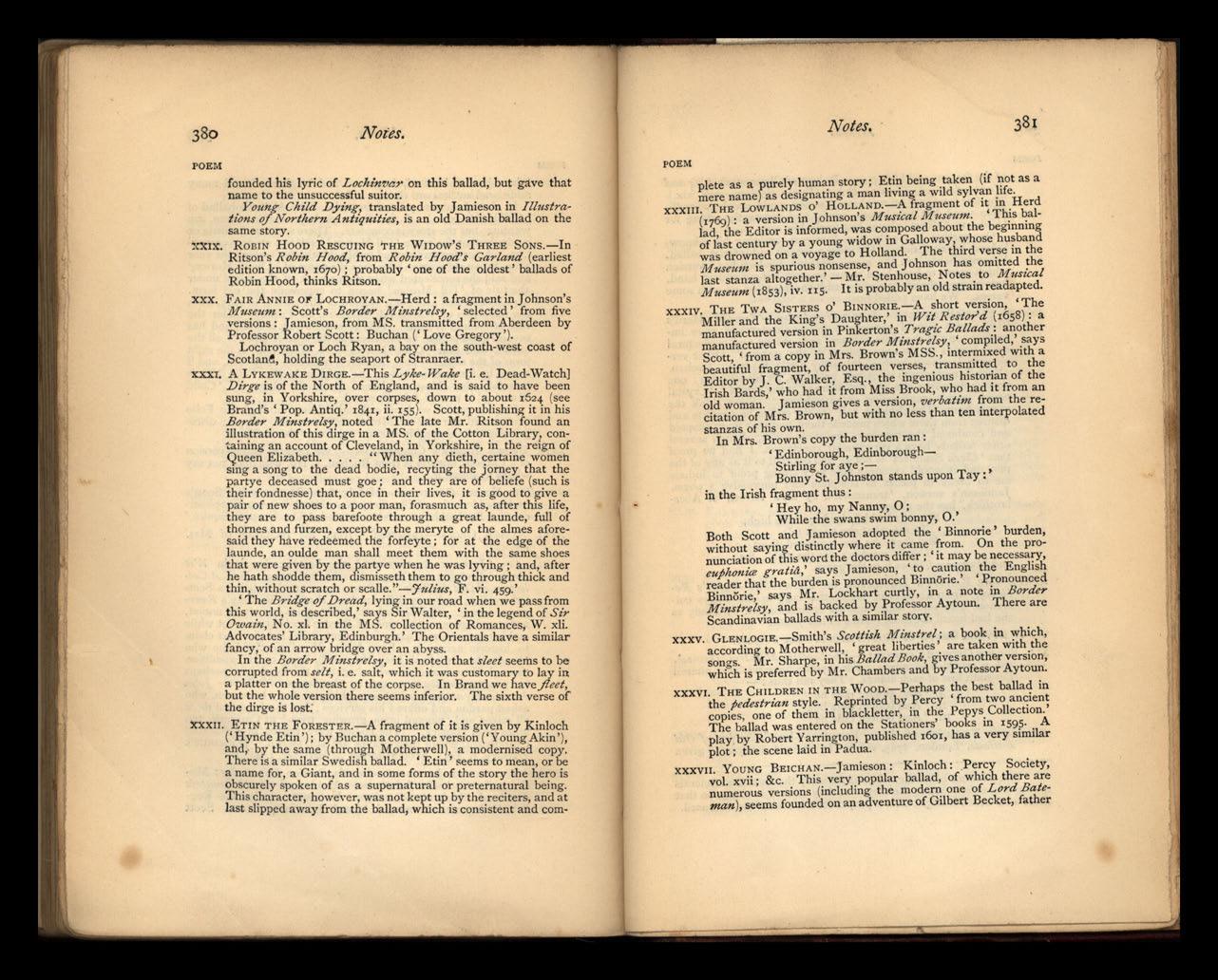
plete as a purely human story; Etin being taken (if not as a mere name ) as de signating a man living a wild sylvan hfe
XXXIII. THE LOWLANDS 0' H OLLAND. -A fragment of it in .Herd (1769) : a version in ] ohnson 's Musical Museum. 'Th.Is lad the Editor is informed, was composed about the begmnmg century by a young widow in Galloway, whose husband was drowned on a voyage to Holland. The third ver.se in the M useu1lt is spurious nonsense, and Johnson has omitted the last stanza altogether.'-Mr. Stenhouse, Notes to Musical Museum ( I853 ), iv. lIS. It is probably an old strain readapted.
XXXIV. THE TWA SISTERS 0' BINNORIE.-A short version, 'The Miller and the King' s Daughter,' in Wit Resto'>d (1658): a manufactured version in Pinkerton's Tragic Ballads: another manufactured version in Border Millstrelsy, 'compiled,' says Scott, 'from a copy in Mrs. Brown's MSS., with a beautiful fragment, of fourteen t o the Editor by J. C. Walker, Esq., the mgemous histOrIan of the Irish Bards' who had it from Miss Brook, who had it fro m an old woman.' ]amieson gives a.version, verhatim the recitation of Mrs. Brown, but With no less than ten mterpolated stanzas of his own.
In Mrs. Brown's copy the burden ran: 'Edinborough, EdinboroughStirling for aye ;Bonny St. Johnston stands upon Tay:' in the Irish fragment thus:
'Hey ho, my Nanny, 0; \Vhile ' the swans swim bonny, 0 ' Both Scott and J amieson adopted the 'Binnorie' burden, without saying distinctly where it came fr om. On the pronunciation of thi s word the doctors differ; 'it may be necessa ry, eujJltOlI,ia gratia,' says Jami eson, to caution the English reader that the burden is pronounced BinnOrie.' '1?ron ounced Binnorie ' says Mr Lockh3rt curtly, in a note in Border Mbzstrelsy, and is .Professor Aytoun. There are Scandinavian ballads With a Similar story.
xxxv. GLENLOGIE.-Smith's SCOUiS!L Minstrel; a book in which, • according to Motherwell, 'great li be rties'. are taken with .the songs. l\fr. Sharpe, in hi s Bn.lladBook, which is preferred by Mr. Chambers and by Professor Aytoun.
XXXVI. THE CHILDREN IN THE WooD.-Perhaps the best ballad in the pedestria'IL style Reprinted by.Percy 'from two copie s one of them m blackletter, m the Pepys CollecttOn. The was entered on the Stationers' books in 1595· A play by Robert Yarringt on, publi shed 16<)1, has a very similar plot; the scene laid in Padua.
XXXVII. YOUNG BEICHAN.-Jamieson: Kinloch: ,PeTcy Soc iety, vol. xvii; &c. This very popular ballad, of which there are numerous versions (including the modern one of Lord Bateman ), seems founded on an adventure of Gilbert Becket, father
POEM
of the famous archbishop; s ce Robert of Gloucester's Life alld Marty;dom. of Thomas l!eket (Percy Society, val. xix.). fair foreigner on reachmg London could speak no intelli. ¥lb!e word lover' s name, and constantly asking for Gilbert! Gilbert, she at last found him out OUT is. mostly J amieson, omitting his acknowHe gives 3: second inferior ballad, Y-;mng Bekle, on the same subject. Kmloch has a version WhlC,h se,ems to have been recast by some modem hand, but It gives the story clearly, and has supphed us with some verses, We have added none.
XXXVIII. SAUNOERS.-Border Millstre/sy,-4From:ltlr. Herd's .1\155., with corrections from a shorter and more imperfect C?py the same volume, and one or two conjectural emendations In the arrangement of the stanzas.' Other ver sions in Jamieson (with additions by him ) : Kinloch: C1er.k so-caHed, probably, for his one descnbes him 'well-learned at the school.' 'Crystal wand needs explanation or emendation. 1 Some think the from 'The bell J to the end to be separate and dlstmct those precede them, and that Scottadapted and combmed the two mto one story. But though several ballads have a similar conclusion,' I find no proof that Saunders JS. not as well entitled to it as any of the rest, and It cert..1.mly take very strong proof to induce me m. so and impressive a poem. Jamu:son,s verSion, transmitted by Mrs. Arrott, of Aberorothlck, has the ghost:
'She was lookin' o'er her castle high To see what she might fa'; J And there she saw a grieved ghost Comin' wauking o'er the wa" &c and M:l.rgaret follows it to the grave. .
XXXIX•.THE DAUGHTER OF ISLlNGToN.-Percy's Re. an a1!cient blackletter copy in the Pepys collectIOn, With some Improvements communicated by a lady as she had heard the same recited in her youth.'
XL. A LVTELL GESTE OF ROBvN HOOD. See Preface.
XLI. BONNIR GEORGE CAMPBELL.-Tlle Scottish M,itstre! ( ,820.24) vol. and music. For rhyme's sake we have altered the SiXth hne of each stanza. They ran thus: _ 1. 'And gallant rade he . , U. And booted rade he: Ill. 'And booted rade he ; ,
XLII. LoRD THOMAS AND FAIR ELLINoR.-In Collection. of Old Ballads, London, 1723, vol. i. In Percy's Reliques, l'given
.f The clinking bell,' &c It was formerly the custom at funerals to rmg a handbell before the corpse as they carried it along so that those who heard it might offer a prayer for the soul of the d;ceased.

(with corrections ) from an ancient copy in in the Pepys collection.' In Ritson's Allcieftt Songs, ii. SQ. 'Ve have for once (in this and in No. LXIV.) given two balfad ver4 sions of the same story,-for example's sake, and because each has merit and a standing of its own.
XLIII. 'HUGH OF LINCOLN.'·-Herd: Percy: Jamieson: Motherwell: and several other versions. Percy's MS. copy 'sent from Scotland,' begins-
The rain rins down Mirry-land toune, Sae dois it doune the Pa: and the bishop learnedly argues that Milan and the Po must be meant, 'although the Adige, not the Po, runs through Milan.' Other versions give other corrupt forms, 'merry Linkim,' and' Maitland town;' Jamieson's copy' from :tYlrs. Brown's recitation' has the right reading, merry Linco1n.' 1255, teste IVlatthew Paris (but a so-so witness), the Jews of Lmcoln stole a little Christian boy named Hugh, tortured and crucified him, and flung his body into a pit, where his mother found it. The occupant of the house confessed the crime, and that the Jews every ye3r thus killed a Christian child. He was hanged, as also were eighteen of the richest Jews in Lincoln. The child's body was buried with honours in Lincoln Cathedral (where they still pretend to show his tomb). Chaucer's Prioress's Tale is on the same subject. Horrible tales against the poor rich Jews were abundant in the Middle Ages.
XLIV. BARBARA ALLEN.-Ramsay's Tea-Table Miscella1J.l' Percy gives the same, 'with a few conjectural emendatIOns,' and also another version, 'with some corrections, from an old blackletter copy.' Pepys in his Diary, Jan. 2, 1665-6, names 'the little song of Barbary Alien.'
XLV. MAY COLvIN.-Herd: Buchan: Mothenvell: Sharpe's Ballad Book, &c. A story found in various fOlms, not only in English, but also in Swedish and in German ballad-literature. The country people on the coast of Carrick, in Ayrshire, point out' Fause Sir John ' s Loup,' and an equally authentic claim in this matter is made for another locality in the North of Scotland.
XLVI. EDwARD, EDwARD.'-First printed in Percy's Reliqttes, 'transmitted to the editor by Sir David Dalrymple, Bart., late Lord Hailes;' written, some say, (but where is proof?) by Lady Wardlaw,-who was, in all probability, authoress of the overpraised I Hardyknute.'
XLvn. THB: OUTLAW MURRAv.-Border Minstrelsy. Compiled by Scott from various sources; no ascertained historical founda tion.
XLVIII. THE CRUEL BROTHER.-Herd: Jamieson 'from recitation of Mrs. Arnott:' Gilbert's Ancient Christmas Carols, &c. There are Danish, Swedish, and German ballads more or less like to this.
POEr.[
XLlX. LITTLE MUSGRAVE , &c.-In Wit Restor'd (1658): 'The Old Ballad of Little Musgrave and Lady Barnard'; in Percy (altered by him ) : a Scottish version. in J amieson: another in vol. xvii. of the PeTey Society. The is quoted in Beaumont and Fletcher's burlesque play of K1zigltt of tlte Bur/J,1,1r,g Pestle (produced 16,, ), thus: , And some they whistled and some they sung, Hey, down , down."
And some did loudly say, Ever as the Lord Barnet's horn blew, Away, Musgrave, away.'-Act v. SCE1te 3.
L. KINMONT WILLIE. - Border Millstrels),. In ISg6, Salkeld, deputy of Lord Scroope, Engli s h Warden of the West Marches, and Robert Scott, for the Laird of Buccleuch, Keeper of Liddesdale, met on the border line for conference, and under the usual truce , which lasted till next day at sunset. WiIliam Armstrong, of Kinmont, a notorious freebooter, returning from this conference, was seized and in Carlisle castle. The Laird of Buccleuch, after treating In vain for his release, raised two hundred horse, and on the 13th of April surprised the castle and carried off the prisoner, on hearing of which, Queen Elizabeth s tormed not a little.' Scott gives a long account of this in the Border Mi1tstrelsy. 'This ballad,' he says, 'is pre se rved by tradition on the West Borders, but much mangled by reciters, so that some conjectural emendations have been absolutely necessa ry to render it intelligible.'
"Ll. FINE FLOWERS IN THE VALLEY.-Given in Johnson's Musical Mu-seum: also by Motherwell, as' The Cruel Mother,' with the burden , Three, three, alld three by t'tree Tlt.ree, tltree, and tltirty-tlt.ree. and by Kinloch, with the burden , A II alonc, and alollie : Doft1" by tAc greellwud sac o01mie.'
Our version is] ohnson's (to a word or two ), adding the last verse from Kmloch The burden, singing of flowers and leaves, at once deepens and softens the tragedy.
LII. RODIN HOOD'S DEATH ANO BURIAL.-Printed in Robz'1t Hood's Garla1ul (York ), and S'iven by Ritson , 'from a collation of two. different copies, con taming numerous variations.'
LUI. YOUNG REDIN.-A ba llad found in various versions and under various names: 'Earl Richarq ,' 'Young Hunting,' 'Lord William,' 'Young Redin.' A fragment of it in Herd: a (selected' version in Border Minstrelsy: a version in Buchan: one, 'from recitation of Mi ss E. Beattie,' in K,inloch: a!1othe.r, 'from recitation, ' in Motherwell: a factitIOUS verSIon, 10 pseudo-antique spelling, in Scarce A "cient Ballads, Alexander Laing, Aberdeen, 1822.
LIV. THE FRAY 0' SUPoRT.-Border Minstrelsy. This odd and forcible outburst is usually chanted in a sort of wild recitative,
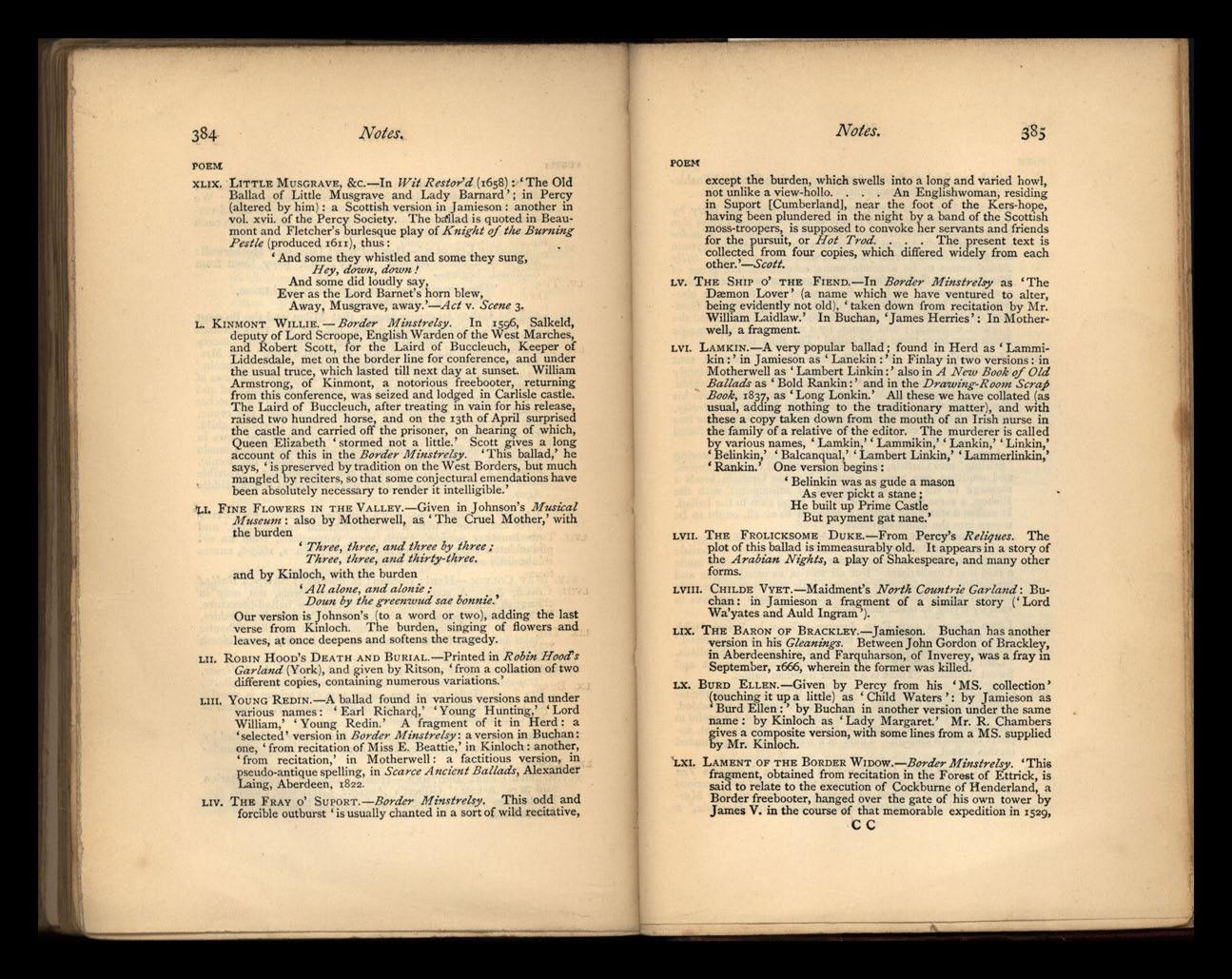
except the burden, which swells into a long and varied howl, not unlike a view-hollo. An Englishwoman, residing in Suport [Cumberland], near the foot of the having been plundered in the night by a band of the ScottIsh moss-troopers, is supposed to convoke her servants and friends for the J'ursuit, or Hot Trod. The present text is coIlecte from four copies, which differed widely from each other. '-Scot/.
LV. THE SHIP 0' THE FIEND.-In Border Mt'llstrelry as 'The Dremon Lover' (a name which we have ventured to alter, evidently not old ), 'taken down from recitation by :M r. Wilham Laidlaw.' In Buchan, 'James Herries': In Mother. well, a fragmenL
LVI LAMKIN.-A very popular ballad; found in Herd as 'Lammikin:' in Jamieson as Lanekin:' in Finlay in two versions: in Motherwell as 'Lambert Linkin:' also in A New Book if Old Ballads as 'Bold Rankin:' and in the DrawillK-Roo11t Scrap Book, 1837, as ' Long Lonkin.' All these we have collated (as usual, adding nothing to the traditionary matter ), and with these a copy taken down from the mouth of an Irish nurse in the family of a relative of the editor. The murderer is called by various names, 'Lamkin," Lammikin,' 'Lankin,' 'Linkin,' 'Belinkin,' 'Balcanqual," Lambert Linkin,' Lammerlinkin,' , Rankin. J One versIOn begins: , Belinkin was as gude a mason As ever pickt a stane ; He built up Prime Castle But payment gat nane.'
LVII. THE FROLICKSOME DUKE.-From Percy's Reliques. The plot of this ballad is immeasurably old. It appears in a story of the Arabian Nights, a play of Shakespeare, and many other forms.
LVIII. CHILDE VVET.-Maidment's Nortlt. Countrie Garland: Bu. cban: in J amieson a frag;ment of a similar story (' Lord Wa'yates and Auld Ingram ).
LIX.
LX.
BURD ELLEN.-Given by Percy from his MS. collection' \touching it upa little ) as 'Child Waters ': by Jamieson as Burd Ellen : ' by Buchan in another version under the same name: by Kinloch as 'Lady Margaret.' Mr. R. Chambers gives a composite version, with some lines from a MS. supvlied by Mr. Kinloch.
LXI. THE BARON OF BRACKLEv.-Jamieson. Buchan has another version in his Gleanittgs. Between John Gordon of Brackley, in Aberdeenshire, and Farquharson, of Inverey, was a fray ID September, 1666, wherein the former was killed.
LAMENT OF THE BORDER WI"OOw.-Border Minstre!!y. cThi& fragment, obtained from recitation in the Forest of Ettrick, is said to relate to the execution of Cockburne of Henderland, a Border freebooter, hanged over the gate of his own tower by James V. in the course of that memorable expedition in 1529, CC
POEM
which was fatal to J ohnie Armstrong, Adam Scott of Tushiel aw, and many other marauders.'-Scott.
LXII. WILLl E'S LADYE is given by Seott, and the ,same by Jami eson under the title of Sweet . . gives also modernised version; and Lewls In hIS Tales of Wonder dished up a ballad upon it in own ,taste. Professor has given it mainly from jamleson with a few touches. Bz'/ly BI£1ld seems to be a comic name, taken from the game, ?f Blindman's Buff, for a familiar and good-natured house-splrtt, a sort of Brow1l;z"e or Lar. Sectt never met the na",!--e elsewhere than in Mrs. Brown's ballads It that In Scotland the blinded person in the aforesaid game also called Bogie (i. e. goblin ) ; and hence, bY,a Bogie may have come to be called The Billy BlInd.
XIII HUGHIE GRAHAM.-From TIte Scots Musical Museum, L . by Burns I from oral tradition in Ayrshire.' Burns certamly dressed up the ballad, and wrote some of the Allan Cunningham again the Burns versl<?n for hIS Songs of Scotland. Scott' s verSlQn m M1.1lstrelsy, was I long current in Selkirkshirc,' but It also 15 or less improved by the editor. A corrupt coPy of the ballad IS found in Wit ami Mtrtlt, &c. (London, 17 1 4)..
Our version is precisely that of Burns! changmg or res t or:ng , into Carlisle, in with .all the othe r COPICS, and omItting one verse, in which Graham s.cnds a mc!sage to his wife accusing her C?f ffilsc0!lduct with the B" sho a verse that in point of art 15 no gam to the ballad. Itl a statement which" if referred to at all, ought to be woven into the whole narrative.
., Mr Stenhouse [Scots Musical Mu.seum, new edit. 1853,.IV. 2 7] that ' according to trad iti0!1' the of Carhsle 1560 did so wrong a border chief, who In revenge made a raid into 'Cumberland. But 3:1l is, usual, vague and intangible. The ballad is a spIrited httle picture from the times on the Border, and we sh?uld only weary ourselves m vain by trying to make more of It.
LXIV. L ORD THOMAS AND FAIR by Percy, some corrections fro m a MS. copy tran s mitted (rom Scotland. H says it ' seems to be composed out of' two English ballads, , Lord Thomas and Fair ElIinor' and 'Fair Margaret and Sweet William.' There is a similar Swedish ballad.
LXV. LIZIE LI NDSAV.-Jami eson : Buchan: Whitelaw (from ti on of a lady a t Glasgow). We have.colla,ted, but added. Verse 1 9 one suspect s t o partly J amleso n s ; but It IS useful to the si tuation and its prettmess, though of a modem cast, ap-pears harml;ss enough. There is a well·known song founded on this ballad.
LXVI. SWEET WILLIAM'S GHOST.-First in Ramsay's Tea Table Miscella1ty, imperfectly, and 3;t least two SpUriOUS s1..'\ozas: also by Kinloch, as and .M,argaret :' and by Motherwell as WIlliam and MarJone, a
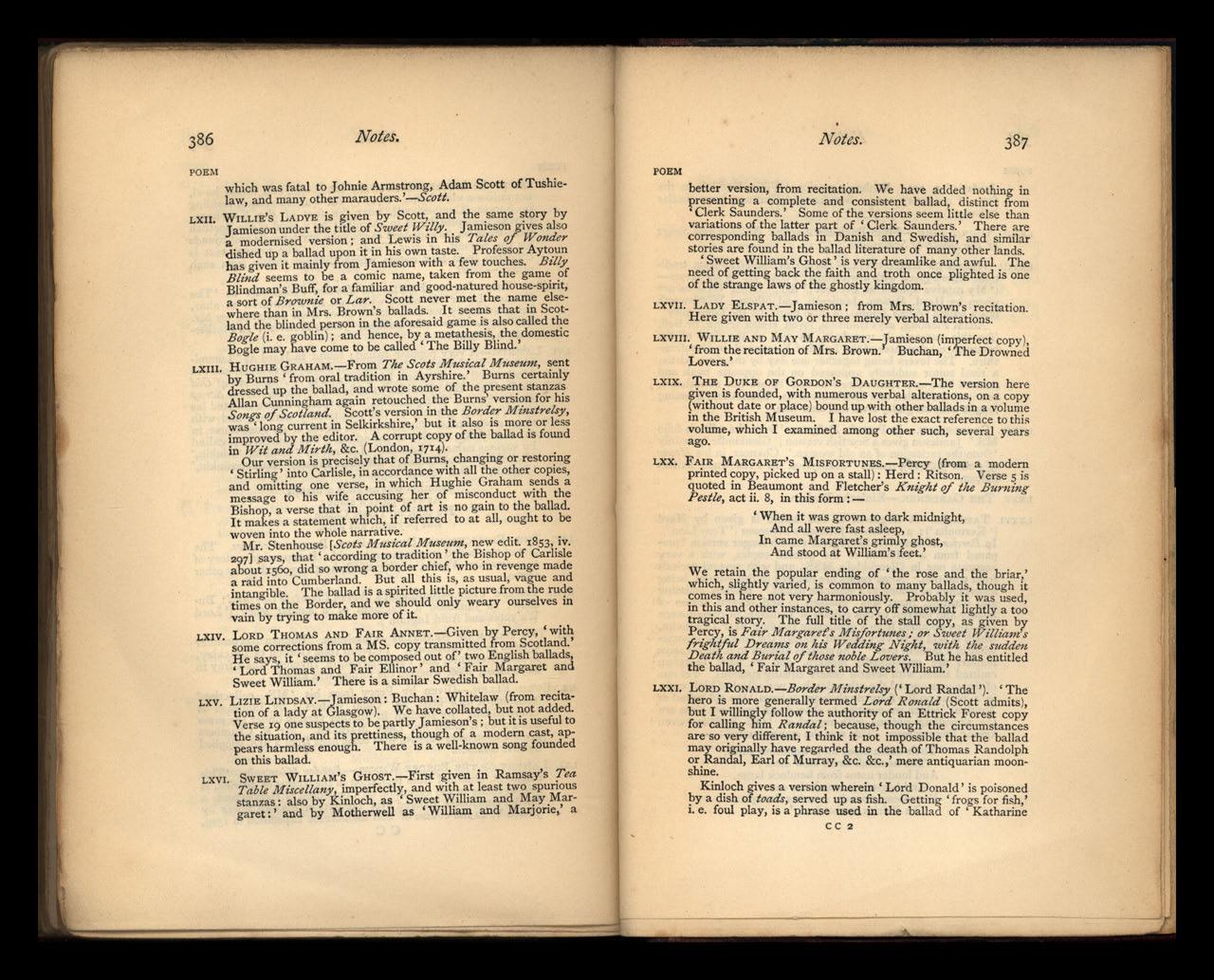
Notes.
POEM
better version, from recitation \Ve have added nothing in
variations of the latter part of 'Clerk Saunders.' There a re corresponding ballads In Danish and Swedish, and similar stories are found in the ba llad literature of many other lands. 'Sweet William's Ghost' is very dreamlike and awful. The need of getting back the faith and troth once plighted is one of the strange laws of the ghostly kingdom.
LXVII. LADV ELSPAT.-]amieson; from Mrs. Brown's recitation. Here given with two or three merely verbal alterations.
LXVIII. WILLIE AND MAY l\1ARGARET.-lamieson (imperfect copy ), , from th e recitation of Mrs. Brown. Buchan,' The Drown e d Lovers. '
LXIX. THE DUKE OF GORDON'S DAUGHTER.-The version here give n is founded, with numerous verbal alterations, on a copy (without date or place ) bound up with other ballads in a volume in the British Museum I have lost the exact reference to this volume, which I examined among other such, several years ago.
LXX. FAIR MARGARET'S MISFORTuNES.-Percy (from a modem printed copy, picked up on a stall ) : Herd: Ritson. Verse 5 is quoted in BeaumoDt and Fletcher's K1lz.'gkt of tlee Burnz.'ng Pestle, act ii. 8, in this form:-
J When it was grown to dark midnight, And all were fast asleep, In came Margaret's grimly ghost, And stood at William's feet.'
\Ve retain the pollular ending of 'the rose and the briar,' which, slightly varied , is common to many ballads, though it comes in here not very harmoniously. Probably it was used, in thi s and other instances, to carry off somewhat lightly a too tragical story. The full title of the stall copy, as given b,l': Percy, is Fair Margarefs or Sweet Witliam s frigllifu.l Dreams on his Wetlding Nigltt, with tlte s1ldde1l. Deatlt and Burial of those ,lohle Lovers. But he has entitled the ballad, , Fair Margaret and Sweet William.'
LXXI, LORD RONALD.-Border Minstrelsy (' Lord Randal '). 'The hero is more generally t ermed Lord R01m!d (Scott admits ), but I willingly follow the authority of an Ettrick Forest copy for calling him R andal; because, though the circumstances are so very different, I think it not impossible that the ballad may originally have regarc1ed the death of Thomas Randolph or Randal, Earl of Murray, &c. &c.,' mere antiquarian moon. shine.
Kinloch gives a version wherein' Lord Donald' is poisoned by a dish of toads, served up as fish. Getting' frogs for fi sh,' i. e foul play, is a phrase used in the balla d of ' Katharine cc 2
POEM
lanfarie,' p. IIO. Buchan's version 'Willie Doo,' is in the a nursery song. Sweden and Germany have similar
LXXll. YOUNG JOHN.-From Buchan's And",t Ballads and Songs of tlte Nort" of Scotland.
LXXIII. HELEN OF KIRCONNELL.-Border Mt"'1/.strclsy-from tradition. There given with a worthless' First Part' of six verses(' My captive spirit's at thy feet!' &c.) Other versions are given by Herd, Ritson, J amieson, and others. Words worth has a ballad (Ellen irwi1l ), oflittle merit, on the same story. Adam Fleming, says tradition, loved Helen lrving, or Bell, ((or this surname is uncertain, as well as the date of the occurrence,) daughter of the Laird of Kirconnell, in Dumfriesshire. The lovers being together one day by the river Kirtle, a rival suitor suddenly appeared on the opposite bank and pointed his gun; Helen threw herself before her sweetheart, received the bullet, and died in his arms. Then Adam Fleming fought with his guilty rival and slew him.
LXXIV. GLASGERJON.-In Percy's Reliqlles, 'from the editor's folio MS.' J amieson a Scottish version (' Glenkindie ' ), mainly , from the recitatIon of an old woman.' Chaucer, in his House of Fame (iii. 118), names' Glaskyrion' as a renowned Britis\ harper.
LXXV. THE GARDENER.-Kinloch: Buchan.
LXXVI. TAMLANE.-A fragment of this ballad is given by Herd (' Kertonha'): a version in Johnson's M'NSeum ('Tom Linn ' ) In Border Mi1utrelsy, Scott gives a much version pared from a collation of the printed copIes, with a very accurate one in Glenriddel's MSS., and with several recitals from tradition. Some verses are omitted in this edition, being ascertained to belong to a separate ballad.' Besides collating and Scott was 'enabled to add several verses of beauty and mterest to this edition of Tamlane, in consequence of a coPy obtained from a gentleman residing near Langholm, which IS said to be ancient, though the language is somewhat of a modern cast. The stanzas alluded to in this evasive manner are undoubtedly modern, and we have therefore omitted them, with several others equally spurious. Yet one of these was quoted the other day in a periodical of high rank, in a paper on the fairy mythology, as from' the old ballad of Tamlane/ which we mention to show again how very loose are the prevailing notions with regard to 'Old Ballads,' even among literary men. This was the stanza quoted: -
Their oaten pipes blew wondrous shrill, The hemlock small blew clear; And louder notes from hemlock large, And bog-reed, struck the ear; But solemn sounds, or sober thoughts, The Fairies cannot bear '

Then follows: -
'They sing, inspired with love and joy, Like skylarks in the air:
Of solid sense, or thought that's grave, You'll find no traces there.'
Pretty enough in its own way, but certainly not the 'true thing.' A fragment, 'Tom LlDn' is given in.A New Book oj Old Ballads, Edinburgh, ,84+ The hero is elsewhere named 'Tom a lin,' and' Thomlin.' 'The Tale of the Young Tarnlene' is mentioned in T!te C011,playnt of Scotland ('548).
Carterhaugh is a plain about a mile from Selkirk and the peasants are said to point out the localities where the' incidents of the ballad took place.

39 2 btdex of First Lines.
Johnnie rose up in a May morning .
Lamkin was as good a mason .
Late at e'en, drinking the wine Lithe and lysten, gentylmen .
Lord Ingram and Childe Vyet
Lord John stood in his stable door
Lord Thomas and fair Annet.
Lord Thomas he was a bold forester
My love he built me a bonny bower
Near the King's court was a young child born .
Now, as fame does report, a. young Duke keeps a court.
Now ponder well, you parents dear. .
o Alison Gross, that lives in yon tower
o Bessie Bell and Mary Gray
o fairest lady ever seen.
o have ye na heard 0' the fause Sakelde
0, I forbid ye, maidens a'. . .
o waly, waly, up the bank.
o well is me, my jolly goshawk .
o wha wad wish the wind to blaw
o wha will shoe my bonny foot
o where hae ye been, Lord Ronald my son?
o where hae ye been, my lang-l05t lover
o Willie's large 0' limb and lith.
Our lords are to the mountains gan,e
, Rise up, rise up, Lord Douglas!' she says.
She sat down below a thorn •
Sleep'ry Sim of the Lamb·hill. . .
Sweet Willy's ta'en him o'er the faem
The Duke of Gordon's three daughters
The gard'ner stands in his bower door.
The king sits in Dunfermline town .
The Laird 0' Drum is a-hunting gane
The love that I hae chosen.
The Percy out of Northumberland
The reivers they stole Fair Annie
There are twelve months in all the year
There came a ghost to Marjorie's door
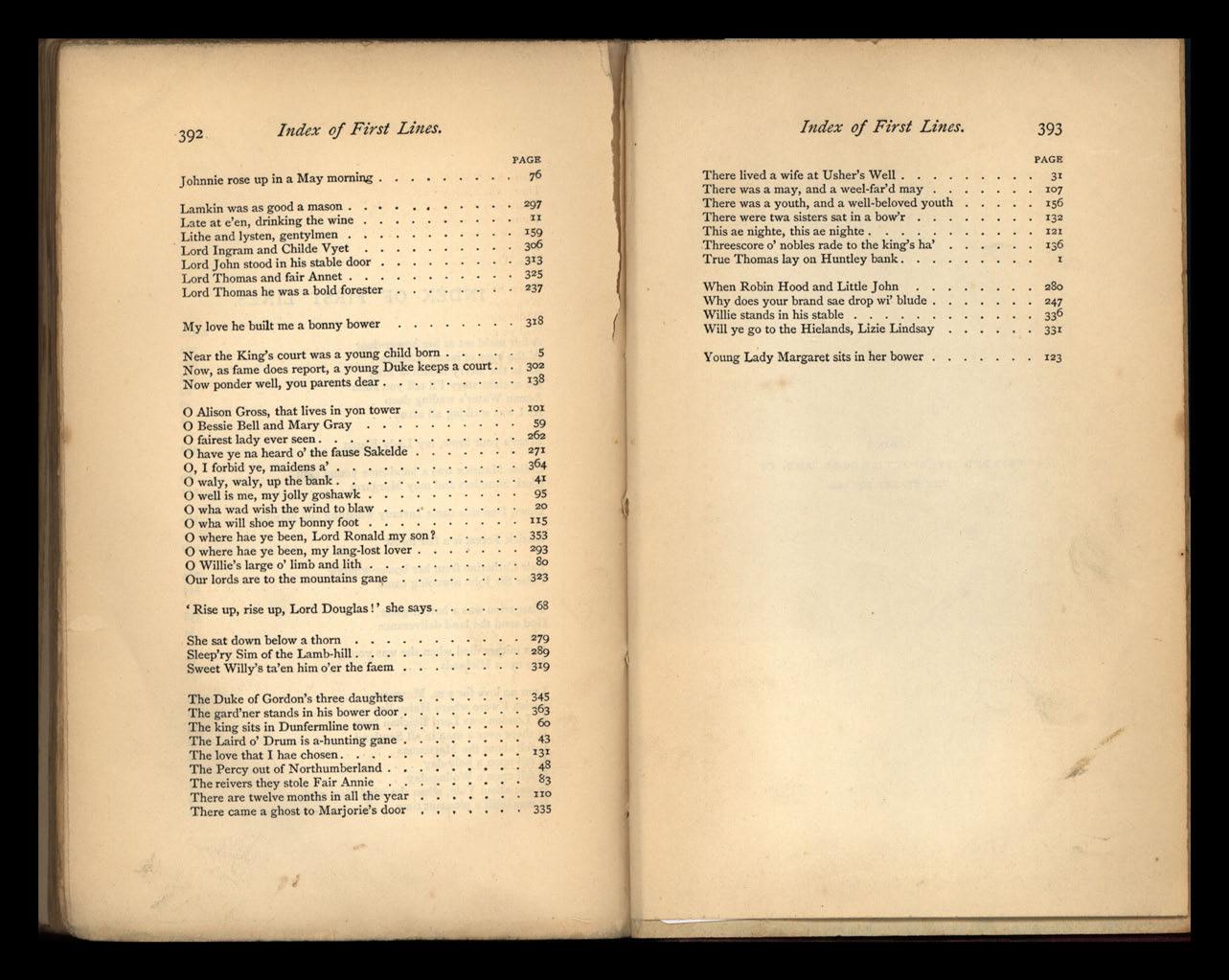
There lived a wife at Usher's Well.
There was a may, and a weel-far'd may
There was a youth, and a well-beloved youth
There were twa sisters sat in a bow'r
This ae nighte, this ae nighte .
Threescore 0' nobles rade to the king's ha'
True Thomas lay on Hundey bank.
When Robin Hood and Little John
Why does your brand sae drop wi' blude . Willie stands in his stable
Will ye go to the Hielands, Lizie Lindsa y
Young Lady Margaret sits in her bower .
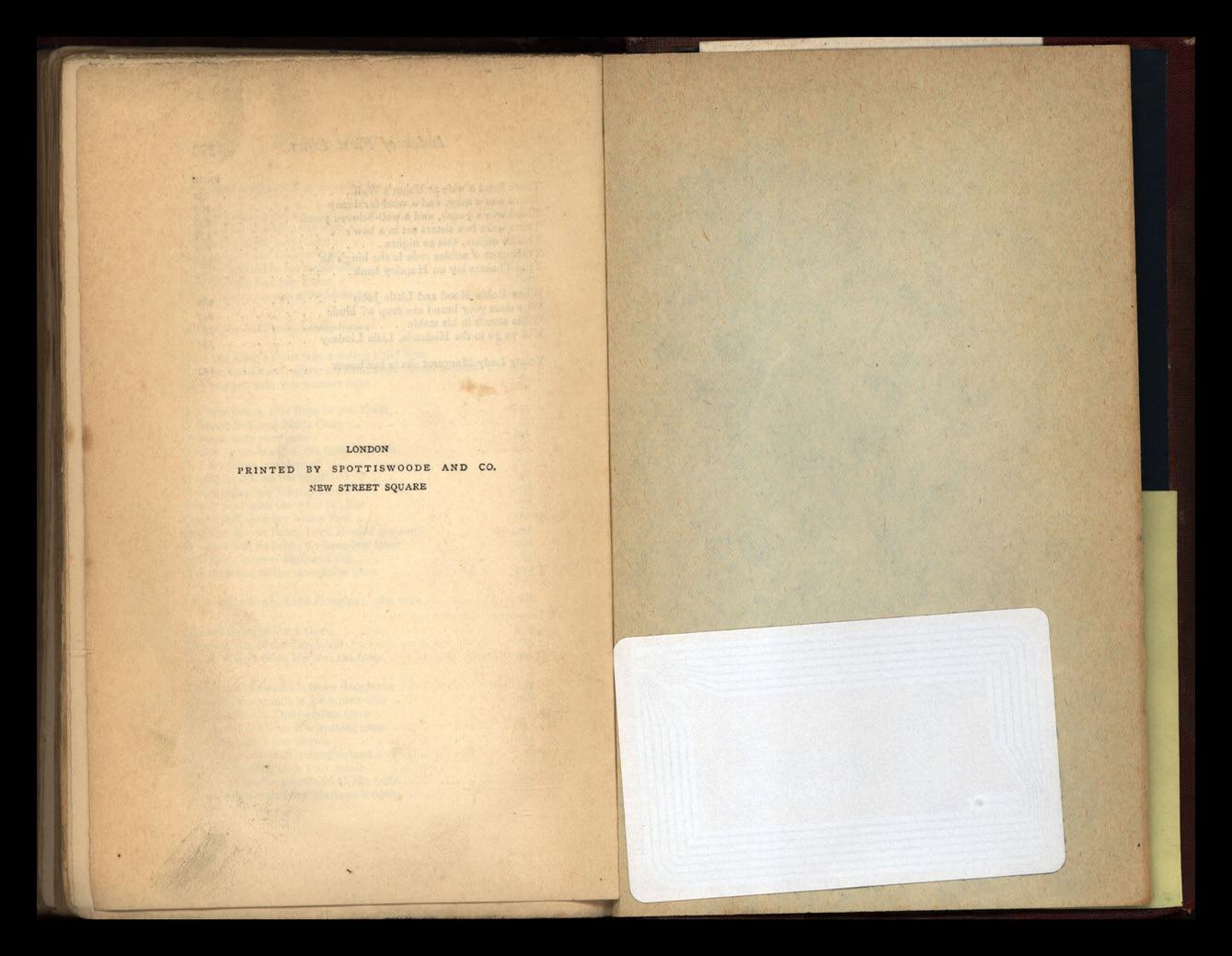
PRINTED BY SPOTTISWOODE A.ND CO.
N EW STREET SQUARE

